

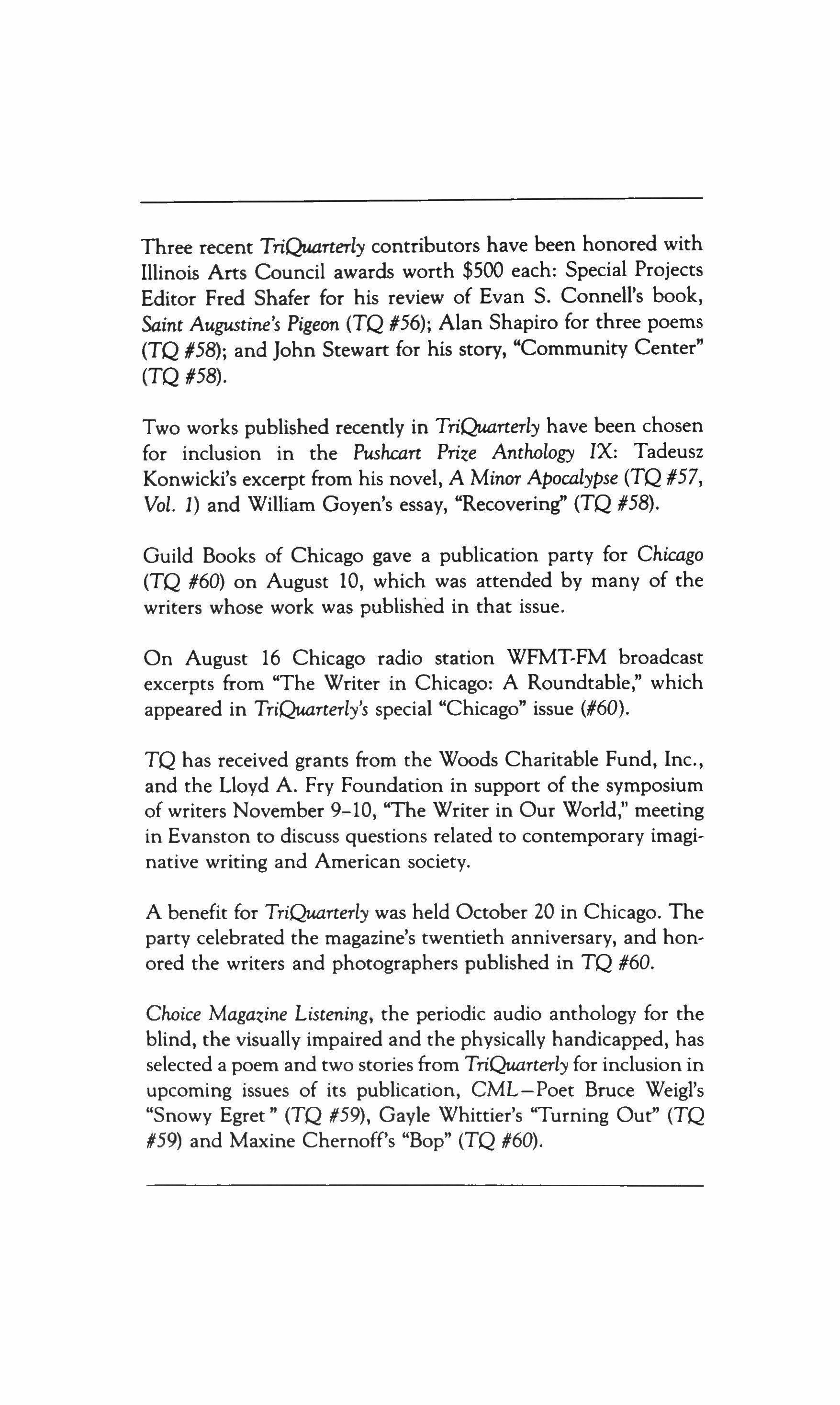
Three recent TriQuarterly contributors have been honored with Illinois Arts Council awards worth $500 each: Special Projects Editor Fred Shafer for his review of Evan S. Connell's book, Saint Augustine's Pigeon (TQ #56); Alan Shapiro for three poems (TQ #58); and John Stewart for his story, "Community Center" (TQ #58).
Two works published recently in TriQuarterly have been chosen for inclusion in the Pushcart Prize Anthology IX: Tadeusz Konwicki's excerpt from his novel, A Minor Apocalypse (TQ #57, Vol. 1) and William Goyen's essay, "Recovering" (TQ #58).
Guild Books of Chicago gave a publication party for Chicago (TQ #60) on August 10, which was attended by many of the writers whose work was published in that issue.
On August 16 Chicago radio station WFMT-FM broadcast excerpts from "The Writer in Chicago: A Roundtable," which appeared in TriQuarterly's special "Chicago" issue (#60).
TQ has received grants from the Woods Charitable Fund, Inc., and the Lloyd A. Fry Foundation in support of the symposium of writers November 9-10, "The Writer in Our World," meeting in Evanston to discuss questions related to contemporary imaginative writing and American society.
A benefit for TriQuarterly was held October 20 in Chicago. The party celebrated the magazine's twentieth anniversary, and honored the writers and photographers published in TQ #60.
Choice Magazine Listening, the periodic audio anthology for the blind, the visually impaired and the physically handicapped, has selected a poem and two stories from TriQuarterly for inclusion in upcoming issues of its publication, CML-Poet Bruce Weigl's "Snowy Egret" (TQ #59), Gayle Whittier's "Turning Out" (TQ #59) and Maxine Chernoff's "Bop" (TQ #60).


Editor Reginald Gibbons
Executive Editor Bob Perlongo
Managing Editor Joseph LaRusso
Fiction Editor Susan Hahn
Special Projects Editor Fred Shafer
Design Director Gini Kondziolka
TriQuarterly Fellow Greg Meyerson
Editorial Assistants Brian Bouldrey, James Bryant, T. R. Johnson, Sheelagh McCaughey
Advisory Editors Robert Alter, Michael Anania, Elliott Anderson, Terrence Des Pres, Gloria Emerson, Richard Ford, George Garrett, Gerald Graff, Francine du Plessix Gray, Michael S. Harper, David Hayman, Bill Henderson, Maxine Kumin, Elizabeth Pochoda, Michael Ryan
TRIQUARTERLY IS AN INTERNATIONAL JOURNAL OF ART, WRITING, AND CULTURAL INQUIRY PUBLISHED IN THE FALL, WINTER, AND SPRING AT NORTHWESTERN UNIVERSITY, EVANSroN, ILLINOIS 60201.
Subscription rates-Individuals: one year $16; two years $28; life $100. Institutions: one year $22; two years $40; life $200. Foreign subscriptions $4 per year additional. Single copies usually $6.95. Sample copies $3. Correspondence and subscriptions should be addressed to TriQuarterlv, NORTHWESTERN UNIVERSITY, 1735 Benson Avenue, Evanston, Illinois 60201. Phone: (312) 492-3490. The editors invite submissions of fiction, poetry, and literary essays. No manuscripts will be returned unless accompanied by a stamped, self-addressed envelope. All manuscripts accepted for publication become the property of TriQuarterlv, unless otherwise indicated. Copyright © 1984 by TriQuarterlv. All rights reserved. The views expressed in this magazine are to be attributed to the writers, not the editors or sponsors. Printed in the United States of America.
National distributor to retail trade: B. DeBoer, 113 East Central Street-Rear, Nudey, New Jersey 07110. Distributor for West Coast trade: Bookpeople, 2929 Fifth Street, Berkeley, California 94710. Midwest: Bookslinger, 213 East Fourth Street, St. Paul, Minnesota 55101 and Prairie News Agency, 2404 West Hirsch Street, Chicago, llIinois 60622.
Reprints of issues #1-15 of TriQuarterlv are available in full format from Kraus Reprint Company, Route 100, Millwood, New York 10546, and all issues in microfilm from University Microfilms International, 300 North Zeeb Road, Ann Arbor, Michigan 48106. ISSN: 0041-3097.
Publication of this issue of TriQuarurly is supported in pan by the llIinois Am Council.
Fall 1984

Contents Two Stories 7 Dino Buzzati House Snake (poem) •. 15 Reynolds Price The Chandelier (story) ••••••••••.••••••.•.• 27 Gregory Orfalea Two Stories 37 Marga Minco From A Wilderness Called Peace (Excerpt from Novel) •..••.•••••••.••.••••• 51 Edmund Keeley The Dead Alive and Busy (essay) ••••••.•••.• 62 Alan Shapiro Three Poems 71 flayden <:arruth Three Poems 75 Linda Pastan Five Poems 80 John Peck Two Poems 89 Paul Mariani Two Poems 94 Joseph Gastiger African Photos, 1968 ••..•. � ••..•.•.•.•.•• At 96 Denis Cameron Two Poems 97 Carole Oles Sleeping Beauty (poem) 99 Stacy Doris Three Poems 100 flans Magnus Enzensberger Two Poems 103 Michael Knoll Two Poems 105 Gerald Mc<:arthy Like Hunger and Thirst (essay) ••......••.••• 108 Josephine Jacobsen Two Poems 118 Josephine Jacobsen Three Poems 121 Brendan Galvin 4

Two Stories 125 Stephen Dixon Winter Love Story (story) 134 Martha Bennett Stiles The Oddment Man and the Apocalyptic Beasts (story) 145 Eugene K. Garber Hippopotamos (story) 154 Meredith Steinbach Three Stories 190 Kobo Abe Contributors 202
5
Cover design by Gini Kondziolkalphoto by Denis Cameron

Two Stories
Dino Buzzati
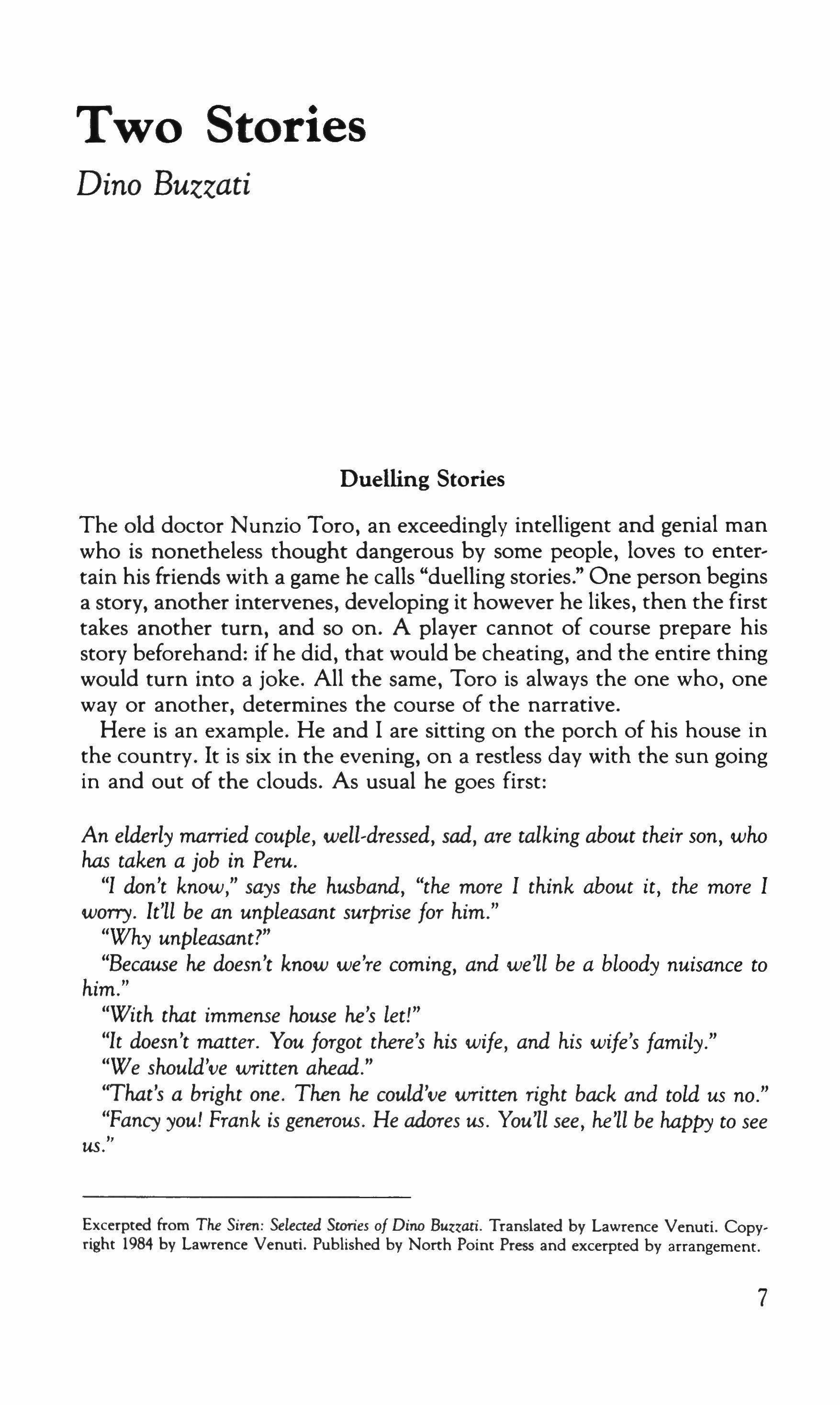
Duelling Stories
The old doctor Nunzio Toro, an exceedingly intelligent and genial man who is nonetheless thought dangerous by some people, loves to enter, tain his friends with a game he calls "duelling stories." One person begins a story, another intervenes, developing it however he likes, then the first takes another turn, and so on. A player cannot of course prepare his story beforehand: if he did, that would be cheating, and the entire thing would turn into a joke. All the same, Toro is always the one who, one way or another, determines the course of the narrative.
Here is an example. He and I are sitting on the porch of his house in the country. It is six in the evening, on a restless day with the sun going in and out of the clouds. As usual he goes first:
An elderly married couple, well-dressed, sad, are talking about their son, who has taken a job in Peru.
"I don't know," says the husband, "the more I think about it, the more I worry. It'll be an unpleasant surprise for him."
"Why unpleasant?"
"Because he doesn't know we're coming, and we'll be a bloody nuisance to him."
"With that immense house he's let!"
"It doesn't matter. You forgot there's his wife, and his wife's family."
"We should've written ahead."
'That's a bright one. Then he could've written right back and told us no."
"Fancy you! Frank is generous. He adores us. You'll see, he'll be happy to see us."
Excerpted from The Siren: Selected Scories of Dino Buzzati. Translated by Lawrence Venuti. Copyright 1984 by Lawrence Venuti. Published by North Point Press and excerpted by arrangement.
7

"Enough. Now it's your turn."
I continued:
While these two were talking, a little distance away, a priest was busy writing up the speech he would deliver tomorrow as the inaugural address for an international geophysics conference. It is Monsignor Estogarratz, the noted seismologist, although today, to tell the truth, he is considered past his prime. And he knows it. He also realizes that his appointment as chairman of the conference is due to the support of the "old guard," men like Dorflinger, Stoliepkin, Estancieros, Mandruzzato. And of course his speech cannot disappoint them; if it does, it would be a terrible show of ingratitude. Yet the. monsignor believes that his speech shows him to be an adherent of certain avant-garde positions, especially those concerning innovations in the rates of compensation. On the second page, in fact, there is a problematic passage that-
Nunzio Toro's eyes are sparkling.
"Marvelous!" he interrupts me. "The monsignor is an inspired idea. You seem to have read my mind. Now let me continue."
But the seismologist is disturbed by two ladies who are chattering away just behind him. They are about forty years old, still attractive, beautifully tanned.
"Then you saw him too?"
"Of course! At first I didn't even recognize him."
"Destroyed in the space of a few months. Poor Giancarlo. You can't know how sorry I am. It's such a trauma. I don't have a dearer friend."
''You'll see, he won't come in the winter-"
"Oh, please be quiet! Don't even mention it. And to think of the injustice of fate. An important man like him, in that condition, and wretched me, who never did a blessed thing, with my iron constitution."
''You're telling me? You know that at my last checkup they found me-in their words-like a little girl, perfect from head to toe, inside and out "
Doctor Toro breaks off and with a wave of his hand invites me to continue. I am ready:
The monsignor is also disturbed by two very excited young men who are wearing strange athletic outfits and trying to attract attention to themselves.
"Do you have the enlargement with you?" one asked the other in a loud voice.
"I hope so. But you have to dig through this stack of papers to find it."
He rummages through a leather briefcase, and after a little while, he draws out a large photograph: it is a gigantic pear-shaped wall of rock and ice. The young man points to an area precisely in the center of the photograph.
8
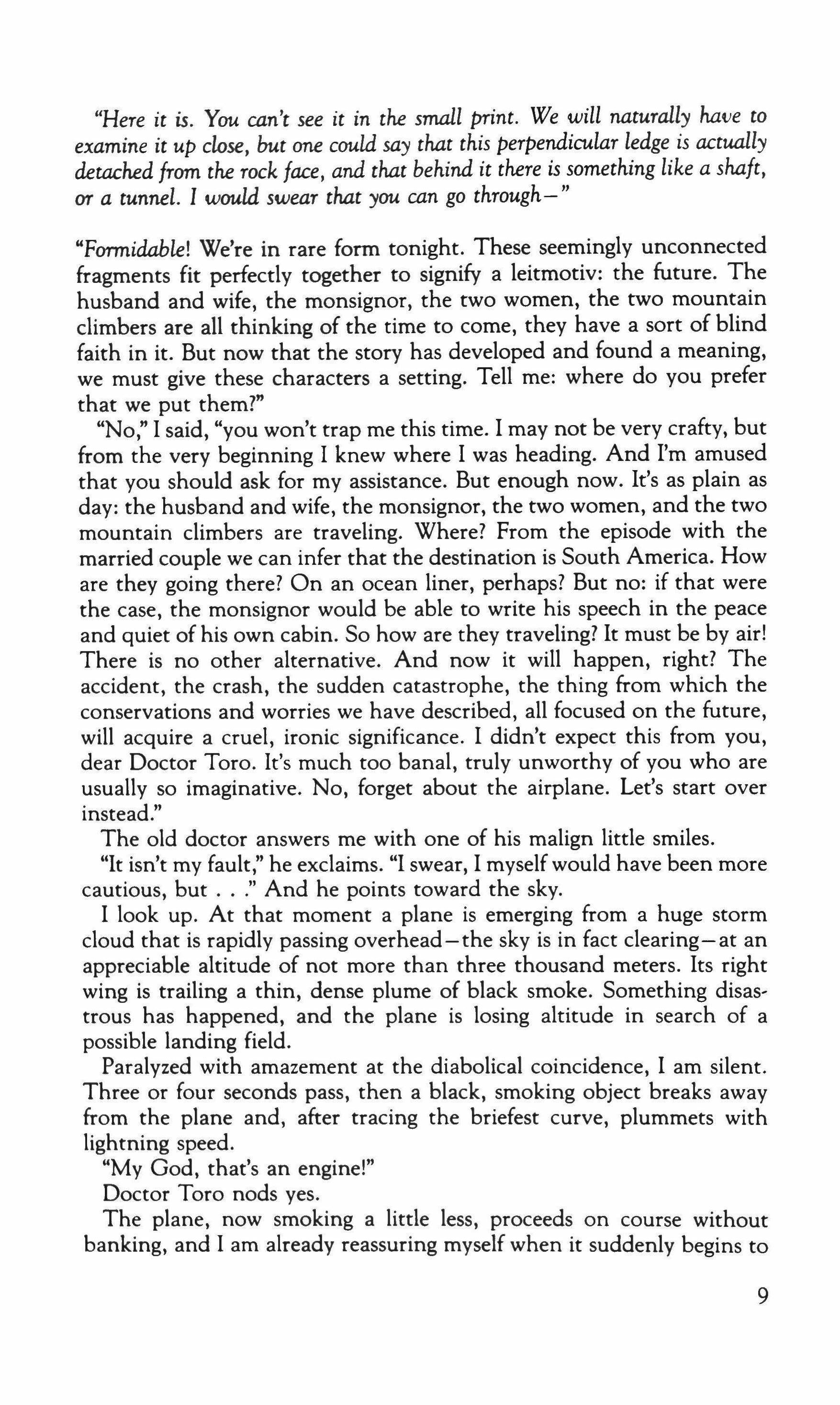
"Here it is. You can't see it in the small print. We will naturally have to examine it up close, but one could say that this perpendicular ledge is actually detached from the rock face, and that behind it there is something like a shaft, or a tunnel. I would swear that you can go through-"
"Formidable! We're in rare form tonight. These seemingly unconnected fragments fit perfectly together to signify a leitmotiv: the future. The husband and wife, the monsignor, the two women, the two mountain climbers are all thinking of the time to come, they have a sort of blind faith in it. But now that the story has developed and found a meaning, we must give these characters a setting. Tell me: where do you prefer that we put them?"
"No," I said, "you won't trap me this time. I may not be very crafty, but from the very beginning I knew where I was heading. And I'm amused that you should ask for my assistance. But enough now. It's as plain as day: the husband and wife, the monsignor, the two women, and the two mountain climbers are traveling. Where? From the episode with the married couple we can infer that the destination is South America. How are they going there? On an ocean liner, perhaps? But no: if that were the case, the monsignor would be able to write his speech in the peace and quiet of his own cabin. So how are they traveling? It must be by air! There is no other alternative. And now it will happen, right? The accident, the crash, the sudden catastrophe, the thing from which the conservations and worries we have described, all focused on the future, will acquire a cruel, ironic significance. I didn't expect this from you, dear Doctor Toro. It's much too banal, truly unworthy of you who are usually so imaginative. No, forget about the airplane. Let's start over instead."
The old doctor answers me with one of his malign little smiles.
"It isn't my fault," he exclaims. "I swear, I myself would have been more cautious, but And he points toward the sky.
I look up. At that moment a plane is emerging from a huge storm cloud that is rapidly passing overhead-the sky is in fact clearing-at an appreciable altitude of not more than three thousand meters. Its right wing is trailing a thin, dense plume of black smoke. Something disastrous has happened, and the plane is losing altitude in search of a possible landing field.
Paralyzed with amazement at the diabolical coincidence, I am silent. Three or four seconds pass, then a black, smoking object breaks away from the plane and, after tracing the briefest curve, plummets with lightning speed.
"My God, that's an engine!"
Doctor Toro nods yes.
The plane, now smoking a little less, proceeds on course without banking, and I am already reassuring myself when it suddenly begins to
9
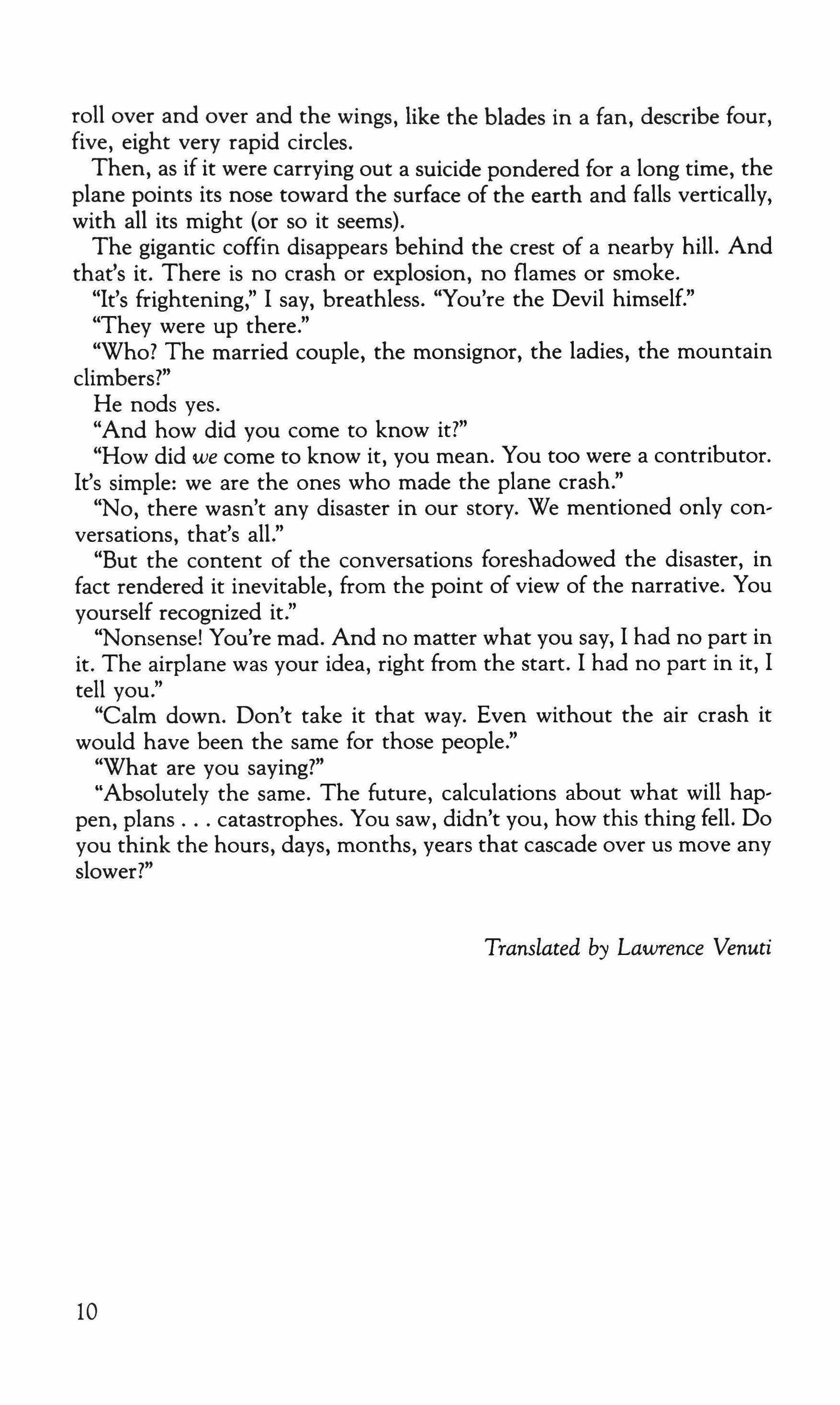
roll over and over and the wings, like the blades in a fan, describe four, five, eight very rapid circles.
Then, as if it were carrying out a suicide pondered for a long time, the plane points its nose toward the surface of the earth and falls vertically, with all its might (or so it seems).
The gigantic coffin disappears behind the crest of a nearby hill. And that's it. There is no crash or explosion, no flames or smoke.
"It's frightening," I say, breathless. "You're the Devil himself."
"They were up there."
"Who? The married couple, the monsignor, the ladies, the mountain climbers?"
He nods yes.
"And how did you come to know it?"
"How did we come to know it, you mean. You too were a contributor. It's simple: we are the ones who made the plane crash."
"No, there wasn't any disaster in our story. We mentioned only conversations, that's all."
"But the content of the conversations foreshadowed the disaster, in fact rendered it inevitable, from the point of view of the narrative. You yourself recognized it."
"Nonsense! You're mad. And no matter what you say, I had no part in it. The airplane was your idea, right from the start. I had no part in it, I tell you."
"Calm down. Don't take it that way. Even without the air crash it would have been the same for those people."
"What are you saying?"
"Absolutely the same. The future, calculations about what will happen, plans catastrophes. You saw, didn't you, how this thing fell. Do you think the hours, days, months, years that cascade over us move any slower?"
Translated by Lawrence Venuti
10
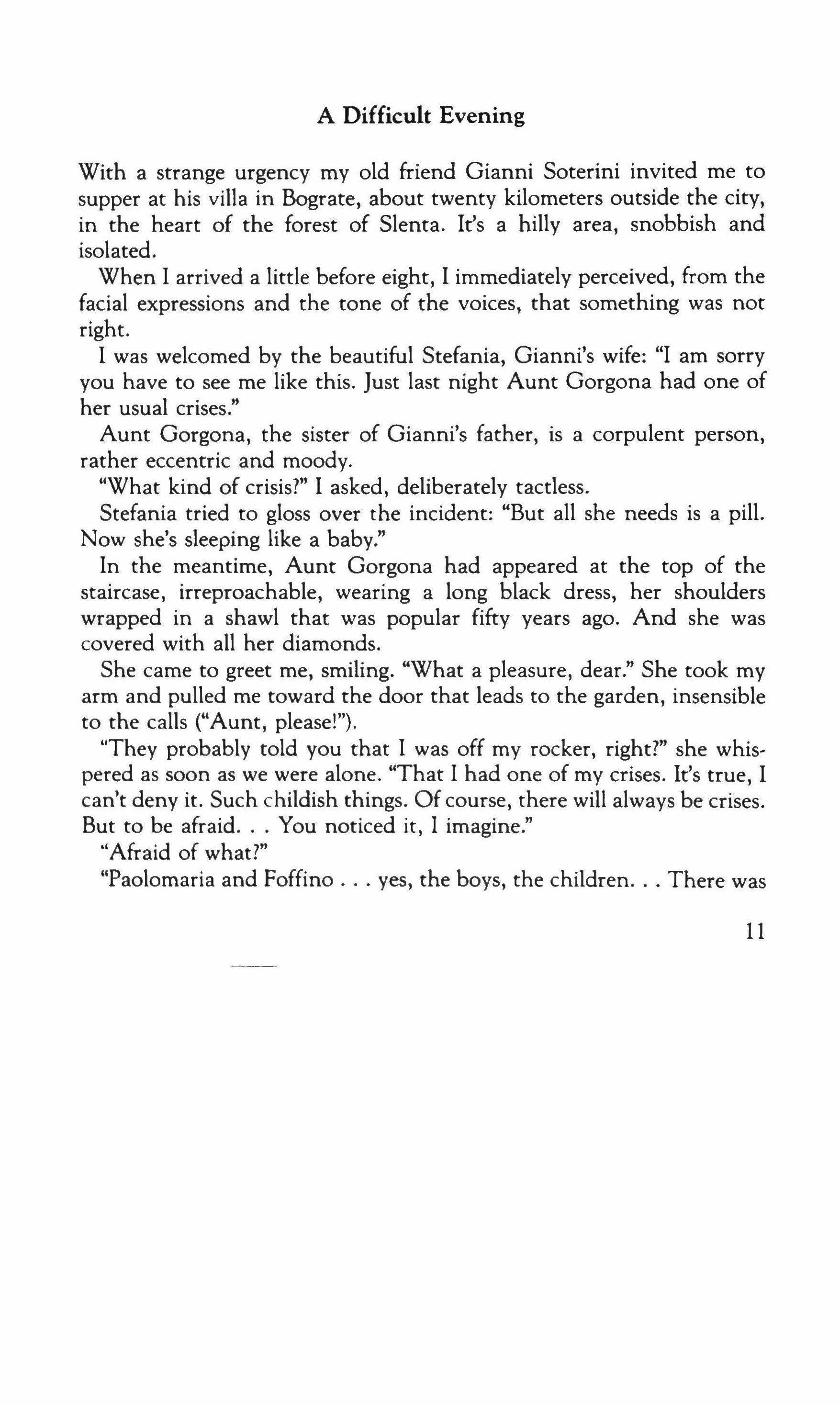
A Difficult Evening
With a strange urgency myoid friend Gianni Soterini invited me to supper at his villa in Bograte, about twenty kilometers outside the city, in the heart of the forest of Slenta. It's a hilly area, snobbish and isolated.
When I arrived a little before eight, I immediately perceived, from the facial expressions and the tone of the voices, that something was not right.
I was welcomed by the beautiful Stefania, Gianni's wife: "I am sorry you have to see me like this. Just last night Aunt Gorgona had one of her usual crises."
Aunt Gorgona, the sister of Gianni's father, is a corpulent person, rather eccentric and moody.
"What kind of crisis?" I asked, deliberately tactless.
Stefania tried to gloss over the incident: "But all she needs is a pill. Now she's sleeping like a baby."
In the meantime, Aunt Gorgona had appeared at the top of the staircase, irreproachable, wearing a long black dress, her shoulders wrapped in a shawl that was popular fifty years ago. And she was covered with all her diamonds.
She came to greet me, smiling. "What a pleasure, dear." She took my arm and pulled me toward the door that leads to the garden, insensible to the calls ("Aunt, please!").
"They probably told you that I was off my rocker, right?" she whispered as soon as we were alone. "That I had one of my crises. It's true, I can't deny it. Such childish things. Of course, there will always be crises. But to be afraid You noticed it, I imagine."
"Afraid of what?"
"Paolomaria and Foffino yes, the boys, the children There was 11

a phone call that said they were coming here tonight with a group of their friends."
"A call from whom?"
"Anonymous, of course."
"But even if they arrive-"
"The call added that the little ones were coming to do away with papa and mama -" and here she burst into a hearty laugh.
Stefania was calling us. "Please, come to the table. What were you two plotting?"
We were joined at the table by old Father Emigera, the family's confessor for three generations. He and I were the only guests.
"I imagine:' Gianni began, "that Aunt Gorgona has already explained everything to you."
"I don't know if she told me 'everything,' but-"
"So what do you think of it?" Stefania intervened.
"An anonymous phone call -this was certain to gain time"maybe it's a stupid joke."
Gianni was serious: "I don't think so. In the months before they went away to college, Paolomaria used to look at us in a certain way."
"Foffino too, for that matter," said Stefania.
"But why don't you just lock the doors and windows?"
"That's the worst thing we could do," said Gianni. "It would aggravate them even more."
"But college will keep them in line, won't it?"
"Don't make me laugh. Paolomaria is such a devil. He could escape from Alcatraz."
"Would Paolomaria and Foffino really come to kill you?"
He shook his head as if to say: it is inevitable.
And Stefania: "This is the way things are today. Parents are killed today. It's the latest fad."
"Killed? Who was killed?" It was the troubled voice of Father Emigera, in the clouds as usual.
"Us, Gianni and me!" Stefania snapped, exasperated. "The children are coming to do away with us-understand, Father? To do away with Gianni and me, Gianni and me-"
"Calm down, Stefania," Aunt Gorgona interrupted. "Please don't make a scene After all, let's be honest, these kids are not entirely wrong."
"What do you mean?"
"It isn't that they're all wrong. Let's be fair. What kind of life can they look forward to? What kind of example have we set for them? What have we done to guarantee them a happy future? If they protest, contest, revolt, how can we blame them?"
"But in this case they actually want to kill us," Gianni dared to object.
12

"Kill, kill! What a pessimist you are!" Aunt Gorgona was in rare form. "While we're waiting, let's consider how they'll go about it. It wasn't said that they would be so wicked. It wasn't said that they would cut you into little pieces. It wasn't said that they would douse you with gasoline and burn you alive. I may understand Paolomaria better than you. He has such a big heart. Paolomaria is a generous boy I would swear that he won't make you suffer."
"What?"
"I don't know, maybe it will be a shot in the neck Or zip-a blade in the cardiac muscle Ah, that would be beautiful!" Aunt Gorgona shook with laughter.
Gianni turned pale. He changed his mind. He called the butler Ernesto. "Listen, Ernesto, don't worry about us. Please hurry and close the doors and windows. And make sure they're locked."
"Locked?" said Father Emigera. "Why are you closing them? It's hot tonight, really, Stefania, aren't you hot?"
"Yes, it's hot, Father," Aunt Gorgona chimed in. "But in this case they're shutting up everything because they're afraid that the brood is returning to the nest to get rid of the parents."
Until this point I had been only an observer. "If you are so afraid, why do you stay here? You should flee, shouldn't you? The world is a big place. Your dear children won't follow you to the North Pole!"
Gianni: "Flee? Where? This is my home, this is my family's old house. Flee where? No, no, I prefer to confront my fate."
"Fate!" It was Aunt Gorgona again. "What a big word They are your sons, after all And I understand them, the poor boys You gave them life, and they are coming to take it away from you The account will be settled in a certain sense, right?"
Stefania: "What do you want me to tell you? Think whatever you like, you can believe I'm senile, but I find the whole thing a little exaggerated."
"Did you hear that?" said Gianni, lowering his voice. "What?"
"Those steps on the gravel did you hear them?" "I didn't," said Stefania.
Father Emigera looked at the clock (coffee was now being served). "I'm sorry, my friends, but tonight at the church the culture committee is meeting again I wouldn't want to be discourteous."
He stood up, brushing the bread crumbs from his cassock with his right hand.
I too stood up.
"No, not you, Buzzati," Stefania protested, pleading. "It's still early. You have to try some of this tart. Another tiny half-hour, please Shall we go and sit over there by the fireplace?"
Aunt Gorgona: "Let him go, Stefania. The prospect of being a witness
13
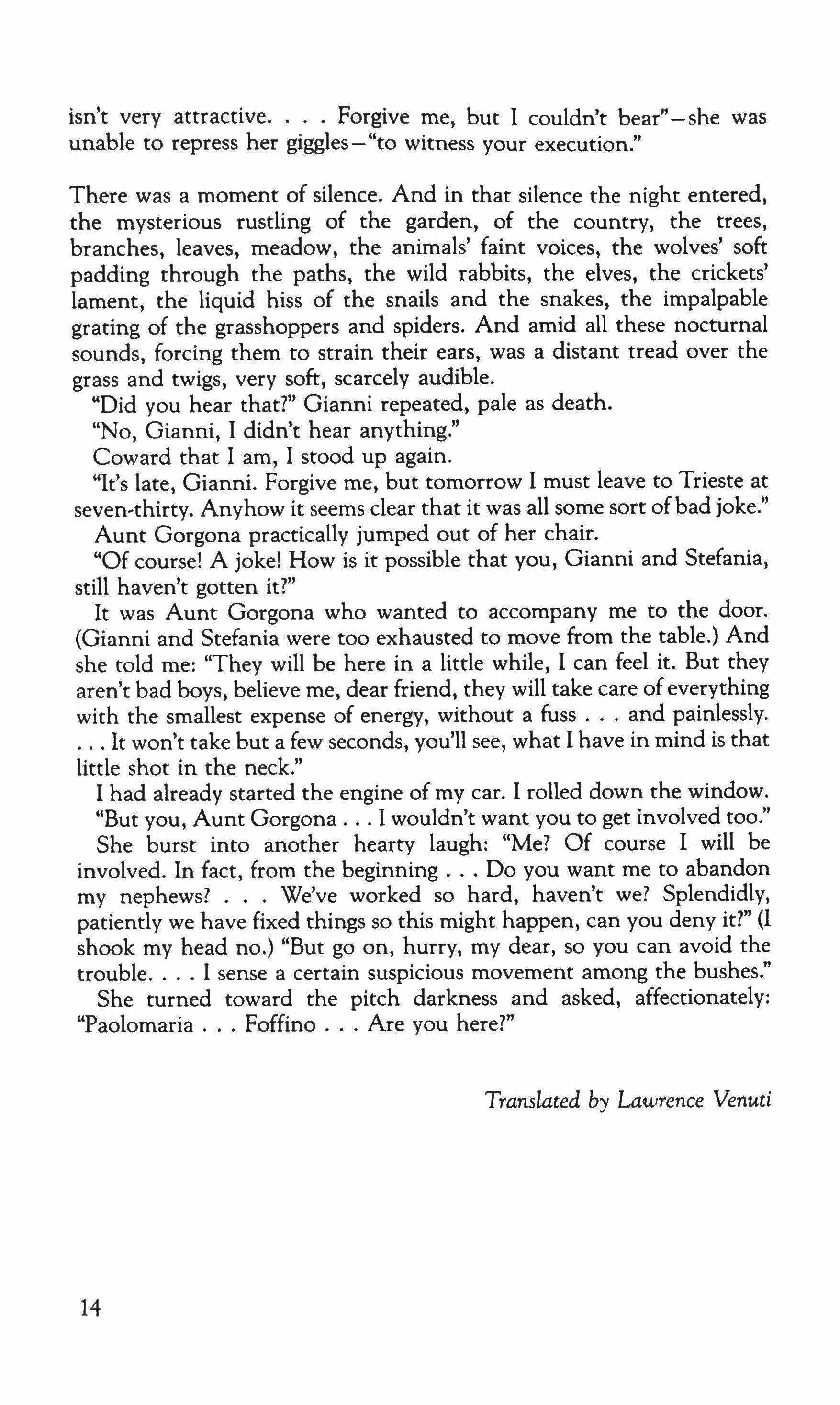
isn't very attractive. Forgive me, but I couldn't bear" - she was unable to repress her giggles-"to witness your execution."
There was a moment of silence. And in that silence the night entered, the mysterious rustling of the garden, of the country, the trees, branches, leaves, meadow, the animals' faint voices, the wolves' soft padding through the paths, the wild rabbits, the elves, the crickets' lament, the liquid hiss of the snails and the snakes, the impalpable grating of the grasshoppers and spiders. And amid all these nocturnal sounds, forcing them to strain their ears, was a distant tread over the grass and twigs, very soft, scarcely audible.
"Did you hear that?" Gianni repeated, pale as death.
"No, Gianni, I didn't hear anything."
Coward that I am, I stood up again.
"It's late, Gianni. Forgive me, but tomorrow I must leave to Trieste at seven-thirty. Anyhow it seems clear that it was all some sort ofbad joke."
Aunt Gorgona practically jumped out of her chair.
"Of course! A joke! How is it possible that you, Gianni and Stefania, still haven't gotten it?"
It was Aunt Gorgona who wanted to accompany me to the door. (Gianni and Stefania were too exhausted to move from the table.) And she told me: "They will be here in a little while, I can feel it. But they aren't bad boys, believe me, dear friend, they will take care of everything with the smallest expense of energy, without a fuss and painlessly It won't take but a few seconds, you'll see, what I have in mind is that little shot in the neck."
1 had already started the engine of my car. 1 rolled down the window.
"But you, Aunt Gorgona 1 wouldn't want you to get involved too."
She burst into another hearty laugh: "Me? Of course I will be involved. In fact, from the beginning Do you want me to abandon my nephews? We've worked so hard, haven't we? Splendidly, patiently we have fixed things so this might happen, can you deny it?" (1 shook my head no.) "But go on, hurry, my dear, so you can avoid the trouble 1 sense a certain suspicious movement among the bushes."
She turned toward the pitch darkness and asked, affectionately: "Paolomaria Foffino Are you here?"
Translated by Lawrence Venuti
14
House Snake
Reynolds Price

All summer it seemed a fair exchangeBlack snake on the lot, better mouser
Than a cat (the previous winter I'd lost Eighty pages of Marcus Aurelius and a Phaidon Michelangelo to squads of mouse teeth). He could prowl the crawl space Round furnace and pump, have whatever Life was separate from me-frogs, Baby birds, chipmunks, scuttling mice, The chance copperhead wandered up From the pond. I'd receive the service Of his plunder and pay only rarely In frigid instants of seeing him-
Breakfasting, sapped by bliss, on the porch; Turned by the chime of a silent signal To find him embossed on the beechtree
Above me, string of hot tar
Ready to pour (does he see me?) Or thrust down, rigid as a cane, From the gutter, devouring raw wren
Hatchlings in the house I'd suspended on wire To miss his reach.
I learned to take
That much - and with measured pride: One of my early templates was Mowgli, An agreeably imitable brunet boy
Whom large beasts loved or anyhow
15
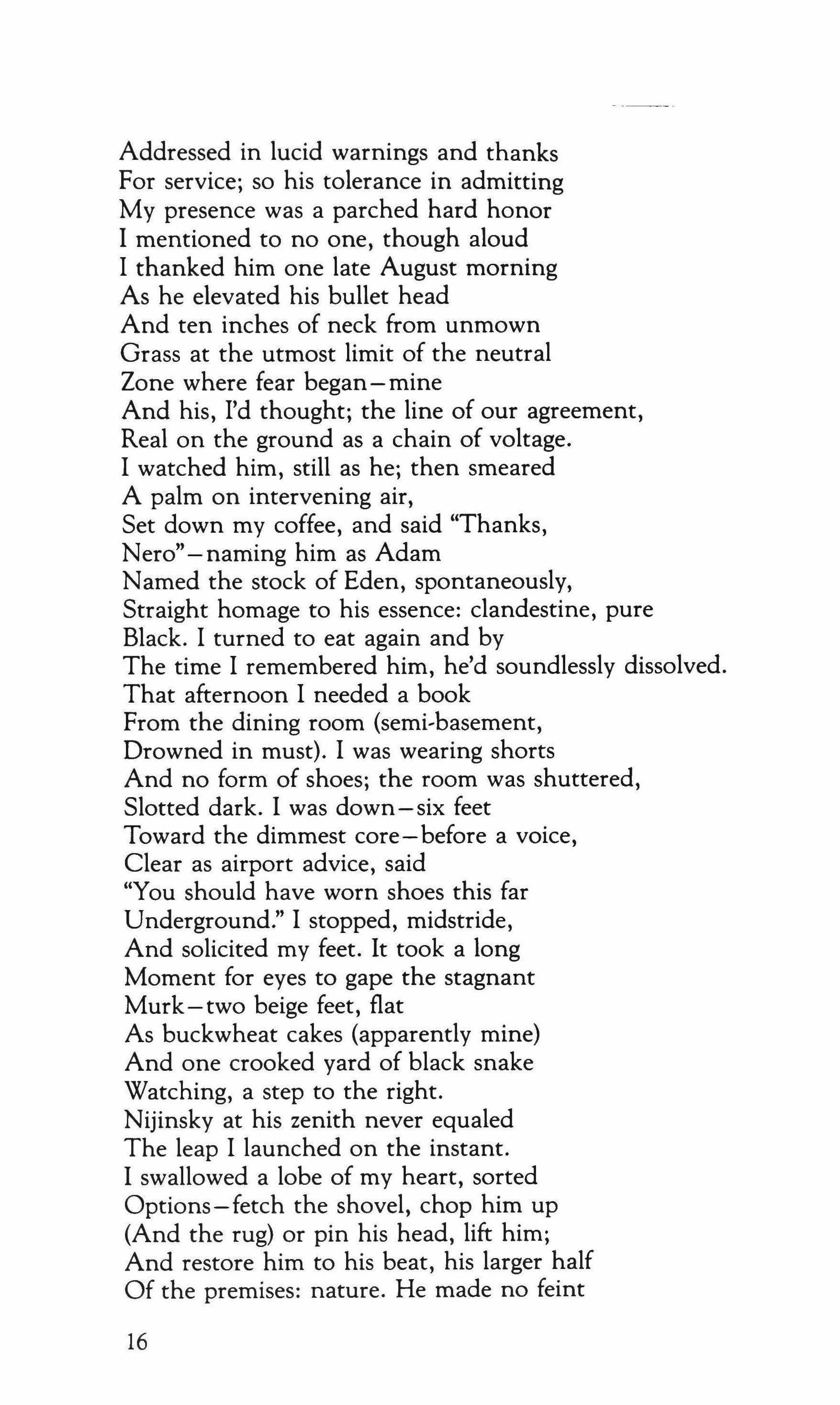
Addressed in lucid warnings and thanks For service; so his tolerance in admitting
My presence was a parched hard honor
I mentioned to no one, though aloud
I thanked him one late August morning
As he elevated his bullet head
And ten inches of neck from unmown
Grass at the utmost limit of the neutral Zone where fear began-mine
And his, I'd thought; the line of our agreement, Real on the ground as a chain of voltage. I watched him, still as he; then smeared
A palm on intervening air,
Set down my coffee, and said "Thanks, Nero" - naming him as Adam
Named the stock of Eden, spontaneously,
Straight homage to his essence: clandestine, pure Black. I turned to eat again and by The time I remembered him, he'd soundlessly dissolved. That afternoon I needed a book
From the dining room (semi-basement, Drowned in must). I was wearing shorts
And no form of shoes; the room was shuttered, Slotted dark. I was down-six feet
Toward the dimmest core-before a voice, Clear as airport advice, said "You should have worn shoes this far Underground." I stopped, midstride, And solicited my feet. It took a long Moment for eyes to gape the stagnant Murk-two beige feet, flat
As buckwheat cakes (apparently mine)
And one crooked yard of black snake
Watching, a step to the right.
Nijinsky at his zenith never equaled
The leap I launched on the instant. I swallowed a lobe of my heart, sorted Options - fetch the shovel, chop him up (And the rug) or pin his head, lift him; And restore him to his beat, his larger half Of the premises: nature. He made no feint
16
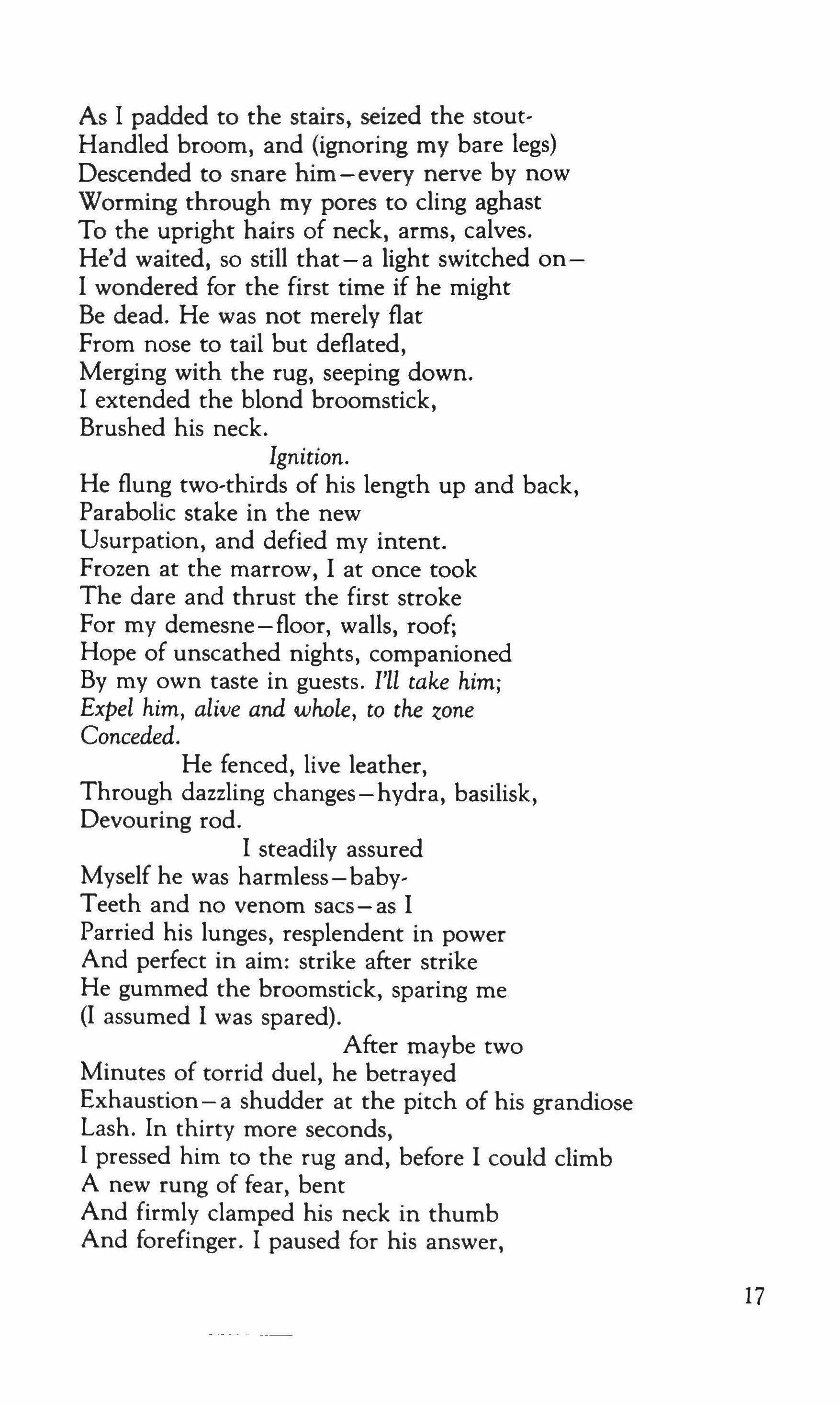
As I padded to the stairs, seized the stout' Handled broom, and (ignoring my bare legs) Descended to snare himevery nerve by now Worming through my pores to cling aghast To the upright hairs of neck, arms, calves. He'd waited, so still that-a light switched onI wondered for the first time if he might Be dead. He was not merely flat From nose to tail but deflated, Merging with the rug, seeping down. I extended the blond broomstick, Brushed his neck.
Ignition.
He flung two-thirds of his length up and back, Parabolic stake in the new Usurpation, and defied my intent. Frozen at the marrow, I at once took The dare and thrust the first stroke For my demesne-floor, walls, roof; Hope of unscathed nights, companioned By my own taste in guests. I'll take him; Expel him, alive and whole, to the zone Conceded.
He fenced, live leather, Through dazzling changes - hydra, basilisk, Devouring rod.
I steadily assured Myself he was harmless-baby, Teeth and no venom sacs - as I Parried his lunges, resplendent in power And perfect in aim: strike after strike He gummed the broomstick, sparing me (I assumed I was spared).
After maybe two Minutes of torrid duel, he betrayed Exhaustion - a shudder at the pitch of his grandiose Lash. In thirty more seconds, I pressed him to the rug and, before I could climb
A new rung of fear, bent And firmly clamped his neck in thumb And forefinger. I paused for his answer,
17
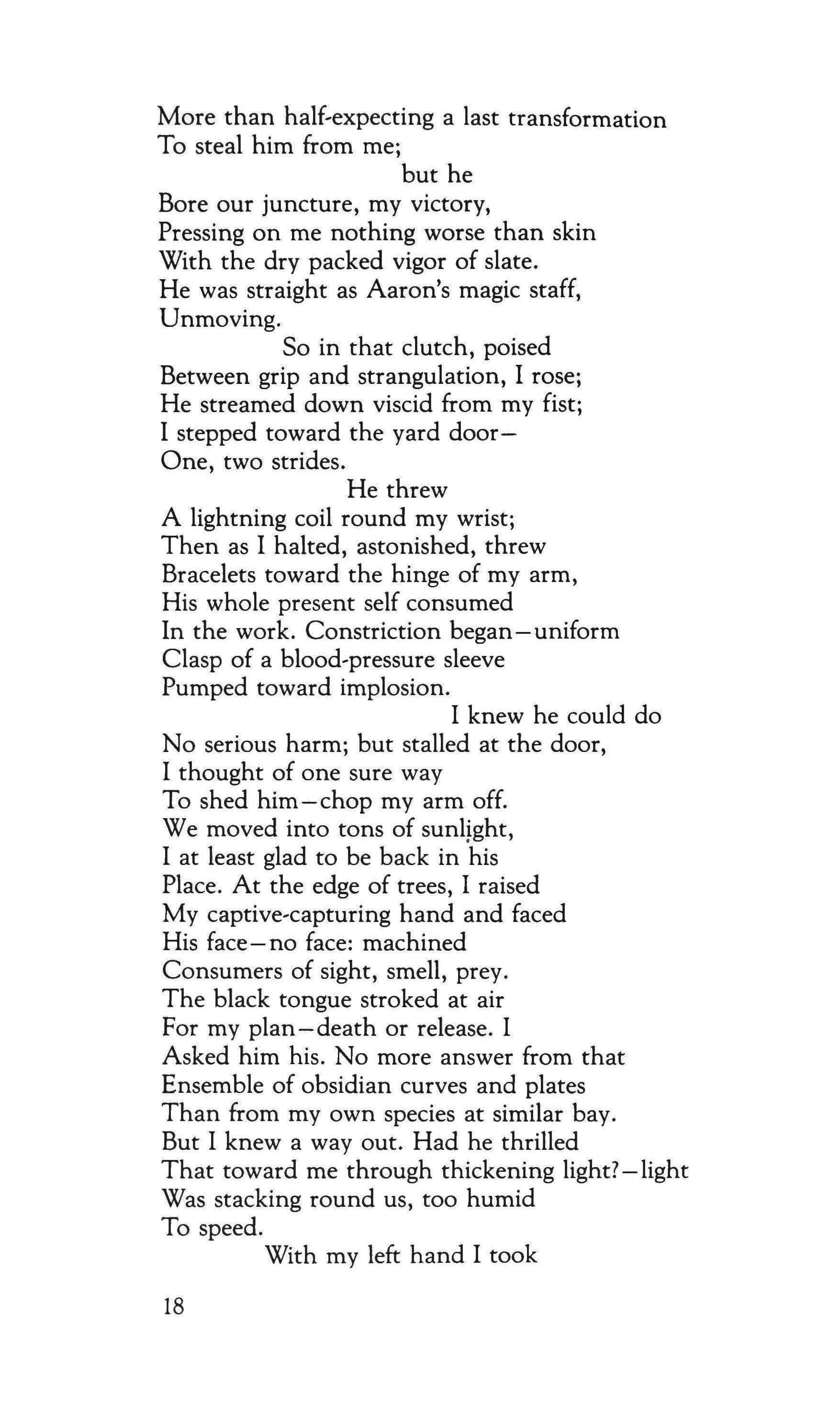
More than half-expecting a last transformation To steal him from me; but he Bore our juncture, my victory, Pressing on me nothing worse than skin With the dry packed vigor of slate. He was straight as Aaron's magic staff, Unmoving. So in that clutch, poised Between grip and strangulation, I rose; He streamed down viscid from my fist; I stepped toward the yard doorOne, two strides.
He threw
A lightning coil round my wrist; Then as I halted, astonished, threw Bracelets toward the hinge of my arm, His whole present self consumed In the work. Constriction began-uniform Clasp of a blood-pressure sleeve Pumped toward implosion.
I knew he could do
No serious harm; but stalled at the door, I thought of one sure way To shed him-chop my arm off. We moved into tons of sunljght, I at least glad to be back in his Place. At the edge of trees, I raised My captive-capturing hand and faced His face-no face: machined Consumers of sight, smell, prey. The black tongue stroked at air For my plan-death or release. I Asked him his. No more answer from that Ensemble of obsidian curves and plates
Than from my own species at similar bay. But I knew a way out. Had he thrilled That toward me through thickening light?-light Was stacking round us, too humid To speed.
With my left hand I took
18
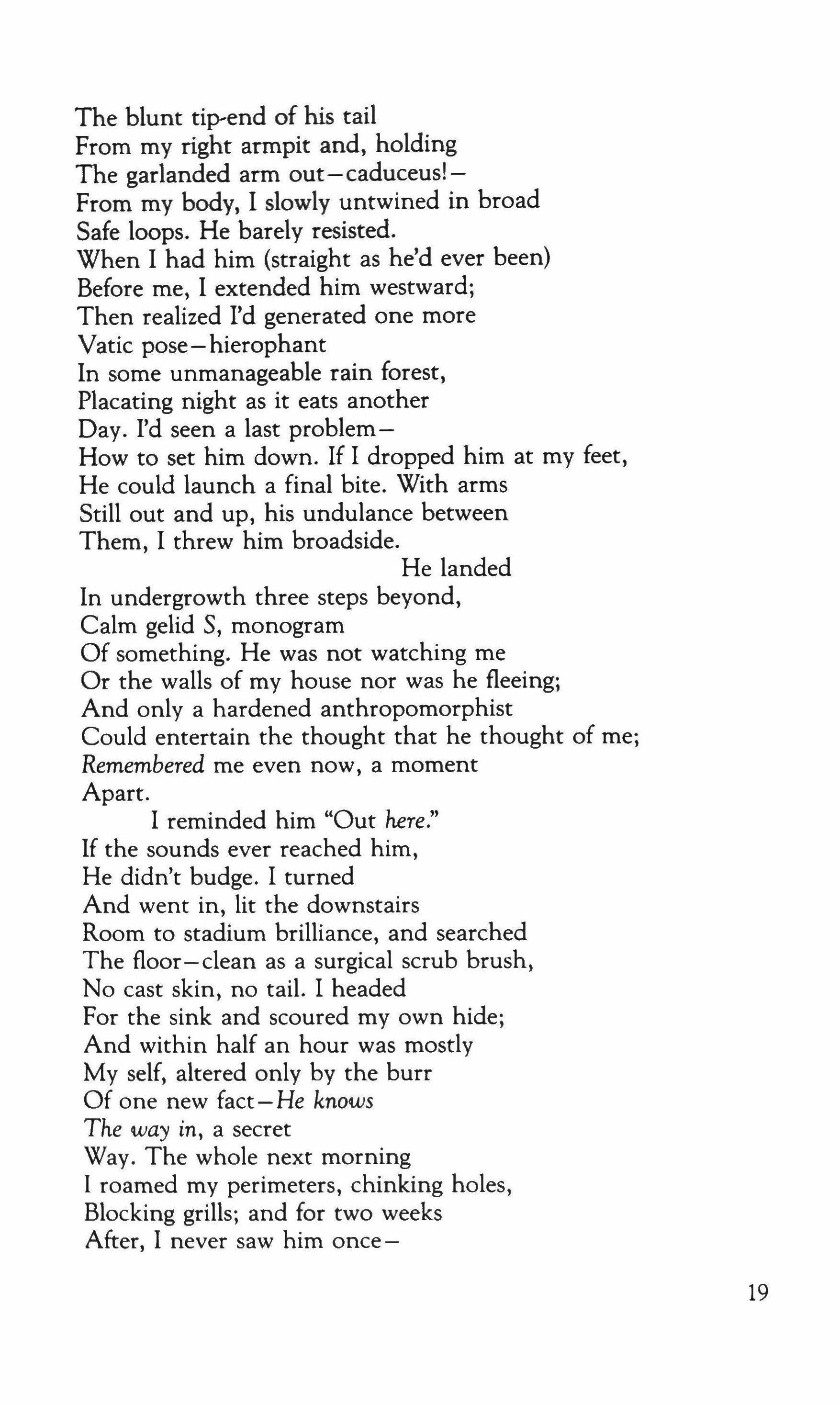
The blunt tip-end of his tail
From my right armpit and, holding The garlanded arm out - caduceus!From my body, I slowly untwined in broad Safe loops. He barely resisted. When I had him (straight as he'd ever been) Before me, I extended him westward; Then realized I'd generated one more Vatic pose-hierophant In some unmanageable rain forest, Placating night as it eats another Day. I'd seen a last problemHow to set him down. If I dropped him at my feet, He could launch a final bite. With arms
Still out and up, his undulance between Them, I threw him broadside. He landed
In undergrowth three steps beyond, Calm gelid S, monogram Of something. He was not watching me Or the walls of my house nor was he fleeing; And only a hardened anthropomorphist Could entertain the thought that he thought of me; Remembered me even now, a moment Apart.
I reminded him "Out here." If the sounds ever reached him, He didn't budge. I turned And went in, lit the downstairs Room to stadium brilliance, and searched The floor-clean as a surgical scrub brush, No cast skin, no tail. I headed For the sink and scoured my own hide; And within half an hour was mostly My self, altered only by the burr Of one new fact - He knows The way in, a secret Way. The whole next morning I roamed my perimeters, chinking holes, Blocking grills; and for two weeks After, I never saw him once-
19
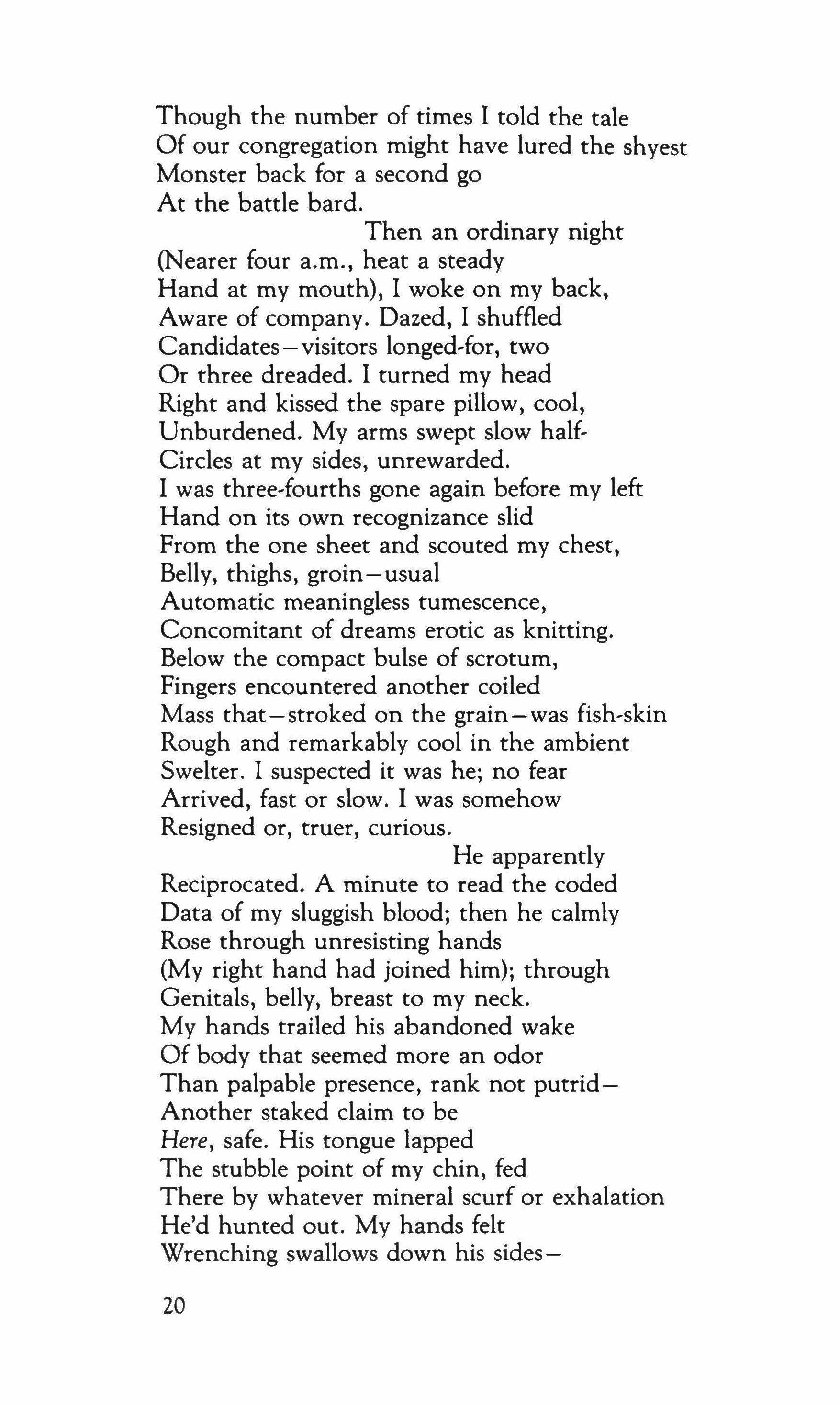
Though the number of times I told the tale Of our congregation might have lured the shyest Monster back for a second go At the battle bard.
Then an ordinary night (Nearer four a.m., heat a steady Hand at my mouth), I woke on my back, Aware of company. Dazed, I shuffled Candidates-visitors longed-for, two Or three dreaded. I turned my head Right and kissed the spare pillow, cool, Unburdened. My arms swept slow half, Circles at my sides, unrewarded. I was three-fourths gone again before my left Hand on its own recognizance slid From the one sheet and scouted my chest, Belly, thighs, groin-usual
Automatic meaningless tumescence, Concomitant of dreams erotic as knitting. Below the compact bulse of scrotum, Fingers encountered another coiled Mass that - stroked on the grain - was fish-skin Rough and remarkably cool in the ambient Swelter. I suspected it was he; no fear Arrived, fast or slow. I was somehow Resigned or, truer, curious.
He apparently Reciprocated. A minute to read the coded Data of my sluggish blood; then he calmly Rose through unresisting hands (My right hand had joined him); through Genitals, belly, breast to my neck. My hands trailed his abandoned wake Of body that seemed more an odor Than palpable presence, rank not putridAnother staked claim to be Here, safe. His tongue lapped The stubble point of my chin, fed There by whatever mineral scurf or exhalation He'd hunted out. My hands felt Wrenching swallows down his sides-
20
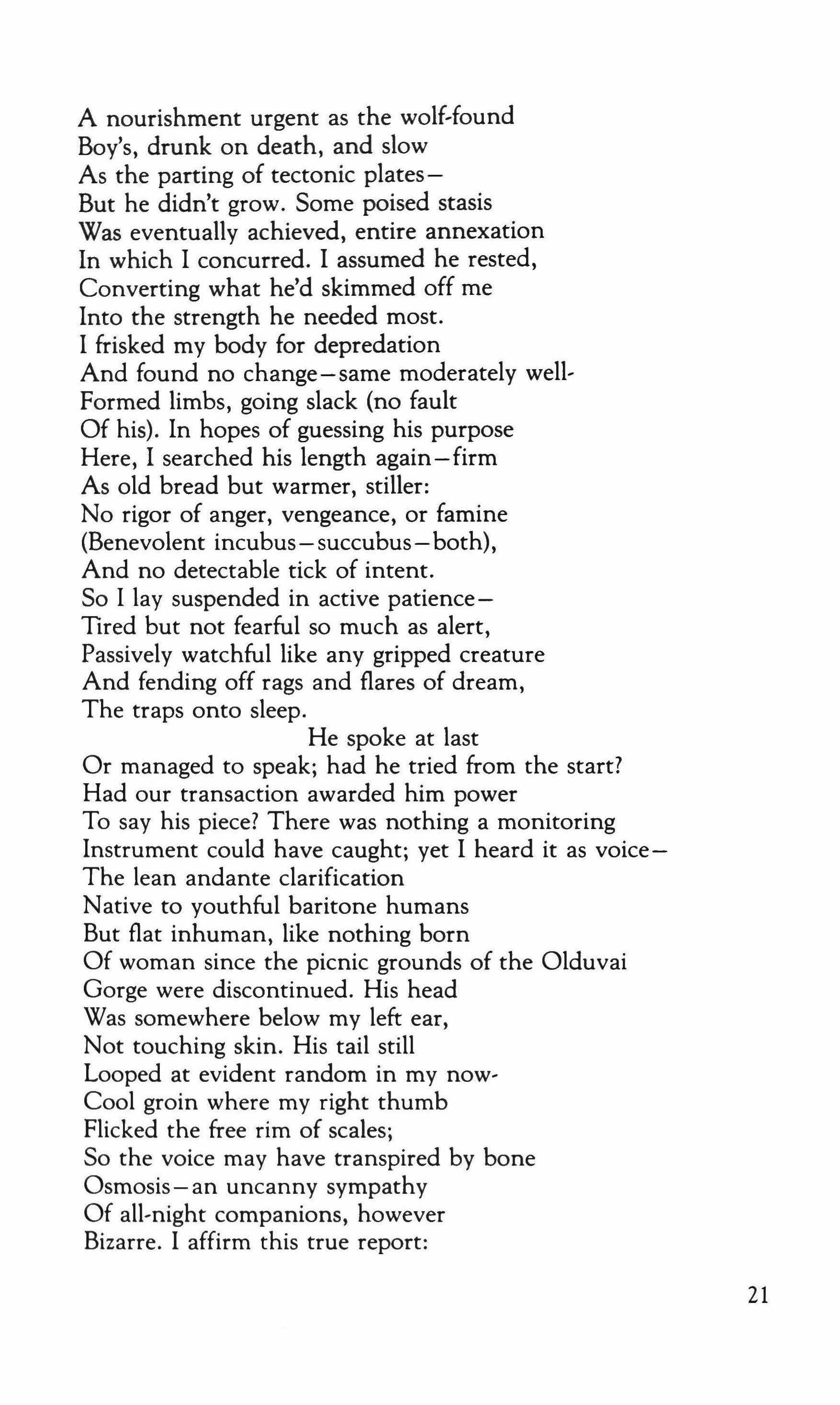
A nourishment urgent as the wolf-found Boy's, drunk on death, and slow As the parting of tectonic platesBut he didn't grow. Some poised stasis Was eventually achieved, entire annexation In which I concurred. I assumed he rested, Converting what he'd skimmed off me Into the strength he needed most. I frisked my body for depredation And found no change-same moderately well, Formed limbs, going slack (no fault Of his). In hopes of guessing his purpose Here, I searched his length again - firm As old bread but warmer, stiller: No rigor of anger, vengeance, or famine (Benevolent incubus-succubus-both), And no detectable tick of intent. So I lay suspended in active patienceTired but not fearful so much as alert, Passively watchful like any gripped creature And fending off rags and flares of dream, The traps onto sleep. He spoke at last Or managed to speak; had he tried from the start? Had our transaction awarded him power To say his piece? There was nothing a monitoring Instrument could have caught; yet I heard it as voiceThe lean andante clarification Native to youthful baritone humans But flat inhuman, like nothing born Of woman since the picnic grounds of the Olduvai Gorge were discontinued. His head Was somewhere below my left ear, Not touching skin. His tail still Looped at evident random in my now, Cool groin where my right thumb Flicked the free rim of scales; So the voice may have transpired by bone Osmosis-an uncanny sympathy Of all-night companions, however Bizarre. I affirm this true report:
21

"They watch you with interest After so many years. One of us has sampled You at least each year For the hours prescribed Of sleep and day, Employing the usual Sounding procedures; Instructed till now
To avoid detection. I alone failed But, since you spared me, Am sent back On sufferance
To meet your mercy With payment renderedThe essence we know, Having known you entirely (Your private titles, Precise destination, Balance to date.)
1 require permission, However; you are free To refuse receipt." I at once
Refused - who would bear his sentence an instant Early or from any mouth but the Certified Horse's Himself, enraged, and attended By seraphs congested with ire, not a renegade Egg-thief's, terror of wrens? And of all Things, I dozed then, drugged On awe.
Dawn-rare work-bound Cars on the road, my own mouth slimedI woke alone. Hands affirmed His absence; eyes gauged the room. Unaltered, spared-all but memory, Me. I replayed the theophany in fine Particular; and while I again weighed The chance that what I'd endured was retrograde Delusion (legacy of childhood days
22
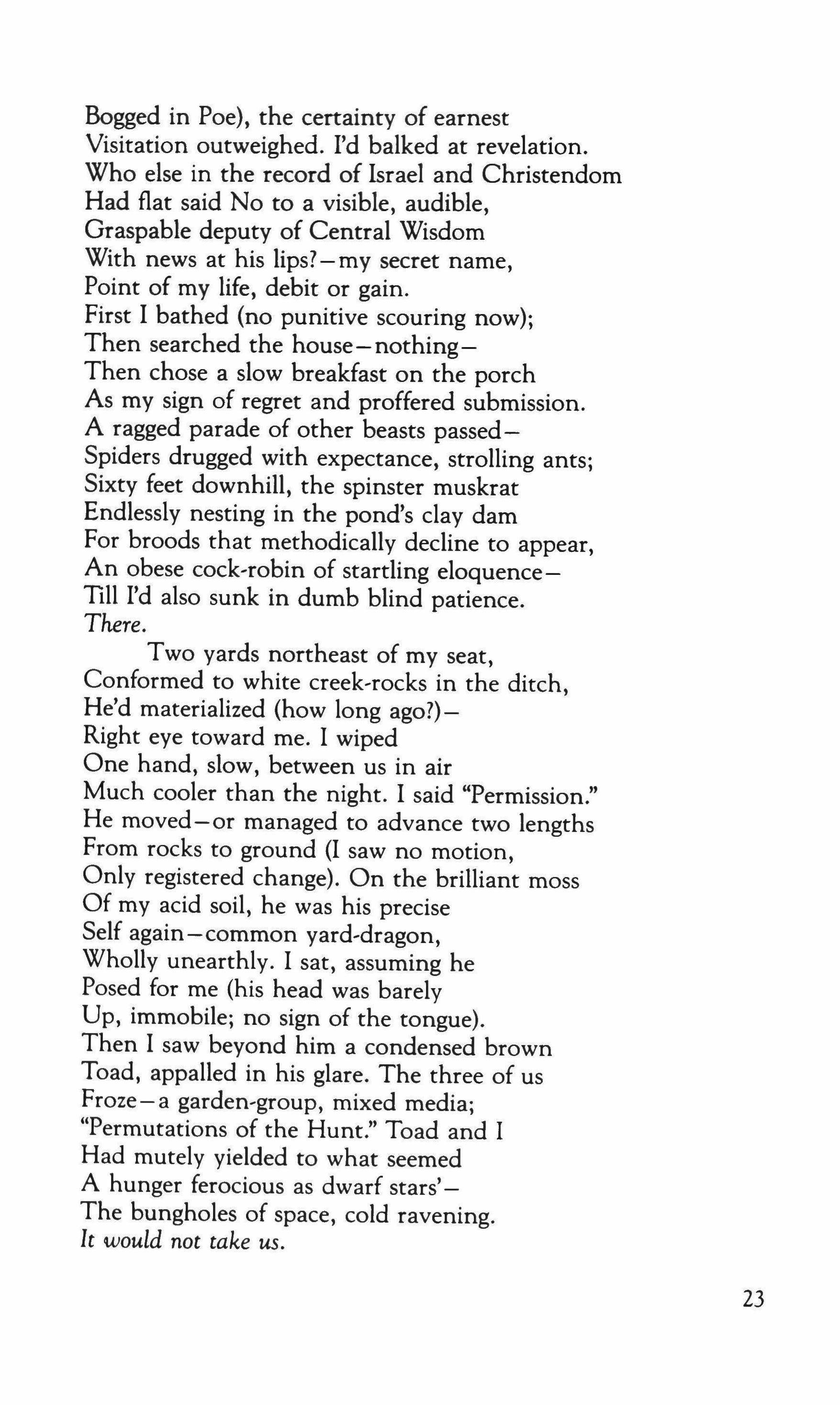
Bogged in Poe), the certainty of earnest Visitation outweighed. I'd balked at revelation. Who else in the record of Israel and Christendom Had flat said No to a visible, audible, Graspable deputy of Central Wisdom
With news at his lips? -my secret name, Point of my life, debit or gain. First I bathed (no punitive scouring now); Then searched the house - nothingThen chose a slow breakfast on the porch
As my sign of regret and proffered submission. A ragged parade of other beasts passedSpiders drugged with expectance, strolling ants; Sixty feet downhill, the spinster muskrat
Endlessly nesting in the pond's clay dam For broods that methodically decline to appear, An obese cock-robin of startling eloquenceTill I'd also sunk in dumb blind patience. There.
Two yards northeast of my seat, Conformed to white creek-rocks in the ditch, He'd materialized (how long ago?)-
Right eye toward me. I wiped One hand, slow, between us in air
Much cooler than the night. I said "Permission." He moved-or managed to advance two lengths From rocks to ground (I saw no motion, Only registered change). On the brilliant moss
Of my acid soil, he was his precise Self again-common yard-dragon, Wholly unearthly. 1 sat, assuming he Posed for me (his head was barely Up, immobile; no sign of the tongue).
Then 1 saw beyond him a condensed brown Toad, appalled in his glare. The three of us Froze-a garden-group, mixed media; "Permutations of the Hunt." Toad and I Had mutely yielded to what seemed A hunger ferocious as dwarf stars'The bungholes of space, cold ravening. It would not take us.
23
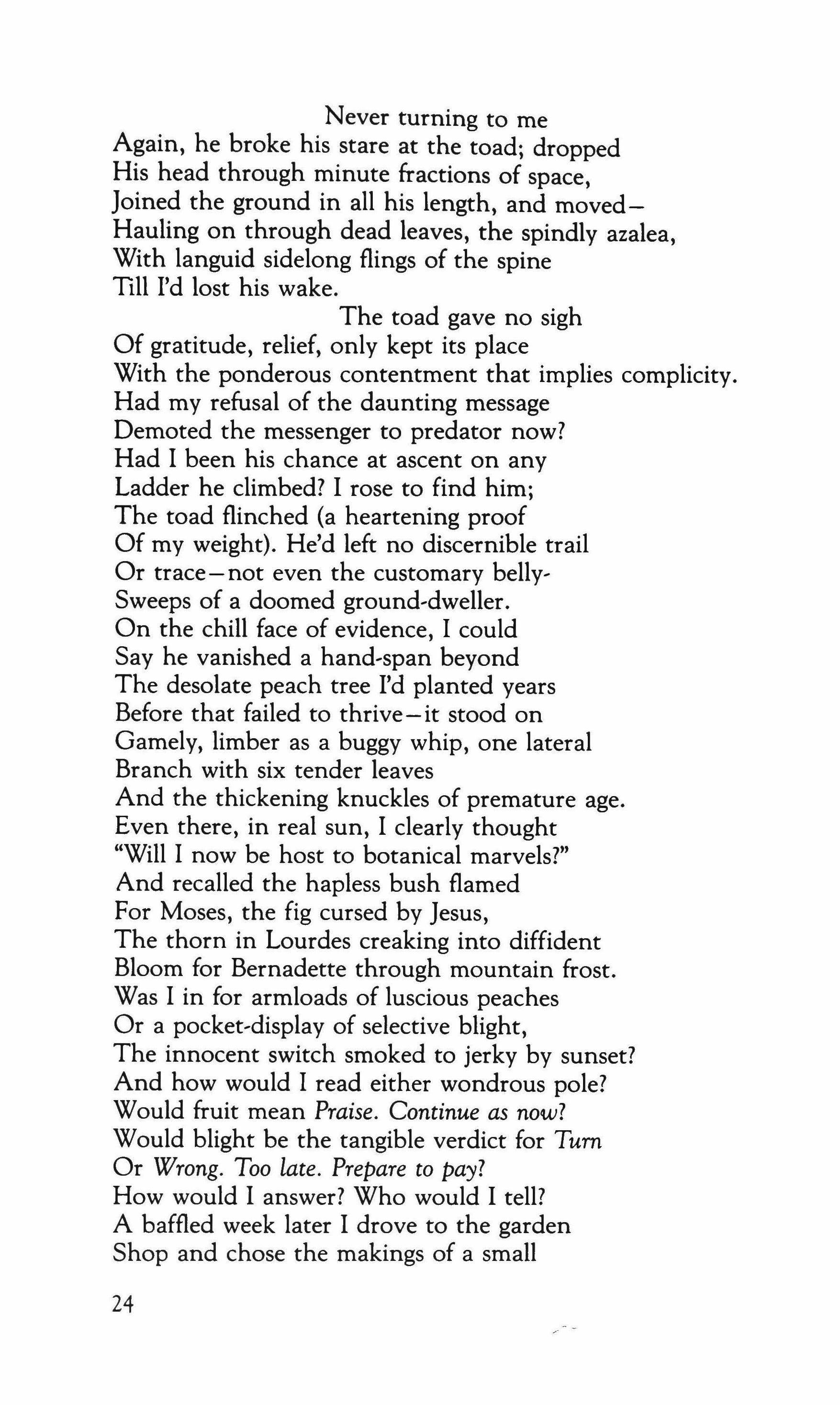
Never turning to me Again, he broke his stare at the toad; dropped His head through minute fractions of space, Joined the ground in all his length, and movedHauling on through dead leaves, the spindly azalea, With languid sidelong flings of the spine Till I'd lost his wake.
The toad gave no sigh Of gratitude, relief, only kept its place With the ponderous contentment that implies complicity. Had my refusal of the daunting message Demoted the messenger to predator now? Had I been his chance at ascent on any Ladder he climbed? I rose to find him; The toad flinched (a heartening proof Of my weight). He'd left no discernible trail Or trace-not even the customary bellySweeps of a doomed ground-dweller. On the chill face of evidence, I could Say he vanished a hand-span beyond The desolate peach tree I'd planted years Before that failed to thrive-it stood on Gamely, limber as a buggy whip, one lateral Branch with six tender leaves And the thickening knuckles of premature age. Even there, in real sun, I clearly thought "Will I now be host to botanical marvels?"
And recalled the hapless bush flamed For Moses, the fig cursed by Jesus, The thorn in Lourdes creaking into diffident Bloom for Bernadette through mountain frost. Was I in for armloads of luscious peaches Or a pocket-display of selective blight, The innocent switch smoked to jerky by sunset? And how would I read either wondrous pole? Would fruit mean Praise. Continue as now? Would blight be the tangible verdict for Turn Or Wrong. Too late. Prepare to pay? How would I answer? Who would I tell?
A baffled week later I drove to the garden Shop and chose the makings of a small
24

Commemoration - three dozen
Of the homeliest plants known to science, All succulents: stonecrop, echeveria, Aloes, sempervivums. The troll-woman Ringing my purchases said "You're not Expecting flowers from these?" I said "Flowers Never meant much to me." "Me
Either;' she whispered, "but that's a trade, Secret."
I promised silence and she warned me not To eat them, "though they look good enough." Home, I half-stripped; scooped A bowl in the unnourished earth By the peach, and set the green flesh
Of thirty,six low and blind, Faced lives at the mercy of the site of his exit.
They've flourished, yes, but nothing prodigiousWithin two years under light care
From me, they'd filled their bed: huddled And plump. Guests remark their oddness, Their sturdy pluck in prospering on ground Hospitable as sulfur. I offer no homily
On their local meaning, and no one's asked For usable cuttings. The peach tree's holding Its desperate own; I went once to move it But stopped myself-if it means anything, it means It in place (like ninety-eight percent of anything Radiant). Since I live by a pond and its draining Creek, I've met other snakes fairly often
In the time. Mostly harmless-red rat snakes, King snakes, garters - they're asking only for sunning, Space athwart my drive and the excess Lesser reptilia to eat. Two weeks Ago, I came on a large king Resting at the chore of consuming a slightly Thinner king-four inches of the vanquished Neck were still free, apparently Serene as a griddled saint - but the few
25
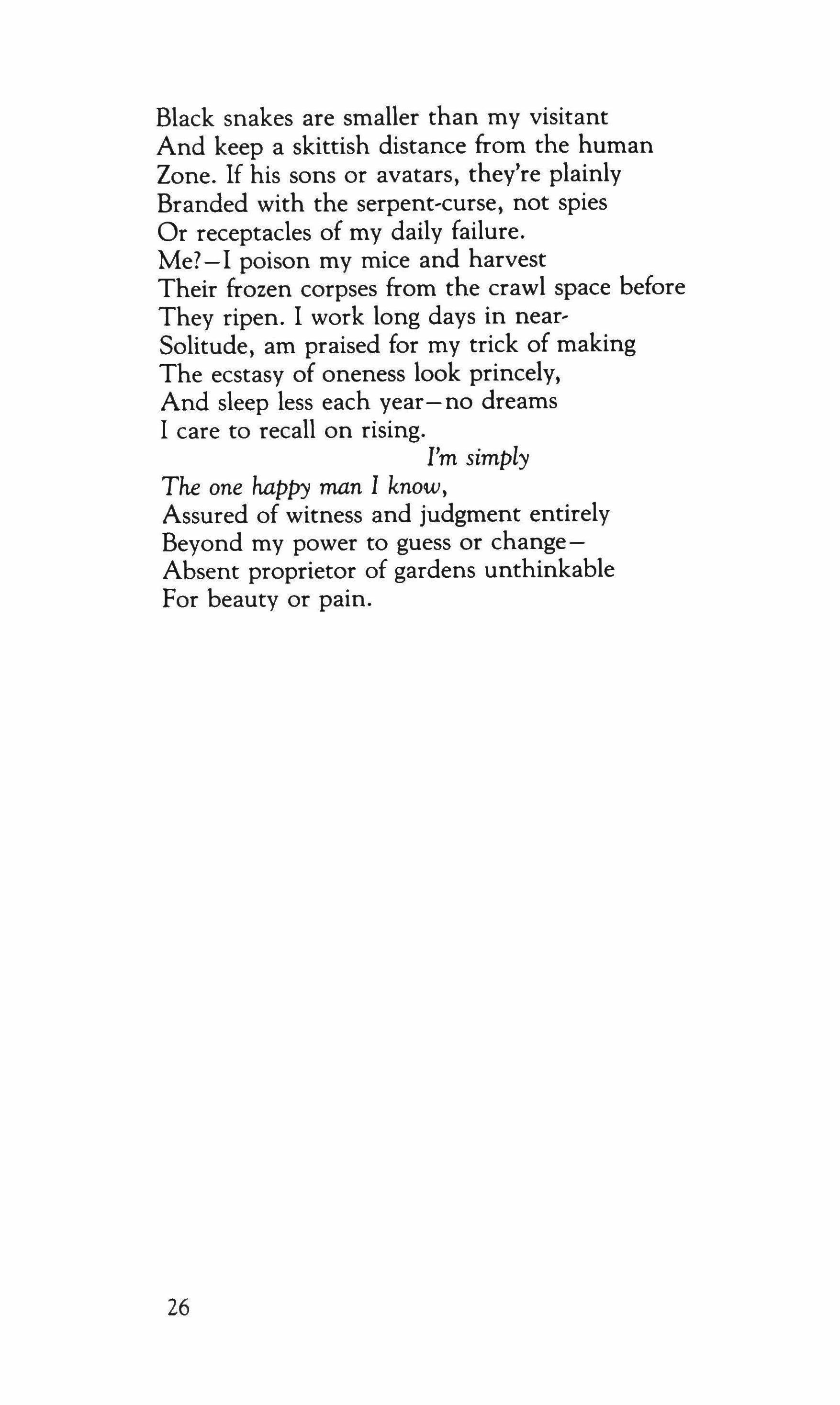
Black snakes are smaller than my visitant And keep a skittish distance from the human Zone. If his sons or avatars, they're plainly Branded with the serpent-curse, not spies Or receptacles of my daily failure. Me? - I poison my mice and harvest Their frozen corpses from the crawl space before They ripen. I work long days in nearSolitude, am praised for my trick of making The ecstasy of oneness look princely, And sleep less each year-no dreams I care to recall on rising.
I'm simply
The one happy man I know, Assured of witness and judgment entirely Beyond my power to guess or changeAbsent proprietor of gardens unthinkable For beauty or pain.
26
The Chandelier
Gregory Orfalea

Mukhlis drives up Asbury Street in Pasadena and brings his green Buick to an easy, slow stop underneath the largest flowering eucalyptus in southern California. The first door cracked is that of his wife, Wardi, who gets out as she has every week for the past forty years, as if she were with child. She has not been with child for many years, but her body at center is like the large burl of a cedar and her legs are bowed as an old chair's. Mukhlis emerges from the Buick. He looks left and right for cars-a short, searing look either way. And the sun tries to plant its white seed on the center of his bald head.
Mukhlis has made a small fortune in real estate. He has apartment complexes here and there in the city, and many of his tenants are black or brown. He himself is brown, or rather almond, and his eyes, like those of many Lebanese and Syrians, are blue. He owes this hue to the Crusaders. A continent man, Mukhlis' eyes are the last blue twinkle of a distant lust.
What words there are to say, Mukhlis rarely says. His eyes and body speak - a body made to withstand. As he ascends the steps of his sister's home, the collar of his gray suit pulls taut around his neck. And his neck has the thickness of a foundation post; it welds his head to the shoulders. For years it has been bronzed by the sun. So tight is the tie and collar around his neck that his nape stands up in a welt of muscle. It is not a fat neck - nothing about the man is fat, save a slight bulge to his belly, brought on, no doubt, by forty years of Wardi's desserts, among the finest Arabic delights in Los Angeles. Mukhlis has learned it is useless to compliment her because Wardi (Rose, in English), like most Arabs, does not react to compliments; she prefers to go to great lengths to pay a compliment, instead. But not Mukhlis. He says not two crooked words about Wardi's knafi, the bird's nest whose wafer-like shell must be rolled with the patience of Job before it is filled with pistachios
27
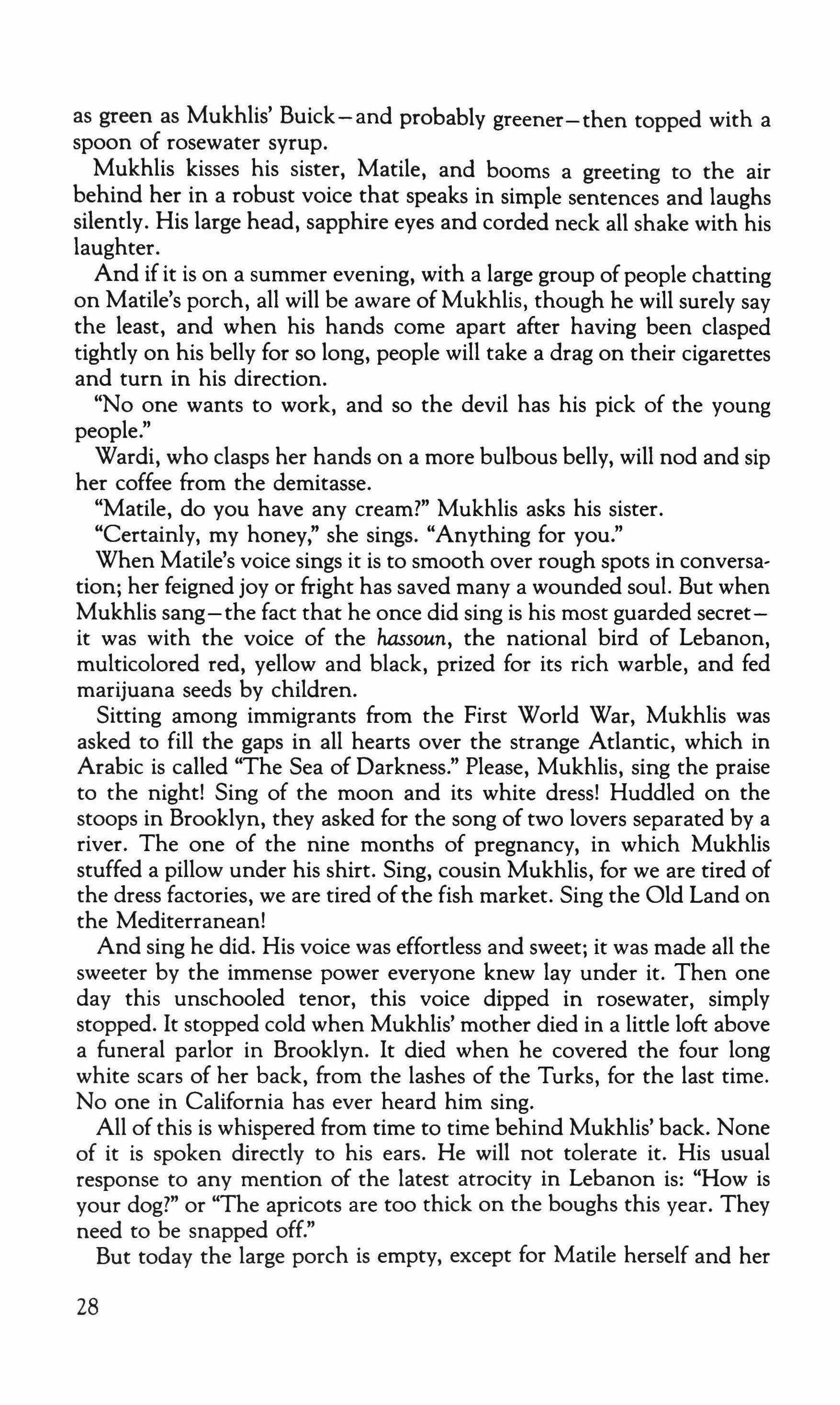
as green as Mukhlis' Buick-and probably greener-then topped with a spoon of rosewater syrup.
Mukhlis kisses his sister, Matile, and booms a greeting to the air behind her in a robust voice that speaks in simple sentences and laughs silently. His large head, sapphire eyes and corded neck all shake with his laughter.
And if it is on a summer evening, with a large group ofpeople chatting on Matile's porch, all will be aware of Mukhlis, though he will surely say the least, and when his hands come apart after having been clasped tightly on his belly for so long, people will take a drag on their cigarettes and turn in his direction.
"No one wants to work, and so the devil has his pick of the young people."
Wardi, who clasps her hands on a more bulbous belly, will nod and sip her coffee from the demitasse.
"Matile, do you have any cream?" Mukhlis asks his sister.
"Certainly, my honey," she sings. "Anything for you."
When Matile's voice sings it is to smooth over rough spots in conversation; her feigned joy or fright has saved many a wounded soul. But when Mukhlis sang-the fact that he once did sing is his most guarded secretit was with the voice of the hassoun, the national bird of Lebanon, multicolored red, yellow and black, prized for its rich warble, and fed marijuana seeds by children.
Sitting among immigrants from the First World War, Mukhlis was asked to fill the gaps in all hearts over the strange Atlantic, which in Arabic is called "The Sea of Darkness." Please, Mukhlis, sing the praise to the night! Sing of the moon and its white dress! Huddled on the stoops in Brooklyn, they asked for the song of two lovers separated by a river. The one of the nine months of pregnancy, in which Mukhlis stuffed a pillow under his shirt. Sing, cousin Mukhlis, for we are tired of the dress factories, we are tired ofthe fish market. Sing the Old Land on the Mediterranean!
And sing he did. His voice was effortless and sweet; it was made all the sweeter by the immense power everyone knew lay under it. Then one day this unschooled tenor, this voice dipped in rosewater, simply stopped. It stopped cold when Mukhlis' mother died in a little loft above a funeral parlor in Brooklyn. It died when he covered the four long white scars of her back, from the lashes of the Turks, for the last time. No one in California has ever heard him sing.
All of this is whispered from time to time behind Mukhlis' back. None of it is spoken directly to his ears. He will not tolerate it. His usual response to any mention of the latest atrocity in Lebanon is: "How is your dog?" or "The apricots are too thick on the boughs this year. They need to be snapped off."
But today the large porch is empty, except for Matile herself and her
28

oldest grandson, Mukhlis' great-nephew. This young man has been traveling for years. He is a restless soul, thinks Mukhlis, as they take their places on the porch - he on the legless couch, his wife on a white wrought-iron chair with a pillow of faded flowers made by Matile. The great-nephew takes to the old iron swing. What is it about this day? Mukhlis says to himself, noticing a vine in the yard. The wind is hurting the grape leaves.
Matile brings a tray of coffee and announces dinner is not too far off, and all must stay.
"It is never too far off with you, Matile," Mukhlis says, blowing over the coffee.
"You must stay," she sings. "I am making stuffed zucchini."
"Never mind," he says. "Have you got a ghrabi?"
"Ghrabi?" Matile stands so quickly she leaves her black shoes. And goes into a litany of food that last five minutes.
"No, no, no," Mukhlis punctuates each breathless pause in her list. "Ghrabi - just give me one."
"One!" she cries. "I have a hundred."
"One, please, is all I want."
She brings a dish piled high with the small hoops of butter, sugar and dough, each with a mole or two of pistachio.
"Eat:' she says.
Wardi takes one. Mukhlis shakes his head and breaks off half a ghrabi.
"Isn't that delicious?" Matile asks, preempting the compliment. Mukhlis chews. "You look real good today," she smiles with a brightened face, disregarding his nodding. Mukhlis turns to the young man.
"And so, what are you doing here?"
"Looking for work," says the great-nephew, a dark, slender fellow with broad shoulders. These eyes of his, Mukhlis thinks, have a dark sparkle. He's cried and laughed too much for his age; his laugh is a cry and his cry is a laugh.
"It's time for you to get serious and stop this wandering and get a good job in business:' Mukhlis says rather loudly.
"You are playing with your life. When are you going to get married?"
Mukhlis gleams his crocodile smile and laughs silently. Then he becomes solemn, and touches the pistachio on a ghrabi with a thick forefinger, taps it several times, then removes it.
"Aren't you ever really hungry, Uncle Mukhlis?"
The old realtor looks out past the stanchions of the porch, past the thickened apricots.
"Boy, have you ever seen a person eat an orange peel?"
"I've eaten them myself. They're quite good."
"No, no, boy. I mean rotten orange peels, with mud and dung on them. Have you had that?"
The great-nephew purses his lips.
29
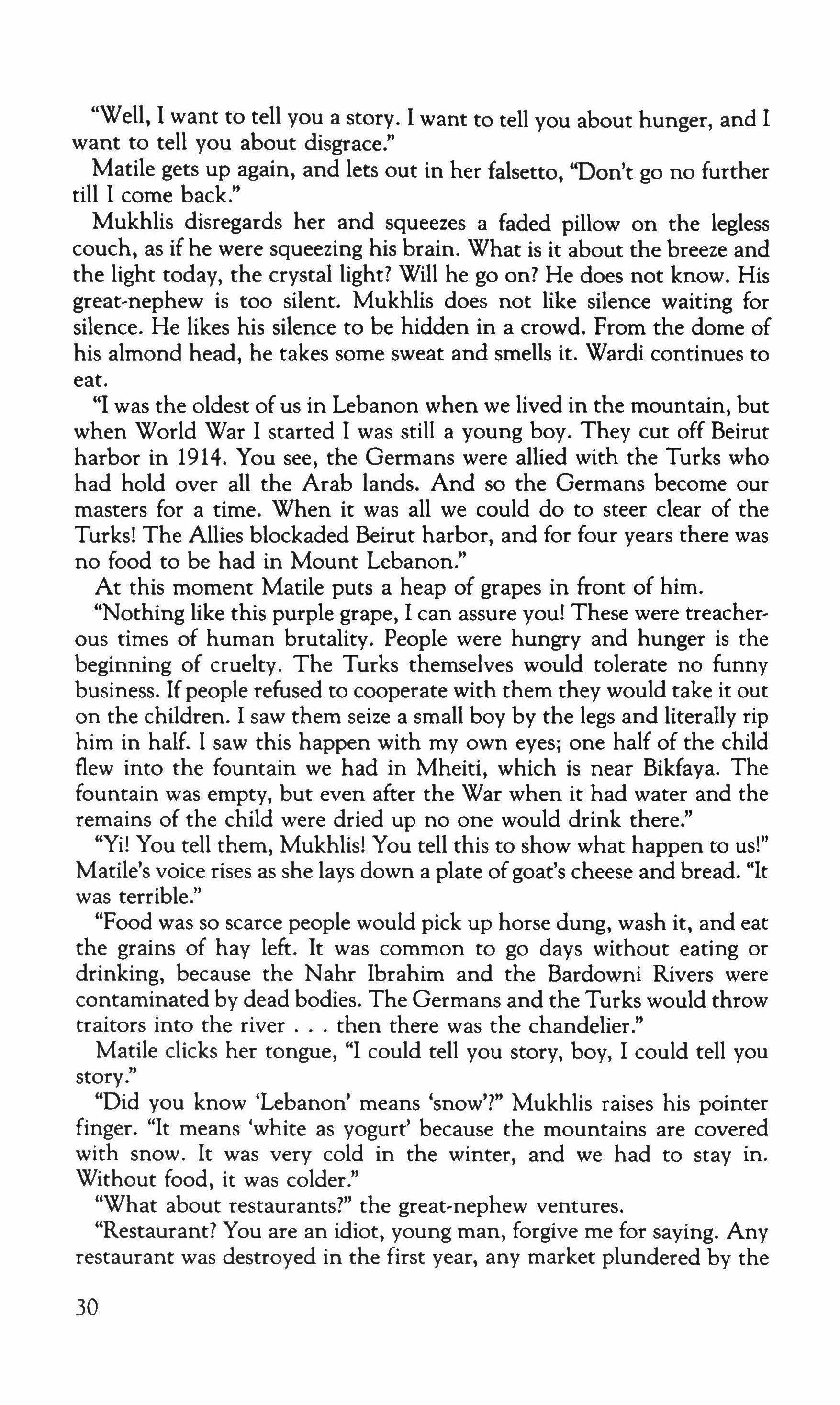
"Well, I want to tell you a story. I want to tell you about hunger, and I want to tell you about disgrace."
Matile gets up again, and lets out in her falsetto, "Don't go no further till I come back."
Mukhlis disregards her and squeezes a faded pillow on the legless couch, as if he were squeezing his brain. What is it about the breeze and the light today, the crystal light? Will he go on? He does not know. His great-nephew is too silent. Mukhlis does not like silence waiting for silence. He likes his silence to be hidden in a crowd. From the dome of his almond head, he takes some sweat and smells it. Wardi continues to eat.
"I was the oldest of us in Lebanon when we lived in the mountain, but when World War I started I was still a young boy. They cut off Beirut harbor in 1914. You see, the Germans were allied with the Turks who had hold over all the Arab lands. And so the Germans become our masters for a time. When it was all we could do to steer clear of the Turks! The Allies blockaded Beirut harbor, and for four years there was no food to be had in Mount Lebanon."
At this moment Matile puts a heap of grapes in front of him.
"Nothing like this purple grape, I can assure you! These were treacherous times of human brutality. People were hungry and hunger is the beginning of cruelty. The Turks themselves would tolerate no funny business. Ifpeople refused to cooperate with them they would take it out on the children. I saw them seize a small boy by the legs and literally rip him in half. I saw this happen with my own eyes; one half of the child flew into the fountain we had in Mheiti, which is near Bikfaya. The fountain was empty, but even after the War when it had water and the remains of the child were dried up no one would drink there."
"Yi! You tell them, Mukhlis! You tell this to show what happen to us!" Matile's voice rises as she lays down a plate ofgoat's cheese and bread. "It was terrible."
"Food was so scarce people would pick up horse dung, wash it, and eat the grains of hay left. It was common to go days without eating or drinking, because the Nahr Ibrahim and the Bardowni Rivers were contaminated by dead bodies. The Germans and the Turks would throw traitors into the river then there was the chandelier."
Matile clicks her tongue, "I could tell you story, boy, I could tell you story."
"Did you know 'Lebanon' means 'snow'?" Mukhlis raises his pointer finger. "It means 'white as yogurt' because the mountains are covered with snow. It was very cold in the winter, and we had to stay in. Without food, it was colder."
"What about restaurants?" the great-nephew ventures.
"Restaurant? You are an idiot, young man, forgive me for saying. Any restaurant was destroyed in the first year, any market plundered by the
30
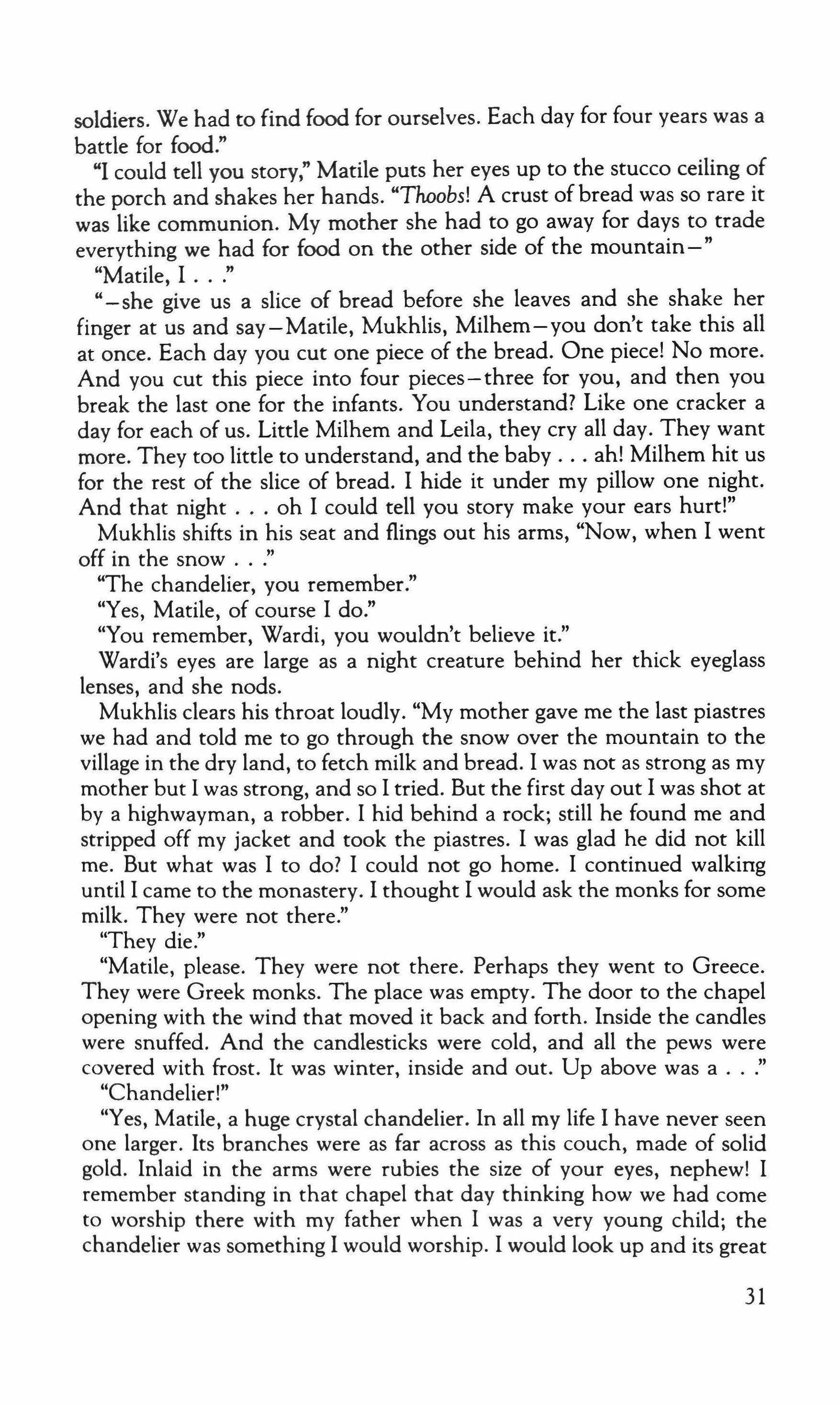
soldiers. We had to find food for ourselves. Each day for four years was a battle for food."
"I could tell you story," Matile puts her eyes up to the stucco ceiling of the porch and shakes her hands. "Thoobs! A crust ofbread was so rare it was like communion. My mother she had to go away for days to trade everything we had for food on the other side of the mountain -
"Matile, 1 " - she give us a slice of bread before she leaves and she shake her finger at us and say-Matile, Mukhlis, Milhem-you don't take this all at once. Each day you cut one piece of the bread. One piece! No more. And you cut this piece into four pieces-three for you, and then you break the last one for the infants. You understand? Like one cracker a day for each of us. Little Milhem and Leila, they cry all day. They want more. They too little to understand, and the baby ah! Milhem hit us for the rest of the slice of bread. 1 hide it under my pillow one night. And that night oh 1 could tell you story make your ears hurt!"
Mukhlis shifts in his seat and flings out his arms, "Now, when 1 went off in the snow ."
"The chandelier, you remember."
"Yes, Matile, of course 1 do."
"You remember, Wardi, you wouldn't believe it."
Wardi's eyes are large as a night creature behind her thick eyeglass lenses, and she nods.
Mukhlis clears his throat loudly. "My mother gave me the last piastres we had and told me to go through the snow over the mountain to the village in the dry land, to fetch milk and bread. I was not as strong as my mother but I was strong, and so I tried. But the first day out I was shot at by a highwayman, a robber. I hid behind a rock; still he found me and stripped off my jacket and took the piastres. I was glad he did not kill me. But what was I to do? I could not go home. I continued walking until I came to the monastery. I thought I would ask the monks for some milk. They were not there."
"They die."
"Matile, please. They were not there. Perhaps they went to Greece. They were Greek monks. The place was empty. The door to the chapel opening with the wind that moved it back and forth. Inside the candles were snuffed. And the candlesticks were cold, and all the pews were covered with frost. It was winter, inside and out. Up above was a "Chandelier!"
"Yes, Matile, a huge crystal chandelier. In all my life I have never seen one larger. Its branches were as far across as this couch, made of solid gold. Inlaid in the arms were rubies the size of your eyes, nephew! I remember standing in that chapel that day thinking how we had corne to worship there with my father when I was a very young child; the chandelier was something I would worship. I would look up and its great
31

shining light would say to me-God. This is your God, Mukhlis, here on Mount Lebanon. He brims with light and He will sit in your eyes, in your dreams. I had never thought of touching it. For one thing, it was too high. It was at least fifteen feet above my head. Well, so help the Almighty, I was hungry. And my mother was hungry. And so were my brothers and my sisters. And we had not heard from our father, who was in America, for two years. Before God and man, I committed a sacrilege. The mosaics, you see, on the wall were shot out and in tatters. I crawled up the wall where the tile was gone. I crawled up that mosaic until I made it to the crossbeams of the ceiling. And I had to be very careful not to knock loose the mosaic where I was hanging-a mosaic of Our Lady it was, and who knows? Maybe my foot was in her mouth."
"How sad!" sighs Marile.
"But I hoisted myself onto the crossbeam and slid-like this, yes-slid across the beam. It was cold enough to hold my hands fast as I tried to balance. But finally I made it out over the nave of the chapel, to the chandelier."
"Yi!"
"The chandelier was held to the ceiling with tall iron nails. Carefully, carefully I put my hands through the crystal teardrops, to latch onto the gold arms. And then you know what I did, young man? I became a monkey. I swung free on that chandelier! I pulled up and heaved down on it, trying to loosen it. I yanked and yanked with the crystal hitting my eyes and the rubies sweating in my hands. And I swung back and forth in the cold air. For a long time the chandelier would not loosen. It seemed like God Himself was holding onto the chandelier through the ceiling and saying to me: No you don't, Mukhlis! You do not take the chandelier from this church. This is mine, Mukhlis. This chandelier was given to the worship of the Almighty. And youyou are a puny human being who deserves to rot in hell for this.
"I am not talking about playing in the acacias. I am not talking about swinging about from those miserable apricot trees, which need to be cut back by the way, Matile,"
"Anything you say, my honey."
"I am talking about a tree of crystal and gold. I am talking about food."
"Wardi, would you like more coffee, dear?"
"Matile, I am talking about food."
"So am I!"
Wardi's enlarged eyes close and her big bosom vibrates with mirth, like a dreaming horse.
"Oh it's useless. Why talk about it?" Mukhlis folds his hands, as if to tie up the story once and for all and leave everyone hanging on the chandelier.
Matile speaks with alarm: "Please, tell them, tell them. I won't get up
32

no more. This is story you never heard the like of before. It can't be no worse!"
Mukhlis gets up, paces on the clay porch, and goes over to the apricot, breaking off a branch crowded with fruit.
"Here, Matile, here is your dessert," he spits and continues, still stand, ing. "Finally, I heard it come loose. The plaster dust rained on my face and I heaved on this chandelier one more time. And then I fell."
Mukhlis raises his thick forearms and grips the air.
"It breaks, ah!"
"No, Matile, it does not break. Please, you are killing my story at every juncture."
She laughs and gets up for some rice pudding that is cooling in the refrigerator.
"I fall with it. I fall with it and I fall directly on my rump. This is why I walk slowly to this day, young man. Because of the chandelier. That chandelier had to become milk. It was going to save my life, our lives. What did my bones mean? Nothing. But I was a tough young fellownot like you soft people today - and not one teardrop of that crystal was scratched. I got up, and my hip was partially cracked. But I got up. I carried the chandelier to the entrance of the church. No one was around. No one saw me do it."
"God finally let go?" the great-nephew asks, with a smirk.
"God never lets go. I yanked it out of His hands. But I could not carry the chandelier far-it weighed a ton. In the vestibule of the chapel was a small Oriental rug. I placed the chandelier on top of that, took the cord of chain, tied it around the branches of gold, and dragged the whole mess out into the snow. No, Matile, no rice pudding. For the next three days, I dragged the chandelier over the snow to get to the village over the mountain in the hot land of the Bekaa. For three days I walked and pulled it behind me."
Mukhlis stops and wipes his brow. He is sweating heavily now, even though the California air is dry.
"I was exhausted by the end of the first day. I lay down in the snow by a cedar. I did not want to damage the chandelier, so I left it on the rug and tried to sleep on the snow with as much of my body as I could against the cedar. I was so tired and fell fast asleep."
"Did you dream?" asks the great-nephew, taking a spoonful of the sweet rice pudding.
"I don't remember. No, I don't dream. Dreams are for soft times," Mukhlis grunts. "You've dropped some pudding." His listener takes up the white spot on the porch with a finger. For a while Mukhlis says nothing, and listens to them eating. His blue eyes stare out into the warm air past the apricots, past the flowering eucalyptus, to the cloud, less sky.
"I awoke to the sound of licking in the dark. I felt warm breath near
33
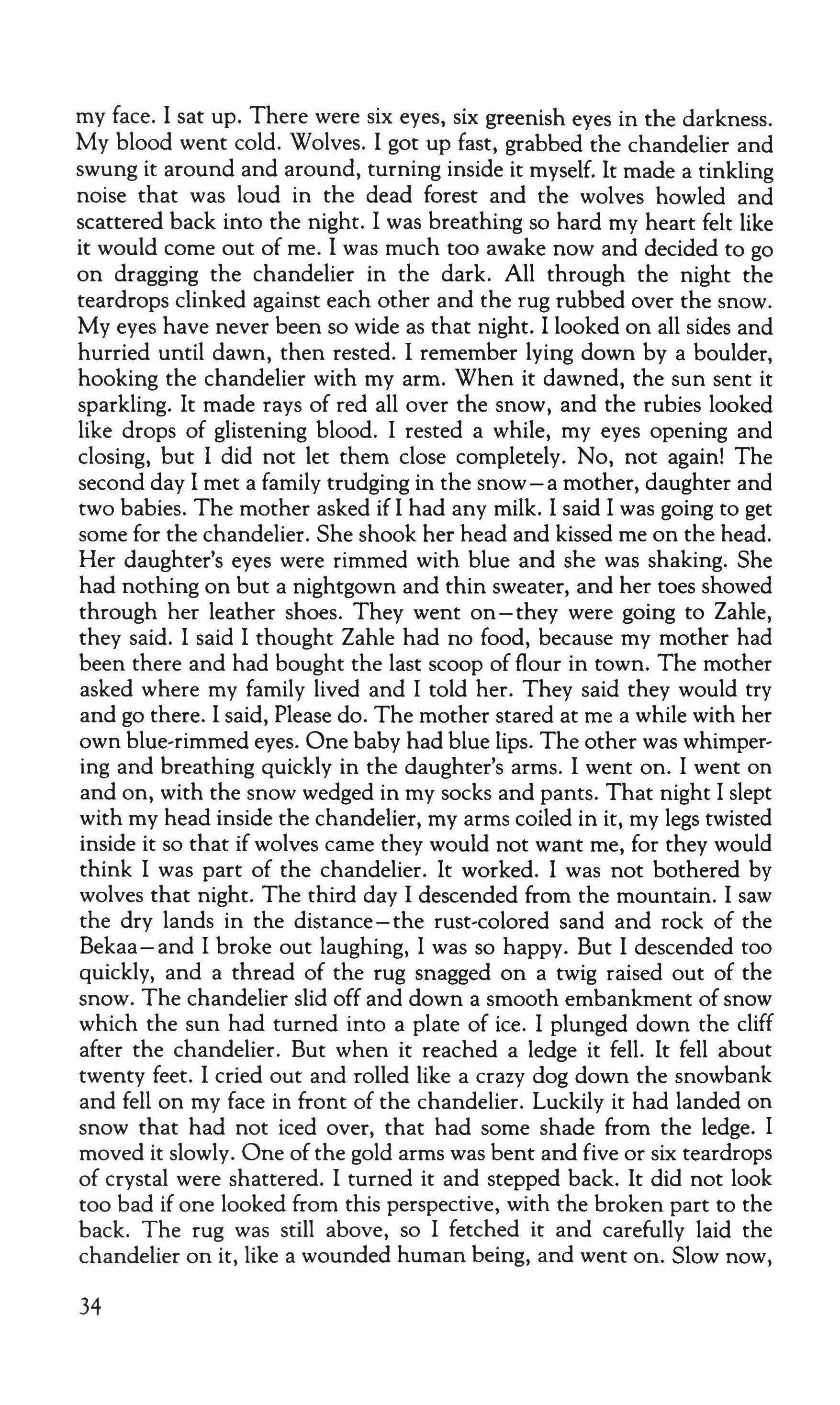
my face. I sat up. There were six eyes, six greenish eyes in the darkness. My blood went cold. Wolves. I got up fast, grabbed the chandelier and swung it around and around, turning inside it myself. It made a tinkling noise that was loud in the dead forest and the wolves howled and scattered back into the night. I was breathing so hard my heart felt like it would come out of me. I was much too awake now and decided to go on dragging the chandelier in the dark. All through the night the teardrops clinked against each other and the rug rubbed over the snow. My eyes have never been so wide as that night. I looked on all sides and hurried until dawn, then rested. I remember lying down by a boulder, hooking the chandelier with my arm. When it dawned, the sun sent it sparkling. It made rays of red all over the snow, and the rubies looked like drops of glistening blood. I rested a while, my eyes opening and closing, but I did not let them close completely. No, not again! The second day I met a family trudging in the snow-a mother, daughter and two babies. The mother asked if I had any milk. I said I was going to get some for the chandelier. She shook her head and kissed me on the head. Her daughter's eyes were rimmed with blue and she was shaking. She had nothing on but a nightgown and thin sweater, and her toes showed through her leather shoes. They went on-they were going to Zahle, they said. I said I thought Zahle had no food, because my mother had been there and had bought the last scoop of flour in town. The mother asked where my family lived and I told her. They said they would try and go there. I said, Please do. The mother stared at me a while with her own blue-rimmed eyes. One baby had blue lips. The other was whimpering and breathing quickly in the daughter's arms. I went on. I went on and on, with the snow wedged in my socks and pants. That night I slept with my head inside the chandelier, my arms coiled in it, my legs twisted inside it so that if wolves came they would not want me, for they would think I was part of the chandelier. It worked. I was not bothered by wolves that night. The third day I descended from the mountain. I saw the dry lands in the distance-the rust-colored sand and rock of the Bekaa-and I broke out laughing, I was so happy. But I descended too quickly, and a thread of the rug snagged on a twig raised out of the snow. The chandelier slid off and down a smooth embankment of snow which the sun had turned into a plate of ice. I plunged down the cliff after the chandelier. But when it reached a ledge it fell. It fell about twenty feet. I cried out and rolled like a crazy dog down the snowbank and fell on my face in front of the chandelier. Luckily it had landed on snow that had not iced over, that had some shade from the ledge. I moved it slowly. One ofthe gold arms was bent and five or six teardrops of crystal were shattered. I turned it and stepped back. It did not look too bad if one looked from this perspective, with the broken part to the back. The rug was still above, so I fetched it and carefully laid the chandelier on it, like a wounded human being, and went on. Slow now,
34
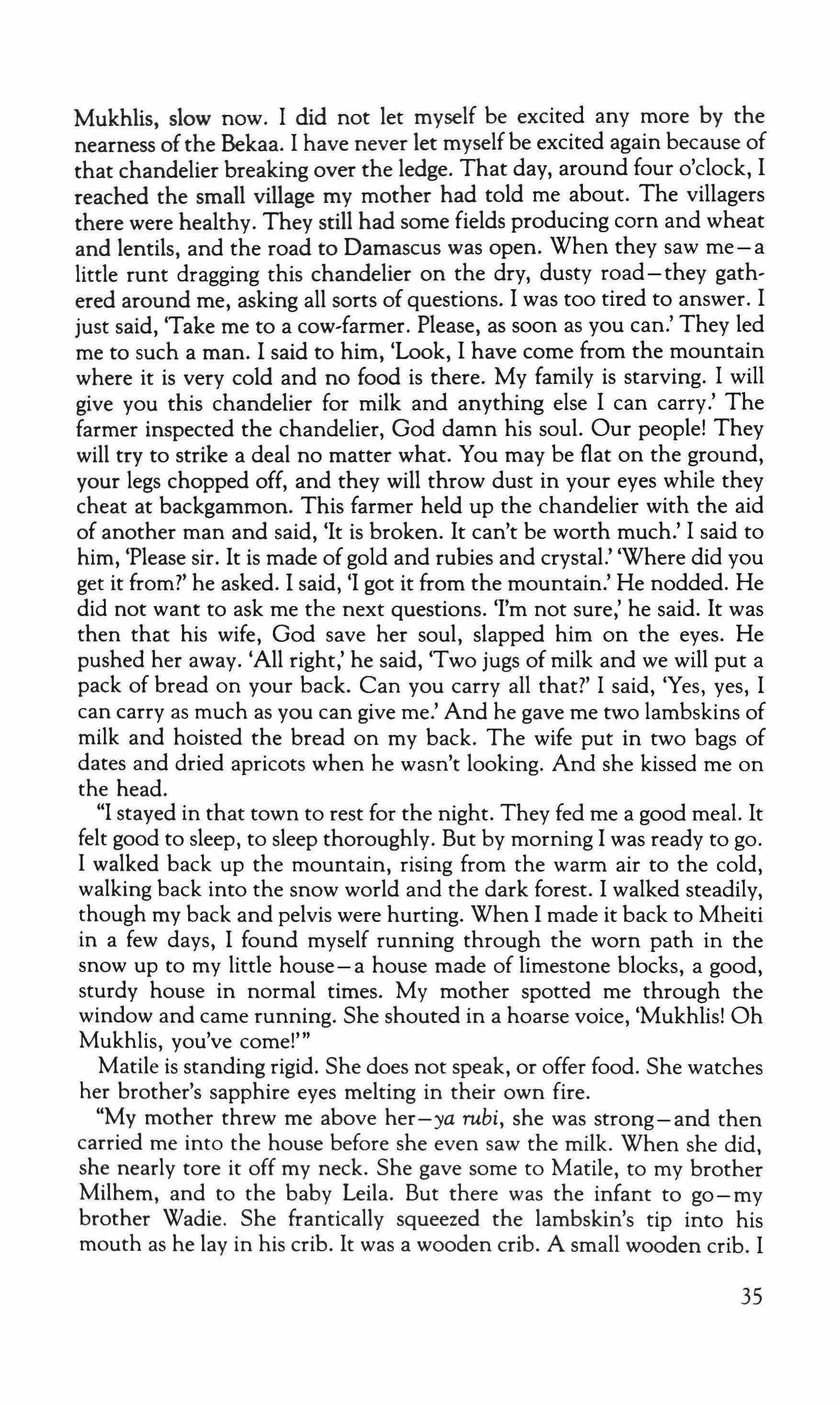
Mukhlis, slow now. I did not let myself be excited any more by the nearness ofthe Bekaa. I have never let myselfbe excited again because of that chandelier breaking over the ledge. That day, around four o'clock, I reached the small village my mother had told me about. The villagers there were healthy. They still had some fields producing corn and wheat and lentils, and the road to Damascus was open. When they saw me-a little runt dragging this chandelier on the dry, dusty road - they gathered around me, asking all sorts of questions. I was too tired to answer. I just said, 'Take me to a cow-farmer. Please, as soon as you can.' They led me to such a man. I said to him, 'Look, I have come from the mountain where it is very cold and no food is there. My family is starving. I will give you this chandelier for milk and anything else I can carry.' The farmer inspected the chandelier, God damn his soul. Our people! They will try to strike a deal no matter what. You may be flat on the ground, your legs chopped off, and they will throw dust in your eyes while they cheat at backgammon. This farmer held up the chandelier with the aid of another man and said, 'It is broken. It can't be worth much.' I said to him, 'Please sir. It is made of gold and rubies and crystal.' 'Where did you get it from?' he asked. I said, 'I got it from the mountain.' He nodded. He did not want to ask me the next questions. 'I'm not sure,' he said. It was then that his wife, God save her soul, slapped him on the eyes. He pushed her away. 'All right,' he said, 'Two jugs of milk and we will put a pack of bread on your back. Can you carryall that?' I said, 'Yes, yes, I can carry as much as you can give me.' And he gave me two lambskins of milk and hoisted the bread on my back. The wife put in two bags of dates and dried apricots when he wasn't looking. And she kissed me on the head.
"I stayed in that town to rest for the night. They fed me a good meal. It felt good to sleep, to sleep thoroughly. But by morning I was ready to go. I walked back up the mountain, rising from the warm air to the cold, walking back into the snow world and the dark forest. I walked steadily, though my back and pelvis were hurting. When I made it back to Mheiti in a few days, I found myself running through the worn path in the snow up to my little house-a house made of limestone blocks, a good, sturdy house in normal times. My mother spotted me through the window and came running. She shouted in a hoarse voice, 'Mukhlis! Oh Mukhlis, you've come!'"
Matile is standing rigid. She does not speak, or offer food. She watches her brother's sapphire eyes melting in their own fire.
"My mother threw me above her-ya rubi, she was strong-and then carried me into the house before she even saw the milk. When she did, she nearly tore it off my neck. She gave some to Matile, to my brother Milhem, and to the baby Leila. But there was the infant to go-my brother Wadie. She frantically squeezed the lambskin's tip into his mouth as he lay in his crib. It was a wooden crib. A small wooden crib. I
35
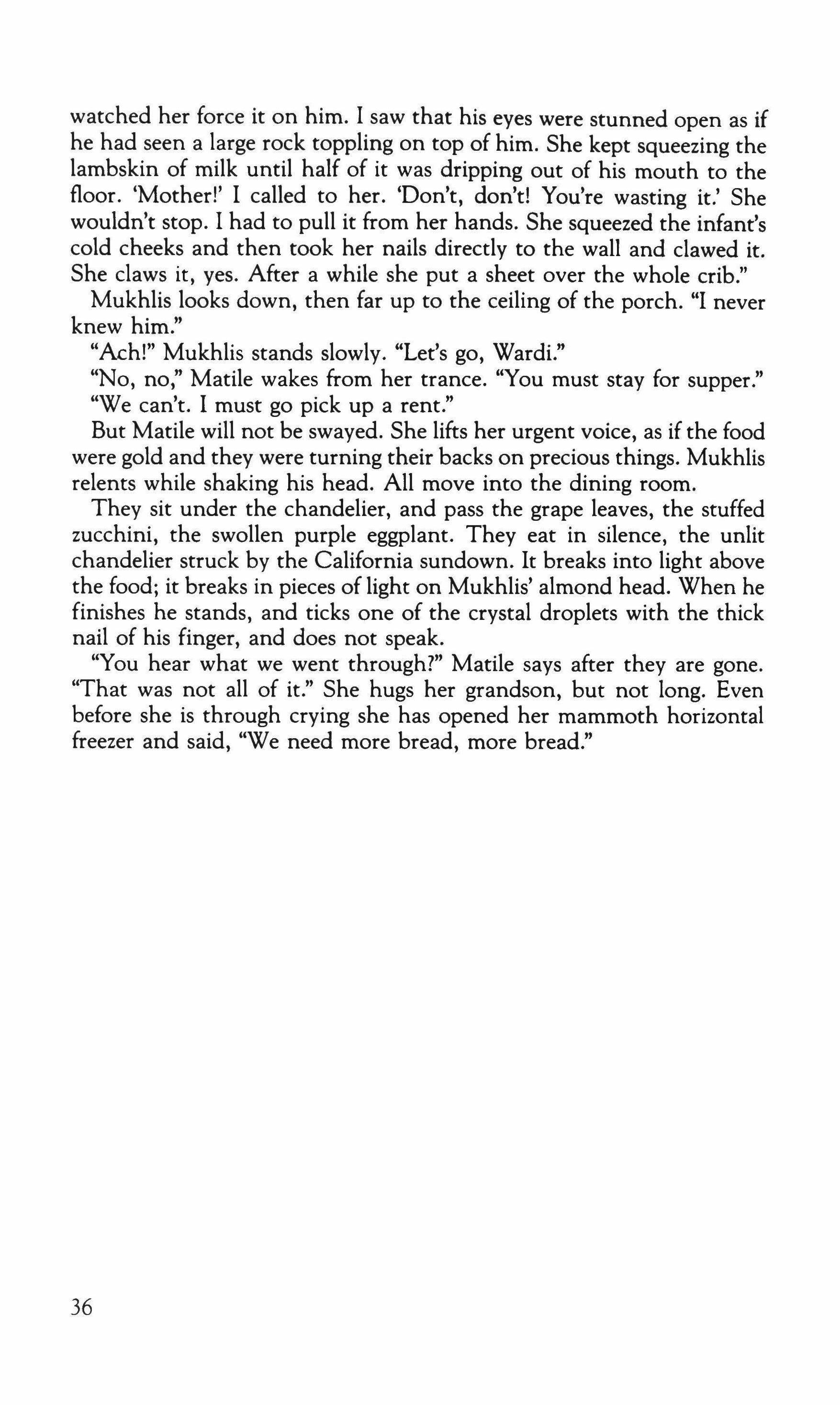
watched her force it on him. I saw that his eyes were stunned open as if he had seen a large rock toppling on top of him. She kept squeezing the lambskin of milk until half of it was dripping out of his mouth to the floor. 'Mother!' I called to her. 'Don't, don't! You're wasting it.' She wouldn't stop. I had to pull it from her hands. She squeezed the infant's cold cheeks and then took her nails directly to the wall and clawed it. She claws it, yes. After a while she put a sheet over the whole crib."
Mukhlis looks down, then far up to the ceiling of the porch. "1 never knew him."
"Ach!" Mukhlis stands slowly. "Let's go, Wardi."
"No, no," Matile wakes from her trance. "You must stay for supper."
"We can't. 1 must go pick up a rent."
But Matile will not be swayed. She lifts her urgent voice, as if the food were gold and they were turning their backs on precious things. Mukhlis relents while shaking his head. All move into the dining room.
They sit under the chandelier, and pass the grape leaves, the stuffed zucchini, the swollen purple eggplant. They eat in silence, the unlit chandelier struck by the California sundown. It breaks into light above the food; it breaks in pieces of light on Mukhlis' almond head. When he finishes he stands, and ticks one of the crystal droplets with the thick nail of his finger, and does not speak.
"You hear what we went through?" Matile says after they are gone. "That was not all of it." She hugs her grandson, but not long. Even before she is through crying she has opened her mammoth horizontal freezer and said, "We need more bread, more bread."
36
Two Stories
Marga Minco
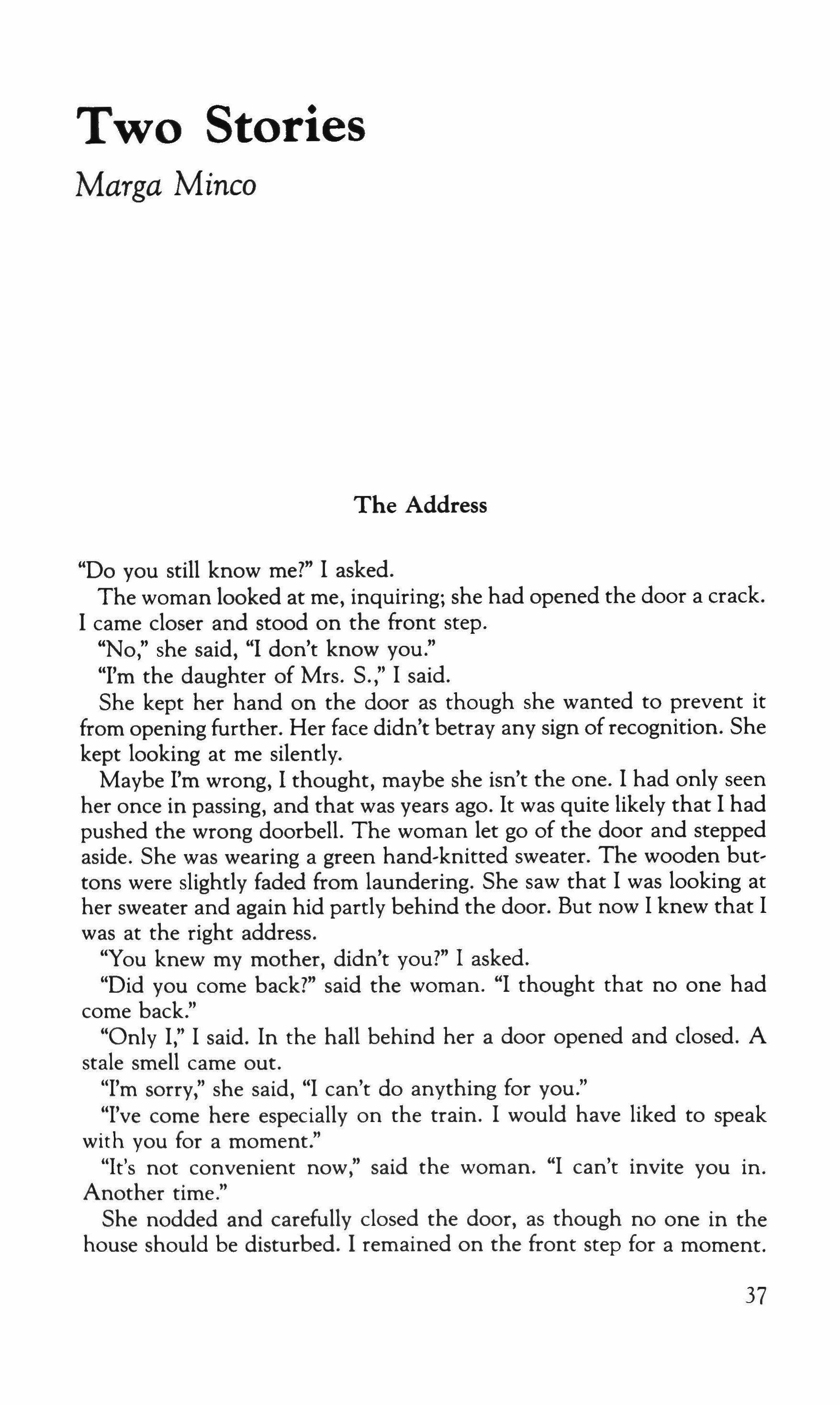
The Address
"Do you still know me?" I asked.
The woman looked at me, inquiring; she had opened the door a crack. I carne closer and stood on the front step.
"No," she said, "I don't know you."
"I'm the daughter of Mrs. S.," I said.
She kept her hand on the door as though she wanted to prevent it from opening further. Her face didn't betray any sign ofrecognition. She kept looking at me silently.
Maybe I'm wrong, I thought, maybe she isn't the one. I had only seen her once in passing, and that was years ago. It was quite likely that I had pushed the wrong doorbell. The woman let go of the door and stepped aside. She was wearing a green hand-knitted sweater. The wooden buttons were slightly faded from laundering. She saw that I was looking at her sweater and again hid partly behind the door. But now I knew that I was at the right address.
"You knew my mother, didn't you?" I asked.
"Did you corne back?" said the woman. "I thought that no one had corne back."
"Only I," I said. In the hall behind her a door opened and closed. A stale smell carne out.
"I'm sorry," she said, "I can't do anything for you."
"I've come here especially on the train. I would have liked to speak with you for a moment."
"It's not convenient now," said the woman. "I can't invite you in. Another time."
She nodded and carefully closed the door, as though no one in the house should be disturbed. I remained on the front step for a moment.
37
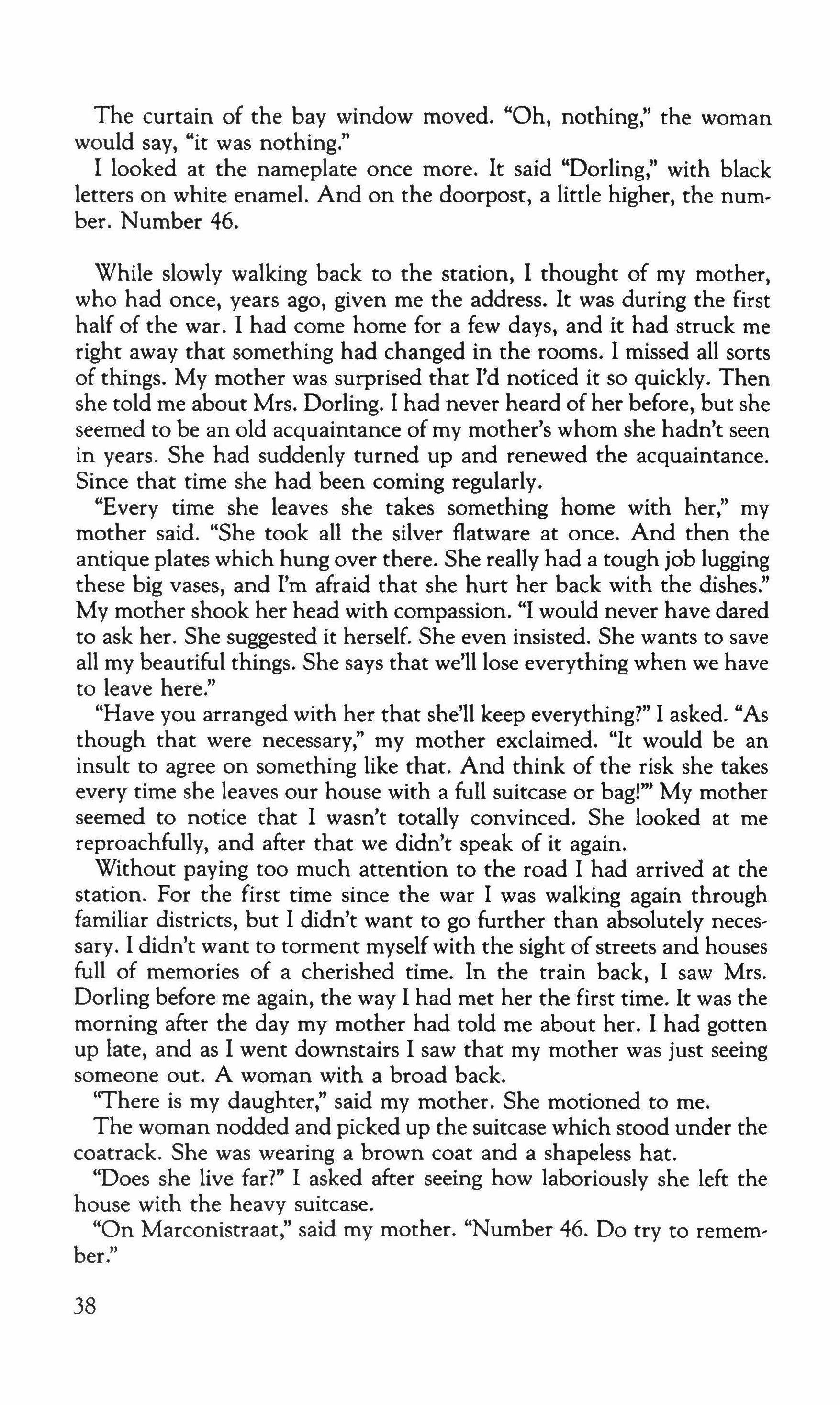
The curtain of the bay window moved. "Oh, nothing," the woman would say, "it was nothing."
I looked at the nameplate once more. It said "Dorling," with black letters on white enamel. And on the doorpost, a little higher, the nurnber. Number 46.
While slowly walking back to the station, I thought of my mother, who had once, years ago, given me the address. It was during the first half of the war. I had come home for a few days, and it had struck me right away that something had changed in the rooms. I missed all sorts of things. My mother was surprised that I'd noticed it so quickly. Then she told me about Mrs. Dorling. I had never heard of her before, but she seemed to be an old acquaintance of my mother's whom she hadn't seen in years. She had suddenly turned up and renewed the acquaintance. Since that time she had been coming regularly.
"Every time she leaves she takes something home with her," my mother said. "She took all the silver flatware at once. And then the antique plates which hung over there. She really had a tough job lugging these big vases, and I'm afraid that she hurt her back with the dishes." My mother shook her head with compassion. "I would never have dared to ask her. She suggested it herself. She even insisted. She wants to save all my beautiful things. She says that we'll lose everything when we have to leave here."
"Have you arranged with her that she'll keep everything?" I asked. "As though that were necessary," my mother exclaimed. "It would be an insult to agree on something like that. And think of the risk she takes every time she leaves our house with a full suitcase or bag!'" My mother seemed to notice that I wasn't totally convinced. She looked at me reproachfully, and after that we didn't speak of it again.
Without paying too much attention to the road I had arrived at the station. For the first time since the war I was walking again through familiar districts, but I didn't want to go further than absolutely necessary. I didn't want to torment myself with the sight of streets and houses full of memories of a cherished time. In the train back, I saw Mrs. Dorling before me again, the way I had met her the first time. It was the morning after the day my mother had told me about her. I had gotten up late, and as I went downstairs I saw that my mother was just seeing someone out. A woman with a broad back.
"There is my daughter," said my mother. She motioned to me.
The woman nodded and picked up the suitcase which stood under the coatrack. She was wearing a brown coat and a shapeless hat.
"Does she live far?" I asked after seeing how laboriously she left the house with the heavy suitcase.
"On Marconistraat," said my mother. "Number 46. Do try to rernernber."
38
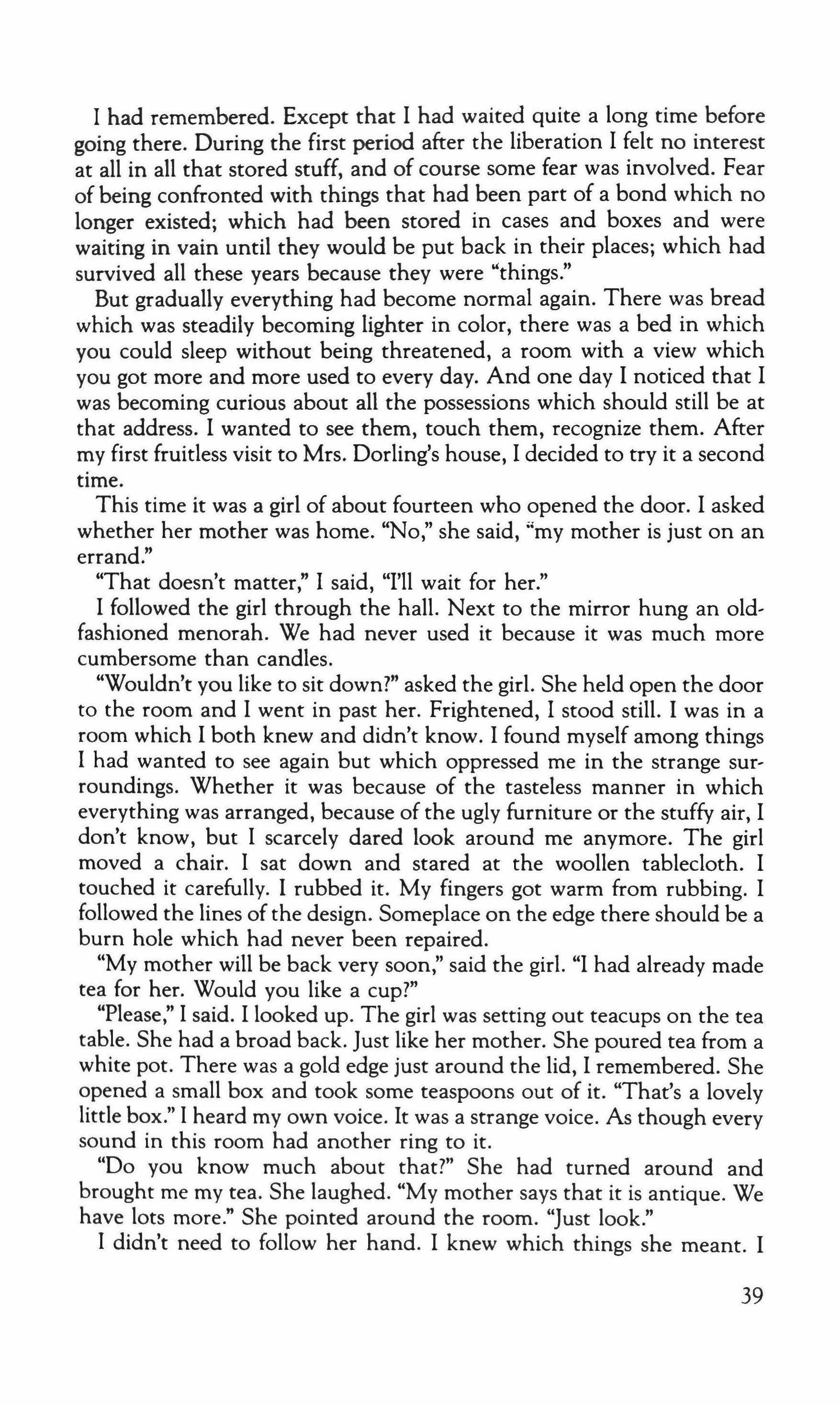
I had remembered. Except that I had waited quite a long time before going there. During the first period after the liberation I felt no interest at all in all that stored stuff, and of course some fear was involved. Fear of being confronted with things that had been part of a bond which no longer existed; which had been stored in cases and boxes and were waiting in vain until they would be put back in their places; which had survived all these years because they were "things."
But gradually everything had become normal again. There was bread which was steadily becoming lighter in color, there was a bed in which you could sleep without being threatened, a room with a view which you got more and more used to every day. And one day I noticed that I was becoming curious about all the possessions which should still be at that address. I wanted to see them, touch them, recognize them. After my first fruitless visit to Mrs. Dorling's house, I decided to try it a second time.
This time it was a girl of about fourteen who opened the door. I asked whether her mother was home. "No," she said, "my mother is just on an errand."
"That doesn't matter," I said, "I'll wait for her."
I followed the girl through the hall. Next to the mirror hung an old, fashioned menorah. We had never used it because it was much more cumbersome than candles.
"Wouldn't you like to sit down?" asked the girl. She held open the door to the room and I went in past her. Frightened, I stood still. I was in a room which I both knew and didn't know. I found myself among things I had wanted to see again but which oppressed me in the strange sur, roundings. Whether it was because of the tasteless manner in which everything was arranged, because of the ugly furniture or the stuffy air, I don't know, but I scarcely dared look around me anymore. The girl moved a chair. I sat down and stared at the woollen tablecloth. I touched it carefully. I rubbed it. My fingers got warm from rubbing. I followed the lines of the design. Someplace on the edge there should be a burn hole which had never been repaired.
"My mother will be back very soon," said the girl. "I had already made tea for her. Would you like a cup?"
"Please," I said. I looked up. The girl was setting out teacups on the tea table. She had a broad back. Just like her mother. She poured tea from a white pot. There was a gold edge just around the lid, I remembered. She opened a small box and took some teaspoons out of it. "That's a lovely little box." I heard my own voice. It was a strange voice. As though every sound in this room had another ring to it.
"Do you know much about that?" She had turned around and brought me my tea. She laughed. "My mother says that it is antique. We have lots more." She pointed around the room. "Just look."
I didn't need to follow her hand. I knew which things she meant. I
39
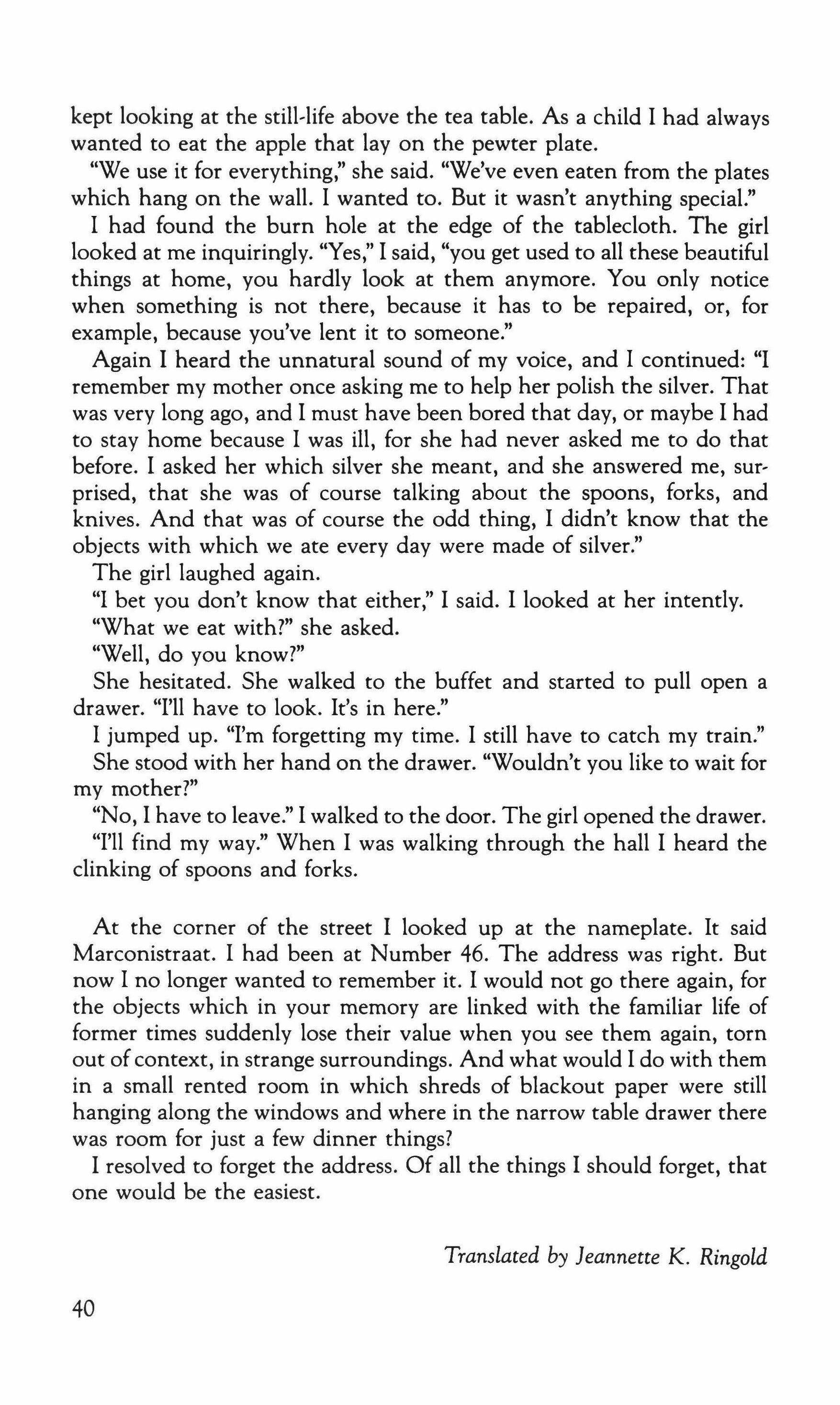
kept looking at the still-life above the tea table. As a child I had always wanted to eat the apple that lay on the pewter plate.
"We use it for everything," she said. "We've even eaten from the plates which hang on the wall. I wanted to. But it wasn't anything special."
I had found the burn hole at the edge of the tablecloth. The girl looked at me inquiringly. "Yes," I said, "you get used to all these beautiful things at home, you hardly look at them anymore. You only notice when something is not there, because it has to be repaired, or, for example, because you've lent it to someone."
Again I heard the unnatural sound of my voice, and I continued: "I remember my mother once asking me to help her polish the silver. That was very long ago, and I must have been bored that day, or maybe I had to stay home because I was ill, for she had never asked me to do that before. I asked her which silver she meant, and she answered me, surprised, that she was of course talking about the spoons, forks, and knives. And that was of course the odd thing, I didn't know that the objects with which we ate every day were made of silver."
The girl laughed again.
"I bet you don't know that either," I said. I looked at her intently. "What we eat with?" she asked.
"Well, do you know?"
She hesitated. She walked to the buffet and started to pull open a drawer. "I'll have to look. It's in here."
I jumped up. "I'm forgetting my time. I still have to catch my train." She stood with her hand on the drawer. "Wouldn't you like to wait for my mother?"
"No, I have to leave." I walked to the door. The girl opened the drawer. "I'll find my way." When I was walking through the hall I heard the clinking of spoons and forks.
At the corner of the street I looked up at the nameplate. It said Marconistraat. I had been at Number 46. The address was right. But now I no longer wanted to remember it. I would not go there again, for the objects which in your memory are linked with the familiar life of former times suddenly lose their value when you see them again, torn out of context, in strange surroundings. And what would I do with them in a small rented room in which shreds of blackout paper were still hanging along the windows and where in the narrow table drawer there was room for just a few dinner things?
I resolved to forget the address. Of all the things I should forget, that one would be the easiest.
Translated by Jeannette K. Ringold
40

The Day My Sister Married
On the day my sister married I got up early, even before the sound of my alarm, which I had set for seven o'clock. I walked to the window, which stood halfway open, pushed it open further and leaned out.
A woman came out of her kitchen door barefoot and in a pink bathrobe. Carefully, as though she were testing the first ice, she took a few steps over the flagstones to the garden path, after which she quickly went back, pulling her legs up high. It was still chilly, but the grayish white sky had already started to lighten and it looked as though it would be a sunny spring day. A few gardens away someone let a bucket roll down a step. A red tomcat was balanced on top of the fence. Perhaps he was the one who in the middle of the night had given the intense scream that had awakened me with a start. I had remained still, listening, but heard nothing else. Everyone had seemed to be sleeping quietly. For a moment I had the sensation that I was in my room in our old house. Lately that had happened more often. I had to look intently at the door and the window, which were located differently with respect to my bed, to confirm that it had been a dream. As I closed my eyes and turned over on my other side, I heard it again. It came from outside. It was the piercing screech of a tomcat, and I didn't understand that I had mistaken this sound for a human scream. I shivered from the morning cold coming in and closed the window.
"May is a lovely month to get married," the grocer had said yesterday as he placed a big box of food on the kitchen table. "People are marrying anyway. All that continues as usual." It was early in May '42 and we had been wearing the stars for a few days. It was not our intention to give a real wedding party, but my mother thought that we couldn't just let it go by and that we should invite some family members. "Who knows," she said, "how long it will be before we have the opportunity to be all together again." Not much family could come, a few uncles and aunts. It
41
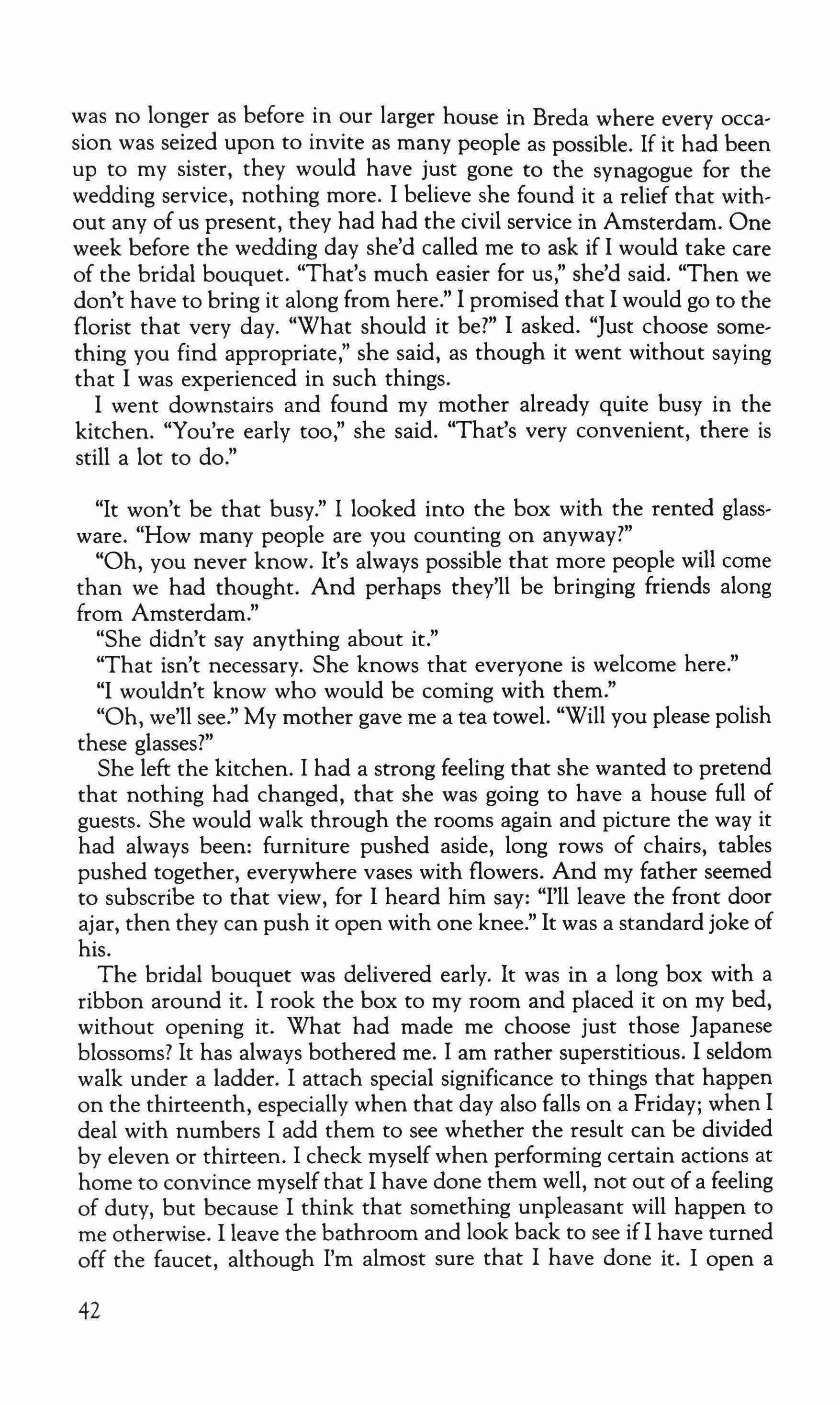
was no longer as before in our larger house in Breda where every occasion was seized upon to invite as many people as possible. If it had been up to my sister, they would have just gone to the synagogue for the wedding service, nothing more. 1 believe she found it a relief that without any of us present, they had had the civil service in Amsterdam. One week before the wedding day she'd called me to ask if I would take care of the bridal bouquet. "That's much easier for us," she'd said. "Then we don't have to bring it along from here." I promised that I would go to the florist that very day. "What should it be?" I asked. "Just choose something you find appropriate," she said, as though it went without saying that 1 was experienced in such things.
1 went downstairs and found my mother already quite busy in the kitchen. "You're early too," she said. "That's very convenient, there is still a lot to do."
"It won't be that busy." I looked into the box with the rented glassware. "How many people are you counting on anyway?"
"Oh, you never know. It's always possible that more people will come than we had thought. And perhaps they'll be bringing friends along from Amsterdam."
"She didn't say anything about it."
"That isn't necessary. She knows that everyone is welcome here."
"I wouldn't know who would be coming with them."
"Oh, we'll see." My mother gave me a tea towel. "Will you please polish these glasses?"
She left the kitchen. I had a strong feeling that she wanted to pretend that nothing had changed, that she was going to have a house full of guests. She would walk through the rooms again and picture the way it had always been: furniture pushed aside, long rows of chairs, tables pushed together, everywhere vases with flowers. And my father seemed to subscribe to that view, for I heard him say: "I'll leave the front door ajar, then they can push it open with one knee." It was a standard joke of his.
The bridal bouquet was delivered early. It was in a long box with a ribbon around it. I rook the box to my room and placed it on my bed, without opening it. What had made me choose just those Japanese blossoms? It has always bothered me. I am rather superstitious. I seldom walk under a ladder. I attach special significance to things that happen on the thirteenth, especially when that day also falls on a Friday; when I deal with numbers I add them to see whether the result can be divided by eleven or thirteen. I check myself when performing certain actions at home to convince myselfthat I have done them well, not out of a feeling of duty, but because I think that something unpleasant will happen to me otherwise. I leave the bathroom and look back to see if I have turned off the faucet, although I'm almost sure that I have done it. I open a
42

window halfway, get into bed and get up again to make sure I have fastened it. But in choosing that bouquet I had no premonition at all. Before I entered the flower shop I had hesitated in front of the window for a while. I'd had no idea what I would get and once I was inside and sawall those pots with spring flowers, I no longer knew at all what I should choose. The florist, a ruddy-faced man in a light brown smock, had asked if the bride would be in white.
"She won't be in white," I'd said. I wasn't wearing a star yet. The regulation would go into effect a few days later. Therefore he could not know that we had our reasons to keep the wedding party simple. While he was putting some sprigs of green in a bunch of freesias, he asked how the bride would be dressed, and because I didn't answer that imrnediatelv, he turned towards me, making it look as if he were taking a small bow.
"Is she wearing a long gown?"
"I don't think so."
"Do you perhaps know the color of her gown?" he'd pressed. "Then I can take that into consideration in creating the bouquet."
I'd shrugged my shoulders. I couldn't enlighten him about that either. I hadn't asked her. The time when we had always gone dressed alike because we were one year apart was already long past. My mother did try to keep it up as long as possible. She'd knitted the same dresses and sweaters for us, we'd worn the same coats, even our shoes were alike. It wasn't until we left elementary school that we no longer had to walk around like twins.
The florist had advised me to take orchids. He made bridal bouquets from them regularly and they were also suitable as corsages for the wedding guests.
"I don't think that corsages will be worn."
The heavy scent of flowers in the shop had begun to oppress me. I got the feeling that if I hesitated any longer, he would push something on me that I didn't want at all. He had already pulled forward a big vase with orchids, and he squatted down and held a few together to show the effect.
"Very lovely." Then in the back of the store I'd spotted, on a small platform, a stone pot with branches on which were small star-shaped pink blossoms. I asked him what it was. He stood up. "That is Japanese blossom."
"Can you make a bouquet from that?"
"I can create bridal bouquets from everything that is here. That is not the point," he said. He looked doubtful. My choice had probably struck him as unusual and I quite understood that he preferred using orchids. But I thought that the Japanese blossom suited my sister exactly. He acknowledged that people never asked for such bridal bouquets. The
43

bride must have a very distinctive taste. He'd promised that it would become something special.
Although I was curious to see it, I waited before opening the box until the arrival of my sister. As soon as she arrived with Hans I wanted to take her upstairs. But my mother held us back. First we had to go in where an uncle was waiting for her with a present. It was my uncle Herman from Assen, a short, effusive man who had taken the first train to be at our house in time. He had with him a black hatbox from which he took his top hat. He held it with the inside towards himself, made a few quick hand motions and started pulling something out of it. It was a piece ofblue silk, which, as in a magic act, seemed to be endless. He let it flutter in the air a moment and then draped it over two chairs while he looked at us triumphantly.
"She'll certainly be able to get two dresses out ofthat," said my mother. She stroked the material, right in the middle, which created a hollow.
"Or an evening gown with a small train," I said.
"She doesn't need an evening gown now, 1 think."
My mother carefully folded the cloth.
"Perhaps for after the war," said Hans.
"Of course," said my uncle, "it is pure silk. You can always keep that. And the Germans won't hold out that long anymore. Mark my words."
He took a small flat brush from his pocket, rubbed the hat, put it on and sat down at the table across from my mother. To indicate how many bolts ofwool and silk he still had in the warehouse ofhis textile business, he made imaginary stacks with his hands and looked up. Even if the war were still to last a few years, he could get on with his fabrics.
1 pulled my sister out of the room. She had kissed my uncle on his cheeks, but had not said a word. Upstairs I pointed to the box on the bed.
"Your bridal bouquet is in there."
"What is it like?"
"I haven't looked yet."
"Why not?" She took off her coat and laid it on the bed.
"I wanted to wait for you."
She loosened the ribbon and took the lid off the box. A gentle fragrance rose from it. Carefully she unwrapped the tissue paper. The florist had tied the bouquet together with pink ribbons and had worked sprigs of different shades of green into it. My sister immediately walked to the mirror with it.
"What do you think, should I hold it like this?"
"I think so."
"What is the name of these flowers?"
"It's Japanese blossom. I didn't know what you'd be wearing."
"Just this. The color goes very well with it. Wait, I'll do it all for real." From her purse she pulled a small veil, which is required for the wedding
44

service in a synagogue, put it on and again went to stand in front of the mirror with the bouquet.
"How do you like it?"
She was wearing a soft green dress with long sleeves and tight at the waist, which made her seem even slimmer. Her chestnut-brown hair curled out from under the small cap of the veil. She had always been much better looking than I, which in the past had often made me jealous. I used to envy her because she had many more boyfriends than I; they came to pick her up from school, waited for her everywhere, jostled each other at school parties to dance with her.
The doorbell rang. I heard voices in the hall, the banging of the doors, my father greeting someone, and through it all the whistling of a teakettle. I sat down on the bed and pushed her coat aside, which caused the star to become visible. I turned it over. "You look very good," I said.
She walked back and forth in front of the mirror a few times, taking long steps, the way we used to in the attic with an old curtain around our heads and a feather duster in our hands as a bridal bouquet. I wondered whether she now also remembered how as teenagers we had imagined a wedding. We had derived that image from the films we'd seen: Lillian Harvey and Willy Fritsch, who waltzed into marriage under enormous chandeliers, and Ginger Rogers and Fred Astaire, who prom' ised each other eternal fidelity while tap-dancing on a shiny floor. It wasn't even that long ago; it seemed that way only because the war had come between things. My sister laid the bouquet on a cabinet, took off the veil and folded it.
"What are you doing now?"
"You don't think I'm going to keep it on?"
"Oh no."
"I'm not going out in the street with it. I'll put it on right at the door of the synagogue."
"Yes, I understand that."
"How long is the walk?"
"About ten minutes. A carriage would perhaps not take as long."
"A carriage?"
"I just mean
She looked at me slightly surprised, the veil folded small in her hand.
"Do you think that under normal circumstances we would really be getting married with such a fuss? Not like us." She laughed and put the veil next to her coat on the bed. Someone was coming upstairs. It was Hans. He wore a black suit and was holding a prayer book, with which I had seen him arrive, still clasped under his arm.
"Do you always carry that with you?" I asked.
"I'm afraid that I'll forget it otherwise."
"It looks like a beautiful edition."
"It was my father's." He handed it to me. It was gilt-edged, bound in
45

heavy leather. I opened it, turned it around, and opened it again. On the first page a name was written in Gothic letters above the Hebrew title, and under it Berlin 1910. Hans came from Berlin, where he had studied law. He had not been able to complete his studies and in '33 had fled with his mother to our country. His father, a well-known heart specialist, had donated his private clinic to the city of Berlin at the end of the twenties. Shortly before the Nazi takeover he had died. Hans was a Zionist and apprenticed in factories and on farms because he wanted to go to Palestine already trained.
After my sister had become engaged to him, she had given up painting and gone into nursing in Amsterdam. In her attic studio she had left everything behind, her paint box, her paints and brushes, stretcher bars, panels, an easel covered with colorful crusts. On a stand, portfolios full of drawings, her canvases turned to the wall. "I'll come and get that stuff one of these days," she'd said. "Maybe I'll have time in Palestine to do it again."
None of us at home was a Zionist. Once I went with my sister to such a meeting in the small hall above the synagogue in Breda, where girls in blue-and-white dresses danced the hora and sang lively songs. We didn't much feel like participating in the movement, but later, under the influence of Hans, my sister started to be more interested in it.
"How do you like the bridal bouquet, Hans?"
"Nice flowers. Just like little stars."
"Except that they are pink."
"There is something else in the box," said my sister. "A corsage."
"He added that after all. I had said it wasn't necessary."
"Who wants it?" She held up the spray with the stem wrapped in silver foil.
"Just give it to me," said Hans. "That must be the idea." He fastened the corsage with a safety pin to his lapel. "Come downstairs, they're asking for you."
"Don't forget your book."
Laughing a little, they walked down the stairs.
While everyone was in the hall putting on coats, another uncle and aunt arrived from Zeist. This caused some crowding because my uncle held the company back at the front door. He first had to tell them something. The fact that his wife was nonjewish had confused him when he was filling out forms at the population register. Inadvertently he had written that he had only two Jewish grandparents. "But I went back to correct it a few days later," he said as he pointed, grinning, at the star on his chest.
"You could have tried," said another uncle.
"I prefer not to let myself in for unnecessary difficulties."
"That's what I said too," said Aunt Mien. "It is better this way." She had a thin, somewhat crooked mouth that drew in even more when she
46
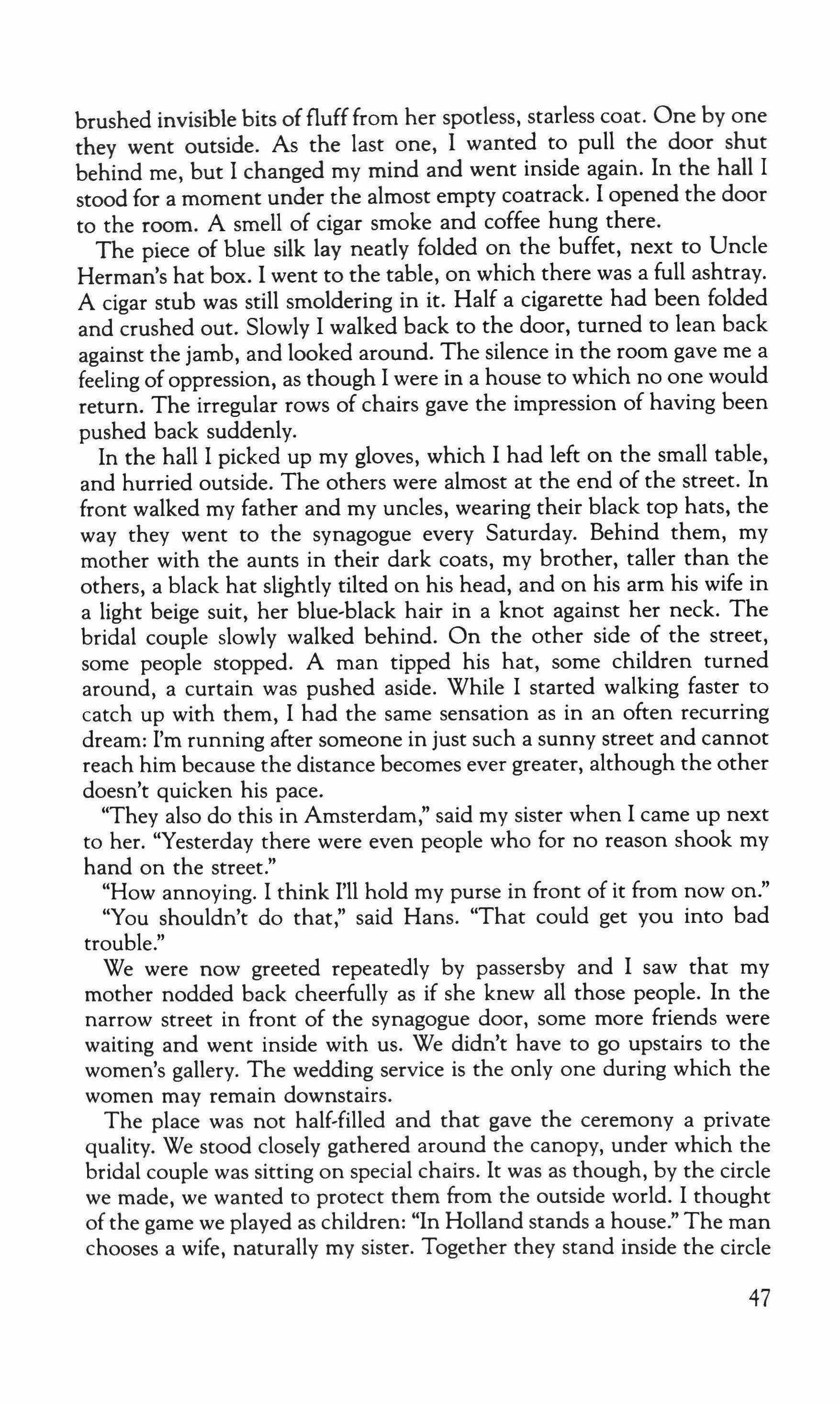
brushed invisible bits offlufffrom her spotless, starless coat. One by one they went outside. As the last one, I wanted to pull the door shut behind me, but I changed my mind and went inside again. In the hall I stood for a moment under the almost empty coatrack. I opened the door to the room. A smell of cigar smoke and coffee hung there.
The piece of blue silk lay neatly folded on the buffet, next to Uncle Herman's hat box. I went to the table, on which there was a full ashtray. A cigar stub was still smoldering in it. Half a cigarette had been folded and crushed out. Slowly I walked back to the door, turned to lean back against the jamb, and looked around. The silence in the room gave me a feeling of oppression, as though I were in a house to which no one would return. The irregular rows of chairs gave the impression of having been pushed back suddenly.
In the hall I picked up my gloves, which I had left on the small table, and hurried outside. The others were almost at the end of the street. In front walked my father and my uncles, wearing their black top hats, the way they went to the synagogue every Saturday. Behind them, my mother with the aunts in their dark coats, my brother, taller than the others, a black hat slightly tilted on his head, and on his arm his wife in a light beige suit, her blue-black hair in a knot against her neck. The bridal couple slowly walked behind. On the other side of the street, some people stopped. A man tipped his hat, some children turned around, a curtain was pushed aside. While I started walking faster to catch up with them, I had the same sensation as in an often recurring dream: I'm running after someone in just such a sunny street and cannot reach him because the distance becomes ever greater, although the other doesn't quicken his pace.
''They also do this in Amsterdam," said my sister when I came up next to her. "Yesterday there were even people who for no reason shook my hand on the street."
"How annoying. I think I'll hold my purse in front of it from now on."
"You shouldn't do that," said Hans. "That could get you into bad trouble."
We were now greeted repeatedly by passersby and I saw that my mother nodded back cheerfully as if she knew all those people. In the narrow street in front of the synagogue door, some more friends were waiting and went inside with us. We didn't have to go upstairs to the women's gallery. The wedding service is the only one during which the women may remain downstairs.
The place was not half-filled and that gave the ceremony a private quality. We stood closely gathered around the canopy, under which the bridal couple was sitting on special chairs. It was as though, by the circle we made, we wanted to protect them from the outside world. I thought of the game we played as children: "In Holland stands a house." The man chooses a wife, naturally my sister. Together they stand inside the circle
47

and we chant the rest of the lines, of the child and the maid and the manservant and all the things which are still chosen after that, until finally the house is burned or torn down. My sister's face was hidden under the veil; I could not observe her reactions. I didn't ask her later what she had felt. The rest of the day she remained looking very beautiful but also slightly unapproachable. And afterwards I had no opportunity to talk with her about it. Three weeks later, during the first Nazi raid in Amsterdam-Zuid, she was taken out of her house with Hans and put on a transport.
During the whole service my mother was very moved. Her handkerchief was constantly in use. I knew that so well about her. She was always easily touched, not only at family occasions. Even seeing the queen stirred a strong emotion within her. I remember that when I was young Queen Wilhelmina once made a drive through Breda. As soon as the carriage with the queen and Queen-mother Emma came in sight, tears streamed over my mother's cheeks. On the wedding day she repeatedly had the chance for tears. As soon as we came out of the synagogue my brother took photos: of the bride and groom in the open door, for which my sister had to keep her veil on for a moment; of the bride and groom with the parents; and a picture of the whole family. I had the impression that the big white handkerchief had not left my mother's face for a moment, but when I later saw the prints, she seemed to be smiling in all of them.
"You're next," my uncle Herman said to me.
"That would cost you another piece of cloth."
"I'd be glad to sacrifice it for that. I still have a whole bolt of white silk, of the best quality."
"I'll warn you in time. I've always wanted to get married in white."
"She still has time," said my mother. We were sitting at the table. I was next to my uncle from Delft, my mother's brother, a tall, thin man with a pince-nez. He was a teacher of French, German and English, languages of which he also knew several dialects. In addition to cockney and a Berlin dialect, he preferred potatoes. We called him the "potato-eater" and when he came to stay with us my mother served him only the best kinds, which he could identify by name after just a few bites. He remained as thin as a rail and we assumed that he didn't get enough to eat at home. Aunt Hilda, his wife, of German origin, was not only extremely frugal but also had her husband firmly under her thumb. She looked very German; her skirts fell amply over her broad hips, her hair in tightly rolled braids like headphones on her ears. Their two children, a boy and a girl with their father's intelligence, were already knowledgeable about the political happenings in Germany when very young and could take part in the conversation like adults. The family did not radiate much happiness. The few times that they made an outing to
48
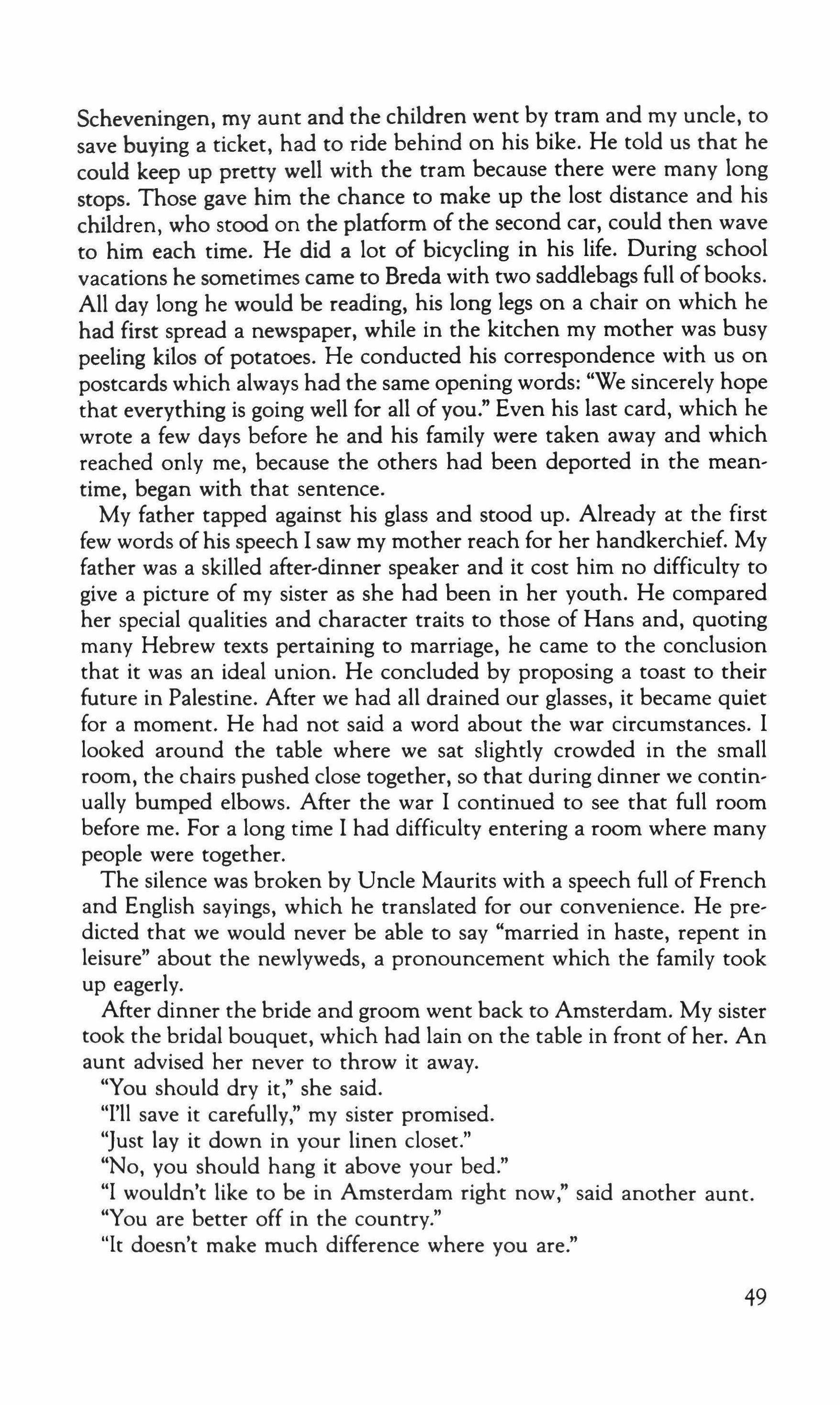
Scheveningen, my aunt and the children went by tram and my uncle, to save buying a ticket, had to ride behind on his bike. He told us that he could keep up pretty well with the tram because there were many long stops. Those gave him the chance to make up the lost distance and his children, who stood on the platform of the second car, could then wave to him each time. He did a lot of bicycling in his life. During school vacations he sometimes came to Breda with two saddlebags full ofbooks. All day long he would be reading, his long legs on a chair on which he had first spread a newspaper, while in the kitchen my mother was busy peeling kilos of potatoes. He conducted his correspondence with us on postcards which always had the same opening words: "We sincerely hope that everything is going well for all of you." Even his last card, which he wrote a few days before he and his family were taken away and which reached only me, because the others had been deported in the mean, time, began with that sentence.
My father tapped against his glass and stood up. Already at the first few words of his speech I saw my mother reach for her handkerchief. My father was a skilled after-dinner speaker and it cost him no difficulty to give a picture of my sister as she had been in her youth. He compared her special qualities and character traits to those of Hans and, quoting many Hebrew texts pertaining to marriage, he came to the conclusion that it was an ideal union. He concluded by proposing a toast to their future in Palestine. After we had all drained our glasses, it became quiet for a moment. He had not said a word about the war circumstances. I looked around the table where we sat slightly crowded in the small room, the chairs pushed close together, so that during dinner we continually bumped elbows. After the war I continued to see that full room before me. For a long time I had difficulty entering a room where many people were together.
The silence was broken by Uncle Maurits with a speech full of French and English sayings, which he translated for our convenience. He pre' dieted that we would never be able to say "married in haste, repent in leisure" about the newlyweds, a pronouncement which the family took up eagerly.
After dinner the bride and groom went back to Amsterdam. My sister took the bridal bouquet, which had lain on the table in front of her. An aunt advised her never to throw it away.
"You should dry it," she said.
"I'll save it carefully," my sister promised.
"Just lay it down in your linen closet."
"No, you should hang it above your bed."
"I wouldn't like to be in Amsterdam right now," said another aunt.
"You are better off in the country."
"It doesn't make much difference where you are."
49

"You shouldn't say that. There are more Germans around in such a city."
"They are everywhere," said my father.
"Just let these children go to Amsterdam," called out my uncle Herman. "What is going to happen anyway?"
My sister and Hans had left and everyone had gone to drink coffee in the other room. I remained sitting at the table. No one had noticed it as far as I could tell- at any rate I hadn't shown how upset I was when my sister picked up the bouquet. It is a bad sign, I thought, while I looked at the pink flowers that remained on the table. A bridal bouquet should not fall apart.
My aunts came to clear offthe table. It became increasingly empty, the last glasses were carried to the kitchen, the last serving dish, the napkins, the knife holders, until on the tablecloth smeared with crumbs, wine and food stains, there were only the star-shaped flowers. They already looked wilted. I kept looking at them, sniffed them briefly and noticed that they had also lost their scent.
"Lift your arm a moment," I heard. Someone took the tablecloth by the corners and carried it away like a bag to shake it out above the garbage can. When I stood up I also saw a few flowers on the floor next to her chair. I stepped over them and went to my room. The box was still on my bed, with the lid on it. I took it off and held the box up to my face. The fragrance had lingered in it.
Translated by Jeannette K. Ringold
50
From A Wilderness Called Peace
Edmund Keeley
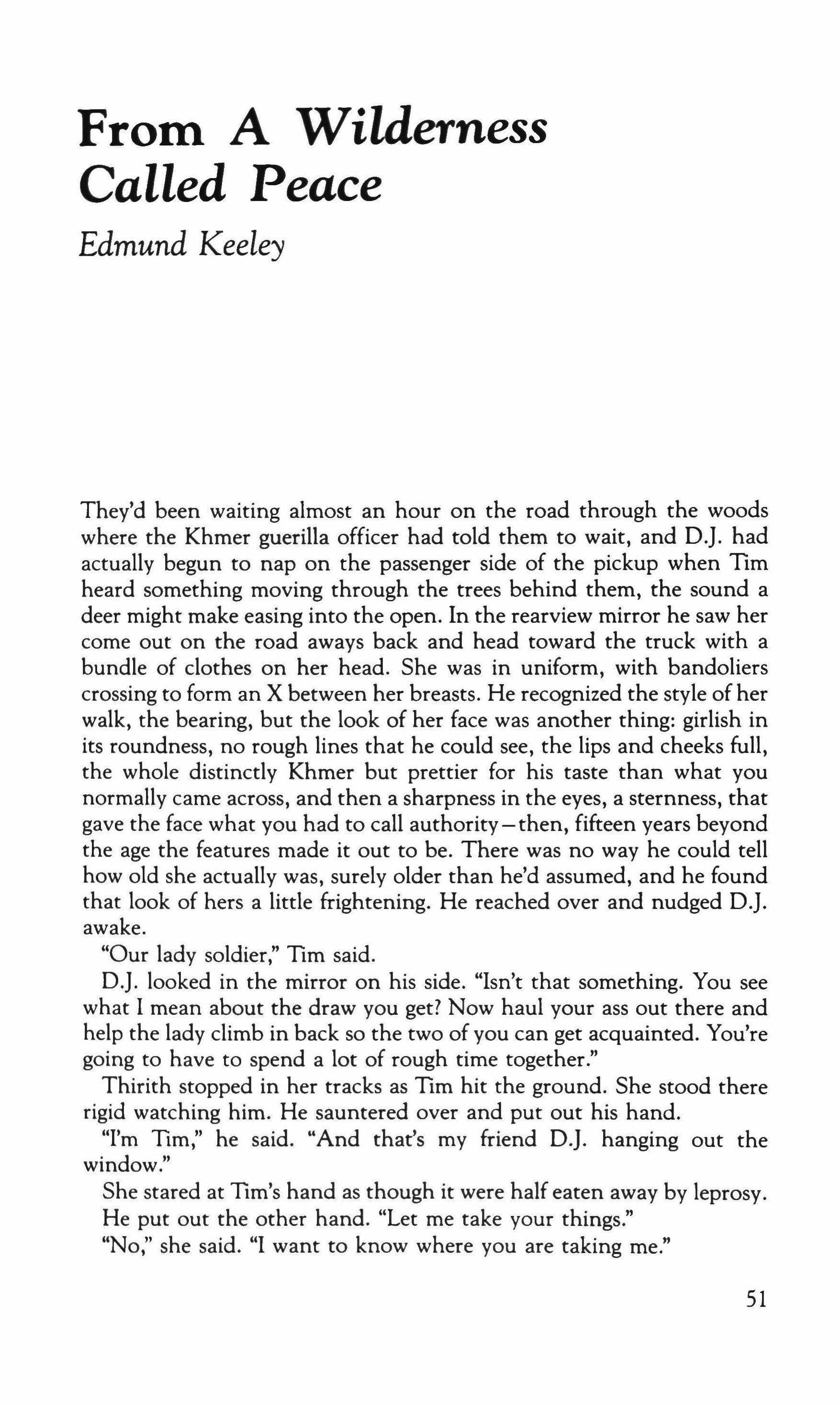
They'd been waiting almost an hour on the road through the woods where the Khmer guerilla officer had told them to wait, and D.]. had actually begun to nap on the passenger side of the pickup when 11m heard something moving through the trees behind them, the sound a deer might make easing into the open. In the rearview mirror he saw her come out on the road aways back and head toward the truck with a bundle of clothes on her head. She was in uniform, with bandoliers crossing to form an X between her breasts. He recognized the style ofher walk, the bearing, but the look of her face was another thing: girlish in its roundness, no rough lines that he could see, the lips and cheeks full, the whole distinctly Khmer but prettier for his taste than what you normally came across, and then a sharpness in the eyes, a sternness, that gave the face what you had to call authority-then, fifteen years beyond the age the features made it out to be. There was no way he could tell how old she actually was, surely older than he'd assumed, and he found that look of hers a little frightening. He reached over and nudged D.]. awake.
"Our lady soldier," Tim said. D.]. looked in the mirror on his side. "Isn't that something. You see what I mean about the draw you get? Now haul your ass out there and help the lady climb in back so the two of you can get acquainted. You're going to have to spend a lot of rough time together."
Thirith stopped in her tracks as Tim hit the ground. She stood there rigid watching him. He sauntered over and put out his hand.
"I'm Tim," he said. "And that's my friend D.]. hanging out the window."
She stared at Tim's hand as though it were half eaten away by leprosy. He put out the other hand. "Let me take your things."
"No:' she said. "I want to know where you are taking me."
51
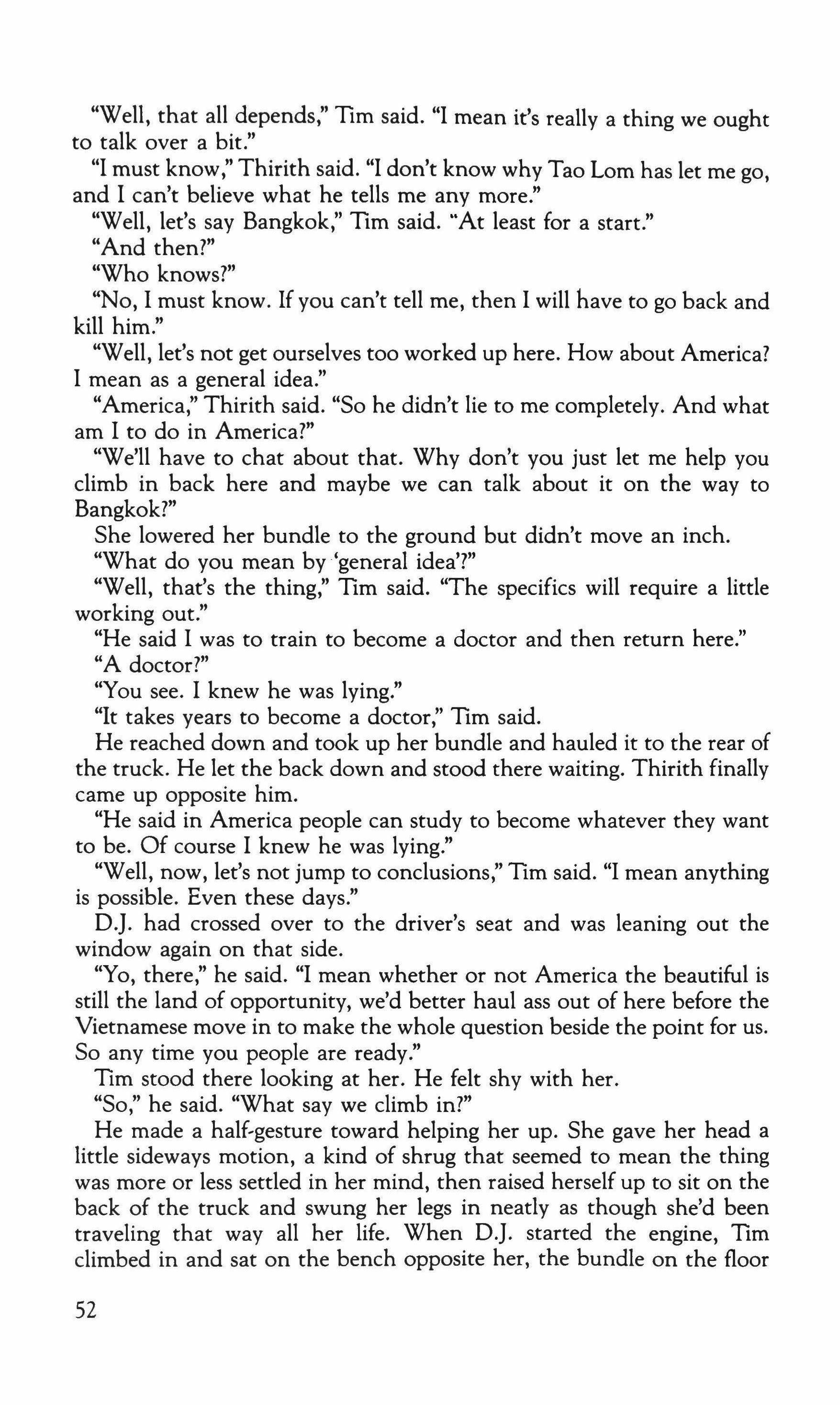
"Well, that all depends," Tim said. "I mean it's really a thing we ought to talk over a bit."
"I must know," Thirith said. "I don't know why Tao Lorn has let me go, and I can't believe what he tells me any more."
"Well, let's say Bangkok," Tim said. "At least for a start."
"And then?"
"Who knows?"
"No, I must know. If you can't tell me, then I will have to go back and kill him."
"Well, let's not get ourselves too worked up here. How about America? I mean as a general idea."
"America," Thirith said. "So he didn't lie to me completely. And what am I to do in America?"
"We'll have to chat about that. Why don't you just let me help you climb in back here and maybe we can talk about it on the way to Bangkok?"
She lowered her bundle to the ground but didn't move an inch.
"What do you mean by 'general idea'?"
"Well, that's the thing," Tim said. "The specifics will require a little working out."
"He said I was to train to become a doctor and then return here."
"A doctor?"
"You see. I knew he was lying."
"It takes years to become a doctor," Tim said. He reached down and took up her bundle and hauled it to the rear of the truck. He let the back down and stood there waiting. Thirith finally came up opposite him.
"He said in America people can study to become whatever they want to be. Of course I knew he was lying."
"Well, now, let's not jump to conclusions," Tim said. "I mean anything is possible. Even these days."
D.). had crossed over to the driver's seat and was leaning out the window again on that side.
"Yo, there," he said. "I mean whether or not America the beautiful is still the land of opportunity, we'd better haul ass out of here before the Vietnamese move in to make the whole question beside the point for us. So any time you people are ready."
Tim stood there looking at her. He felt shy with her.
"So," he said. "What say we climb in?"
He made a half-gesture toward helping her up. She gave her head a little sideways motion, a kind of shrug that seemed to mean the thing was more or less settled in her mind, then raised herself up to sit on the back of the truck and swung her legs in neatly as though she'd been traveling that way all her life. When D.). started the engine, Tim climbed in and sat on the bench opposite her, the bundle on the floor
52

between them. Once they were settled in, there didn't seem to be any, thing more for the two of them to say to each other, though she kept on looking at him with what he read as a mixture of curiosity and suspicion, as though he were a new kind of animal with really interesting fur but possibly dangerous. D.). now had the truck weaving down the road at such a fast clip that both of them had to hang on to the open grillwork with one hand and the bench with the other to stay upright. D.). took the truck through the first wet spot mostly sideways, but he made it out hardly slowing down. His luck gave out on the second one: the truck glanced off a stump on the way in, and recovering from that slowed the thing down enough to get it stuck just as it was about to clear the last patch of deep ruts. D.). got down and took a turn around the truck to have a look. Then Tim and Thirith got down too. He'd put it in there up to the hubs on the driver's side.
"I guess there's no way but to fill in the patch behind," he said. "So I can back well onto it and get up some speed."
"How do you plan on filling it?" Tim said. "Looks to me like that would eat up a truckload of dirt."
"One uses branches," Thirith said. "One doesn't use dirt."
"The lady's right," D.). said. "So let's get with it. Go for whatever you can find that has a lot of leaves."
The three of them turned off in different directions. Thirith took out what looked like a hunting knife and went for a tree beside the truck. She had an armful of small branches laid out on the patch by the time Tim got back with the load he'd picked up. D.). had found himself a small tree thick with leaves that had been cleared from the side of the road up ahead and dumped back into the woods. He was dragging it back to the road by one of its branches when the thing happened. The trunk end must have run over a mine and set it off the way a foot would because D.). was suddenly knocked clear ofthe trees and out to the edge of the road holding only a piece of the branch he had a grip on. When Tim and Thirith got to him, he had dropped the branch and was holding his left leg with both hands just above the ankle, his face tight with pain.
"I don't want to look down there," he said. "Is it as bad as I think?"
"Jesus," Tim said, squatting.
Thirith was already beside the leg cutting the pantleg free to the knee. The bones above the ankle were broken through and exposed, but the foot was still attached. The blood was pumping and flooding out now, and you could see other wounds farther up the shin. Thirith had taken the bandanna from around her neck and was twisting it into a tourniquet.
"It's going to be all right," Tim said to D.j., "don't you worry," but his voice didn't come out the way it should have. D.). had his eyes closed. His face had begun to change color.
53
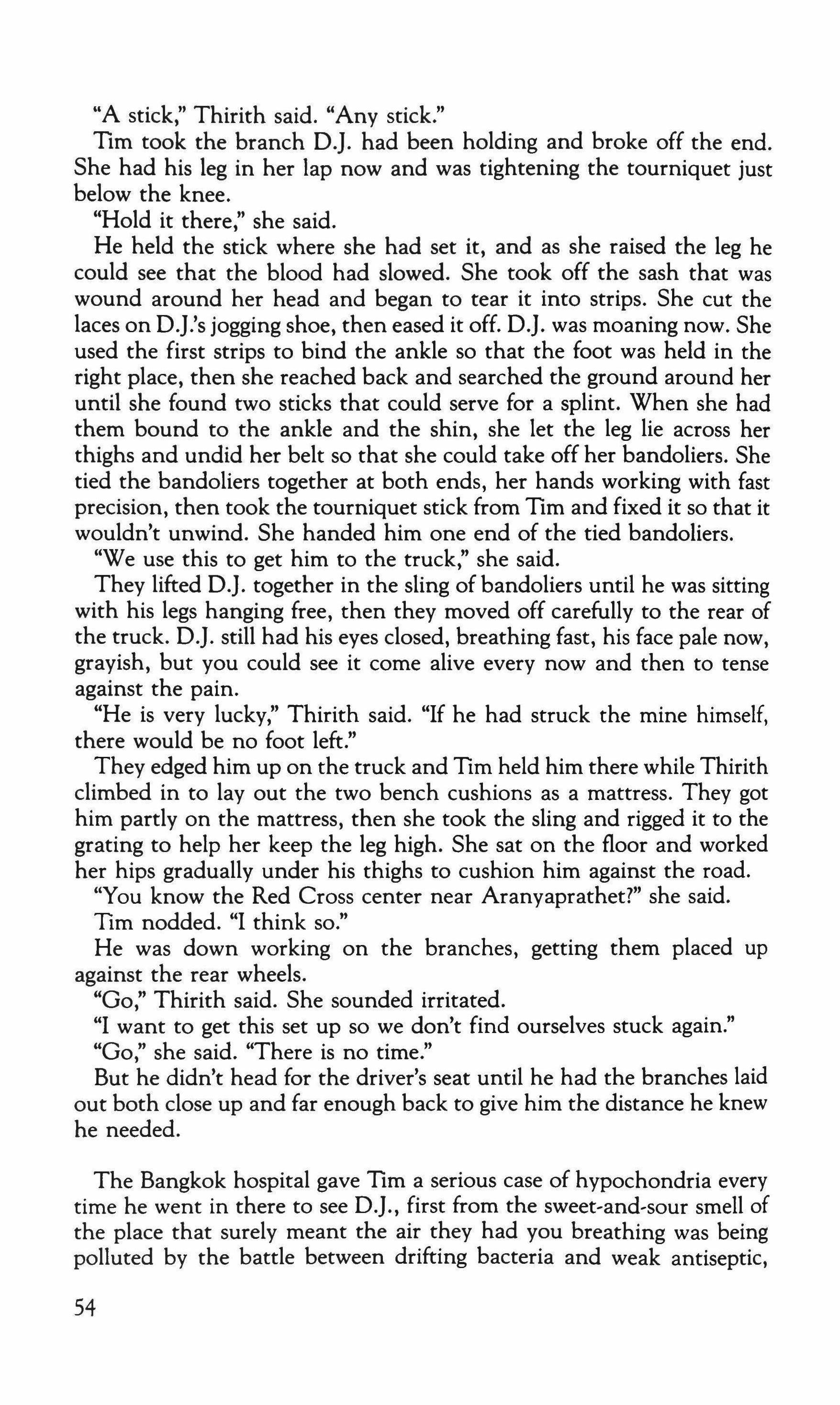
"A stick," Thirith said. "Any stick."
Tim took the branch D.}. had been holding and broke off the end. She had his leg in her lap now and was tightening the tourniquet just below the knee.
"Hold it there," she said.
He held the stick where she had set it, and as she raised the leg he could see that the blood had slowed. She took off the sash that was wound around her head and began to tear it into strips. She cut the laces on O.}.'s jogging shoe, then eased it off. D.}. was moaning now. She used the first strips to bind the ankle so that the foot was held in the right place, then she reached back and searched the ground around her until she found two sticks that could serve for a splint. When she had them bound to the ankle and the shin, she let the leg lie across her thighs and undid her belt so that she could take off her bandoliers. She tied the bandoliers together at both ends, her hands working with fast precision, then took the tourniquet stick from Tim and fixed it so that it wouldn't unwind. She handed him one end of the tied bandoliers.
"We use this to get him to the truck," she said.
They lifted D.}. together in the sling of bandoliers until he was sitting with his legs hanging free, then they moved off carefully to the rear of the truck. D.}. still had his eyes closed, breathing fast, his face pale now, grayish, but you could see it come alive every now and then to tense against the pain.
"He is very lucky," Thirith said. "If he had struck the mine himself, there would be no foot left."
They edged him up on the truck and Tim held him there while Thirith climbed in to layout the two bench cushions as a mattress. They got him partly on the mattress, then she took the sling and rigged it to the grating to help her keep the leg high. She sat on the floor and worked her hips gradually under his thighs to cushion him against the road.
"You know the Red Cross center near Aranyaprathet?" she said.
Tim nodded. "I think so."
He was down working on the branches, getting them placed up against the rear wheels.
"Go," Thirith said. She sounded irritated.
"I want to get this set up so we don't find ourselves stuck again."
"Go," she said. "There is no time."
But he didn't head for the driver's seat until he had the branches laid out both close up and far enough back to give him the distance he knew he needed.
The Bangkok hospital gave Tim a serious case of hypochondria every time he went in there to see D.}., first from the sweet-and-sour smell of the place that surely meant the air they had you breathing was being polluted by the battle between drifting bacteria and weak antiseptic,
54

then from the sense that every surface you came up against had planted germs on you belonging to diseases you couldn't name and probably nobody else would be able to recognize from the strange welts or shankers they would eventually produce after it was too late to do anything about it.
Still, as long as D.J. was in that ward, Tim wasn't about to let his squeamishness over health facilities in unfamiliar places keep him from seeing that the guy got three squares a day and a little friendly dialogue to keep the Bangkok blues from moving in on D.J. to undo what had so far proven to be really good morale for somebody in D.J.'s condition. Besides, this particular off-schedule visit was for his own benefit more than D.J.'s He needed solid advice from somebody who could understand his way of looking at things. And though he'd been pushed into promising his old man and the others down at the Embassy that he'd keep the question of Thirith's future entirely inside the family, as far as Tim was concerned, D.J. qualified as family after going out there into the jungle primarily for the old man's benefit and nearly losing his leg helping to get Thirith safely back across the border before he'd even had a chance to introduce himself properly to the woman he was rescuing.
Anyway, now that they had Thirith securely tucked away in the Bangkok Transit Center at least for the time being, again thanks to D.J. and his pliable contacts in the local refugee relief administration, Tim had to think through his next move very carefully. The plan his old man had finally outlined late during their session in the Embassy cafeteria was peculiar from one point of view but intriguing from another. Never in a thousand years would he have believed that somebody so generally uptight about his diplomatic responsibilities as that man was would come out with a proposition that might be legal in the strictest sense but surely wouldn't be regarded as ethical by anybody in the visa-issuing branch of the business, in fact could get the old man in trouble with some of his old friends in the consular section if they knew that the idea had actually come from him. But even more important, it meant that if they now went through with this marriage-of-convenience idea, and that was still the big "if," once Thirith had her green card and Tim was out of the arranged marriage, the old man was more or less committing himself to support Thirith after she was legally settled in the States and on her way into a new career. Otherwise, who was going to take care of her after she got the divorce the old man said she was supposed to agree to in advance? Considering the years it might take her to pick up the education she needed to make a go of it in the medical profession, however bright and ambitious she might be, that was no little thing the old man had in mind giving her, not much different from what he might give his own daughter if he had one.
But his problem right now was wondering how you get to a woman as independent as that with the proposition that she seriously consider
55
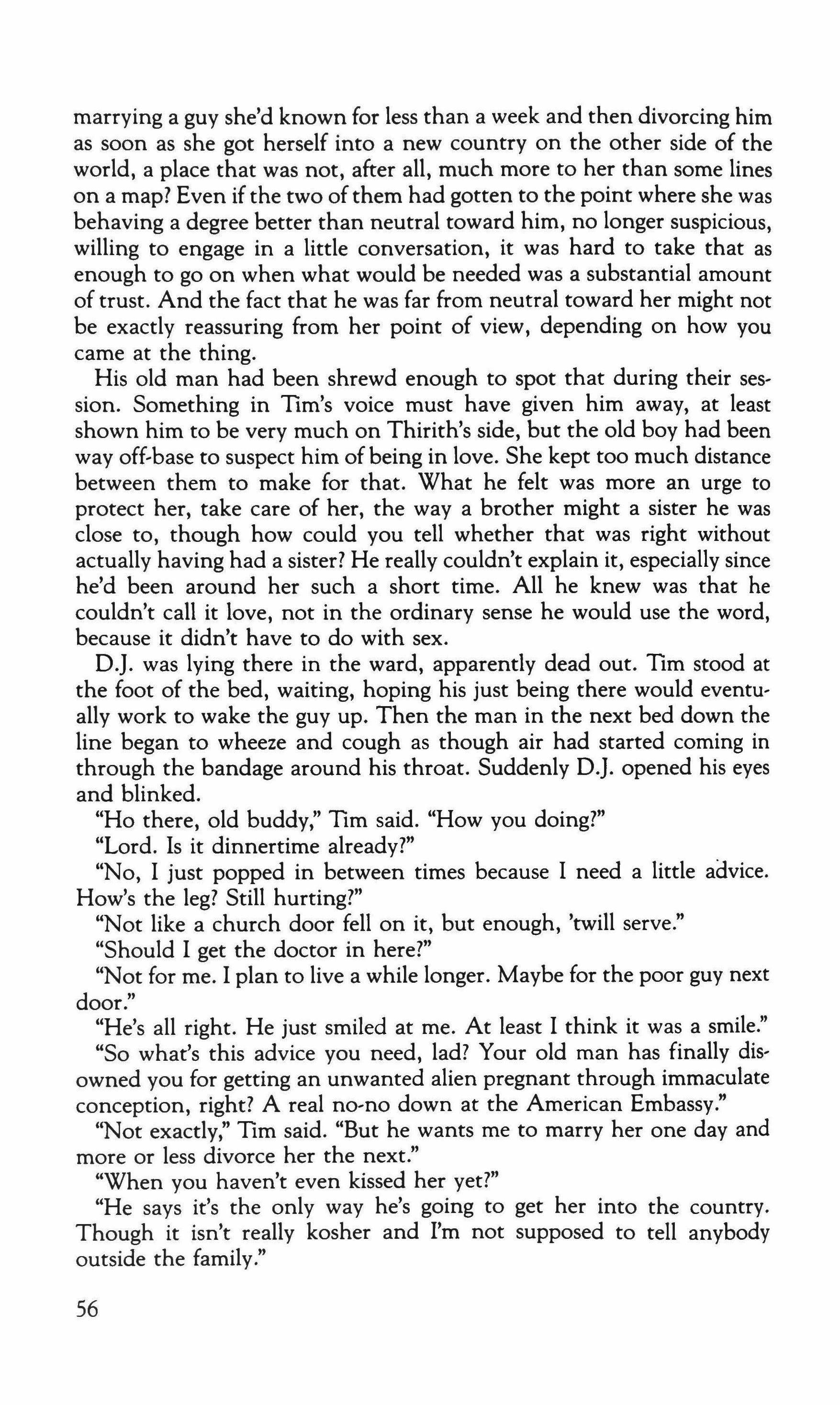
marrying a guy she'd known for less than a week and then divorcing him as soon as she got herself into a new country on the other side of the world, a place that was not, after all, much more to her than some lines on a map? Even if the two ofthem had gotten to the point where she was behaving a degree better than neutral toward him, no longer suspicious, willing to engage in a little conversation, it was hard to take that as enough to go on when what would be needed was a substantial amount of trust. And the fact that he was far from neutral toward her might not be exactly reassuring from her point of view, depending on how you came at the thing.
His old man had been shrewd enough to spot that during their session. Something in Tim's voice must have given him away, at least shown him to be very much on Thirith's side, but the old boy had been way off-base to suspect him ofbeing in love. She kept too much distance between them to make for that. What he felt was more an urge to protect her, take care of her, the way a brother might a sister he was close to, though how could you tell whether that was right without actually having had a sister? He really couldn't explain it, especially since he'd been around her such a short time. All he knew was that he couldn't call it love, not in the ordinary sense he would use the word, because it didn't have to do with sex.
D.}. was lying there in the ward, apparently dead out. 11m stood at the foot of the bed, waiting, hoping his just being there would eventually work to wake the guy up. Then the man in the next bed down the line began to wheeze and cough as though air had started coming in through the bandage around his throat. Suddenly D.}. opened his eyes and blinked.
"Ho there, old buddy," 11m said. "How you doing?"
"Lord. Is it dinnertime already?"
"No, I just popped in between times because I need a little advice. How's the leg? Still hurting?"
"Not like a church door fell on it, but enough, 'twill serve."
"Should I get the doctor in here?"
"Not for me. I plan to live a while longer. Maybe for the poor guy next door."
"He's all right. He just smiled at me. At least I think it was a smile."
"So what's this advice you need, lad? Your old man has finally disowned you for getting an unwanted alien pregnant through immaculate conception, right? A real no-no down at the American Embassy."
''Not exactly," 11m said. "But he wants me to marry her one day and more or less divorce her the next."
"When you haven't even kissed her yet?"
"He says it's the only way he's going to get her into the country. Though it isn't really kosher and I'm not supposed to tell anybody outside the family."
56

"Ah ha. Very interesting. So your old man isn't a pure red-white-andblue diplomat, after all."
"l never said he was."
"How do you more or less divorce somebody? Divorce is supposed to be terminal."
"The point is, you marry her here and then divorce her over there as soon as she's a legal resident. By agreement in advance."
"Thirith agrees to all this?" D.J. said. "That beautiful cold girl who saved my life?"
"Well, that's the thing," Tim said. "I don't see how I can get her to agree to an arranged marriage, let alone a divorce the minute she gets her green card in the States. The old man says you should have a clear understanding in advance so there's no misunderstanding later."
"Like Thirith maybe deciding after she's married that she's into a good thing, right? Got to put it on the line with these refugees."
"Yeah. That's the problem. I can't face spelling the whole thing out to her. She's bound to be offended."
"Well, how about getting your old man to marry and divorce her? He's had more experience handling these things."
"Be serious, will you? He's already married. At least as far as I know."
"Yeah, I forgot," D.J. said. "And to a legalized alien. Which I guess is as much as one American nuclear family can take."
"My mother's not an alien. She's a u.S. citizen."
"Well, she used to be an alien. Like some of my best friends. So no offense meant."
"Anyway, it looks to me like there's no way I can win this one," Tim said. "And we can't leave Thirith sitting in that barracks indefinitely, however cooperative your friends out there might be."
O.J. wiggled himself into a new position. His face showed the strain.
"Well, you don't have to tell her it's temporary," D.J. said.
"So what do I tell her?"
"You just tell her you want to marry her to get her a green card and let things develop from there."
"I couldn't do that," Tim said. "I'm not in love with her and she's not in love with me. Besides, myoid man probably wouldn't agree to go along."
"Your old man isn't marrying her You said he couldn't. And as for his going along"
"Can't you be serious for five minutes?"
"I'm deadly serious," D.J. said. "The point is, you're not marrying the girl to please your old man. You're a big boy now, remember?"
"I'm not marrying her to please myself either. I'm doing it to help Thirith."
"So what's your problem? Marry her and to hell with it. Leave the rest to the gods."
"I can't do that."
57

"Why not?"
"I don't know. Now you've got me confused. I just don't think I can."
"Get out of here," D.). said. "You're making my leg hurt."
"I mean she'd never agree to just marrying me. Trial basis or otherwise. I'm sure of that."
"Fine. So what's your problem?"
"The point is, we've got to do something."
"Well, do you want me to marry her? I've already damn near died for her, but I suppose the least I can do is offer to marry her on behalf of my bashful friend, especially after she ended up saving the best part of my leg."
"A real comedian."
"I have to be. Otherwise I may end up looking like our friend next door here. He's clearly lost his sense of humor. In fact it looks to me like he's dead."
"Should I call somebody?"
"No. If he's really dead they'll show up in a flash. They need the bed. But I think he's just bored with Western�Hemisphere marriage counseling."
D.). had his eyes closed now, and Tim could see his face fighting to keep the discomfort from showing. He went around the bed and put out his hand to brush D.).'s hair back off his wet forehead. D.). caught his hand and gave it a squeeze, but he didn't open his eyes.
Tim could feel the turn toward September in the changing light as he crossed over from the hospital to Ploenchit Road and put the sun at his back. The traffic looked as though it hadn't moved since he'd gone in there. He knew in general where Thirith was on Wireless Road from having looked in on her the day after they took her to the Transit Center in the ICRC van, but he'd come at it then from the opposite direction, the Nana Hotel side, so he figured he'd better not try any shortcuts getting down there or he might end up facing a klong that gave you no way out except through sewage and drifting plastic.
That first trip down Wireless Road had brought on a cheap thrill that still embarrassed him and that he'd just as soon wipe out with a second clean go at it. What had cut into him unexpectedly was a sensation from the old gone life he'd known as a spoiled Foreign Service brat when you'd go down Embassy Row in one post or another and feel that you belonged to a privileged society that couldn't be touched by any foreign disturbance that might be going on around you, what at a later point you might see coming out of poverty or injustice or imposed corruption but not then, because there was always somebody at hand whose job it was to protect you from any heavy local realities and there was always a safe way out to a better country, namely your own. And even though you were a kid, people you didn't know treated you like a princeling, all respect and attention for no reason you could understand at first but
58

grew to accept anyway. You were an American. That was justification enough.
Of course you eventually came to see that all the attention was unearned, the privilege phony, just a product of where you happened to have been born and where you happened to be at that time. And soon enough you found out that any so-called status that wasn't based on something you yourself had done or at least could be thought to do wouldn't hold up for a minute in the street. But the street was back home, where they might start you out thinking you were something special from the day you were born, inheritor from your forefathers of the inalienable right to this, that, and the other, but where it took only a few months of unemployment and a continuing diet of pizza slices to bring some reality into that great dream.
Abroad it was sometimes more difficult to see things the way they were. And some of those who went overseas to work for the government or business came on weird for Americans with inalienable rights. When they found themselves in a place where the local people hardly had any rights at all and had never heard of the right to pursue happiness, or who couldn't make it any sort of way no matter how much they might try, these American types got defensive or something, closed themselves off where they could eat their own flown,in food and go to their own restricted schools and mix only with their own kind. And because they were basically good people at heart, some of them at least, they would begin to feel guilty about the way they looked down on the foreigners around them, even though they themselves were actually the foreigners. They'd try to get their government to reorganize the place they were in so that it became more like the way things were back home, introduce whatever it was that made their country "God's country." And when they saw that most people abroad didn't really want to become other than what they already were and had been for years, that turned the local foreigners back into a threat of some kind.
As he walked, he left the large unanswerable questions behind and came to the specific one-what was he going to do about this beautiful displaced Cambodian person waiting up ahead for some kind of answer regarding her future, now that he'd pulled her into a future which she hadn't really asked for herself and which others were still trying to arrange for her. He decided he'd just lay it all out in the open. He'd go in there and get D.J.'s friend Prak Chim to call her over to his office, and when she was settled in there comfortably on a chair, he would put the issue to her straight. And no mention of the old man at that point. D.J. was right about that, it had to be all Tim's baby from now on. He would simply spell out the options: if she wanted to stay in Thailand to train herself, he might be able to work out something through his contacts at the Embassy and elsewhere, but once he'd done that, she would be on her own, because he had places to go, his own education to worry about,
59
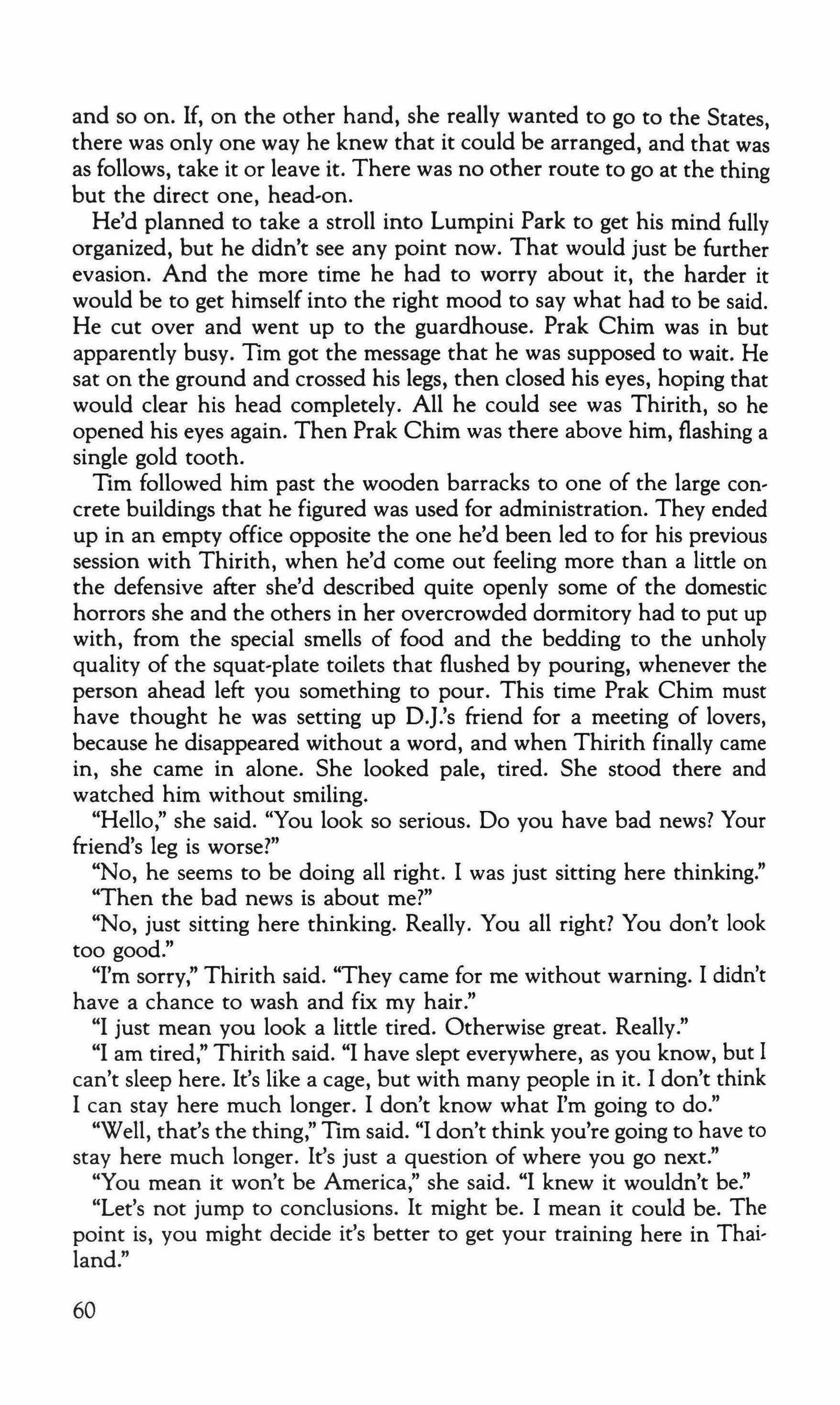
and so on. If, on the other hand, she really wanted to go to the States, there was only one way he knew that it could be arranged, and that was as follows, take it or leave it. There was no other route to go at the thing but the direct one, head-on.
He'd planned to take a stroll into Lumpini Park to get his mind fully organized, but he didn't see any point now. That would just be further evasion. And the more time he had to worry about it, the harder it would be to get himself into the right mood to say what had to be said. He cut over and went up to the guardhouse. Prak Chim was in but apparently busy. Tim got the message that he was supposed to wait. He sat on the ground and crossed his legs, then closed his eyes, hoping that would clear his head completely. All he could see was Thirith, so he opened his eyes again. Then Prak Chim was there above him, flashing a single gold tooth.
Tim followed him past the wooden barracks to one of the large concrete buildings that he figured was used for administration. They ended up in an empty office opposite the one he'd been led to for his previous session with Thirith, when he'd come out feeling more than a little on the defensive after she'd described quite openly some of the domestic horrors she and the others in her overcrowded dormitory had to put up with, from the special smells of food and the bedding to the unholy quality of the squat-plate toilets that flushed by pouring, whenever the person ahead left you something to pour. This time Prak Chim must have thought he was setting up D.l.'s friend for a meeting of lovers, because he disappeared without a word, and when Thirith finally came in, she came in alone. She looked pale, tired. She stood there and watched him without smiling.
"Hello," she said. "You look so serious. Do you have bad news? Your friend's leg is worse?"
"No, he seems to be doing all right. I was just sitting here thinking."
"Then the bad news is about me?"
"No, just sitting here thinking. Really. You all right? You don't look too good."
"I'm sorry," Thirith said. "They came for me without warning. I didn't have a chance to wash and fix my hair."
"I just mean you look a little tired. Otherwise great. Really."
"I am tired," Thirith said. "I have slept everywhere, as you know, but I can't sleep here. It's like a cage, but with many people in it. I don't think I can stay here much longer. I don't know what I'm going to do."
"Well, that's the thing," Tim said. "I don't think you're going to have to stay here much longer. It's just a question of where you go next."
"You mean it won't be America," she said. "I knew it wouldn't be."
"Let's not jump to conclusions. It might be. I mean it could be. The point is, you might decide it's better to get your training here in Thailand."
60
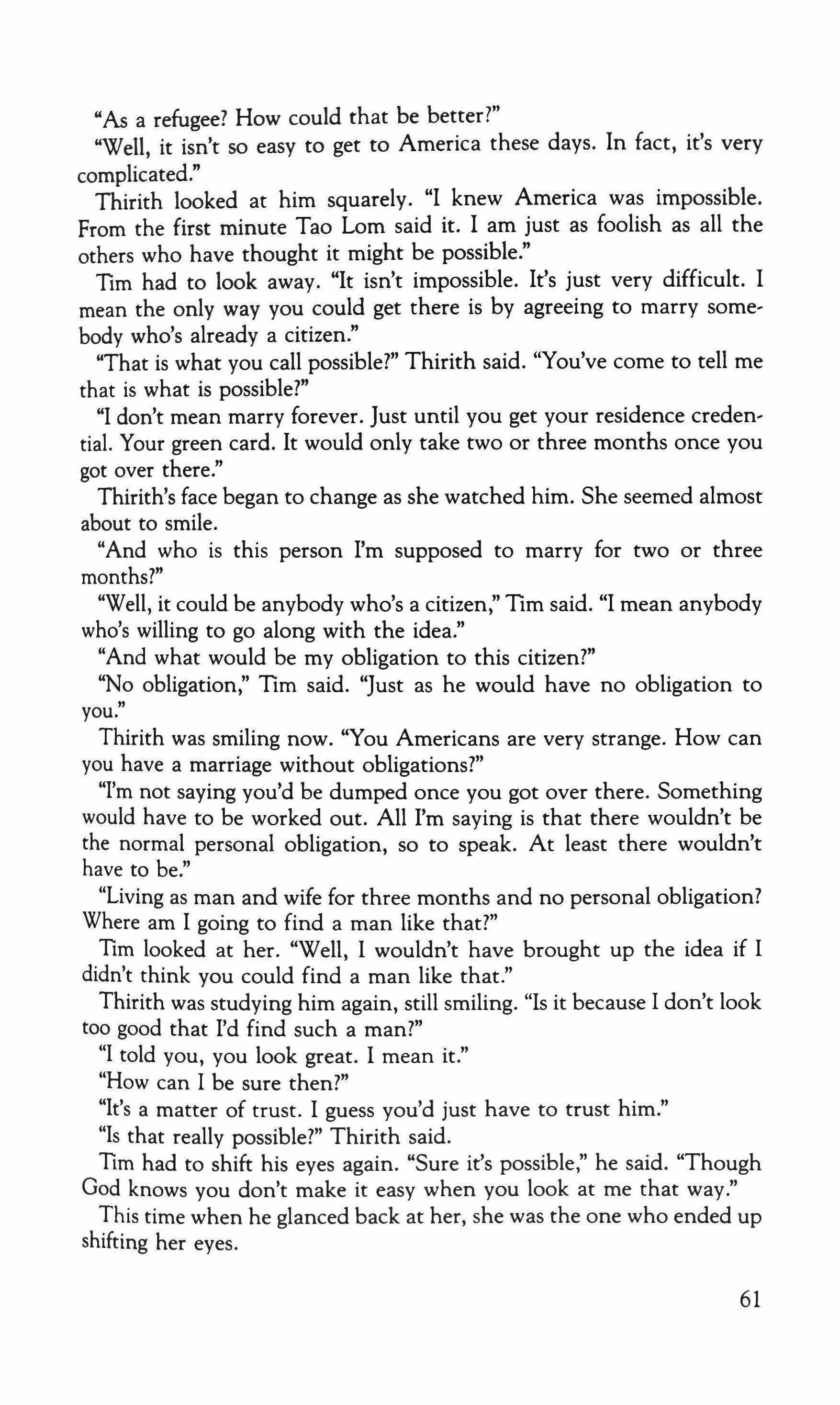
"As a refugee? How could that be better?"
"Well, it isn't so easy to get to America these days. In fact, it's very complicated."
Thirith looked at him squarely. "I knew America was impossible. From the first minute Tao Lorn said it. I am just as foolish as all the others who have thought it might be possible."
11m had to look away. "It isn't impossible. It's just very difficult. I mean the only way you could get there is by agreeing to marry some' body who's already a citizen."
"That is what you call possible?" Thirith said. "You've come to tell me that is what is possible?"
"I don't mean marry forever. Just until you get your residence credential. Your green card. It would only take two or three months once you got over there."
Thirith's face began to change as she watched him. She seemed almost about to smile.
"And who is this person I'm supposed to marry for two or three months?"
"Well, it could be anybody who's a citizen," Tim said. "I mean anybody who's willing to go along with the idea."
"And what would be my obligation to this citizen?"
"No obligation," Tim said. "Just as he would have no obligation to you."
Thirith was smiling now. "You Americans are very strange. How can you have a marriage without obligations?"
"I'm not saying you'd be dumped once you got over there. Something would have to be worked out. All I'm saying is that there wouldn't be the normal personal obligation, so to speak. At least there wouldn't have to be."
"Living as man and wife for three months and no personal obligation? Where am I going to find a man like that?"
Tim looked at her. "Well, I wouldn't have brought up the idea if I didn't think you could find a man like that."
Thirith was studying him again, still smiling. "Is it because I don't look too good that I'd find such a man?"
"I told you, you look great. I mean it."
"How can I be sure then?"
"It's a matter of trust. I guess you'd just have to trust him."
"Is that really possible?" Thirith said.
Tim had to shift his eyes again. "Sure it's possible," he said. "Though God knows you don't make it easy when you look at me that way."
This time when he glanced back at her, she was the one who ended up shifting her eyes.
61
The Dead Alive and Busy
Alan Shapiro
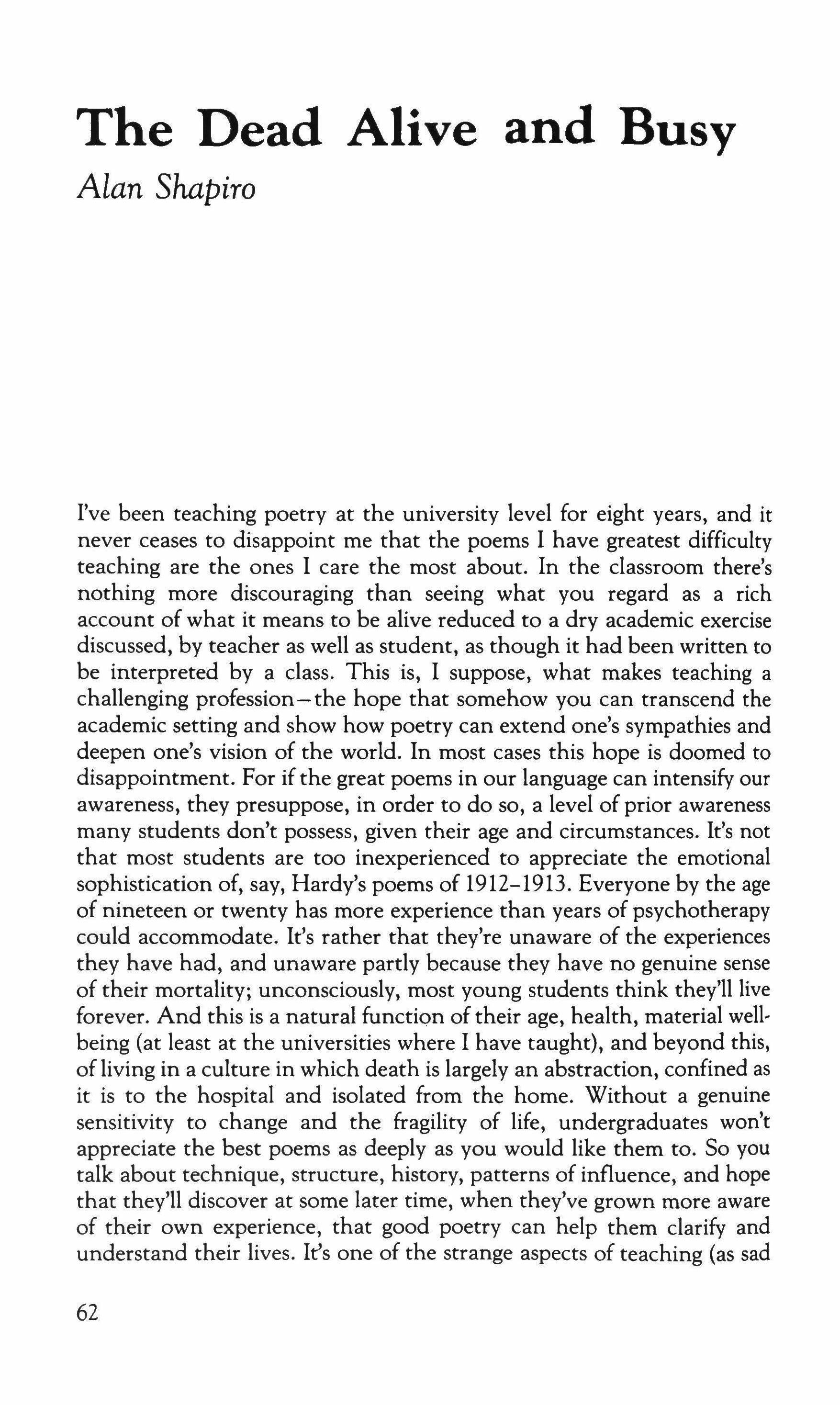
I've been teaching poetry at the university level for eight years, and it never ceases to disappoint me that the poems I have greatest difficulty teaching are the ones I care the most about. In the classroom there's nothing more discouraging than seeing what you regard as a rich account of what it means to be alive reduced to a dry academic exercise discussed, by teacher as well as student, as though it had been written to be interpreted by a class. This is, I suppose, what makes teaching a challenging profession - the hope that somehow you can transcend the academic setting and show how poetry can extend one's sympathies and deepen one's vision of the world. In most cases this hope is doomed to disappointment. For if the great poems in our language can intensify our awareness, they presuppose, in order to do so, a level of prior awareness many students don't possess, given their age and circumstances. It's not that most students are too inexperienced to appreciate the emotional sophistication of, say, Hardy's poems of 1912-1913. Everyone by the age of nineteen or twenty has more experience than years of psychotherapy could accommodate. It's rather that they're unaware of the experiences they have had, and unaware partly because they have no genuine sense of their mortality; unconsciously, most young students think they'll live forever. And this is a natural function of their age, health, material wellbeing (at least at the universities where I have taught), and beyond this, ofliving in a culture in which death is largely an abstraction, confined as it is to the hospital and isolated from the home. Without a genuine sensitivity to change and the fragility of life, undergraduates won't appreciate the best poems as deeply as you would like them to. So you talk about technique, structure, history, patterns of influence, and hope that they'll discover at some later time, when they've grown more aware of their own experience, that good poetry can help them clarify and understand their lives. It's one of the strange aspects of teaching (as sad
62
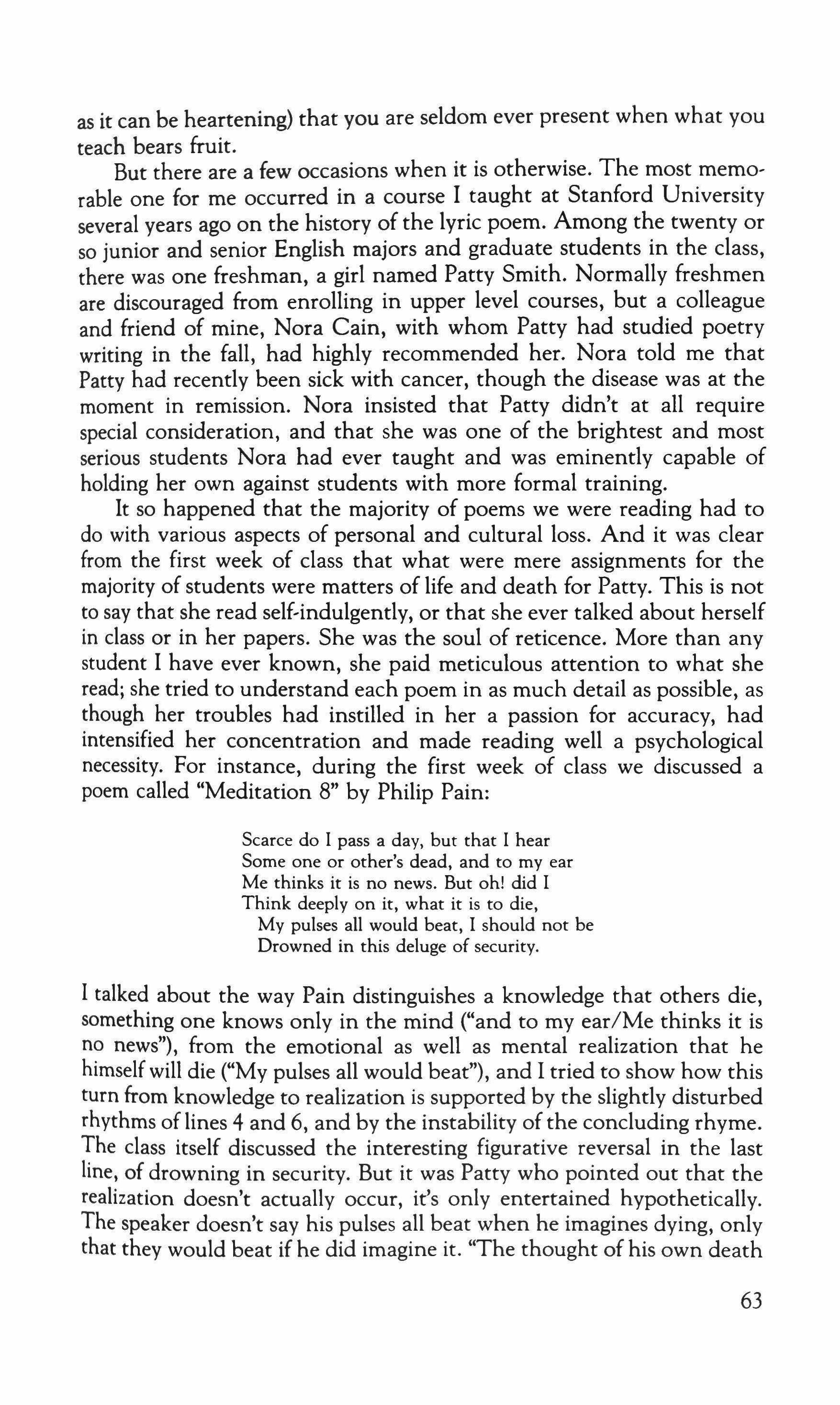
as it can be heartening) that you are seldom ever present when what you teach bears fruit.
But there are a few occasions when it is otherwise. The most memo, rable one for me occurred in a course I taught at Stanford University several years ago on the history of the lyric poem. Among the twenty or so junior and senior English majors and graduate students in the class, there was one freshman, a girl named Patty Smith. Normally freshmen are discouraged from enrolling in upper level courses, but a colleague and friend of mine, Nora Cain, with whom Patty had studied poetry writing in the fall, had highly recommended her. Nora told me that Patty had recently been sick with cancer, though the disease was at the moment in remission. Nora insisted that Patty didn't at all require special consideration, and that she was one of the brightest and most serious students Nora had ever taught and was eminently capable of holding her own against students with more formal training.
It so happened that the majority of poems we were reading had to do with various aspects of personal and cultural loss. And it was clear from the first week of class that what were mere assignments for the majority of students were matters of life and death for Patty. This is not to say that she read self-indulgently, or that she ever talked about herself in class or in her papers. She was the soul of reticence. More than any student I have ever known, she paid meticulous attention to what she read; she tried to understand each poem in as much detail as possible, as though her troubles had instilled in her a passion for accuracy, had intensified her concentration and made reading well a psychological necessity. For instance, during the first week of class we discussed a poem called "Meditation 8" by Philip Pain:
Scarce do I pass a day, but that I hear Some one or other's dead, and to my ear Me thinks it is no news. But oh! did I Think deeply on it, what it is to die, My pulses all would beat, I should not be Drowned in this deluge of security.
I talked about the way Pain distinguishes a knowledge that others die, something one knows only in the mind ("and to my ear/Me thinks it is no news"), from the emotional as well as mental realization that he himself will die ("My pulses all would beat"), and I tried to show how this turn from knowledge to realization is supported by the slightly disturbed rhythms of lines 4 and 6, and by the instability of the concluding rhyme. The class itself discussed the interesting figurative reversal in the last line, of drowning in security. But it was Patty who pointed out that the realization doesn't actually occur, it's only entertained hypothetically. The speaker doesn't say his pulses all beat when he imagines dying, only that they would beat if he did imagine it. "The thought of his own death
63

is so frightening," she said, "that he can only imagine himself imagining what it is to die. He can't get any closer."
The other poem I remember Patty responding deeply to in the first week of class was "The Oxen" by Thomas Hardy:
Christmas Eve, and twelve of the clock. "Now they are all on their knees," An elder said as we sat in a flock By the embers in hearthside ease.
We pictured the meek mild creatures where They dwelt in their strawy pen, Nor did it occur to one of us there
To doubt they were kneeling then.
So fair a fancy few would weave In these years! Yet, I feel, If someone said on Christmas Eve, "Come; see the oxen kneel,
"In the lonely barton by yonder coomb Our childhood used to know," I should go with him in the gloom, Hoping it might be so.
Patty had two perceptions about this poem. When another student characterized the speaker's transition from remembered childhood innocence and faith to adult skepticism, Patty added that what's interesting about the skepticism is that it's expressed in terms of a longing to believe. She could understand, she said, someone not having faith, but she couldn't understand someone not wanting faith. She also noticed how as a child the speaker was content merely to picture the oxen kneeling in the barton, but how as an adult he imagines himselfneeding to go outside to check. Even the hopeful adult, in other words, requires empirical evidence whereas the child takes on faith what he is told.
No one would describe these poems as uplifting or consoling in what they say. Yet I think they offered consolation to Patty not just by reflecting and clarifying what she must have felt at times, but also by breaking the solitude such feelings create. Hence the poems that consoled her most weren't necessarily the most optimistic or affirmative. What she needed, to use Kenneth Burke's terms, were poems that named her situation realistically. Patty would have perfectly understood Burke's notion of literature as "equipment for living," as strategies for dealing with experience: Great literature, he says, "singles out a pattern of experience that is sufficiently representative of our social structure, that recurs sufficiently often mutandis mutatis, for people to 'need a word for it' and to adopt an attitude towards it." And this demands of course unflinching clarity: "One must size things up properly. One cannot accurately know how things will be, what is promising and what is menacing,
64
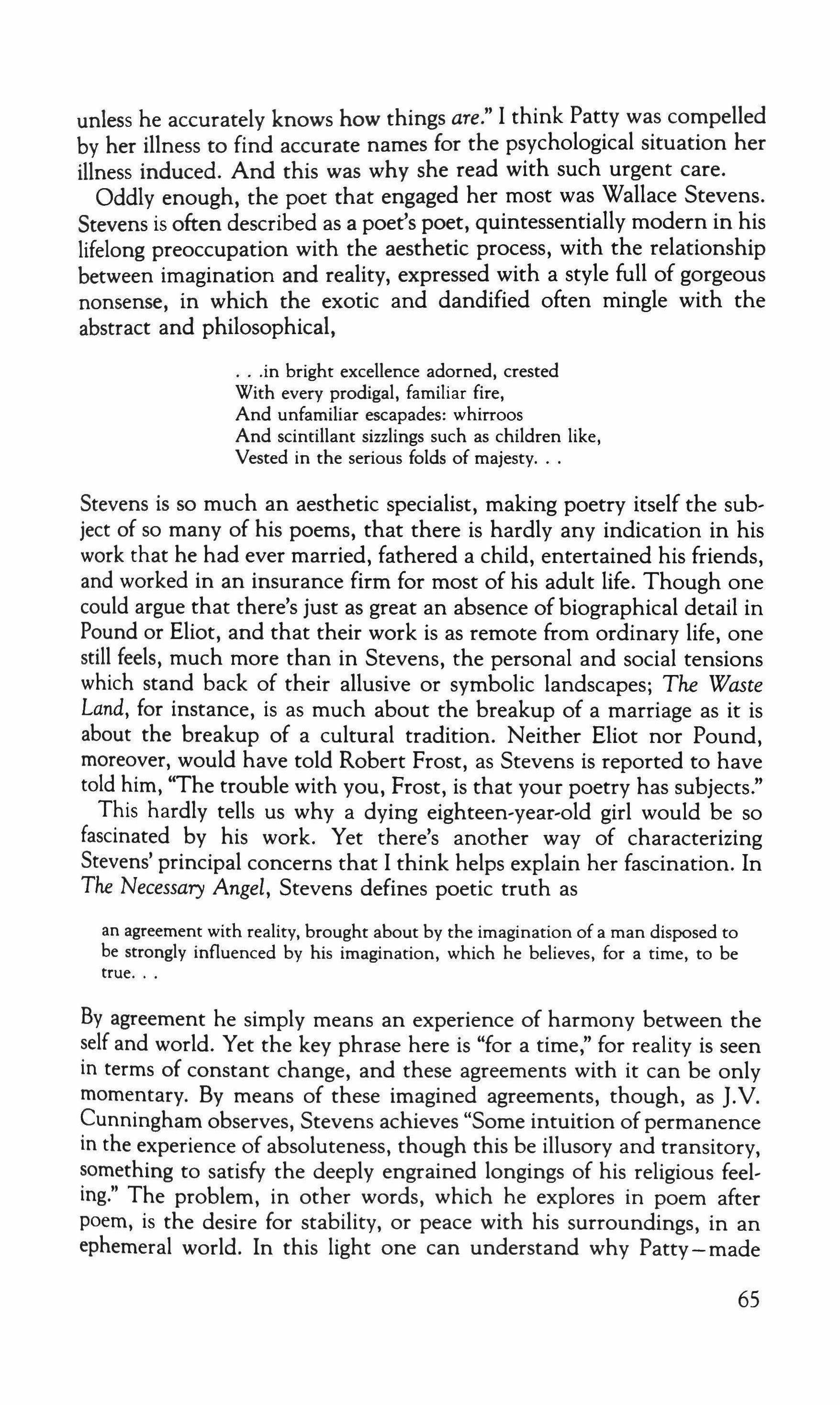
unless he accurately knows how things are." I think Patty was compelled by her illness to find accurate names for the psychological situation her illness induced. And this was why she read with such urgent care.
Oddly enough, the poet that engaged her most was Wallace Stevens. Stevens is often described as a poet's poet, quintessentially modern in his lifelong preoccupation with the aesthetic process, with the relationship between imagination and reality, expressed with a style full of gorgeous nonsense, in which the exotic and dandified often mingle with the abstract and philosophical,
in bright excellence adorned, crested With every prodigal, familiar fire, And unfamiliar escapades: whirroos And scintillant sizzlings such as children like, Vested in the serious folds of majesty
Stevens is so much an aesthetic specialist, making poetry itself the subject of so many of his poems, that there is hardly any indication in his work that he had ever married, fathered a child, entertained his friends, and worked in an insurance firm for most of his adult life. Though one could argue that there's just as great an absence of biographical detail in Pound or Eliot, and that their work is as remote from ordinary life, one still feels, much more than in Stevens, the personal and social tensions which stand back of their allusive or symbolic landscapes; The Waste Land, for instance, is as much about the breakup of a marriage as it is about the breakup of a cultural tradition. Neither Eliot nor Pound, moreover, would have told Robert Frost, as Stevens is reported to have told him, "The trouble with you, Frost, is that your poetry has subjects."
This hardly tells us why a dying eighteen-year-old girl would be so fascinated by his work. Yet there's another way of characterizing Stevens' principal concerns that I think helps explain her fascination. In The Necessary Angel, Stevens defines poetic truth as
an agreement with reality, brought about by the imagination of a man disposed to be strongly influenced by his imagination, which he believes, for a time, to be true
By agreement he simply means an experience of harmony between the self and world. Yet the key phrase here is "for a time," for reality is seen in terms of constant change, and these agreements with it can be only momentary. By means of these imagined agreements, though, as J.v. Cunningham observes, Stevens achieves "Some intuition of permanence in the experience of absoluteness, though this be illusory and transitory, something to satisfy the deeply engrained longings of his religious feeling." The problem, in other words, which he explores in poem after poem, is the desire for stability, or peace with his surroundings, in an ephemeral world. In this light one can understand why Patty - made
65
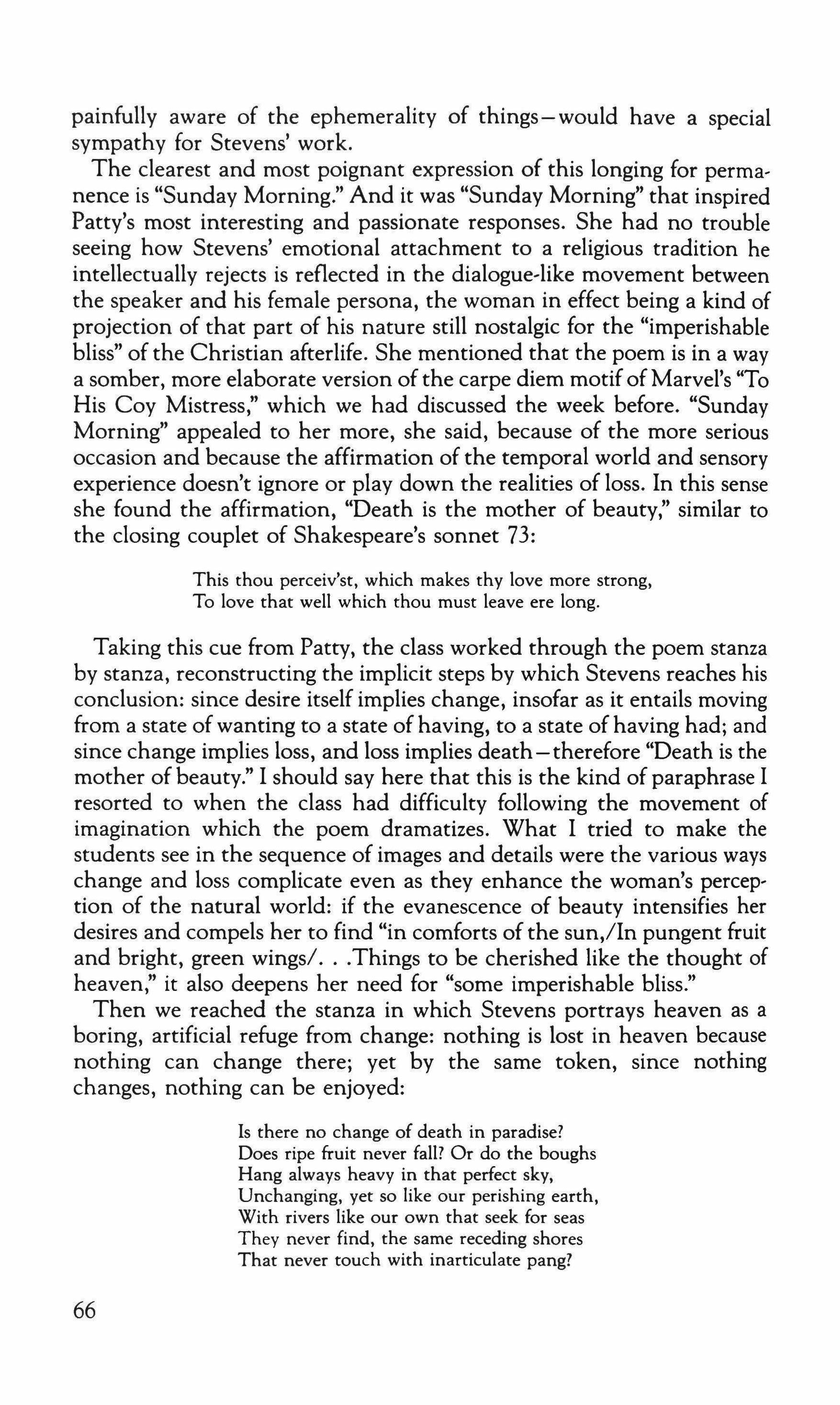
painfully aware of the ephemerality of things-would have a special sympathy for Stevens' work.
The clearest and most poignant expression of this longing for permanence is "Sunday Morning." And it was "Sunday Morning" that inspired Patty's most interesting and passionate responses. She had no trouble seeing how Stevens' emotional attachment to a religious tradition he intellectually rejects is reflected in the dialogue-like movement between the speaker and his female persona, the woman in effect being a kind of projection of that part of his nature still nostalgic for the "imperishable bliss" of the Christian afterlife. She mentioned that the poem is in a way a somber, more elaborate version of the carpe diem motifofMarvel's "To His Coy Mistress," which we had discussed the week before. "Sunday Morning" appealed to her more, she said, because of the more serious occasion and because the affirmation of the temporal world and sensory experience doesn't ignore or play down the realities of loss. In this sense she found the affirmation, "Death is the mother of beauty," similar to the closing couplet of Shakespeare's sonnet 73:
This thou perceiv'st, which makes thy love more strong, To love that well which thou must leave ere long.
Taking this cue from Patty, the class worked through the poem stanza by stanza, reconstructing the implicit steps by which Stevens reaches his conclusion: since desire itself implies change, insofar as it entails moving from a state of wanting to a state of having, to a state of having had; and since change implies loss, and loss implies death-therefore "Death is the mother of beauty." I should say here that this is the kind of paraphrase I resorted to when the class had difficulty following the movement of imagination which the poem dramatizes. What I tried to make the students see in the sequence of images and details were the various ways change and loss complicate even as they enhance the woman's perception of the natural world: if the evanescence of beauty intensifies her desires and compels her to find "in comforts of the sun,lIn pungent fruit and bright, green wings/ Things to be cherished like the thought of heaven," it also deepens her need for "some imperishable bliss."
Then we reached the stanza in which Stevens portrays heaven as a boring, artificial refuge from change: nothing is lost in heaven because nothing can change there; yet by the same token, since nothing changes, nothing can be enjoyed:
Is there no change of death in paradise? Does ripe fruit never fall? Or do the boughs Hang always heavy in that perfect sky, Unchanging, yet so like our perishing earth, With rivers like our own that seek for seas They never find, the same receding shores That never touch with inarticulate pang?
66

Why set the pear upon those river-banks Or spice the shores with odors of the plum? Alas, that they should wear our colors there, The silken weavings of our afternoons, And pick the strings of our insipid lutes!
Death is the mother of beauty, mystical, Within whose burning bosom we devise Our earthly mothers waiting, sleeplessly.
But Patty quarreled with this stanza. She said she found it rhetorically heavy-handed in that Stevens presents one particular vision of paradise as the only possible one. "But there are other ways of imagining heaven:' she said. "Heaven could be a place where there's change without loss, though in this world that's difficult to imagine." When I asked her to elaborate, she came up with a musical analogy: "When we listen to a piece of music, each note disappears into the next as soon as we hear it. But in heaven each note would go on playing; change there would be addition, not subtraction, as it is here." She went on to say that if Stevens had allowed the woman to be a more formidable opponent she might have countered his vision with this one. Yet even here she could see that Stevens betrays a deep attachment to the idea of an afterlife. His rejection is by no means simple or unequivocal. How else interpret the plaintive cry-"Alas, that they should wear our colors there"-except as meaning, why are we still compelled to project an eternal world in which the pleasures change makes possible (the fruit which only time can ripen, "the silken weavings of our afternoons") are dissociated from the losses change inevitably entails? The plaintive tone belies how deeply ingrained our need for imperishable bliss is; it tacitly acknowledges how difficult it is to affirm a religion ofchange, to accept that change and the temporal world must be the ultimate "measures destined for her soul."
This, Patty said, was why she loved the poem, despite her quarrel with it, and why she found the last stanza, in particular, so moving, especially in the way it shows how indivisible are beauty and evanescence, and in the way the affirmation of the last phrase, "on extended wings," is qualified and yet required by the darkness into which the pigeons sink:
She hears, upon that water without sound, A voice that cries, "The tomb in Palestine Is not the porch of spirits lingering. It is the grave of Jesus where he lay."
We live in an old chaos of the sun, Or old dependency of day and night, Or island solitude, unsponsored, free, Of that wide water, inescapable. Deer walk upon our mountains, and the quail Whistle about us their spontaneous cries; Sweet berries ripen in the wilderness; And, in the isolation of the sky, At evening, casual flocks of pigeons make
67

Ambiguous undulations as they sink, Downward to darkness, on extended wings.
It occurs to me that there are many bad or undistinguished poems that express essentially the same ideas, that exhort us to sieze the day and make the full life our response to the fact of death. Would these poems have solaced Patty? Would they have elicited from her as much perception? I don't think so, and for this reason: such poems fail in so far as they fail to recreate stylistically, in the formal tactics of expression, the vital apprehension of the physical world they advocate. Moreover, in so far as stylistic mastery is the formal extension of emotional and intellectual intensity, we can speculate that "Sunday Morning" would have meant more to Patty than lesser poems on the same theme because it comprehends more, because it attains, in Burke's words, "a full moral act by attaining a perspective atop all the conflicts of attitude," a perspective which the particulars of style reflect.
The cancer returned shortly after the winter quarter; byJuly Patty was dead. Since then I've taught "Sunday Morning" countless times at Northwestern University, where I now teach. Last year a student in one of my classes came from Patty's hometown and was a friend of her younger sister Sandy. She told Sandy I had mentioned Patty in class, and Sandy in turn told her parents, who then wrote to me asking for details of the story. They also sent along a manuscript of Patty's poetry in which this poem appears, untitled:
The memory of drugged and pain-filled hours Adds urgency to every sunlit day When I, frantic, gather loads of flowers Only to watch the bright blooms fade away. The thought of death turns normal days divine, Sweetens every kiss and conversation. I want to make each waking moment mine And close my eyes with haunted hesitation. Still, sleep alone dissolves away the pain, I dream for days in dizzy whirls of grey and stumble from my nauseous stupor sane Yet aching for the hours drugged away.
I mourn for life too beautiful to leave; Thank God I have so much for which to grieve.
Despite the routine phrasing and the poeticisms here and there, the poem is moving and complex, especially the closing couplet. Clearly one can see the influence of Stevens and Shakespeare. And yet the poem is as much indebted to her own experience as it is to her reading. It is as much a young girl's attempt to face her own mortality as it is an act of literary homage. Teachers, myself included, have a tendency at times to talk as though all poems were merely the product of other poems,
68
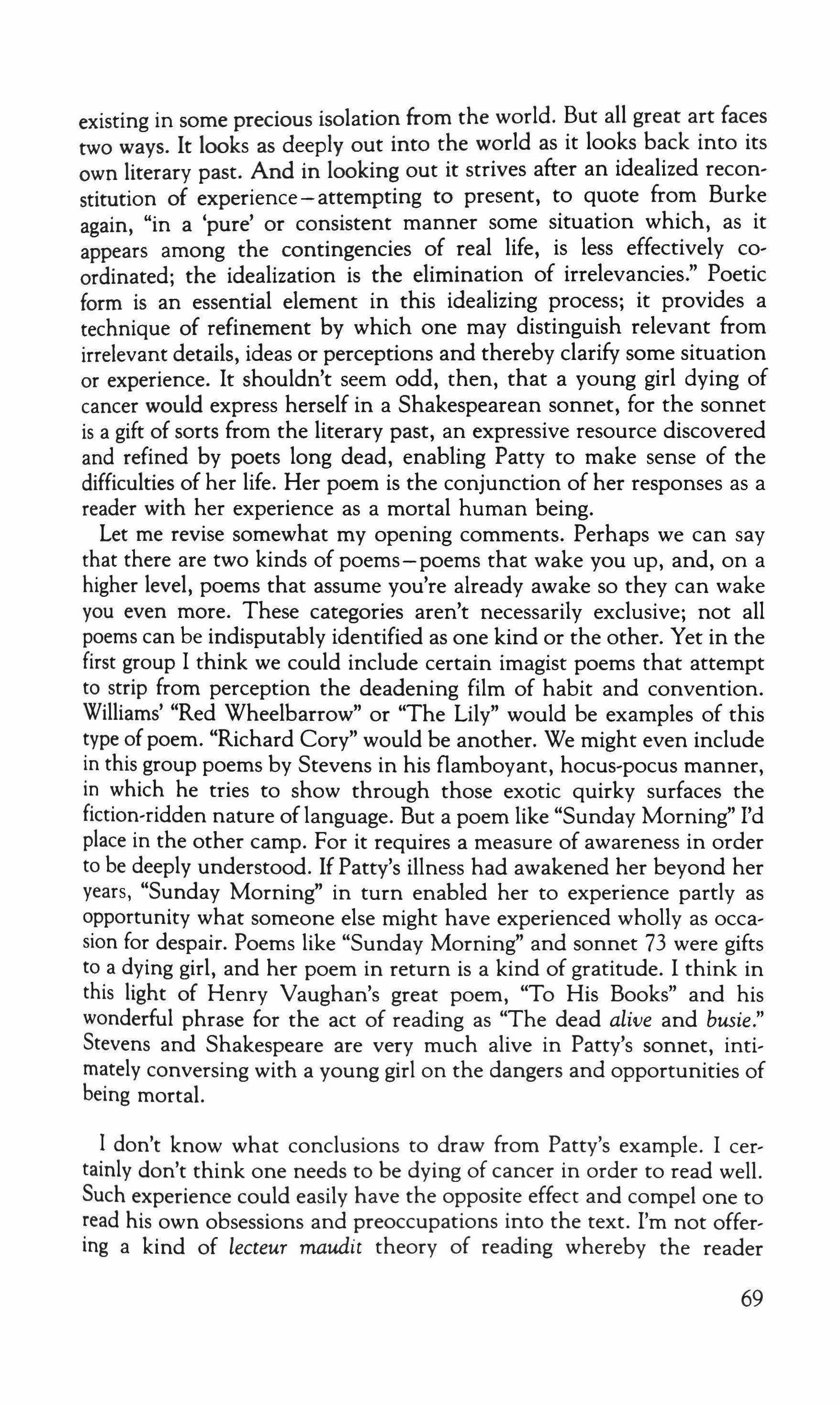
existing in some precious isolation from the world. But all great art faces two ways. It looks as deeply out into the world as it looks back into its own literary past. And in looking out it strives after an idealized reconstitution of experience-attempting to present, to quote from Burke again, "in a 'pure' or consistent manner some situation which, as it appears among the contingencies of real life, is less effectively co' ordinated; the idealization is the elimination of irrelevancies." Poetic form is an essential element in this idealizing process; it provides a technique of refinement by which one may distinguish relevant from irrelevant details, ideas or perceptions and thereby clarify some situation or experience. It shouldn't seem odd, then, that a young girl dying of cancer would express herself in a Shakespearean sonnet, for the sonnet is a gift of sorts from the literary past, an expressive resource discovered and refined by poets long dead, enabling Patty to make sense of the difficulties of her life. Her poem is the conjunction of her responses as a reader with her experience as a mortal human being.
Let me revise somewhat my opening comments. Perhaps we can say that there are two kinds of poems-poems that wake you up, and, on a higher level, poems that assume you're already awake so they can wake you even more. These categories aren't necessarily exclusive; not all poems can be indisputably identified as one kind or the other. Yet in the first group I think we could include certain imagist poems that attempt to strip from perception the deadening film of habit and convention. Williams' "Red Wheelbarrow" or "The Lily" would be examples of this type of poem. "Richard Cory" would be another. We might even include in this group poems by Stevens in his flamboyant, hocus-pocus manner, in which he tries to show through those exotic quirky surfaces the fiction-ridden nature of language. But a poem like "Sunday Morning" I'd place in the other camp. For it requires a measure of awareness in order to be deeply understood. If Patty's illness had awakened her beyond her years, "Sunday Morning" in turn enabled her to experience partly as opportunity what someone else might have experienced wholly as occasian for despair. Poems like "Sunday Morning" and sonnet 73 were gifts to a dying girl, and her poem in return is a kind of gratitude. I think in this light of Henry Vaughan's great poem, "To His Books" and his wonderful phrase for the act of reading as "The dead alive and busie." Stevens and Shakespeare are very much alive in Patty's sonnet, inti, mately conversing with a young girl on the dangers and opportunities of being mortal.
I don't know what conclusions to draw from Patty's example. I certainly don't think one needs to be dying of cancer in order to read well. Such experience could easily have the opposite effect and compel one to read his own obsessions and preoccupations into the text. I'm not offer, ing a kind of lecteur maudit theory of reading whereby the reader
69

requires himself to suffer cancer or divorce or alcoholism before he can appreciate the poet's work. And yet I think the lecteur maudit is an exaggeration of a truth which Patty illustrates and which we sometimes lose sight of in the classroom. Perhaps there's a distinction to be made between usable and exploitable experience. Just as the poete maudit exploits his life, inviting catastrophe for inspiration, so also the lecteur maudit exploits his by making his problems an excuse for reading selfindulgently, for reducing the text into a mirror that gives back only what he wants to see and not necessarily what's there. Our particular experience and temperament, for instance, may predispose us to interpret a man hurrying into a waiting car as a bank robber, or businessman late for an appointment with his shrink, or any number of possibilities which closer examination and thought would corroborate or refute. The good reader would use his own life when reading, would draw on it as a basis of sympathy, but also by enabling the reader to find expression for what he or she already felt but could not articulate. Because the feeling or idea was unarticulated, it remained unknown to its possessor, till the poem released it.
If all great art is symbolic of a kind of moral plenitude, of conflicting attitudes and impulses explored and worked through toward some ideal clarity, the act of reading is itself a model of ideal human relations, aspiring toward a perfect attentiveness in which emotional possession and intellectual comprehension - what experience conditions us to see and what the text insists we see-inform and alter one another. Reading well, in other words, is symbolic loving. If most students, still too naive to integrate their own experience into their conception of themselves and others, haven't yet discovered this, perhaps we can prepare them for this discovery by cultivating an intelligent enthusiasm for the poems that attempt to wake them, and when we can, for the poems that assume they are already awake.
70
Three Poems
fiayden C=arruth
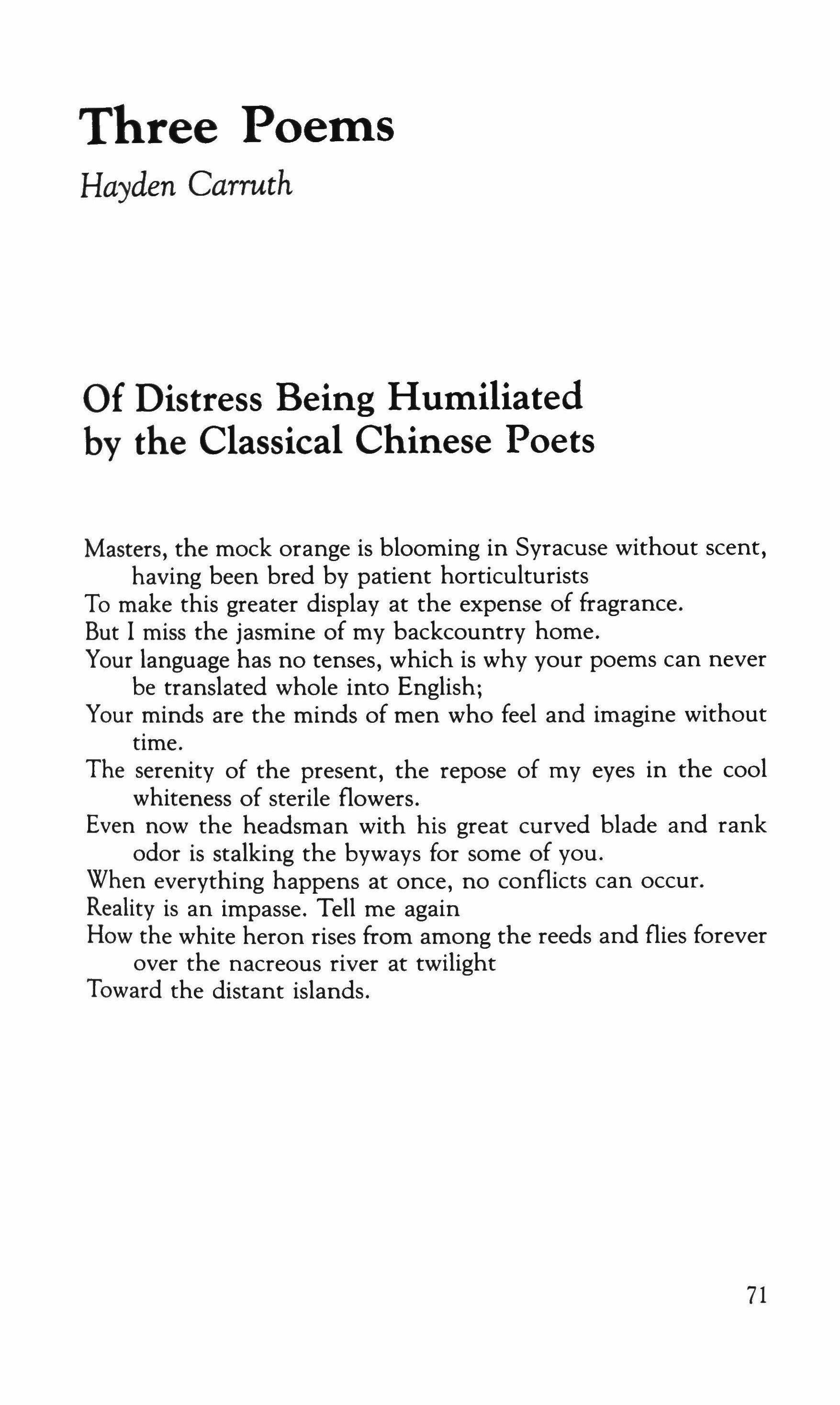
Of Distress Being Humiliated by the Classical Chinese Poets
Masters, the mock orange is blooming in Syracuse without scent, having been bred by patient horticulturists
To make this greater display at the expense of fragrance. But I miss the jasmine of my backcountry home. Your language has no tenses, which is why your poems can never be translated whole into English; Your minds are the minds of men who feel and imagine without time.
The serenity of the present, the repose of my eyes in the cool whiteness of sterile flowers.
Even now the headsman with his great curved blade and rank odor is stalking the byways for some of you. When everything happens at once, no conflicts can occur.
Reality is an impasse. Tell me again
How the white heron rises from among the reeds and flies forever over the nacreous river at twilight
Toward the distant islands.
71
Sometimes When Lovers Lie Quietly
Together, Unexpectedly One of Them Will Become Aware of the Other's Pulse
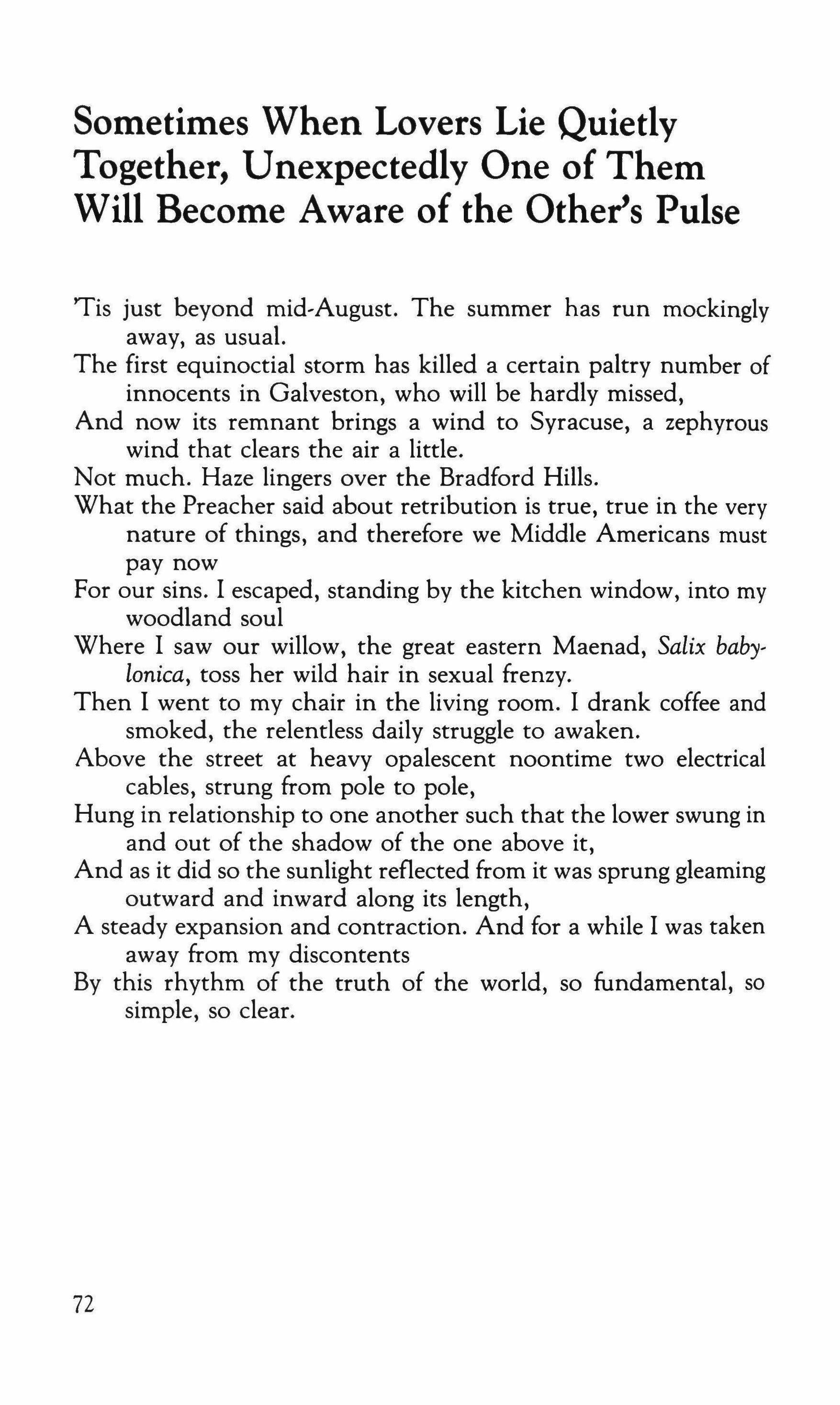
'Tis just beyond mid-August, The summer has run mockingly away, as usual.
The first equinoctial storm has killed a certain paltry number of innocents in Galveston, who will be hardly missed,
And now its remnant brings a wind to Syracuse, a zephvrous wind that clears the air a little.
Not much. Haze lingers over the Bradford Hills. What the Preacher said about retribution is true, true in the very nature of things, and therefore we Middle Americans must pay now
For our sins. I escaped, standing by the kitchen window, into my woodland soul
Where I saw our willow, the great eastern Maenad, Salix babylonica, toss her wild hair in sexual frenzy. Then I went to my chair in the living room. I drank coffee and smoked, the relentless daily struggle to awaken.
Above the street at heavy opalescent noontime two electrical cables, strung from pole to pole, Hung in relationship to one another such that the lower swung in and out of the shadow of the one above it,
And as it did so the sunlight reflected from it was sprung gleaming outward and inward along its length,
A steady expansion and contraction. And for a while I was taken away from my discontents
By this rhythm of the truth of the world, so fundamental, so simple, so clear.
72
Not Transhistorical Death,
or at Least Not Quite
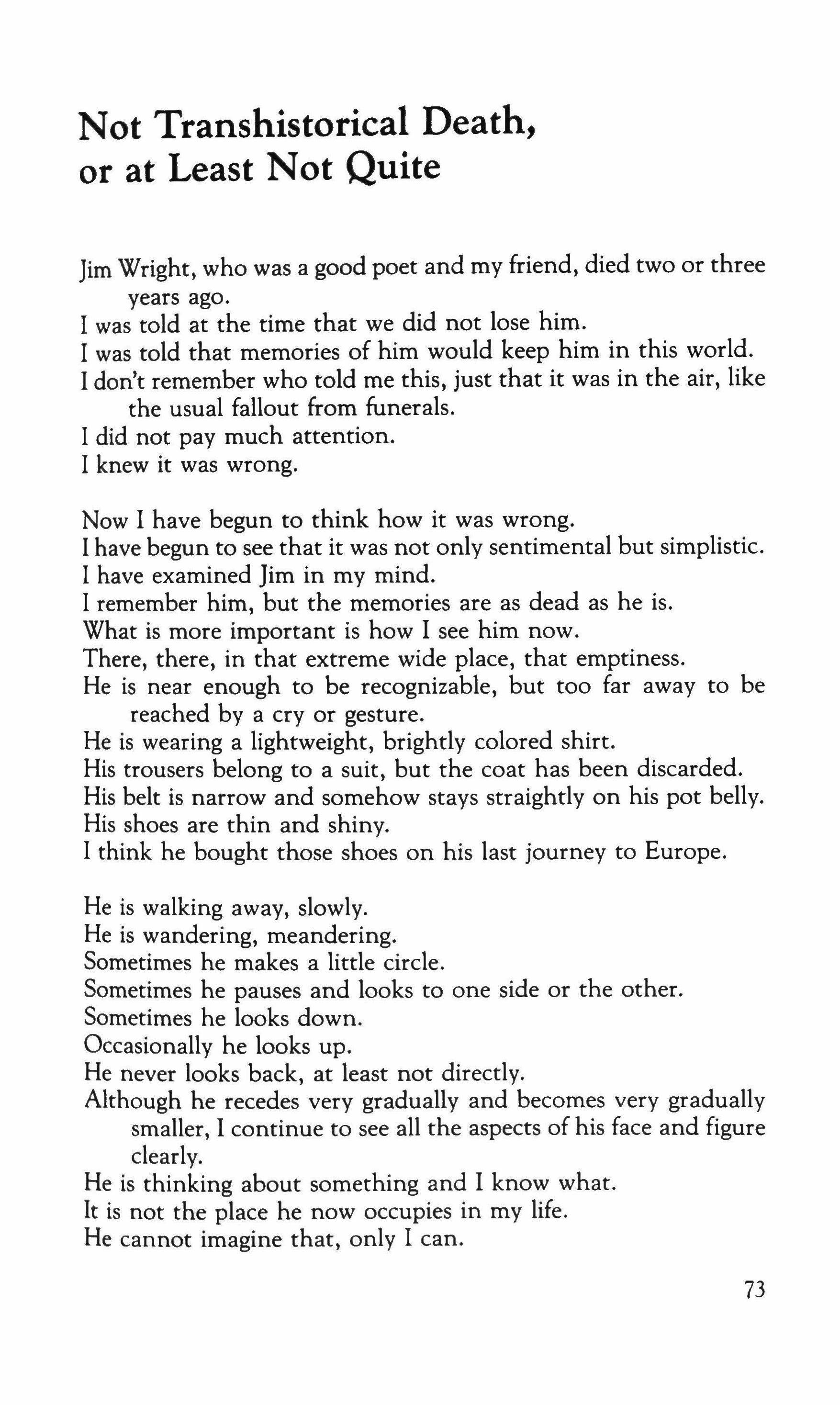
Jim Wright, who was a good poet and my friend, died two or three years ago.
I was told at the time that we did not lose him. I was told that memories of him would keep him in this world. I don't remember who told me this, just that it was in the air, like the usual fallout from funerals.
I did not pay much attention. I knew it was wrong.
Now I have begun to think how it was wrong. I have begun to see that it was not only sentimental but simplistic. I have examined Jim in my mind.
I remember him, but the memories are as dead as he is. What is more important is how I see him now. There, there, in that extreme wide place, that emptiness. He is near enough to be recognizable, but too far away to be reached by a cry or gesture.
He is wearing a lightweight, brightly colored shirt.
His trousers belong to a suit, but the coat has been discarded. His belt is narrow and somehow stays straightly on his pot belly. His shoes are thin and shiny.
I think he bought those shoes on his last journey to Europe.
He is walking away, slowly. He is wandering, meandering. Sometimes he makes a little circle.
Sometimes he pauses and looks to one side or the other. Sometimes he looks down.
Occasionally he looks up. He never looks back, at least not directly. Although he recedes very gradually and becomes very gradually smaller, I continue to see all the aspects of his face and figure clearly.
He is thinking about something and I know what. It is not the place he now occupies in my life. He cannot imagine that, only I can.
73
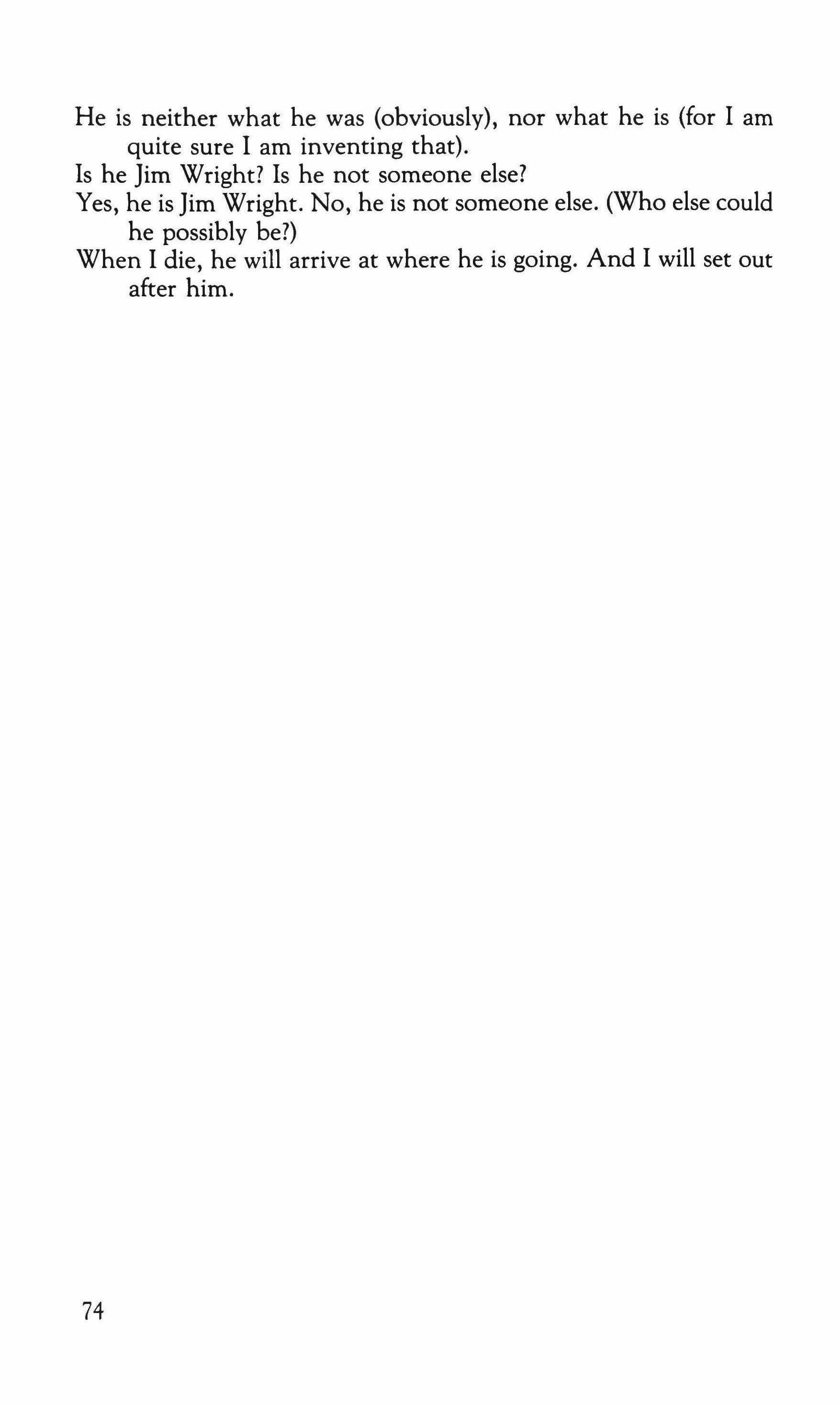
He is neither what he was (obviously), nor what he is (for I am quite sure I am inventing that).
Is he Jim Wright? Is he not someone else?
Yes, he is Jim Wright. No, he is not someone else. (Who else could he possibly be?)
When I die, he will arrive at where he is going. And I will set out after him.
74
Three Poell1s
Linda Pastan
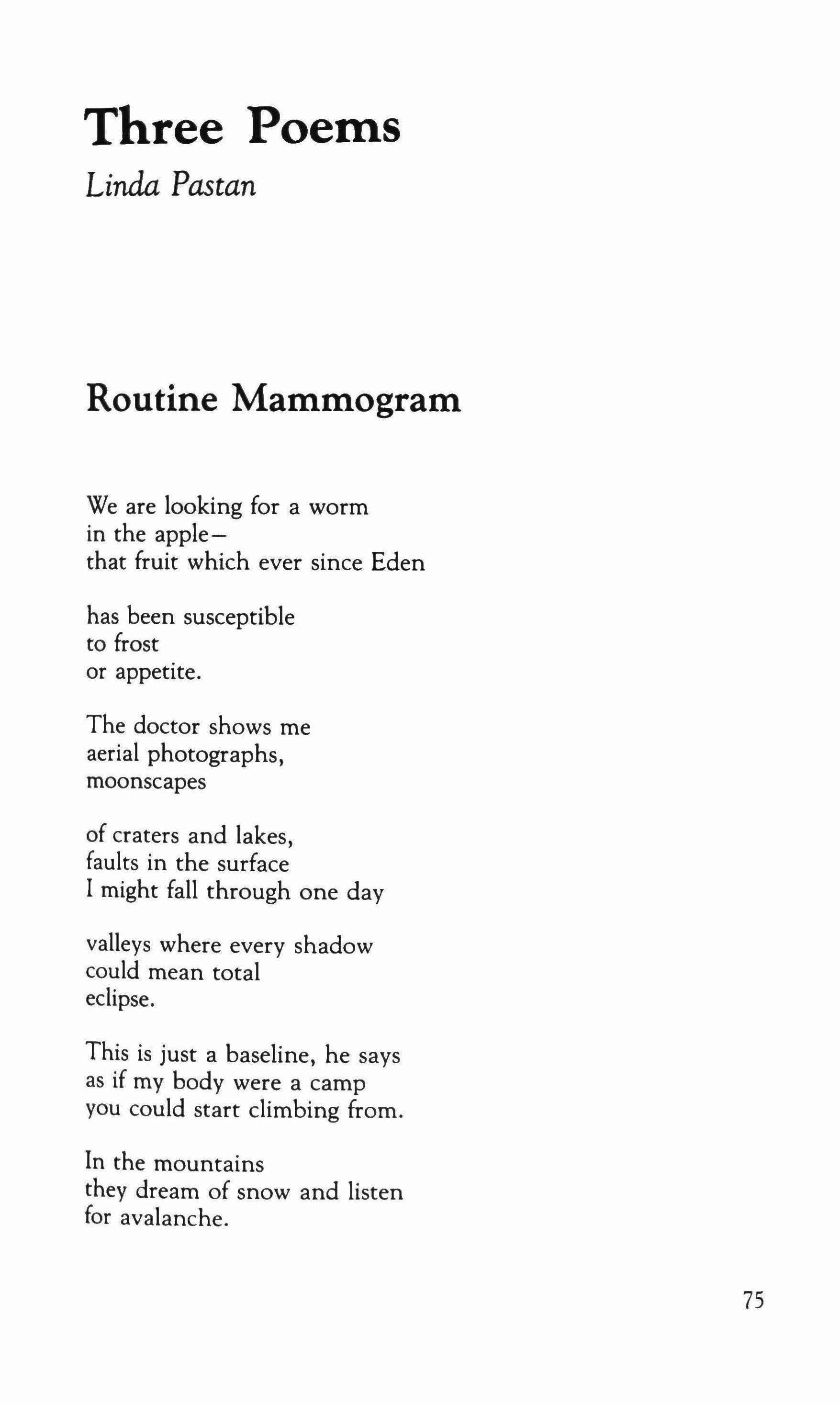
Routine Mammogram
We are looking for a worm in the applethat fruit which ever since Eden has been susceptible to frost or appetite.
The doctor shows me aerial photographs, moonscapes of craters and lakes, faults in the surface I might fall through one day valleys where every shadow could mean total eclipse.
This is just a baseline, he says as if my body were a camp you could start climbing from.
In the mountains they dream of snow and listen for avalanche.
75

I think of Amazon women with just one breast, their bowstrings tightening for war.
(How will we ever touch again?)
You're fine, the doctor tells me now and smiles, as if he could give innocence back, as if he could give back to the apple its spiraled skin.
76
Departures
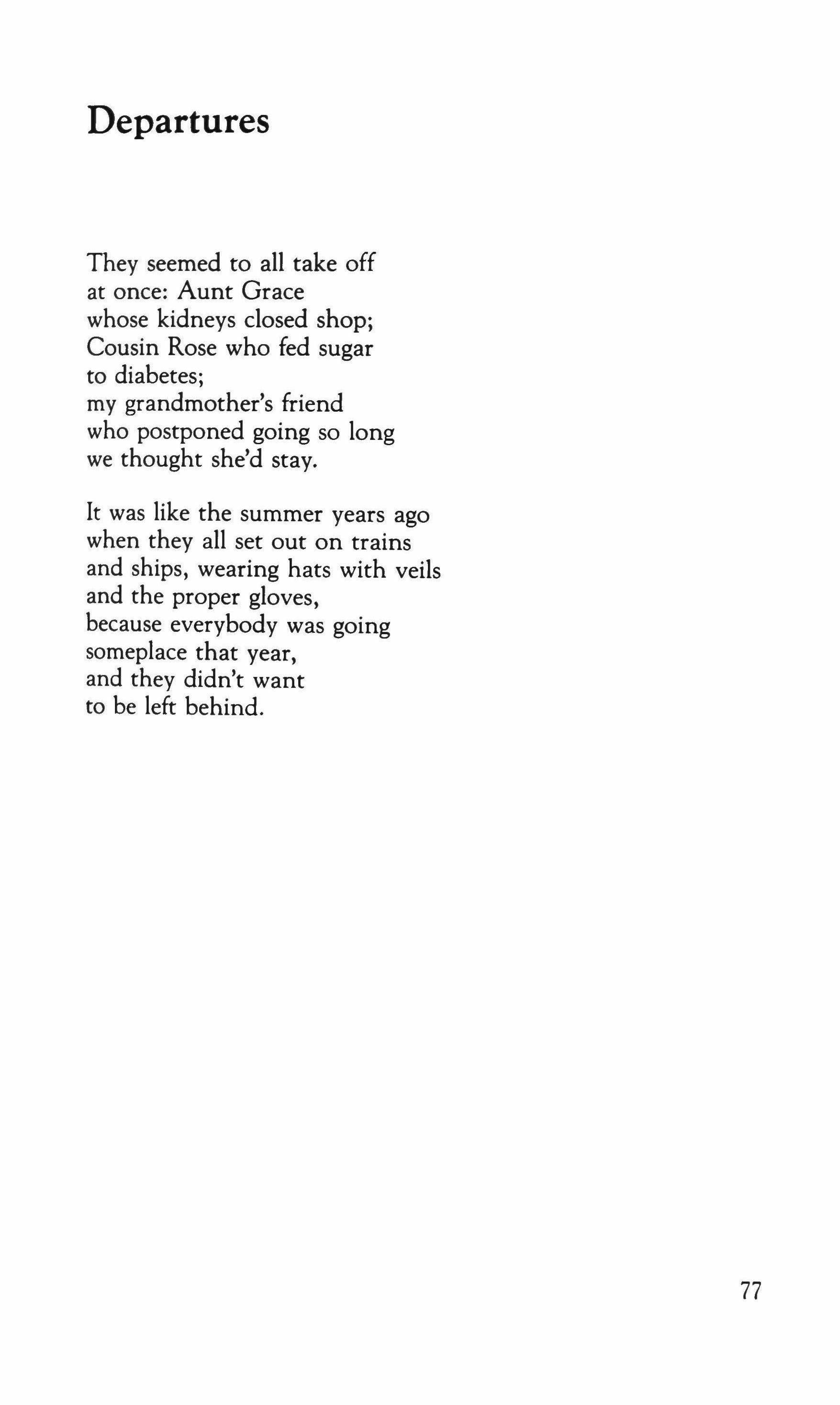
They seemed to all take off at once: Aunt Grace whose kidneys closed shop; Cousin Rose who fed sugar to diabetes; my grandmother's friend who postponed going so long we thought she'd stay.
It was like the summer years ago when they all set out on trains and ships, wearing hats with veils and the proper gloves, because everybody was going someplace that year, and they didn't want to be left behind.
77
Shadows
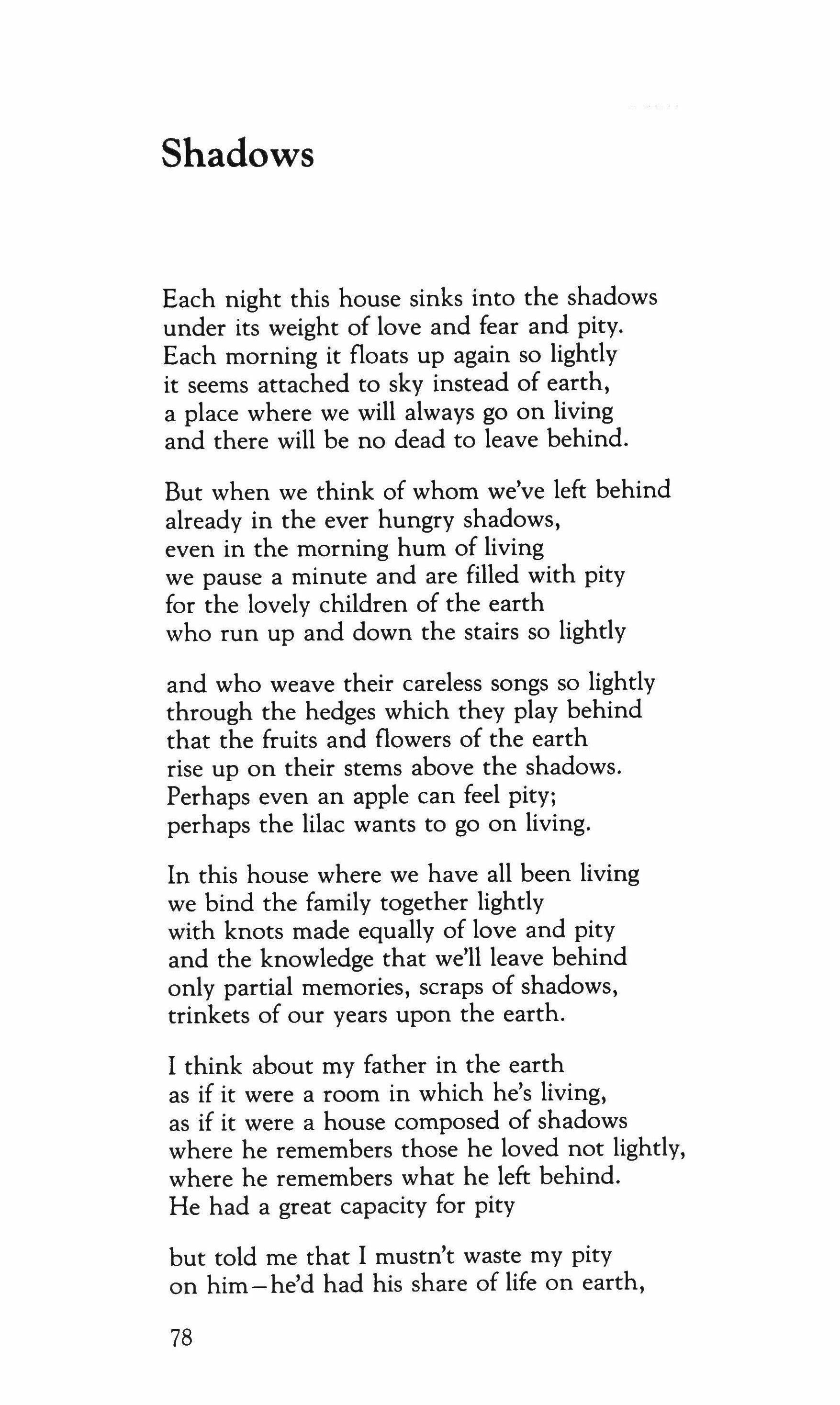
Each night this house sinks into the shadows under its weight of love and fear and pity. Each morning it floats up again so lightly it seems attached to sky instead of earth, a place where we will always go on living and there will be no dead to leave behind.
But when we think of whom we've left behind already in the ever hungry shadows, even in the morning hum of living we pause a minute and are filled with pity for the lovely children of the earth who run up and down the stairs so lightly and who weave their careless songs so lightly through the hedges which they play behind that the fruits and flowers of the earth rise up on their stems above the shadows. Perhaps even an apple can feel pity; perhaps the lilac wants to go on living.
In this house where we have all been living we bind the family together lightly with knots made equally of love and pity and the knowledge that we'll leave behind only partial memories, scraps of shadows, trinkets of our years upon the earth.
I think about my father in the earth as if it were a room in which he's living, as if it were a house composed of shadows where he remembers those he loved not lightly, where he remembers what he left behind. He had a great capacity for pity but told me that I mustn't waste my pity on him-he'd had his share of life on earth,
78
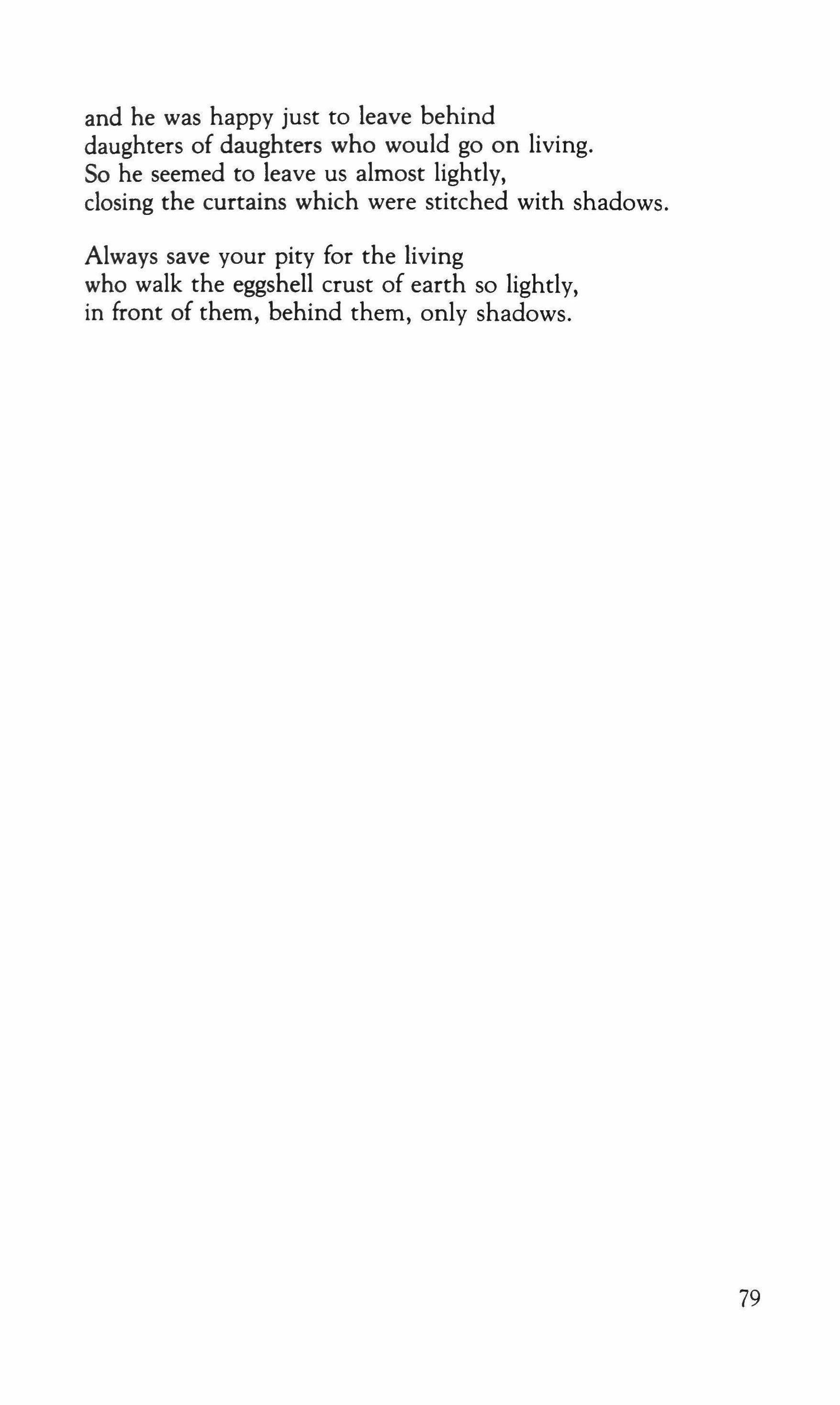
and he was happy just to leave behind daughters of daughters who would go on living. So he seemed to leave us almost lightly, closing the curtains which were stitched with shadows.
Always save your pity for the living who walk the eggshell crust of earth so lightly, in front of them, behind them, only shadows.
79
Five Poems
John Peck
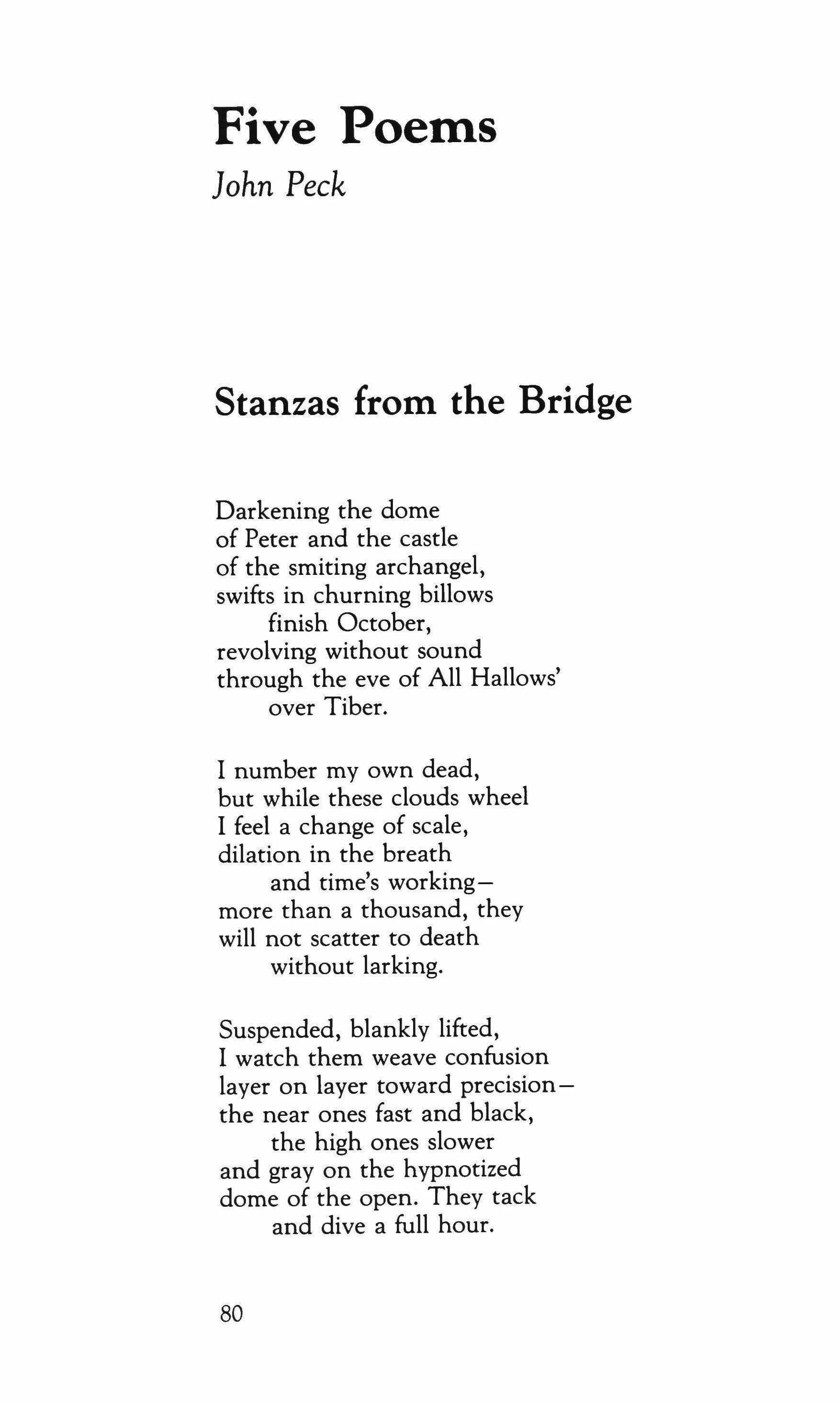
Stanzas from the Bridge
Darkening the dome of Peter and the castle of the smiting archangel, swifts in churning billows finish October, revolving without sound through the eve of All Hallows' over Tiber.
I number my own dead, but while these clouds wheel I feel a change of scale, dilation in the breath and time's workingmore than a thousand, they will not scatter to death without larking.
Suspended, blankly lifted, I watch them weave confusion layer on layer toward precisionthe near ones fast and black, the high ones slower and gray on the hypnotized dome of the open. They tack and dive a full hour.
80
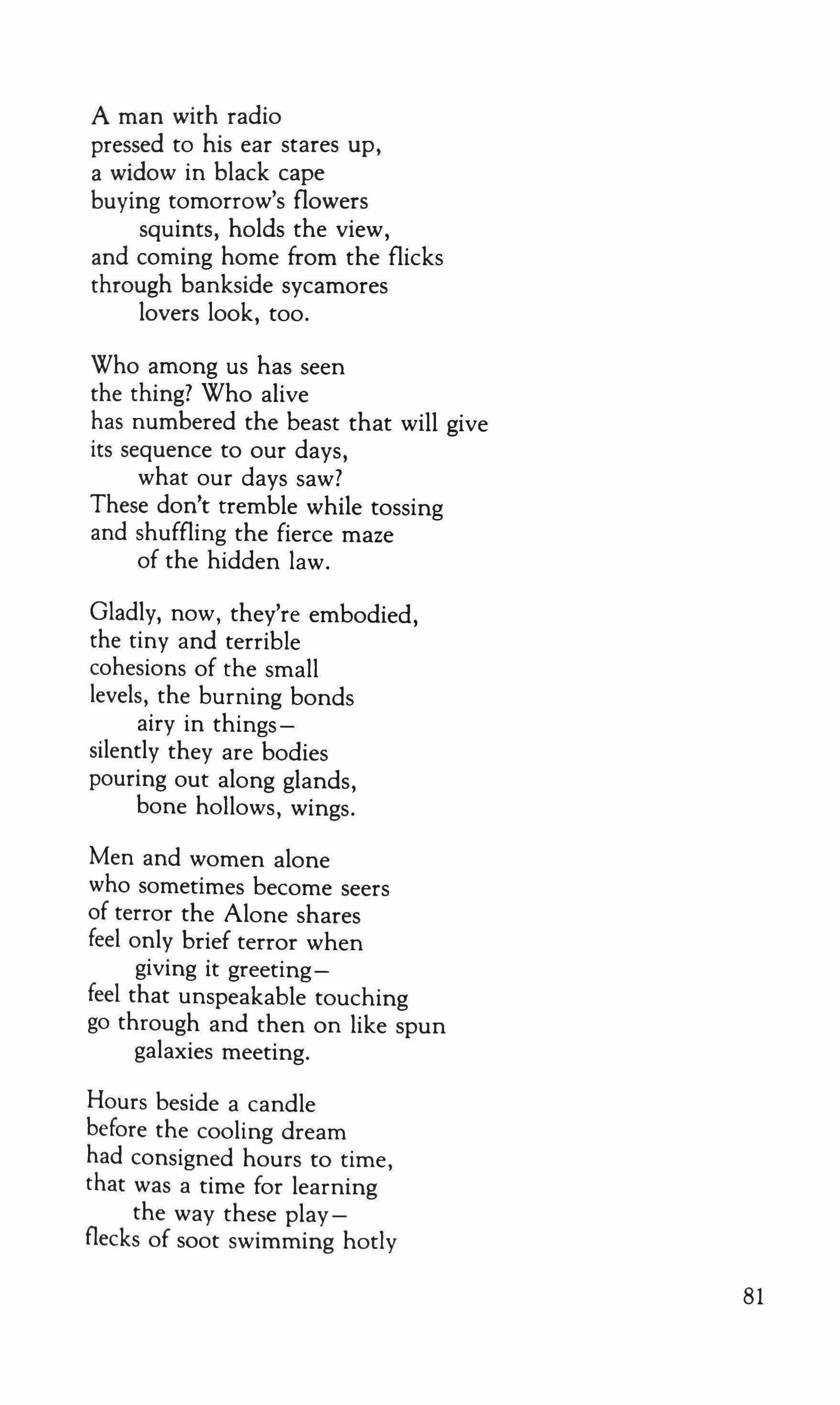
A man with radio pressed to his ear stares up, a widow in black cape buying tomorrow's flowers squints, holds the view, and coming home from the flicks through bankside sycamores lovers look, too.
Who among us has seen the thing? Who alive has numbered the beast that will give its sequence to our days, what our days saw? These don't tremble while tossing and shuffling the fierce maze of the hidden law.
Gladly, now, they're embodied, the tiny and terrible cohesions of the small levels, the burning bonds airy in thingssilently they are bodies pouring out along glands, bone hollows, wings.
Men and women alone who sometimes become seers of terror the Alone shares feel only brief terror when giving it greetingfeel that unspeakable touching go through and then on like spun galaxies meeting.
Hours beside a candle before the cooling dream had consigned hours to time, that was a time for learning the way these playflecks of soot swimming hotly
81

to the sipping wick, then turning in bursts away
if I'd looked up from that and at that moment become what I now am watching them, it is the pale flame in power
I'd see overhead, swimming unreadably above them, this tall hour of the living and dead.
82
Buddy
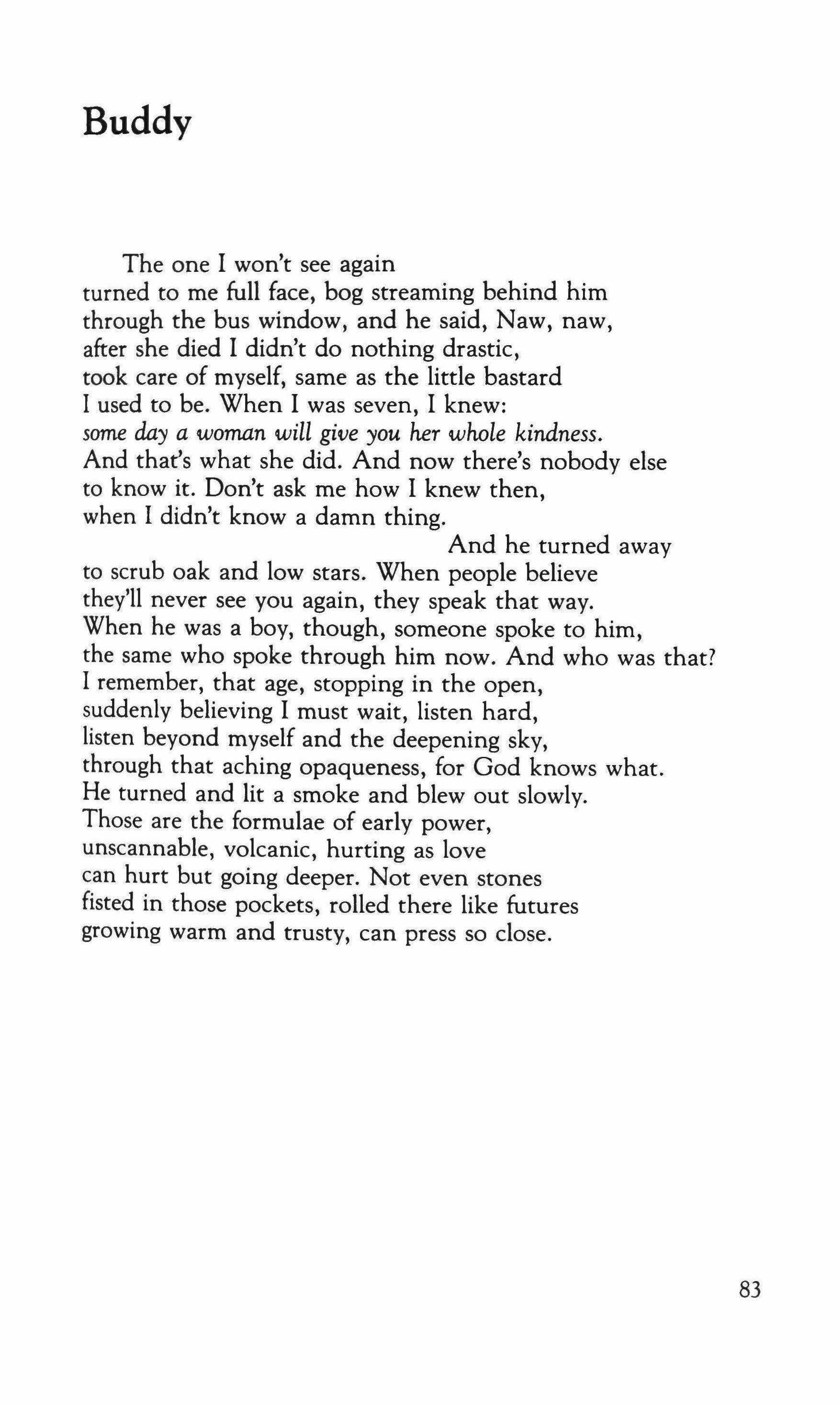
The one I won't see again turned to me full face, bog streaming behind him through the bus window, and he said, Naw, naw, after she died I didn't do nothing drastic, took care of myself, same as the little bastard I used to be. When I was seven, I knew: some day a woman will give you her whole kindness. And that's what she did. And now there's nobody else to know it. Don't ask me how I knew then, when I didn't know a damn thing. And he turned away to scrub oak and low stars. When people believe they'll never see you again, they speak that way. When he was a boy, though, someone spoke to him, the same who spoke through him now. And who was that? I remember, that age, stopping in the open, suddenly believing I must wait, listen hard, listen beyond myself and the deepening sky, through that aching opaqueness, for God knows what. He turned and lit a smoke and blew out slowly. Those are the formulae of early power, unscannable, volcanic, hurting as love can hurt but going deeper. Not even stones fisted in those pockets, rolled there like futures growing warm and trusty, can press so close.
83
He, She, All of Them, Ay
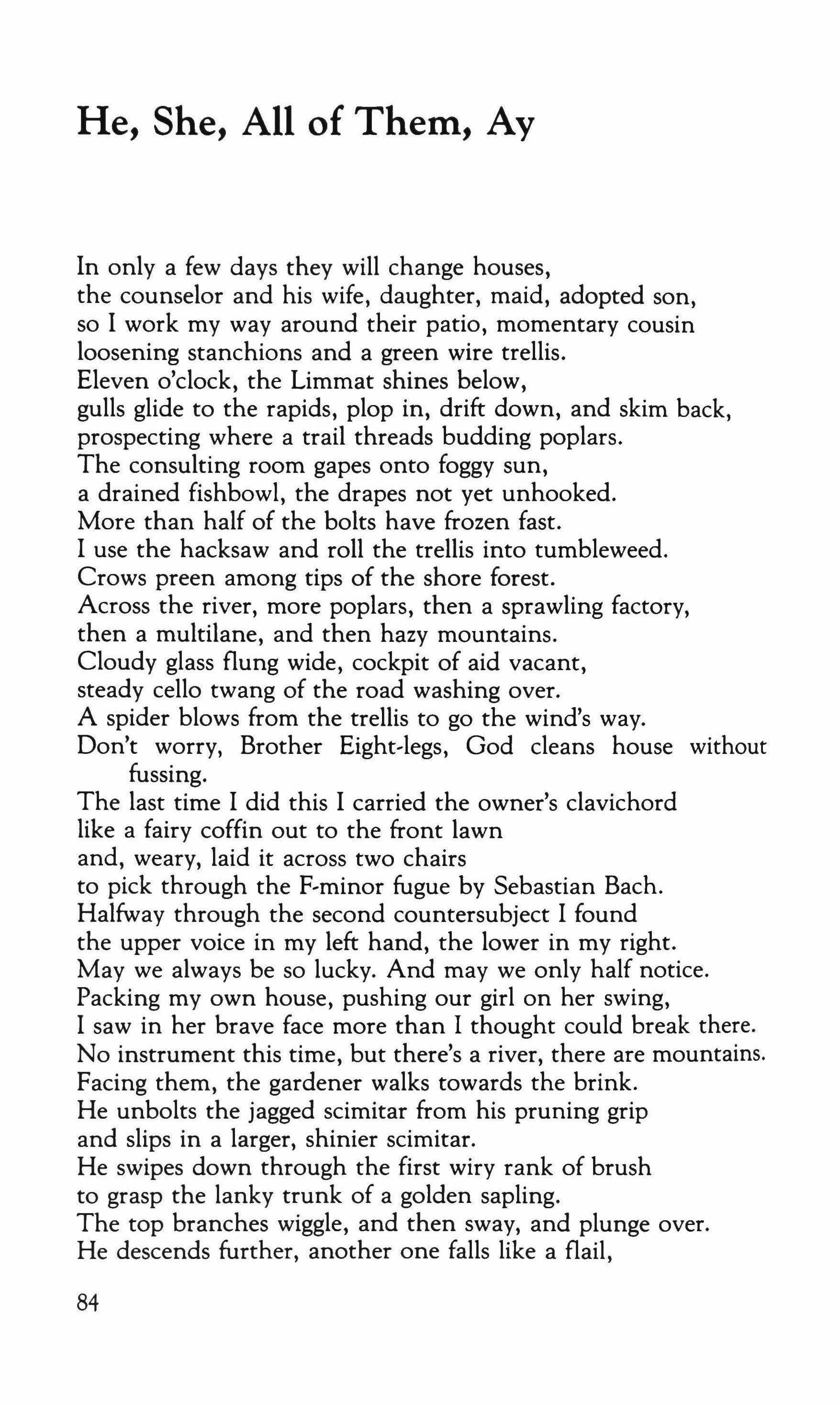
In only a few days they will change houses, the counselor and his wife, daughter, maid, adopted son, so I work my way around their patio, momentary cousin loosening stanchions and a green wire trellis. Eleven o'clock, the Limmat shines below, gulls glide to the rapids, plop in, drift down, and skim back, prospecting where a trail threads budding poplars. The consulting room gapes onto foggy sun, a drained fishbowl, the drapes not yet unhooked. More than half of the bolts have frozen fast. I use the hacksaw and roll the trellis into tumbleweed. Crows preen among tips of the shore forest. Across the river, more poplars, then a sprawling factory, then a multilane, and then hazy mountains.
Cloudy glass flung wide, cockpit of aid vacant, steady cello twang of the road washing over. A spider blows from the trellis to go the wind's way. Don't worry, Brother Eight-legs, God cleans house without fussing.
The last time I did this I carried the owner's clavichord like a fairy coffin out to the front lawn and, weary, laid it across two chairs to pick through the Fminor fugue by Sebastian Bach. Halfway through the second countersubject I found the upper voice in my left hand, the lower in my right. May we always be so lucky. And may we only half notice.
Packing my own house, pushing our girl on her swing, I saw in her brave face more than I thought could break there. No instrument this time, but there's a river, there are mountains.
Pacing them, the gardener walks towards the brink. He unbolts the jagged scimitar from his pruning grip and slips in a larger, shinier scimitar. He swipes down through the first wiry rank of brush to grasp the lanky trunk of a golden sapling. The top branches wiggle, and then sway, and plunge over. He descends further, another one falls like a flail,
84

and two crows flap up. It is nearly noon. He takes off his red shirt, folding it like a flag, and begins the climb back uphill, wiping his steel. He will sit down and eat. Midday veils the mountains. And so, tell us again: why this endless spring wind? Why do we cross the river?
85
Begin's Autumn
After the Late Massacre, 1982
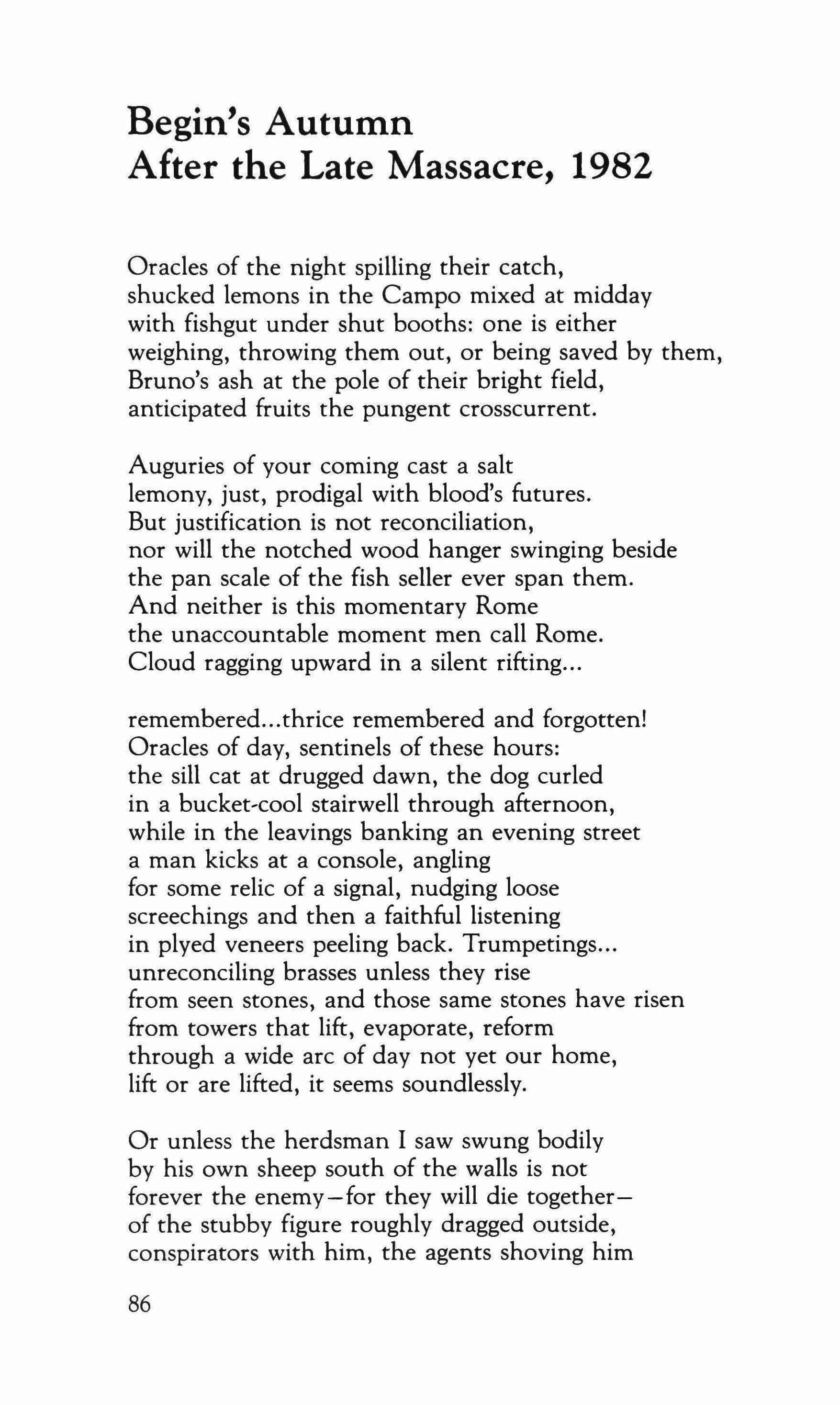
Oracles of the night spilling their catch, shucked lemons in the Campo mixed at midday with fishgut under shut booths: one is either weighing, throwing them out, or being saved by them, Bruno's ash at the pole of their bright field, anticipated fruits the pungent crosscurrent.
Auguries of your coming cast a salt lemony, just, prodigal with blood's futures. But justification is not reconciliation, nor will the notched wood hanger swinging beside the pan scale of the fish seller ever span them. And neither is this momentary Rome the unaccountable moment men call Rome. Cloud ragging upward in a silent rifting
remembered thrice remembered and forgotten! Oracles of day, sentinels of these hours: the sill cat at drugged dawn, the dog curled in a bucker-cool stairwell through afternoon, while in the leavings banking an evening street a man kicks at a console, angling for some relic of a signal, nudging loose screechings and then a faithful listening in plyed veneers peeling back. Trumpetings unreconciling brasses unless they rise from seen stones, and those same stones have risen from towers that lift, evaporate, reform through a wide arc of day not yet our home, lift or are lifted, it seems soundlessly.
Or unless the herdsman I saw swung bodily by his own sheep south of the walls is not forever the enemy-for they will die togetherof the stubby figure roughly dragged outside, conspirators with him, the agents shoving him
86
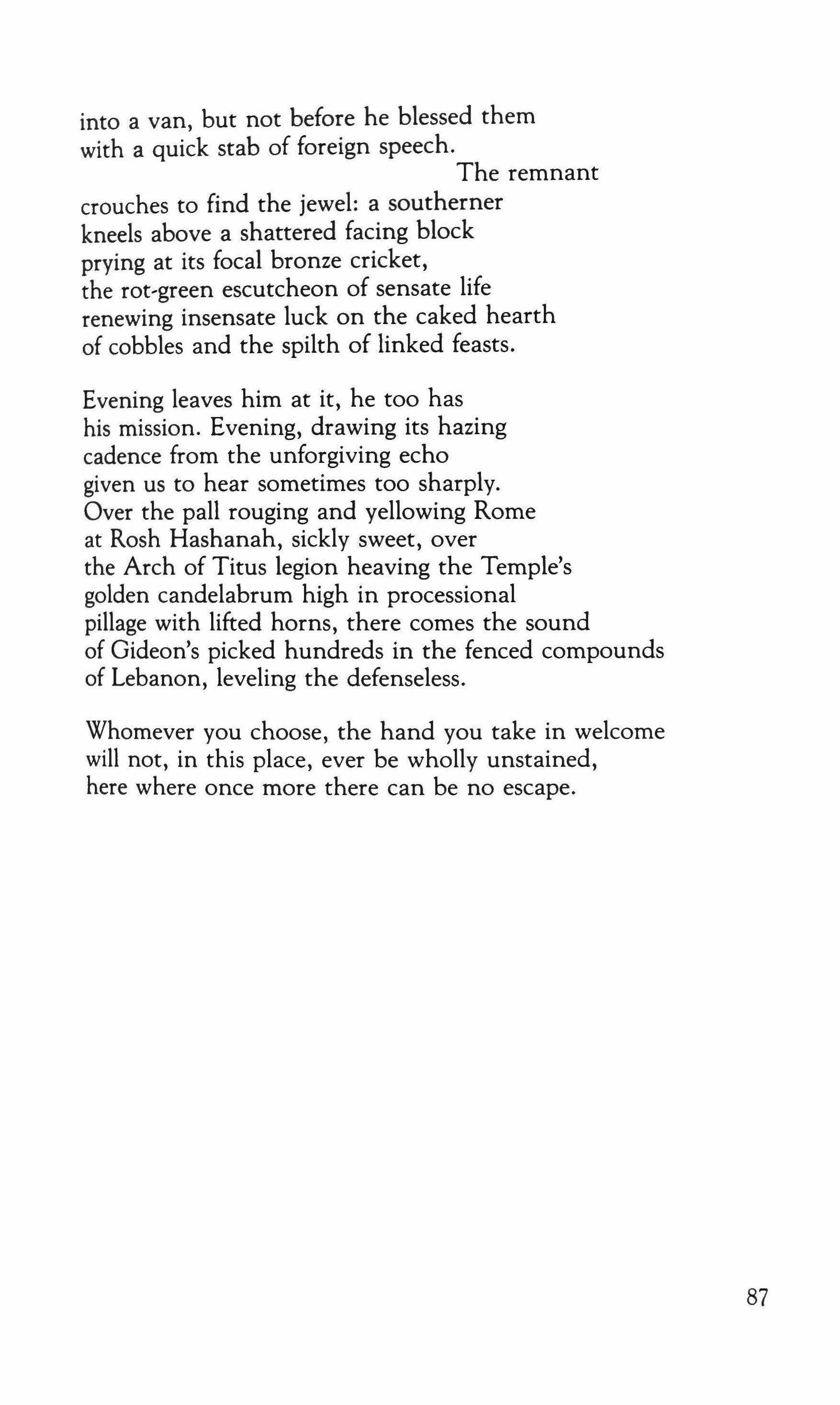
into a van, but not before he blessed them with a quick stab of foreign speech.
The remnant
crouches to find the jewel: a southerner kneels above a shattered facing block prying at its focal bronze cricket, the rot-green escutcheon of sensate life renewing insensate luck on the caked hearth of cobbles and the spilth of linked feasts.
Evening leaves him at it, he too has his mission. Evening, drawing its hazing cadence from the unforgiving echo given us to hear sometimes too sharply. Over the pall rouging and yellowing Rome at Rosh Hashanah, sickly sweet, over the Arch of Titus legion heaving the Temple's golden candelabrum high in processional pillage with lifted horns, there comes the sound of Gideon's picked hundreds in the fenced compounds of Lebanon, leveling the defenseless.
Whomever you choose, the hand you take in welcome will not, in this place, ever be wholly unstained, here where once more there can be no escape.
87
Hazelnut
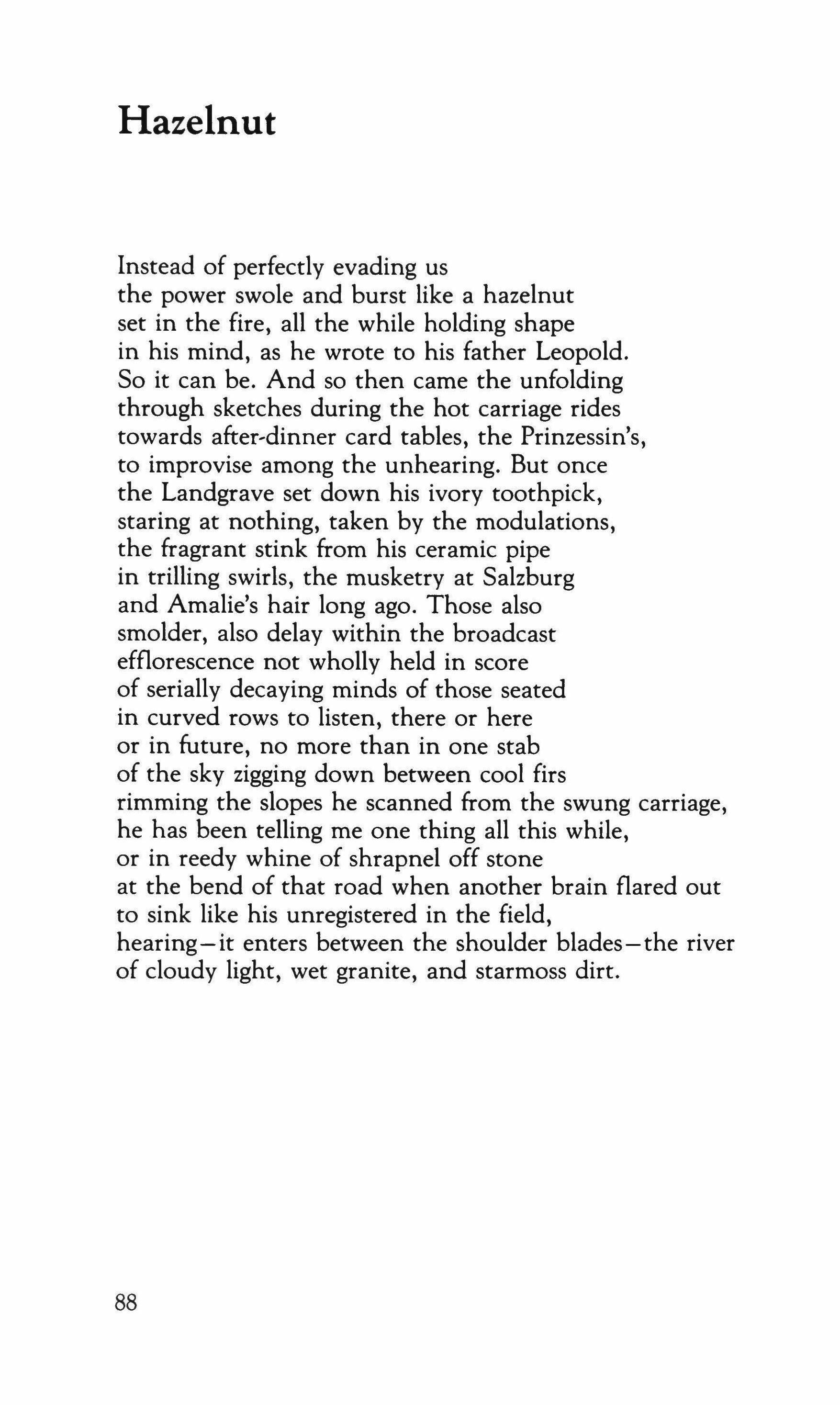
Instead of perfectly evading us the power swole and burst like a hazelnut set in the fire, all the while holding shape in his mind, as he wrote to his father Leopold. So it can be. And so then came the unfolding through sketches during the hot carriage rides towards after-dinner card tables, the Prinzessin's, to improvise among the unhearing. But once the Landgrave set down his ivory toothpick, staring at nothing, taken by the modulations, the fragrant stink from his ceramic pipe in trilling swirls, the musketry at Salzburg and Amalie's hair long ago. Those also smolder, also delay within the broadcast efflorescence not wholly held in score of serially decaying minds of those seated in curved rows to listen, there or here or in future, no more than in one stab of the sky zigging down between cool firs rimming the slopes he scanned from the swung carriage, he has been telling me one thing all this while, or in reedy whine of shrapnel off stone at the bend of that road when another brain flared out to sink like his unregistered in the field, hearing-it enters between the shoulder blades-the river of cloudy light, wet granite, and starmoss dirt.
88
Two Poellls
Paul Mariani

A Bad Joke
Because they had to cut deep to get the cancer in his throat, my father-in-law was wheezing out this joke in his old stage manner, the one about the woman who tells the butcher to keep on slicing till he's halfway through the roast beef before she tells him dat's good dankyou now she'll take the next two pieces. I took him by the arm as we crossed the street, one eye on the lookout for idiots peeling up the avenue, the other on those hip-cracking ice slicks (the Christmas sun up over the new high-risers useless to stop the stupid wind from moaning off the ocean) and thinking all the while of my fifteen-year-old son, whose voice is boom-bellowing into manhood now and who just last week
89
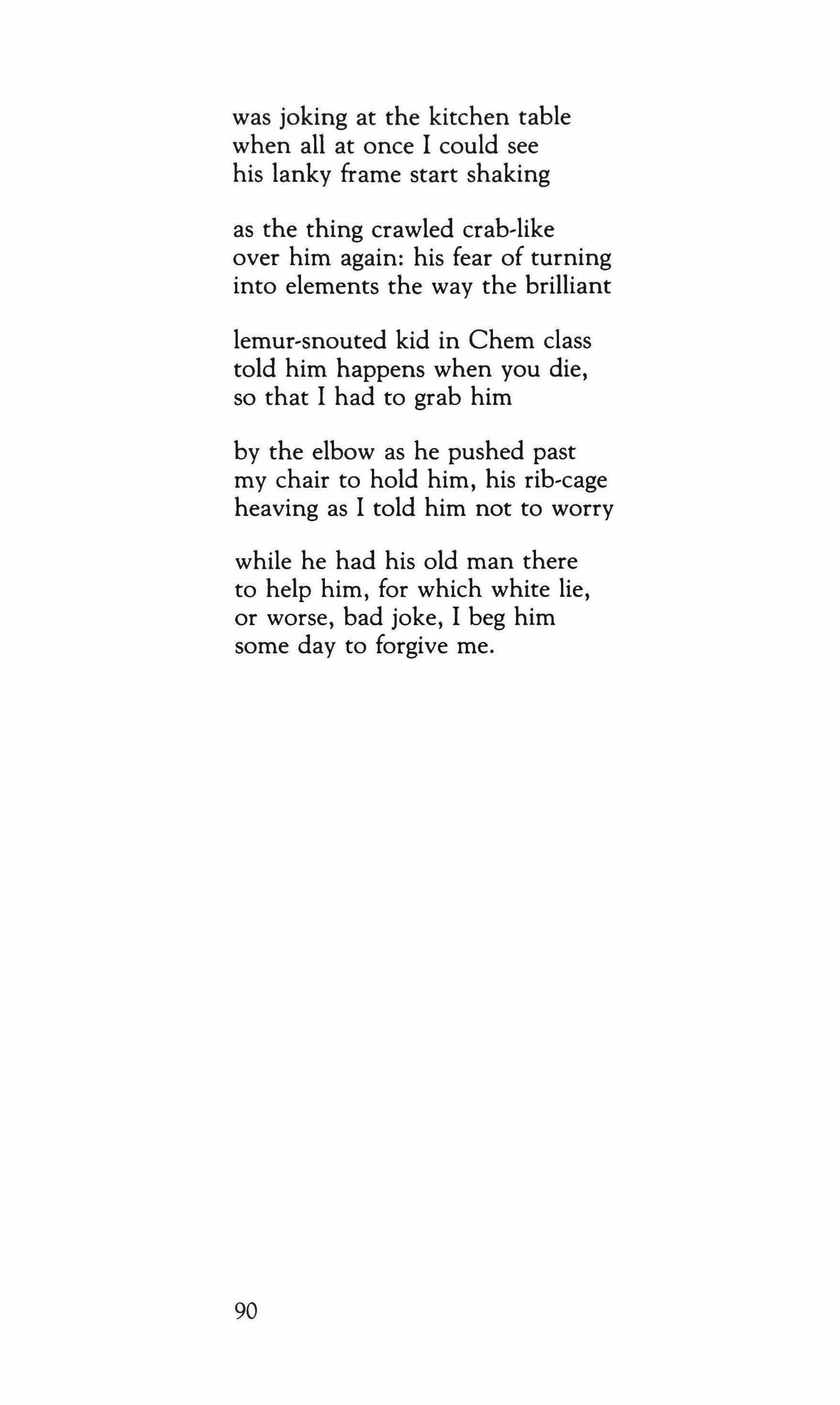
was joking at the kitchen table when all at once I could see his lanky frame start shaking as the thing crawled crab-like over him again: his fear of turning into elements the way the brilliant lemur-snouted kid in Chern class told him happens when you die, so that I had to grab him by the elbow as he pushed past my chair to hold him, his rib-cage heaving as I told him not to worry while he had his old man there to help him, for which white lie, or worse, bad joke, I beg him some day to forgive me.
90

Light Streaming into the Head
for Vince DiMarco
When the light trickles through the cracked panel of my son's closed door at 5:00 a.m.
I know he's busy at his books again, the night watchman waiting for his dawn. Last week, once he'd gulped his oatmeal down and driven off to school, I waded through the clutter of his room, searching for a razor. Among the thumbed stack of Spanish words, the strange quadratic symbols, the postcard pictures of the Last Judgment at Autun and the Parthenon against the pink dawn eastering, I found his dog-eared paper Bible beside a bloodstiff crumpled handkerchief, old signs I too well know of hours spent searching in a cell,like room for light to come or come again while I waited for the niggling words to kindle into flame
I was his age now the first time I think it struck, though I can see how long it was in coming, the way my high,school physics textbook showed the motes swarming in the heated air until at last they coalesced and flamed, charged as jagged sheets of lightning to leave the dark forever altered on the stunned mind's eye. But who at first could have told the difference? Another day of classes at Manhattan, the long drive in in traffic and then the long drive back through twilight autumn drizzle in my buddy's hearse-gray '57 Ford. Night after night I would take my dinner on the rebound then race to make the night shift at the Garden City A&P, stacking Krispies, corn and apricots along the gaping, hungry rows. Near midnight I'd be home again, my parents
91

and the younger six asleep, ready for another round of wrestling with my books.
But this once things were different. By 3:00 a.m., the tepid instant coffee sloshing at the bottom of my cup, the radiator wheezing in the corner like myoid asthmatic dog and the nosebleeds for the moment stanched, all at once my head went light when Jowett's Plato gave way to the unexpected music of Ovid's Metamorphoses, the passage where the boyish husband turns in dark to find his dear wife gone and calls out into the indifferent shadows after her: Eurydice. Eurydice. The cry of the bereft. And then, whether it was the giddy hour or because I felt my heart leap at once across some barrier of tongues which no hell I knew could keep me from, my hand reached up and touched the tears forming in the bleary pockets of my eyes and I felt a light so warm, so very warm and gentle, like nothing I had ever felt before, like a golden river flooding through my head.
You know of course how all such rivers sink. And soon you are looking for the answer in a bloodstreaked handkerchief, and then too many cups of coffee and then the metal ticking clock. Time then to hit the sack. I staggered to the slanting bathroom sink and looked into the surface of the giddy cabinet mirror and splashed my face and looked again to see the same gaunt pimply face, the same large nose and lips and stubbled chin, the untamed hair still charged and bristling. Only in the eyes had something changed
And then the still,fresh memory of Beacon dying on the sewer-bloated still-majestic Hudson: the sickly river town where I'd tried to make myself into a priest
92

and failed. And yet once I'd felt a light like this-not in myself, of course, not thenbut in the puffy, frog,like eyes of the little German priest whose name I have forgotten, a gentle, self-effacing presence whose tiny, liver-mottled hands had once brushed light across the dusty shelves which housed he said his Virgil and his Ovid and that Bunsen flame Catullus until his eyes had flared, brightening the dusty room and I had stared, wondering where all the light was streaming from.
You wait and then you learn to wait some more. All you can do is turn each empty page, hungry for whatever light there is, as you try to blink back the time when something brilliant flickered blooming in the head. In the meantime this: that quickening in my own son's eyes, a river, light, a hope, a something, as when Plato's dizzy prisoner, as I once heard, neck bent and groping backwards from his cell for air, aware of shadows trailing at his feet, at last looked up to catch full on his face the staggering honied brilliance of the sun.
93
Two Poem.s
]oseph Gastiger
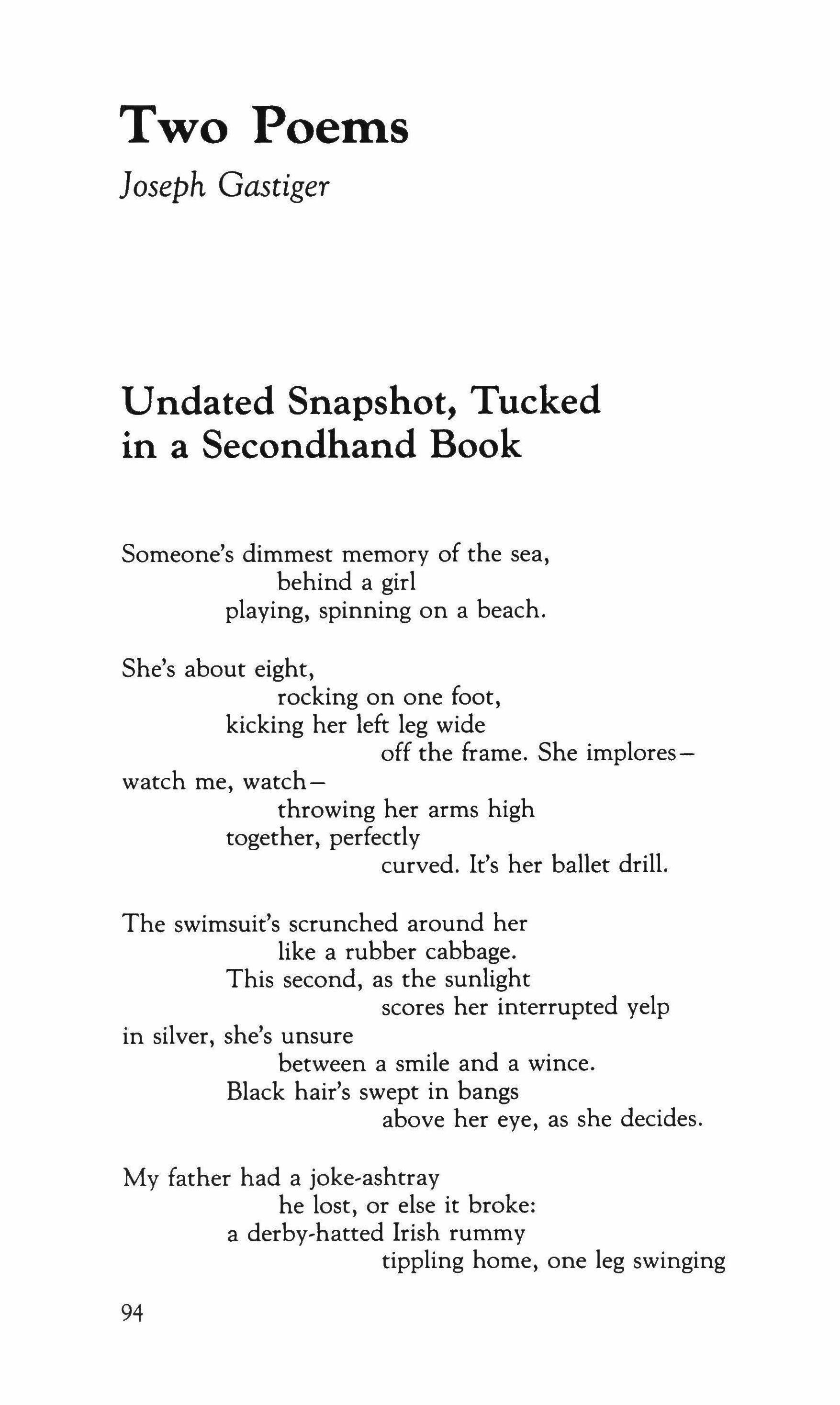
Undated Snapshot, Tucked in a Secondhand Book
Someone's dimmest memory of the sea, behind a girl playing, spinning on a beach.
She's about eight, rocking on one foot, kicking her left leg wide off the frame. She imploreswatch me, watchthrowing her arms high together, perfectly curved. It's her ballet drill.
The swimsuit's scrunched around her like a rubber cabbage. This second, as the sunlight scores her interrupted yelp in silver, she's unsure between a smile and a wince. Black hair's swept in bangs above her eye, as she decides.
My father had a joke-ashtray he lost, or else it broke: a derbv-hatted Irish rummy tippling home, one leg swinging
94

up too far, arms grabbing a lamppost. That's how this girl tilts back but she is striking, sly and dark and Quebecoise.
She's what I think is Quebecoise or was. By now she must be middle-aged; her suit is forty years laughed out of style. By now she sends her daughters to a Catholic school, works part-time at a drugstore in some suburb of Detroit.
I hope she does-or maybe she dupes all admiring menI hope she has. The girl practicing her step already knows she's beautiful, a teacher's star. The pear-shaped woman she becomes may genuflect for fools; she's no fool.
Her ghost upon the page performs for fathers, bodies by a stream in Calais, and uncles never found on Iwo jirna, This photo captures how she flirted on the shore they never saw. It's misplaced in a rummage sale's book pile.
I keep her on my desk to show to anyone: the child I've adopted, midway between my mother's age and mine, if she's alive. She's anyone's first girlfriend kissed before she ran away, madonna of a lunch line, Saint Joan in a school play.
95
Belladonna

Wherever you came from must have had fresh dog for sale but no water at all
Must have grown fruit that stung lips and raised blisters the horses went wilder from
Whenever you came to a village men closed in circles to grind the continuous rumor that you were the mute girl some soldiers had shared in a tent up the mountain Whenever you came to a village the priest lost his place in the prayer The policeman looked up from his page where the actress is stripped by policemen
Boys straggled after you, eager to witness some shame they could worsen the wound of because they were ugly and knew it
You weren't mute when you spun back infecting our stares and the miserable corn we could grow with enormous eyes with a song that heated the insides of men into trickles of wax
That's how our villages died
Because you were what we imagined we hated for living without, and you turned back
96
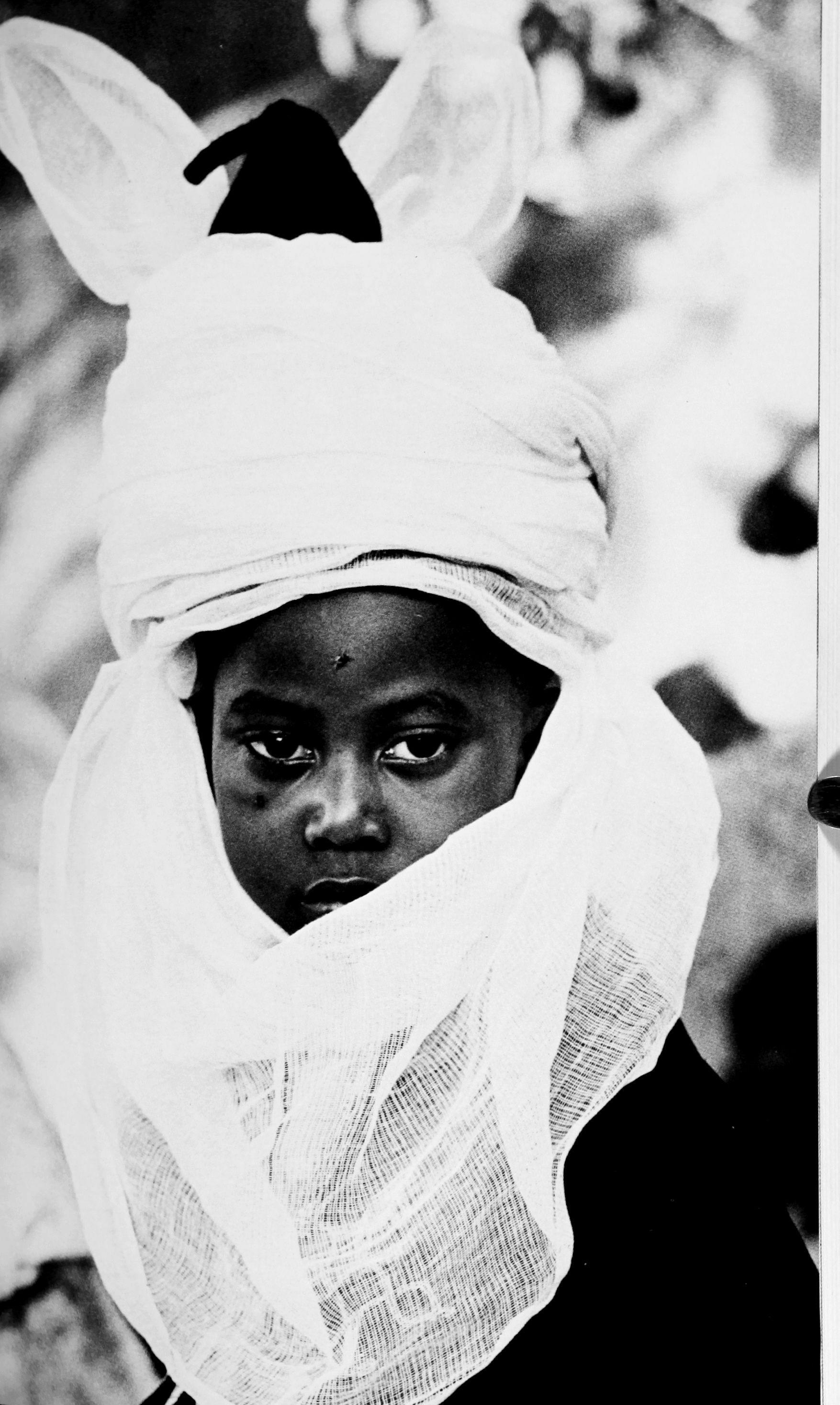

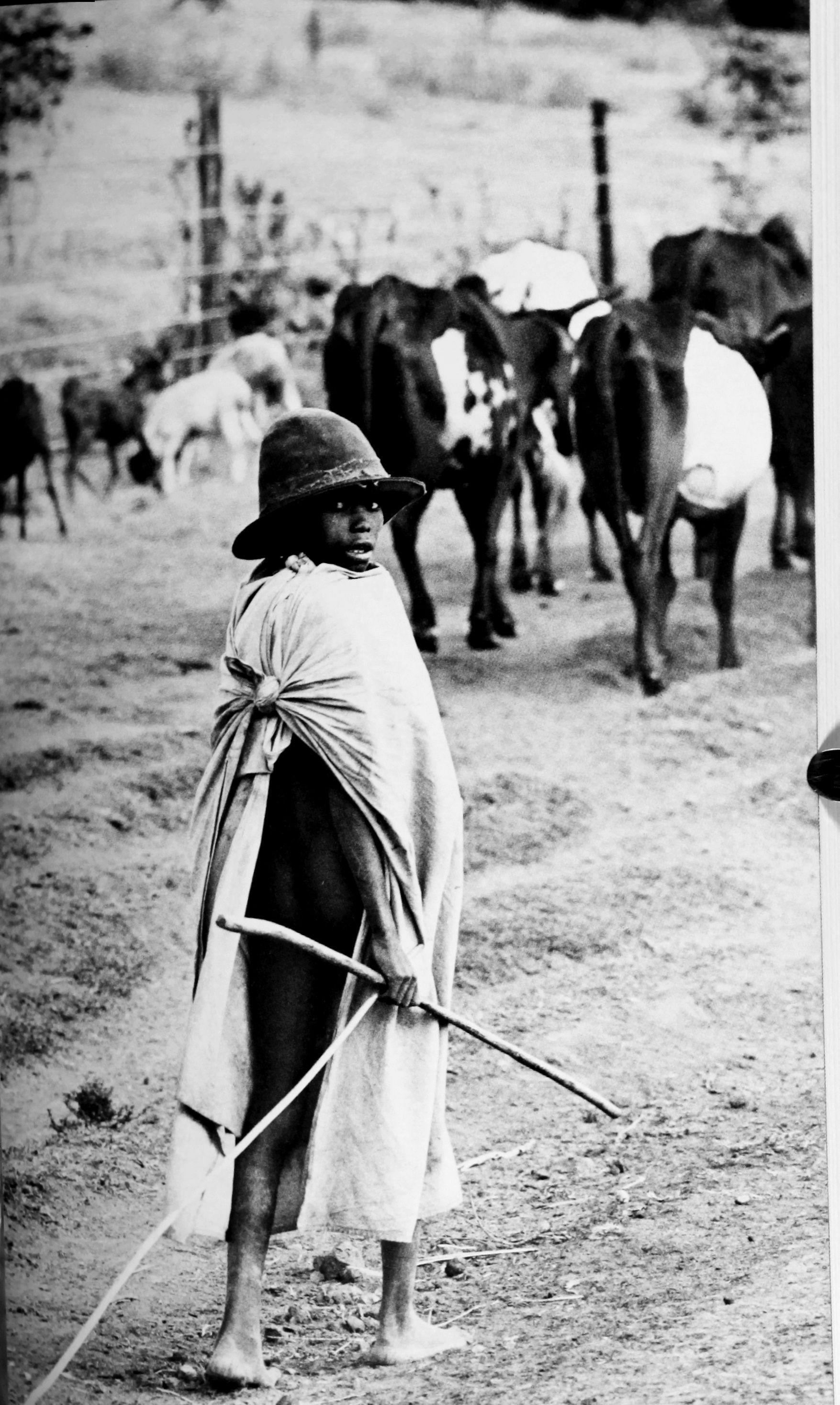

�l 1 { � \ t � ( �. ,Ao � 'I( ../) I" '" ( � :l'(-- l ., (.� ,... ( "
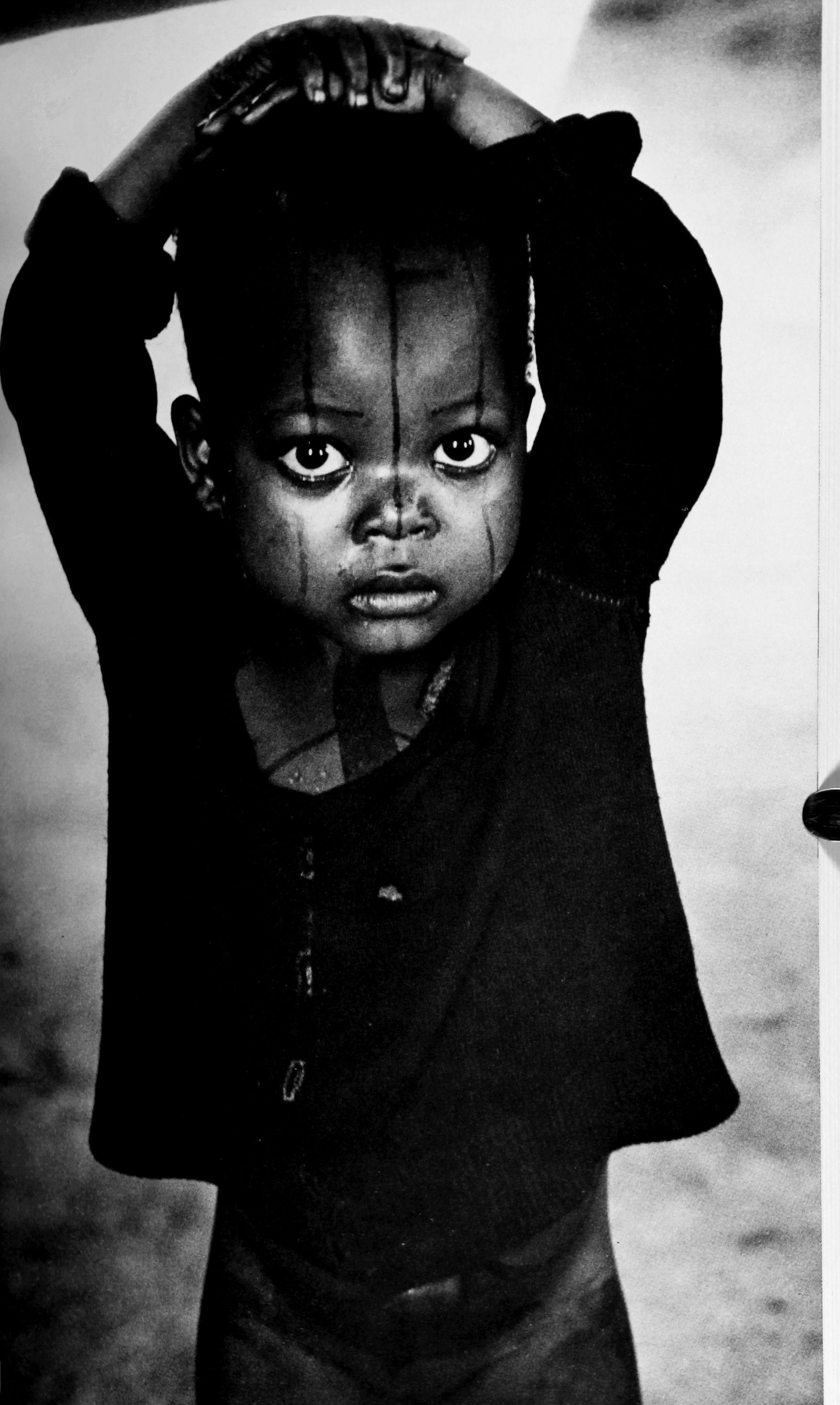
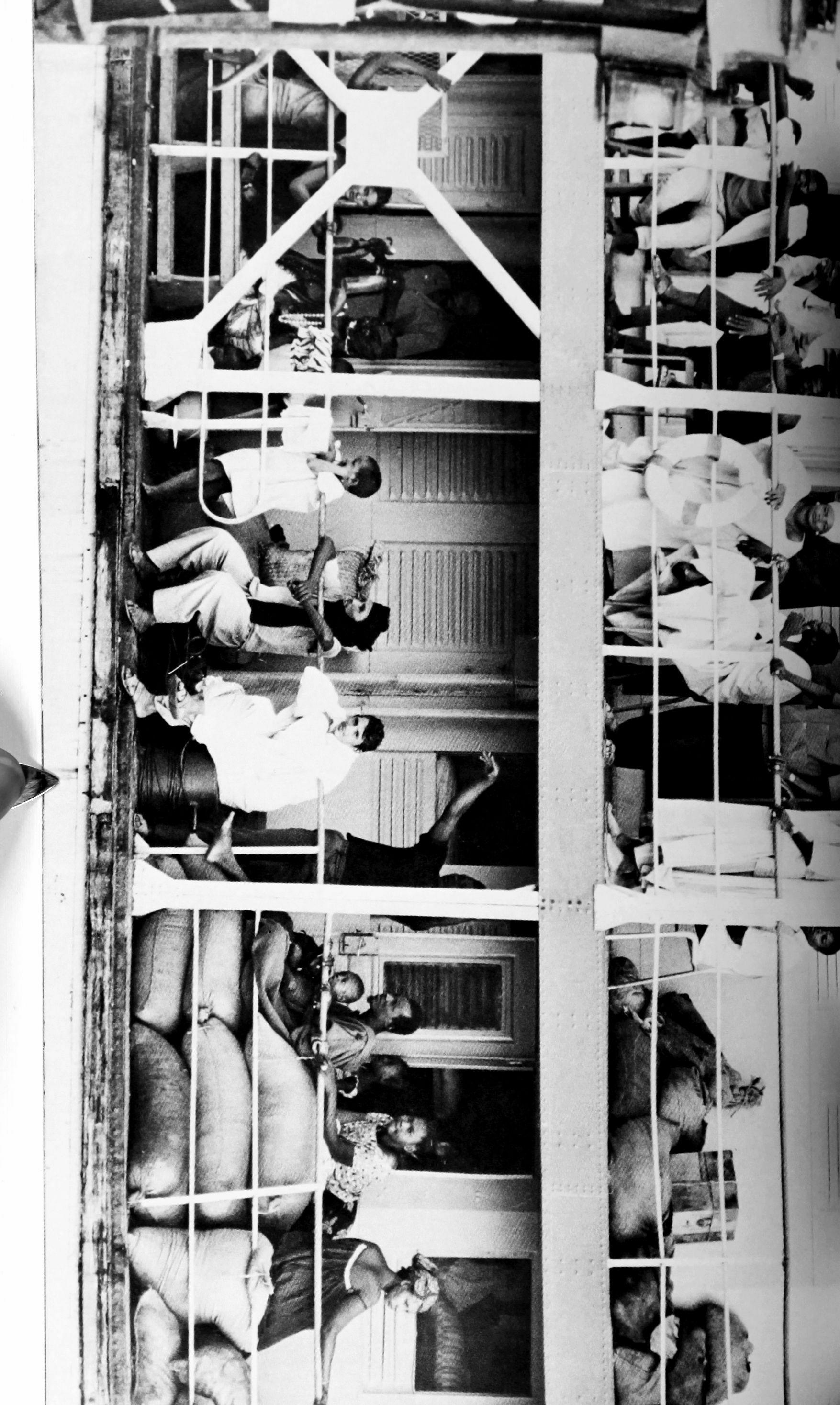


Two Poem.s
Carole Oles
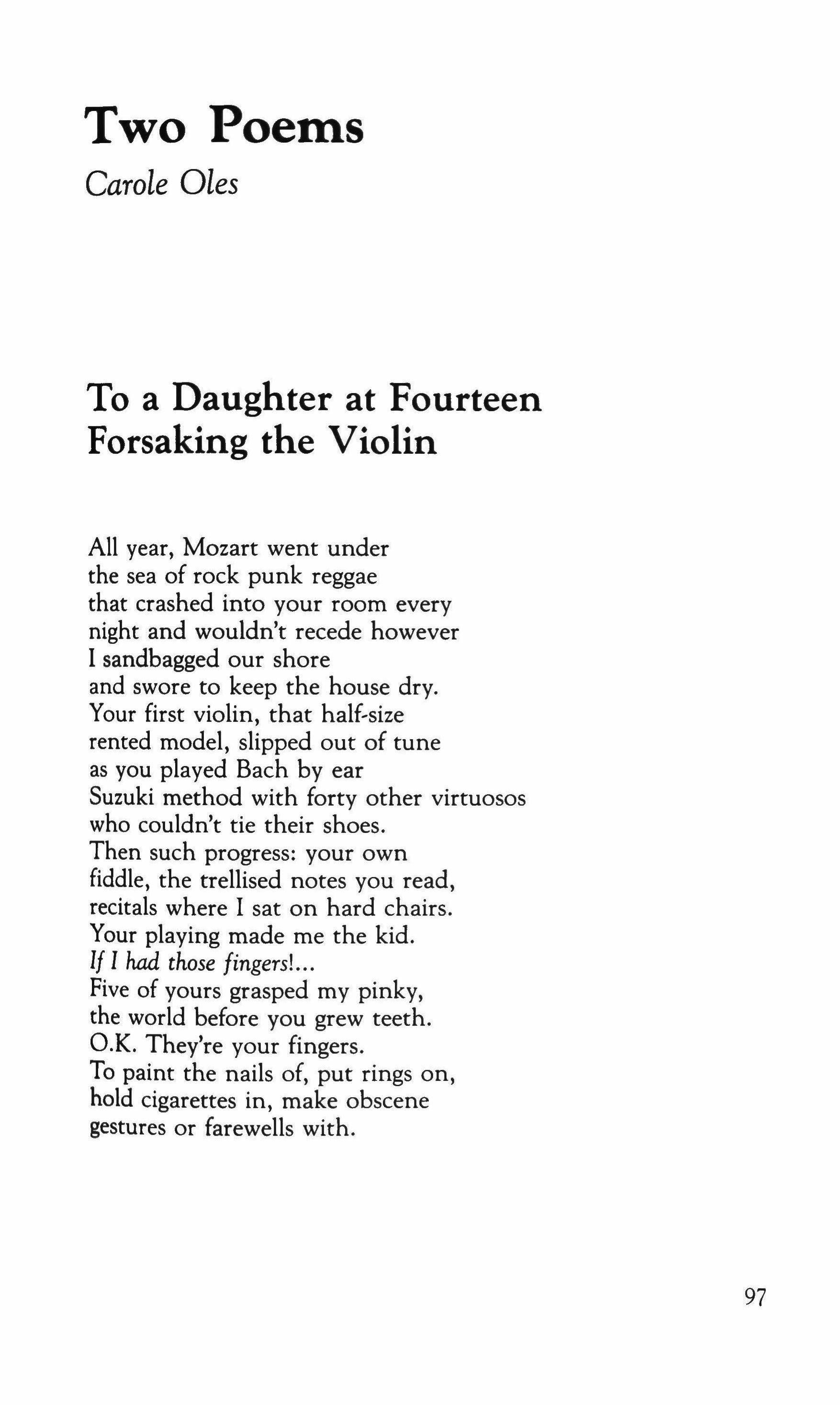
To a Daughter at Fourteen Forsaking the Violin
All year, Mozart went under the sea of rock punk reggae that crashed into your room every night and wouldn't recede however I sandbagged our shore and swore to keep the house dry. Your first violin, that half-size rented model, slipped out of tune as you played Bach by ear Suzuki method with forty other virtuosos who couldn't tie their shoes. Then such progress: your own fiddle, the trellised notes you read, recitals where I sat on hard chairs. Your playing made me the kid. If I had those fingers!...
Five of yours grasped my pinky, the world before you grew teeth.
O.K. They're your fingers. To paint the nails of, put rings on, hold cigarettes in, make obscene gestures or farewells with.
97
For the Drunk
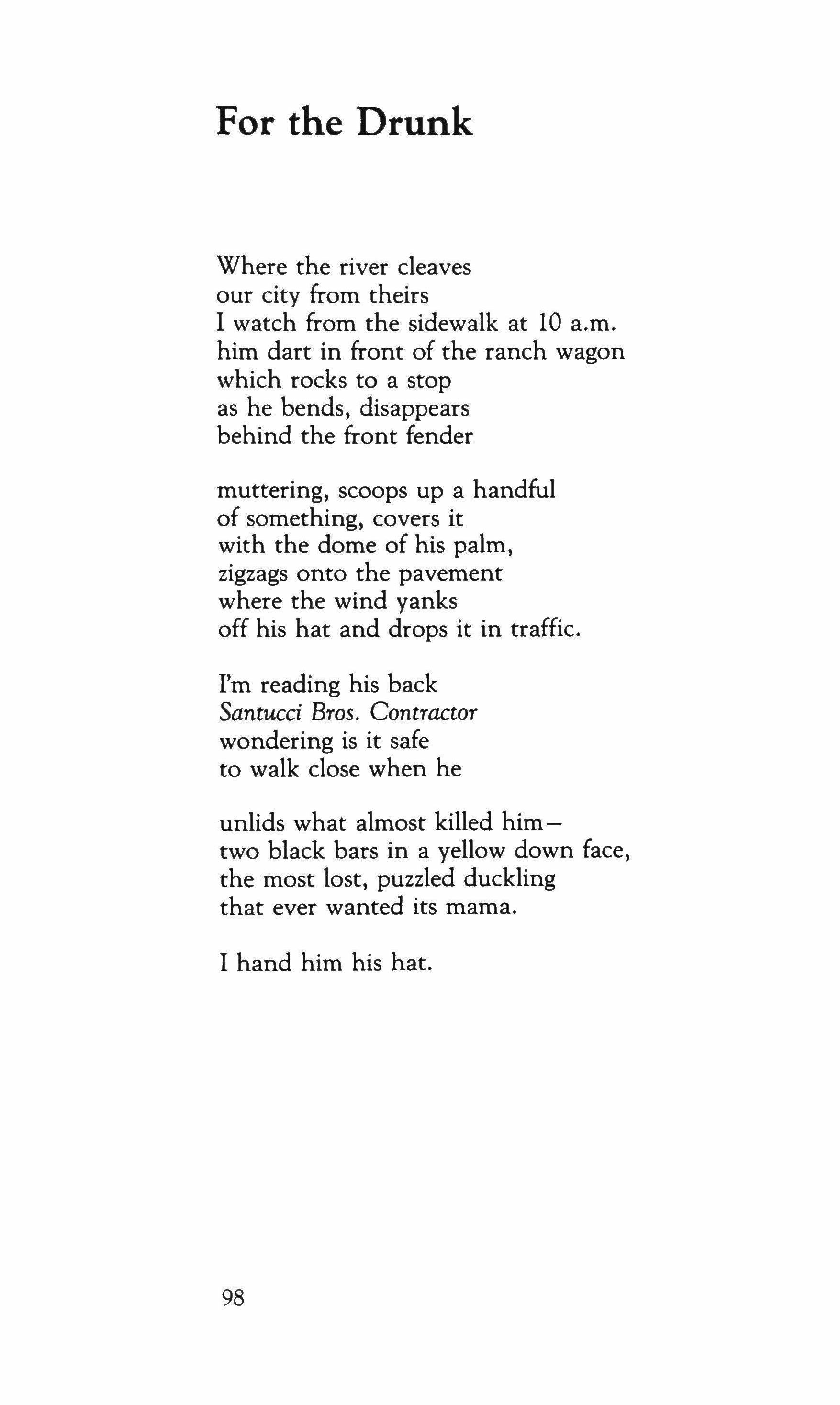
Where the river cleaves our city from theirs
I watch from the sidewalk at 10 a.m. him dart in front of the ranch wagon which rocks to a stop as he bends, disappears behind the front fender
muttering, scoops up a handful of something, covers it with the dome of his palm, zigzags onto the pavement where the wind yanks off his hat and drops it in traffic.
I'm reading his back Santucci Bros. Contractor wondering is it safe to walk close when he
unlids what almost killed himtwo black bars in a yellow down face, the most lost, puzzled duckling that ever wanted its mama.
I hand him his hat.
98
Sleeping Beauty
Stacy Doris

Swallows, doves, and whispers caught in midair we have lived in the kingdom a hundred years. In every hearth a fire froze, only brambles surrounding us grew, a flame thicket of rose.
A hundred years of princes pictured and feared the shade of sleep my castle cast. Born smiling, entranced, it took you no thought so you came to me. It is the magic lust of men to breathe to life a full-blown wife and world.
I never dreamed of them or you. I never dreamed. You came through the thorns blond and whistling in your armor. You leaned above me and listened and heard the rose my heart beat meditatively in its cavity like a holy man in his cave.
You stood above the century-silent reek of my breath, and thought to tongue it like a dormant flower. Without imagination you knew I must rise. It is because life drags back this way, to resurrection.
There is your kiss. I cleave, spitting from my belly the worms that wove and multiplied in rich sleep soil. My lungs surface like roses in a bowl.
99
Three Poems
Hans Magnus Enzensberger
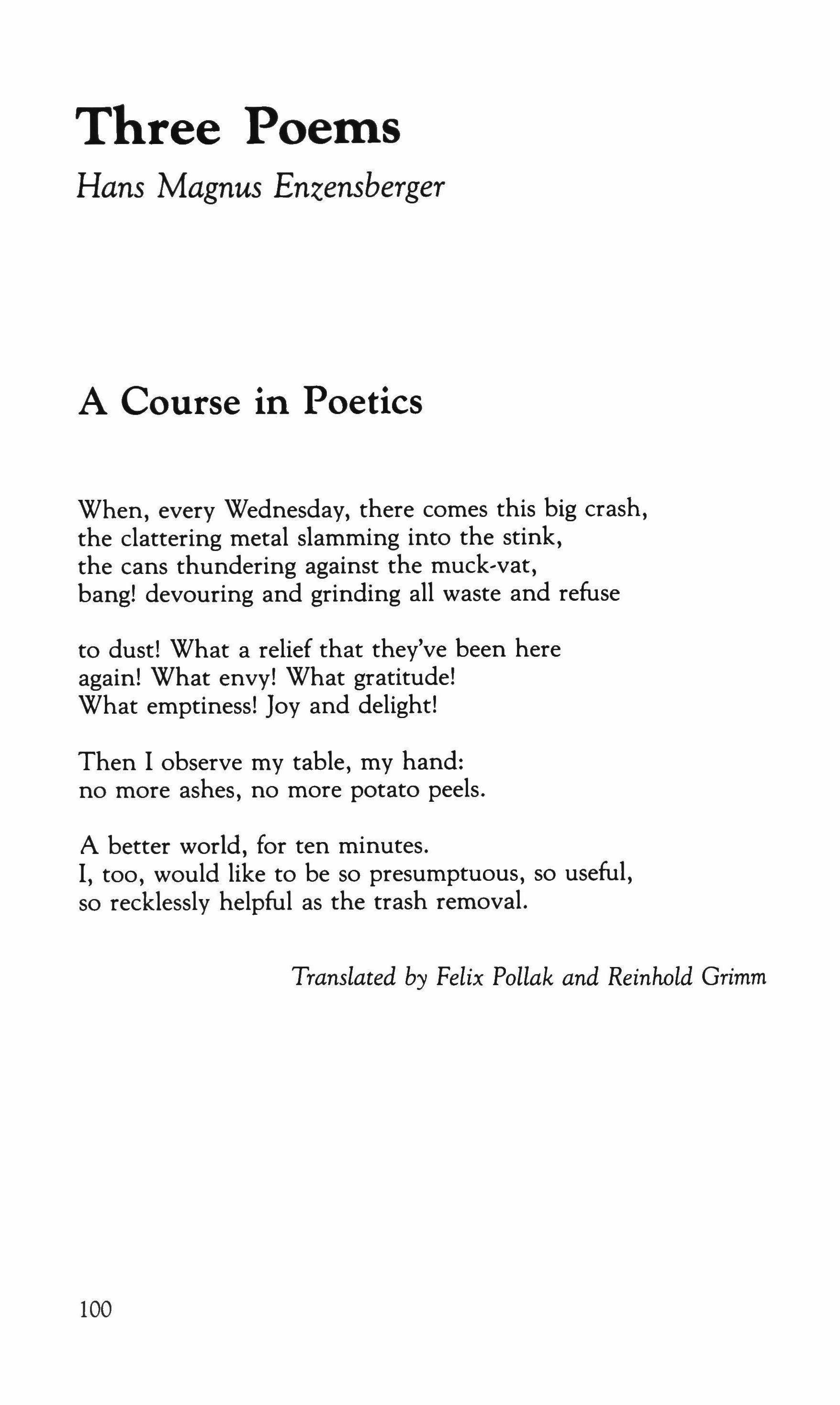
A Course in Poetics
When, every Wednesday, there comes this big crash, the clattering metal slamming into the stink, the cans thundering against the muck-vat, bang! devouring and grinding all waste and refuse
to dust! What a relief that they've been here again! What envy! What gratitude! What emptiness! Joy and delight!
Then I observe my table, my hand: no more ashes, no more potato peels.
A better world, for ten minutes. I, too, would like to be so presumptuous, so useful, so recklessly helpful as the trash removal.
Translated by Felix Pollak and Reinhold Grimm
100
Residual Light
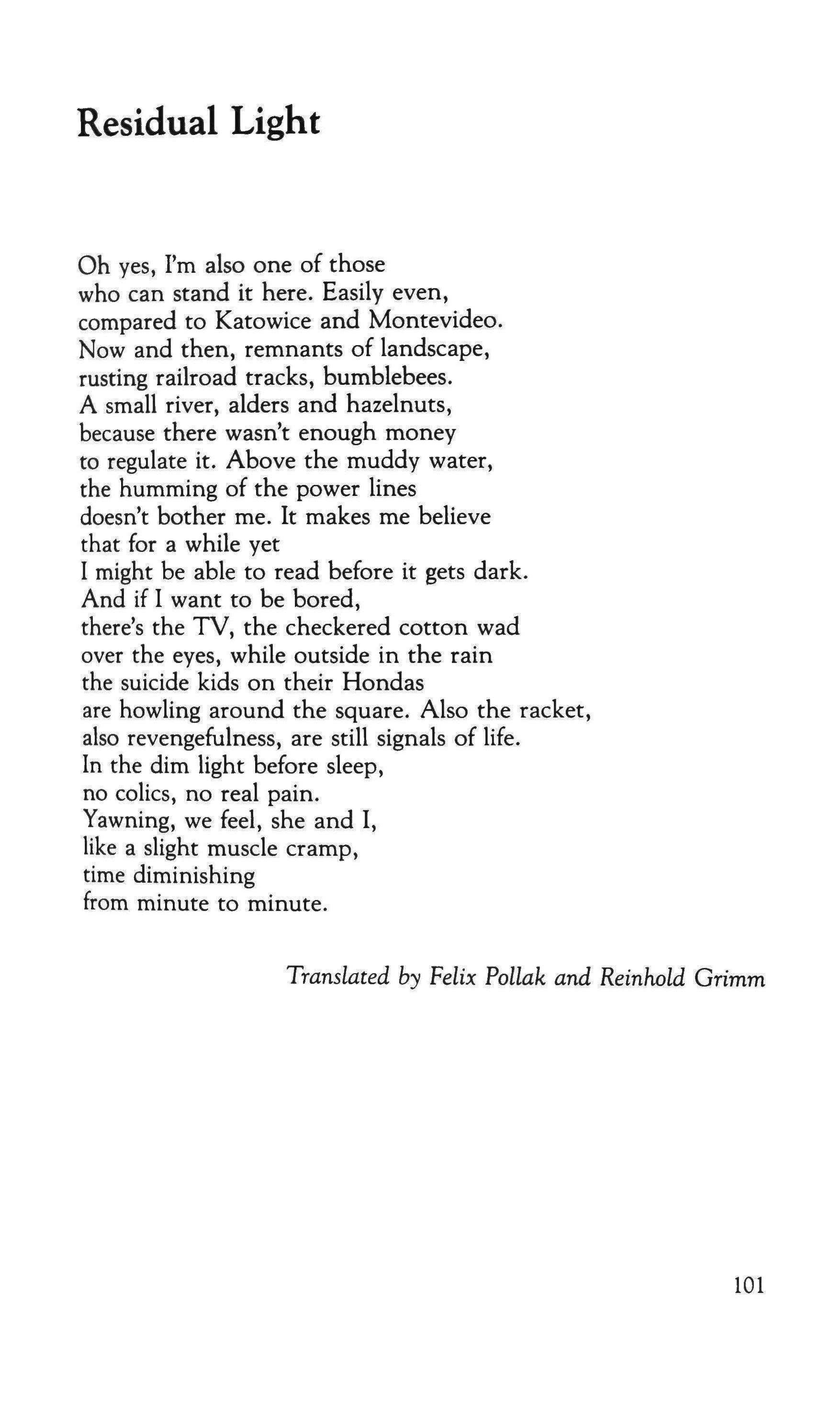
Oh yes, I'm also one of those who can stand it here. Easily even, compared to Katowice and Montevideo. Now and then, remnants of landscape, rusting railroad tracks, bumblebees. A small river, alders and hazelnuts, because there wasn't enough money to regulate it. Above the muddy water, the humming of the power lines doesn't bother me. It makes me believe that for a while yet I might be able to read before it gets dark. And if I want to be bored, there's the TV, the checkered cotton wad over the eyes, while outside in the rain the suicide kids on their Hondas are howling around the square. Also the racket, also revengefulness, are still signals of life. In the dim light before sleep, no colics, no real pain.
Yawning, we feel, she and I, like a slight muscle cramp, time diminishing from minute to minute.
Translated by Felix Pollak and Reinhold Grimm
101
Obsession

In the smoke, the pilot in his ejector-seat, in his nose dive, and the famished prisoner in his cell, and the drugged old man in the hospital, and the hermit in the desert, think, as I do, as does the expendable man who walks on his feet across the dreary boulevard, of women, of dark women who are blond, think, feverishly, of their smell, of their mother-of-pearl fingernails on the blond hair of the dark women who, sleepless and wan, think of the holy man in the hospital, of the nose diver on his straw mattress, in his desert, they even think fleetingly of the expendable man, crazy and sick, who talks to himself on his way to the river and cannot think of anything except women, the dark women who are now perhaps thinking of him, as he staggers hungrily across the bridge in the darkness.
Translated by Felix Pollak and Reinhold Grimm
102
Two Poems
Michael Knoll

Wintering at Santa Rita
In this desert prison named for a saint I watch the seasons pass and the world grow still: a landscape edged with wire and a handful of gray sky, so tiny beyond the window I could take all of it on my palm. Waking one morning I understand that this is what my life has corne to, this maze of identical white rooms, each one empty except for shadows and a voice which speaks in Spanish through the vents. Here under light that turns my skin the color of ashes I've corne through the first year. Last night I dreamed my body stepped apart from me, became a yellow forsythia grounded in stone beneath the window, that crack where rain leaked in spring. What the seasons had taken from me nourished the flower's stern and roots, a slow thickening like anger working against the bricks until I felt them shiver and the walls relent; and the thin scent of forsythia rose into the sky over gun towers.
103
To a Deaf Mute
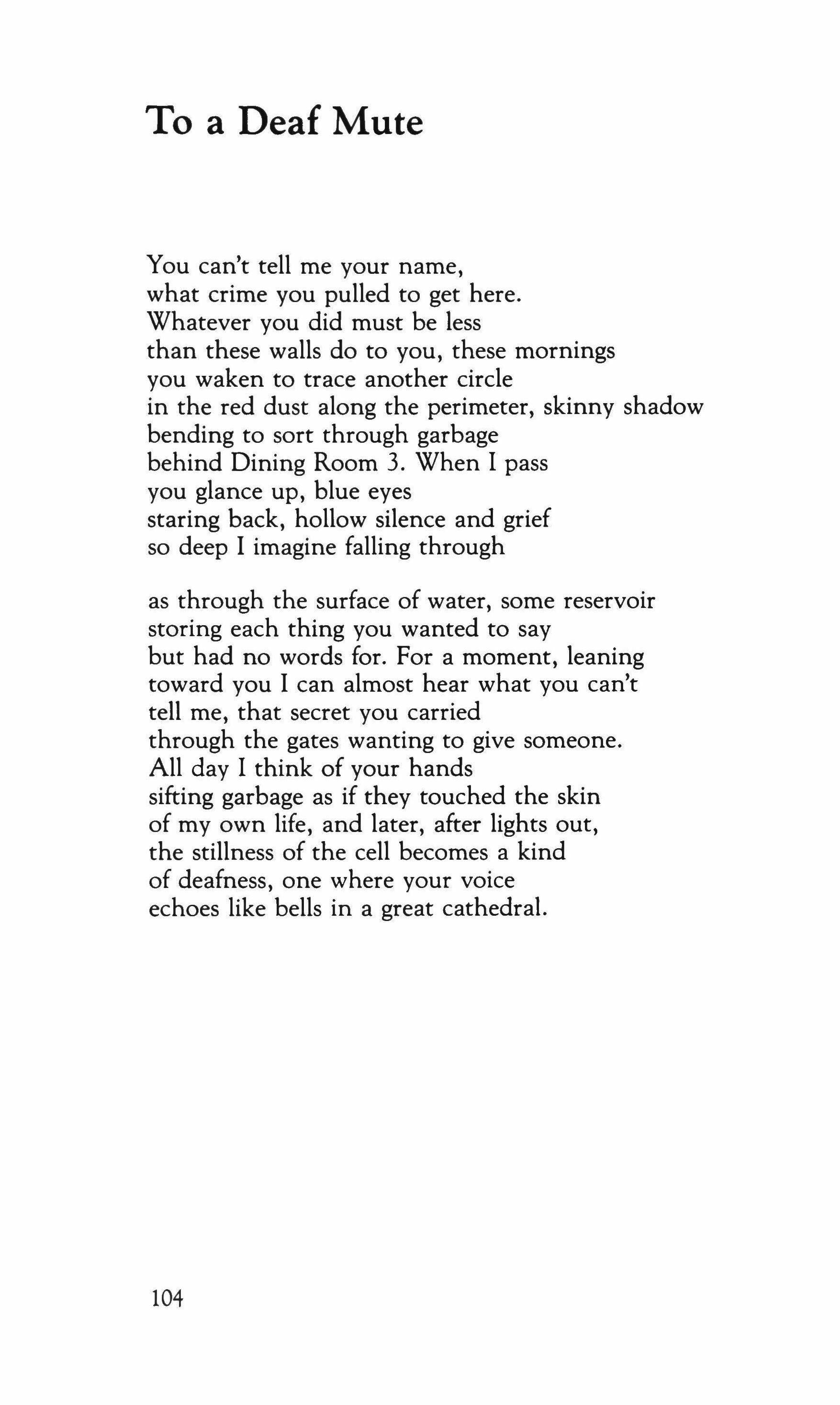
You can't tell me your name, what crime you pulled to get here. Whatever you did must be less than these walls do to you, these mornings you waken to trace another circle in the red dust along the perimeter, skinny shadow bending to sort through garbage behind Dining Room 3. When I pass you glance up, blue eyes staring back, hollow silence and grief so deep I imagine falling through
as through the surface of water, some reservoir storing each thing you wanted to say but had no words for. For a moment, leaning toward you I can almost hear what you can't tell me, that secret you carried through the gates wanting to give someone. All day I think of your hands sifting garbage as if they touched the skin of my own life, and later, after lights out, the stillness of the cell becomes a kind of deafness, one where your voice echoes like bells in a great cathedral.
104
Two Poems
Gerald McCarthy
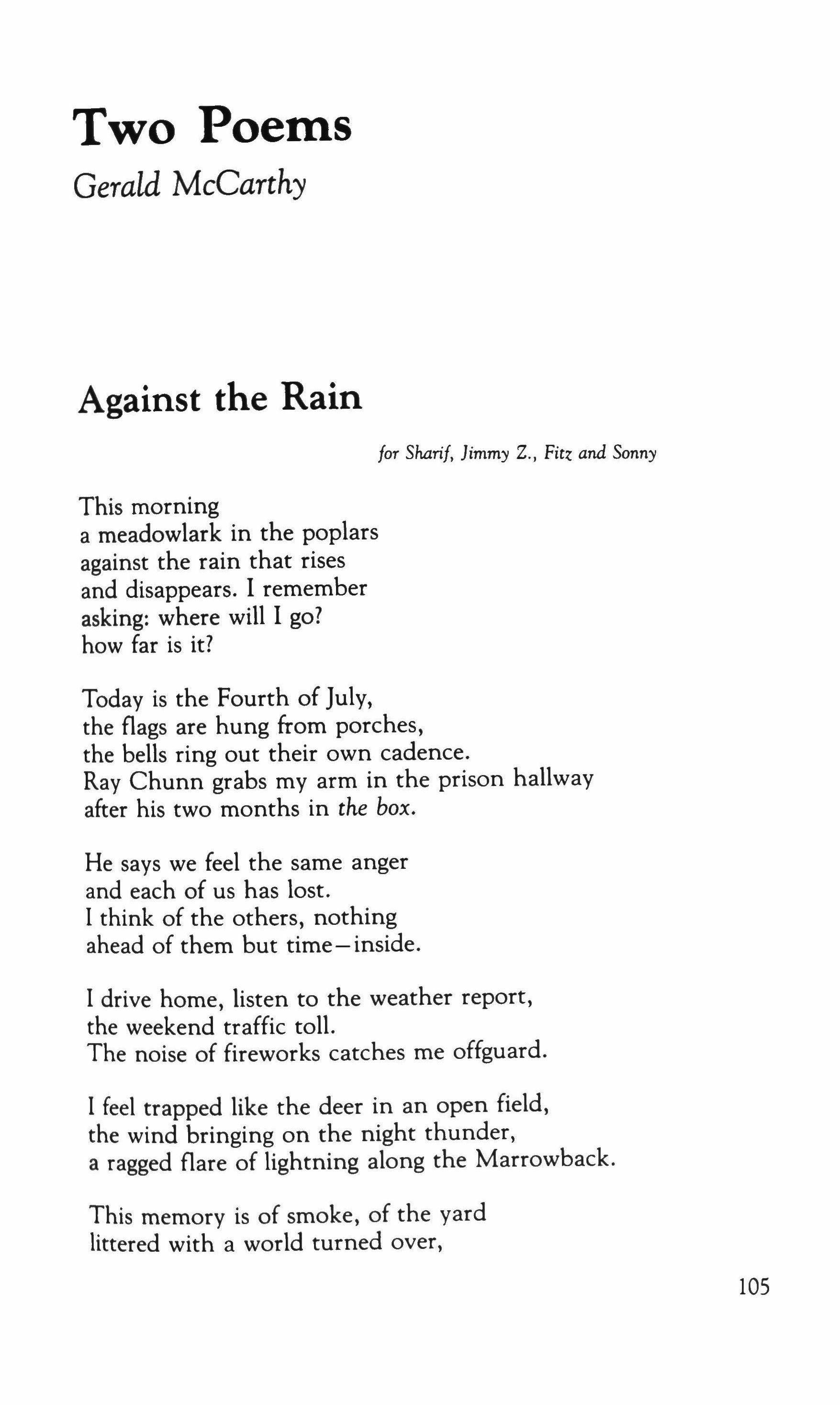
Against the Rain
for Sharif, Jimmy Z., Fitz and Sonny
This morning a meadowlark in the poplars against the rain that rises and disappears. I remember asking: where will I go? how far is it?
Today is the Fourth of July, the flags are hung from porches, the bells ring out their own cadence.
Ray Chunn grabs my arm in the prison hallway after his two months in the box.
He says we feel the same anger and each of us has lost. I think of the others, nothing ahead of them but time-inside.
I drive home, listen to the weather report, the weekend traffic toll. The noise of fireworks catches me offguard.
I feel trapped like the deer in an open field, the wind bringing on the night thunder, a ragged flare of lightning along the Marrowback.
This memory is of smoke, of the yard littered with a world turned over,
105

a stain that keeps spreading into all the pictures, wounds that will not heal.
Those who have gone away with the fire do not come back.
106
For a Friend in Prison
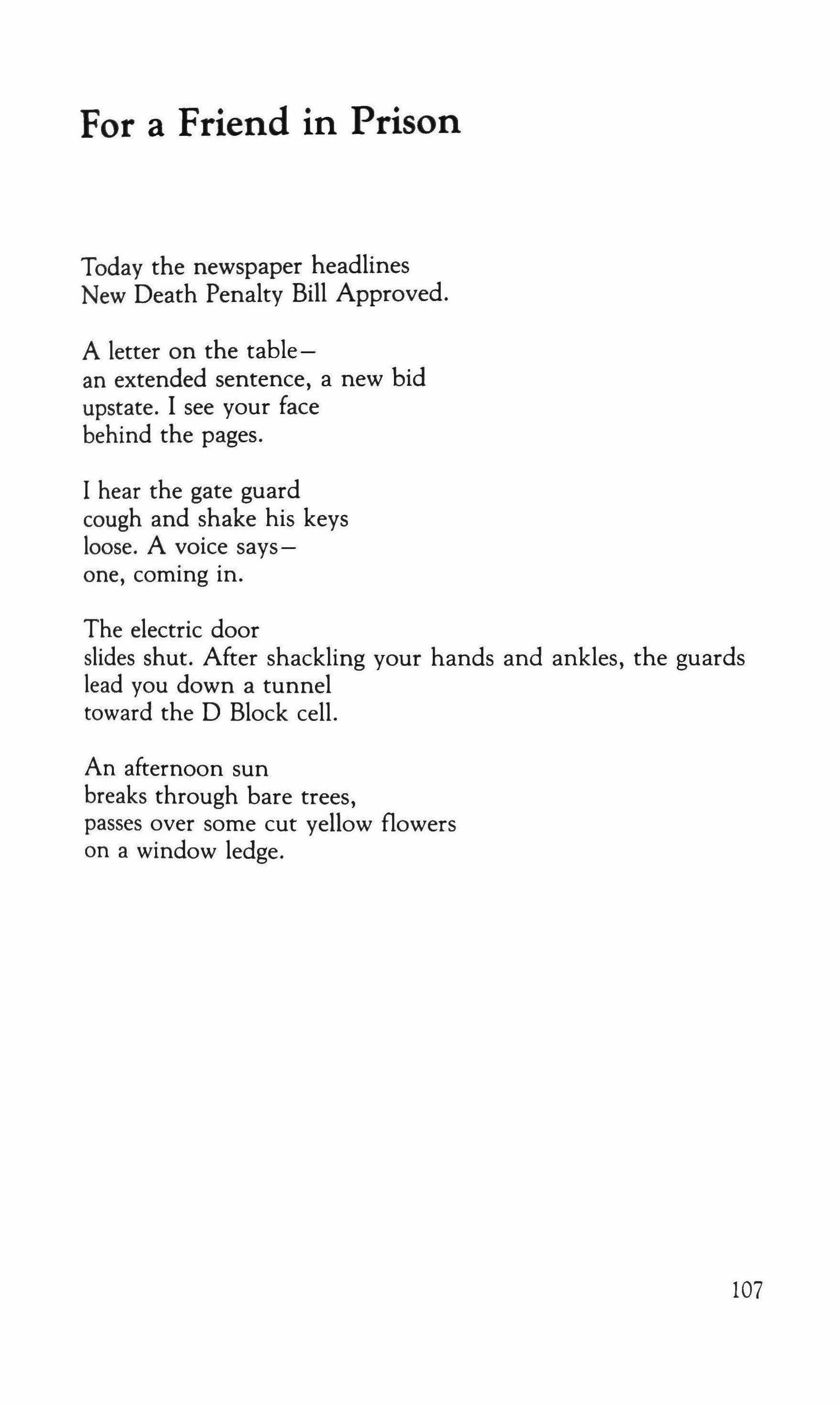
Today the newspaper headlines New Death Penalty Bill Approved.
A letter on the tablean extended sentence, a new bid upstate. I see your face behind the pages.
I hear the gate guard cough and shake his keys loose. A voice saysone, coming in.
The electric door slides shut. After shackling your hands and ankles, the guards lead you down a tunnel toward the D Block cell.
An afternoon sun breaks through bare trees, passes over some cut yellow flowers on a window ledge.
107
Like Hunger and Thirst
]osephine Jacobsen
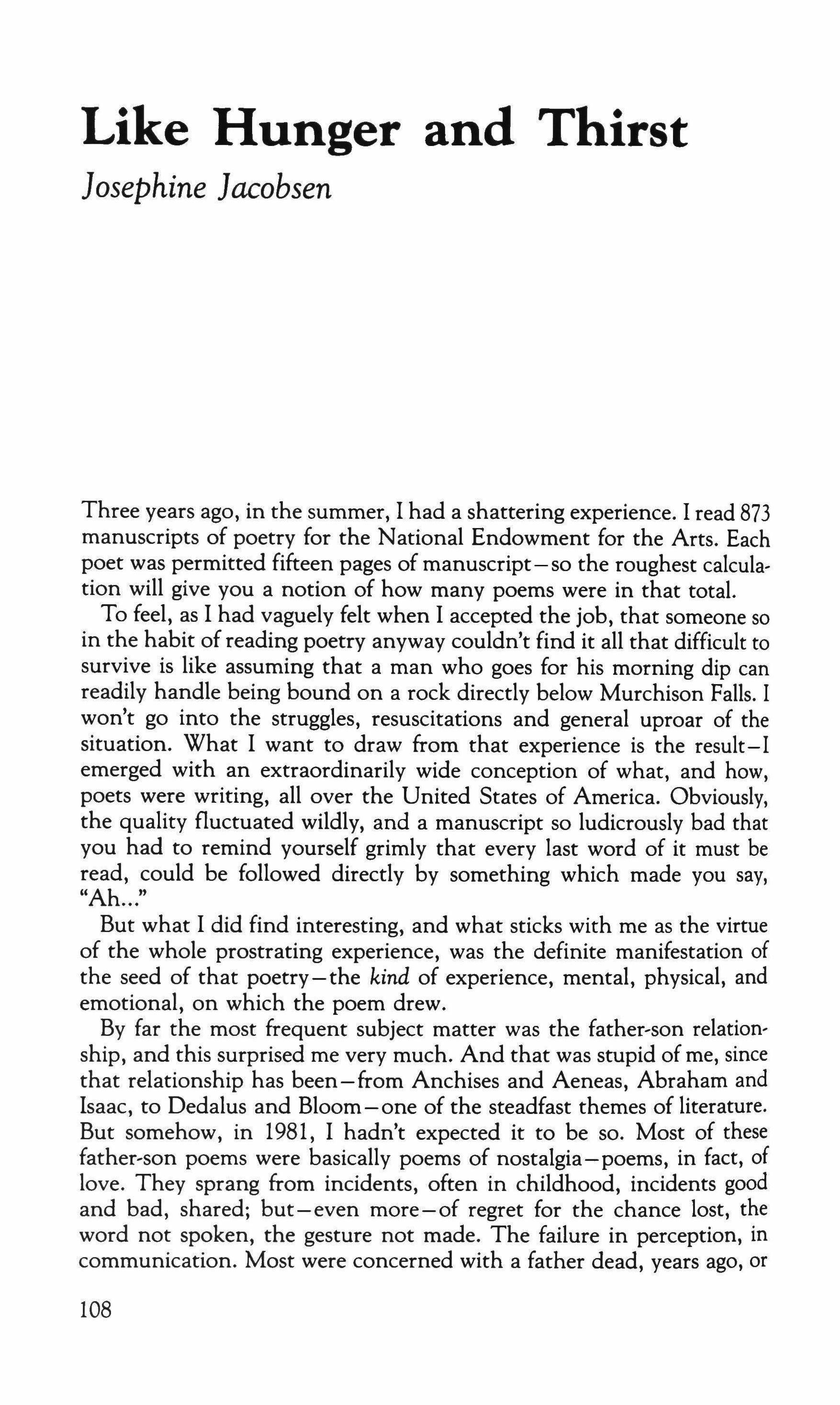
Three years ago, in the summer, I had a shattering experience. I read 873 manuscripts of poetry for the National Endowment for the Arts. Each poet was permitted fifteen pages of manuscript - so the roughest calculation will give you a notion of how many poems were in that total.
To feel, as I had vaguely felt when I accepted the job, that someone so in the habit of reading poetry anyway couldn't find it all that difficult to survive is like assuming that a man who goes for his morning dip can readily handle being bound on a rock directly below Murchison Falls. I won't go into the struggles, resuscitations and general uproar of the situation. What I want to draw from that experience is the result-I emerged with an extraordinarily wide conception of what, and how, poets were writing, all over the United States of America. Obviously, the quality fluctuated wildly, and a manuscript so ludicrously bad that you had to remind yourself grimly that every last word of it must be read, could be followed directly by something which made you say, "Ah
But what I did find interesting, and what sticks with me as the virtue of the whole prostrating experience, was the definite manifestation of the seed of that poetry-the kind of experience, mental, physical, and emotional, on which the poem drew.
By far the most frequent subject matter was the father-son relationship, and this surprised me very much. And that was stupid of me, since that relationship has been-from Anchises and Aeneas, Abraham and Isaac, to Dedalus and Bloom - one of the steadfast themes of literature. But somehow, in 1981, I hadn't expected it to be so. Most of these father-son poems were basically poems of nostalgia-poems, in fact, of love. They sprang from incidents, often in childhood, incidents good and bad, shared; but-even more-of regret for the chance lost, the word not spoken, the gesture not made. The failure in perception, in communication. Most were concerned with a father dead, years ago, or
108
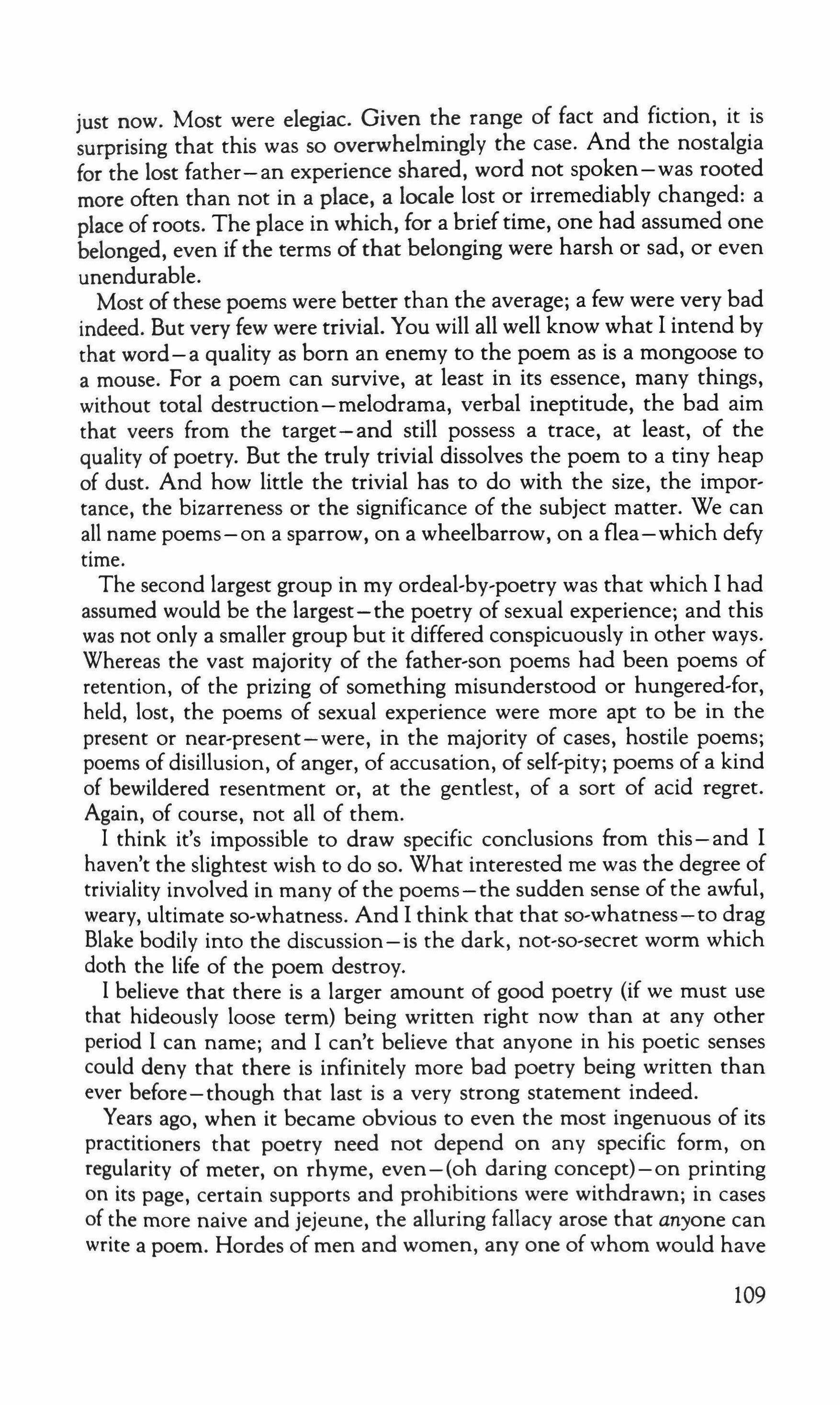
just now. Most were elegiac. Given the range of fact and fiction, it is surprising that this was so overwhelmingly the case. And the nostalgia for the lost father-an experience shared, word not spoken-was rooted more often than not in a place, a locale lost or irremediably changed: a place of roots. The place in which, for a brieftime, one had assumed one belonged, even if the terms of that belonging were harsh or sad, or even unendurable.
Most of these poems were better than the average; a few were very bad indeed. But very few were trivial. You will all well know what I intend by that word - a quality as born an enemy to the poem as is a mongoose to a mouse. For a poem can survive, at least in its essence, many things, without total destruction - melodrama, verbal ineptitude, the bad aim that veers from the target-and still possess a trace, at least, of the quality of poetry. But the truly trivial dissolves the poem to a tiny heap of dust. And how little the trivial has to do with the size, the importance, the bizarreness or the significance of the subject matter. We can all name poems-on a sparrow, on a wheelbarrow, on a flea-which defy time.
The second largest group in my ordeal-by-poetry was that which I had assumed would be the largest - the poetry of sexual experience; and this was not only a smaller group but it differed conspicuously in other ways. Whereas the vast majority of the father-son poems had been poems of retention, of the prizing of something misunderstood or hungered-for, held, lost, the poems of sexual experience were more apt to be in the present or near-present-were, in the majority of cases, hostile poems; poems of disillusion, of anger, of accusation, of self-pity; poems of a kind of bewildered resentment or, at the gentlest, of a sort of acid regret. Again, of course, not all of them.
I think it's impossible to draw specific conclusions from this-and I haven't the slightest wish to do so. What interested me was the degree of triviality involved in many of the poems-the sudden sense of the awful, weary, ultimate so-whatness. And I think that that so-whatness-to drag Blake bodily into the discussion-is the dark, not-so-secret worm which doth the life of the poem destroy.
I believe that there is a larger amount of good poetry (if we must use that hideously loose term) being written right now than at any other period I can name; and I can't believe that anyone in his poetic senses could deny that there is infinitely more bad poetry being written than ever before - though that last is a very strong statement indeed.
Years ago, when it became obvious to even the most ingenuous of its practitioners that poetry need not depend on any specific form, on regularity of meter, on rhyme, even-(oh daring concept)-on printing on its page, certain supports and prohibitions were withdrawn; in cases of the more naive and jejeune, the alluring fallacy arose that anyone can write a poem. Hordes of men and women, anyone of whom would have
109
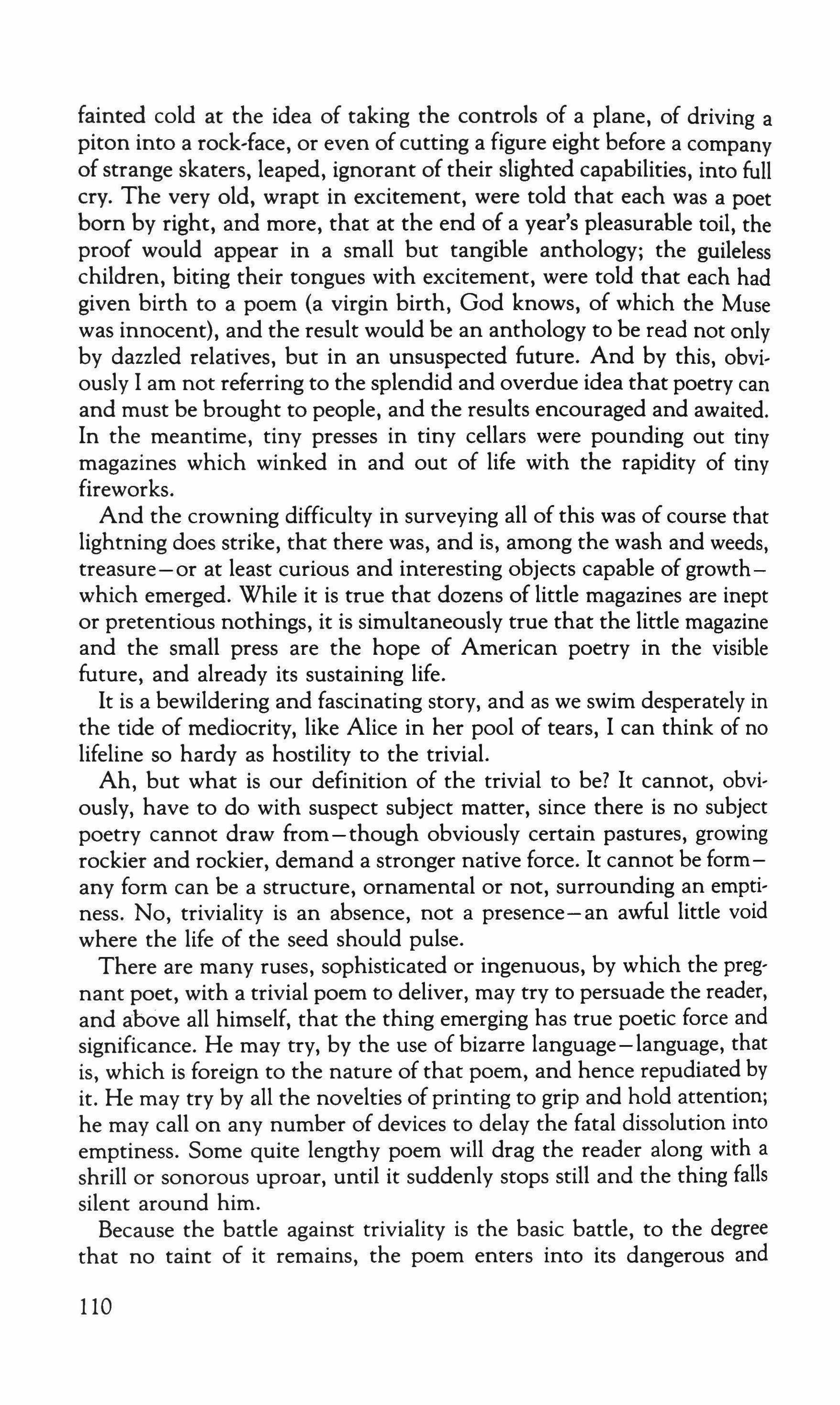
fainted cold at the idea of taking the controls of a plane, of driving a piton into a rock-face, or even of cutting a figure eight before a company of strange skaters, leaped, ignorant of their slighted capabilities, into full cry. The very old, wrapt in excitement, were told that each was a poet born by right, and more, that at the end of a year's pleasurable toil, the proof would appear in a small but tangible anthology; the guileless children, biting their tongues with excitement, were told that each had given birth to a poem (a virgin birth, God knows, of which the Muse was innocent), and the result would be an anthology to be read not only by dazzled relatives, but in an unsuspected future. And by this, obviously I am not referring to the splendid and overdue idea that poetry can and must be brought to people, and the results encouraged and awaited. In the meantime, tiny presses in tiny cellars were pounding out tiny magazines which winked in and out of life with the rapidity of tiny fireworks.
And the crowning difficulty in surveying all of this was of course that lightning does strike, that there was, and is, among the wash and weeds, treasure-or at least curious and interesting objects capable of growthwhich emerged. While it is true that dozens of little magazines are inept or pretentious nothings, it is simultaneously true that the little magazine and the small press are the hope of American poetry in the visible future, and already its sustaining life.
It is a bewildering and fascinating story, and as we swim desperately in the tide of mediocrity, like Alice in her pool of tears, I can think of no lifeline so hardy as hostility to the trivial.
Ah, but what is our definition of the trivial to be? It cannot, obviously, have to do with suspect subject matter, since there is no subject poetry cannot draw from-though obviously certain pastures, growing rockier and rockier, demand a stronger native force. It cannot be formany form can be a structure, ornamental or not, surrounding an emptiness. No, triviality is an absence, not a presence-an awful little void where the life of the seed should pulse.
There are many ruses, sophisticated or ingenuous, by which the pregnant poet, with a trivial poem to deliver, may try to persuade the reader, and a:bove all himself, that the thing emerging has true poetic force and significance. He may try, by the use of bizarre language-language, that is, which is foreign to the nature of that poem, and hence repudiated by it. He may try by all the novelties of printing to grip and hold attention; he may call on any number of devices to delay the fatal dissolution into emptiness. Some quite lengthy poem will drag the reader along with a shrill or sonorous uproar, until it suddenly stops still and the thing falls silent around him.
Because the battle against triviality is the basic battle, to the degree that no taint of it remains, the poem enters into its dangerous and
110
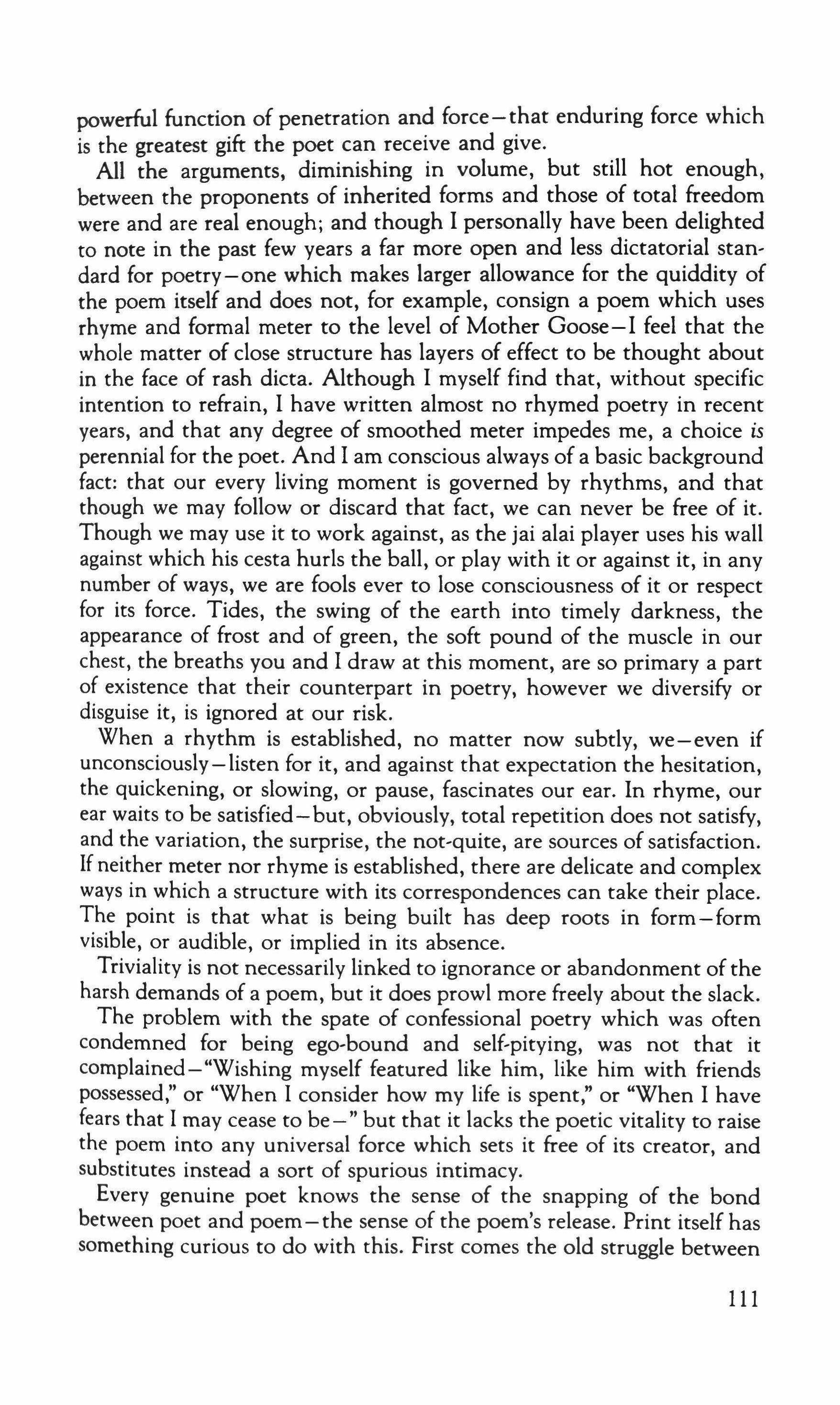
powerful function of penetration and force-that enduring force which is the greatest gift the poet can receive and give.
All the arguments, diminishing in volume, but still hot enough, between the proponents of inherited forms and those of total freedom were and are real enough; and though I personally have been delighted to note in the past few years a far more open and less dictatorial standard for poetry - one which makes larger allowance for the quiddity of the poem itself and does not, for example, consign a poem which uses rhyme and formal meter to the level of Mother Goose-I feel that the whole matter of close structure has layers of effect to be thought about in the face of rash dicta. Although I myself find that, without specific intention to refrain, I have written almost no rhymed poetry in recent years, and that any degree of smoothed meter impedes me, a choice is perennial for the poet. And I am conscious always of a basic background fact: that our every living moment is governed by rhythms, and that though we may follow or discard that fact, we can never be free of it. Though we may use it to work against, as the jai alai player uses his wall against which his cesta hurls the ball, or play with it or against it, in any number of ways, we are fools ever to lose consciousness of it or respect for its force. Tides, the swing of the earth into timely darkness, the appearance of frost and of green, the soft pound of the muscle in our chest, the breaths you and I draw at this moment, are so primary a part of existence that their counterpart in poetry, however we diversify or disguise it, is ignored at our risk.
When a rhythm is established, no matter now subtly, we-even if unconsciously-listen for it, and against that expectation the hesitation, the quickening, or slowing, or pause, fascinates our ear. In rhyme, our ear waits to be satisfied - but, obviously, total repetition does not satisfy, and the variation, the surprise, the not-quite, are sources of satisfaction. If neither meter nor rhyme is established, there are delicate and complex ways in which a structure with its correspondences can take their place. The point is that what is being built has deep roots in form-form visible, or audible, or implied in its absence.
Triviality is not necessarily linked to ignorance or abandonment of the harsh demands of a poem, but it does prowl more freely about the slack.
The problem with the spate of confessional poetry which was often condemned for being ego-bound and self-pitying, was not that it complained - "Wishing myself featured like him, like him with friends possessed," or "When I consider how my life is spent," or "When I have fears that I may cease to be -" but that it lacks the poetic vitality to raise the poem into any universal force which sets it free of its creator, and substitutes instead a sort of spurious intimacy.
Every genuine poet knows the sense of the snapping of the bond between poet and poem - the sense of the poem's release. Print itself has something curious to do with this. First comes the old struggle between
111

Jacob and the Angel, the real struggle, the thing itself. Then comes the brief or interminable work of correcting the flaw, of discarding the intruder-word, the sudden awful perception of the soft spot, the excrescence. The cliche that a poem is never completed but merely abandoned has, like any cliche, the harsh salt oftruth in it. But abandoned it is, and then should, and often does, come that sharp separation - the knowledge that this is something which you never did and never can possess. Somehow, that separation is made easier or more distinct by the poem's entry into print. There it goes, better or worse, to fend for itself, in some ways as strange to you as any other poem. (Though of course triviality and print are old cronies; they have spent a lot of time together.) I tried to say something about this necessary separation of poem from poet in a poem called "The Poem Itself."
The Poem Itself
From the ripe silence it exploded silently. When the bright debris subsided it was there.
Invisible, inaudible; only the inky shapes betrayed it. Betrayed is the word.
Thence it moved into squalor, a royal virgin in a brothel, improbably whole.
It had its followers, pimps, even its lovers. The man responsible died, eventually.
When the dust of his brain left the bones the bond snapped. It escaped to itself. It no longer answered.
On the shelf, by the clock's tick, in the black stacks of midnight: it is. A moon to all its tide.
(From The Animal Inside)
There is an interesting trace of similarity between the explosion of poetry, trivial and otherwise, and the explosion of cults-and that analogy could be carried on, I think, with fascinating results. But here I want merely to note a number of things which have forced poetry to face more of a challenge than any of the other arts, a conviction which it is pleasant to throw out, without having to defend here. A number of these things are related to efforts to find a theological, or tribal, or spiritual, or just humanly significant, base; and those efforts run all the way from the ludicrous or the murderous, to very moving and occasion-
112
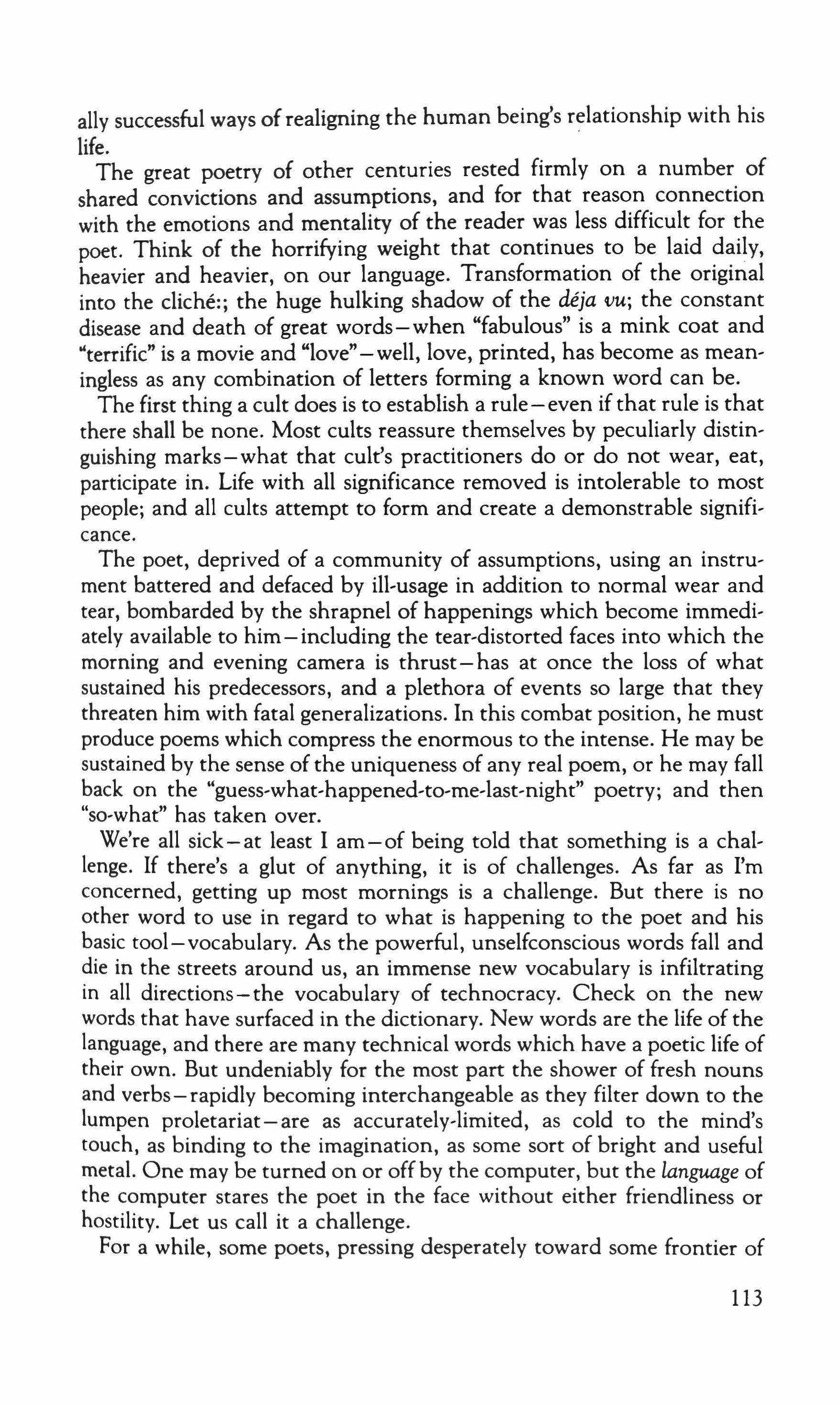
ally successful ways ofrealigning the human being's relationship with his life.
The great poetry of other centuries rested firmly on a number of shared convictions and assumptions, and for that reason connection with the emotions and mentality of the reader was less difficult for the poet. Think of the horrifying weight that continues to be laid daily, heavier and heavier, on our language. Transformation of the original into the cliche.; the huge hulking shadow of the deja vU; the constant disease and death of great words - when "fabulous" is a mink coat and "terrific" is a movie and "love" - well, love, printed, has become as meaningless as any combination of letters forming a known word can be.
The first thing a cult does is to establish a rule - even if that rule is that there shall be none. Most cults reassure themselves by peculiarly distinguishing marks-what that cult's practitioners do or do not wear, eat, participate in. Life with all significance removed is intolerable to most people; and all cults attempt to form and create a demonstrable significance.
The poet, deprived of a community of assumptions, using an instrument battered and defaced by ill-usage in addition to normal wear and tear, bombarded by the shrapnel of happenings which become irnmediately available to him - including the tear-distorted faces into which the morning and evening camera is thrust-has at once the loss of what sustained his predecessors, and a plethora of events so large that they threaten him with fatal generalizations. In this combat position, he must produce poems which compress the enormous to the intense. He may be sustained by the sense of the uniqueness of any real poem, or he may fall back on the "guess�what�happened�to�me�last�night" poetry; and then "so-what" has taken over.
We're all sick-at least I am-of being told that something is a challenge. If there's a glut of anything, it is of challenges. As far as I'm concerned, getting up most mornings is a challenge. But there is no other word to use in regard to what is happening to the poet and his basic tool-vocabulary. As the powerful, unselfconscious words fall and die in the streets around us, an immense new vocabulary is infiltrating in all directions-the vocabulary of technocracy. Check on the new words that have surfaced in the dictionary. New words are the life of the language, and there are many technical words which have a poetic life of their own. But undeniably for the most part the shower of fresh nouns and verbs-rapidly becoming interchangeable as they filter down to the lumpen proletariat - are as accuratelv-lirnited, as cold to the mind's touch, as binding to the imagination, as some sort of bright and useful metal. One may be turned on or offby the computer, but the language of the computer stares the poet in the face without either friendliness or hostility. Let us call it a challenge.
For a while, some poets, pressing desperately toward some frontier of
113

language, seized upon words which, however ordinary and even ancient were at least new to the august printed page-and "fuck" and "cunt" and "crap" gave to some the illusion of a fresh approach. But what they had to offer was their novelty in those hitherto inhospitable territories-and the fruit fly has nothing on novelty for a brief life.
While the trivial, the technical, the labored, press around poetry, its concern remains nothing less than the aspiration toward greatness, however rarely true greatness is achieved. This has been the perception of poetry down through the ages, and oddly enough, it persists-in often ludicrous forms, even right into the camp of those most ignorant of its true nature.
Poetry is in the curious position of being most-honored and least read. Except for the lost souls who consider poetry in terms of greeting-card sentiment, or the sort of verses which used to be framed for edification, poetry has about it-even for those who consider the voluntary reading of a poem as a strictly exotic action - a genuine aura of what they might call the "superior." To identify oneself as a poet is, it's true, to place oneself out ofthe world in which people do real things, such as manufacture cornflakes or jump up and down on the stock exchange floor, but it is also, in some shadowy way, to claim relationship with a mysterious and august company - something which, if not allowed dangerously to impinge on actual life, is good to know as existing somewhere. And while I am laughing at this, I am also not laughing. That misconceived and inaccurate picture of what poetry is, as those we are speaking of would say, "all about:' does say something about poetry's unique nature.
I can't forbear here to remember an occasion which represents the quintessence of the meeting or collision between the body of poets and the body of their irremediable admirers. It was some years ago, when the Emily Dickinson commemorative stamp was issued and there was an elaborate party in New York, on one of the top floors of one ofthe taller buildings, in honor of the event, at which the painting of the stamp's subject was to be unveiled. This took place under the auspices of the unlikely combination of Time magazine, the U.S. Postal Service, and one of the major poetry organizations. The Postmaster General was to have made a brief speech, but he was at the last minute unavailable, being delayed on some mission out of the country. Instead, at the last instant, a luckless subofficial had been snatched from his desk and told to speak, for ten minutes or so, on Poetry.
The poets present were grouped together in a loose huddle, glasses in hand. So, up the speaker got, and there was a hush as the boys with trays of canapes slung around their necks paused, and the bartenders took their hands off the glasses, and the babel of voices died.
The speaker said that he lived in a workaday world far, alas, from poetry, and he acknowledged that this was the common lot. But, he
114
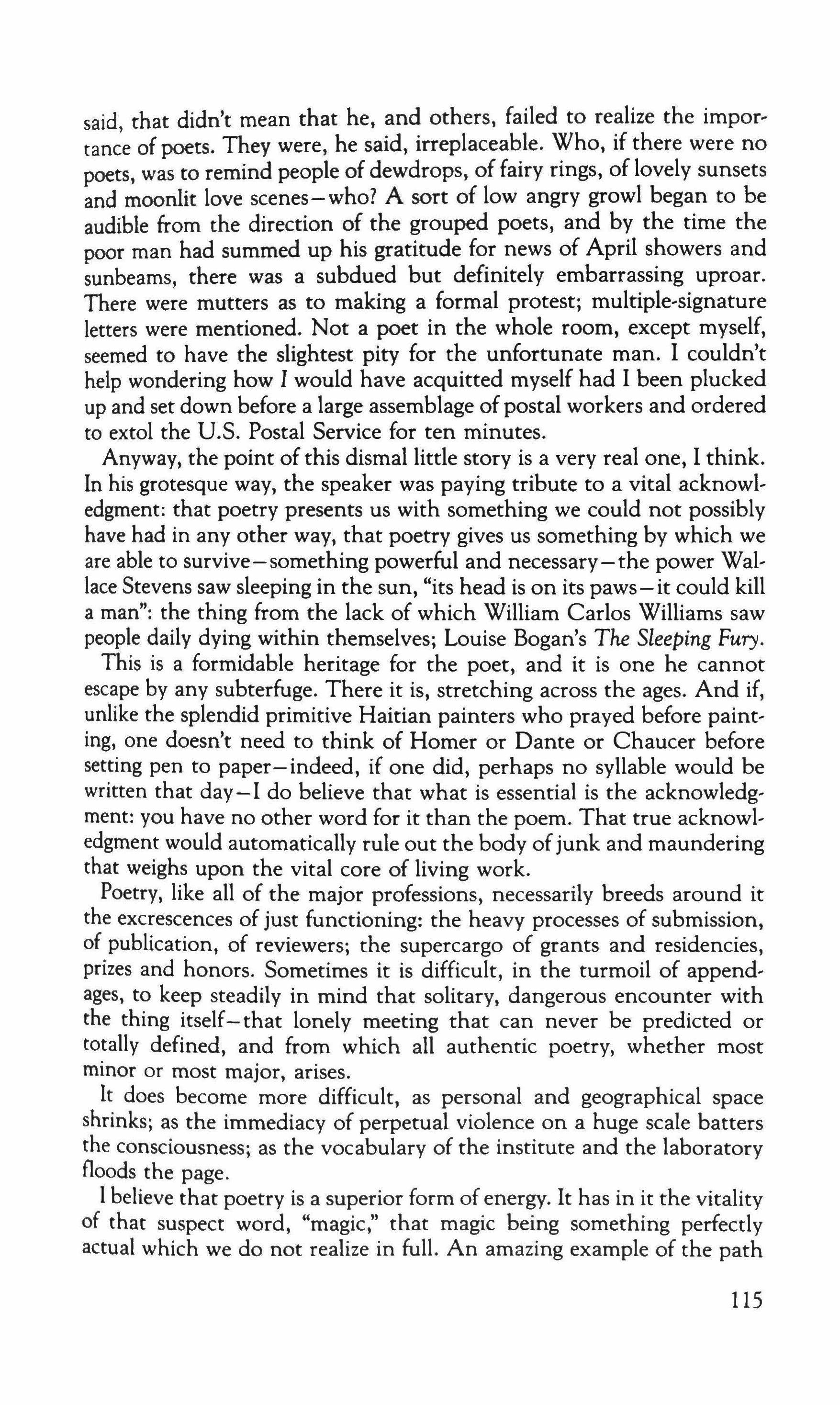
said, that didn't mean that he, and others, failed to realize the importance of poets. They were, he said, irreplaceable. Who, if there were no poets, was to remind people of dewdrops, of fairy rings, of lovely sunsets and moonlit love scenes-who? A sort of low angry growl began to be audible from the direction of the grouped poets, and by the time the poor man had summed up his gratitude for news of April showers and sunbeams, there was a subdued but definitely embarrassing uproar. There were mutters as to making a formal protest; multiple-signature letters were mentioned. Not a poet in the whole room, except myself, seemed to have the slightest pity for the unfortunate man. I couldn't help wondering how I would have acquitted myself had I been plucked up and set down before a large assemblage ofpostal workers and ordered to extol the U.S. Postal Service for ten minutes.
Anyway, the point of this dismal little story is a very real one, I think. In his grotesque way, the speaker was paying tribute to a vital acknowledgment: that poetry presents us with something we could not possibly have had in any other way, that poetry gives us something by which we are able to survive-something powerful and necessary-the power Wal, lace Stevens saw sleeping in the sun, "its head is on its paws-it could kill a man": the thing from the lack of which William Carlos Williams saw people daily dying within themselves; Louise Bogan's The Sleeping Fury. This is a formidable heritage for the poet, and it is one he cannot escape by any subterfuge. There it is, stretching across the ages. And if, unlike the splendid primitive Haitian painters who prayed before paint, ing, one doesn't need to think of Horner or Dante or Chaucer before setting pen to paper-indeed, if one did, perhaps no syllable would be written that day - I do believe that what is essential is the acknowledgment: you have no other word for it than the poem. That true acknowledgment would automatically rule out the body ofjunk and maundering that weighs upon the vital core of living work.
Poetry, like all of the major professions, necessarily breeds around it the excrescences of just functioning: the heavy processes of submission, of publication, of reviewers; the supercargo of grants and residencies, prizes and honors. Sometimes it is difficult, in the turmoil of append, ages, to keep steadily in mind that solitary, dangerous encounter with the thing itself-that lonely meeting that can never be predicted or totally defined, and from which all authentic poetry, whether most minor or most major, arises.
It does become more difficult, as personal and geographical space shrinks; as the immediacy of perpetual violence on a huge scale batters the consciousness; as the vocabulary of the institute and the laboratory floods the page.
I believe that poetry is a superior form of energy. It has in it the vitality of that suspect word, "magic," that magic being something perfectly actual which we do not realize in full. An amazing example of the path
115
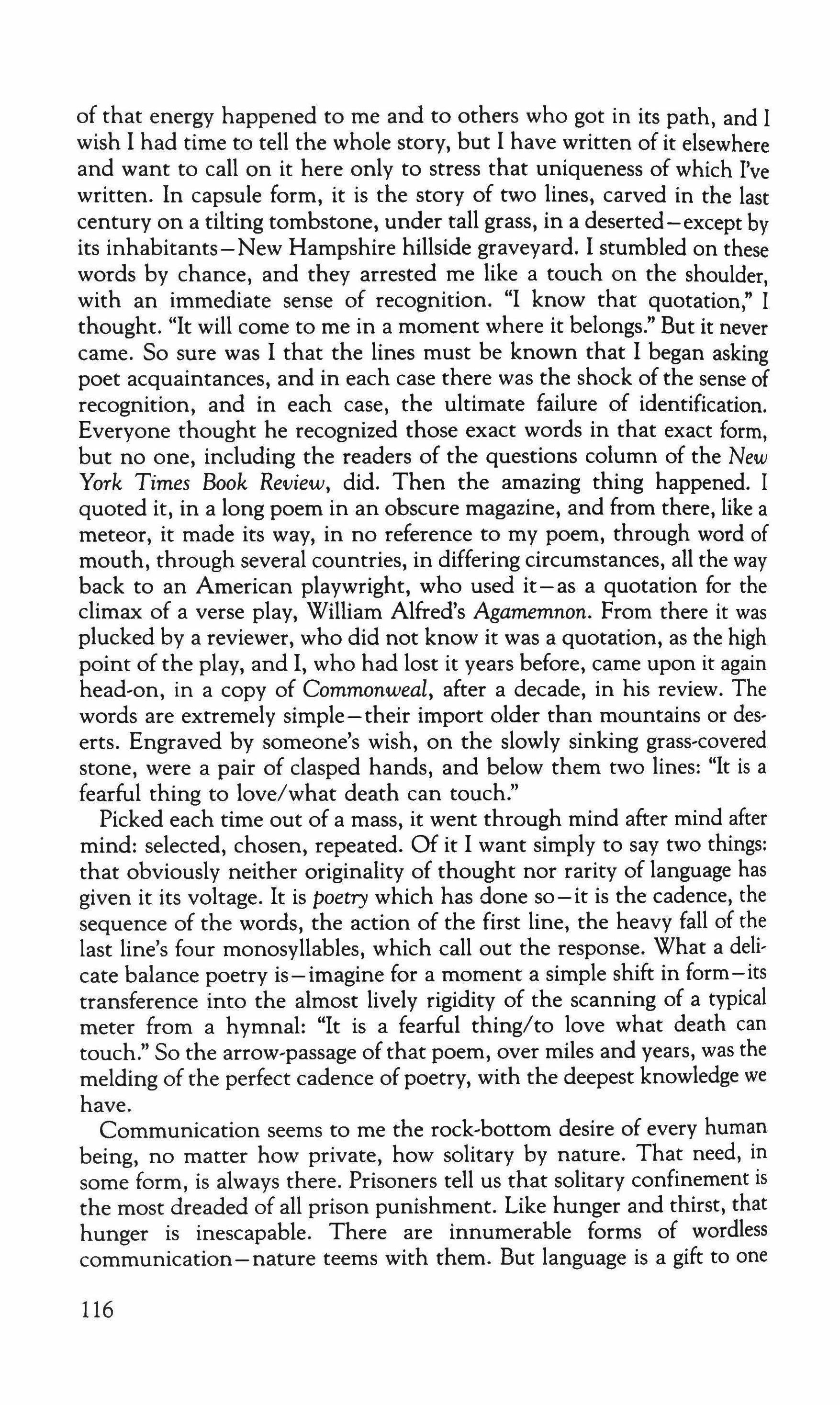
of that energy happened to me and to others who got in its path, and I wish I had time to tell the whole story, but I have written of it elsewhere and want to call on it here only to stress that uniqueness of which I've written. In capsule form, it is the story of two lines, carved in the last century on a tilting tombstone, under tall grass, in a deserted-except by its inhabitants-New Hampshire hillside graveyard. I stumbled on these words by chance, and they arrested me like a touch on the shoulder, with an immediate sense of recognition. "I know that quotation," I thought. "It will come to me in a moment where it belongs." But it never came. So sure was I that the lines must be known that I began asking poet acquaintances, and in each case there was the shock of the sense of recognition, and in each case, the ultimate failure of identification. Everyone thought he recognized those exact words in that exact form, but no one, including the readers of the questions column of the New York Times Book Review, did. Then the amazing thing happened. I quoted it, in a long poem in an obscure magazine, and from there, like a meteor, it made its way, in no reference to my poem, through word of mouth, through several countries, in differing circumstances, all the way back to an American playwright, who used it - as a quotation for the climax of a verse play, William Alfred's Agamemnon. From there it was plucked by a reviewer, who did not know it was a quotation, as the high point of the play, and I, who had lost it years before, came upon it again head-on, in a copy of Commonweal, after a decade, in his review. The words are extremely simple-their import older than mountains or des' erts. Engraved by someone's wish, on the slowly sinking grass-covered stone, were a pair of clasped hands, and below them two lines: "It is a fearful thing to love/what death can touch."
Picked each time out of a mass, it went through mind after mind after mind: selected, chosen, repeated. Of it I want simply to say two things: that obviously neither originality of thought nor rarity of language has given it its voltage. It is poetry which has done so-it is the cadence, the sequence of the words, the action of the first line, the heavy fall of the last line's four monosyllables, which call out the response. What a deli, cate balance poetry is-imagine for a moment a simple shift in form-its transference into the almost lively rigidity of the scanning of a typical meter from a hymnal: "It is a fearful thing/to love what death can touch." So the arrow-passage of that poem, over miles and years, was the melding of the perfect cadence of poetry, with the deepest knowledge we have.
Communication seems to me the rock-bottom desire of every human being, no matter how private, how solitary by nature. That need, in some form, is always there. Prisoners tell us that solitary confinement is the most dreaded of all prison punishment. Like hunger and thirst, that hunger is inescapable. There are innumerable forms of wordless communication - nature teems with them. But language is a gift to one
116
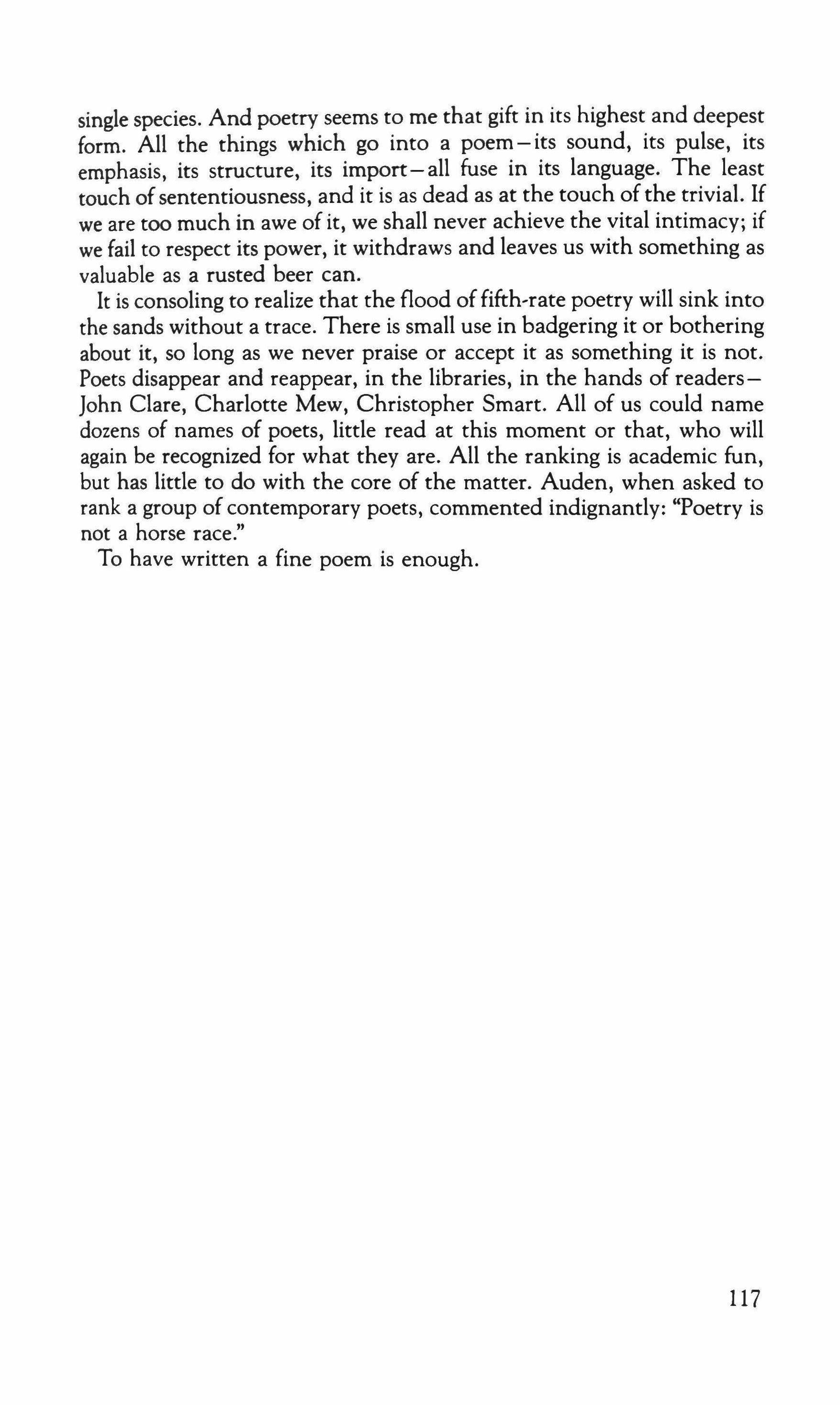
single species. And poetry seems to me that gift in its highest and deepest form. All the things which go into a poem - its sound, its pulse, its emphasis, its structure, its import - all fuse in its language. The least touch ofsententiousness, and it is as dead as at the touch ofthe trivial. If we are too much in awe of it, we shall never achieve the vital intimacy; if we fail to respect its power, it withdraws and leaves us with something as valuable as a rusted beer can.
It is consoling to realize that the flood offifth-rate poetry will sink into the sands without a trace. There is small use in badgering it or bothering about it, so long as we never praise or accept it as something it is not. Poets disappear and reappear, in the libraries, in the hands of readersJohn Clare, Charlotte Mew, Christopher Smart. All of us could name dozens of names of poets, little read at this moment or that, who will again be recognized for what they are. All the ranking is academic fun, but has little to do with the core of the matter. Auden, when asked to rank a group of contemporary poets, commented indignantly: "Poetry is not a horse race."
To have written a fine poem is enough.
117
Two Poem.s
]osephine Jacobsen
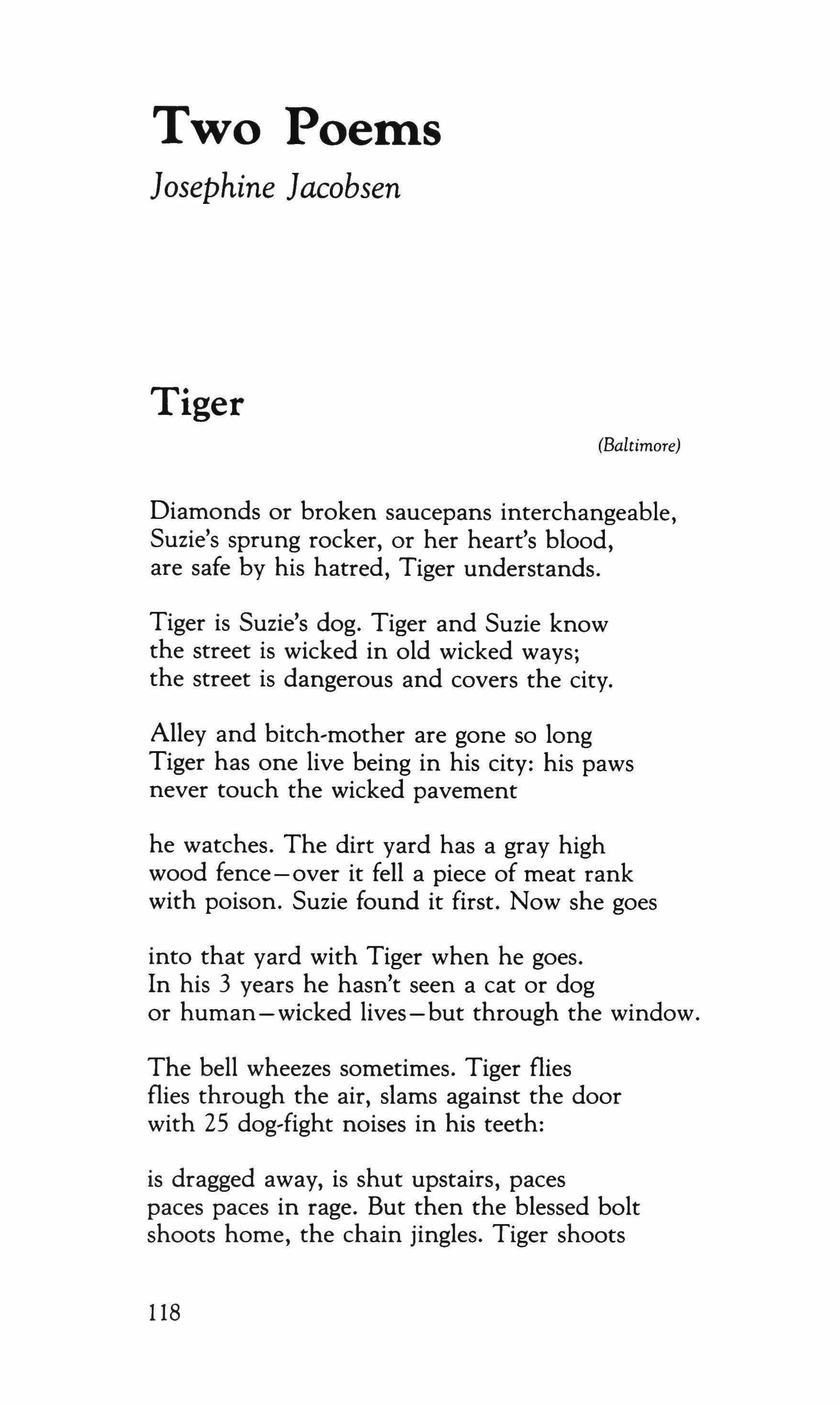
Tiger (Baltimore)
Diamonds or broken saucepans interchangeable, Suzie's sprung rocker, or her heart's blood, are safe by his hatred, Tiger understands.
Tiger is Suzie's dog. Tiger and Suzie know the street is wicked in old wicked ways; the street is dangerous and covers the city.
Alley and bitch-mother are gone so long Tiger has one live being in his city: his paws never touch the wicked pavement he watches. The dirt yard has a gray high wood fence-over it fell a piece of meat rank with poison. Suzie found it first. Now she goes into that yard with Tiger when he goes. In his 3 years he hasn't seen a cat or dog or human-wicked lives-but through the window.
The bell wheezes sometimes. Tiger flies flies through the air, slams against the door with 25 dog,fight noises in his teeth: is dragged away, is shut upstairs, paces paces paces in rage. But then the blessed bolt shoots home, the chain jingles. Tiger shoots
118

down the stairs to his window, his glass; his glass where he can watch the wicked at their ways, who all are bad, will never be better, cannot come
in; because Tiger the Judge, unmated, single in intent, will tear them to shreds to scatter at Suzie's cracked shoe. He has seen a dog
trotting like a doppelganger-enemy past and past; or a dog in a room in the window when at dark the bulb is lit. His joys are Suzie's step on the three steps
he has never gone down. There's a time his tongue drips: that's summer. Then there is the time
the gas-jets on the stove stay bright all night. Tonight
snow vibrates along the street and changes it: but not the wicked, waiting behind their walls to rob, to murder, or to visit. The snow is like a pulse
a hypnotizing pulse. And Tiger lets himself fall on his side by Suzie's salvaged ankle and lets the outside fill with snow and his eyes close.
119
Moon
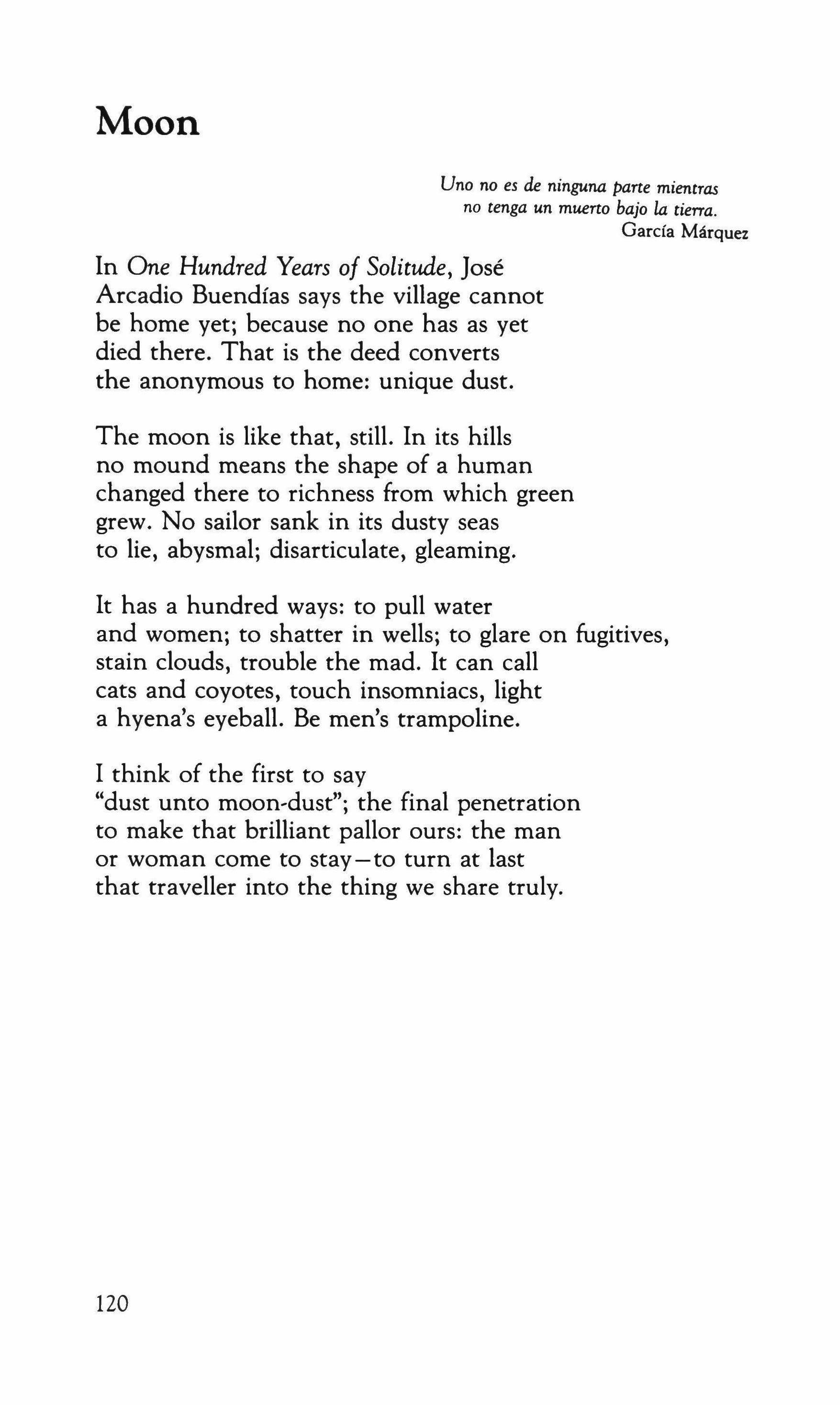
In One Hundred Years of Solitude, Jose Arcadio Buendias says the village cannot be home yet; because no one has as yet died there. That is the deed converts the anonymous to home: unique dust.
The moon is like that, still. In its hills no mound means the shape of a human changed there to richness from which green grew. No sailor sank in its dusty seas to lie, abysmal; disarticulate, gleaming.
It has a hundred ways: to pull water and women; to shatter in wells; to glare on fugitives, stain clouds, trouble the mad. It can call cats and coyotes, touch insomniacs, light a hyena's eyeball. Be men's trampoline.
I think of the first to say "dust unto moon-dust"; the final penetration to make that brilliant pallor ours: the man or woman come to stay-to turn at last that traveller into the thing we share truly.
Uno no es de ninguna parte mientras no tenga un muerto bajo la tierra. Garcia Marquez
120
Three Poell1s
Brendan Galvin
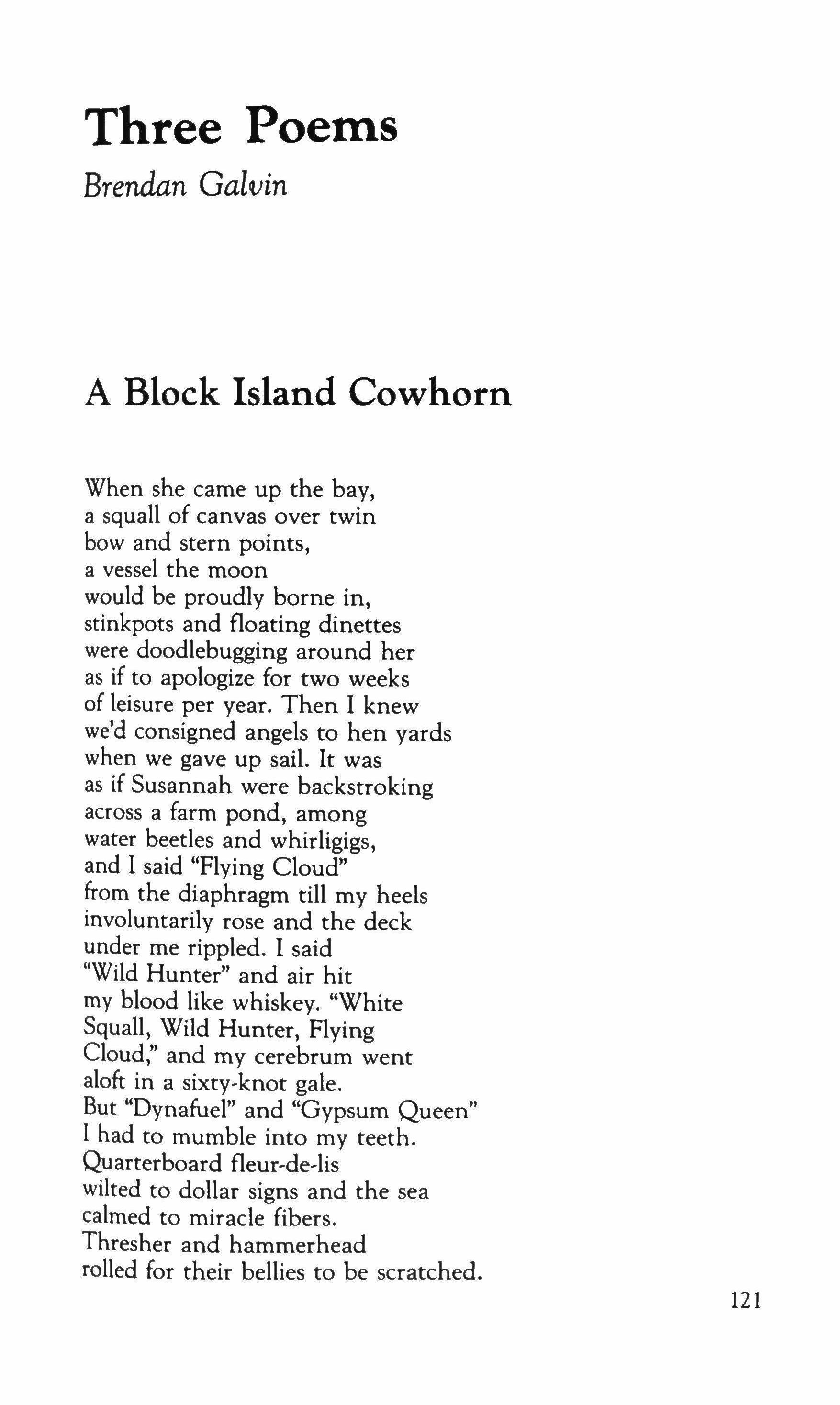
A Block Island Cowhorn
When she came up the bay, a squall of canvas over twin bow and stern points, a vessel the moon would be proudly borne in, stinkpots and floating dinettes were doodlebugging around her as if to apologize for two weeks of leisure per year. Then I knew we'd consigned angels to hen yards when we gave up sail. It was as if Susannah were backstroking across a farm pond, among water beetles and whirligigs, and I said "Flying Cloud" from the diaphragm till my heels involuntarily rose and the deck under me rippled. I said "Wild Hunter" and air hit my blood like whiskey. "White Squall, Wild Hunter, Flying Cloud," and my cerebrum went aloft in a sixtv-knot gale. But "Dynafuel" and "Gypsum Queen" I had to mumble into my teeth. Quarterboard fleur-de-lis wilted to dollar signs and the sea calmed to miracle fibers. Thresher and hammerhead rolled for their bellies to be scratched.
121
Wreckers
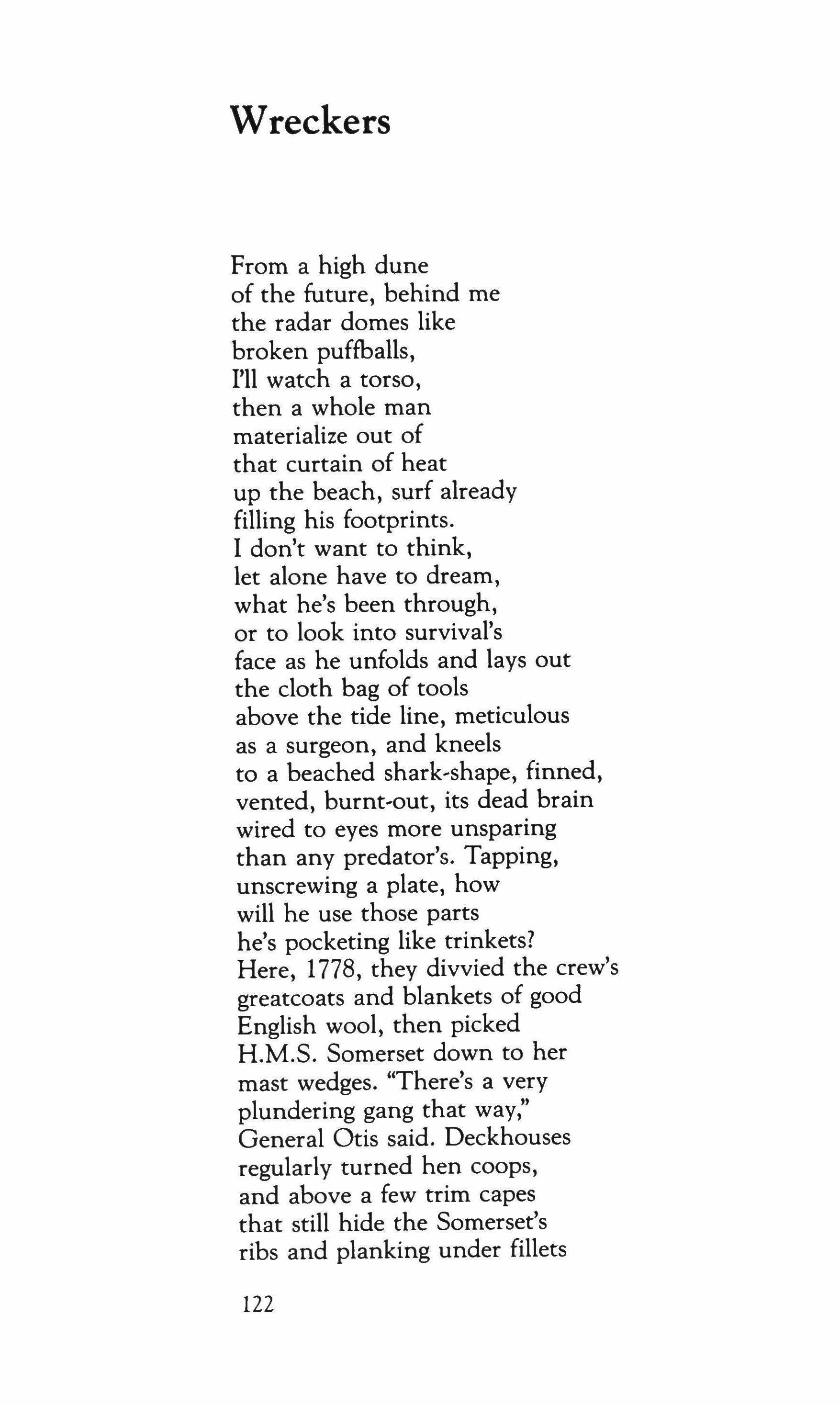
From a high dune of the future, behind me the radar domes like broken puffballs, I'll watch a torso, then a whole man materialize out of that curtain of heat up the beach, surf already filling his footprints. I don't want to think, let alone have to dream, what he's been through, or to look into survival's face as he unfolds and lays out the cloth bag of tools above the tide line, meticulous as a surgeon, and kneels to a beached shark-shape, finned, vented, burnt-out, its dead brain wired to eyes more unsparing than any predator's. Tapping, unscrewing a plate, how will he use those parts he's pocketing like trinkets? Here, 1778, they divvied the crew's greatcoats and blankets of good English wool, then picked H.M.S. Somerset down to her mast wedges. "There's a very plundering gang that way," General Otis said. Deckhouses regularly turned hen coops, and above a few trim capes that still hide the Somerset's ribs and planking under fillets
122
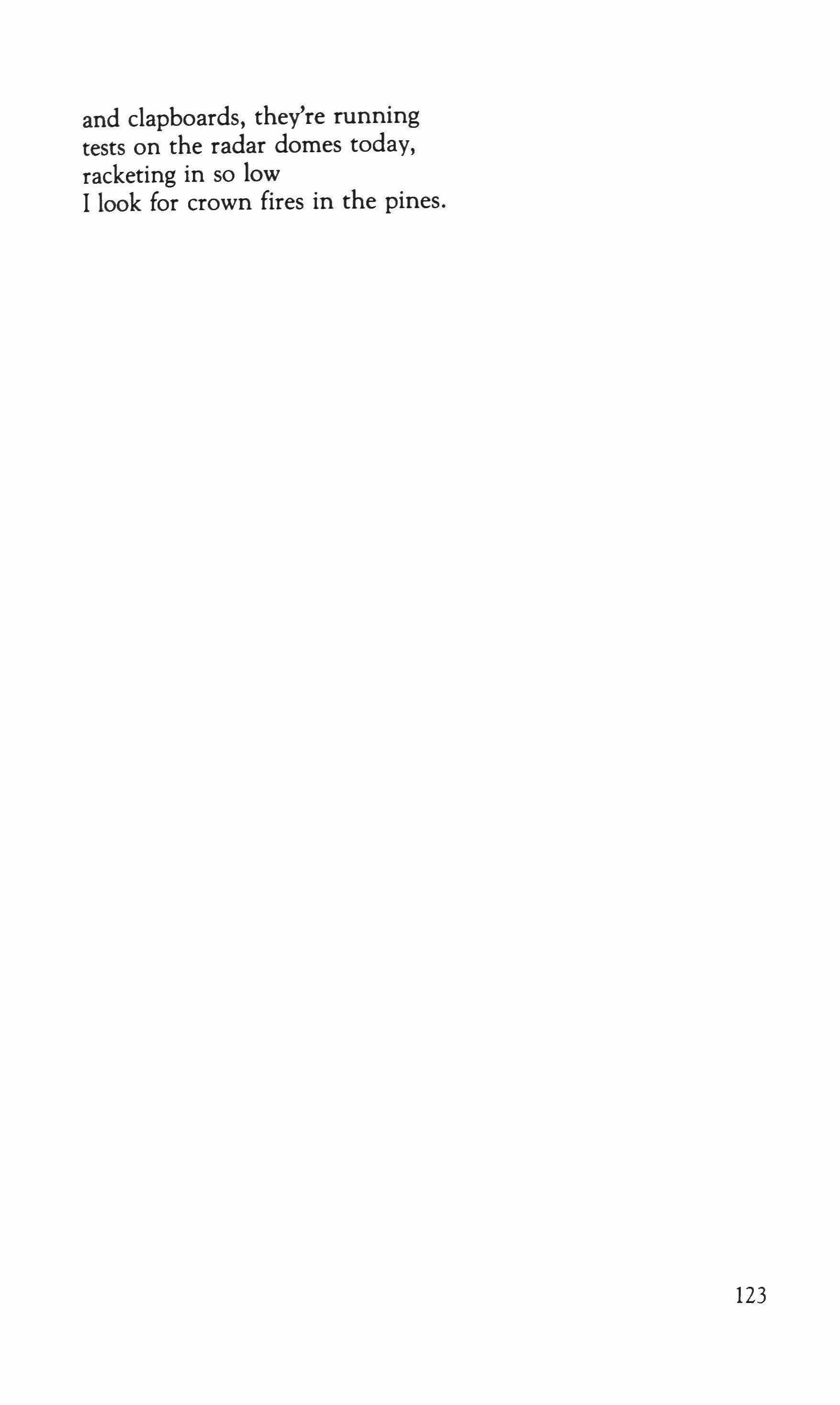
and clapboards, they're running tests on the radar domes today, racketing in so low I look for crown fires in the pines.
123
Light from Fundy
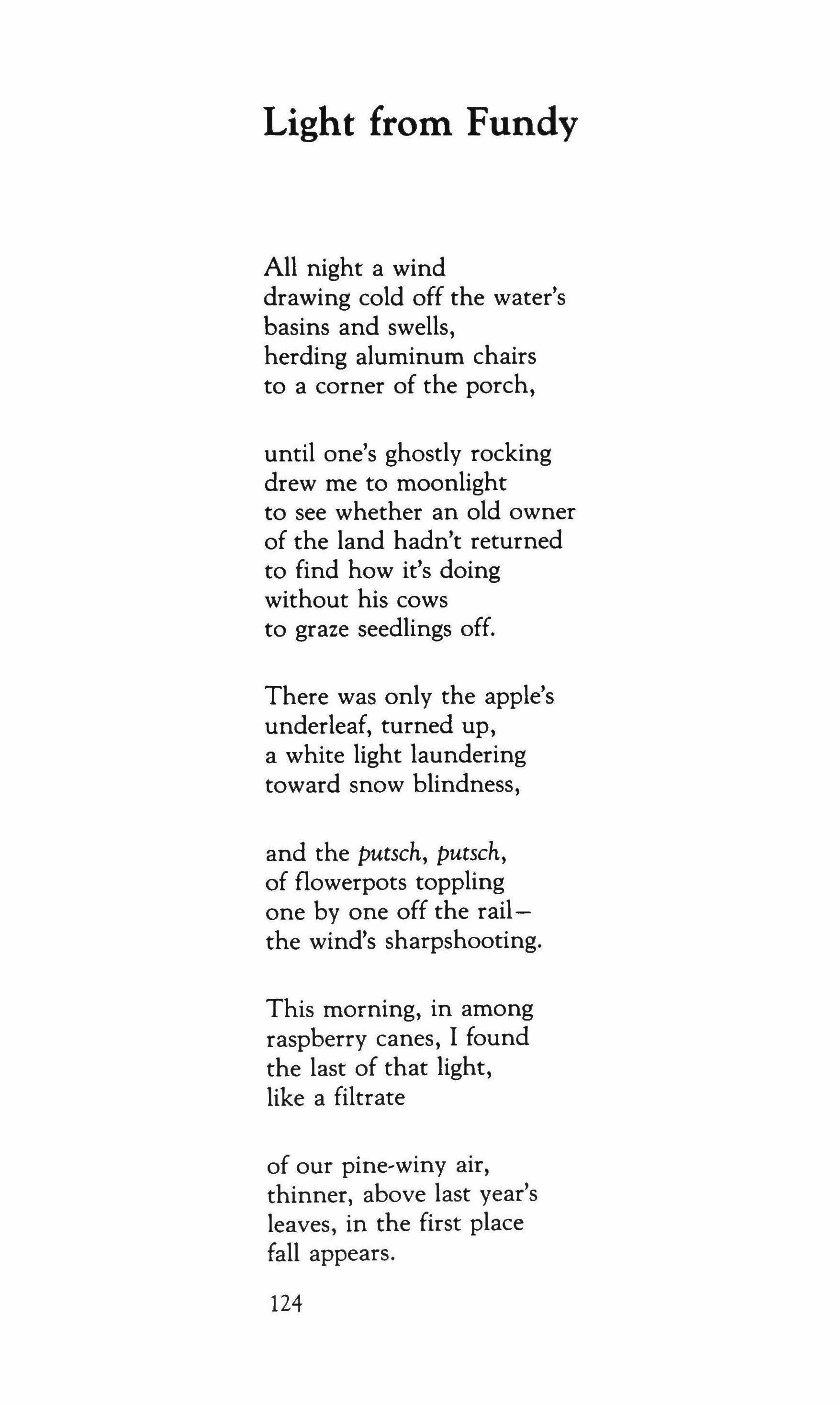
All night a wind drawing cold off the water's basins and swells, herding aluminum chairs to a corner of the porch,
until one's ghostly rocking drew me to moonlight to see whether an old owner of the land hadn't returned to find how it's doing without his cows to graze seedlings off.
There was only the apple's underleaf, turned up, a white light laundering toward snow blindness, and the putsch, putsch, of flowerpots toppling one by one off the railthe wind's sharpshooting.
This morning, in among raspberry canes, I found the last of that light, like a filtrate
of our pine-winy air, thinner, above last year's leaves, in the first place fall appears.
124
Two Stories
Stephen Dixon

The Painter
So the great painter dies. Within minutes of his death the colors disappear from his paintings, the canvases crack and come apart, the frames fall to the floor. Millions of dollars worth of paintings, perhaps a billion dollars worth, are gone. Museum curators summon the police. Private collectors of his work-
No, the painter dies. The great one. Nobody would dispute that. Nothing happens to his paintings after his death. What does change is their value. One painting up for sale that day with an asking price of close to a million dollars, suddenly has an asking price of two million. A private art collector, interviewed on TV that night, says "When I bought this red one ten years ago for a hundred thousand, friends in the know said I paid twice what it was worth. Just a month ago an art dealer offered me five times that amount. Now with his death-not that I don't grieve for him like the rest of us and think, if he was alive and healthy, what he could still do-l could probably get-"
No, the painter dies. The great one. Almost every artist and art expert agrees with that. The paintings he had in his studio will be exhibited this year in a major European museum and then travel to five of the top modern museums in the world before being put on the market. The heirs, to save on paying an estimated hundred million dollars in taxes, have made arrangements with the government where half the paintings-
No, the painter dies. We all know who. The great one. The greatest or second greatest painter in the last fifty years. Certainly one of the five great painters of the century. At least one of the ten great ones in the last hundred years. Definitely one of the ten great ones of this century, and one of the most influential painters of all time. What modern art movement in the last sixty years hasn't been influenced by him? Maybe
125

some haven't. There have been so many. But five, maybe ten, of the major art movements in the last sixty to seventy years have been directly or indirectly influenced by his work. He died in his sleep last night at the age of ninety-one. Ninety-one years old and still painting. The painting he was working on for the last two months was to be one of his largest. Art dealers say the asking price for it, though it's little more than half finished, will be around three million dollars, which will be one of the highest sums paid for a modern painting if it's sold at that price.
No, he's dead. The painter of the century. Or one of them. The day he died - he knew he had little time left, his wife said - he asked her to destroy the painting he was working on. He also asked her to write down his last words. They were "I didn't paint any of the paintings that bear my signature, nor any painting that is said to be mine but doesn't have my signature." All his paintings bear his signature. He then gestured that he wanted to sign his name to the words she wrote down. His son held his writing hand as he wrote his name. Then he said he'd like a glass of his best champagne and some cherries. His wife went for them. By the time she got back he was dead.
No, he died. In his sleep. A peaceful death. Painting he was painting on before he got sleepy and had to be put into bed was of a man sleeping in bed. A dead man, it looked like. Didn't look like an ordinary sleeping man. That's what just about everyone said when the painting was later viewed at an auction house before it was sold for more than three million dollars.
No, he's dead. His paintings aren't. They live on on whatever walls they're on. The colors haven't faded. Nor the themes. They're still alive.
No, they've all faded, colors and themes. The painter for the last week was fading, now he's dead. Died in his sleep. He was drinking champagne at the time. No, can't be.
Dead. The painter. Had a glass of champagne in his hand. He was awake when the glass dropped out of his hand. Or was awake just a moment before the glass dropped out of his hand. His wife, who had her back to him at the time, turned when she heard the glass smash on the floor. Her husband slumped across the bed, hand dangling just above the floor. She called for her son. "Jose!" He ran into the room. He'd been in bed with the housekeeper in her room a floor above. Two floors above.
No glass broke. He did die while he was in bed. He was put there for a nap, but could have been awake when the accident happened. A painting hanging above the bed, one he did four years ago ofhis wife and him copulating and which he said he'd never sell for five million dollars, ten million, "all the money from all the countries in the world," fell off its hooks on the wall and hit him on the head. "It probably killed him instantly;' the doctor said. The frame alone weighed two hundred pounds. The painting doesn't weigh more than a pound or two. "He
126
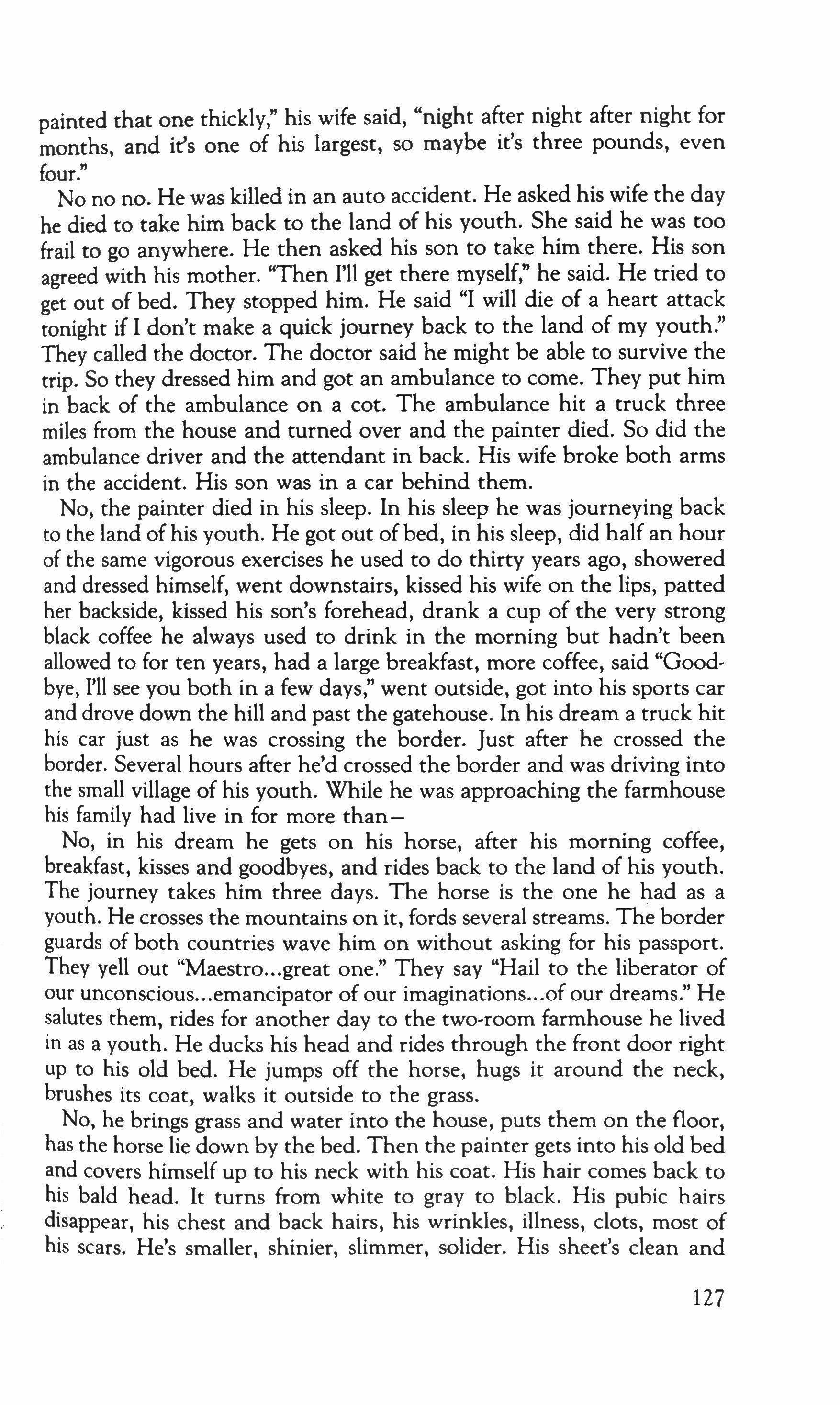
painted that one thickly," his wife said, "night after night after night for months, and it's one of his largest, so maybe it's three pounds, even four."
No no no. He was killed in an auto accident. He asked his wife the day he died to take him back to the land of his youth. She said he was too frail to go anywhere. He then asked his son to take him there. His son agreed with his mother. "Then I'll get there myself:' he said. He tried to get out of bed. They stopped him. He said "I will die of a heart attack tonight if I don't make a quick journey back to the land of my youth." They called the doctor. The doctor said he might be able to survive the trip. So they dressed him and got an ambulance to corne. They put him in back of the ambulance on a cot. The ambulance hit a truck three miles from the house and turned over and the painter died. So did the ambulance driver and the attendant in back. His wife broke both arms in the accident. His son was in a car behind them.
No, the painter died in his sleep. In his sleep he was journeying back to the land of his youth. He got out ofbed, in his sleep, did half an hour of the same vigorous exercises he used to do thirty years ago, showered and dressed himself, went downstairs, kissed his wife on the lips, patted her backside, kissed his son's forehead, drank a cup of the very strong black coffee he always used to drink in the morning but hadn't been allowed to for ten years, had a large breakfast, more coffee, said "Good, bye, I'll see you both in a few days," went outside, got into his sports car and drove down the hill and past the gatehouse. In his dream a truck hit his car just as he was crossing the border. Just after he crossed the border. Several hours after he'd crossed the border and was driving into the small village of his youth. While he was approaching the farmhouse his family had live in for more than-
No, in his dream he gets on his horse, after his morning coffee, breakfast, kisses and goodbyes, and rides back to the land of his youth. The journey takes him three days. The horse is the one he had as a youth. He crosses the mountains on it, fords several streams. The border guards of both countries wave him on without asking for his passport. They yell out "Maestro great one." They say "Hail to the liberator of our unconscious emancipator of our imaginations of our dreams." He salutes them, rides for another day to the two-room farmhouse he lived in as a youth. He ducks his head and rides through the front door right up to his old bed. He jumps off the horse, hugs it around the neck, brushes its coat, walks it outside to the grass.
No, he brings grass and water into the house, puts them on the floor, has the horse lie down by the bed. Then the painter gets into his old bed and covers himself up to his neck with his coat. His hair comes back to his bald head. It turns from white to gray to black. His pubic hairs disappear, his chest and back hairs, his wrinkles, illness, clots, most of his scars. He's smaller, shinier, slimmer, solider. His sheet's clean and
127

cool, the bed newer and he has a blanket over him. The horse snores. The young man becomes a boy thinking about becoming a great painter. "I won't be great, I'll just be as good as I can. I'll do things no one else has. No, I'll just paint without thinking what anyone else has done. No, I'll just paint, that's all, and not even think about not thinking of what anyone else has done with paint."
No, the old painter's in bed. In the two-room farmhouse of his youth. His eyes close, he falls asleep. Colors, shapes, patterns, move around in his head. Scenes from his past, from his future. His wife twenty years ago, forty years ago, as his bride. His son as a young man, as a boy, then being born. The painter making love with his wife, with the woman he lived for years with before his wife, with women before that: models, other men's wives, an actress, a princess of a principality, other painters, a young woman he met at a cafe and went to a hotel with, a young woman he met on a train and slept the night in their compartment with, prostitutes in his adopted country, a girl in his native country when he was a schoolboy. In the bed he's in now. His first time, hers. Scenes of his parents working in the fields, his horse drinking from a stream, nudging its dead foal. Sunrise, sunset, nighttime, full moon on top ofthe chimney of this old farmhouse. "Wake up," his mother says. "Get to work," his father says. "Do you love me?" asks the young woman on the train as it's pulling into his station. ''Do you love me?" his wife says. "Daddy," his son says. "Papa, dada, fada, ba." Pens, brushes, palettes, tubes of paints. Newspapers calling him a mountebank, defiler, the greatest painter of them all. He tears the newspapers up, pastes them on his canvases, paints over them.
No, the painter's born. We all know who. His mother's legs are open. The doctor says push. Out he comes, brush between his gums, tubes of paint inside his fists. The doctor slaps his behind, cuts the cord. His father gets down on his knees and says, "At last, a son," and prays. The painter, no more than eight pounds, starts painting on the soiled sheet. The doctor cleans and dries him, puts a canvas on the floor, the painter crawls on top of it, paints a big circle and then a small circle inside. The outside of the big circle's white, the inside of the small circle's black, the space between the two circles is red. The doctor puts the painter to his mother's breast, blows on the canvas till it's dry, rolls it up, rushes to a gallery with it and sells it for half a million dollars. It's now worth ten times that. The painter sucks at his mother's breast, nothing comes. He cries, his tears act as a warm compress on her breast, milk comes, he drinks and soon falls asleep. His father goes outside and plants a tree in his son's name. The tree's now ninety-one years old. Once a year till around five years ago the painter returned to the farmhouse to paint that tree. He's kept all of those seventy or so paintings. As a series, art dealers say, the tree paintings could be sold for quarter of a billion dollars. If sold individually the total sale should be around half a billion.
128

The tree has a fence around it, a plaque embedded in the boulder inside the fence which says, "This tree was planted on the day of birth of the greatest painter our country has produced in five hundred years. Any defacement of the tree, enclosed area and fence will bring swift prosecution to the full extent of the law." The painter gets out of bed, goes outside, kicks down the fence, pulls an axe out of a tree stump and chops down the tree, has his horse defecate on the boulder and eat the grass in the enclosed area. When the horse is full it lies down and goes to sleep. The painter lies down, rests his head on the horse's neck and falls asleep. In his sleep he's a newborn child. He floats backwards into the house and up his mother's birth canal. It's dark, it's light, he fingers around for his paintbrush and tubes, the dream explodes.
No, he's an old man riding a paintbrush in the sky. The sky's a clear blue. He seems to be flying around aimlessly. Far below is green farmland, terraced hills, olive orchards, a farmhouse. A boy's sleeping beside a horse. The painter's father is digging a hole. His mother's nursing a baby. His wife's making coffee. His son's playing with the wood toys he carved for him. His infant daughter holds out his eyeglasses to him. She seems to be the only one below who sees him. She drops the glasses and holds up her arms to him. She wants to be picked up. The brush drops out from under him and he floats to earth. The horse stands, shakes itself off, flicks it tail. The painter lands beside it, holds out his arms, someone lifts him and puts him on the horse. He rides to the top of the hill, looks at the brush flying around. His hand reaches up till it's able to snatch the brush out of the sky. He looks around for his paint tubes and a canvas, doesn't see any, and sitting on the horse, starts to paint the sky. Whatever color he wants comes out of the brush. One time he paints the sky five different shades of red, another time it's a combination of fifty different colors. Then he paints it the original blue and flings the brush down the hill.
No, the painter dies. The great one. In the middle of the night. Everyone in the house was asleep. The nurse who was sitting beside him had just fallen asleep. She said she heard a sound in her sleep. We all know what sound. It woke her. Most of the world's newspapers the next day carried the news of his death on the front page.
129
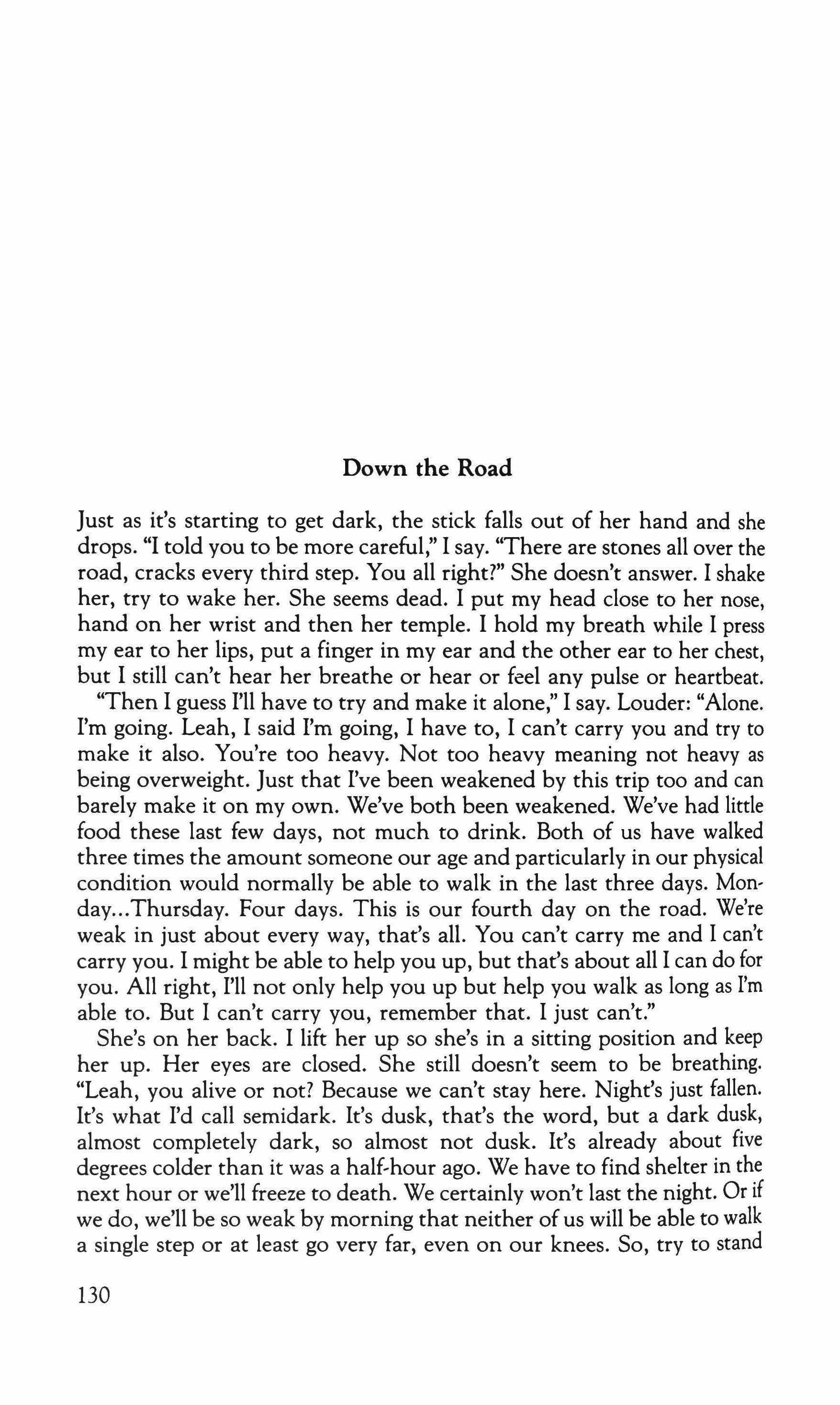
Down the Road
Just as it's starting to get dark, the stick falls out of her hand and she drops. "I told you to be more careful," I say. "There are stones all over the road, cracks every third step. You all right?" She doesn't answer. I shake her, try to wake her. She seems dead. I put my head close to her nose, hand on her wrist and then her temple. I hold my breath while I press my ear to her lips, put a finger in my ear and the other ear to her chest, but I still can't hear her breathe or hear or feel any pulse or heartbeat.
"Then I guess I'll have to try and make it alone," I say. Louder: "Alone. I'm going. Leah, I said I'm going, I have to, I can't carry you and try to make it also. You're too heavy. Not too heavy meaning not heavy as being overweight. Just that I've been weakened by this trip too and can barely make it on my own. We've both been weakened. We've had little food these last few days, not much to drink. Both of us have walked three times the amount someone our age and particularly in our physical condition would normally be able to walk in the last three days. Monday Thursday. Four days. This is our fourth day on the road. We're weak in just about every way, that's all. You can't carry me and I can't carry you. I might be able to help you up, but that's about all I can do for you. All right, I'll not only help you up but help you walk as long as I'm able to. But I can't carry you, remember that. I just can't."
She's on her back. I lift her up so she's in a sitting position and keep her up. Her eyes are closed. She still doesn't seem to be breathing. "Leah, you alive or not? Because we can't stay here. Night's just fallen. It's what I'd call semidark. It's dusk, that's the word, but a dark dusk, almost completely dark, so almost not dusk. It's already about five degrees colder than it was a half,hour ago. We have to find shelter in the next hour or we'll freeze to death. We certainly won't last the night. Or if we do, we'll be so weak by morning that neither of us will be able to walk a single step or at least go very far, even on our knees. So, try to stand
130
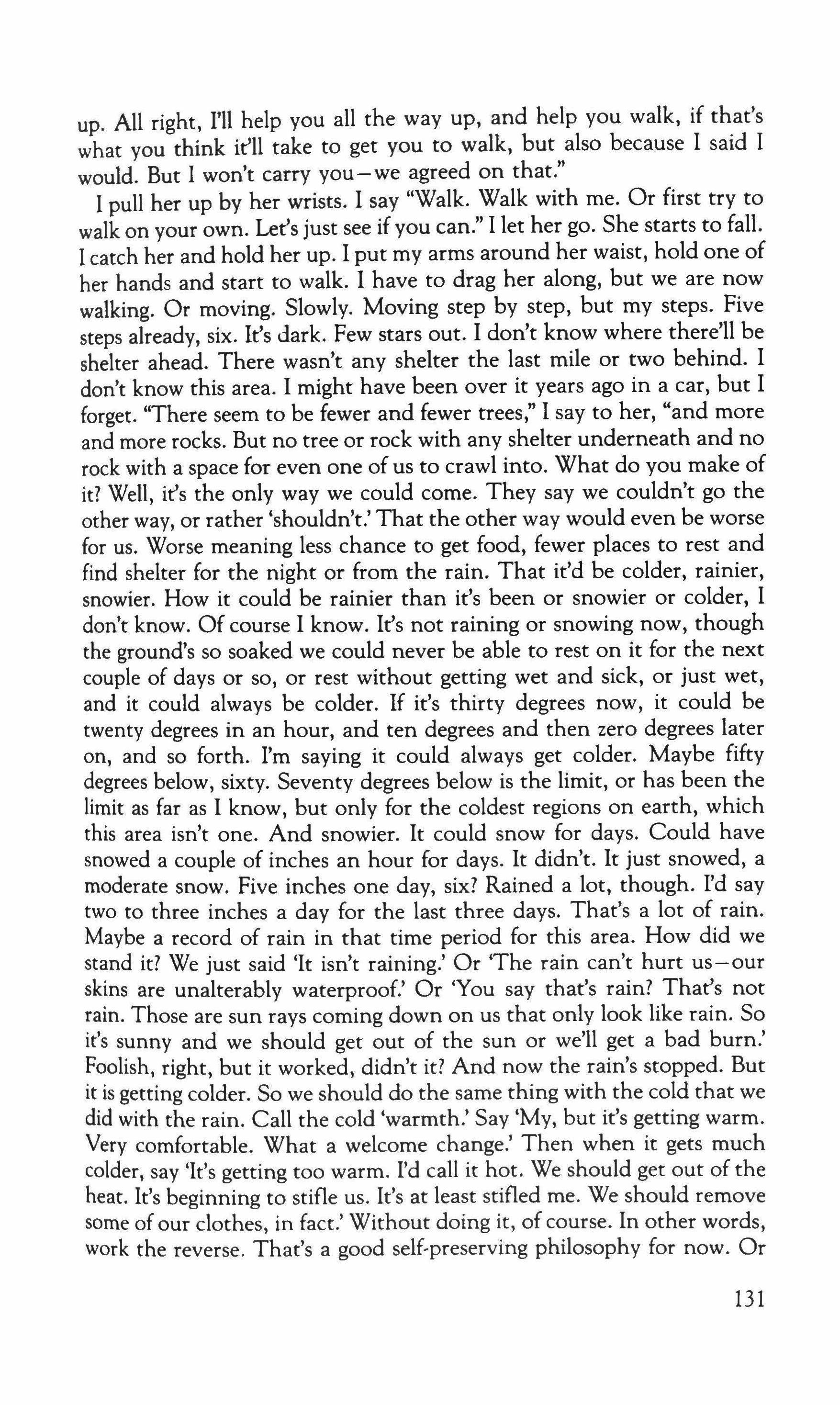
up. All right, I'll help you all the way up, and help you walk, if that's what you think it'll take to get you to walk, but also because I said I would. But I won't carry you - we agreed on that."
I pull her up by her wrists. I say "Walk. Walk with me. Or first try to walk on your own. Let's just see if you can." I let her go. She starts to fall. I catch her and hold her up. I put my arms around her waist, hold one of her hands and start to walk. I have to drag her along, but we are now walking. Or moving. Slowly. Moving step by step, but my steps. Five steps already, six. It's dark. Few stars out. I don't know where there'll be shelter ahead. There wasn't any shelter the last mile or two behind. I don't know this area. I might have been over it years ago in a car, but I forget. "There seem to be fewer and fewer trees," I say to her, "and more and more rocks. But no tree or rock with any shelter underneath and no rock with a space for even one of us to crawl into. What do you make of it? Well, it's the only way we could come. They say we couldn't go the other way, or rather 'shouldn't.' That the other way would even be worse for us. Worse meaning less chance to get food, fewer places to rest and find shelter for the night or from the rain. That it'd be colder, rainier, snowier. How it could be rainier than it's been or snowier or colder, I don't know. Of course I know. It's not raining or snowing now, though the ground's so soaked we could never be able to rest on it for the next couple of days or so, or rest without getting wet and sick, or just wet, and it could always be colder. If it's thirty degrees now, it could be twenty degrees in an hour, and ten degrees and then zero degrees later on, and so forth. I'm saying it could always get colder. Maybe fifty degrees below, sixty. Seventy degrees below is the limit, or has been the limit as far as I know, but only for the coldest regions on earth, which this area isn't one. And snowier. It could snow for days. Could have snowed a couple of inches an hour for days. It didn't. It just snowed, a moderate snow. Five inches one day, six? Rained a lot, though. I'd say two to three inches a day for the last three days. That's a lot of rain. Maybe a record of rain in that time period for this area. How did we stand it? We just said 'It isn't raining.' Or 'The rain can't hurt us-our skins are unalterably waterproof.' Or 'You say that's rain? That's not rain. Those are sun rays coming down on us that only look like rain. So it's sunny and we should get out of the sun or we'll get a bad burn.' Foolish, right, but it worked, didn't it? And now the rain's stopped. But it is getting colder. So we should do the same thing with the cold that we did with the rain. Call the cold 'warmth.' Say 'My, but it's getting warm. Very comfortable. What a welcome change.' Then when it gets much colder, say 'It's getting too warm. I'd call it hot. We should get out of the heat. It's beginning to stifle us. It's at least stifled me. We should remove some of our clothes, in fact.' Without doing it, of course. In other words, work the reverse. That's a good self-preserving philosophy for now. Or
131
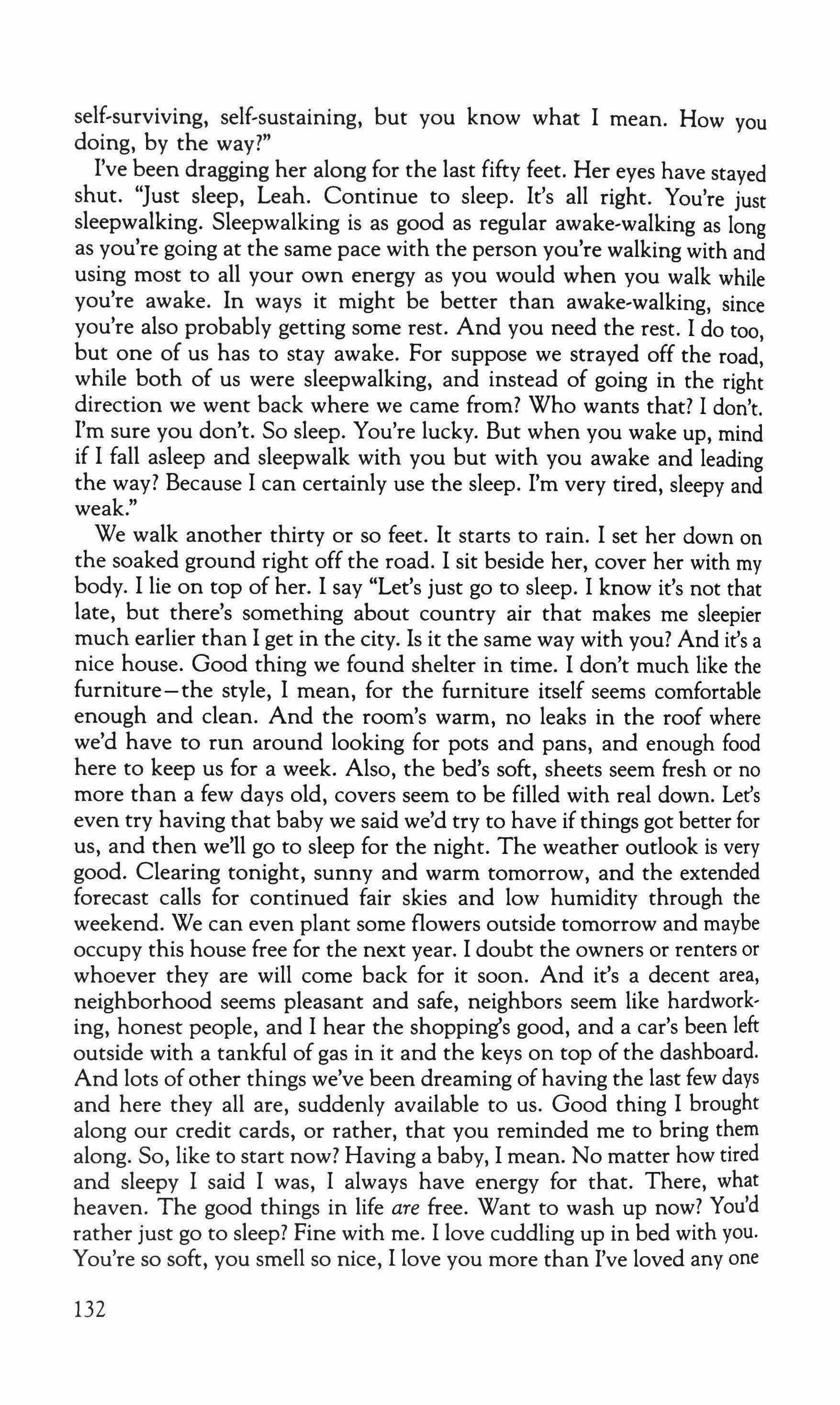
self-surviving, self-sustaining, but you know what I mean. How you doing, by the way?"
I've been dragging her along for the last fifty feet. Her eyes have stayed shut. "Just sleep, Leah. Continue to sleep. It's all right. You're just sleepwalking. Sleepwalking is as good as regular awake-walking as long as you're going at the same pace with the person you're walking with and using most to all your own energy as you would when you walk while you're awake. In ways it might be better than awake-walking, since you're also probably getting some rest. And you need the rest. I do too, but one of us has to stay awake. For suppose we strayed off the road, while both of us were sleepwalking, and instead of going in the right direction we went back where we came from? Who wants that? I don't. I'm sure you don't. So sleep. You're lucky. But when you wake up, mind if I fall asleep and sleepwalk with you but with you awake and leading the way? Because I can certainly use the sleep. I'm very tired, sleepy and weak."
We walk another thirty or so feet. It starts to rain. I set her down on the soaked ground right off the road. I sit beside her, cover her with my body. I lie on top of her. I say "Let's just go to sleep. I know it's not that late, but there's something about country air that makes me sleepier much earlier than I get in the city. Is it the same way with you? And it's a nice house. Good thing we found shelter in time. I don't much like the furniture-the style, I mean, for the furniture itself seems comfortable enough and clean. And the room's warm, no leaks in the roof where we'd have to run around looking for pots and pans, and enough food here to keep us for a week. Also, the bed's soft, sheets seem fresh or no more than a few days old, covers seem to be filled with real down. Let's even try having that baby we said we'd try to have if things got better for us, and then we'll go to sleep for the night. The weather outlook is very good. Clearing tonight, sunny and warm tomorrow, and the extended forecast calls for continued fair skies and low humidity through the weekend. We can even plant some flowers outside tomorrow and maybe occupy this house free for the next year. I doubt the owners or renters or whoever they are will come back for it soon. And it's a decent area, neighborhood seems pleasant and safe, neighbors seem like hardworking, honest people, and I hear the shopping's good, and a car's been left outside with a tankful of gas in it and the keys on top of the dashboard. And lots of other things we've been dreaming of having the last few days and here they all are, suddenly available to us. Good thing I brought along our credit cards, or rather, that you reminded me to bring them along. So, like to start now? Having a baby, I mean. No matter how tired and sleepy I said I was, I always have energy for that. There, what heaven. The good things in life are free. Want to wash up now? You'd rather just go to sleep? Fine with me. I love cuddling up in bed with you. You're so soft, you smell so nice, I love you more than I've loved anyone
132

thing. Anyone person, I mean. Oh, maybe as much as I loved my parents when I was a boy. Whatever, I love you more than I've loved any one person since I was a teen. So, goodnight, all right? One last kiss? Now have sweet dreams."
I get up, walk another hundred feet in the direction we were going, look back, see her lying by the road, run back, lie beside her, put my arms around her, say "Dearest, you don't know how good it is to be back. Been away I can't say how long but that's the last time I'll ever do that. I've seen lots of things, met lots of people, but found I can't live without you, can't leave without you, can't live or leave or even love without you, or at least for very long no matter how many interesting places I go to and people I meet. And since you don't want to leave here, nothing I can do but stay here with you and call this home. It's not a bad place, as I said. Better than most places, in fact, when you consider all it offers in just natural surroundings and comforts and that by my staying here the kids will have both parents to dote on them till they're grown up. So I'm staying unless you say it's a better idea that I leave. You don't want to answer that right now, that's certainly your right. You want to hold off your decision about my decision to stay here, do so for as long as you like. But believe me, staying here with you and our kids in this home is really the only thing I want to do. O.K., no more yap. Just give me a little hug, because I need one," and I squeeze her into me, press my cheek to hers, put the side of my lips on the side of hers and shut my eyes. "Sleep. Boy, do I need to, too. But I said enough already for one night. Sleep tight."
133
VVinter Love Story
Martha Bennett Stiles

in memory of Jean Stafford
Grace had taped the vet's number beside the house and barn telephones as soon as she and her husband, Paul, arrived in Kentucky. Later she added the number of their nearest horse-breeding neighbor. Paul knew both numbers by heart.
Summer signed into autumn without emergencies, but Grace continued to live in a state of perpetual anxiety, and the unexpected strength and endurance of her first winter north of Georgia combined with the advent of foaling season to increase her tension.
Livelier Iris was due to foal on Valentine's Day, the first of all their mares, which was unfortunate. Paul hadn't foaled a mare in twenty years. Iris had cost no more than the others, but one month after her purchase her three-year-old had won an important race in New York, and the value of the foal she was carrying quintupled. Every morning Grace approached her stall with awe and dread.
Tendinitis whined for privilege in Grace's right arm: Grace had busted sod for their vegetables that summer as if she and Paul would starve if she did not garden. Now she curried left-handed. Her steadying right hand on the mare's taut side felt movement. Their son had frogkicked as if to propel himself into the world. Grace spoke quickly to Paul in the next stall: he could not hear proofs of life too often.
"If it's got any sense it'll stop," he said. They'd had to shovel the night's snow away to open the barn doors. If they'd needed to get to Iris in a hurry, he had pointed out severely, needlessly, they could not have.
The horses refused to be shank-led through anything deep enough to tickle their shins. Yesterday Paul had attached the blade to his father's tractor and pushed one path to the mares' gate, another to the yearlings', then after they were all under cover for the night, he had parked the rig in the aisle, ready to repeat if necessary in the morning. Now the tractor would not start; he was going to have to take the troublesome part to Capet four miles away over roads that probably hadn't been
134

plowed today. Worse, the horses were going to have to be led out of their stalls past that large object they never had seen precisely there before.
Grace dug a path to one pasture, Paul to the other. Two yards inside her gate Iris set her feet and, with Grace and Paul watching paralyzed, lowered herself laboriously to the snow. There she wallowed, grunting like a dying sow.
"She's too fat," Paul said, and Grace's gut, which had relaxed once she saw that Iris was only lowering herself for pleasure, clenched again. A mare could get so fat she would lose her foal trying to deliver. "Maybe I feed her too much."
Grace tramped wordlessly back to the barn. Too little and the foal would be weakly.
Grace did not lead either yearling since one had got away from her and run round and round the paddock, driven frantic by the flapping shank. She stood beside the tractor, hoping her calm would diminish its menace, as Paul coaxed and hectored the first colt into the barnyard.
The average colt, Paul had pointed out, sold for more than the aver, age filly. "Most colts earn more at the track than most fillies, and a stallion can beget more foals in a year than his sister can bear in a lifetime." Nevertheless, fillies were so much easier to handle that, given magic powers, Grace would have permitted no colts to be born on the place.
In the pasture the colt struggled to run before Paul, holding the gate shut with his back, could get the Chiffney bit unbuckled; Grace hurried to grab the gate. Cold wind whipped the hood off her head. "When you're around horses," Paul had stressed, "never take your eyes off them." Tied, the hood cut off some of her vision.
In the kitchen, Grace set her boots to trickle on a newspaper. Once this snow began to melt, several square yards of Kentucky Brie would surround each pasture gate, smearing her pant legs every time she pushed off a boot, turning the kitchen into a sty.
Grace had spent her entire childhood indoors or on sidewalks or on an asphalt tennis court.
Through the kitchen window Grace watched to be sure their brand, new snow tires got Paul at least as far as the bend in the road. The sky looked pregnant. She tried for the sixth time to dial-a-weather and heard, again, the busy signal. All she could find on AM was banjo, playing Cherokee evangelists and hard rock. The FM radio had been left in Georgia.
They had rented out their Georgia house furnished, for the duration of Paul's sabbatical leave, because storing would have required going over their son's things. Nor was Grace sorry now. A house already emptied was too easily given up. If Paul did not go back to Atlanta, he owed North George State University his entire sabbatical paymoney which, of course, they were spending on horsefeed as fast as it came.'
135
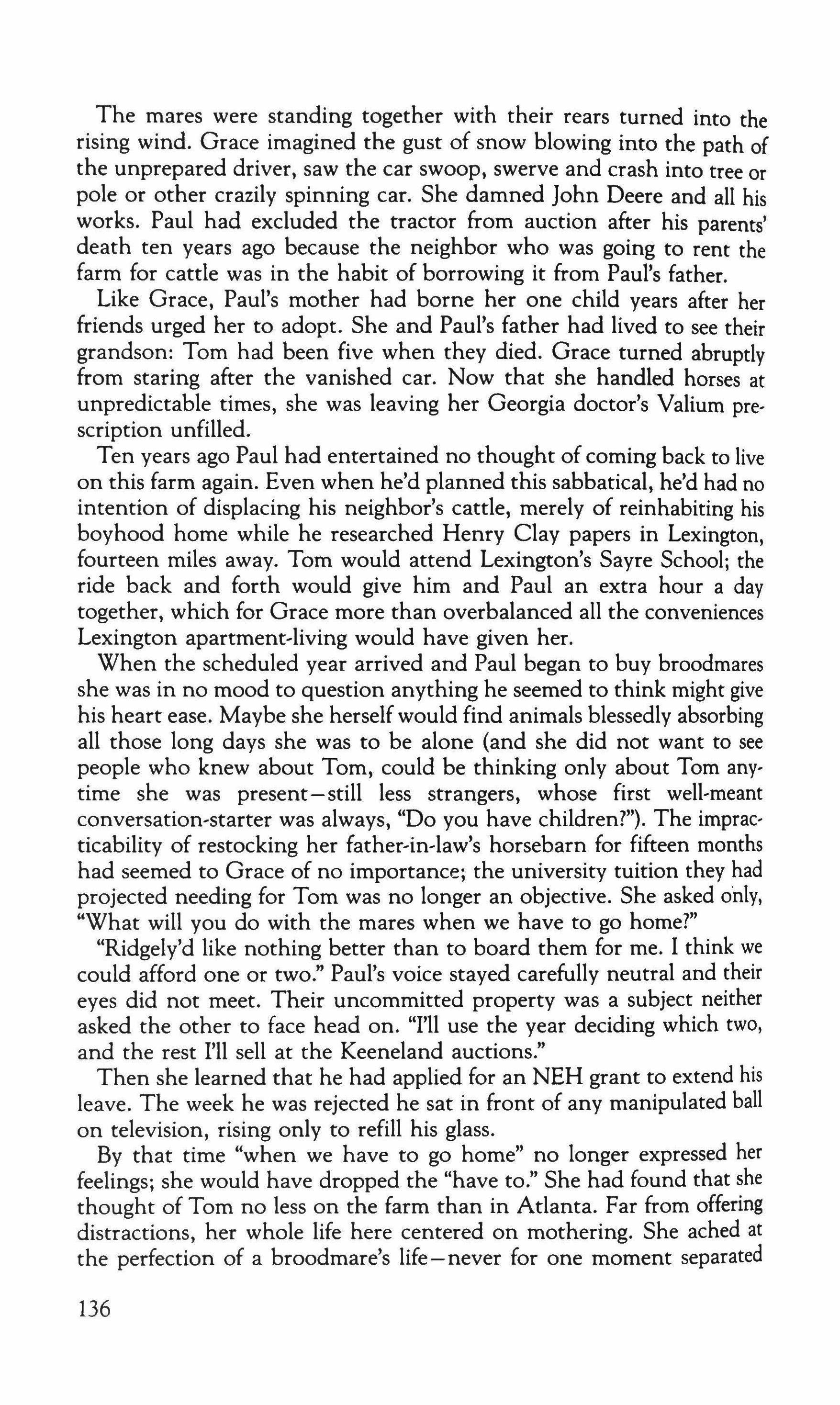
The mares were standing together with their rears turned into the rising wind. Grace imagined the gust of snow blowing into the path of the unprepared driver, saw the car swoop, swerve and crash into tree or pole or other crazily spinning car. She damned John Deere and all his works. Paul had excluded the tractor from auction after his parents' death ten years ago because the neighbor who was going to rent the farm for cattle was in the habit of borrowing it from Paul's father.
Like Grace, Paul's mother had borne her one child years after her friends urged her to adopt. She and Paul's father had lived to see their grandson: Tom had been five when they died. Grace turned abruptly from staring after the vanished car. Now that she handled horses at unpredictable times, she was leaving her Georgia doctor's Valium prescription unfilled.
Ten years ago Paul had entertained no thought of coming back to live on this farm again. Even when he'd planned this sabbatical, he'd had no intention of displacing his neighbor's cattle, merely of reinhabiting his boyhood home while he researched Henry Clay papers in Lexington, fourteen miles away. Tom would attend Lexington's Sayre School; the ride back and forth would give him and Paul an extra hour a day together, which for Grace more than overbalanced all the conveniences Lexington apartment-living would have given her.
When the scheduled year arrived and Paul began to buy broodmares she was in no mood to question anything he seemed to think might give his heart ease. Maybe she herselfwould find animals blessedly absorbing all those long days she was to be alone (and she did not want to see people who knew about Tom, could be thinking only about Tom anytime she was present-still less strangers, whose first well-meant conversation-starter was always, "Do you have children?"). The impracticability of restocking her father-in-law's horsebarn for fifteen months had seemed to Grace of no importance; the university tuition they had projected needing for Tom was no longer an objective. She asked only, "What will you do with the mares when we have to go home?"
"Ridgely'd like nothing better than to board them for me. I think we could afford one or two." Paul's voice stayed carefully neutral and their eyes did not meet. Their uncommitted property was a subject neither asked the other to face head on. "I'll use the year deciding which two, and the rest I'll sell at the Keeneland auctions."
Then she learned that he had applied for an NEH grant to extend his leave. The week he was rejected he sat in front of any manipulated ball on television, rising only to refill his glass.
By that time "when we have to go home" no longer expressed her feelings; she would have dropped the "have to." She had found that she thought of Tom no less on the farm than in Atlanta. Far from offering distractions, her whole life here centered on mothering. She ached at the perfection of a broodmare's life-never for one moment separated
136
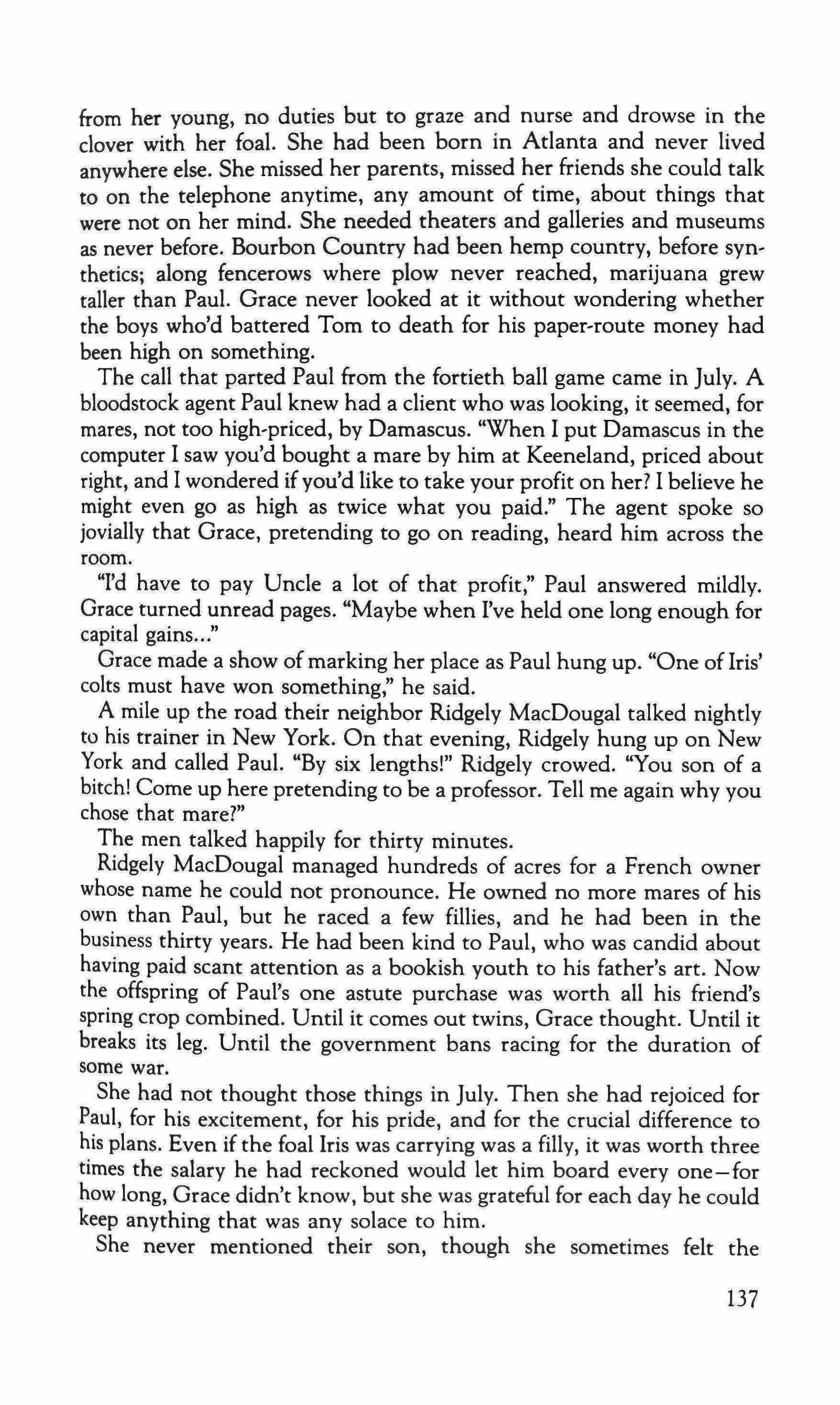
from her young, no duties but to graze and nurse and drowse in the clover with her foal. She had been born in Atlanta and never lived anywhere else. She missed her parents, missed her friends she could talk to on the telephone anytime, any amount of time, about things that were not on her mind. She needed theaters and galleries and museums as never before. Bourbon Country had been hemp country, before synthetics; along fencerows where plow never reached, marijuana grew taller than Paul. Grace never looked at it without wondering whether the boys who'd battered Tom to death for his paper-route money had been high on something.
The call that parted Paul from the fortieth ball game came in July. A bloodstock agent Paul knew had a client who was looking, it seemed, for mares, not too high-priced, by Damascus. "When I put Damascus in the computer I saw you'd bought a mare by him at Keeneland, priced about right, and I wondered ifyou'd like to take your profit on her? I believe he might even go as high as twice what you paid." The agent spoke so jovially that Grace, pretending to go on reading, heard him across the room.
"I'd have to pay Uncle a lot of that profit," Paul answered mildly. Grace turned unread pages. "Maybe when I've held one long enough for capital gains
Grace made a show of marking her place as Paul hung up. "One of Iris' colts must have won something," he said.
A mile up the road their neighbor Ridgely MacDougal talked nightly to his trainer in New York. On that evening, Ridgely hung up on New York and called Paul. "By six lengths!" Ridgely crowed. "You son of a bitch! Come up here pretending to be a professor. Tell me again why you chose that mare?"
The men talked happily for thirty minutes.
Ridgely MacDougal managed hundreds of acres for a French owner whose name he could not pronounce. He owned no more mares of his own than Paul, but he raced a few fillies, and he had been in the business thirty years. He had been kind to Paul, who was candid about having paid scant attention as a bookish youth to his father's art. Now the offspring of Paul's one astute purchase was worth all his friend's spring crop combined. Until it comes out twins, Grace thought. Until it breaks its leg. Until the government bans racing for the duration of some war.
She had not thought those things in July. Then she had rejoiced for Paul, for his excitement, for his pride, and for the crucial difference to his plans. Even if the foal Iris was carrying was a filly, it was worth three times the salary he had reckoned would let him board everyone-for how long, Grace didn't know, but she was grateful for each day he could keep anything that was any solace to him.
She never mentioned their son, though she sometimes felt the
137
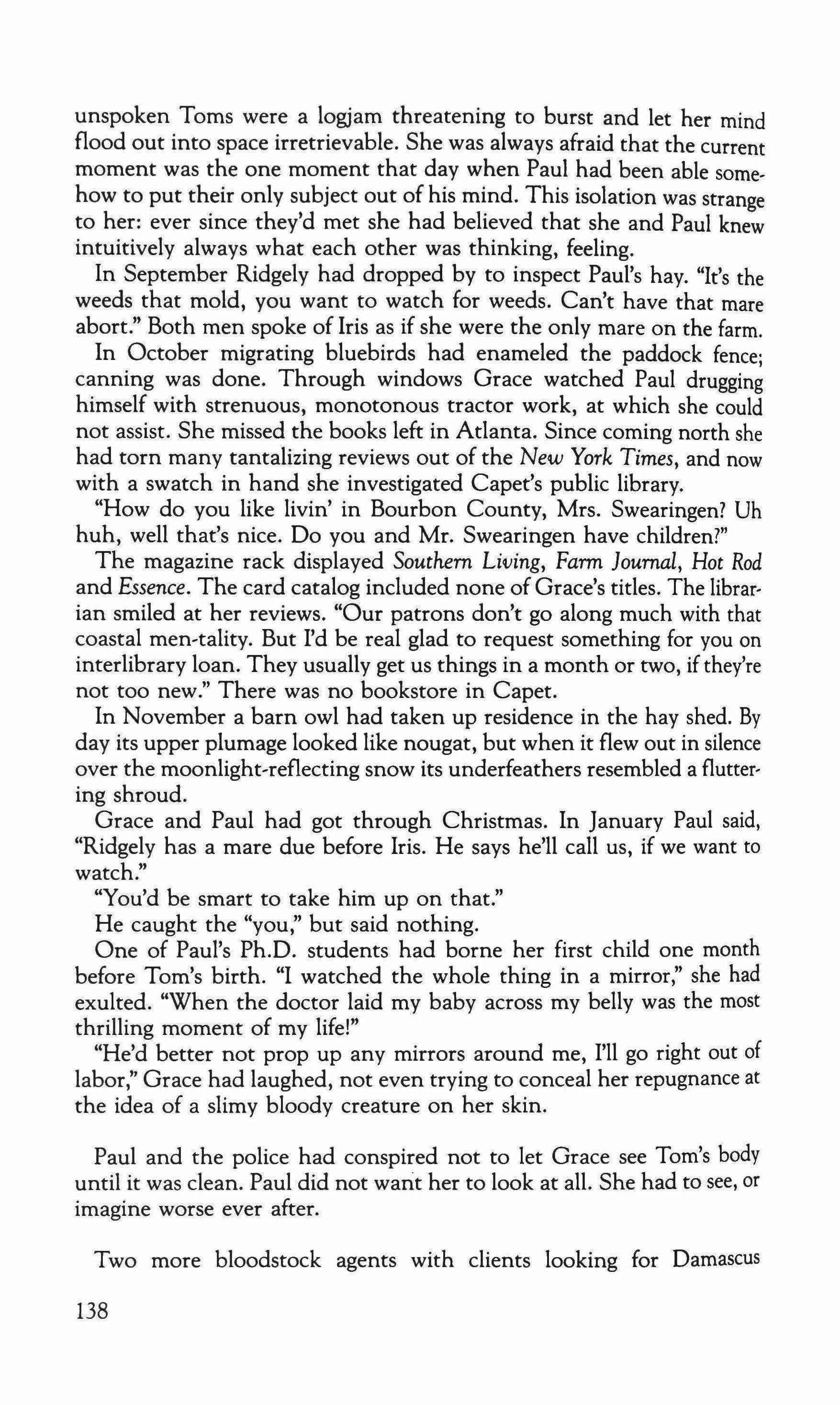
unspoken Toms were a logjam threatening to burst and let her mind flood out into space irretrievable. She was always afraid that the current moment was the one moment that day when Paul had been able somehow to put their only subject out of his mind. This isolation was strange to her: ever since they'd met she had believed that she and Paul knew intuitively always what each other was thinking, feeling.
In September Ridgely had dropped by to inspect Paul's hay. "It's the weeds that mold, you want to watch for weeds. Can't have that mare abort." Both men spoke of Iris as if she were the only mare on the farm.
In October migrating bluebirds had enameled the paddock fence; canning was done. Through windows Grace watched Paul drugging himself with strenuous, monotonous tractor work, at which she could not assist. She missed the books left in Atlanta. Since corning north she had torn many tantalizing reviews out of the New York Times, and now with a swatch in hand she investigated Caper's public library.
"How do you like livin' in Bourbon County, Mrs. Swearingen? Uh huh, well that's nice. Do you and Mr. Swearingen have children?"
The magazine rack displayed Southern Living, Farm Journal, Hot Rod and Essence. The card catalog included none of Grace's titles. The librarian smiled at her reviews. "Our patrons don't go along much with that coastal men-tality. But I'd be real glad to request something for you on interlibrary loan. They usually get us things in a month or two, ifthey're not too new." There was no bookstore in Capet.
In November a barn owl had taken up residence in the hay shed. By day its upper plumage looked like nougat, but when it flew out in silence over the moonlight-reflecting snow its underfeathers resembled a fluttering shroud.
Grace and Paul had got through Christmas. In January Paul said, "Ridgely has a mare due before Iris. He says he'll call us, if we want to watch."
"You'd be smart to take him up on that."
He caught the "you," but said nothing.
One of Paul's Ph.D. students had borne her first child one month before Torn's birth. "I watched the whole thing in a mirror," she had exulted. "When the doctor laid my baby across my belly was the most thrilling moment of my life!"
"He'd better not prop up any mirrors around me, I'll go right out of labor," Grace had laughed, not even trying to conceal her repugnance at the idea of a slimy bloody creature on her skin.
Paul and the police had conspired not to let Grace see Tom's body until it was clean. Paul did not want her to look at all. She had to see, or imagine worse ever after.
Two more bloodstock agents with clients looking for Damascus
138

mares- modestly priced nonwinners like Paul's - had telephoned within minutes after Ridgely's news about Iris' colt. The story was still legal tender at the bar of the Bluegrass Farm Managers' Club January dinnerdance. The men had accepted Paul politely when Ridgely first brought him to the Club, but there was a change in their voices now when they questioned him, and in Paul's when he answered.
"Who's that mare in foal to? Uh huh."
"Who you booked her to? Uh huh."
"You got you a good foaling man?"
Men whose horse-trader faces made Mount Rushmore look vivacious fell momentarily silent when Paul said that he would foal Iris. They were too tactful to exchange glances. They put down their forks and their voices dropped an octave. "Get you some of that cheap gauze and when you know she's gonna break the waters, tie her tail up. Otherwise she'll slap you in the face with it ever' two minutes, and you may be with her a long time before you can think about dry clothes."
"Oh, he'll think about dry clothes!"
"She been sutured?"
"No," Paul said, but the man did not hear.
"Lift up her tail and see. If she's got stitches, you'll have to cut 'em for her or she'll tear herself all up. She'll bleed a little, but -"
Grace stirred her drink, looking for Ridgely's wife, who, as it turned out, had not come.
"You put one rope around each hock, and when she has a contraction -
The beeper Ridgely wore began to sound halfway through dessert. Paul was on his feet before Ridgely.
Grace had thrown their boots in the car, which had gone off the road in one December snow, so she didn't have to watch the foaling in dancing pumps. "I'd leave you with Cynthia," Paul apologized, "but there isn't time."
Ridgely's wife never set foot in a barn.
The mare stood sweating in the middle of her stall. "She lost hers, last year," Ridgely said. "It tried to come all four feet at once and smothered. Vet had to take it out in pieces." He patted Grace's stiffened back. "This one won't give us any trouble, and neither will yours. You didn't let all that talk about ropes scare you? Forget it. You might have a couple handy, but listen, before you start tying any ropes on that mare's colt, you call me.
"When his price lights up that Keeneland board next year, I'll be there telling everybody I foaled him."
Never since the first agent's call had Grace heard Paul or Ridgely refer to what Iris carried as "it."
"There are only two kinds of men," Grace's father had said the first time he saw Tom: "those who have grandsons and those who do not."
139
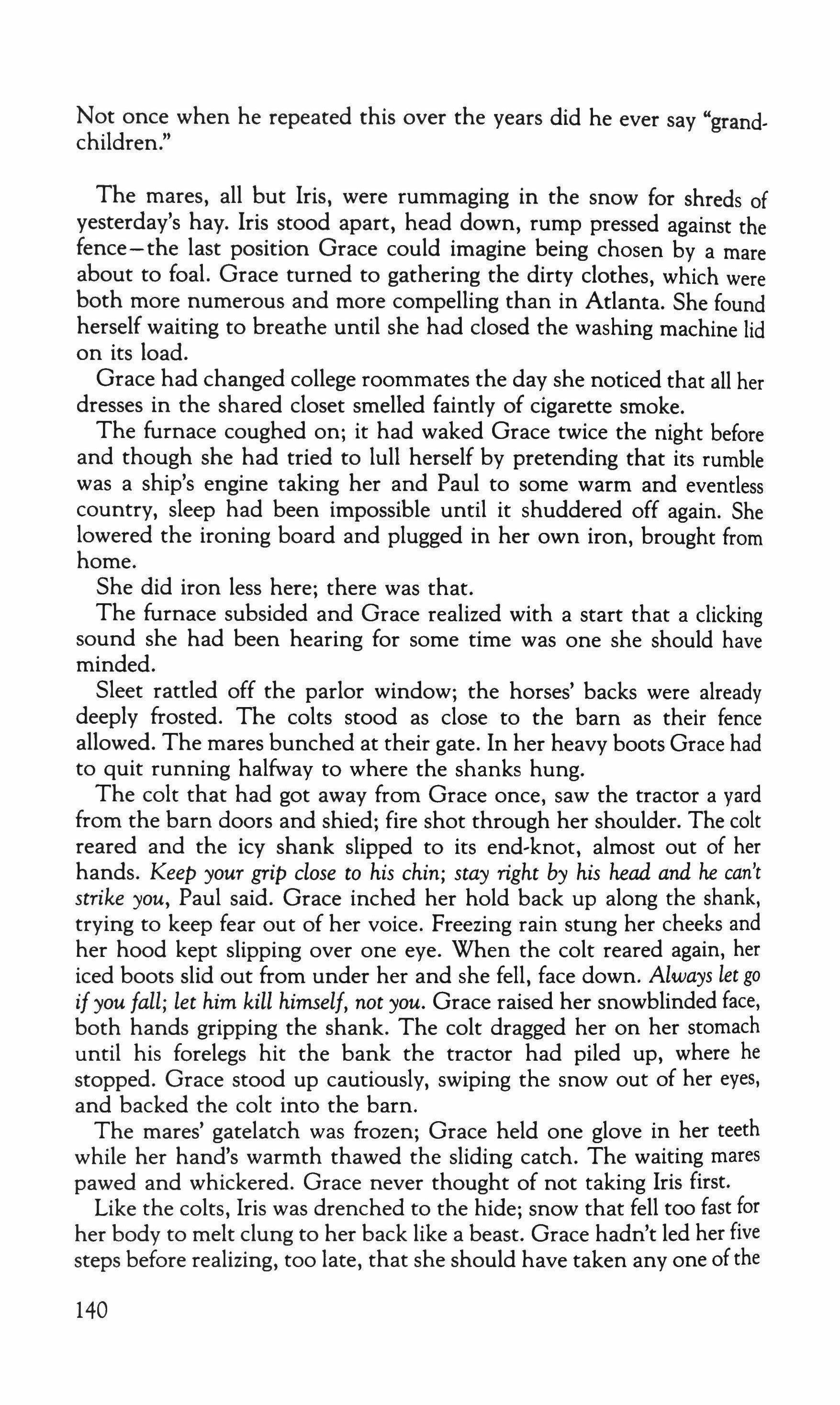
Not once when he repeated this over the years did he ever say "grandchildren."
The mares, all but Iris, were rummaging in the snow for shreds of yesterday's hay. Iris stood apart, head down, rump pressed against the fence - the last position Grace could imagine being chosen by a mare about to foal. Grace turned to gathering the dirty clothes, which were both more numerous and more compelling than in Atlanta. She found herself waiting to breathe until she had closed the washing machine lid on its load.
Grace had changed college roommates the day she noticed that all her dresses in the shared closet smelled faintly of cigarette smoke.
The furnace coughed on; it had waked Grace twice the night before and though she had tried to lull herself by pretending that its rumble was a ship's engine taking her and Paul to some warm and eventless country, sleep had been impossible until it shuddered off again. She lowered the ironing board and plugged in her own iron, brought from home.
She did iron less here; there was that.
The furnace subsided and Grace realized with a start that a clicking sound she had been hearing for some time was one she should have minded.
Sleet rattled off the parlor window; the horses' backs were already deeply frosted. The colts stood as close to the barn as their fence allowed. The mares bunched at their gate. In her heavy boots Grace had to quit running halfway to where the shanks hung.
The colt that had got away from Grace once, saw the tractor a yard from the barn doors and shied; fire shot through her shoulder. The colt reared and the icy shank slipped to its end-knot, almost out of her hands. Keep your griP close to his chin; stay right by his head and he can't strike you, Paul said. Grace inched her hold back up along the shank, trying to keep fear out of her voice. Freezing rain stung her cheeks and her hood kept slipping over one eye. When the colt reared again, her iced boots slid out from under her and she fell, face down. Always let go if you fall; let him kill himself, not you. Grace raised her snowblinded face, both hands gripping the shank. The colt dragged her on her stomach until his forelegs hit the bank the tractor had piled up, where he stopped. Grace stood up cautiously, swiping the snow out of her eyes, and backed the colt into the barn.
The mares' gatelatch was frozen; Grace held one glove in her teeth while her hand's warmth thawed the sliding catch. The waiting mares pawed and whickered. Grace never thought of not taking Iris first.
Like the colts, Iris was drenched to the hide; snow that fell too fast for her body to melt clung to her back like a beast. Grace hadn't led her five steps before realizing, too late, that she should have taken anyone ofthe
140
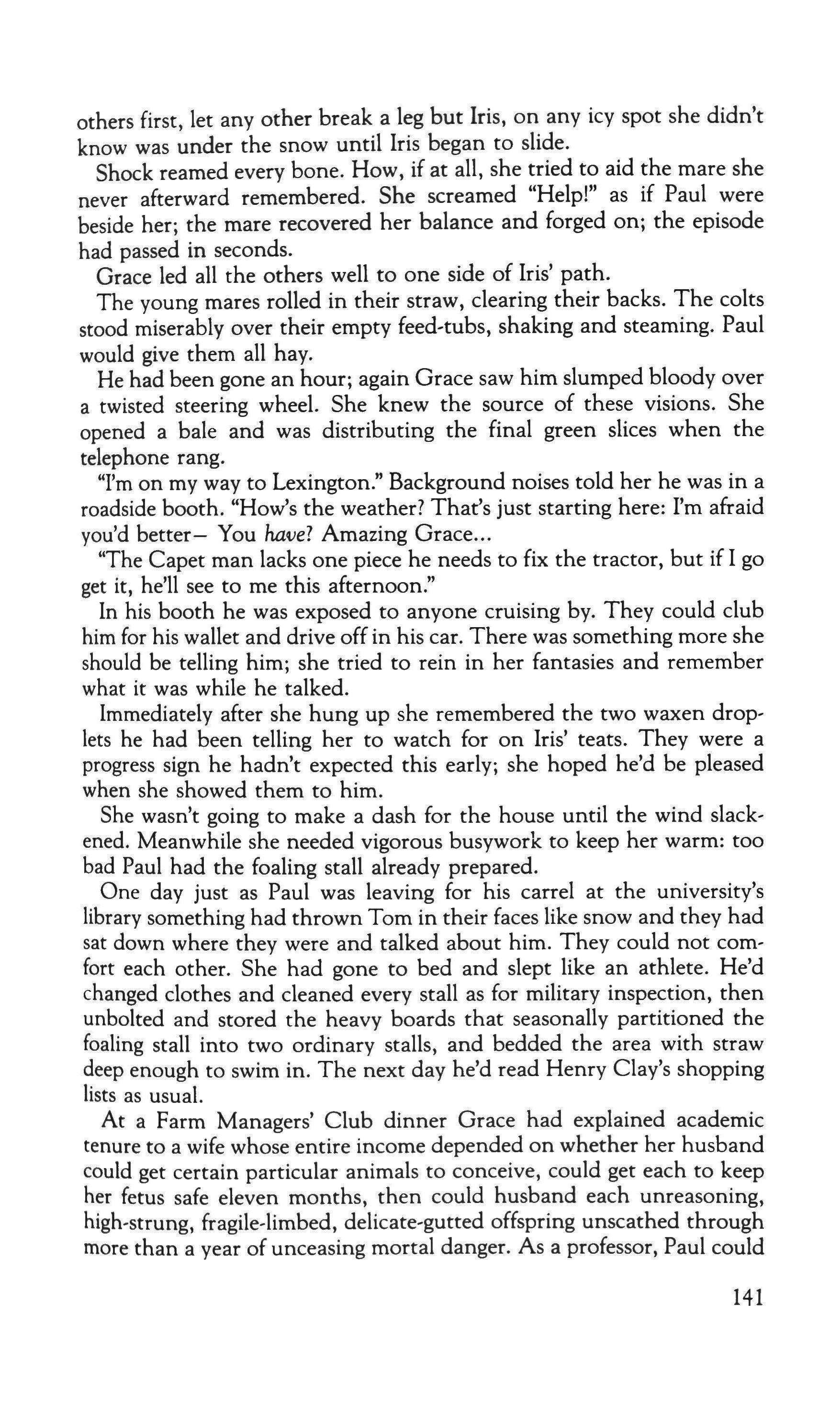
others first, let any other break a leg but Iris, on any icy spot she didn't know was under the snow until Iris began to slide.
Shock reamed every bone. How, if at all, she tried to aid the mare she never afterward remembered. She screamed "Help!" as if Paul were beside her; the mare recovered her balance and forged on; the episode had passed in seconds.
Grace led all the others well to one side of Iris' path.
The young mares rolled in their straw, clearing their backs. The colts stood miserably over their empty feed-tubs, shaking and steaming. Paul would give them all hay.
He had been gone an hour; again Grace saw him slumped bloody over a twisted steering wheel. She knew the source of these visions. She opened a bale and was distributing the final green slices when the telephone rang.
"I'm on my way to Lexington." Background noises told her he was in a roadside booth. "How's the weather? That's just starting here: I'm afraid you'd better- You have? Amazing Grace
"The Capet man lacks one piece he needs to fix the tractor, but if I go get it, he'll see to me this afternoon."
In his booth he was exposed to anyone cruising by. They could club him for his wallet and drive off in his car. There was something more she should be telling him; she tried to rein in her fantasies and remember what it was while he talked.
Immediately after she hung up she remembered the two waxen drop' lets he had been telling her to watch for on Iris' teats. They were a progress sign he hadn't expected this early; she hoped he'd be pleased when she showed them to him.
She wasn't going to make a dash for the house until the wind slack, ened. Meanwhile she needed vigorous busywork to keep her warm: too bad Paul had the foaling stall already prepared.
One day just as Paul was leaving for his carrel at the university's library something had thrown Tom in their faces like snow and they had sat down where they were and talked about him. They could not com' fort each other. She had gone to bed and slept like an athlete. He'd changed clothes and cleaned every stall as for military inspection, then unbolted and stored the heavy boards that seasonally partitioned the foaling stall into two ordinary stalls, and bedded the area with straw deep enough to swim in. The next day he'd read Henry Clay's shopping lists as usual.
At a Farm Managers' Club dinner Grace had explained academic tenure to a wife whose entire income depended on whether her husband could get certain particular animals to conceive, could get each to keep her fetus safe eleven months, then could husband each unreasoning, high-strung, fragile'limbed, delicate-gutted offspring unscathed through more than a year of unceasing mortal danger. As a professor, Paul could
141
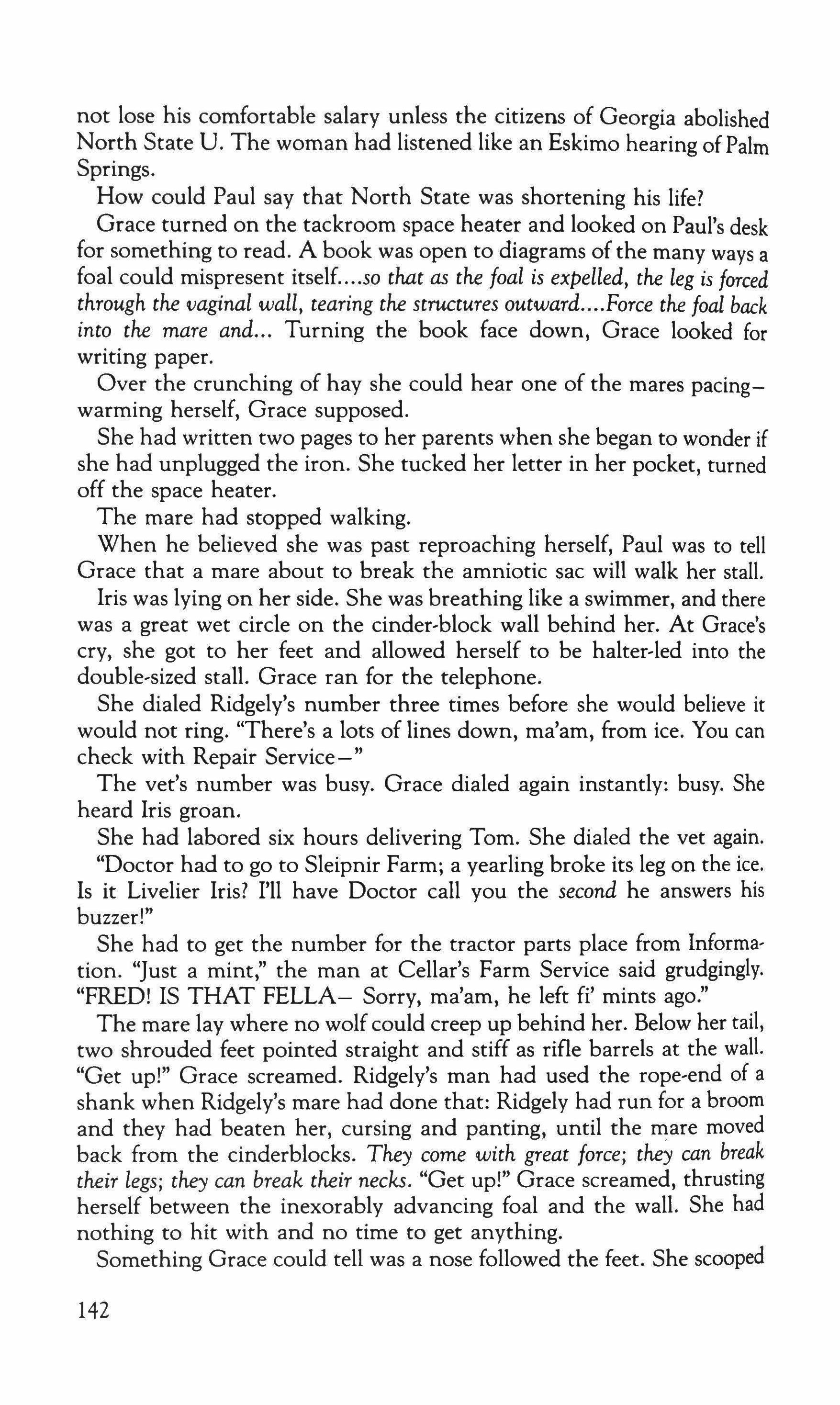
not lose his comfortable salary unless the citizens of Georgia abolished North State U. The woman had listened like an Eskimo hearing ofPalm Springs.
How could Paul say that North State was shortening his life?
Grace turned on the tackroom space heater and looked on Paul's desk for something to read. A book was open to diagrams of the many ways a foal could mispresent itself so that as the foal is expelled, the leg is forced through the vaginal wall, tearing the structures outward Force the foal back into the mare and.. Turning the book face down, Grace looked for writing paper.
Over the crunching of hay she could hear one of the mares pacingwarming herself, Grace supposed.
She had written two pages to her parents when she began to wonder if she had unplugged the iron. She tucked her letter in her pocket, turned off the space heater.
The mare had stopped walking.
When he believed she was past reproaching herself, Paul was to tell Grace that a mare about to break the amniotic sac will walk her stall.
Iris was lying on her side. She was breathing like a swimmer, and there was a great wet circle on the cinder-block wall behind her. At Grace's cry, she got to her feet and allowed herself to be halter-led into the double,sized stall. Grace ran for the telephone.
She dialed Ridgely's number three times before she would believe it would not ring. "There's a lots of lines down, ma'am, from ice. You can check with Repair Service -"
The vet's number was busy. Grace dialed again instantly: busy. She heard Iris groan.
She had labored six hours delivering Tom. She dialed the vet again. "Doctor had to go to Sleipnir Farm; a yearling broke its leg on the ice. Is it Livelier Iris? I'll have Doctor call you the second he answers his buzzer!"
She had to get the number for the tractor parts place from Information. "Just a mint," the man at Cellar's Farm Service said grudgingly. "FRED! IS THAT FELLA- Sorry, ma'am, he left fi' mints ago."
The mare lay where no wolfcould creep up behind her. Below her tail, two shrouded feet pointed straight and stiff as rifle barrels at the wall. "Get up!" Grace screamed. Ridgely's man had used the rope-end of a shank when Ridgely's mare had done that: Ridgely had run for a broom and they had beaten her, cursing and panting, until the mare moved back from the cinderblocks. They come with great force; they can break their legs; they can break their necks. "Get up!" Grace screamed, thrusting herself between the inexorably advancing foal and the wall. She had nothing to hit with and no time to get anything.
Something Grace could tell was a nose followed the feet. She scooped
142
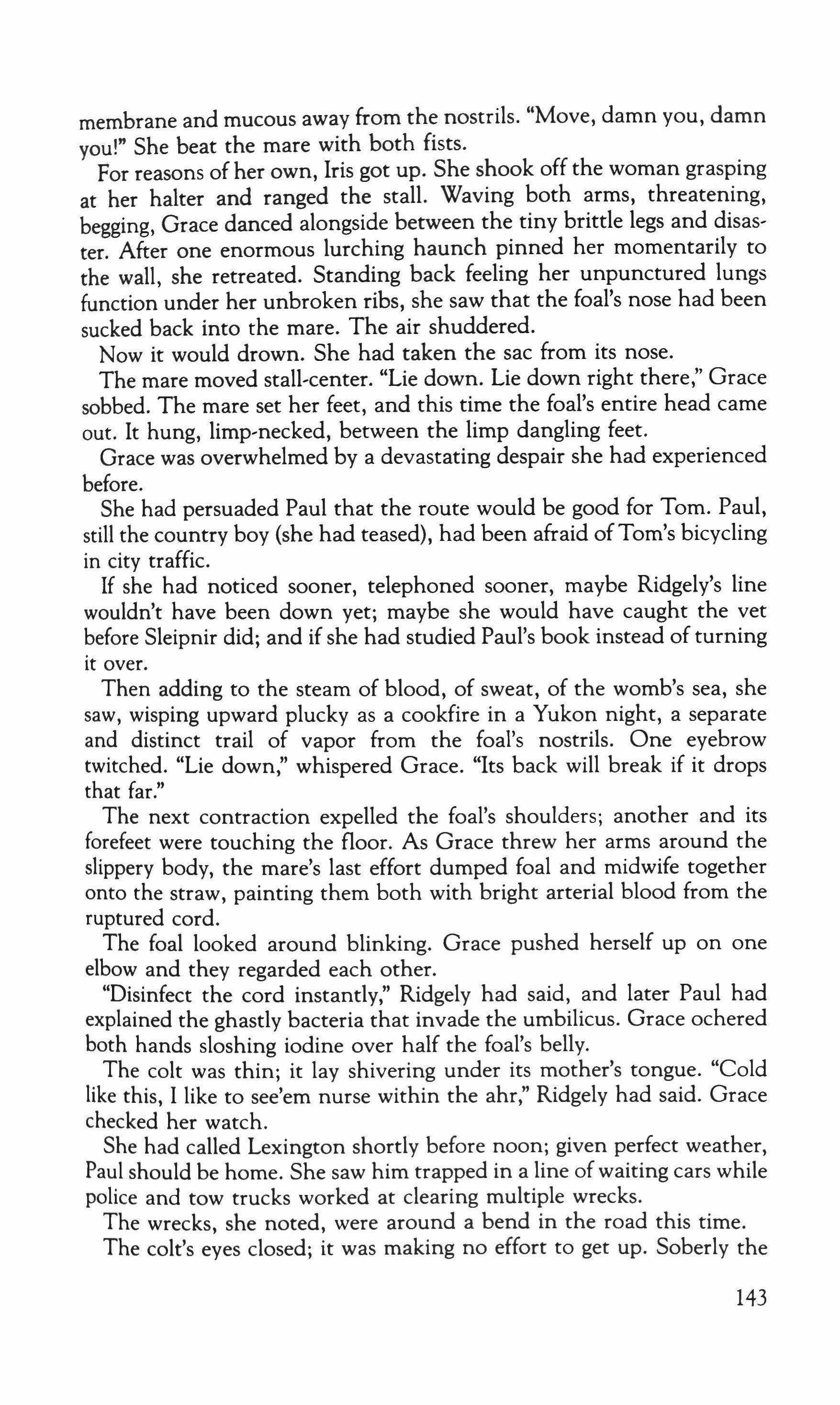
membrane and mucous away from the nostrils. "Move, damn you, damn you!" She beat the mare with both fists.
For reasons of her own, Iris got up. She shook off the woman grasping at her halter and ranged the stall. Waving both arms, threatening, begging, Grace danced alongside between the tiny brittle legs and disas, ter. After one enormous lurching haunch pinned her momentarily to the wall, she retreated. Standing back feeling her unpunctured lungs function under her unbroken ribs, she saw that the foal's nose had been sucked back into the mare. The air shuddered.
Now it would drown. She had taken the sac from its nose.
The mare moved stall-center. "Lie down. Lie down right there," Grace sobbed. The mare set her feet, and this time the foal's entire head came out. It hung, limp-necked, between the limp dangling feet.
Grace was overwhelmed by a devastating despair she had experienced before.
She had persuaded Paul that the route would be good for Tom. Paul, still the country boy (she had teased), had been afraid of Tom's bicycling in city traffic.
If she had noticed sooner, telephoned sooner, maybe Ridgely's line wouldn't have been down yet; maybe she would have caught the vet before Sleipnir did; and if she had studied Paul's book instead of turning it over.
Then adding to the steam of blood, of sweat, of the womb's sea, she saw, wisping upward plucky as a cookfire in a Yukon night, a separate and distinct trail of vapor from the foal's nostrils. One eyebrow twitched. "Lie down," whispered Grace. "Its back will break if it drops that far."
The next contraction expelled the foal's shoulders; another and its forefeet were touching the floor. As Grace threw her arms around the slippery body, the mare's last effort dumped foal and midwife together onto the straw, painting them both with bright arterial blood from the ruptured cord.
The foal looked around blinking. Grace pushed herself up on one elbow and they regarded each other.
"Disinfect the cord instantly," Ridgely had said, and later Paul had explained the ghastly bacteria that invade the umbilicus. Grace ochered both hands sloshing iodine over half the foal's belly.
The colt was thin; it lay shivering under its mother's tongue. "Cold like this, I like to see'em nurse within the ahr," Ridgely had said. Grace checked her watch.
She had called Lexington shortly before noon; given perfect weather, Paul should be home. She saw him trapped in a line of waiting cars while police and tow trucks worked at clearing multiple wrecks.
The wrecks, she noted, were around a bend in the road this time.
The colt's eyes closed; it was making no effort to get up. Soberly the
143
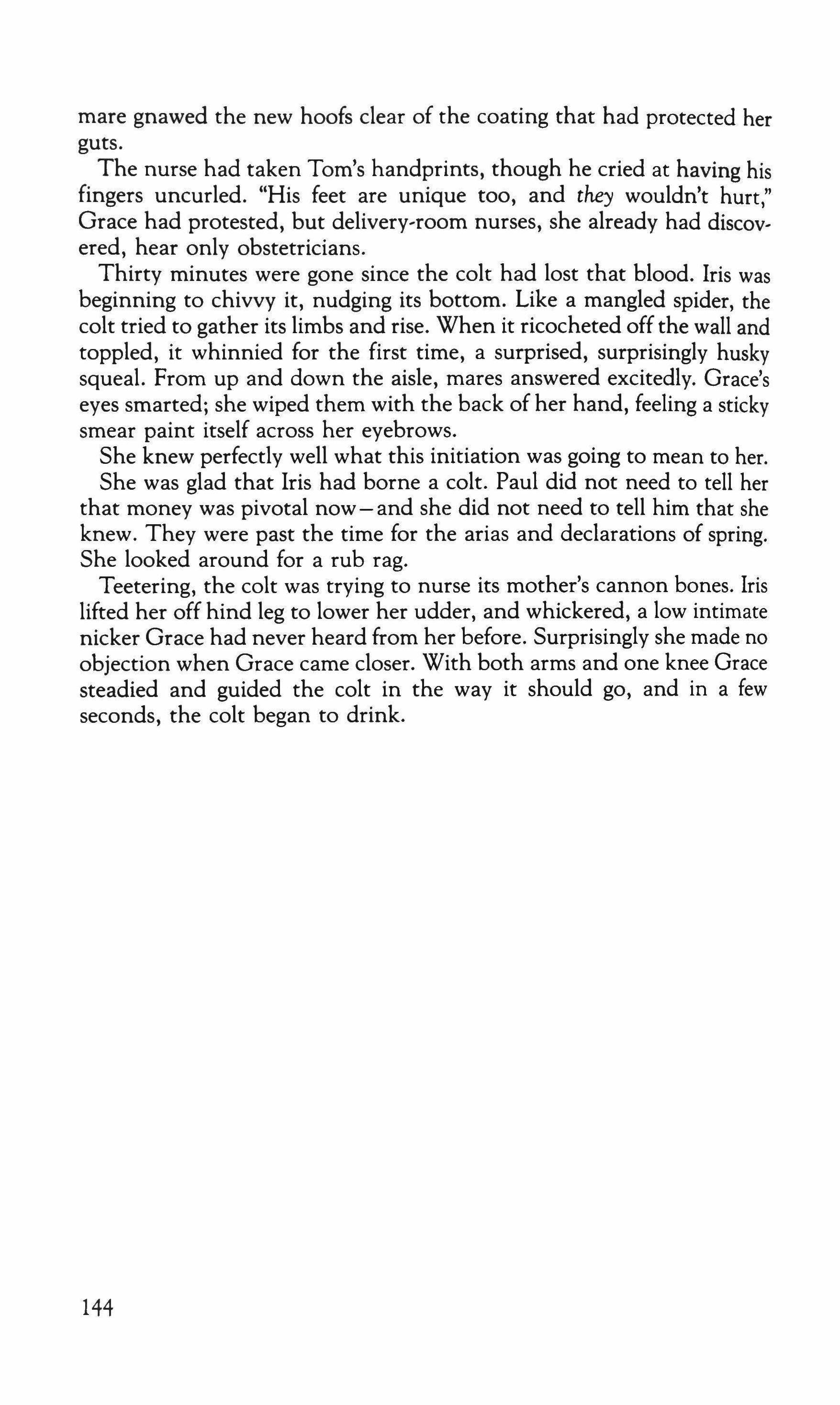
mare gnawed the new hoofs clear of the coating that had protected her guts.
The nurse had taken Tom's handprints, though he cried at having his fingers uncurled. "His feet are unique too, and they wouldn't hurt," Grace had protested, but delivery-room nurses, she already had discovered, hear only obstetricians.
Thirty minutes were gone since the colt had lost that blood. Iris was beginning to chivvy it, nudging its bottom. Like a mangled spider, the colt tried to gather its limbs and rise. When it ricocheted off the wall and toppled, it whinnied for the first time, a surprised, surprisingly husky squeal. From up and down the aisle, mares answered excitedly. Grace's eyes smarted; she wiped them with the back of her hand, feeling a sticky smear paint itself across her eyebrows.
She knew perfectly well what this initiation was going to mean to her.
She was glad that Iris had borne a colt. Paul did not need to tell her that money was pivotal now - and she did not need to tell him that she knew. They were past the time for the arias and declarations of spring. She looked around for a rub rag.
Teetering, the colt was trying to nurse its mother's cannon bones. Iris lifted her off hind leg to lower her udder, and whickered, a low intimate nicker Grace had never heard from her before. Surprisingly she made no objection when Grace came closer. With both arms and one knee Grace steadied and guided the colt in the way it should go, and in a few seconds, the colt began to drink.
144
The Oddment Man and the Apocalyptic Beasts
Eugene K. Garber
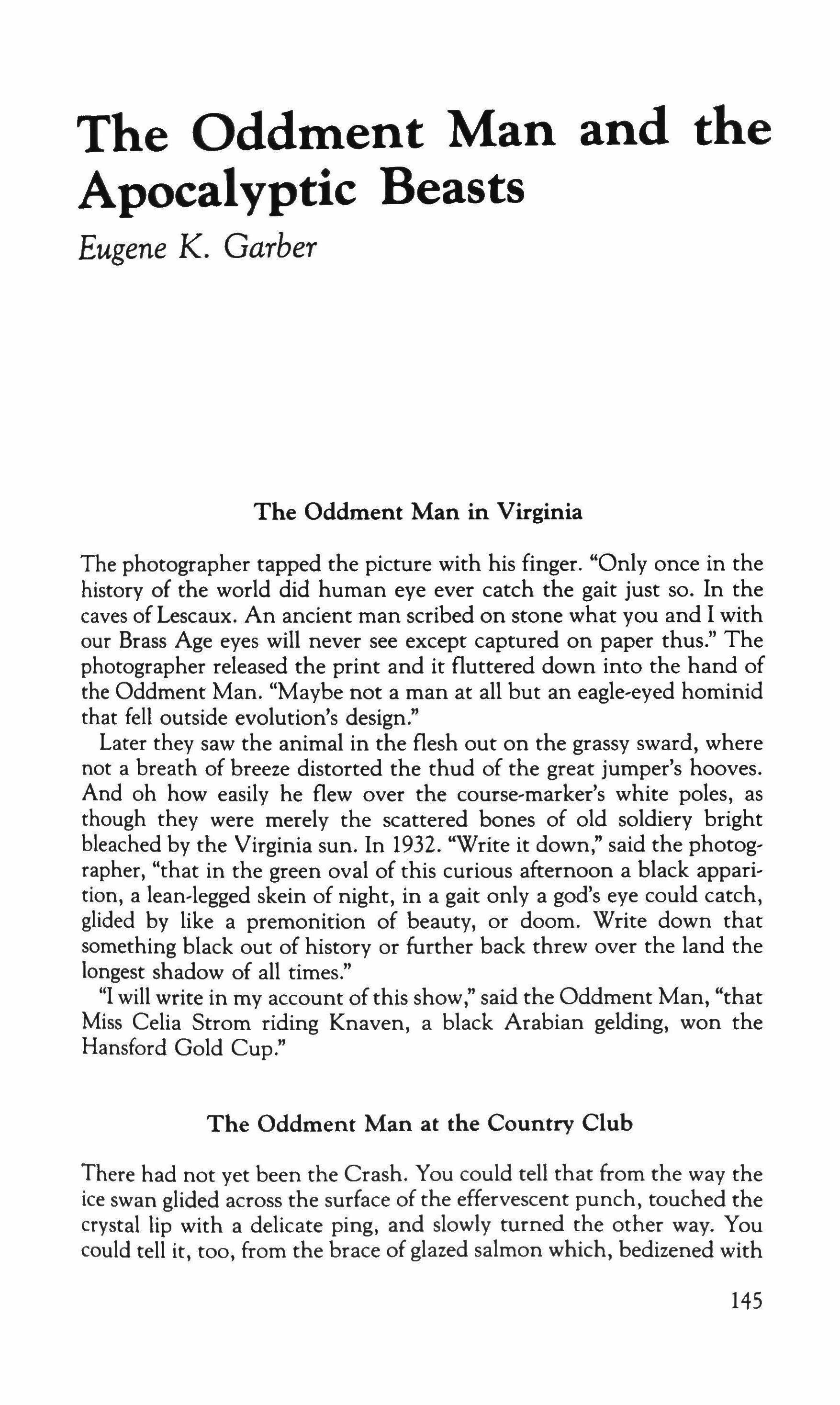
The Oddment Man in Virginia
The photographer tapped the picture with his finger. "Only once in the history of the world did human eye ever catch the gait just so. In the caves of Lescaux. An ancient man scribed on stone what you and I with our Brass Age eyes will never see except captured on paper thus." The photographer released the print and it fluttered down into the hand of the Oddment Man. "Maybe not a man at all but an eagle-eyed hominid that fell outside evolution's design."
Later they saw the animal in the flesh out on the grassy sward, where not a breath of breeze distorted the thud of the great jumper's hooves. And oh how easily he flew over the course-marker's white poles, as though they were merely the scattered bones of old soldiery bright bleached by the Virginia sun. In 1932. "Write it down," said the photog, rapher, "that in the green oval of this curious afternoon a black apparition, a lean-legged skein of night, in a gait only a god's eye could catch, glided by like a premonition of beauty, or doom. Write down that something black out of history or further back threw over the land the longest shadow of all times."
"I will write in my account ofthis show," said the Oddment Man, "that Miss Celia Strom riding Knaven, a black Arabian gelding, won the Hansford Gold Cup."
The Oddment Man at the Country Club
There had not yet been the Crash. You could tell that from the way the ice swan glided across the surface of the effervescent punch, touched the crystal lip with a delicate ping, and slowly turned the other way. You could tell it, too, from the brace of glazed salmon which, bedizened with
145

flowerlets of pimento, swam against a froth of piped mayonnaise. And from the way the silken grosgran shone on the lapels of the gentlemen dancers and from the way the white of the ladies' gowns defined the black thighs of their partners.
"Come see!" a young woman shouted, pulling her escort by the hand up the steps and across the piazza to the great doors of the dance hall. "There's something in the pool!" But the Oddment Man was in enforced colloquy with the mess-jacket-and-epaulets and therefore did not arrive until the groundsman had the beast safely netted and was hurrying off with it toward the rear of the club.
"You must write," said the sweet flower of the night, "that it had big green eyes and ears like an elf and legs with two knees."
"I will write," said the Oddment Man, "that no claw, however desperate and sharp, can gain purchase on the smooth sea-green tiles of the Elmshade Country Club."
The Oddment Man in Tennessee
All that November day the pine needles scratched the sky that loured over the fields. And all the keen,nosed dogs of America could not make a point. Down in the brown grass the bright-eyed bobwhites listened to the thrashing and the whining of the hounds. All safe except where in the north corner of a neighboring field a black followed a snuffling hog through the brush.
The dogs had names like Walter Scott, Ramsdale III, Son of Marston, Courser, and Brasher. In 1938. "What's the hog's name?" asked the Oddment Man.
The black said, "I never take but five, for my wife and me and three little boys and never shoot a hen." He picked up the quail from his overall pocket, bright cocks with swept-back topknots. He cradled the octagonal barrel of his .22.
The others had been etched with monograms, the letters twined like rose vines on a trellis. Some had on the breach running designs like the calligraphies of far countries. The barrels were as deeply blued as death itself.
"What is your pointer's name?"
The black looked down at the flat nose and pin eyes of his animal. "Hog," he said.
"I will write it down in my account ofthese field trials that Hog made a quincunx of perfect points."
146
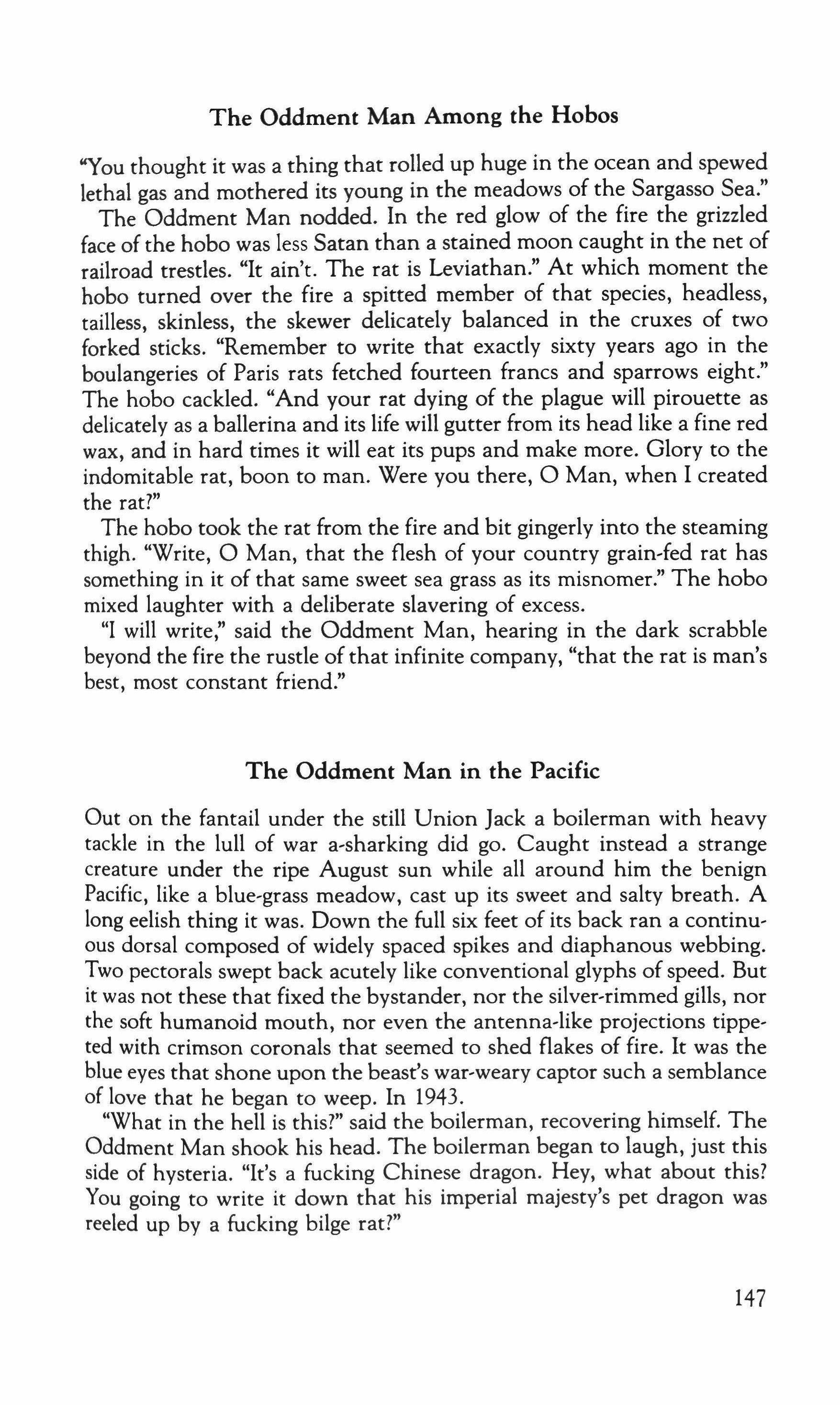
The Oddment Man Among the Hobos
"You thought it was a thing that rolled up huge in the ocean and spewed lethal gas and mothered its young in the meadows of the Sargasso Sea."
The Oddment Man nodded. In the red glow of the fire the grizzled face of the hobo was less Satan than a stained moon caught in the net of railroad trestles. "It ain't. The rat is Leviathan." At which moment the hobo turned over the fire a spitted member of that species, headless, tailless, skinless, the skewer delicately balanced in the cruxes of two forked sticks. "Remember to write that exactly sixty years ago in the boulangeries of Paris rats fetched fourteen francs and sparrows eight." The hobo cackled. "And your rat dying of the plague will pirouette as delicately as a ballerina and its life will gutter from its head like a fine red wax, and in hard times it will eat its pups and make more. Glory to the indomitable rat, boon to man. Were you there, 0 Man, when I created the rat?"
The hobo took the rat from the fire and bit gingerly into the steaming thigh. "Write, 0 Man, that the flesh of your country grain-fed rat has something in it of that same sweet sea grass as its misnomer." The hobo mixed laughter with a deliberate slavering of excess.
"I will write," said the Oddment Man, hearing in the dark scrabble beyond the fire the rustle of that infinite company, "that the rat is man's best, most constant friend."
The Oddment Man in the Pacific
Out on the fantail under the still Union Jack a boilerman with heavy tackle in the lull of war a-sharking did go. Caught instead a strange creature under the ripe August sun while all around him the benign Pacific, like a blue-grass meadow, cast up its sweet and salty breath. A long eelish thing it was. Down the full six feet of its back ran a continuous dorsal composed of widely spaced spikes and diaphanous webbing. Two pectorals swept back acutely like conventional glyphs of speed. But it was not these that fixed the bystander, nor the silver-rimmed gills, nor the soft humanoid mouth, nor even the antenna-like projections tippeted with crimson coronals that seemed to shed flakes of fire. It was the blue eyes that shone upon the beast's war-weary captor such a semblance of love that he began to weep. In 1943.
"What in the hell is this?" said the boilerman, recovering himself. The Oddment Man shook his head. The boilerman began to laugh, just this side of hysteria. "It's a fucking Chinese dragon. Hey, what about this? You going to write it down that his imperial majesty's pet dragon was reeled up by a fucking bilge rat?"
147
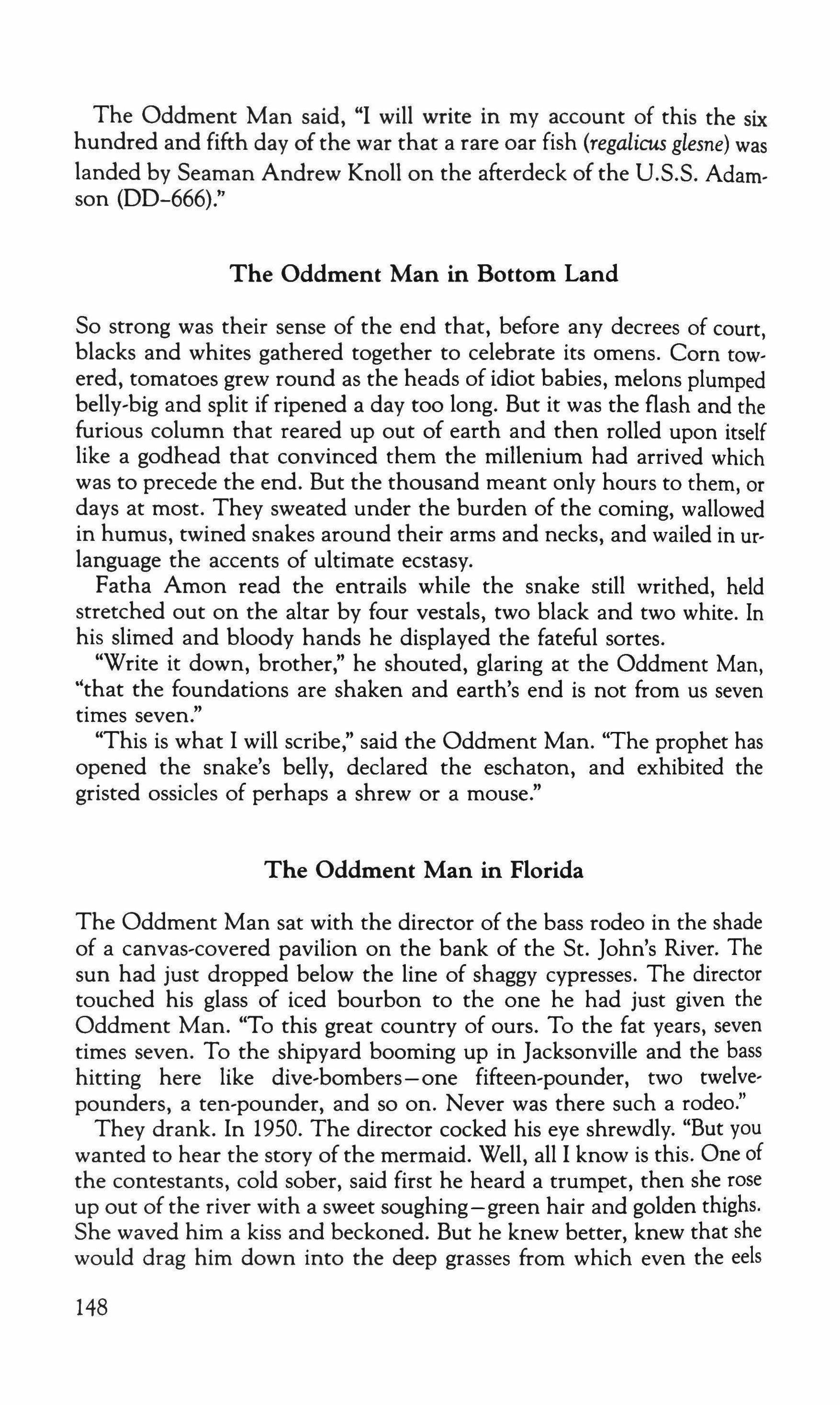
The Oddment Man said, "I will write in my account of this the six hundred and fifth day of the war that a rare oar fish (regalicus glesne) was landed by Seaman Andrew Knoll on the afterdeck of the U.S.S. Adamson (DD-666)."
The Oddment Man in Bottom Land
So strong was their sense of the end that, before any decrees of court, blacks and whites gathered together to celebrate its omens. Corn towered, tomatoes grew round as the heads of idiot babies, melons plumped belly-big and split if ripened a day too long. But it was the flash and the furious column that reared up out of earth and then rolled upon itself like a godhead that convinced them the millenium had arrived which was to precede the end. But the thousand meant only hours to them, or days at most. They sweated under the burden of the coming, wallowed in humus, twined snakes around their arms and necks, and wailed in urlanguage the accents of ultimate ecstasy.
Fatha Amon read the entrails while the snake still writhed, held stretched out on the altar by four vestals, two black and two white. In his slimed and bloody hands he displayed the fateful sortes.
"Write it down, brother," he shouted, glaring at the Oddment Man, "that the foundations are shaken and earth's end is not from us seven times seven."
"This is what I will scribe," said the Oddment Man. "The prophet has opened the snake's belly, declared the eschaton, and exhibited the gristed ossicles of perhaps a shrew or a mouse."
The Oddment Man in Florida
The Oddment Man sat with the director of the bass rodeo in the shade of a canvas-covered pavilion on the bank of the St. John's River. The sun had just dropped below the line of shaggy cypresses. The director touched his glass of iced bourbon to the one he had just given the Oddment Man. "To this great country of ours. To the fat years, seven times seven. To the shipyard booming up in Jacksonville and the bass hitting here like dive-bombers-one fifteen-pounder, two twelvepounders, a ten-pounder, and so on. Never was there such a rodeo."
They drank. In 1950. The director cocked his eye shrewdly. "But you wanted to hear the story of the mermaid. Well, all I know is this. One of the contestants, cold sober, said first he heard a trumpet, then she rose up out of the river with a sweet soughing-green hair and golden thighs. She waved him a kiss and beckoned. But he knew better, knew that she would drag him down into the deep grasses from which even the eels
148

have trouble disentangling themselves." The director tilted back and blew a gusty laugh at the darkening sky. A dragonfly backed daintily away. "You going to write that up or you going to stick to the new reels and phosphorescent plugs?"
"I will write it down," said the Oddment Man, "that a manatee, grazing on river grass, surfaced, trumpeted, and flipped its tail in the bright midcentury sun of Florida."
The Oddment Man at the Ball Game
The mothers brought up lawn chairs and unfolded them in the kind light of the long summer afternoon. The fathers, fresh from work, paced behind the benches of their respective teams, smoked and conferred. Out onto the field ran the miniature players in gray and maroon, the eight-to-tens. But their shadows, leaning toward left field, were long. Every pitch a prophecy, every at-bat a crack at the future, every scoop and catch a piece of America. And the parents, like the crickets on the epic wall, chirped the beauty of mobility.
But the Oddment Man's story was a postscript-about a sideliner, an unteamed lad who had seen two pops go unretrieved in the brush and had stayed behind in the dusk to make them his own. And the thing was there, waiting, as it always did, and crooned and mauled him gently and mouthed him, and then turned him loose too stained, alas, for reclamation.
The father demanded that the Oddment Man write the wages of perversity. "I will write:' said the Oddment Man, "that the little half-acre was razed with a fury rarely seen here, the alders quivering under the ax, the rabbits and chipmunks dashing in a frenzy across the greensward, and the stumps smoking for days after the gasoline fire. And thus has the great pastoral sport been preserved."
The Oddment Man on the Mountain
On the mountain, by the stream, the Oddment Man consorted with the Gathered, beautiful in their casual nudity. When the air was clear, they glowed purple-umber, like autumn heather. When the valley weather crept up and the sky thickened and loured, the Gathered lifted their arms and stretched their legs to seam the parental elements.
The Oddment Man had two guides up the mountain path, a slow youth in mocassins only and a blue roadrunner that shot like an arrow from bush to bush and leaped outcroppings head-high, but never flew.
"Write," said the guide, when they had strolled some time among the throng that was a single protean androgyne, "that we, the Body, are 149

purified. Three days we have eaten nothing. Write that a brown exudate seeped from our feet and sockets into the baptismal stream. Tongues and teeth, once slick with aliment, now clean as the stones in the stream. No urea in our urine and our bowels quiet. The last semen has pulsed, menses oozed. We are pure."
"I will write," said the Oddment Man, supping water upstream of the throng, "that the Gathered, which is the Body, yearns after quiescence. Meanwhile, the roadrunner has gathered its kind. Shafts of blue scatter among rocks and furze like shocks of lawless light."
The Oddment Man in Los Angeles
Black speakers stood on each wing of the stage like sarcophagi booming with the voices of the dead, and above the proscenium sounded another set like trumpets of doom. The Holy Beast. 1964. And his Apocalypse Band. Inside the dome the faithful made their own weather, more starless, more srnoke-ambered than the smog-ridden city itself. In the lurid light the guitarists' strings made a knife-like scintillance. The drummer's sticks stuttered brilliantly in the strobe that flickered over golden kettle and cymbals. The Holy Beast wrestled with the serpent-tailed mike, now mewing, now bellowing, driven down by who knows what power onto his knees, under the wild shag of black hair. And at the very end he smashed a guitar over his thigh. The speakers projected the sound of a splitting mountain. The faithful screamed.
The agent, smoking a joint, said to the Oddment Man, "Do you fathom it, man?" Bright-eyed he was and curiously coiled in his crimson vest and britches. "It is the change of orders, man. Write it down that I prophesy it."
"I will write that he's likely to be short-lived."
"Yea verily. But there are many beasts to take up the howl, man. Write it down that the temple will corne down."
"I will write that the Holy Beast split the dome."
"Yea verily. I say unto you the dome of domes, heaven itself. Everything is changed, man, changed utterly."
The Oddment Man in High Hill Country
The couple refused to talk, harried and mortified by press and lawmen. From the three-quarters porch ofthe little hilltop house the slopes rolled north to the Siskiyou Pass and south to the double dome of Shasta. The charred remains of the cow were at a lab in Redding. It was sweet October and except for the burned black circle down by the dry creek
150
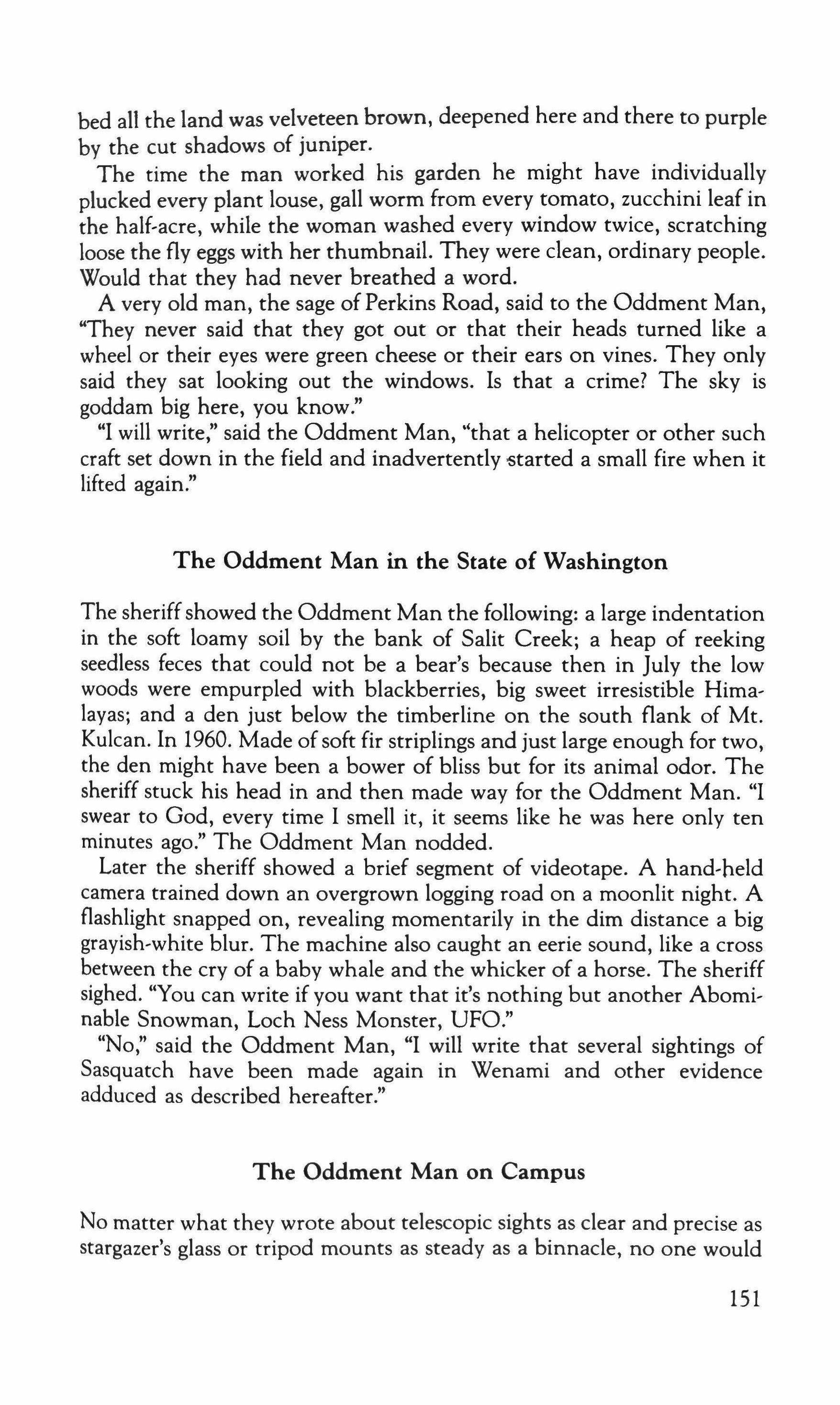
bed all the land was velveteen brown, deepened here and there to purple by the cut shadows of juniper.
The time the man worked his garden he might have individually plucked every plant louse, gall worm from every tomato, zucchini leaf in the half-acre, while the woman washed every window twice, scratching loose the fly eggs with her thumbnail. They were clean, ordinary people. Would that they had never breathed a word.
A very old man, the sage of Perkins Road, said to the Oddment Man, "They never said that they got out or that their heads turned like a wheel or their eyes were green cheese or their ears on vines. They only said they sat looking out the windows. Is that a crime? The sky is goddam big here, you know."
"I will write," said the Oddment Man, "that a helicopter or other such craft set down in the field and inadvertently started a small fire when it lifted again."
The Oddment Man in the State of Washington
The sheriffshowed the Oddment Man the following: a large indentation in the soft loamy soil by the bank of Salit Creek; a heap of reeking seedless feces that could not be a bear's because then in July the low woods were empurpled with blackberries, big sweet irresistible Himalayas; and a den just below the timberline on the south flank of Mt. Kulcan. In 1960. Made ofsoft fir striplings and just large enough for two, the den might have been a bower of bliss but for its animal odor. The sheriff stuck his head in and then made way for the Oddment Man. "I swear to God, every time I smell it, it seems like he was here only ten minutes ago." The Oddment Man nodded.
Later the sheriff showed a brief segment of videotape. A hand-held camera trained down an overgrown logging road on a moonlit night. A flashlight snapped on, revealing momentarily in the dim distance a big grayish-white blur. The machine also caught an eerie sound, like a cross between the cry of a baby whale and the whicker of a horse. The sheriff sighed. "You can write if you want that it's nothing but another Abominable Snowman, Loch Ness Monster, UFO."
"No," said the Oddment Man, "I will write that several sightings of Sasquatch have been made again in Wenami and other evidence adduced as described hereafter."
The Oddment Man on Campus
No matter what they wrote about telescopic sights as clear and precise as stargazer's glass or tripod mounts as steady as a binnacle, no one would
151
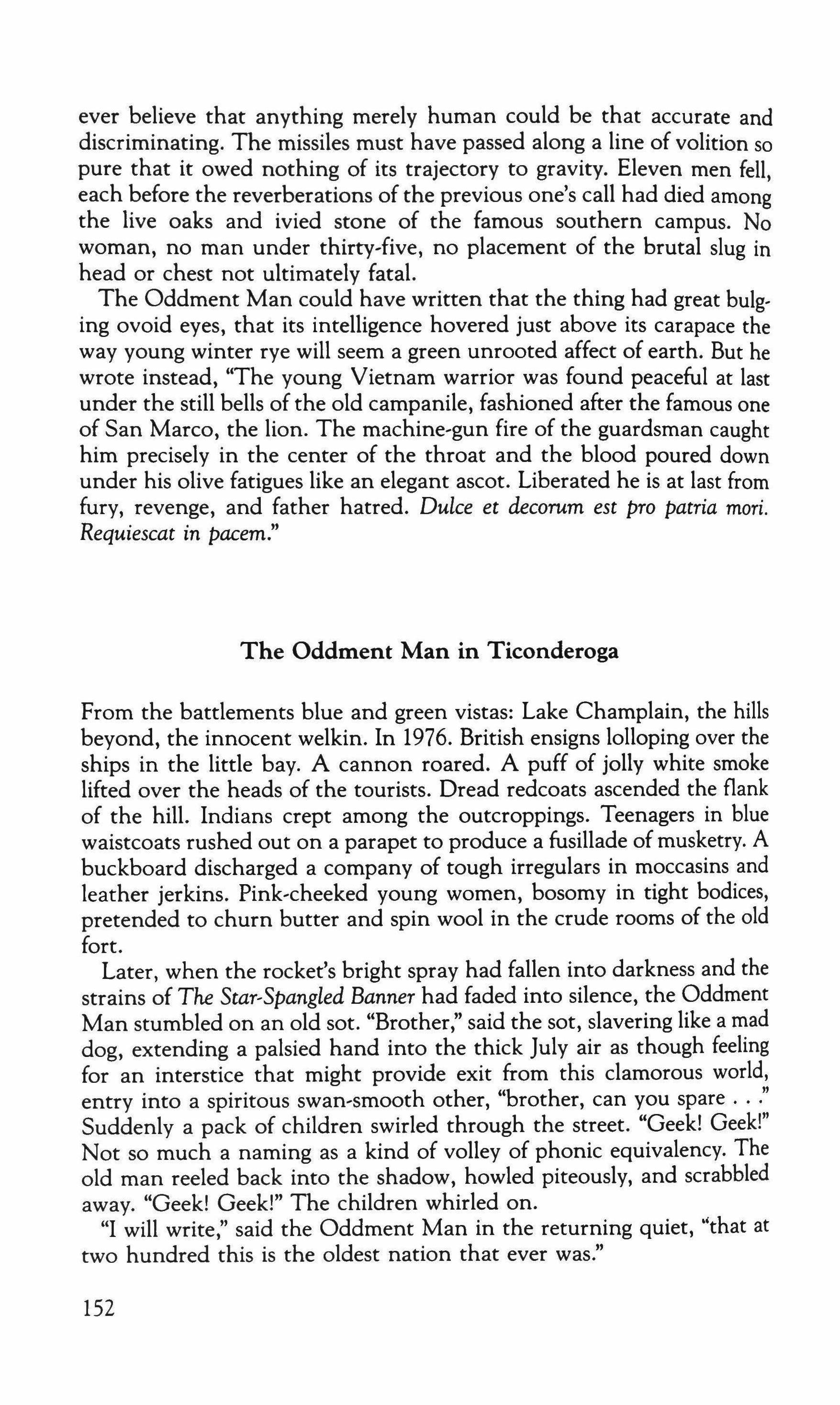
ever believe that anything merely human could be that accurate and discriminating. The missiles must have passed along a line of volition so pure that it owed nothing of its trajectory to gravity. Eleven men fell, each before the reverberations of the previous one's call had died among the live oaks and ivied stone of the famous southern campus. No woman, no man under thirty-five, no placement of the brutal slug in head or chest not ultimately fatal.
The Oddment Man could have written that the thing had great bulging ovoid eyes, that its intelligence hovered just above its carapace the way young winter rye will seem a green unrooted affect of earth. But he wrote instead, "The young Vietnam warrior was found peaceful at last under the still bells of the old campanile, fashioned after the famous one of San Marco, the lion. The machine-gun fire of the guardsman caught him precisely in the center of the throat and the blood poured down under his olive fatigues like an elegant ascot. Liberated he is at last from fury, revenge, and father hatred. Dulce et decorum est pro patria mon, Requiescat in pacem."
The Oddment Man in Ticonderoga
From the battlements blue and green vistas: Lake Champlain, the hills beyond, the innocent welkin. In 1976. British ensigns lolloping over the ships in the little bay. A cannon roared. A puff of jolly white smoke lifted over the heads of the tourists. Dread redcoats ascended the flank of the hill. Indians crept among the outcroppings. Teenagers in blue waistcoats rushed out on a parapet to produce a fusillade of musketry. A buckboard discharged a company of tough irregulars in moccasins and leather jerkins. Pink-cheeked young women, bosomy in tight bodices, pretended to churn butter and spin wool in the crude rooms of the old fort.
Later, when the rocket's bright spray had fallen into darkness and the strains of The Star-Spangled Banner had faded into silence, the Oddment Man stumbled on an old sot. "Brother," said the sot, slavering like a mad dog, extending a palsied hand into the thick July air as though feeling for an interstice that might provide exit from this clamorous world, entry into a spiritous swan-smooth other, "brother, can you spare Suddenly a pack of children swirled through the street. "Geek! Geek!" Not so much a naming as a kind of volley of phonic equivalency. The old man reeled back into the shadow, howled piteously, and scrabbled away. "Geek! Geek!" The children whirled on.
"I will write," said the Oddment Man in the returning quiet, "that at two hundred this is the oldest nation that ever was."
152
The Oddment Man in Retirement
Interviewer: It's often been said, sir, that you had one of the surest knacks of all time for locating the truly significant in out-of-the way places. What wouldn't the rest of us journalists give for your nose. How do you explain it, sir?
Oddment Man: I grew up in the country. I watched the animals. Before anything changed, animals knew it.
Interviewer: In the citation, sir, it says, though, that you dilated your earlier observations of animals to include mankind.
Oddment Man: That's what I just said. And not only the beast as prophet, but the beast as cipher and interloper. Do you take my meaning?
Interviewer: I'm not sure that I do, sir. Can
Oddment Man: Then let me give you a tip.
Interviewer: I will be very grateful, sir.
Oddment Man: Go to Mesa Bella, California and ask any friendly citizen if he can help you get a look at the cabbit.
Interviewer: Cabbit?
Oddment Man: A quadruped with large springy back legs, the rest cat except that it doesn't meow and eats carrots and let-
Interviewer:
Oddment Man:
Interviewer: tuce.
Amazing, sir. A genuine mutant.
Be sure to write down the scene as well- how the hot July wind flows across the valley like a rampaging river eroding the top soil, how the little girl weeps when anybody else holds her pet, how the limbs of laden orange trees are propped up with notched twoby-sixes, how the big-bellied clouds hang over the rim of the hills but never sail across the valley, and all else of significance.
I am eternally grateful, sir. I will write down the cabbit and its scene, the change of orders. The lion will lie down with the lamb.

Oddment Man:
Go.
153
Hippopotall10S
Meredith Steinbach
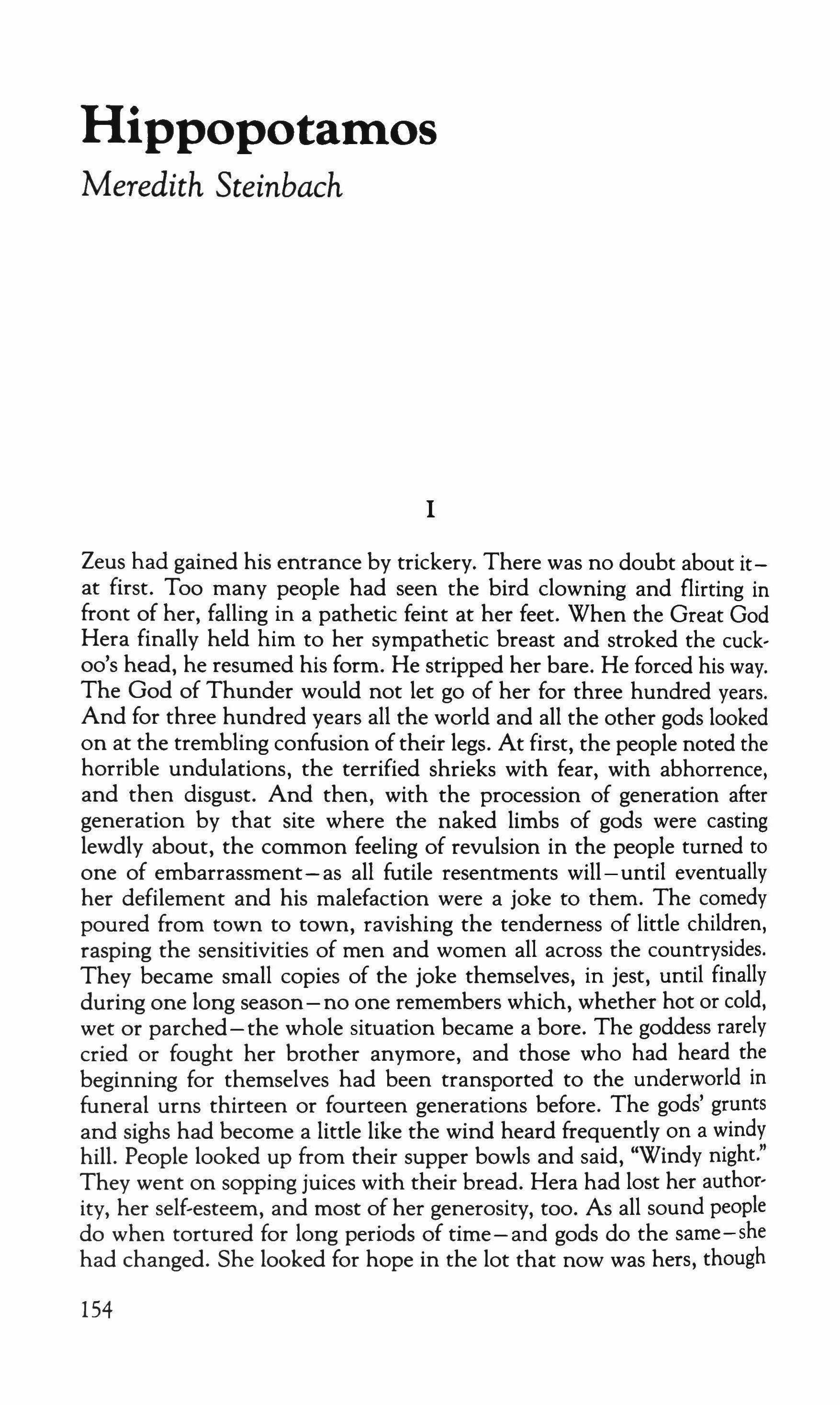
IZeus had gained his entrance by trickery. There was no doubt about itat first. Too many people had seen the bird clowning and flirting in front of her, falling in a pathetic feint at her feet. When the Great God Hera finally held him to her sympathetic breast and stroked the cuckoo's head, he resumed his form. He stripped her bare. He forced his way. The God of Thunder would not let go of her for three hundred years. And for three hundred years all the world and all the other gods looked on at the trembling confusion of their legs. At first, the people noted the horrible undulations, the terrified shrieks with fear, with abhorrence, and then disgust. And then, with the procession of generation after generation by that site where the naked limbs of gods were casting lewdly about, the common feeling of revulsion in the people turned to one of embarrassment - as all futile resentments will-until eventually her defilement and his malefaction were a joke to them. The comedy poured from town to town, ravishing the tenderness of little children, rasping the sensitivities of men and women all across the countrysides. They became small copies of the joke themselves, in jest, until finally during one long season - no one remembers which, whether hot or cold, wet or parched - the whole situation became a bore. The goddess rarely cried or fought her brother anymore, and those who had heard the beginning for themselves had been transported to the underworld in funeral urns thirteen or fourteen generations before. The gods' grunts and sighs had become a little like the wind heard frequently on a windy hill. People looked up from their supper bowls and said, "Windy night." They went on sopping juices with their bread. Hera had lost her authority, her self-esteem, and most of her generosity, too. As all sound people do when tortured for long periods of time-and gods do the same-she had changed. She looked for hope in the lot that now was hers, though
154
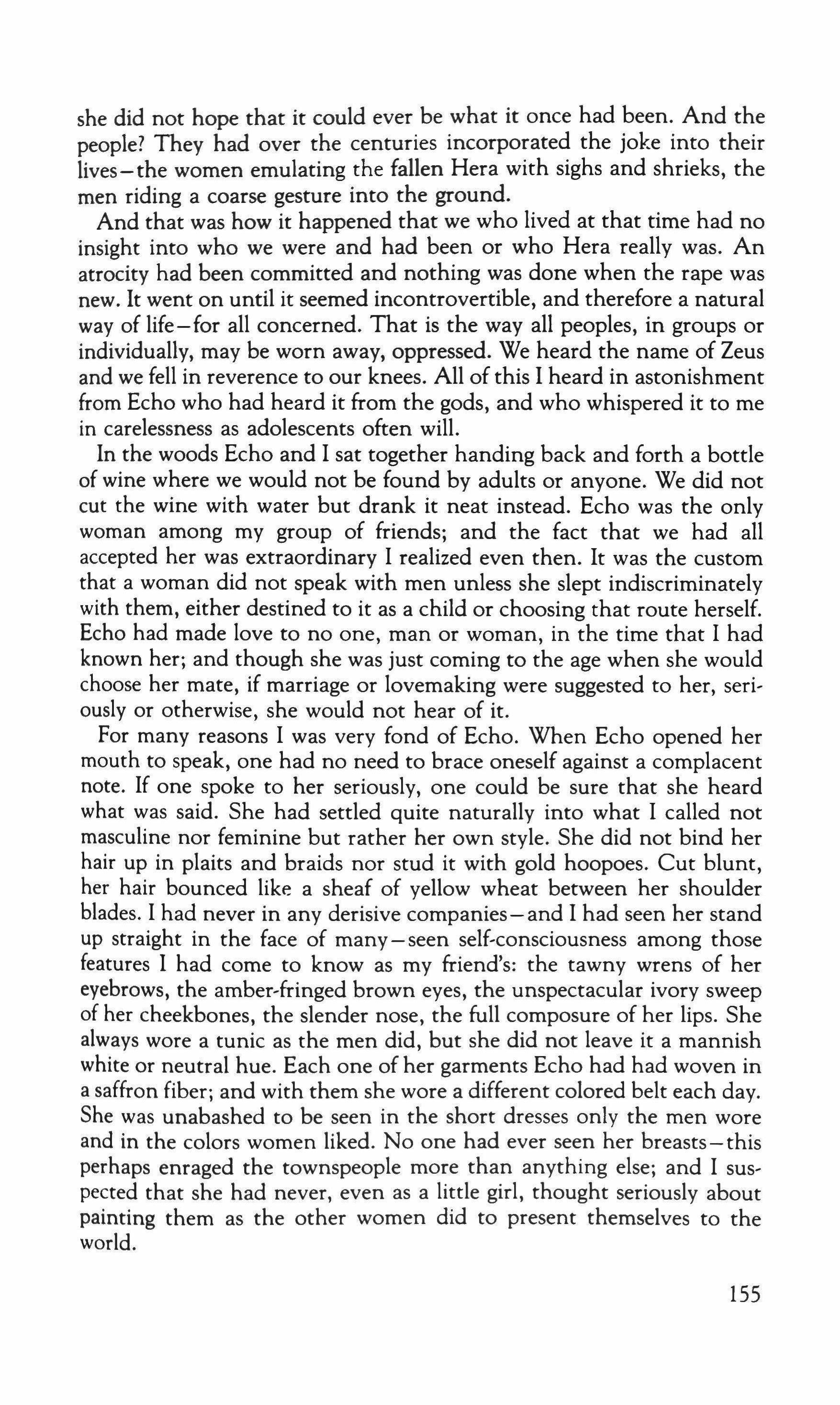
she did not hope that it could ever be what it once had been. And the people? They had over the centuries incorporated the joke into their lives-the women emulating the fallen Hera with sighs and shrieks, the men riding a coarse gesture into the ground.
And that was how it happened that we who lived at that time had no insight into who we were and had been or who Hera really was. An atrocity had been committed and nothing was done when the rape was new. It went on until it seemed incontrovertible, and therefore a natural way of life-for all concerned. That is the way all peoples, in groups or individually, may be worn away, oppressed. We heard the name of Zeus and we fell in reverence to our knees. All of this I heard in astonishment from Echo who had heard it from the gods, and who whispered it to me in carelessness as adolescents often will.
In the woods Echo and I sat together handing back and forth a bottle of wine where we would not be found by adults or anyone. We did not cut the wine with water but drank it neat instead. Echo was the only woman among my group of friends; and the fact that we had all accepted her was extraordinary I realized even then. It was the custom that a woman did not speak with men unless she slept indiscriminately with them, either destined to it as a child or choosing that route herself. Echo had made love to no one, man or woman, in the time that I had known her; and though she was just coming to the age when she would choose her mate, if marriage or lovemaking were suggested to her, seriously or otherwise, she would not hear of it.
For many reasons I was very fond of Echo. When Echo opened her mouth to speak, one had no need to brace oneself against a complacent note. If one spoke to her seriously, one could be sure that she heard what was said. She had settled quite naturally into what I called not masculine nor feminine but rather her own style. She did not bind her hair up in plaits and braids nor stud it with gold hoopoes. Cut blunt, her hair bounced like a sheaf of yellow wheat between her shoulder blades. I had never in any derisive companies-and I had seen her stand up straight in the face of many - seen self-consciousness among those features I had come to know as my friend's: the tawny wrens of her eyebrows, the amber-fringed brown eyes, the unspectacular ivory sweep of her cheekbones, the slender nose, the full composure of her lips. She always wore a tunic as the men did, but she did not leave it a mannish white or neutral hue. Each one of her garments Echo had had woven in a saffron fiber; and with them she wore a different colored belt each day. She was unabashed to be seen in the short dresses only the men wore and in the colors women liked. No one had ever seen her breasts-this perhaps enraged the townspeople more than anything else; and I suspeeted that she had never, even as a little girl, thought seriously about painting them as the other women did to present themselves to the world.
ISS
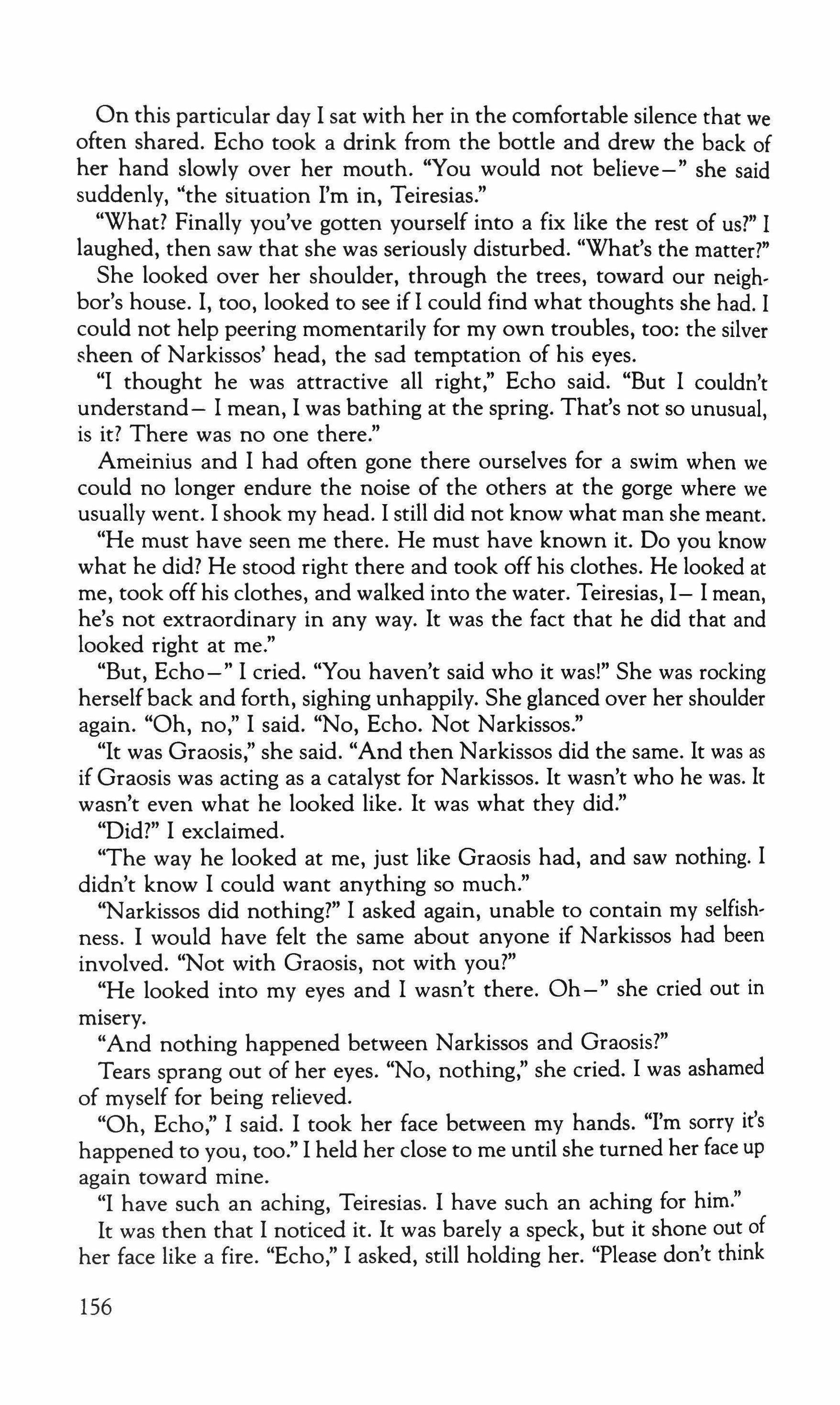
On this particular day I sat with her in the comfortable silence that we often shared. Echo took a drink from the bottle and drew the back of her hand slowly over her mouth. "You would not believe-" she said suddenly, "the situation I'm in, Teiresias."
"What? Finally you've gotten yourself into a fix like the rest of us?" I laughed, then saw that she was seriously disturbed. "What's the matter?"
She looked over her shoulder, through the trees, toward our neigh. bor's house. I, too, looked to see if I could find what thoughts she had. I could not help peering momentarily for my own troubles, too: the silver sheen of Narkissos' head, the sad temptation of his eyes.
"I thought he was attractive all right," Echo said. "But I couldn't understand - I mean, I was bathing at the spring. That's not so unusual, is it? There was no one there."
Ameinius and I had often gone there ourselves for a swim when we could no longer endure the noise of the others at the gorge where we usually went. I shook my head. I still did not know what man she meant.
"He must have seen me there. He must have known it. Do you know what he did? He stood right there and took off his clothes. He looked at me, took off his clothes, and walked into the water. Teiresias, 1- I mean, he's not extraordinary in any way. It was the fact that he did that and looked right at me."
"But, Echo-" I cried. "You haven't said who it was!" She was rocking herselfback and forth, sighing unhappily. She glanced over her shoulder again. "Oh, no," I said. "No, Echo. Not Narkissos."
"It was Graosis," she said. "And then Narkissos did the same. It was as if Graosis was acting as a catalyst for Narkissos. It wasn't who he was. It wasn't even what he looked like. It was what they did."
"Did?" I exclaimed.
"The way he looked at me, just like Graosis had, and saw nothing. I didn't know I could want anything so much."
"Narkissos did nothing?" I asked again, unable to contain my selfishness. I would have felt the same about anyone if Narkissos had been involved. "Not with Graosis, not with you?"
"He looked into my eyes and I wasn't there. Oh -" she cried out in misery.
"And nothing happened between Narkissos and Graosis?"
Tears sprang out of her eyes. "No, nothing," she cried. I was ashamed of myself for being relieved.
"Oh, Echo," I said. I took her face between my hands. "I'm sorry it's happened to you, too." I held her close to me until she turned her face up again toward mine.
"I have such an aching, Teiresias. I have such an aching for him."
It was then that I noticed it. It was barely a speck, but it shone out of her face like a fire. "Echo," I asked, still holding her. "Please don't think
156

I'm trying to avoid talking about him. Please don't think that of me. But your lip, Echo?"
Echo jerked away then and her hands flew to her mouth. She pressed her upper lip with her palms.
"It looks like a polished stone, Echo, embedded in your lip. What can it be?"
She took her hands away; she ran them through her hair. Her head went down. "I've had it ever since Hera. Hera gave it to me."
"Hera!" I cried.
"Of course," she said bitterly. Her hair fell forward. "You didn't think I'd get myself into a simple situation, did you?" She threw her head back against the tree.
I leaned back, too. Hera was known to us only for her rage, her unpredictable rage.
"It was glorious," she said, but her terror had twisted any enthusiasm she might have once felt out of her voice. "Take a good look." Her arms went up over her head; the stone shone in her face. "Tomorrow I'll probably be a piece of stinkweed growing beside your pond if Hera - Or if Zeus- Or I'll become one just from waiting for what I can't ever have. He looked right at me, Teiresias, and dropped his clothes. He didn't even care about Graosis. And he cared about me even less. One by one, he dropped his clothes right on top of my feet. Oh-" She bit her lip.
Hera, Echo told me then, had been doing an unheard of thing. She had been growing plants in pots on Mount Kithairon, and that was where Echo had come upon her. In clumps of soil in a thousand of Emporous' unfired porridge bowls, she had been burying seeds. She had taken ten grains from each of a hundred types and declared a top and bottom to each one. Five of each kind were covered with their more pointed ends up in the bowls, five with them down. I listened incredulously. "And on the side of the bowl," Echo exclaimed, "she scratches a picture of each plant. You can tell exactly which plant she means! You can see the flower and the fruit! I felt like I could almost have picked it off the side and put it in my mouth," she said. "And that's not all," she went on. "Beside those, she carves spears with the tip up or down to match the direction of the seed in each bowl. She's the most beautiful woman I've ever seen."
"But Echo -" I said. "You mean she's confining seeds to porridge bowls rather than surrendering them to the ground! She's putting their spirits in pots! For no productive purpose at all?! She's the earth god, Echo! And she's taken the language of scribes?"
"It's not to please herself]" Echo cried. "It's to learn. To prove that he is no more a god than she is. God of Thunder and Rain!" she laughed. "Hera has carried every sprinkling of water for her plants from Athena's spring herself."
No one had ever watered plants themselves as far as I knew. Everyone
157
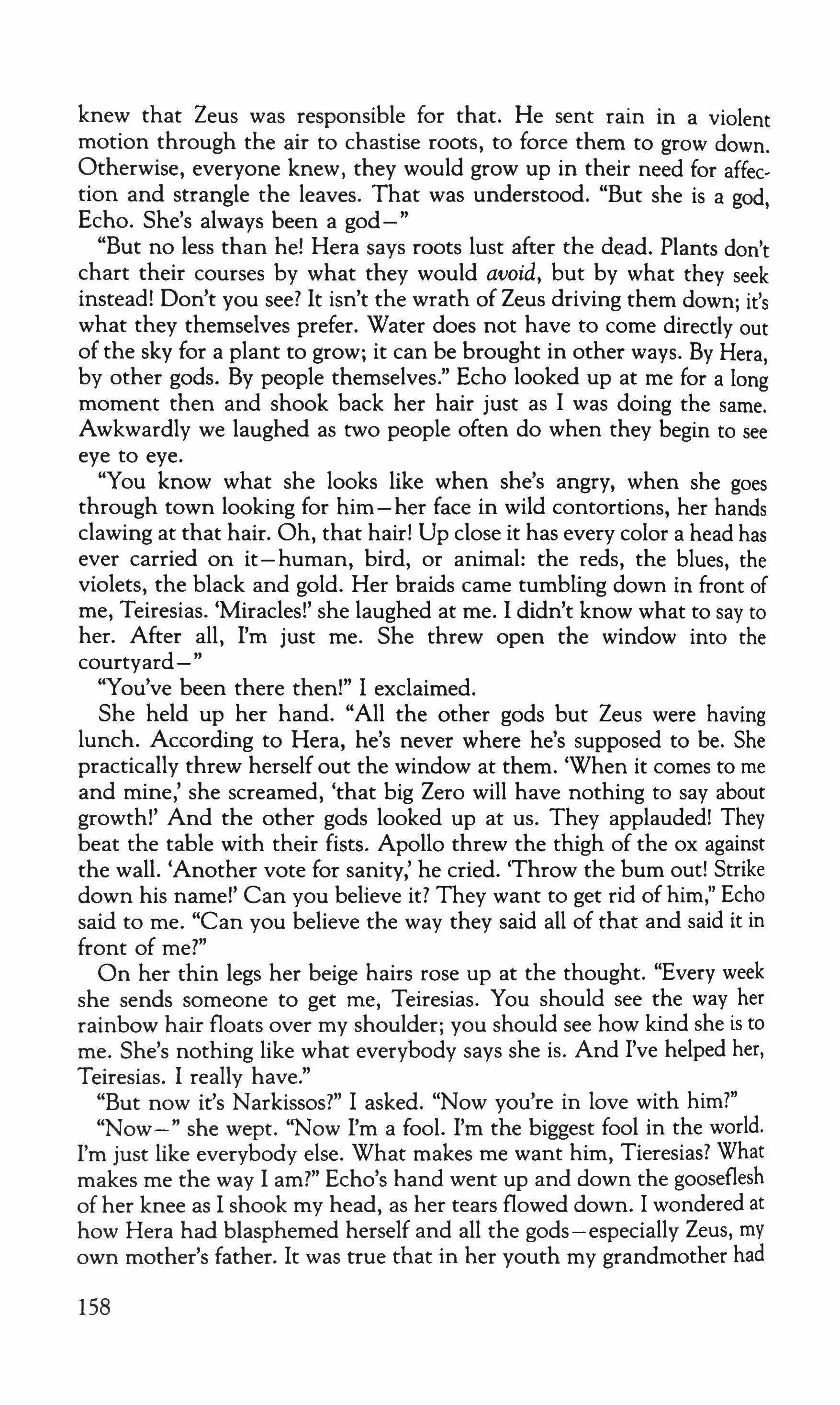
knew that Zeus was responsible for that. He sent rain in a violent motion through the air to chastise roots, to force them to grow down. Otherwise, everyone knew, they would grow up in their need for affection and strangle the leaves. That was understood. "But she is a god, Echo. She's always been a god -"
"But no less than he! Hera says roots lust after the dead. Plants don't chart their courses by what they would avoid, but by what they seek instead! Don't you see? It isn't the wrath of Zeus driving them down; it's what they themselves prefer. Water does not have to come directly out of the sky for a plant to grow; it can be brought in other ways. By Hera, by other gods. By people themselves." Echo looked up at me for a long moment then and shook back her hair just as I was doing the same. Awkwardly we laughed as two people often do when they begin to see eye to eye.
"You know what she looks like when she's angry, when she goes through town looking for him - her face in wild contortions, her hands clawing at that hair. Oh, that hair! Up close it has every color a head has ever carried on it - human, bird, or animal: the reds, the blues, the violets, the black and gold. Her braids came tumbling down in front of me, Teiresias. 'Miracles!' she laughed at me. I didn't know what to say to her. After all, I'm just me. She threw open the window into the courtyard -"
"You've been there then!" I exclaimed. She held up her hand. "All the other gods but Zeus were having lunch. According to Hera, he's never where he's supposed to be. She practically threw herself out the window at them. 'When it comes to me and mine,' she screamed, 'that big Zero will have nothing to say about growth!' And the other gods looked up at us. They applauded! They beat the table with their fists. Apollo threw the thigh of the ox against the wall. 'Another vote for sanity,' he cried. 'Throw the bum out! Strike down his name!' Can you believe it? They want to get rid of him," Echo said to me. "Can you believe the way they said all of that and said it in front of me?"
On her thin legs her beige hairs rose up at the thought. "Every week she sends someone to get me, Teiresias. You should see the way her rainbow hair floats over my shoulder; you should see how kind she is to me. She's nothing like what everybody says she is. And I've helped her, Teiresias. I really have."
"But now it's Narkissos?" I asked. "Now you're in love with him?" "Now-" she wept. "Now I'm a fool. I'm the biggest fool in the world. I'm just like everybody else. What makes me want him, Tieresias? What makes me the way I am?" Echo's hand went up and down the gooseflesh of her knee as I shook my head, as her tears flowed down. I wondered at how Hera had blasphemed herself and all the gods-especially Zeus, my own mother's father. It was true that in her youth my grandmother had
158
been poking with a stick at a bundle of laundry on a rock, leaning over, when she felt a raindrop strike her back. She had felt it grow large and cumbersome, the arms wrapping around her waist as a great gust ofwind blew her skirts up over her head. It was then, she had said, that she felt the penetrating moisture ofrain between her legs. Perhaps it hadn't been the rain at all, I thought. Perhaps nothing was as we thought it to be. Here was Emporous sending pots, which I had helped to make, to Kithairon when I thought they were meant for Troy. I leaned back and took up the wine: I offered it to Echo. Hairs grew only in an upward direction as far as I knew. I wondered if somewhere beneath Echo's skin and my own hairs, too, there might be rows of tiny seeds planted in every which way and beneath them millions of determined fibers that slowly dug their way toward the underworld they desired.
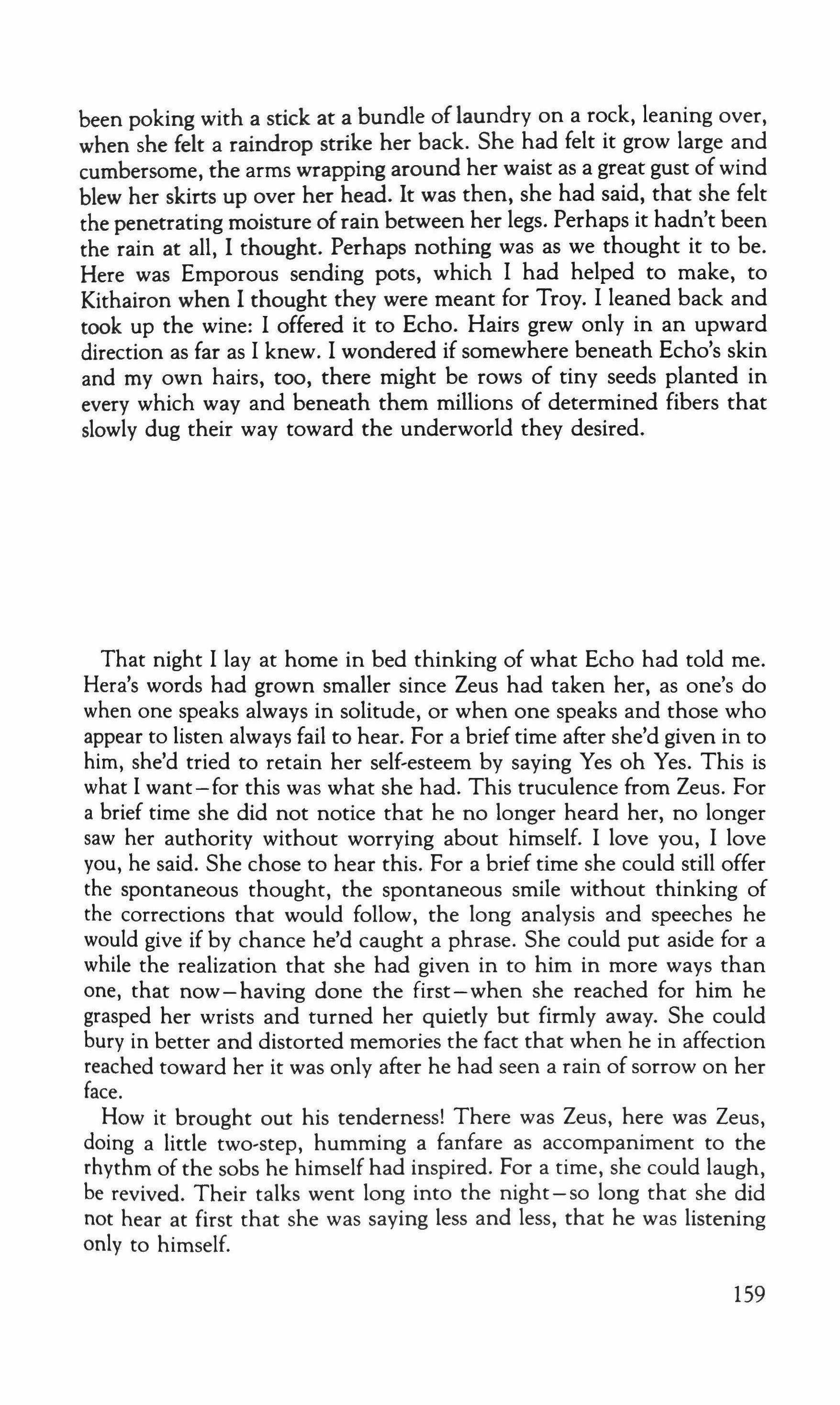
That night I lay at home in bed thinking of what Echo had told me. Hera's words had grown smaller since Zeus had taken her, as one's do when one speaks always in solitude, or when one speaks and those who appear to listen always fail to hear. For a brief time after she'd given in to him, she'd tried to retain her self-esteem by saying Yes oh Yes. This is what I want-for this was what she had. This truculence from Zeus. For a brief time she did not notice that he no longer heard her, no longer saw her authority without worrying about himself. I love you, I love you, he said. She chose to hear this. For a brief time she could still offer the spontaneous thought, the spontaneous smile without thinking of the corrections that would follow, the long analysis and speeches he would give if by chance he'd caught a phrase. She could put aside for a while the realization that she had given in to him in more ways than one, that now-having done the first-when she reached for him he grasped her wrists and turned her quietly but firmly away. She could bury in better and distorted memories the fact that when he in affection reached toward her it was only after he had seen a rain of sorrow on her face.
How it brought out his tenderness! There was Zeus, here was Zeus, doing a little two-step, humming a fanfare as accompaniment to the rhythm of the sobs he himself had inspired. For a time, she could laugh, be revived. Their talks went long into the night - so long that she did not hear at first that she was saying less and less, that he was listening only to himself.
159
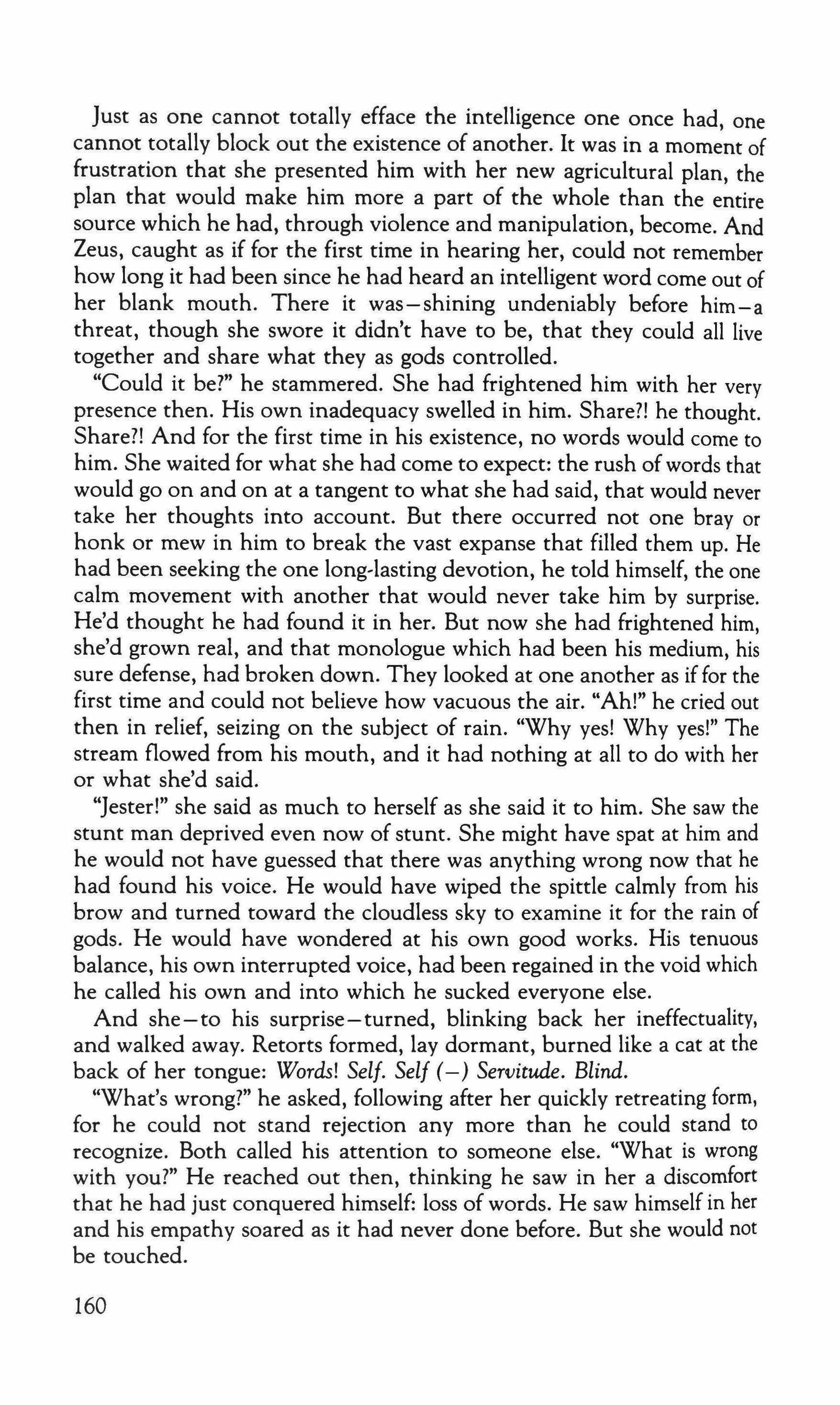
Just as one cannot totally efface the intelligence one once had, one cannot totally block out the existence of another. It was in a moment of frustration that she presented him with her new agricultural plan, the plan that would make him more a part of the whole than the entire source which he had, through violence and manipulation, become. And Zeus, caught as if for the first time in hearing her, could not remember how long it had been since he had heard an intelligent word come out of her blank mouth. There it was-shining undeniably before him-a threat, though she swore it didn't have to be, that they could all live together and share what they as gods controlled.
"Could it be?" he stammered. She had frightened him with her very presence then. His own inadequacy swelled in him. Share?! he thought. Share?! And for the first time in his existence, no words would come to him. She waited for what she had come to expect: the rush ofwords that would go on and on at a tangent to what she had said, that would never take her thoughts into account. But there occurred not one bray or honk or mew in him to break the vast expanse that filled them up. He had been seeking the one long-lasting devotion, he told himself, the one calm movement with another that would never take him by surprise. He'd thought he had found it in her. But now she had frightened him, she'd grown real, and that monologue which had been his medium, his sure defense, had broken down. They looked at one another as iffor the first time and could not believe how vacuous the air. "Ah!" he cried out then in relief, seizing on the subject of rain. "Why yes! Why yes!" The stream flowed from his mouth, and it had nothing at all to do with her or what she'd said.
"Jester!" she said as much to herself as she said it to him. She saw the stunt man deprived even now of stunt. She might have spat at him and he would not have guessed that there was anything wrong now that he had found his voice. He would have wiped the spittle calmly from his brow and turned toward the cloudless sky to examine it for the rain of gods. He would have wondered at his own good works. His tenuous balance, his own interrupted voice, had been regained in the void which he called his own and into which he sucked everyone else.
And she-to his surprise-turned, blinking back her ineffectuality, and walked away. Retorts formed, lay dormant, burned like a cat at the back of her tongue: Words! Self. Self (-) Servitude. Blind.
"What's wrong?" he asked, following after her quickly retreating form, for he could not stand rejection any more than he could stand to recognize. Both called his attention to someone else. "What is wrong with you?" He reached out then, thinking he saw in her a discomfort that he had just conquered himself: loss of words. He saw himself in her and his empathy soared as it had never done before. But she would not be touched.
160
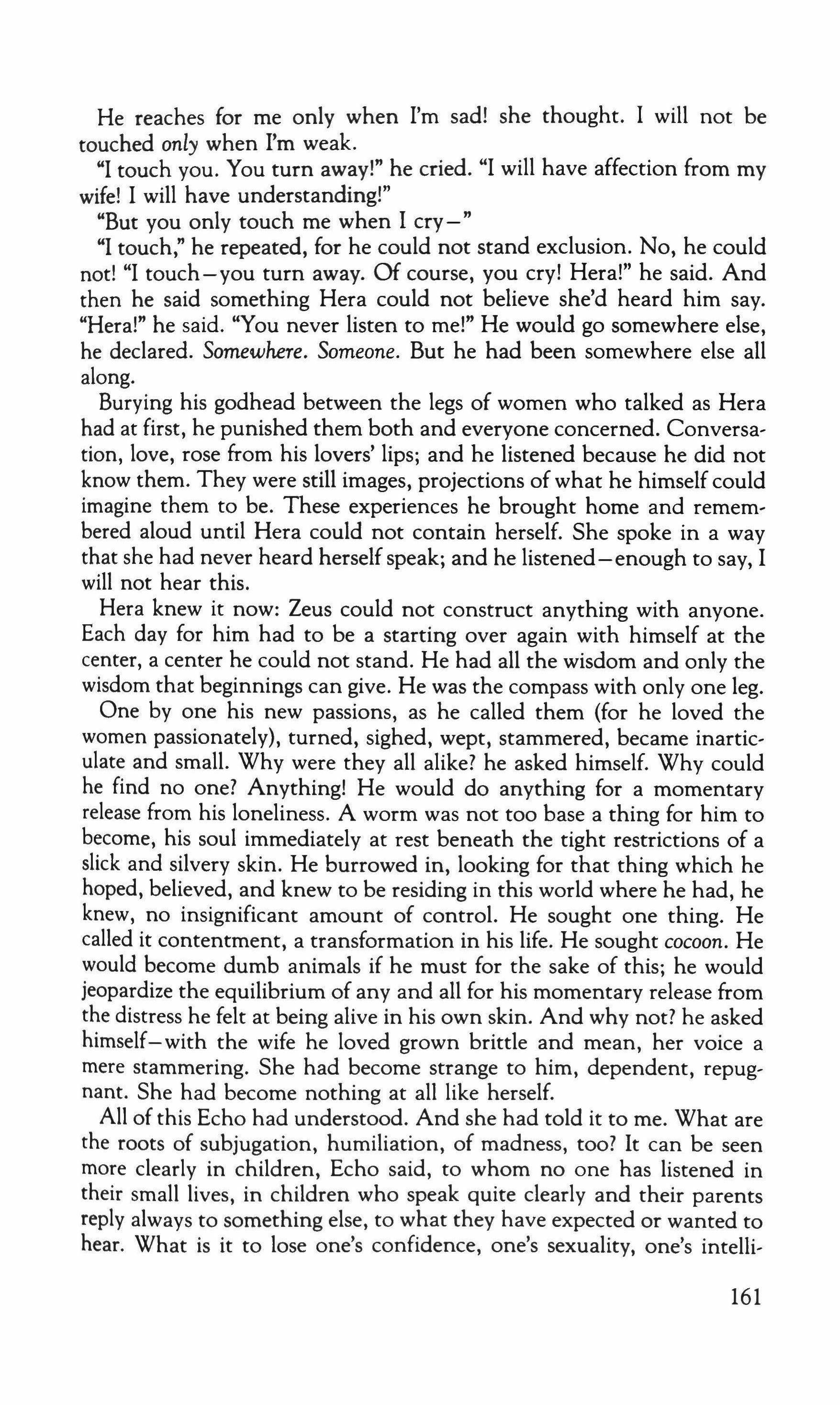
He reaches for me only when I'm sad! she thought. I will not be touched only when I'm weak.
"I touch you. You turn away!" he cried. "I will have affection from my wife! I will have understanding!"
"But you only touch me when I cry-" "I touch," he repeated, for he could not stand exclusion. No, he could not! "I touch-you turn away. Of course, you cry! Hera!" he said. And then he said something Hera could not believe she'd heard him say. "Hera!" he said. "You never listen to me!" He would go somewhere else, he declared. Somewhere. Someone. But he had been somewhere else all along.
Burying his godhead between the legs of women who talked as Hera had at first, he punished them both and everyone concerned. Conversa, tion, love, rose from his lovers' lips; and he listened because he did not know them. They were still images, projections of what he himself could imagine them to be. These experiences he brought home and rernembered aloud until Hera could not contain herself. She spoke in a way that she had never heard herself speak; and he listened-enough to say, I will not hear this.
Hera knew it now: Zeus could not construct anything with anyone. Each day for him had to be a starting over again with himself at the center, a center he could not stand. He had all the wisdom and only the wisdom that beginnings can give. He was the compass with only one leg. One by one his new passions, as he called them (for he loved the women passionately), turned, sighed, wept, stammered, became inarticulate and small. Why were they all alike? he asked himself. Why could he find no one? Anything! He would do anything for a momentary release from his loneliness. A worm was not too base a thing for him to become, his soul immediately at rest beneath the tight restrictions of a slick and silvery skin. He burrowed in, looking for that thing which he hoped, believed, and knew to be residing in this world where he had, he knew, no insignificant amount of control. He sought one thing. He called it contentment, a transformation in his life. He sought cocoon. He would become dumb animals if he must for the sake of this; he would jeopardize the equilibrium of any and all for his momentary release from the distress he felt at being alive in his own skin. And why not? he asked himself-with the wife he loved grown brittle and mean, her voice a mere stammering. She had become strange to him, dependent, repugnant. She had become nothing at all like herself.
All of this Echo had understood. And she had told it to me. What are the roots of subjugation, humiliation, of madness, too? It can be seen more clearly in children, Echo said, to whom no one has listened in their small lives, in children who speak quite clearly and their parents reply always to something else, to what they have expected or wanted to hear. What is it to lose one's confidence, one's sexuality, one's intelli-
161
gence, one's voice and power to act independently? What is it for a mortal, for a god? It is much the same. Once, the goddess said to herself-for when the present is bad, always the past seems good-there had been a better moment that had seemed three hundred years. There must have been. Once there was a flood of recognition between two souls. Where had his dark eyes gone, the eyes that followed her everywhere and sent his gaze deep into and through her own bright, comprehending pupils into the frightened swallowing at the back of her throat? Even that degradation now seemed better to her than what she was now. Here was Zeus doing a little two-step in the compensation of her memory; there he was humming fanfare and accompaniment to her tears. Now she cried alone.
Why did she not leave him? she asked herself, as frequently as others asked it. I will leave him now, she said to herself. Now I will leave and then he will be gone and who will hum a fanfare to my tears? Who will build his ragged life around my bones? She could not move in any direction without faulting herself. Surely there was something she might have done, might still do. She clung to the hope of it for that was all she had and she could not bear to give that up, too. I have grown ugly, she said. Ugly and stupid, she said, not seeing the others as they gazed up, in full knowledge of her, from their conferences in the courtyard. How does one who is not oneself leave what one has begun? How does one finish anything? Her rage rose up in her and excoriated all questioning. She would destroy those he turned to, those who came between herself and her hope. She had become not unlike the trickster Zeus.
Yet, there came a relief into Hera's existence for a time. There was Echo who would listen as well as speak, whose voice was clear as a perfect bell in the Olympos air, who could discern and say quietlyDon't you see, Hera, how this all occurred? This is the way of your past. There was a moment here and there when Hera again felt herself to be whole, and that was when she heard the rational, fine-boned, strong voice of intelligence. Echo stroked the hair back from Hera's neglected forehead. She said, You have words worth saying, Hera. Do you know that?
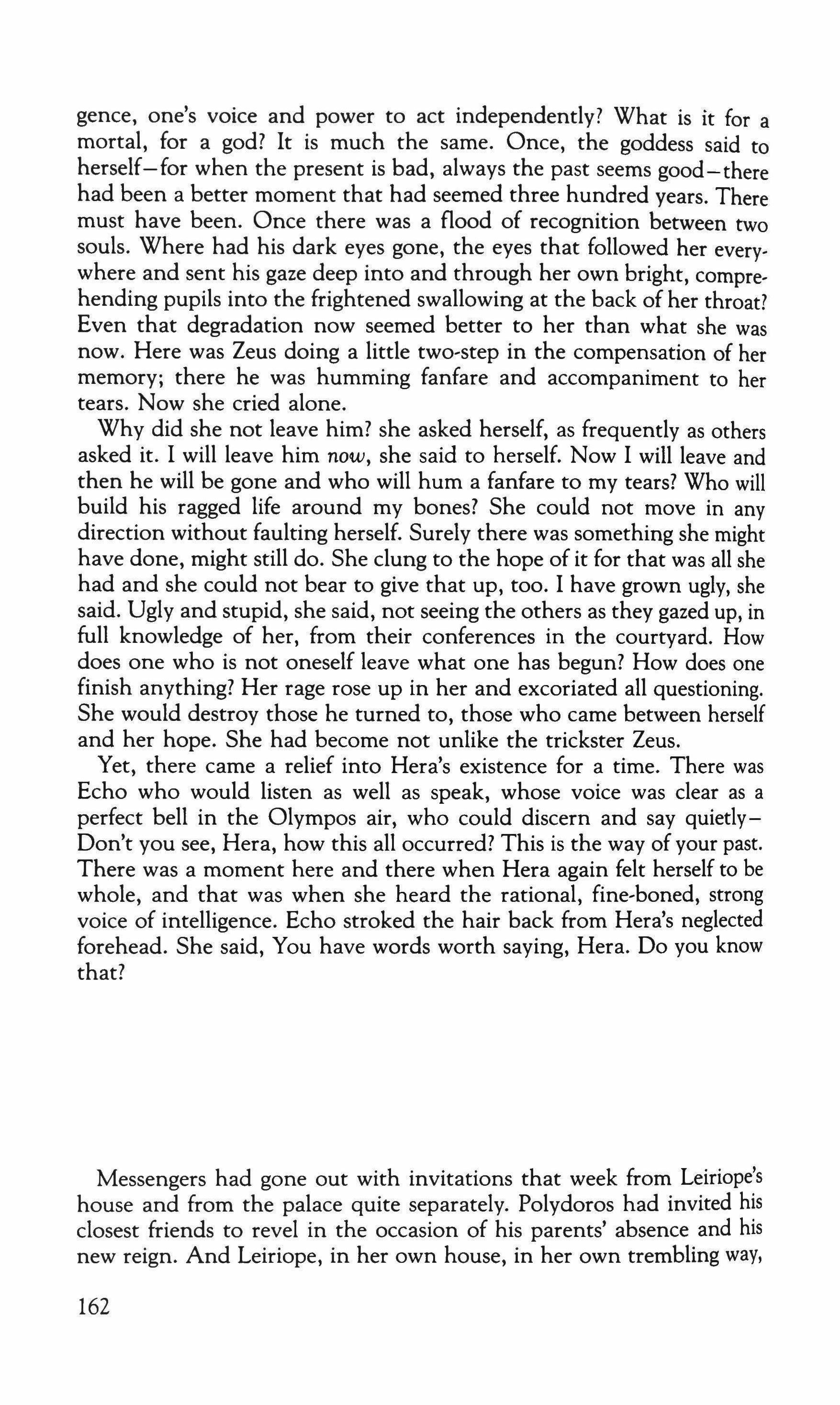
Messengers had gone out with invitations that week from Leiriope's house and from the palace quite separately. Polydoros had invited his closest friends to revel in the occasion of his parents' absence and his new reign. And Leiriope, in her own house, in her own trembling way,
162

had pulled her blue limbs in, steadied herself, and sent out the word. She would hold an event, an evening for Narkissos, to commemorate the sixteenth anniversary of his birth. And what could be done about all this confusion? A birthdate could not be changed; and though Polvdoros was our friend, now he was king, his invitation a decree. There was no one among our friends who did not wish violently to attend them both. Leiriope's banquet was no less tempting than Polydoros' fete for it was thought that on his birthday Narkissos might declare his preference for one of us. People were ready to throw aside the partners they had already chosen in order to be with him. And his behavior had been so peculiar, that any choice had begun to seem possible. He might take a woman or a man his own age just as easily as he might follow the custom ofloving an older man. In the midst of this passion then, it came about. We, who had been invited to both occasions, found ourselves imploring Polvdoros to take pity on the delicate Leiriope as well as on us. Finally it had been decided by our new and excited king. The beloved, despicable Narkissos would have his birthday celebration in the palace, the first such acknowledgement of a commoner that had ever been known to take place. This, which we had all contracted for, now irritated us to no end and made us envious, too.
I prepared myselfthat day as iffor my own wedding feast. Six steaming cauldrons of water were brought to my bath by the maids and then in the greatest solemnity I was bathed, my nails were pared and rubbed with stones, my body oiled and toweled, my hair brushed until it hung a black and shining wave between my shoulder blades. The maids were dismissed and I put on my finest linen tunic and fastened my one gold girdle at my waist. I then took up the small comb to straighten the new hairs sprouting from my chin, looking forward to the moment when they would be ceremoniously shaved, when I would be considered an adult. Two bracelets I had buttoned around each arm: and, as I passed the glass windows along our street, I did not recognize the man who had grown large in them. My shoulders were wider than they had been that morning surely, my arms thicker than I had known. I was as tall as most men in town, though not gigantic as the Mykenaeans were. I had a clear face and my teeth were still good.
There then on the approach to the palace my assurance was suddenly checked. Ameinius was crouched beside the road. "AmeiniusAmeinius-" I said, but I could not think which words of consolation should come next. Around his bent neck, my friend Ameinius had slung the testicles of a wild ass like an immense pouch. At the sight of me, Ameinius sprang up and grabbed my arm. There, too, against his chest, on a silver chain, shivered the skeleton of a chicken; there rattled the stone teeth of horse, mole and hyena; there slithered against his skin the tongue of a dead chameleon.
"See how it beats?" Ameinius gasped, pointing to a serpent's bloody
163

heart. "And that's not all- n He did not go on. I could see that the heart did not beat, that indeed that was not all. A belt passed over one of Ameinius' bare broad shoulders, across his chest, and under the opposite arm; and on it were sewn hundreds of tiny ampules, each, I supposed, another of his amulets. Owl's gizzard, rat's ears and liver, raven's excrement. I could not see beyond the rage that flew up in me. Dog's gall, goat brain, wasp wings, wolf's flesh, fat, head. He wore a loincloth the likes of which had not been seen since Knossos. On the front of the apron he had pinned a braided circle of human hair.
"These are not the old times!" I cried. "We are not country fanatics who go off and shave our heads and spirit away the evil eye! Ameinius!"
"We'll see if he puts his evil eye on me," Ameinius said, looking toward the gate. His eyes were glazed, his voice as flat as a stillborn lake.
To each of us Polvdoros' messenger had recited the final guest list in full so that we might avoid indiscretions in our conversations with those who had not been called. This was the custom, and in each case it had been observed. In all instances, save one, the guest-to-be upon receiving the news stood mute, a pounding dread in the chest as the young man leaned against the outer gate absorbed in recitation as he toed the insignificant dust, as he repeated what he had been taught to say, as he delivered the invitations, the rebukes:
There is to be a banquet. We all know what a banquet is. And who are to be the guests of Polydoros, King?
You, Narkissos, uncut gem, who know one thing and know nothing else.
You, Graosis, like a tough round plum, once called Kadmos' Elbow, now called Polydoros' Thumb.
You, Andros, who have had and mourned six wives and four hetairai in your willowy arms. You who love so thoroughly you hate.
You, Ameinius, who love two men: the man Graosis, who loves Narkissos; the boy, Narkissos, who loves no one.
You, Nesos, whose black hair falls like a curtain to the backs of your sineury knees. You who pull your hair over your sad, pinched face in your own dark cave.
You, Emporous, potter, who hold your youth a treasure though it is said once you claimed the name Marauder. You who never again want to see the treasured sea.
You, Teiresias, the one who know before it is known but will not say.
You, Krino, who are just, accurate, true, who know always the proper action for others to take. You who each moment dream yourself accused.
You, Dykastes, who recite the words ofother men and thus are thought to be a man of great ideas. You alone who can soothe Krino's fears.
You, Xenos, Procurer of Goods, who can acquire anything from any part 0/ the world given half the day and half an hour. You who send the consuming Narkissos the same sack ofgravel each day from your own backyard to prove your own need for love to none other than yourself. You who each day wish to
164
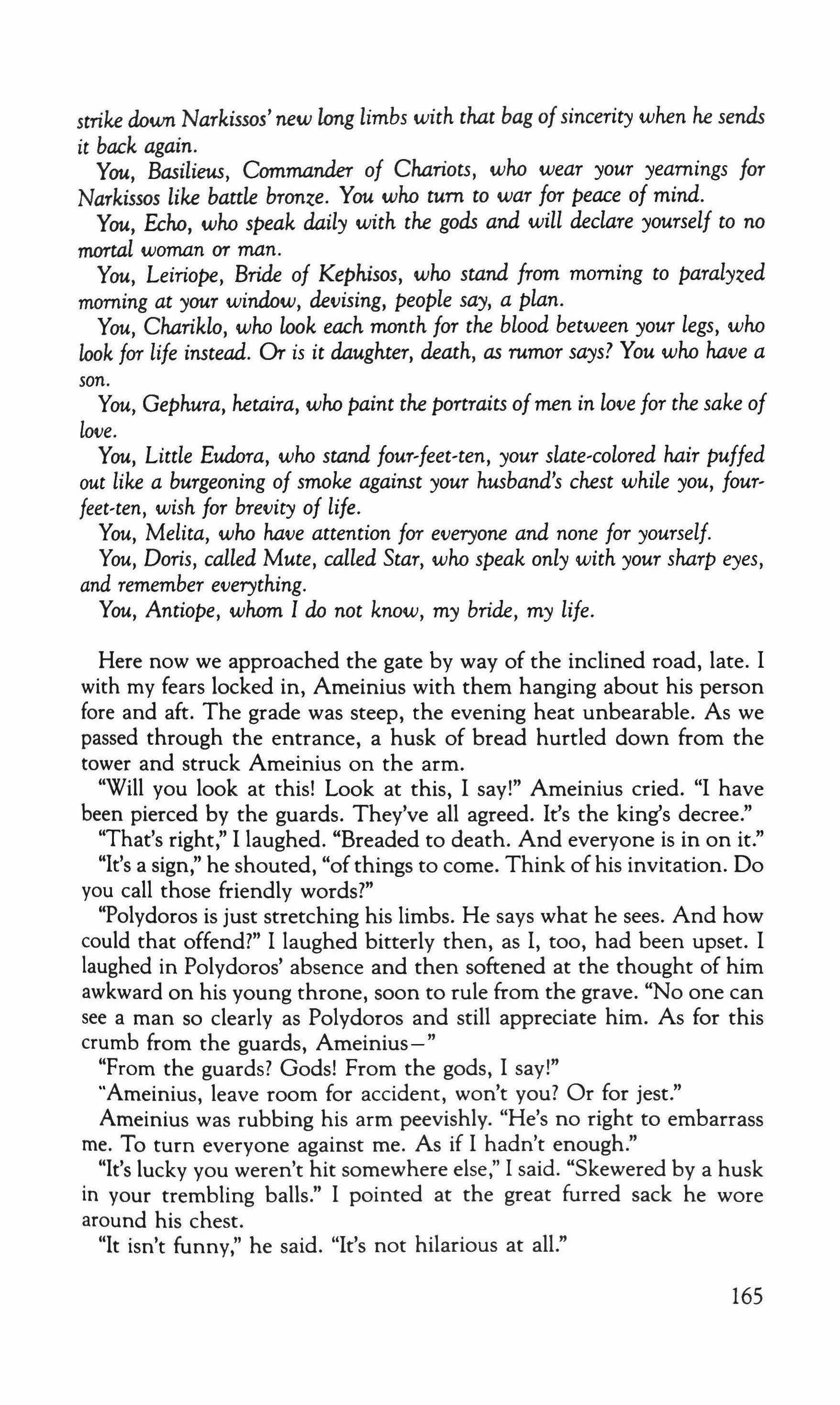
strike down Narkissos' new long limbs with that bag ofsincerity when he sends it back again.
You, Basilieus, Commander of Chariots, who wear your yearnings for Narkissos like battle bronze. You who turn to war for peace of mind.
You, Echo, who speak daily with the gods and will declare yourself to no mortal woman or man.
You, Leiriope, Bride of Kephisos, who stand from morning to paralyzed morning at your window, devising, people say, a plan.
You, Chariklo, who look each month for the blood between your legs, who look for life instead. Or is it daughter, death, as rumor says? You who have a son.
You, Gephura, hetaira, who paint the portraits of men in love for the sake of love.
You, Little Eudora, who stand four-feeHen, your slate-colored hair puffed out like a burgeoning of smoke against your husband's chest while you, fourfeet-ten, wish for brevity of life.
You, Melita, who have attention for everyone and none for yourself.
You, Doris, called Mute, called Star, who speak only with your sharp eyes, and remember everything.
You, Antiope, whom I do not know, my bride, my life.
Here now we approached the gate by way of the inclined road, late. I with my fears locked in, Ameinius with them hanging about his person fore and aft. The grade was steep, the evening heat unbearable. As we passed through the entrance, a husk of bread hurtled down from the tower and struck Ameinius on the arm.
"Will you look at this! Look at this, I say!" Ameinius cried. "I have been pierced by the guards. They've all agreed. It's the kings decree."
"That's right:' I laughed. "Breaded to death. And everyone is in on it."
"It's a sign," he shouted, "of things to come. Think of his invitation. Do you call those friendly words?"
"Polydoros is just stretching his limbs. He says what he sees. And how could that offend?" I laughed bitterly then, as I, too, had been upset. I laughed in Polydoros' absence and then softened at the thought of him awkward on his young throne, soon to rule from the grave. "No one can see a man so clearly as Polvdoros and still appreciate him. As for this crumb from the guards, Ameinius-"
"From the guards? Gods! From the gods, I say!"
"Ameinius, leave room for accident, won't you? Or for jest."
Ameinius was rubbing his arm peevishly. "He's no right to embarrass me. To turn everyone against me. As if I hadn't enough."
"It's lucky you weren't hit somewhere else," I said. "Skewered by a husk in your trembling balls." I pointed at the great furred sack he wore around his chest.
"It isn't funny," he said. "It's not hilarious at all."
165
"Or in your gizzard," I said, poking at his ribs.
"Narkissos will probably choose tonight!"
"Or on your lovely, little, lavender tongue." With my fingernail I flicked the tiny piece of flesh on its chain next to all the rest.
"You want him, too! Emporous or not-you can't deny you want him." It was true. I could not deny it. I wanted to haul the oblivious Narkissos' olive skin up against my own and thrust my tongue down his taunting throat-for good. Forever, I thought, with no reprieve. To Ameinius I said nothing. We had passed the tower, and the two massive doors swung shut behind us. I turned to watch the giants straining to lift the metal crossbar into place. The doors were bolted, tied, and knotted, the cables wound again and again. The two men sank down, their tremendous backs a small but further buttress. If we had been enemy we would never have gotten this far. We would have been assailed on the ascending ramp by spears from the tower, not by bread. We would have been unguarded on that side, our shields in our left hands.
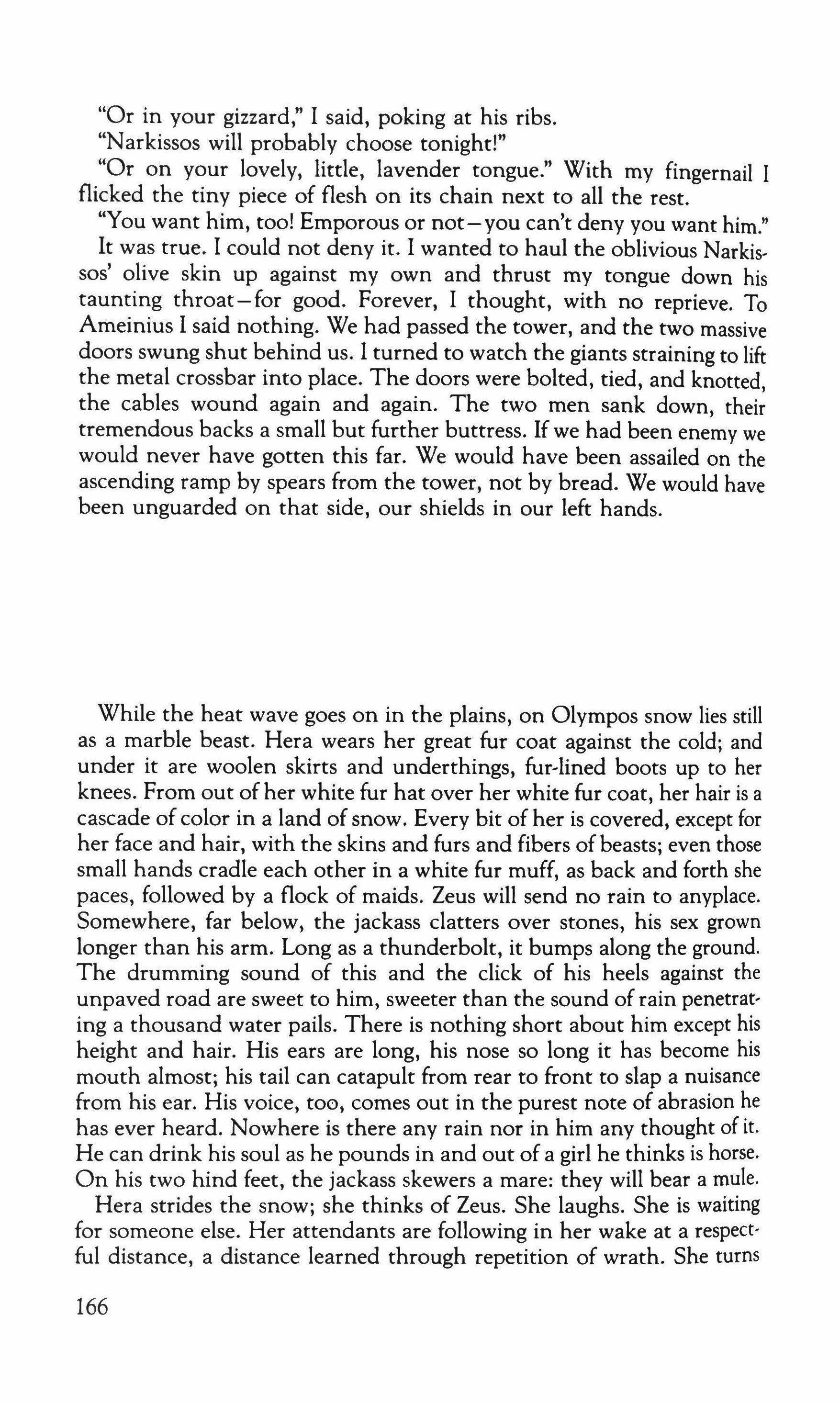
While the heat wave goes on in the plains, on Olympos snow lies still as a marble beast. Hera wears her great fur coat against the cold; and under it are woolen skirts and underthings, fur-lined boots up to her knees. From out of her white fur hat over her white fur coat, her hair is a cascade of color in a land of snow. Every bit of her is covered, except for her face and hair, with the skins and furs and fibers ofbeasts; even those small hands cradle each other in a white fur muff, as back and forth she paces, followed by a flock of maids. Zeus will send no rain to anyplace. Somewhere, far below, the jackass clatters over stones, his sex grown longer than his arm. Long as a thunderbolt, it bumps along the ground. The drumming sound of this and the click of his heels against the unpaved road are sweet to him, sweeter than the sound of rain penetrating a thousand water pails. There is nothing short about him except his height and hair. His ears are long, his nose so long it has become his mouth almost; his tail can catapult from rear to front to slap a nuisance from his ear. His voice, too, comes out in the purest note of abrasion he has ever heard. Nowhere is there any rain nor in him any thought of it. He can drink his soul as he pounds in and out of a girl he thinks is horse. On his two hind feet, the jackass skewers a mare: they will bear a mule. Hera strides the snow; she thinks of Zeus. She laughs. She is waiting for someone else. Her attendants are following in her wake at a respectful distance, a distance learned through repetition of wrath. She turns
166

and smiles at them. They titter nervously. The color has risen in her cheeks. "Oh, come on," she says. "1 won't bite." They titter nervously. "Today 1 won't." They rush toward her-perhaps it is the good old days reborn again, the time when she was kind, the time before they stood helpless as sheep among other sheep and watched him rip each seam. Tomorrow the witty little mortal will come; perhaps that is what makes Hera smile today. Long white coat, white cap of fur, muff, the color in her cheeks that is like no color they have ever seen, even in her prismatic hair.
"Tomorrow the young lady will be here again?" the bravest one offers, asks. The goddess smiles. She looks down the white crags and slopes in the scrub of pines at the tree line, into the tall rise of laden conifers and far below into the oaks and beeches that have gone green in the valley of spring, that wilt for lack of rain. It is through all this that Echo will travel tomorrow to be with her, and at each stage Echo will don more clothes, until beside the fires in each of Hera's rooms she will have no need for most of them.
Tonight Hera will stretch her legs into that glorious emptiness where Zeus in his infidelity is not, will not be, and think of other times: Echo beside her watching quietly the morning light pouring through the even tenor of a life they are making, that they believe in enough to build; Echo with her strong thighs and taut calves on Kithairon, pacing off the rocky ground, stooping to set down firmly the painted stones at the perimeters where the glass house-which Echo in her ingenuity has designed-will hold Hera's plants and protect them from sudden rain; Echo in the courtyard in the company of gods, her elbows on the table, speaking awkwardly at first, and then in confidence, making suggestions about the reconstruction of the world; Echo's arm stretched unflinchingly around her shoulders as Zeus walks through oblivious; the applause of gods.
When the morning stretches its white light through the blue window glass, Hera is up and calling for her bath. Seven attendants are bathing her on the day when Echo will arrive. The long hair is combed, washed, combed again in the array that falls nearly to her feet. The hair is braided then wrapped round and round her head. When the maids are finished with this ritual bath the hair will be brushed out full again to fall in waves. Hot water pours into the pool, the back is sudsed, the small figure-with powers for and against all things but one-is scrubbed as the women lean down over the mosaic tiles. Today Zeus is of no concern to anyone. Hera throws the sponge at the wall and laughs. It sticks there like a cork at the center of the fresco's mouth. Today a small woman with a beige stride and penetrating smile will show Hera again the gem embraced by soft, pink lips. "Get in, get in," Hera calls to her maids. Today Hera will be herself. In that chamber they titter around her, splashing up a name, Echo's name, in repetition of their mistress'
167
voice, in repetition of the wave they send shooting back and forth with their pale, cupped palms.
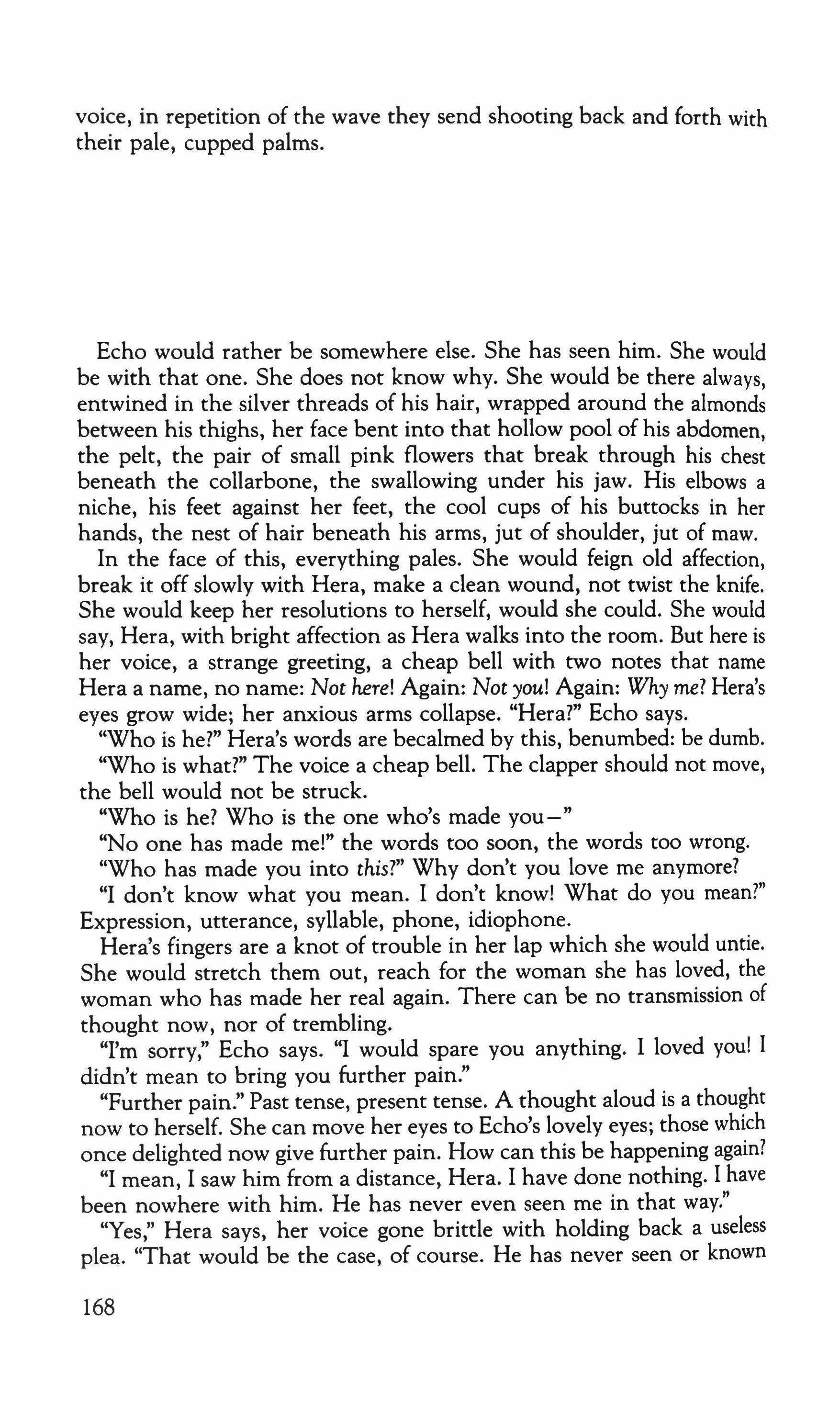
Echo would rather be somewhere else. She has seen him. She would be with that one. She does not know why. She would be there always, entwined in the silver threads of his hair, wrapped around the almonds between his thighs, her face bent into that hollow pool of his abdomen, the pelt, the pair of small pink flowers that break through his chest beneath the collarbone, the swallowing under his jaw. His elbows a niche, his feet against her feet, the cool cups of his buttocks in her hands, the nest of hair beneath his arms, jut of shoulder, jut of maw.
In the face of this, everything pales. She would feign old affection, break it off slowly with Hera, make a clean wound, not twist the knife. She would keep her resolutions to herself, would she could. She would say, Hera, with bright affection as Hera walks into the room. But here is her voice, a strange greeting, a cheap bell with two notes that name Hera a name, no name: Not here! Again: Not you! Again: Why me? Hera's eyes grow wide; her anxious arms collapse. "Hera?" Echo says.
"Who is he?" Hera's words are becalmed by this, benumbed: be dumb.
"Who is what?" The voice a cheap bell. The clapper should not move, the bell would not be struck.
"Who is he? Who is the one who's made you-"
"No one has made me!" the words too soon, the words too wrong.
"Who has made you into this?" Why don't you love me anymore?
"I don't know what you mean. I don't know! What do you mean?"
Expression, utterance, syllable, phone, idiophone.
Hera's fingers are a knot of trouble in her lap which she would untie. She would stretch them out, reach for the woman she has loved, the woman who has made her real again. There can be no transmission of thought now, nor of trembling.
"I'm sorry," Echo says. "I would spare you anything. I loved you! I didn't mean to bring you further pain."
"Further pain." Past tense, present tense. A thought aloud is a thought now to herself. She can move her eyes to Echo's lovely eyes; those which once delighted now give further pain. How can this be happening again?
"I mean, I saw him from a distance, Hera. I have done nothing. I have been nowhere with him. He has never even seen me in that way."
"Yes;' Hera says, her voice gone brittle with holding back a useless plea. "That would be the case, of course. He has never seen or known
168
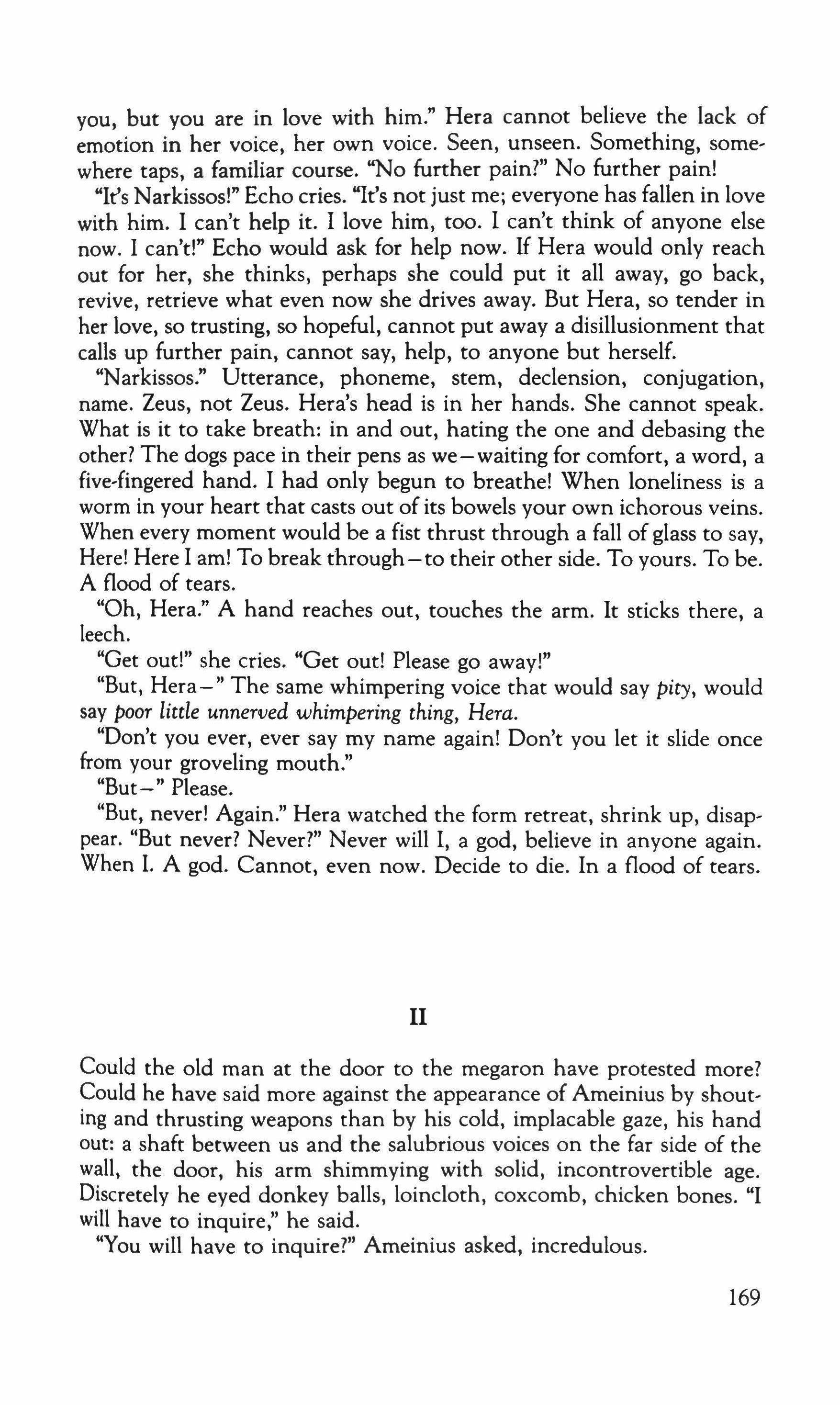
you, but you are in love with him." Hera cannot believe the lack of emotion in her voice, her own voice. Seen, unseen. Something, some' where taps, a familiar course. "No further pain?" No further pain!
"Irs Narkissos!" Echo cries. "Irs not just me; everyone has fallen in love with him. I can't help it. I love him, too. I can't think of anyone else now. I can't!" Echo would ask for help now. If Hera would only reach out for her, she thinks, perhaps she could put it all away, go back, revive, retrieve what even now she drives away. But Hera, so tender in her love, so trusting, so hopeful, cannot put away a disillusionment that calls up further pain, cannot say, help, to anyone but herself.
"Narkissos," Utterance, phoneme, stem, declension, conjugation, name. Zeus, not Zeus. Hera's head is in her hands. She cannot speak. What is it to take breath: in and out, hating the one and debasing the other? The dogs pace in their pens as we-waiting for comfort, a word, a five-fingered hand. I had only begun to breathe! When loneliness is a worm in your heart that casts out of its bowels your own ichorous veins. When every moment would be a fist thrust through a fall of glass to say, Here! Here I am! To break through-to their other side. To yours. To be. A flood of tears.
"Oh, Hera." A hand reaches out, touches the arm. It sticks there, a leech.
"Get out!" she cries. "Get out! Please go away!"
"But, Hera-" The same whimpering voice that would say pity, would say poor little unnerved whimpering thing, Hera.
"Don't you ever, ever say my name again! Don't you let it slide once from your groveling mouth."
"But-" Please.
"But, never! Again." Hera watched the form retreat, shrink up, disappear. "But never? Never?" Never willI, a god, believe in anyone again. When I. A god. Cannot, even now. Decide to die. In a flood of tears.
II
Could the old man at the door to the megaron have protested more? Could he have said more against the appearance of Ameinius by shout, ing and thrusting weapons than by his cold, implacable gaze, his hand out: a shaft between us and the salubrious voices on the far side of the wall, the door, his arm shimmying with solid, incontrovertible age. Discretely he eyed donkey balls, loincloth, coxcomb, chicken bones. "I will have to inquire," he said.
"You will have to inquire?" Ameinius asked, incredulous.
169

The arm did not move out of the way. "Perhaps I do not recognize you. I will ask the king."
"You will have to inquire?" Ameinius cried out again. "I am Ameinius! That Ameinius who was called the old friend, the good friend of Polydoros. I've been here a thousand times! Am! I am the old and new friend Ameinius all at once. I, the same, have received word from the new Polydoros, son of Kadmos, who has been reborn in a week and two days as king. Ameinius, humble servant, arrives at beck and melodious call of king to be sent away? Ameinius bears gifts and is refused, after humiliation at the gate? Ah! And so!" Ameinius spat his words in the old man's face. "The nature of things. Humility must gather humiliation in, is that it? Ah, well, then everything is all right. Every phase in its proper place. Send inquiries. Inquire of the king as to the wisdom of admitting an humiliated, humble man. I will wait."
The attendant tapped the door and stepped inside. "You will find me here!" Ameinius shouted. "I will not have moved to left or right! I will not have batted a lash."
"Ameinius," I asked. "Must you?"
"Must?" he cried. "Must? From the Persian, mast. A state of frenzy in animals, particularly large trumpeting male animals in a solid state of sexual heat. My trunk is on end, I tell you. I'll stampede those coy, selfserving, denigrating stones in there. You watch me, I'll explode their precious parts."
There was nothing I could say to him. I looked at my feet. Ameinius had met with humiliation after humiliation, and now he had come to this: humiliating himself. "I see that you must," I said, embarrassed for him.
"Right-ol Righr-ol" Ameinius shouted. "But there's a sycophant barring the gate. I will offer him the eye of an olive picker and he will fall down on his hands and knees and offer up his hindest self-to me, the nothing at the gate."
The door fell open, and I heard our names announced in the voice of the old man. His past, a reservation in the dignity of his mouth, was to me a relief. Ameinius rattled in, the ass's balls and all his other paraphernalia flopping against his chest. I crept in after him, making directly for the couch where Emporous lay propped up on his left elbow, dipping his right hand into the hors d'oeuvres as they were set on the small table in front of him. I lowered myself into my place beside him. "You would not believe-" I said.
"I see," he said. "I believe."
At the center of the room near the hearth, Ameinius flapped about, looking through the utter silence toward paired couch after paired couch, toward the two flimsy tables which had been shoved together to accommodate the rarest guests. There the ladies sat on chairs, uncomfortable, and silent as they were instructed to be. Near the king chair, on
170

the king couch, reclined Polydoros and beside him the honored Narkissos who went on tearing bread between his hands. "Ameinius seeks his place," called out Ameinius, who was staring at Narkissos still as Poly, doros' hand went up and down Narkissos' arm. "Ameinius seeks his place, I say!" Ameinius called again. A flush of anger had gone up into the men's faces at the sight of him. "I said -"
"Here it is," the meekest voice repined from the far side of the room. In the corner a mass of hair was moved aside; and the humble Ameinius clattered forward, readjusting himself, and slumped down next to Nesos, glancing furiously all around.
"And you were saying-" Polydoros said emphatically, turning toward Graosis, whose words had caught in his mouth at the sight of his former charge.
"I've quite forgotten every word of it," the counselor replied quite savagely, staring still at Ameinius on the couch. Then he recalled him' self, looked anxiously toward the lounge where the king who was addressing him lay alongside the boy he now loved, and continued as if he had never once entertained the thought of Ameinius in his life. "Yes," he said. "He was crushed like an olive beneath the wheel."
I glanced toward Emporous, and Emporous whispered in reply: "Edus," I nodded in surprise.
"How much oil did they get?" Basilieus, the chief charioteer, asked callously. "How much oil did the bugger give when he lost his obsequious life?"
"Oh, at least ten barrels by the looks of him," Dvkastes interjected from the couch he shared with Krino. Dykastes laughed. "That was the unctuous entirety of him." A polite titter went up as it always did when Dykastes spoke. Dykastes laughed again at his own words.
"Edus?" I repeated to Emporous. I saw him nod. And so, the great Mykenaean was dead. And with him his plans to consume the trade of Thebes and raise up everyone-Mykenos, Thebes, himself.
Basilieus lifted up his hand and I saw the gold bracelets of war fall together along the great veins of his arm. "I've trained three hundred tens of men from the countryside and now the fruit has spat its pit," Basilieus sighed.
"It's a pity to have it removed so spuriously," Graosis said, clearing his throat. "I should have liked to pluck the source myself."
I took a sip of wine and then I heard my own voice scratching in my throat. "You can eviscerate a fruit, Basilieus, with your three thousand men, or it can expunge itself, but what good will that do us if your fruit has sent its runners underground?" I lay back, embarrassed not at what I'd said but at how I'd said it. Up and down my voice had sawed like a boy's in the company of my friends and elders. Even the slave who filled my jug smiled at me in sympathy.
"Go on," Polydoros said, leaning forward so that he might hear clearly.
171
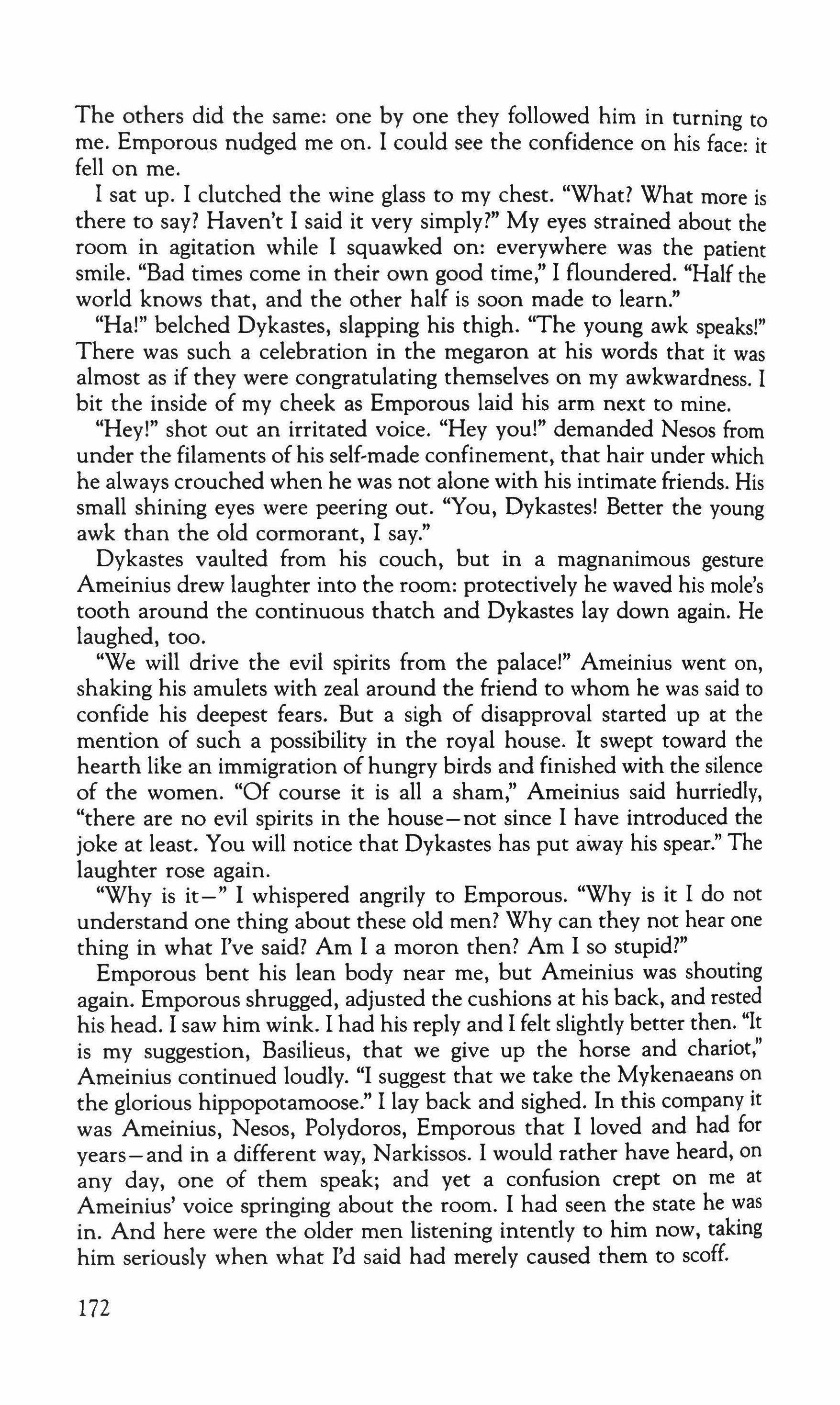
The others did the same: one by one they followed him in turning to me. Emporous nudged me on. I could see the confidence on his face: it fell on me.
I sat up. I clutched the wine glass to my chest. "What? What more is there to say? Haven't I said it very simply?" My eyes strained about the room in agitation while I squawked on: everywhere was the patient smile. "Bad times corne in their own good time," I floundered. "Half the world knows that, and the other half is soon made to learn."
"Hal" belched Dvkastes, slapping his thigh. "The young awk speaks!" There was such a celebration in the megaron at his words that it was almost as if they were congratulating themselves on my awkwardness. I bit the inside of my cheek as Emporous laid his arm next to mine.
"Hey!" shot out an irritated voice. "Hey you!" demanded Nesos from under the filaments of his self-made confinement, that hair under which he always crouched when he was not alone with his intimate friends. His small shining eyes were peering out. "You, Dykastesl Better the young awk than the old cormorant, I say."
Dvkasres vaulted from his couch, but in a magnanimous gesture Ameinius drew laughter into the room: protectively he waved his mole's tooth around the continuous thatch and Dvkastes lay down again. He laughed, too.
"We will drive the evil spirits from the palace!" Ameinius went on, shaking his amulets with zeal around the friend to whom he was said to confide his deepest fears. But a sigh of disapproval started up at the mention of such a possibility in the royal house. It swept toward the hearth like an immigration of hungry birds and finished with the silence of the women. "Of course it is all a sham," Ameinius said hurriedly, "there are no evil spirits in the house-not since I have introduced the joke at least. You will notice that Dvkastes has put away his spear." The laughter rose again.
"Why is it-" I whispered angrily to Emporous. "Why is it I do not understand one thing about these old men? Why can they not hear one thing in what I've said? Am I a moron then? Am I so stupid?"
Emporous bent his lean body near me, but Ameinius was shouting again. Emporous shrugged, adjusted the cushions at his back, and rested his head. I saw him wink. I had his reply and I felt slightly better then. "It is my suggestion, Basilieus, that we give up the horse and chariot," Ameinius continued loudly. "I suggest that we take the Mykenaeans on the glorious hippopotamoose." I lay back and sighed. In this company it was Ameinius, Nesos, Polydoros, Emporous that I loved and had for years-and in a different way, Narkissos. I would rather have heard, on any day, one of them speak; and yet a confusion crept on me at Ameinius' voice springing about the room. I had seen the state he was in. And here were the older men listening intently to him now, taking him seriously when what I'd said had merely caused them to scoff.
172

"Hippopotamoose?" Krino asked, scratching at the fringe of dark hair that surrounded his bald crown as a nest cradles an egg so large it nearly bursts. "Hippopotamoose? What is this hippopotamoose?"
"He doesn't know the greatest creature on the earth! He doesn't know the hippopotamoose!" Ameinius cried out in disbelief. "What is an hippopotamoose?" Xenos asked.
Nesos' eyes opened and closed. I myself had no idea what these hippopotamoose were. Emporous set down the large plum upon which he had been quietly chewing. "Large, gray or reddish brown sea monster," he said. "A whale with ears-and feet."
"A whale?" I said. "With useless feet?"
"No!" cried Ameinius. "Giant horse-ox. We will ride the horse-ox to the battlefield with Narkissos strapped to the head. I myself will accompany him. We will excoriate from each Mykenaean one pit and string them all around our necks. You will accompany me, Narkissos, will you not?" The long lashes of the two eyes came down, one and then the other. Narkissos turned away to kiss Polvdoros' hand. "Ah," said Ameinius. "He will think about it. It is perhaps a little frightening to think of strapping oneself to such a stupendous beast. Is it not, Graosis?" Graosis turned away Ah, well. It is the most ostentatious brute the gods have yet foreseen. I tell you this animal is god enough itself to make the northern lion cringe. If I had been an animal, the hippopotamoose is what I would have been. Hippopotamoose! Monstrous gray - as Emporous says."
"You can't ride a water monster in Thebes," Emporous said patiently. "Have you ever seen one, Ameinius? Have you ever seen your hippopotamos?"
"I have heard stories. You, Nesos-" he said, poking a finger into the thicket. "You have heard stories of the hippopotamoose in battle, haven't you?" The hair gave a grunt. "Just as I thought. Nesos confirms my facts. The hippopotamoose is half horse, half ox; travels the land like a chariot with legs instead ofwheels; does not lose an axle during sudden turns; does not need oiling; does the work of horse and chariot at once. Just strap your couch onto its back. Mow down the enemy with its horns. Think of that, Narkissos." Narkissos had called the slave to oil his feet and legs. We all saw the hands move up and down the arches. Narkissos' hand came up to wave a halfhearted reply. "Ah," Ameinius said. We all swallowed and looked away.
"Ameinius-" Emporous interrupted. "I will show you a picture of the water monster you would rip from the water and drive across dry land. It will shrivel like a fish on the plains."
"Where will you find such a picture?" Dykasres the Irritant called out, adjusting his bulk on the bench. "How will you provide evidence before the discourse is dead?"
"Ah -" said Emporous, standing up. He walked toward the center of
173

the hall. "If there is not a picture of an hippopotamos in the palace you may personally take up the axe and cut off my arm-the right one, if you please. I ask only that you leave a small stump, Dvkastes, so that I may courageously attempt-maimed and bewildered-to continue my career."
"Ha!" Basilieus laughed. "If you don't mind, Dvkastes, making a present to me -"
"For you and yours, Basilieus? I offer up right arm-his-and shield. At this point the shield is slightly rhetorical. Emporous, have you a shield?"
Emporous sat down again-on the floor in front of the king's couchsmiling as they went on about the fate of his arm. In the hand they talked about I saw Narkissos' dangling one. Each of Narkissos' fingernails Emporous was pressing between forefinger and thumb, one by one. I looked at Narkissos and then I looked at Emporous again.
"Come now, a man offers up his right arm, and all would be lost for lack of a shield?" Xenos the Procurer said. "I will gladly close the deal with a small slab of armor from my home. What now, Basilieus, will you do with that third-hand errant arm?" Emporous raised his eyebrows and smiled; he pressed the short-clipped ivory nails.
"A talisman! A talisman!" Ameinius croaked, flinging the chameleon's tongue on its chain. The lavender sliver snapped out and sprang back to rest between the chicken's ribs. Ameinius' excitement ran so close to his anxiety that I could not tell which it was. "So, Basilieus! We are, after all, of common minds! We will string your talisman around the neck of the magnificent hippopotamoose, which you will ride. And 1- I will throw myself in abasement between the two of you. I myself will be the fox-fur cushion to relieve the tension in your dignity."
Basilieus raised up his great black eyebrows. "I will post the potter's arm next to my tent, Ameinius. If there are no further objections, that is." He looked severely toward the cluttered friend of the king and then laughed toward the rest of us. "The fingers must be straightened before the stiffness sets in, of course. I have been searching for the perfect branch to hang my helmet on, but none seemed quite enough-not the right idea, if you see what I mean. This will be an inspiration to the men."
"The threat of Thebes," Nesos' monotonous voice impinged.
"Unless-" Basilieus went on, speaking-with what then seemed to be fondness-to the youthful Polydoros. "You would like it yourself? A sort of scepter, perhaps, to mark your reign? Or if not, perhaps Narkissos?"
"I will be content with the information," Polydoros said, smiling at Antiope, "and Narkissos has enough hands on him continually to keep him satisfied. Do you not, Narkissos?" Narkissos withdrew his hand from Emporous' assignated one, took the king's hand into his own, and ran the king's palm over his glistening chest. Polvdoros cleared his
174
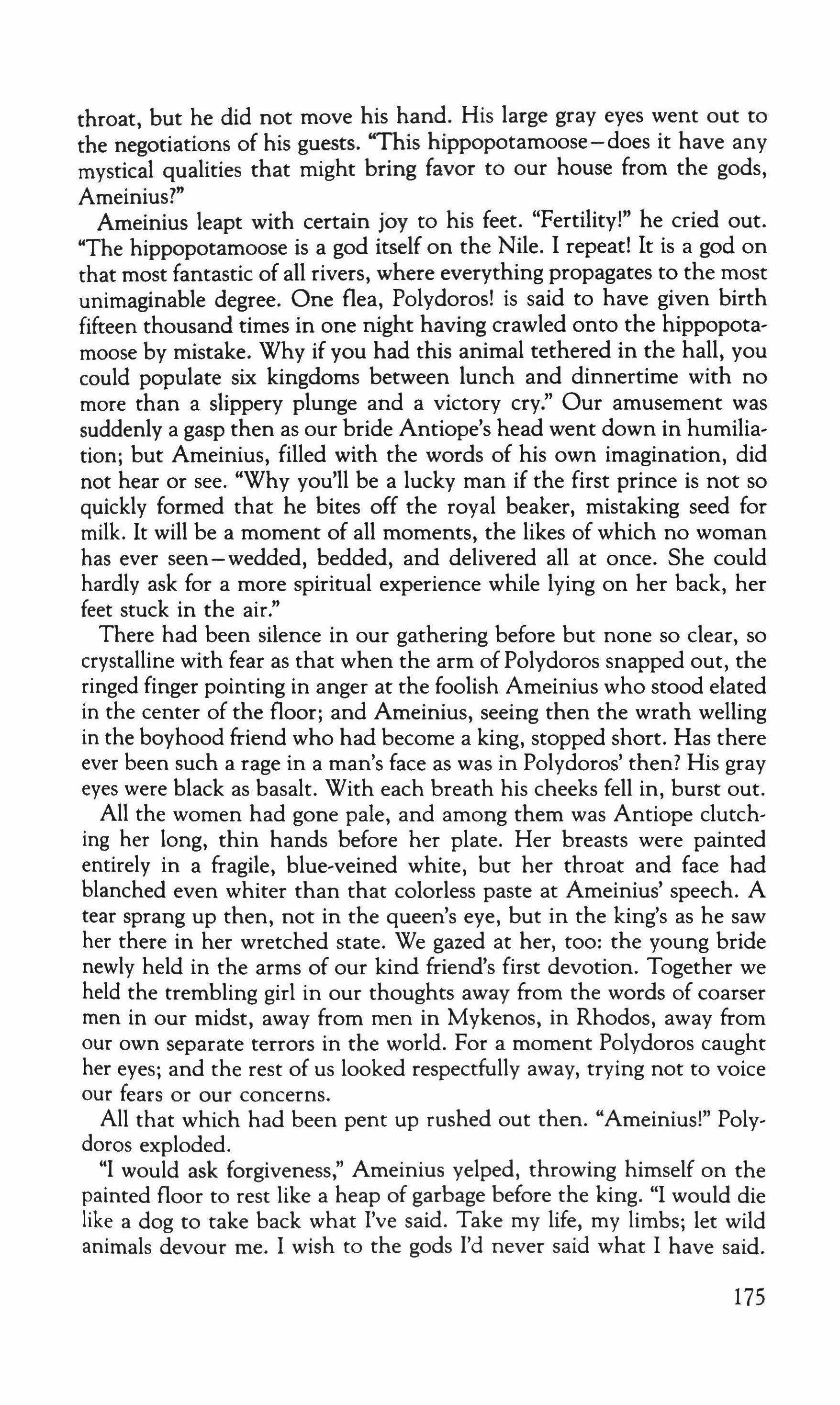
throat, but he did not move his hand. His large gray eyes went out to the negotiations of his guests. "This hippopotamoose-does it have any mystical qualities that might bring favor to our house from the gods, Ameinius?"
Ameinius leapt with certain joy to his feet. "Fertility!" he cried out. "The hippopotamoose is a god itself on the Nile. I repeat! It is a god on that most fantastic of all rivers, where everything propagates to the most unimaginable degree. One flea, Polydorosl is said to have given birth fifteen thousand times in one night having crawled onto the hippopotamoose by mistake. Why if you had this animal tethered in the hall, you could populate six kingdoms between lunch and dinnertime with no more than a slippery plunge and a victory cry." Our amusement was suddenly a gasp then as our bride Antiope's head went down in humiliation; but Ameinius, filled with the words of his own imagination, did not hear or see. "Why you'll be a lucky man if the first prince is not so quickly formed that he bites off the royal beaker, mistaking seed for milk. It will be a moment of all moments, the likes of which no woman has ever seen-wedded, bedded, and delivered all at once. She could hardly ask for a more spiritual experience while lying on her back, her feet stuck in the air."
There had been silence in our gathering before but none so clear, so crystalline with fear as that when the arm of Polvdoros snapped out, the ringed finger pointing in anger at the foolish Ameinius who stood elated in the center of the floor; and Ameinius, seeing then the wrath welling in the boyhood friend who had become a king, stopped short. Has there ever been such a rage in a man's face as was in Polydoros' then? His gray eyes were black as basalt. With each breath his cheeks fell in, burst out.
All the women had gone pale, and among them was Antiope clutching her long, thin hands before her plate. Her breasts were painted entirely in a fragile, blue-veined white, but her throat and face had blanched even whiter than that colorless paste at Ameinius' speech. A tear sprang up then, not in the queen's eye, but in the king's as he saw her there in her wretched state. We gazed at her, too: the young bride newly held in the arms of our kind friend's first devotion. Together we held the trembling girl in our thoughts away from the words of coarser men in our midst, away from men in Mykenos, in Rhodos, away from our own separate terrors in the world. For a moment Polvdoros caught her eyes; and the rest of us looked respectfully away, trying not to voice our fears or our concerns.
All that which had been pent up rushed out then. "Ameinius!" Polydoros exploded.
"I would ask forgiveness," Ameinius yelped, throwing himself on the painted floor to rest like a heap of garbage before the king. "I would die like a dog to take back what I've said. Take my life, my limbs; let wild animals devour me. I wish to the gods I'd never said what I have said.
175

Here!" he cried. "Take the axe, cut out my tongue. Let me wander voiceless through the streets, begging for humility. Let me be a sign of all that is despicable; let people cast their mucus on me for their own good luck. Here!" he cried. "Hack out my tongue!" He stared up at Polvdoros then whose face had not lost its anger, who had not moved at all. "Oh -" Ameinius cried, realizing that all he'd said was now possible. "Then take everything! Pluck out my eyes! I will never see Narkissos again."
Slowly a smile began to creep on Polvdoros' face. We too smiled and quickly took it back because we did not know what it meant. "That last," the king said quietly, "would be the greatest gift any man could give these days or ask-" Narkissos closed his eyes, and Ameinius gasped. "Get up for goodness sake, Ameinius. Those items on you cast up an odor even more offensive than your words." A great guffaw ofrelief went up around the room. "Let's have this reproduction of the moose, Emporous. Try to keep your limbs intact-as Ameinius has just learned." As Ameinius crept back to his couch, Emporous went toward the door, tall, erect, and confident. I could not help admiring his leanness there, his summer-bronzed skin. I saw him speaking with the little man at the gate and then the two of them went out. My eyes fell on Narkissos then. He had grown even more beautiful than he had been when I had last remarked to myself on the stirrings I felt at his presence. I, too, thought him beautiful now-his broadening chest, the silver hairs with the black that served to emphasize the muscles there, his narrow hips and waist, his perfect eyes.
"I had no idea we had an hippopotamoose in the palace-whatever it is," Polydoros said, smiling at his bride. "Perhaps it carne with the dowry and it was to be a surprise?" Antiope shyly shook her head, her face flushing suddenly at having been addressed.
"Perhaps we should have a game of cottabus while we wait for this animal, which Ameinius would rather be of all the creatures in the world, to show its face." Polydoros stroked Narkissos' thigh. "Perhaps we should know finally what's up with whom. What do you say to that?"
"But what about Emporous?" Krino the Balancer asked. "Should we wait for him?"
"No, no," the others cried out. "He will have his turn." And I sighed in relief. If I should win Narkissos, I did not want to see those dark brown eyes, though he would understand. If he should win, I would have cast myself from the tower like a shard, though I, too, would not have begrudged Narkissos-so common was the understanding among all of us that he was what each of us sought. Narkissos' hand clutched his own wrist. "Narkissos! Narkissos!" The clamoring began for the first try at throwing the wine. I found myself also crying out that the metal stand be brought, that we commence immediately in the sport. For the first time all evening I noticed Leiriope, for the first time her meek attitude
176

did not seem wrong. I saw enthusiasm on her face; and all the other women in their enforced silence seemed meeker than she.
"I will go first!" Ameinius yelled, leaping to the center of the room, losing all control as if he had not just been reproved. "I will have it over with, and if the sound is good - and how could it be inferior, how could everything go wrong for me? I mean, how could the gods- No. The sound will be good, clear, pure, a sign of my life, of the trust Narkissos has for me but is afraid to show. You will forgive me then, will you not-" he said to no one in particular, to all of us. "You will forgive me when I have won him? When he knows himself? You won't hold it against me? No. You will let me pass, with him, with Narkissos my friend. I mean, I have been so long in the sadness of this, I hardly know from day to day-I mean-Bring the stand! Won't you, please?"
Narkissos lay back in resignation, or so it seemed, though he sighed. I had not seen him for some time, until that day, though I had made many attempts.
The slave was called to pace the distance then, and Ameinius was told where to stand. The brass disc was set up, and the wine poured in Ameinius' cup to the rim. We each took a sip out of our own and sang out a note to the gods to speak truly in the tone. "I would have some' one," Ameinius said, holding the cup tightly to his chest with both hands and closing his eyes. "I would be a friend to him, a lover, a brother, a father, a son. I would hold someone if he would hold me. If it is the gods' will, I would have him-love me, too-Narkissos." His arm swept up and the wine flew toward the disc. Through the air it sailed, past the white tunics of all the men who waited there, past the station, ary colors at the two square tables, between the pillars at the end of the hall. Secretly we each hoped that he would lose; and we, those of us who had known him for so long, hoped that he would hear, for his sake, the clear tone of Narkissos' assent in the song of the gods. I saw him imagining it himself as the liquid struck the brass. He stood there stunned, listening. No one said a word as the disc rang out with a cry of tin, a false, wavering tone that struck down his hopes, that offended the ear and crept on the spine in defeat. Stiffly Ameinius walked to his couch, lay down, and flung back his arms behind his head. Toward the vaulted ceiling he stared.
"Ah ha!" shouted Polydoros as the door swung open then and in walked Emporous with an urn. "So the hippopotamoose is not horse but pot!" he cried, obviously relieved at the diversion from Ameinius' state. "That is very good, Emporous. Very good. That is one way at least to come home from war. You may keep your arm."
"I am delighted," Emporous said, bowing in jest before the king, "to remain a whole man." He bowed again to the group. "I have, however, what I've promised. I've the whole contradiction here." He handed the urn to Polydoros and pointed to its side. "That," he said, "is hippopota-
177
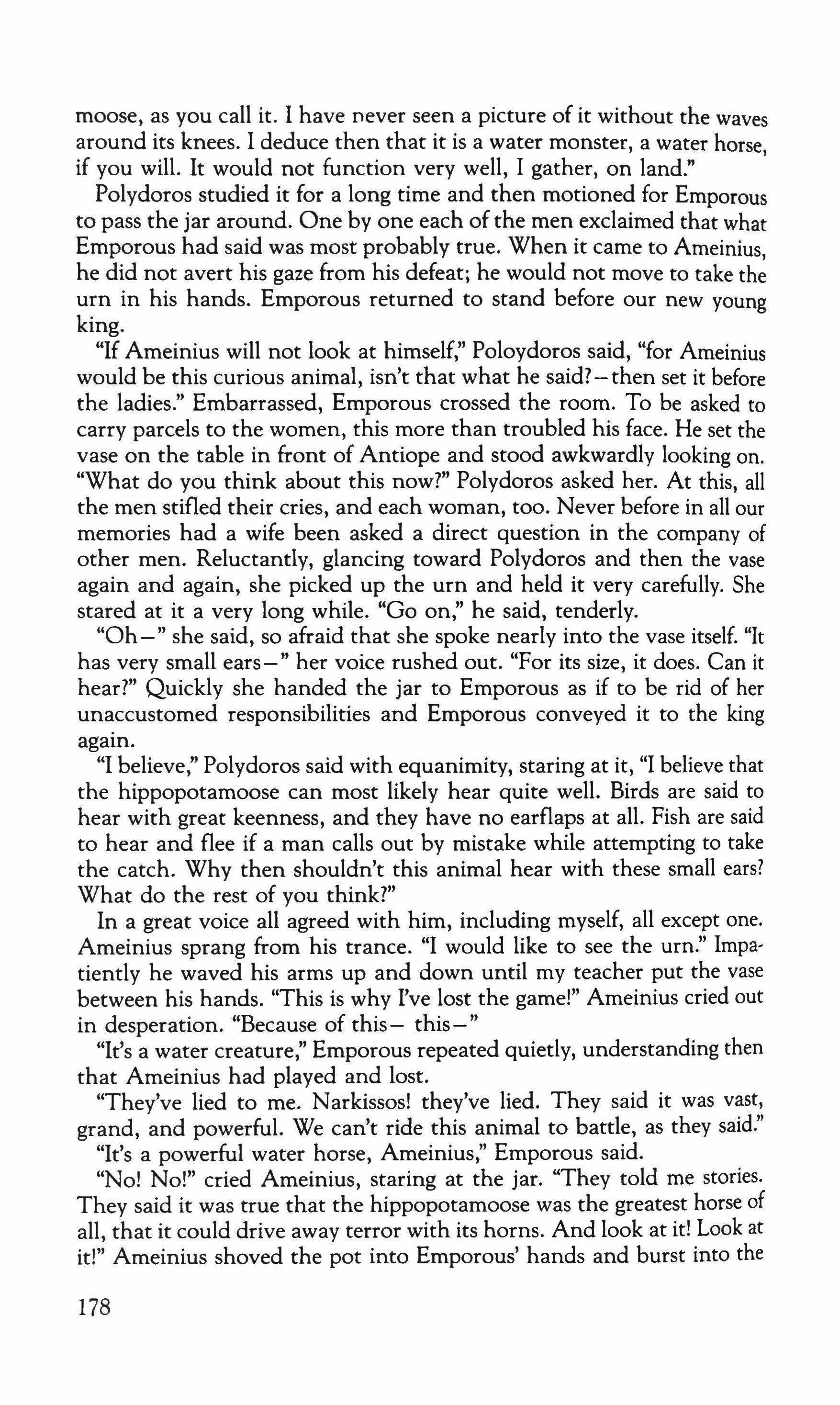
moose, as you call it. I have never seen a picture of it without the waves around its knees. I deduce then that it is a water monster, a water horse , if you will. It would not function very well, I gather, on land."
Polydoros studied it for a long time and then motioned for Emporous to pass the jar around. One by one each of the men exclaimed that what Emporous had said was most probably true. When it carne to Ameinius, he did not avert his gaze from his defeat; he would not move to take the urn in his hands. Emporous returned to stand before our new young king.
"If Ameinius will not look at himself," Poloydoros said, "for Ameinius would be this curious animal, isn't that what he said?-then set it before the ladies." Embarrassed, Emporous crossed the room. To be asked to carry parcels to the women, this more than troubled his face. He set the vase on the table in front of Antiope and stood awkwardly looking on. "What do you think about this now?" Polydoros asked her. At this, all the men stifled their cries, and each woman, too. Never before in all our memories had a wife been asked a direct question in the company of other men. Reluctantly, glancing toward Polydoros and then the vase again and again, she picked up the urn and held it very carefully. She stared at it a very long while. "Go on:' he said, tenderly.
"Oh-" she said, so afraid that she spoke nearly into the vase itself. "It has very small ears-" her voice rushed out. "For its size, it does. Can it hear?" Quickly she handed the jar to Emporous as if to be rid of her unaccustomed responsibilities and Emporous conveyed it to the king again.
"I believe:' Polydoros said with equanimity, staring at it, "I believe that the hippopotamoose can most likely hear quite well. Birds are said to hear with great keenness, and they have no earflaps at all. Fish are said to hear and flee if a man calls out by mistake while attempting to take the catch. Why then shouldn't this animal hear with these small ears? What do the rest of you think?"
In a great voice all agreed with him, including myself, all except one. Ameinius sprang from his trance. "I would like to see the urn." Impatiently he waved his arms up and down until my teacher put the vase between his hands. "This is why I've lost the game!" Ameinius cried out in desperation. "Because of this- this-"
"It's a water creature," Emporous repeated quietly, understanding then that Ameinius had played and lost.
"They've lied to me. Narkissos! they've lied. They said it was vast, grand, and powerful. We can't ride this animal to battle, as they said."
"It's a powerful water horse, Ameinius," Emporous said.
"No! No!" cried Ameinius, staring at the jar. "They told me stories. They said it was true that the hippopotamoose was the greatest horse of all, that it could drive away terror with its horns. And look at it! Look at it!" Ameinius shoved the pot into Emporous' hands and burst into the
178

tears that losing the game and Narkissos, whom he loved, helped to cause. "It has no horns! Everyone has lied to me. I've been made into a fool."
"What is it?" Emporous said. "Ameinius, what's the matter?" My teacher steered his arm around all the pitiful and stinking objects hanging on the body of our tormented friend. He touched his arm. "Come, Ameinius. What is it now?"
"They've lied to me," he sobbed. "They said it was vast, grand, and powerful. Did they think I would not see it here? They said it was like myself! And it is only two inches tall!" Emporous set the vase on the floor and returned to his place. "Hippopotamouse!" Ameinius wailed. "Hippopotamouse!" Narkissos lay back staring into the smoke as it rose up undisturbed from the hearth, listening to the sobs that he had helped inspire. Even Dykasres turned toward the wall and coughed.
"Ameiniusl" I said, but a woman was standing before him. The Queen's red bridal veils were beside him now. And she was speaking to him. "You see on this vase a picture of two things, Ameinius," she said. "What are they?" The silence, the room, a slave, the old man at the door, the fire, the painted floors, the pillars rising up.
"A mouse," he cried. "Two inches tall."
"And what else?" she asked. She put her palm on his dripping brow. "What else, young Ameinius?"
"A man," he cried. "There is a man!"
"And how tall is a man?" she asked. He looked at her then, a long time. He was not crying now. "How tall is a man?"
He looked at the vase. "You see, Ameinius," she said. "This is drawn to scale. We see here a picture of the hippopotamoose, and it is nearly as tall as the man and far wider. So we must assume that it is at least five feet tall. Do you understand? It is wider than a horse or a bull." She stroked his brow. "Your hippopotamoose is very likely all the things you've said. Isn't it?" He looked at the vase. "What do you think, Ameinius? What do you say now?"
His mouth dropped open, and his chest lurched as if he could not get the words to come out. "Hippopotamoosel Hippopotamoosel" he brayed. "And Ameinius! Two-two-inches tall!" He stared into the side of the urn then. "Hippopotamoose!" Like the man beside the animal, he stared directly into the small and spiraled ear; and there, wandering in his imagination, he was lost. Antiope stood beside him, stunned. Finally she turned.
"We will do something," Polydoros said. "Come sit down." We all looked on then at Polydoros with new respect as he did something his father would never have thought to do. He called for the guards, and they in turn called for others, and the expedition was sent out. Men would go out from Thebes in that same hour, they would go by foot, and then they would go by sea, and when they returned they would
179

have a large animal in the hold or on deck, or swimming along behind. It would be alive and well when it arrived and we would call it hippopotamoose. When we all turned to see Ameinius' reaction then, we did not find him. Ameinius had crawled under Nesos' hair. Even Narkissos opened up his strange eyes then; I thought I saw sadness there.
Polydoros stood there a long moment looking at what could be seen of him, and then he sat down alone on his throne. We all sat down. He took a slice of fruit and put it in his mouth. He chewed slowly, looking on at the stack of hair under which sat Ameinius and his new guardian. "We will continue with the party now," he said. "But first something is troubling me. I feel it important to know these things before we go on. Teiresias-" he said unexpectedly. Everyone turned toward me. I felt my heart clamoring into my throat. "Tell us what you know."
"Know?!" I screeched. Ameinius had disappeared. Nesos' hair was a distant tent. Narkissos. All the other faces were blanks. A hand lay at my side.
"Yes. You must tell us what you know of Ameinius' chances. And you must tell us what you know of Mykenos' plans against us now that Edus is gone."
"Know?" I bellowed again. "I know nothing at all."
"Stop," Polydoros said in a voice that was his as king and that had never been his as friend. "If you can know the future, then isn't it only right that you give us, your friends, the benefit? On the one matter, we must know our own friend's fate. On the other, you have already begun to tell us what you think. Go on with it."
"I tell you," I cried out, sitting bolt upright. "I had no idea, I mean I have no understanding of what has happened to Ameinius," I looked over to where he was huddled. I could see the black hair move back and forth like a net as Nesos patted him. "And!" I cried. "I know nothing of the Mykenaeans, I tell you. Why don't you ask Basilieus? Ask Dvkastes. Why ask me, when I've only once been out ofThebes and then was such an infant I didn't know what I saw? Why-" I leapt off the couch. "How can you ask me?" I struck my chest. "Ask Dykastes, I say. Ask Dvkastes, I say. Ask Dvkastes who would make a fool of me when I speak. Ask the old auk. Ask someone at least fifteen!"
Emporous reached out and laid his hand on my arm. "What is it?" I shouted, shaking him off. "I know nothing, I tell you. I am not responsible for what goes on here. I have only said what any fool could know. How could the death ofEdus mean the death ofMykenaean greed? That is all I've said. Did I say that tomorrow the Mykenaeans will storm the gate and slaughter all the goats in the outer court? Did I say tomorrow Athena will squat down on our roof and call for war? Why don't you ask my mother? She's Athena's nymph. But she won't know any more than I tell you now. When I know something-if! ever know anything at all-I tell you, I will let you know. As if you couldn't see it for yourselves, as if
180
you couldn't see the insignificance of what I've said. As if you didn't already know what troubles you have. Why you-why you would ask me-me, not yet a man-to deliver you from your own self-serving turpitudes. In a hundred and fifty years Thebes will be a pockmark on this land. Not one man living on this spot will remember grandeur when the name of Thebes is said, and it will be you and yours who drag it down!"
Terrified at what I'd said, I saw them. The heat broke out on my brow, and the sweat poured down. I rushed toward the door and Emporous rushed after me. "I'm very ill. I'm sorry, I apologize," I blurted out. "I have overexerted myself in the feast. Excuse me, please." I saw my mother stricken by the mention of her name.
"I will take him home," Emporous said. "There is little use in questioning. He does not understand. He is upset at what has happened to Ameinius here." He led me out past the trembling little man.
"I know nothing ofMykenos," I blubbered. "How can I know Mykenos when I have never seen the place?"
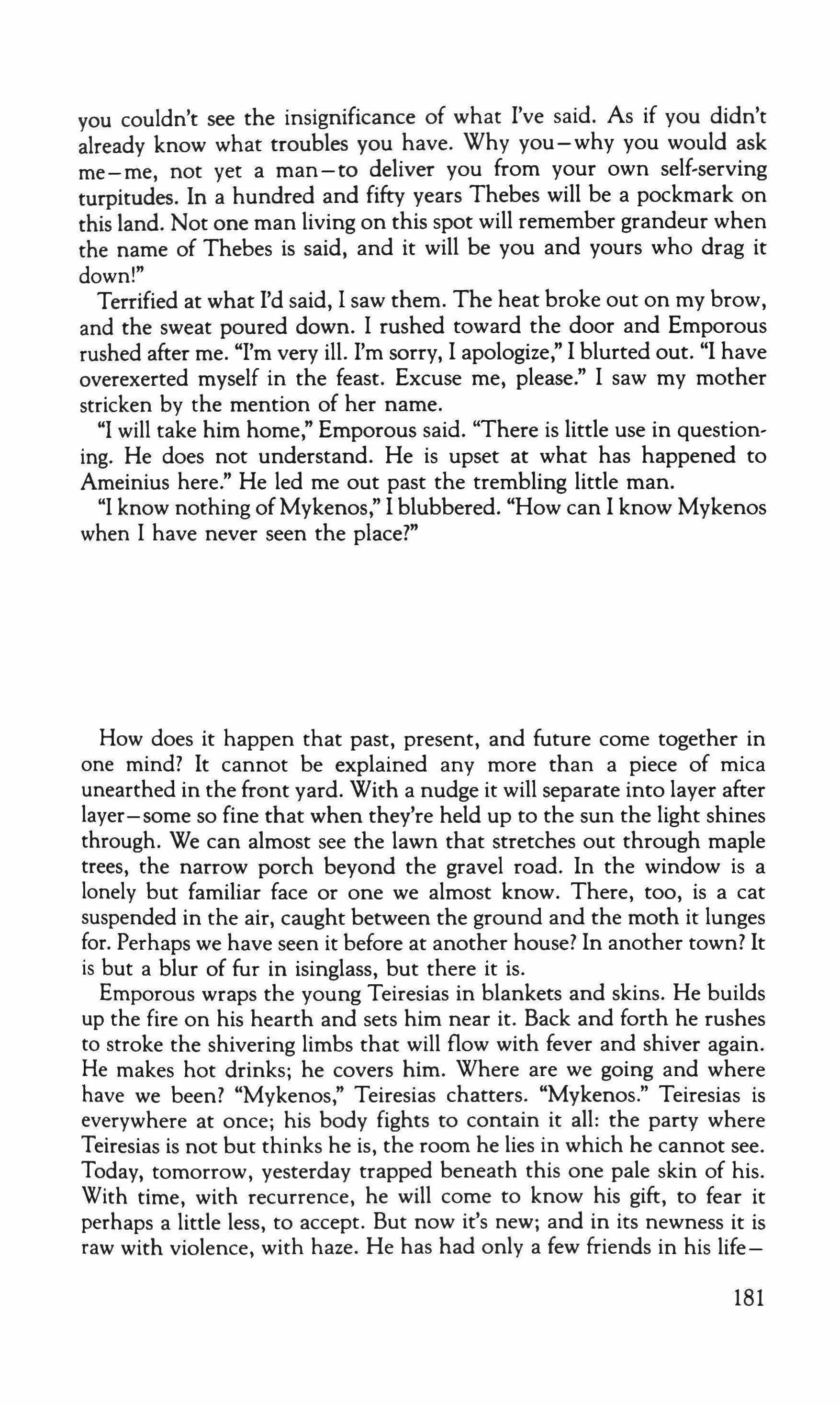
How does it happen that past, present, and future come together in one mind? It cannot be explained any more than a piece of mica unearthed in the front yard. With a nudge it will separate into layer after layer-some so fine that when they're held up to the sun the light shines through. We can almost see the lawn that stretches out through maple trees, the narrow porch beyond the gravel road. In the window is a lonely but familiar face or one we almost know. There, too, is a cat suspended in the air, caught between the ground and the moth it lunges for. Perhaps we have seen it before at another house? In another town? It is but a blur of fur in isinglass, but there it is.
Emporous wraps the young Teiresias in blankets and skins. He builds up the fire on his hearth and sets him near it. Back and forth he rushes to stroke the shivering limbs that will flow with fever and shiver again. He makes hot drinks; he covers him. Where are we going and where have we been? "Mykenos," Teiresias chatters. "Mvkenos," Teiresias is everywhere at once; his body fights to contain it all: the party where Teiresias is not but thinks he is, the room he lies in which he cannot see. Today, tomorrow, yesterday trapped beneath this one pale skin of his. With time, with recurrence, he will come to know his gift, to fear it perhaps a little less, to accept. But now it's new; and in its newness it is raw with violence, with haze. He has had only a few friends in his life-
181

the others think him strange. He would call them now to help him out of this, if he could speak.
Echo leans back in her chair in the palace, the party going on. "Send them against the Skvthians," The men cry out, but Polydoros motions Echo on. Around the tables the other women sit. A morning lily in the midday sun, they all close up.
"Why the Skythians, Echo?" Polydoros asks out loud, breaking all tradition. It is his now for the altering. The party is like a morsel of sweet cake caught in all their throats between a belly and a mouth.
"Given an old power and a new power-and we are the new-" Echo says. If one can speak to gods, can a woman not speak to men? she reassures herself. "But we're equally powerful. What are the thoughts of an old power in such a case?" There is laughter in the room. The women cringe. "They are these. Here is the way the Skythians think: Thebes has become an equal power in the world. Thebes has not diminished the Skythian way of life, but Thebes has stultified Skythian growth. Without Thebes, Skvthia would have the world. Such ruminations in old and powerful minds will not, however, send an old power to war-" Echo stretches her long legs out, an angle to the squares of the reds, the blues that make up a floor.
"Not unlike the way we think of Mykenos," Polydoros says. "Precisely." She crosses her legs at the ankles and looks around the megaron. Her beige hairs stand up like scorched brown grass.
"But why then should we attack?" Xenos interrupts in agitation. "It would divert the trade routes for years."
"Because they will attack us. They are barbarians. Would you live under the rule of barbarians?"
"But you've just said, darling," Andros says perfunctorily, speaking for the first time in the evening, breaking his perpetual mourning to see the woman there. He cannot help himself. He imagines her stripped down, rectified and silenced in his stifling arms. Pictures of his former wives and lovers float through the minds in that room. Dead faces on the face of one who would put all passion down, passionately.
Coldly Echo perceives his torrid eyes. "They will say: Thebes is young. Youth is ambitious," Echo says. "Youth will overtake the old, they will say. They will fight their fear, not us." Pots sit on the floor and all around. Urns can hold the heads of men. What is it to see what will happen next and to be able to do nothing at all? A claw in the guts. The women's necks are straining to hold their own heads down.
"That is nonsense," Dvkastes says.
"I do not say it is not nonsense," Echo says indifferently. "But that is the way of the world-as it stands now. In their place, you would do the same. That is what makes me certain of what I say. They are barbarians. If you had let Teiresias have his say, you might understand. If you had listened. But he is young."
182

"Why you presumptuous-"
Krino stays Dykasres' arm. In the palace Teiresias' words are sharp as barnacles, unmentioned, under the heels of men; and in a hut Emporous lies down beside the boy he loves. He runs a cool cloth now over the pallid brow and does not know where the boy has gone. In Thebes a great beast will come riding, made of tarnished bronze, red as the early sun. "I know nothing," Teiresias says. There are small shiny objects in the beast. They all sit down, the one disgracing himselffor the other, the other heedless of himself.
"If we should attack Skvthia, then we will be guilty of what you say they anticipate," Xenos the Procurer says.
Krino, Judge, holds up his hand before the tall, powerful, waning king who knows all men and cannot judge, cannot know to hold his tongue. Krino's hand stands before Polvdoros and the rest. It holds a place for his voice. "In a sense you are right, Xenos." Krino, who, in each empathy he undertakes, becomes his own suspect in the case, will not deride Xenos, who has actually voiced what Krino for a moment has thought himself, what nearly everyone now thinks. He will not debase Xenos for lack of inspiration before a jury of men not unlike himself. "But you are right only with regard to the effect," he offers. "Our attack would not be out of ambition as they assume it would be. But rather we would act out of a need for self-preservation, as someone has said, out of a recognition that their fear will lead them to take us off our guard if we do not act first."
Does it happen at the moment his inner eyes are seeing it, a moment later, perhaps tomorrow? He does not know.
"The Skythians -" Basilieus considers aloud. "What do you think about all this, Graosis?"
Xenos interrupts as Graosis is about to speak. Graosis' mouth hangs open; he shuts it tight as Xenos goes on. He looks in this moment, this gift, toward Narkissos lying sleek-beside the king. "It is true," Xenos says, "everyone says the Skythians are barbaric. Why! when a man dies they strangle all the slaves! The dogs, the horses, the goats! They dump them in a pit-all the best jewels and clothes! Even the wife! There is nothing left for exchange when the man is gone. Consider living under such a law-the culture is always starting over again!"
"And what becomes of men then?" Andros shouts, joining in now that he may follow someone he respects. "When widows cannot be reborn as virgins to another man? Of my six, I have had four widows marry me. I loved them all and all are dead, but what would my life have been if the Skythians had buried them with frailer men?"
"Under such a rule," Krino smiles, "your wives would have lived-to bear slavish Skvthians. And you, Andros, would have much company. You would live with Theban men, in a common pit, if you see what I mean. You will hope to gods Lethe flows after they are done with us."
183
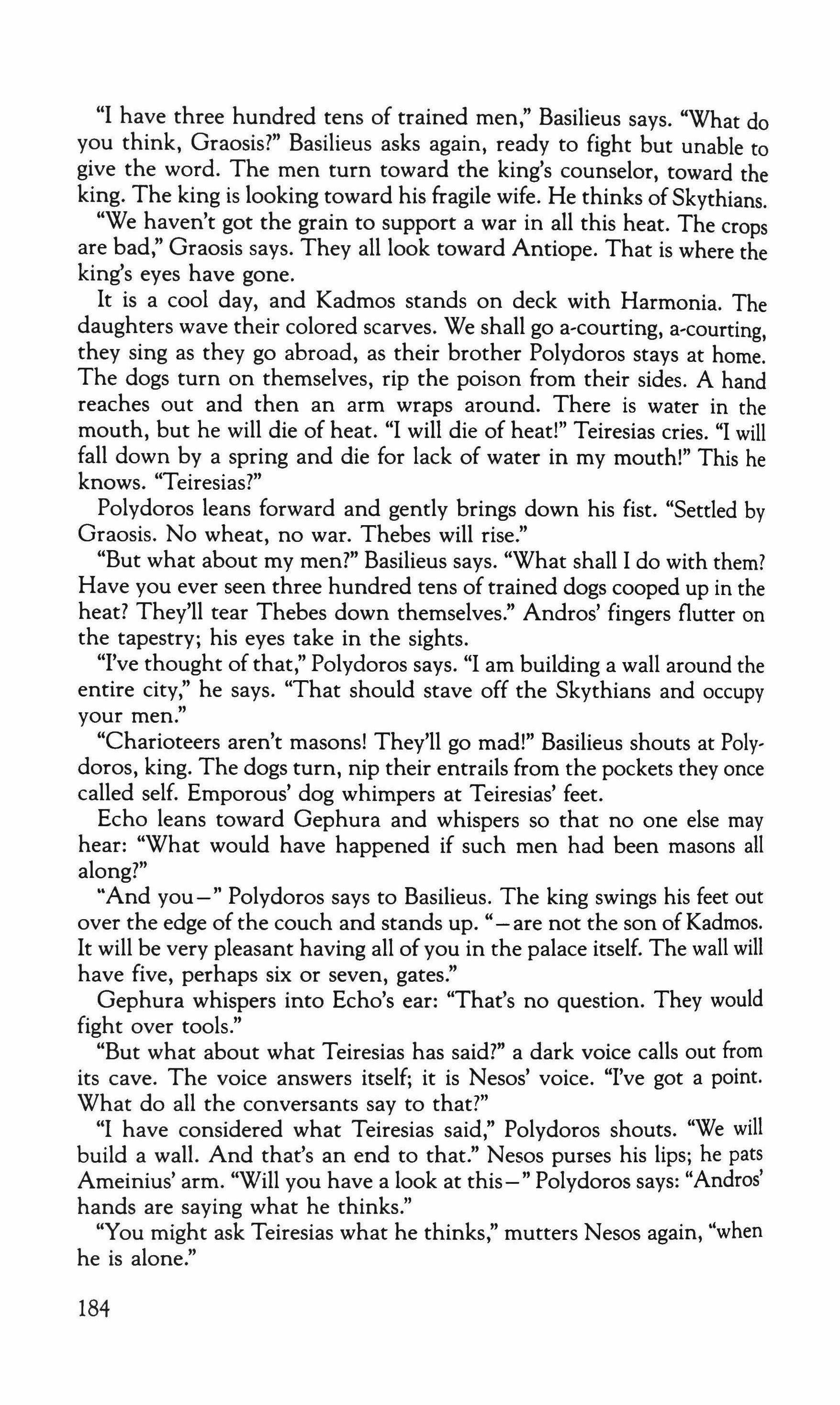
"I have three hundred tens of trained men," Basilieus says. "What do you think, Graosis?" Basilieus asks again, ready to fight but unable to give the word. The men turn toward the king's counselor, toward the king. The king is looking toward his fragile wife. He thinks ofSkythians,
"We haven't got the grain to support a war in all this heat. The crops are bad:' Graosis says. They all look toward Antiope. That is where the king's eyes have gone.
It is a cool day, and Kadmos stands on deck with Harmonia. The daughters wave their colored scarves. We shall go a-courting, a-courting, they sing as they go abroad, as their brother Polydoros stays at home. The dogs turn on themselves, rip the poison from their sides. A hand reaches out and then an arm wraps around. There is water in the mouth, but he will die of heat. "I will die of heat!" Teiresias cries. "I will fall down by a spring and die for lack of water in my mouth!" This he knows. "Teiresias?"
Polydoros leans forward and gently brings down his fist. "Settled by Graosis. No wheat, no war. Thebes will rise."
"But what about my men?" Basilieus says. "What shall I do with them? Have you ever seen three hundred tens of trained dogs cooped up in the heat? They'll tear Thebes down themselves." Andros' fingers flutter on the tapestry; his eyes take in the sights.
"I've thought of that," Polydoros says. "I am building a wall around the entire city," he says. "That should stave off the Skythians and occupy your men."
"Charioteers aren't masons! They'll go mad!" Basilieus shouts at Polydoros, king. The dogs turn, nip their entrails from the pockets they once called self. Ernporous' dog whimpers at Teiresias' feet.
Echo leans toward Gephura and whispers so that no one else may hear: "What would have happened if such men had been masons all along?"
"And you-" Polydoros says to Basilieus. The king swings his feet out over the edge of the couch and stands up. "are not the son of Kadmos. It will be very pleasant having all of you in the palace itself. The wall will have five, perhaps six or seven, gates."
Gephura whispers into Echo's ear: "That's no question. They would fight over tools."
"But what about what Teiresias has said?" a dark voice calls out from its cave. The voice answers itself; it is Nesos' voice. "I've got a point. What do all the conversants say to that?"
"I have considered what Teiresias said," Polydoros shouts. "We will build a wall. And that's an end to that." Nesos purses his lips; he pats Arneinius' arm. "Will you have a look at this-" Polydoros says: "Andros' hands are saying what he thinks."
"You might ask Teiresias what he thinks," mutters Nesos again, "when he is alone."
184
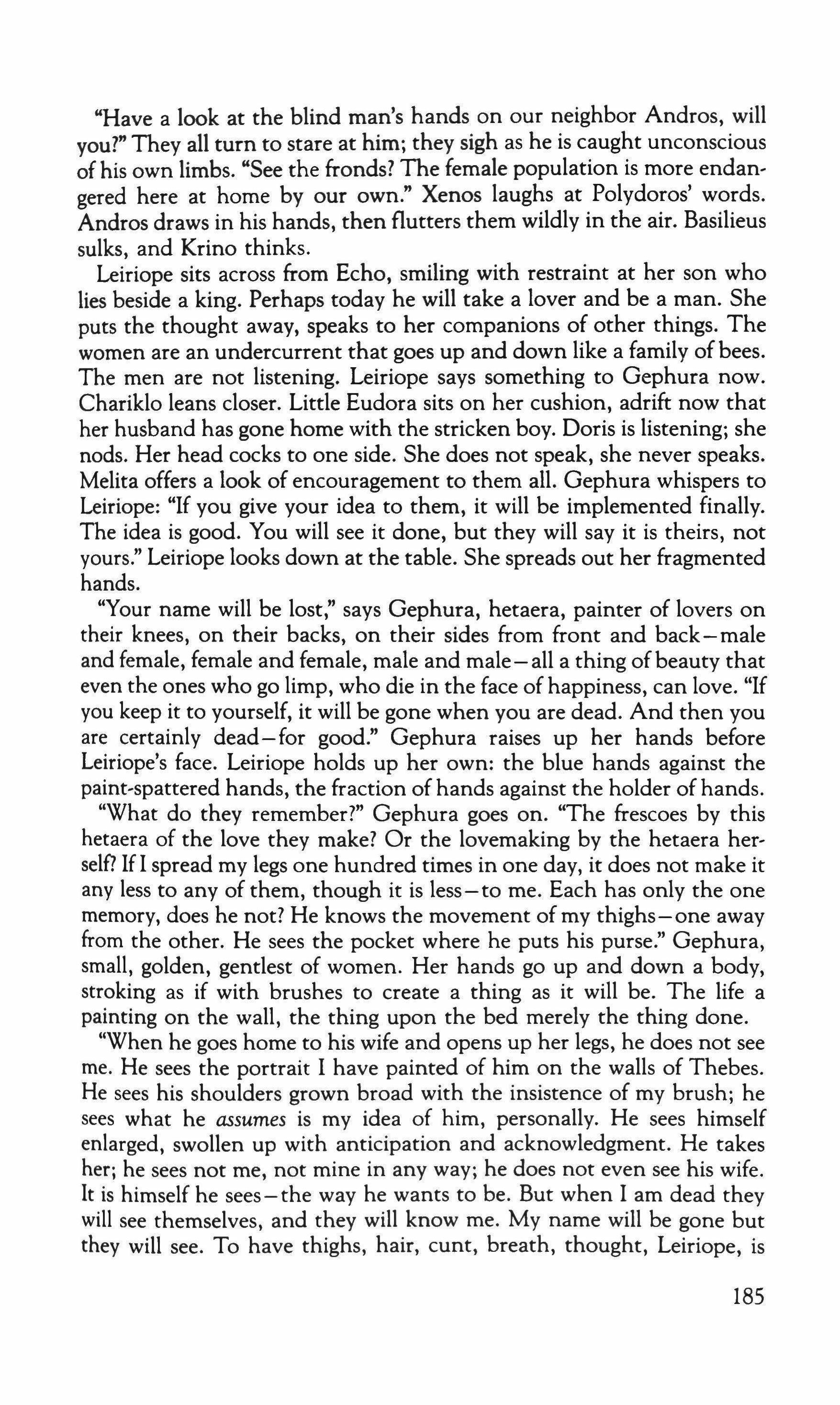
"Have a look at the blind man's hands on our neighbor Andros, will you?" They all turn to stare at him; they sigh as he is caught unconscious of his own limbs. "See the fronds? The female population is more endangered here at home by our own." Xenos laughs at Polydoros' words. Andros draws in his hands, then flutters them wildly in the air. Basilieus sulks, and Krino thinks.
Leiriope sits across from Echo, smiling with restraint at her son who lies beside a king. Perhaps today he will take a lover and be a man. She puts the thought away, speaks to her companions of other things. The women are an undercurrent that goes up and down like a family ofbees. The men are not listening. Leiriope says something to Gephura now. Chariklo leans closer. Little Eudora sits on her cushion, adrift now that her husband has gone home with the stricken boy. Doris is listening; she nods. Her head cocks to one side. She does not speak, she never speaks. Melita offers a look of encouragement to them all. Gephura whispers to Leiriope: "If you give your idea to them, it will be implemented finally. The idea is good. You will see it done, but they will say it is theirs, not yours." Leiriope looks down at the table. She spreads out her fragmented hands.
"Your name will be lost," says Gephura, hetaera, painter of lovers on their knees, on their backs, on their sides from front and back - male and female, female and female, male and male - all a thing ofbeauty that even the ones who go limp, who die in the face of happiness, can love. "If you keep it to yourself, it will be gone when you are dead. And then you are certainly dead-for good." Gephura raises up her hands before Leiriope's face. Leiriope holds up her own: the blue hands against the paint-spattered hands, the fraction of hands against the holder of hands.
"What do they remember?" Gephura goes on. "The frescoes by this hetaera of the love they make? Or the lovemaking by the hetaera herself? IfI spread my legs one hundred times in one day, it does not make it any less to any of them, though it is less-to me. Each has only the one memory, does he not? He knows the movement of my thighs-one away from the other. He sees the pocket where he puts his purse." Gephura, small, golden, gentlest of women. Her hands go up and down a body, stroking as if with brushes to create a thing as it will be. The life a painting on the wall, the thing upon the bed merely the thing done.
"When he goes home to his wife and opens up her legs, he does not see me. He sees the portrait I have painted of him on the walls of Thebes. He sees his shoulders grown broad with the insistence of my brush; he sees what he assumes is my idea of him, personally. He sees himself enlarged, swollen up with anticipation and acknowledgment. He takes her; he sees not me, not mine in any way; he does not even see his wife. It is himself he sees-the way he wants to be. But when I am dead they will see themselves, and they will know me. My name will be gone but they will see. To have thighs, hair, cunt, breath, thought, Leiriope, is
185
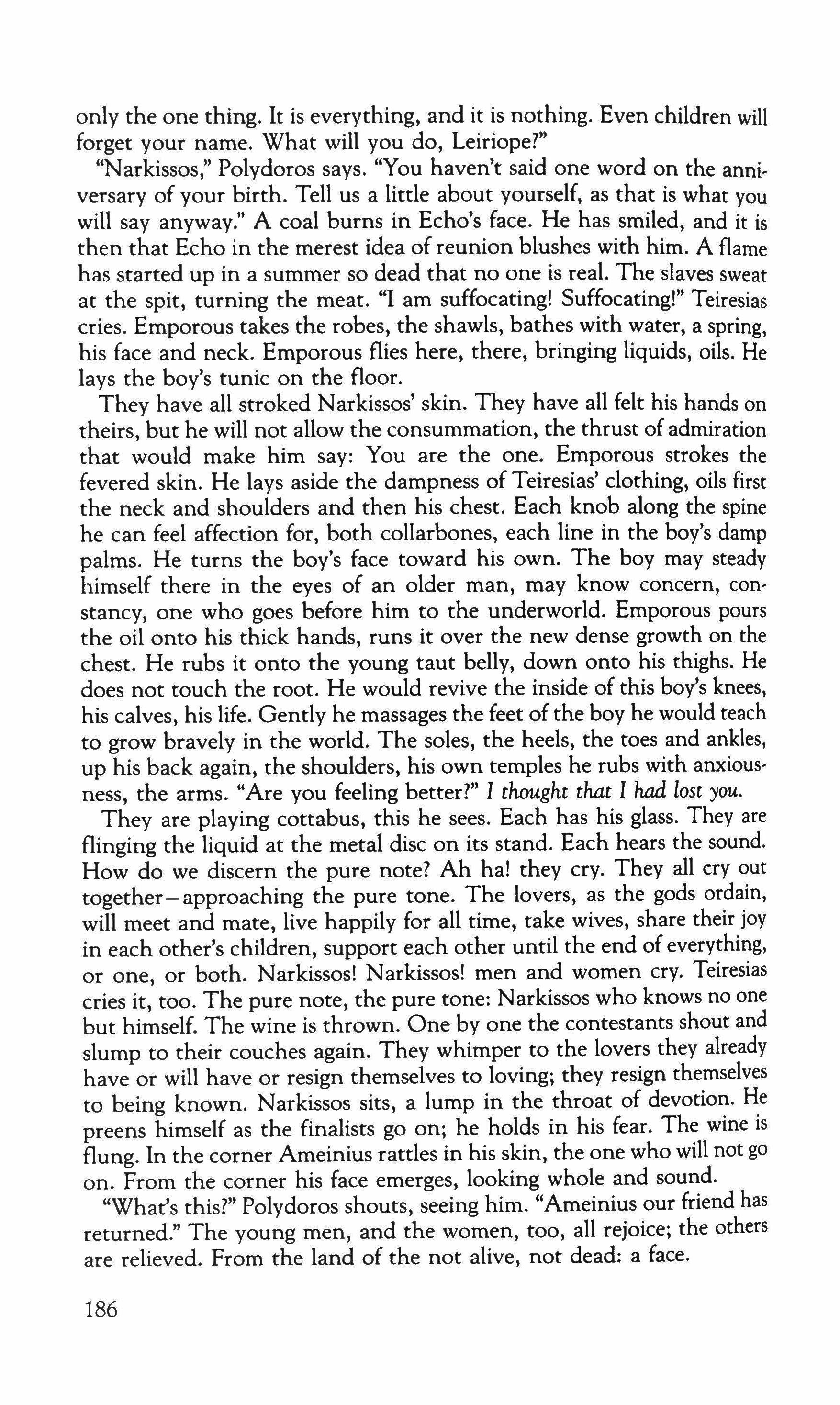
only the one thing. It is everything, and it is nothing. Even children will forget your name. What will you do, Leiriope?"
"Narkissos," Polydoros says. "You haven't said one word on the anniversary of your birth. Tell us a little about yourself, as that is what you will say anyway." A coal burns in Echo's face. He has smiled, and it is then that Echo in the merest idea of reunion blushes with him. A flame has started up in a summer so dead that no one is real. The slaves sweat at the spit, turning the meat. "I am suffocating! Suffocating!" Teiresias cries. Emporous takes the robes, the shawls, bathes with water, a spring, his face and neck. Emporous flies here, there, bringing liquids, oils. He lays the boy's tunic on the floor.
They have all stroked Narkissos' skin. They have all felt his hands on theirs, but he will not allow the consummation, the thrust of admiration that would make him say: You are the one. Emporous strokes the fevered skin. He lays aside the dampness of Teiresias' clothing, oils first the neck and shoulders and then his chest. Each knob along the spine he can feel affection for, both collarbones, each line in the boy's damp palms. He turns the boy's face toward his own. The boy may steady himself there in the eyes of an older man, may know concern, constancy, one who goes before him to the underworld. Emporous pours the oil onto his thick hands, runs it over the new dense growth on the chest. He rubs it onto the young taut belly, down onto his thighs. He does not touch the root. He would revive the inside of this boy's knees, his calves, his life. Gently he massages the feet of the boy he would teach to grow bravely in the world. The soles, the heels, the toes and ankles, up his back again, the shoulders, his own temples he rubs with anxiousness, the arms. "Are you feeling better?" I thought that I Iuullost you.
They are playing cottabus, this he sees. Each has his glass. They are flinging the liquid at the metal disc on its stand. Each hears the sound. How do we discern the pure note? Ah hal they cry. They all cry out together-approaching the pure tone. The lovers, as the gods ordain, will meet and mate, live happily for all time, take wives, share their joy in each other's children, support each other until the end of everything, or one, or both. Narkissos! Narkissos! men and women cry. Teiresias cries it, too. The pure note, the pure tone: Narkissos who knows no one but himself. The wine is thrown. One by one the contestants shout and slump to their couches again. They whimper to the lovers they already have or will have or resign themselves to loving; they resign themselves to being known. Narkissos sits, a lump in the throat of devotion. He preens himself as the finalists go on; he holds in his fear. The wine is flung. In the corner Ameinius rattles in his skin, the one who will not go on. From the corner his face emerges, looking whole and sound. "What's this?" Polydoros shouts, seeing him. "Ameinius our friend has returned." The young men, and the women, too, all rejoice; the others are relieved. From the land of the not alive, not dead: a face.
186
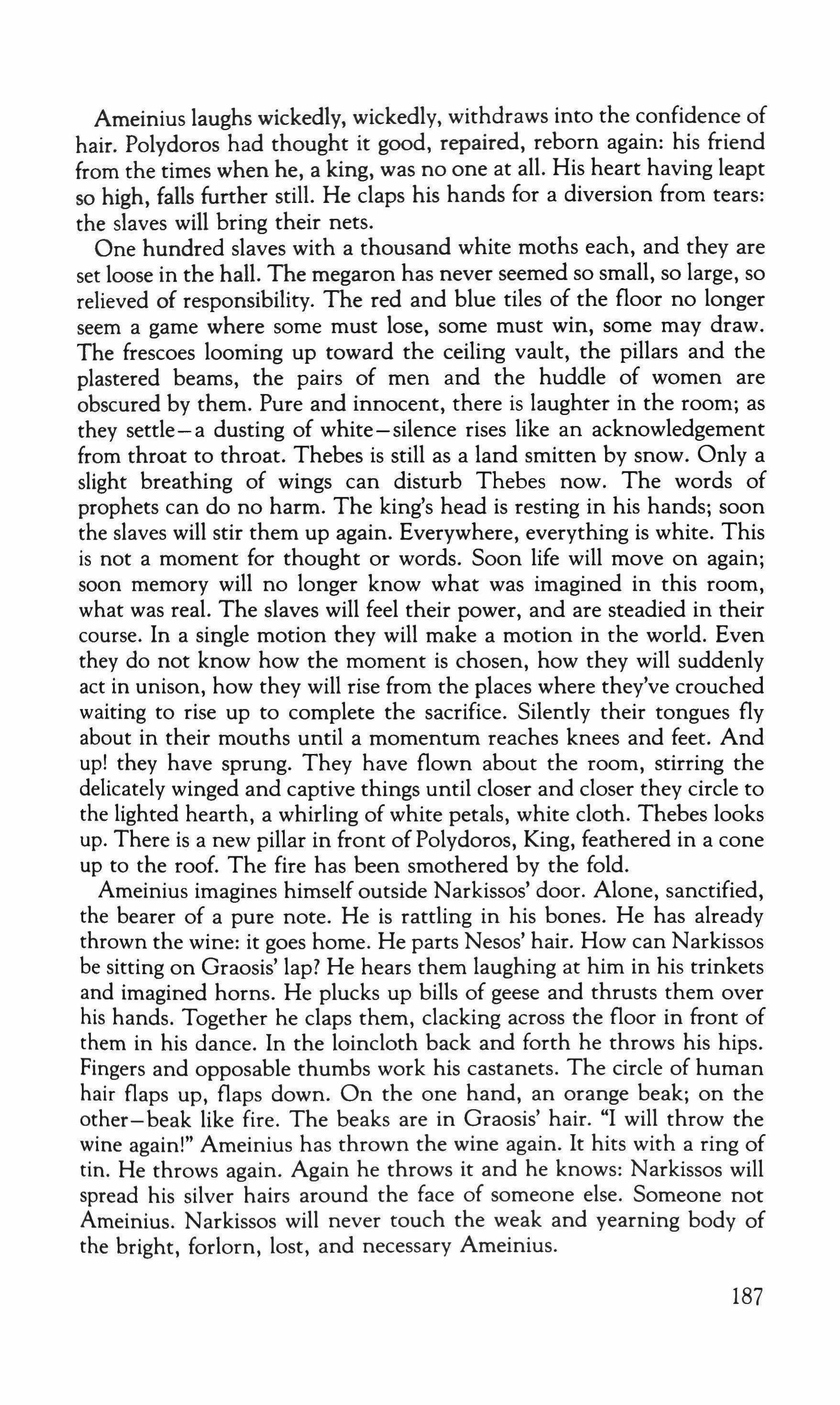
Ameinius laughs wickedly, wickedly, withdraws into the confidence of hair. Polydoros had thought it good, repaired, reborn again: his friend from the times when he, a king, was no one at all. His heart having leapt so high, falls further still. He claps his hands for a diversion from tears: the slaves will bring their nets.
One hundred slaves with a thousand white moths each, and they are set loose in the hall. The megaron has never seemed so small, so large, so relieved of responsibility. The red and blue tiles of the floor no longer seem a game where some must lose, some must win, some may draw. The frescoes looming up toward the ceiling vault, the pillars and the plastered beams, the pairs of men and the huddle of women are obscured by them. Pure and innocent, there is laughter in the room; as they settle-a dusting of white-silence rises like an acknowledgement from throat to throat. Thebes is still as a land smitten by snow. Only a slight breathing of wings can disturb Thebes now. The words of prophets can do no harm. The king's head is resting in his hands; soon the slaves will stir them up again. Everywhere, everything is white. This is not a moment for thought or words. Soon life will move on again; soon memory will no longer know what was imagined in this room, what was real. The slaves will feel their power, and are steadied in their course. In a single motion they will make a motion in the world. Even they do not know how the moment is chosen, how they will suddenly act in unison, how they will rise from the places where they've crouched waiting to rise up to complete the sacrifice. Silently their tongues fly about in their mouths until a momentum reaches knees and feet. And up! they have sprung. They have flown about the room, stirring the delicately winged and captive things until closer and closer they circle to the lighted hearth, a whirling of white petals, white cloth. Thebes looks up. There is a new pillar in front of Polydoros, King, feathered in a cone up to the roof. The fire has been smothered by the fold.
Ameinius imagines himself outside Narkissos' door. Alone, sanctified, the bearer of a pure note. He is rattling in his bones. He has already thrown the wine: it goes home. He parts Nesos' hair. How can Narkissos be sitting on Graosis' lap? He hears them laughing at him in his trinkets and imagined horns. He plucks up bills of geese and thrusts them over his hands. Together he claps them, clacking across the floor in front of them in his dance. In the loincloth back and forth he throws his hips. Fingers and opposable thumbs work his castanets. The circle of human hair flaps up, flaps down. On the one hand, an orange beak; on the other-beak like fire. The beaks are in Graosis' hair. "I will throw the wine again!" Ameinius has thrown the wine again. It hits with a ring of tin. He throws again. Again he throws it and he knows: Narkissos will spread his silver hairs around the face of someone else. Someone not Ameinius. Narkissos will never touch the weak and yearning body of the bright, forlorn, lost, and necessary Ameinius.
187
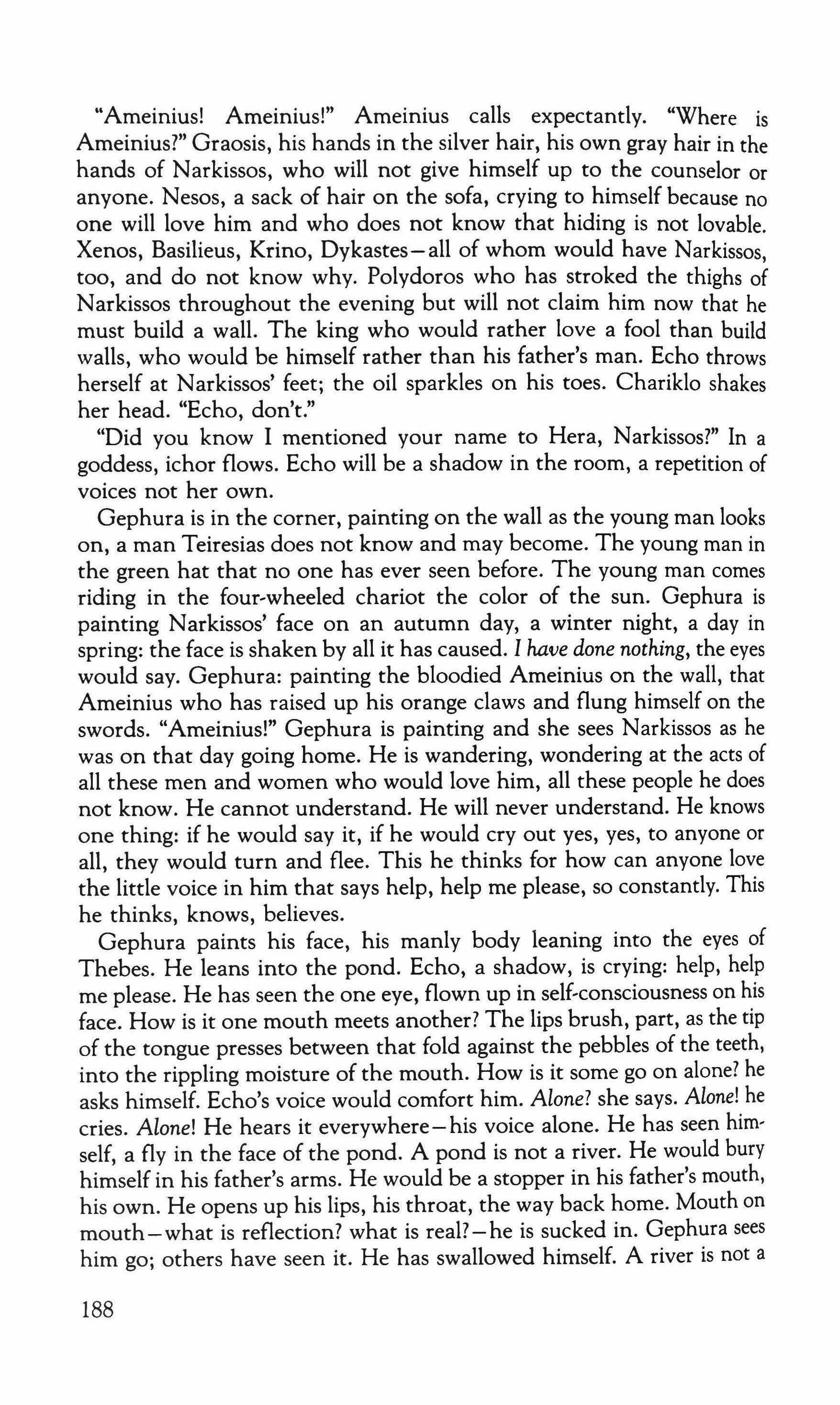
"Ameiniusl Ameinius!" Ameinius calls expectantly. "Where is Ameinius?" Graosis, his hands in the silver hair, his own gray hair in the hands of Narkissos, who will not give himself up to the counselor or anyone. Nesos, a sack of hair on the sofa, crying to himself because no one will love him and who does not know that hiding is not lovable. Xenos, Basilieus, Krino, Dvkasres=all of whom would have Narkissos, too, and do not know why. Polydoros who has stroked the thighs of Narkissos throughout the evening but will not claim him now that he must build a wall. The king who would rather love a fool than build walls, who would be himself rather than his father's man. Echo throws herself at Narkissos' feet; the oil sparkles on his toes. Chariklo shakes her head. "Echo, don't."
"Did you know I mentioned your name to Hera, Narkissos?" In a goddess, ichor flows. Echo will be a shadow in the room, a repetition of voices not her own.
Gephura is in the corner, painting on the wall as the young man looks on, a man Teiresias does not know and may become. The young man in the green hat that no one has ever seen before. The young man comes riding in the four-wheeled chariot the color of the sun. Gephura is painting Narkissos' face on an autumn day, a winter night, a day in spring: the face is shaken by all it has caused. I have done nothing, the eyes would say. Gephura: painting the bloodied Ameinius on the wall, that Ameinius who has raised up his orange claws and flung himself on the swords. "Arneiniusl" Gephura is painting and she sees Narkissos as he was on that day going home. He is wandering, wondering at the acts of all these men and women who would love him, all these people he does not know. He cannot understand. He will never understand. He knows one thing: if he would say it, if he would cry out yes, yes, to anyone or all, they would turn and flee. This he thinks for how can anyone love the little voice in him that says help, help me please, so constantly. This he thinks, knows, believes.
Gephura paints his face, his manly body leaning into the eyes of Thebes. He leans into the pond. Echo, a shadow, is crying: help, help me please. He has seen the one eye, flown up in self-consciousness on his face. How is it one mouth meets another? The lips brush, part, as the tip of the tongue presses between that fold against the pebbles of the teeth, into the rippling moisture of the mouth. How is it some go on alone? he asks himself. Echo's voice would comfort him. Alone? she says. Alone! he cries. Alone! He hears it everywhere-his voice alone. He has seen himself, a fly in the face of the pond. A pond is not a river. He would bury himself in his father's arms. He would be a stopper in his father's mouth, his own. He opens up his lips, his throat, the way back home. Mouth on mouth - what is reflection? what is real? - he is sucked in. Gephura sees him go; others have seen it. He has swallowed himself. A river is not a
188
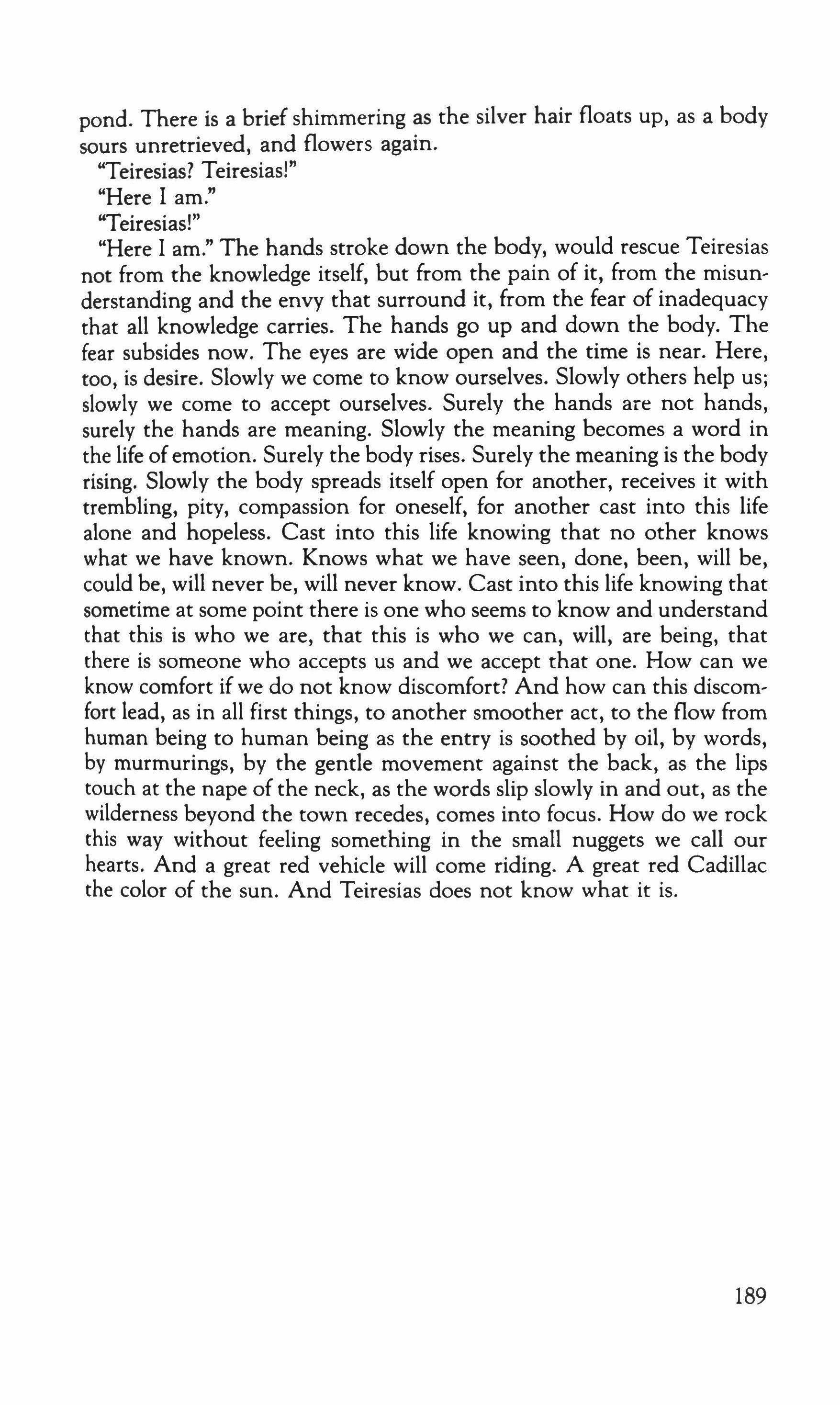
pond. There is a brief shimmering as the silver hair floats up, as a body sours unretrieved, and flowers again.
"Teiresias? Teiresias!"
"Here I am."
"Teiresias!"
"Here I am." The hands stroke down the body, would rescue Teiresias not from the knowledge itself, but from the pain of it, from the misunderstanding and the envy that surround it, from the fear of inadequacy that all knowledge carries. The hands go up and down the body. The fear subsides now. The eyes are wide open and the time is near. Here, too, is desire. Slowly we come to know ourselves. Slowly others help us; slowly we come to accept ourselves. Surely the hands are not hands, surely the hands are meaning. Slowly the meaning becomes a word in the life of emotion. Surely the body rises. Surely the meaning is the body rising. Slowly the body spreads itself open for another, receives it with trembling, pity, compassion for oneself, for another cast into this life alone and hopeless. Cast into this life knowing that no other knows what we have known. Knows what we have seen, done, been, will be, could be, will never be, will never know. Cast into this life knowing that sometime at some point there is one who seems to know and understand that this is who we are, that this is who we can, will, are being, that there is someone who accepts us and we accept that one. How can we know comfort if we do not know discomfort? And how can this discomfort lead, as in all first things, to another smoother act, to the flow from human being to human being as the entry is soothed by oil, by words, by murmurings, by the gentle movement against the back, as the lips touch at the nape of the neck, as the words slip slowly in and out, as the wilderness beyond the town recedes, comes into focus. How do we rock this way without feeling something in the small nuggets we call our hearts. And a great red vehicle will come riding. A great red Cadillac the color of the sun. And Teiresias does not know what it is.
189
Three Stories
Kobo Abe

The Red Cocoon
The sun is starting to set. It's the time when people hurry home to their roosts, but I don't have a roost to go back to. I go on walking slowly down the narrow cleft between the houses. Although there are so many houses lined up along the streets, why is there not one house which is mine? - I think, repeating the same question for the hundredth time.
When I take a piss against a telephone pole, sometimes there's a scrap of rope hanging down, and I want to hang myself. The rope, looking at my neck out of the corner of its eye, says: "Let's rest, brother." And I want to rest, too. But I can't rest. I'm not the rope's brother, and besides, I still can't understand why I don't have a house.
Every day, night comes. When night comes, you have to rest. Houses are to rest in. If that's so, it's not that I don't have a house, is it?
Suddenly, I get an idea. Maybe I've been making a serious mistake in my thinking. Maybe it's not that I don't have a house, but that I've forgotten it. That's right, it could be. For example, I stop in front of this house I happen to be passing. Might not this be my house? Of course, compared to other houses, it has no special feature that particularly breathes out that possibility, but one could say the same of any house. That cannot be a proofcanceling the fact that this may be my house. I'm feeling brave. O.K., let's knock on the door.
I'm in luck. The smiling face of a woman looks out of a half-opened window. She seems kind. The wind of hope blows through the neighborhood of my heart. My heart becomes a flag that spreads out flat and flutters in the wind. I smile, too. Like a real gentleman, I say:
Translated from the Japanese originals, "Kozui," "Akai Mavu" and "Bo" © Kobo Abe. English translation © 1984 by Lane Dunlop. All rights reserved. By permission of ICM, 40 West 57th Street, New York, New York 10019.
190
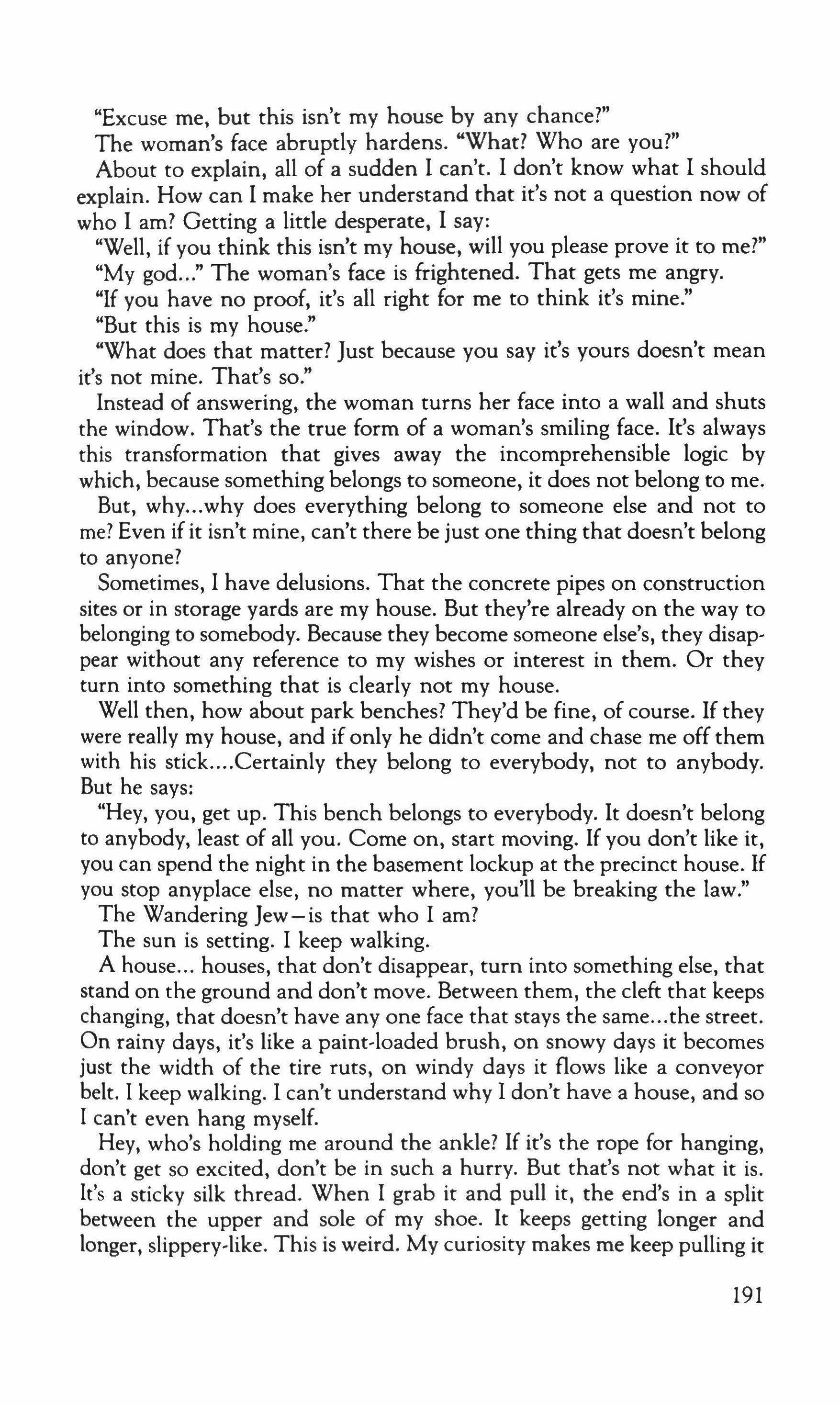
"Excuse me, but this isn't my house by any chance?"
The woman's face abruptly hardens. "What? Who are you?"
About to explain, all of a sudden I can't. I don't know what I should explain. How can I make her understand that it's not a question now of who I am? Getting a little desperate, I say:
"Well, if you think this isn't my house, will you please prove it to me?"
"My god The woman's face is frightened. That gets me angry.
"If you have no proof, it's all right for me to think it's mine."
"But this is my house."
"What does that matter? Just because you say it's yours doesn't mean it's not mine. That's so."
Instead of answering, the woman turns her face into a wall and shuts the window. That's the true form of a woman's smiling face. It's always this transformation that gives away the incomprehensible logic by which, because something belongs to someone, it does not belong to me.
But, why why does everything belong to someone else and not to me? Even if it isn't mine, can't there be just one thing that doesn't belong to anyone?
Sometimes, I have delusions. That the concrete pipes on construction sites or in storage yards are my house. But they're already on the way to belonging to somebody. Because they become someone else's, they disappear without any reference to my wishes or interest in them. Or they turn into something that is clearly not my house.
Well then, how about park benches? They'd be fine, of course. If they were really my house, and if only he didn't come and chase me off them with his stick Certainly they belong to everybody, not to anybody. But he says:
"Hey, you, get up. This bench belongs to everybody. It doesn't belong to anybody, least of all you. Come on, start moving. If you don't like it, you can spend the night in the basement lockup at the precinct house. If you stop anyplace else, no matter where, you'll be breaking the law."
The Wandering Jew-is that who I am?
The sun is setting. I keep walking.
A house houses, that don't disappear, turn into something else, that stand on the ground and don't move. Between them, the cleft that keeps changing, that doesn't have anyone face that stays the same the street. On rainy days, it's like a paint-loaded brush, on snowy days it becomes just the width of the tire ruts, on windy days it flows like a conveyor belt. I keep walking. I can't understand why I don't have a house, and so I can't even hang myself.
Hey, who's holding me around the ankle? If it's the rope for hanging, don't get so excited, don't be in such a hurry. But that's not what it is. It's a sticky silk thread. When I grab it and pull it, the end's in a split between the upper and sole of my shoe. It keeps getting longer and longer, slippery-like. This is weird. My curiosity makes me keep pulling it
191
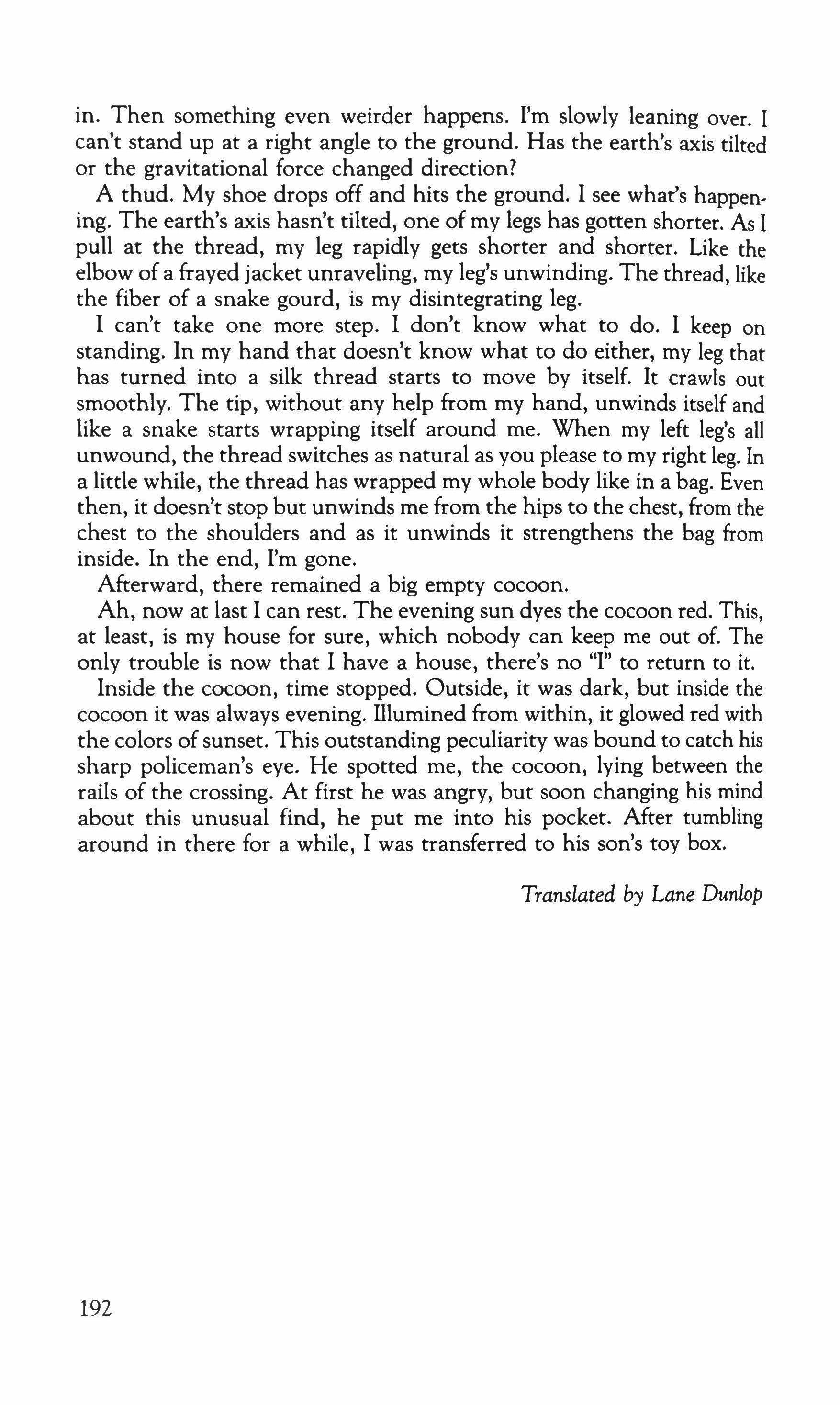
in. Then something even weirder happens. I'm slowly leaning over. I can't stand up at a right angle to the ground. Has the earth's axis tilted or the gravitational force changed direction?
A thud. My shoe drops off and hits the ground. I see what's happening. The earth's axis hasn't tilted, one of my legs has gotten shorter. As I pull at the thread, my leg rapidly gets shorter and shorter. Like the elbow of a frayed jacket unraveling, my leg's unwinding. The thread, like the fiber of a snake gourd, is my disintegrating leg.
I can't take one more step. I don't know what to do. I keep on standing. In my hand that doesn't know what to do either, my leg that has turned into a silk thread starts to move by itself. It crawls out smoothly. The tip, without any help from my hand, unwinds itself and like a snake starts wrapping itself around me. When my left leg's all unwound, the thread switches as natural as you please to my right leg. In a little while, the thread has wrapped my whole body like in a bag. Even then, it doesn't stop but unwinds me from the hips to the chest, from the chest to the shoulders and as it unwinds it strengthens the bag from inside. In the end, I'm gone.
Afterward, there remained a big empty cocoon.
Ah, now at last I can rest. The evening sun dyes the cocoon red. This, at least, is my house for sure, which nobody can keep me out of. The only trouble is now that I have a house, there's no "I" to return to it.
Inside the cocoon, time stopped. Outside, it was dark, but inside the cocoon it was always evening. Illumined from within, it glowed red with the colors of sunset. This outstanding peculiarity was bound to catch his sharp policeman's eye. He spotted me, the cocoon, lying between the rails of the crossing. At first he was angry, but soon changing his mind about this unusual find, he put me into his pocket. After tumbling around in there for a while, I was transferred to his son's toy box.
Translated by Lane Dunlop
192
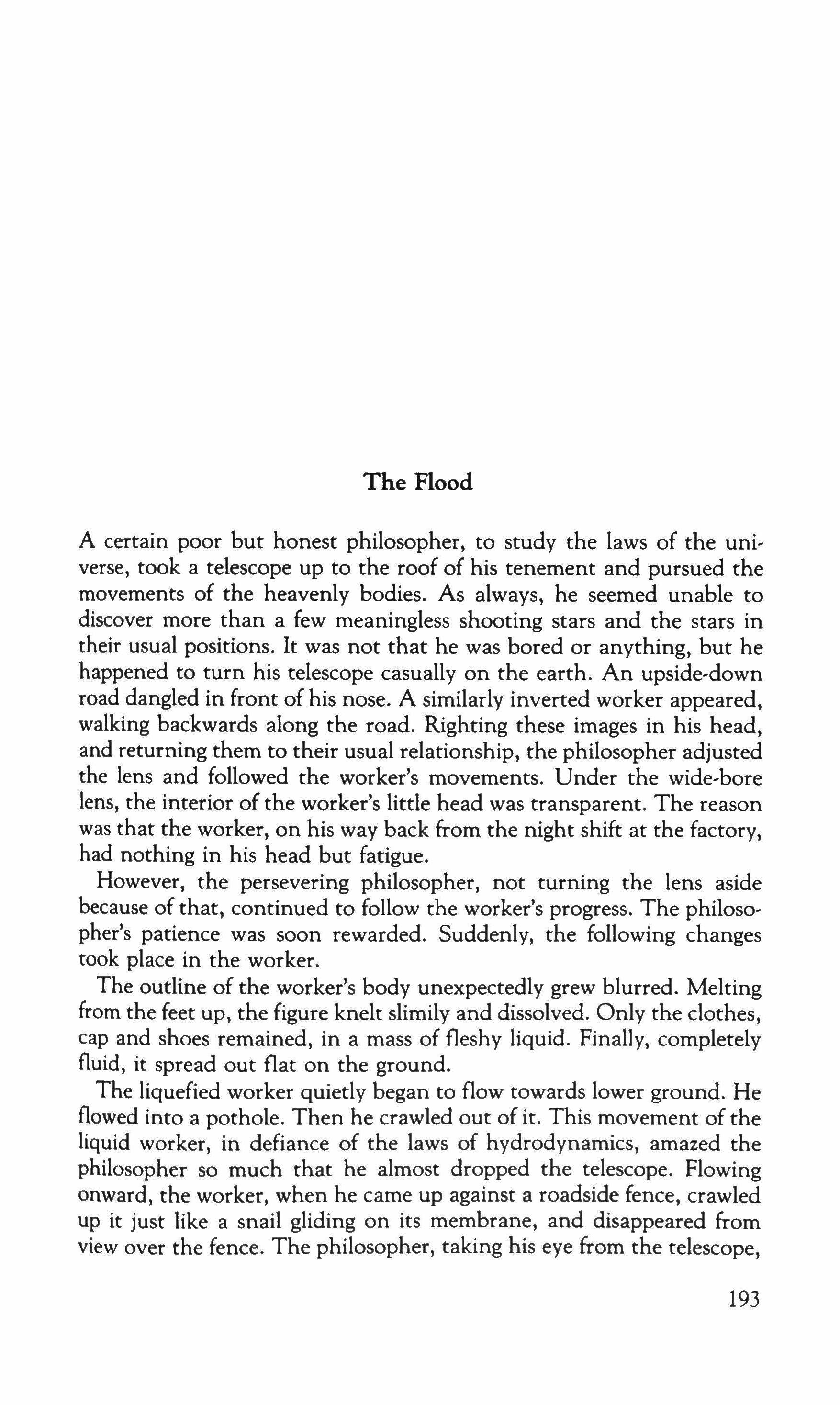
The Flood
A certain poor but honest philosopher, to study the laws of the universe, took a telescope up to the roof of his tenement and pursued the movements of the heavenly bodies. As always, he seemed unable to discover more than a few meaningless shooting stars and the stars in their usual positions. It was not that he was bored or anything, but he happened to turn his telescope casually on the earth. An upside-down road dangled in front of his nose. A similarly inverted worker appeared, walking backwards along the road. Righting these images in his head, and returning them to their usual relationship, the philosopher adjusted the lens and followed the worker's movements. Under the wide-bore lens, the interior of the worker's little head was transparent. The reason was that the worker, on his way back from the night shift at the factory, had nothing in his head but fatigue.
However, the persevering philosopher, not turning the lens aside because of that, continued to follow the worker's progress. The philosopher's patience was soon rewarded. Suddenly, the following changes took place in the worker.
The outline of the worker's body unexpectedly grew blurred. Melting from the feet up, the figure knelt slimily and dissolved. Only the clothes, cap and shoes remained, in a mass of fleshy liquid. Finally, completely fluid, it spread out flat on the ground.
The liquefied worker quietly began to flow towards lower ground. He flowed into a pothole. Then he crawled out of it. This movement of the liquid worker, in defiance of the laws of hydrodynamics, amazed the philosopher so much that he almost dropped the telescope. Flowing onward, the worker, when he came up against a roadside fence, crawled up it just like a snail gliding on its membrane, and disappeared from view over the fence. The philosopher, taking his eye from the telescope,
193

heaved a deep sigh. The next day, he announced to the world the coming of a great flood.
Actually, everywhere in the world, the liquefaction of workers and poor people had begun. Particularly remarkable were the group liquefactions. In a large factory, the machinery would suddenly stop. The workers, deliquescing all at once, would form a single mass of liquid that flowed in a stream under the door or, crawling up the wall, flowed out the window. Sometimes, the process was reversed: after the workers had turned into liquid, only the machinery, in the deserted factory, would senselessly continue running and in the end break down. In addition, breakouts from prisons due to the mass liquefaction of the prisoners and small floods caused by the liquefaction of the whole population of farm villages were reported one after another in the newspapers.
The liquefaction of human beings, not limited to this kind ofphenomenal abnormality, occasioned confusion in a variety of ways. Perfect crimes due to the liquefaction of the criminal increased dramatically. Law and order were threatened. The police, secretly mobilizing the physicists, began an investigation of the properties of this water. But the liquid, completely ignoring the scientific laws of fluids, merely plunged the physicists into ludicrous confusion. Although to the touch it was in no way different from ordinary water, at times it displayed a strong surface tension like mercury and could retain its shape like amoebae, so that not only could it crawl, as indicated before, from a low to a higher place, but after blending perfectly with its fellow liquefied people and other natural liquids, at some impulse or other it could also separate itself into its original volume. Again, conversely, it sometimes displayed a weak surface tension like alcohol. At such times, it had an extraordinary power of permeation vis-a-vis all solids. E.g., at times, probably in relation to differences in its use, with the same kind of paper it could either have absolutely no effect or could chemically dissolve it.
The liquefied human beings were also able to freeze or evaporate. Their freezing and evaporation points were various. Sleighs running over thick ice would be swallowed up horse-and-all by the suddenly melted ice; front-runners in skating contests would abruptly vanish. Again, swimming pools would suddenly freeze in midsummer, sealing up girls who'd been swimming in them in frozen poses in the ice. The liquid human beings crawled up mountains, mixed with rivers, crossed oceans, evaporated into clouds and fell as rain, so that they spread all over the world. One could never tell what kind of thing was going to happen when and where. Chemistry experiments became well-nigh impossible. The boilers of steam engines, because of an admixture of liquid people, became completely unserviceable. No matter how much they were stoked, no pressure built up. Or all of a sudden the liquid people would violently expand and explode the boiler. Fish and plants that had a vital relationship to water were in a state of chaos beyond description. In
194
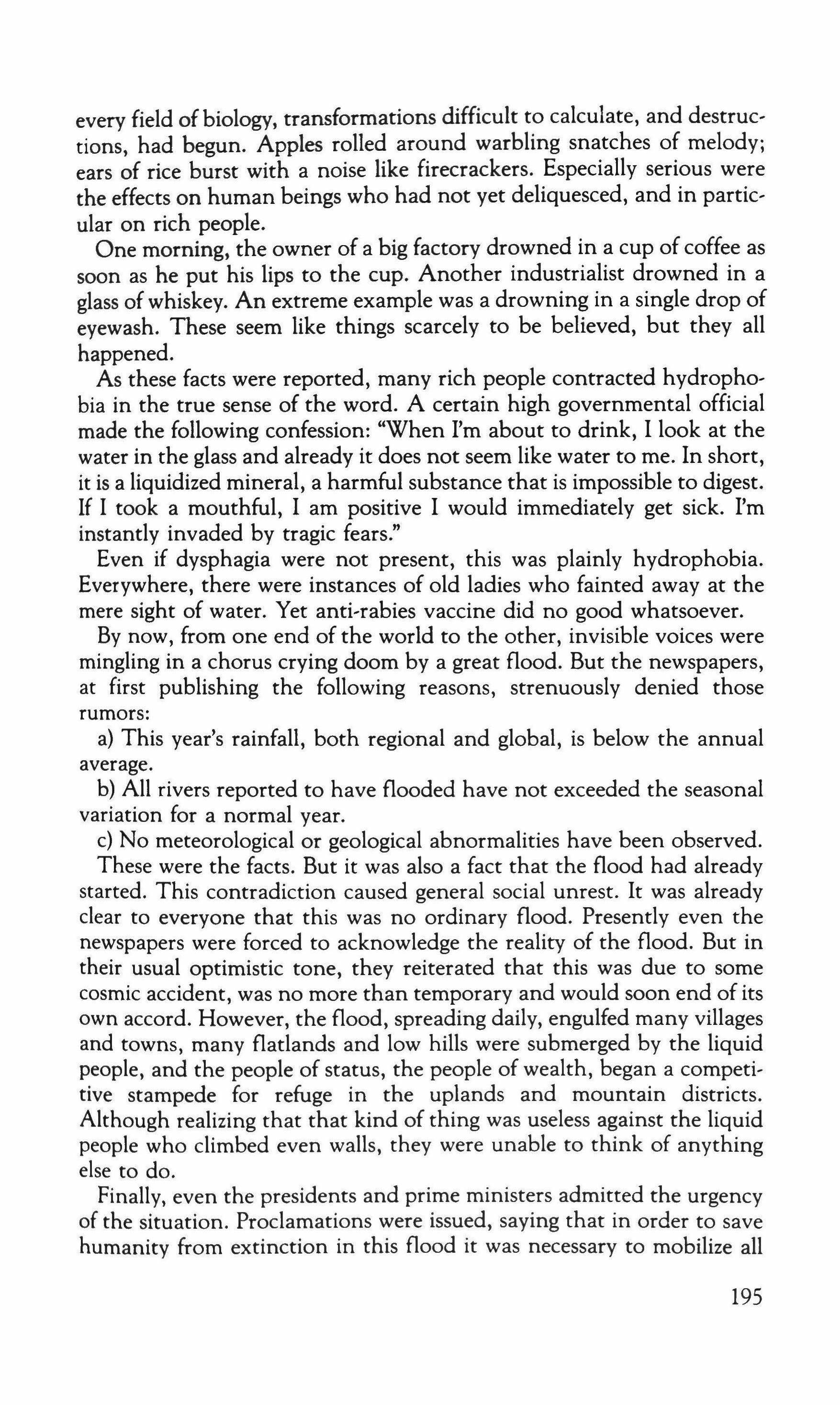
every field ofbiology, transformations difficult to calculate, and destructions, had begun. Apples rolled around warbling snatches of melody; ears of rice burst with a noise like firecrackers. Especially serious were the effects on human beings who had not yet deliquesced, and in partieular on rich people.
One morning, the owner of a big factory drowned in a cup of coffee as soon as he put his lips to the cup. Another industrialist drowned in a glass of whiskey. An extreme example was a drowning in a single drop of eyewash. These seem like things scarcely to be believed, but they all happened.
As these facts were reported, many rich people contracted hydrophobia in the true sense of the word. A certain high governmental official made the following confession: "When I'm about to drink, I look at the water in the glass and already it does not seem like water to me. In short, it is a liquidized mineral, a harmful substance that is impossible to digest. If I took a mouthful, I am positive I would immediately get sick. I'm instantly invaded by tragic fears."
Even if dysphagia were not present, this was plainly hydrophobia. Everywhere, there were instances of old ladies who fainted away at the mere sight of water. Yet anti-rabies vaccine did no good whatsoever. By now, from one end of the world to the other, invisible voices were mingling in a chorus crying doom by a great flood. But the newspapers, at first publishing the following reasons, strenuously denied those rumors:
a) This year's rainfall, both regional and global, is below the annual average.
b) All rivers reported to have flooded have not exceeded the seasonal variation for a normal year.
c) No meteorological or geological abnormalities have been observed. These were the facts. But it was also a fact that the flood had already started. This contradiction caused general social unrest. It was already clear to everyone that this was no ordinary flood. Presently even the newspapers were forced to acknowledge the reality of the flood. But in their usual optimistic tone, they reiterated that this was due to some cosmic accident, was no more than temporary and would soon end of its own accord. However, the flood, spreading daily, engulfed many villages and towns, many flatlands and low hills were submerged by the liquid people, and the people of status, the people of wealth, began a competitive stampede for refuge in the uplands and mountain districts. Although realizing that that kind of thing was useless against the liquid people who climbed even walls, they were unable to think of anything else to do.
Finally, even the presidents and prime ministers admitted the urgency of the situation. Proclamations were issued, saying that in order to save humanity from extinction in this flood it was necessary to mobilize all
195
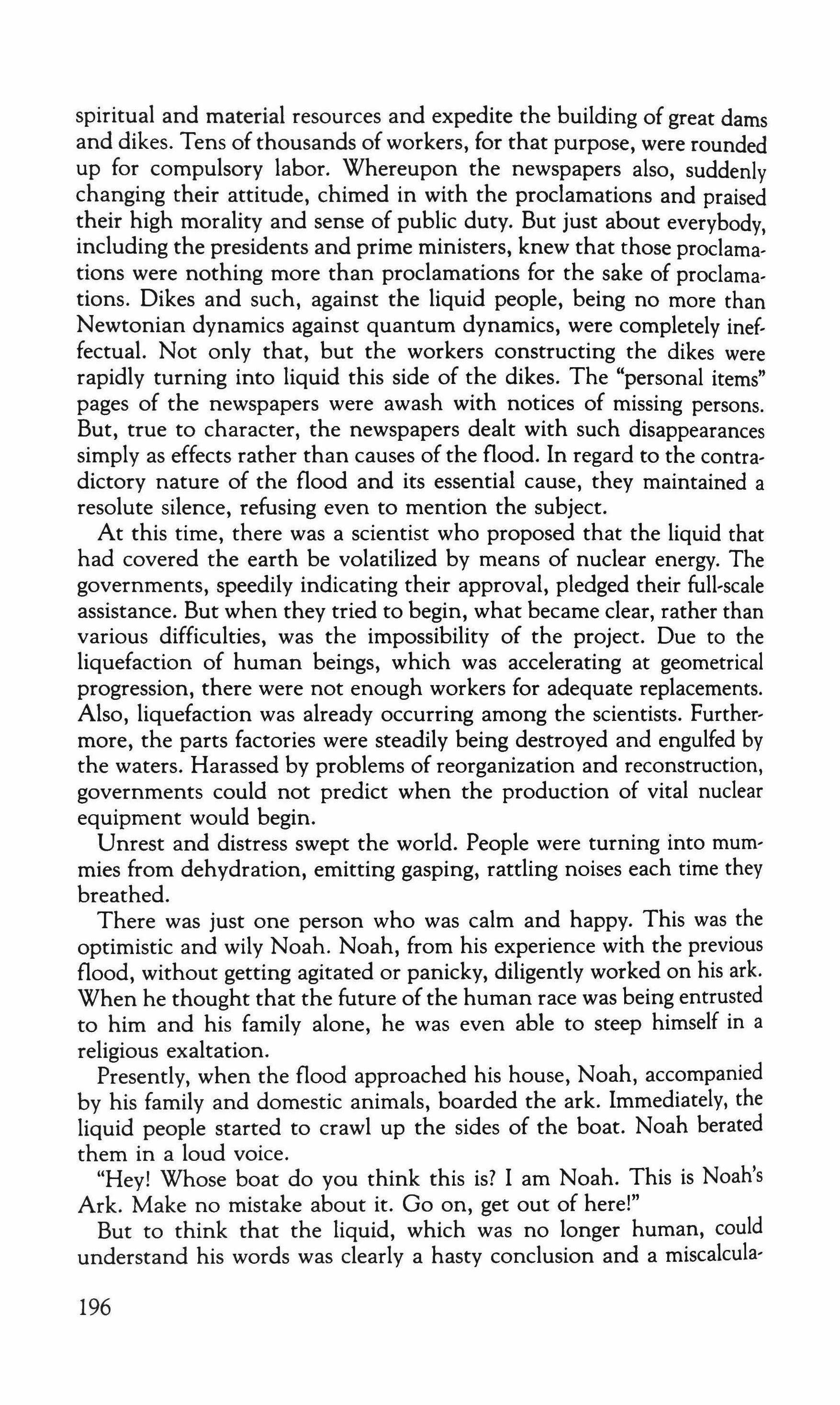
spiritual and material resources and expedite the building of great dams and dikes. Tens of thousands of workers, for that purpose, were rounded up for compulsory labor. Whereupon the newspapers also, suddenly changing their attitude, chimed in with the proclamations and praised their high morality and sense of public duty. But just about everybody, including the presidents and prime ministers, knew that those proclamations were nothing more than proclamations for the sake of proclamations. Dikes and such, against the liquid people, being no more than Newtonian dynamics against quantum dynamics, were completely ineffectual. Not only that, but the workers constructing the dikes were rapidly turning into liquid this side of the dikes. The "personal items" pages of the newspapers were awash with notices of missing persons. But, true to character, the newspapers dealt with such disappearances simply as effects rather than causes of the flood. In regard to the contradictory nature of the flood and its essential cause, they maintained a resolute silence, refusing even to mention the subject.
At this time, there was a scientist who proposed that the liquid that had covered the earth be volatilized by means of nuclear energy. The governments, speedily indicating their approval, pledged their full-scale assistance. But when they tried to begin, what became clear, rather than various difficulties, was the impossibility of the project. Due to the liquefaction of human beings, which was accelerating at geometrical progression, there were not enough workers for adequate replacements. Also, liquefaction was already occurring among the scientists. Furthermore, the parts factories were steadily being destroyed and engulfed by the waters. Harassed by problems of reorganization and reconstruction, governments could not predict when the production of vital nuclear equipment would begin.
Unrest and distress swept the world. People were turning into mummies from dehydration, emitting gasping, rattling noises each time they breathed.
There was just one person who was calm and happy. This was the optimistic and wily Noah. Noah, from his experience with the previous flood, without getting agitated or panicky, diligently worked on his ark. When he thought that the future of the human race was being entrusted to him and his family alone, he was even able to steep himself in a religious exaltation.
Presently, when the flood approached his house, Noah, accompanied by his family and domestic animals, boarded the ark. Immediately, the liquid people started to crawl up the sides of the boat. Noah berated them in a loud voice.
"Hey! Whose boat do you think this is? I am Noah. This is Noah's Ark. Make no mistake about it. Go on, get out of here!"
But to think that the liquid, which was no longer human, could understand his words was clearly a hasty conclusion and a miscalcula-
196

tion. For liquid, there are only concerns of liquid. The next minute, the ark filled up with liquid and the living creatures drowned. The derelict ark drifted at the mercy of the wind.
In this manner, humanity perished in the Second Flood. But, if you could have looked at the street corners and under the trees of the villages at the bottom ofthe now-peaceful waters, you would have seen a glittering substance starting to crystalize. Probably around the invisible core of the super-saturated liquid people.
Translated by Lane Dunlop
197
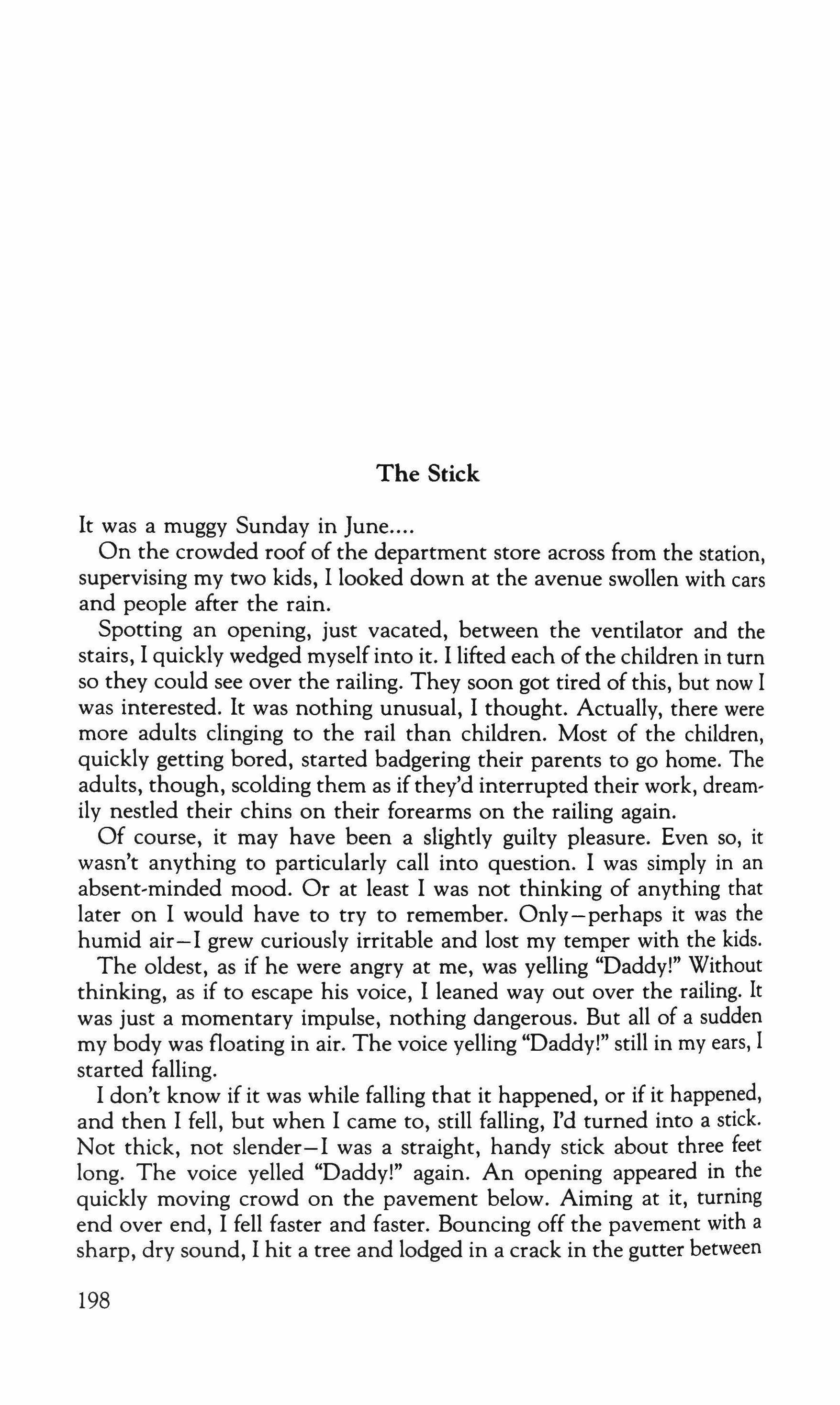
The Stick
It was a muggy Sunday in June
On the crowded roof of the department store across from the station, supervising my two kids, I looked down at the avenue swollen with cars and people after the rain.
Spotting an opening, just vacated, between the ventilator and the stairs, I quickly wedged myself into it. I lifted each of the children in turn so they could see over the railing. They soon got tired of this, but now I was interested. It was nothing unusual, I thought. Actually, there were more adults clinging to the rail than children. Most of the children, quickly getting bored, started badgering their parents to go home. The adults, though, scolding them as if they'd interrupted their work, dreamily nestled their chins on their forearms on the railing again.
Of course, it may have been a slightly guilty pleasure. Even so, it wasn't anything to particularly call into question. I was simply in an absent-minded mood. Or at least I was not thinking of anything that later on I would have to try to remember. Only-perhaps it was the humid air-I grew curiously irritable and lost my temper with the kids.
The oldest, as if he were angry at me, was yelling "Daddy!" Without thinking, as if to escape his voice, I leaned way out over the railing. It was just a momentary impulse, nothing dangerous. But all of a sudden my body was floating in air. The voice yelling "Daddy!" still in my ears, I started falling.
I don't know if it was while falling that it happened, or if it happened, and then I fell, but when I came to, still falling, I'd turned into a stick. Not thick, not slender-I was a straight, handy stick about three feet long. The voice yelled "Daddy!" again. An opening appeared in the quickly moving crowd on the pavement below. Aiming at it, turning end over end, I fell faster and faster. Bouncing off the pavement with a sharp, dry sound, I hit a tree and lodged in a crack in the gutter between
198
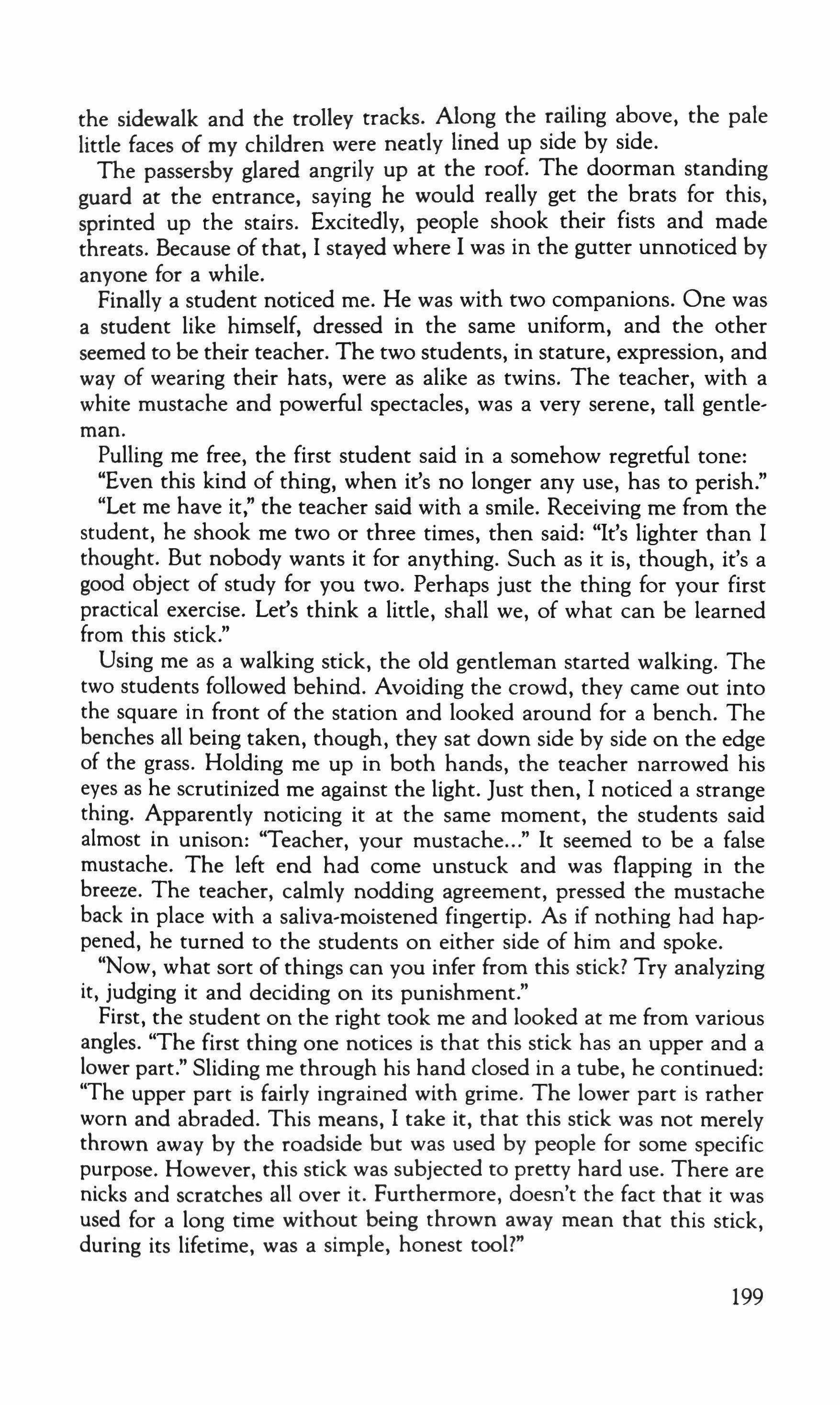
the sidewalk and the trolley tracks. Along the railing above, the pale little faces of my children were neatly lined up side by side.
The passersby glared angrily up at the roof. The doorman standing guard at the entrance, saying he would really get the brats for this, sprinted up the stairs. Excitedly, people shook their fists and made threats. Because of that, I stayed where I was in the gutter unnoticed by anyone for a while.
Finally a student noticed me. He was with two companions. One was a student like himself, dressed in the same uniform, and the other seemed to be their teacher. The two students, in stature, expression, and way of wearing their hats, were as alike as twins. The teacher, with a white mustache and powerful spectacles, was a very serene, tall gentleman.
Pulling me free, the first student said in a somehow regretful tone:
"Even this kind of thing, when it's no longer any use, has to perish."
"Let me have it," the teacher said with a smile. Receiving me from the student, he shook me two or three times, then said: "It's lighter than I thought. But nobody wants it for anything. Such as it is, though, it's a good object of study for you two. Perhaps just the thing for your first practical exercise. Let's think a little, shall we, of what can be learned from this stick."
Using me as a walking stick, the old gentleman started walking. The two students followed behind. Avoiding the crowd, they came out into the square in front of the station and looked around for a bench. The benches all being taken, though, they sat down side by side on the edge of the grass. Holding me up in both hands, the teacher narrowed his eyes as he scrutinized me against the light. Just then, I noticed a strange thing. Apparently noticing it at the same moment, the students said almost in unison: "Teacher, your mustache It seemed to be a false mustache. The left end had come unstuck and was flapping in the breeze. The teacher, calmly nodding agreement, pressed the mustache back in place with a saliva-moistened fingertip. As if nothing had happened, he turned to the students on either side of him and spoke.
"Now, what sort of things can you infer from this stick? Try analyzing it, judging it and deciding on its punishment."
First, the student on the right took me and looked at me from various angles. "The first thing one notices is that this stick has an upper and a lower part." Sliding me through his hand closed in a tube, he continued: "The upper part is fairly ingrained with grime. The lower part is rather worn and abraded. This means, I take it, that this stick was not merely thrown away by the roadside but was used by people for some specific purpose. However, this stick was subjected to pretty hard use. There are nicks and scratches all over it. Furthermore, doesn't the fact that it was used for a long time without being thrown away mean that this stick, during its lifetime, was a simple, honest tool?"
199
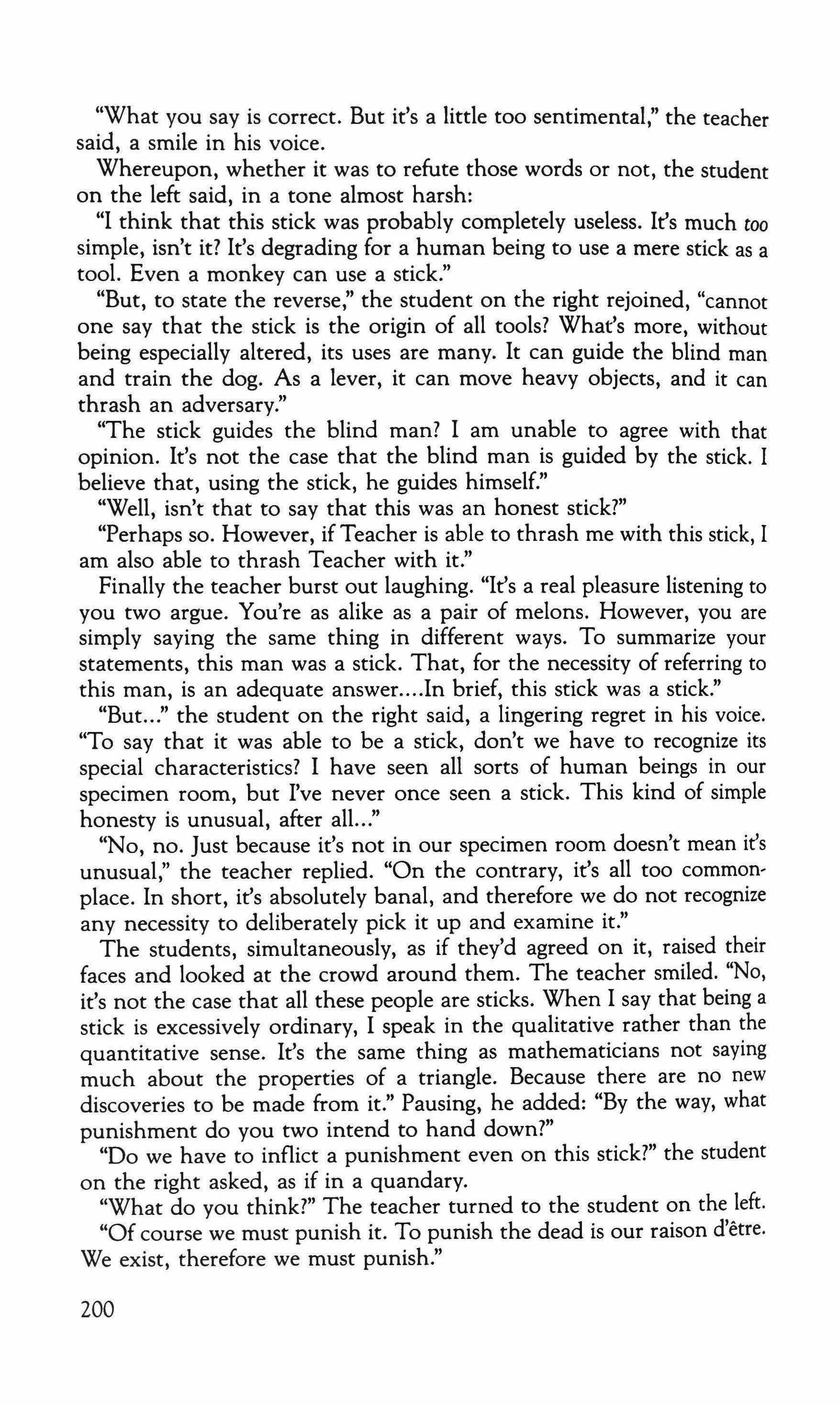
"What you say is correct. But it's a little too sentimental," the teacher said, a smile in his voice.
Whereupon, whether it was to refute those words or not, the student on the left said, in a tone almost harsh:
"1 think that this stick was probably completely useless. It's much too simple, isn't it? It's degrading for a human being to use a mere stick as a tool. Even a monkey can use a stick."
"But, to state the reverse," the student on the right rejoined, "cannot one say that the stick is the origin of all tools? What's more, without being especially altered, its uses are many. It can guide the blind man and train the dog. As a lever, it can move heavy objects, and it can thrash an adversary."
"The stick guides the blind man? 1 am unable to agree with that opinion. It's not the case that the blind man is guided by the stick. I believe that, using the stick, he guides himself."
"Well, isn't that to say that this was an honest stick?"
"Perhaps so. However, if Teacher is able to thrash me with this stick, I am also able to thrash Teacher with it."
Finally the teacher burst out laughing. "It's a real pleasure listening to you two argue. You're as alike as a pair of melons. However, you are simply saying the same thing in different ways. To summarize your statements, this man was a stick. That, for the necessity of referring to this man, is an adequate answer ln brief, this stick was a stick."
"But the student on the right said, a lingering regret in his voice. "To say that it was able to be a stick, don't we have to recognize its special characteristics? 1 have seen all sorts of human beings in our specimen room, but I've never once seen a stick. This kind of simple honesty is unusual, after all
"No, no. Just because it's not in our specimen room doesn't mean it's unusual," the teacher replied. "On the contrary, it's all too commonplace. In short, it's absolutely banal, and therefore we do not recognize any necessity to deliberately pick it up and examine it."
The students, simultaneously, as if they'd agreed on it, raised their faces and looked at the crowd around them. The teacher smiled. "No, it's not the case that all these people are sticks. When 1 say that being a stick is excessively ordinary, I speak in the qualitative rather than the quantitative sense. It's the same thing as mathematicians not saying much about the properties of a triangle. Because there are no new discoveries to be made from it." Pausing, he added: "By the way, what punishment do you two intend to hand down?"
"Do we have to inflict a punishment even on this stick?" the student on the right asked, as if in a quandary.
"What do you think?" The teacher turned to the student on the left.
"Of course we must punish it. To punish the dead is our raison d'etre. We exist, therefore we must punish."
200

"Well, then, what is the appropriate punishment?"
The two students each thought hard for a while. The teacher, taking me, idly began drawing something in the dirt. It was a diagram without any abstract meaning. It soon sprouted arms and legs and became the figure of a monster. Then, he began erasing the picture. When he'd finished, he stood up and, gazing into the distance, he muttered: "Even you two must have thought long enough by now. The answer is so difficult because it's too simple. Surely you remember it from one of my lectures Those who are judged by not being judged "I remember," both students said at once. "It's enough for courts on earth to judge a certain percentage ofthe population. But we, until there are immortal human beings, have to judge them all. Compared to the number of people, however, we are extremely few. If we had to judge all the dead in the same way, we would probably work ourselves to death. Fortunately, there exists this convenient category of people whom we judge by not judging
"This stick is a representative example of that category." Smiling, the teacher let go of me. I fell down, and started to roll away. Stopping me with the tip of his shoe, the teacher said: "Therefore, the best punish, ment is to leave it behind like this. Most likely someone will pick it up and, just as during its lifetime, use it as a stick in various ways."
One of the students, as if it had just occurred to him, said: "What would this stick have thought if it could have heard us?"
The teacher looked at the student as if pitying him, but said nothing. Then, urging the two, he started walking. The students, seemingly worried about me, turned around and looked back at me several times. Soon, however, they were swallowed up by the crowd and disappeared. Somebody stepped on me. I was pressed halfway into the rain-softened dirt.
"Daddy, Daddy, Daddy I heard voices calling. They sounded like my children, and they didn't sound like my children. It would not be strange if, among the thousands of children in this crowd, there were many others who had to call out their father's name.
Translated by Lane Dunlop
201
Contributors
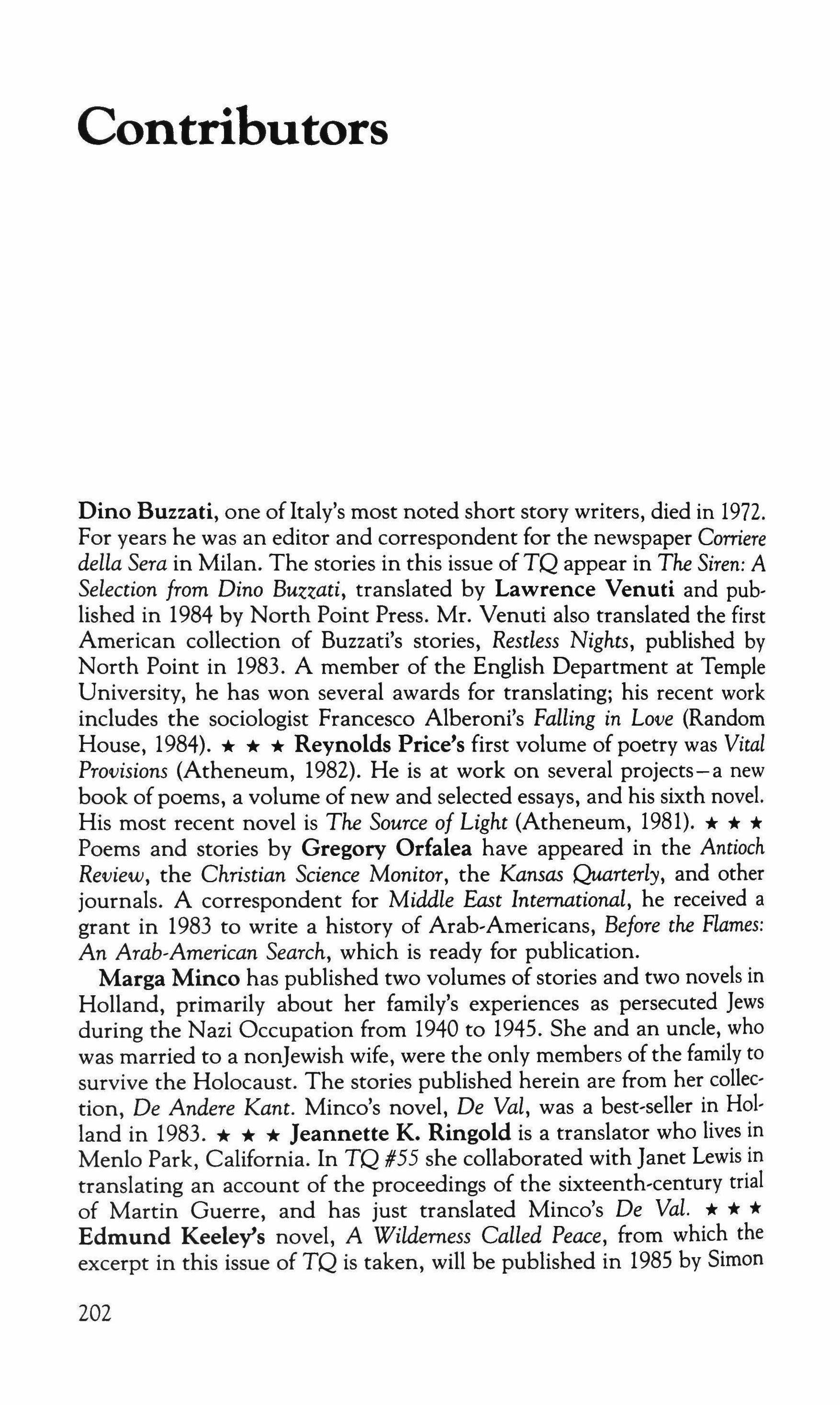
Dino Buzzati, one ofItaly's most noted short story writers, died in 1972. For years he was an editor and correspondent for the newspaper Corriere della Sera in Milan. The stories in this issue of TQ appear in The Siren: A Selection from Dino Buzzati, translated by Lawrence Venuti and published in 1984 by North Point Press. Mr. Venuti also translated the first American collection of Buzzati's stories, Restless Nights, published by North Point in 1983. A member of the English Department at Temple University, he has won several awards for translating; his recent work includes the sociologist Francesco Alberoni's Falling in Love (Random House, 1984).
* * * Reynolds Price's first volume of poetry was Vital Provisions (Atheneum, 1982). He is at work on several projects-a new book of poems, a volume of new and selected essays, and his sixth novel. His most recent novel is The Source of Light (Atheneum, 1981). * * * Poems and stories by Gregory Orfalea have appeared in the Antioch Review, the Christian Science Monitor, the Kansas Quarterly, and other journals. A correspondent for Middle East International, he received a grant in 1983 to write a history of Arab-Americans, Before the Flames: An Arab-American Search, which is ready for publication.
Marga Minco has published two volumes of stories and two novels in Holland, primarily about her family's experiences as persecuted Jews during the Nazi Occupation from 1940 to 1945. She and an uncle, who was married to a nonjewish wife, were the only members ofthe family to survive the Holocaust. The stories published herein are from her collection, De Andere Kant. Minco's novel, De Val, was a best-seller in Holland in 1983. * * * Jeannette K. Ringold is a translator who lives in Menlo Park, California. In TQ #55 she collaborated with Janet Lewis in translating an account of the proceedings of the sixteenth-century trial of Martin Guerre, and has just translated Minco's De Val. * * * Edmund Keeley's novel, A Wilderness Called Peace, from which the excerpt in this issue of TQ is taken, will be published in 1985 by Simon
202

& Schuster. Keeley's last book was a collection of essays, Modem Greek Poetry: Voice and Myth (princeton, 1983). He teaches at Princeton. * * * Alan Shapiro, a member of the English Department faculty at Northwestern, is the author ofAfter the Digging (Elpenor, 1982) and The Courtesy (University of Chicago, 1984). * * * Hayden Carruth's recent books are a collection of poetry, If You Call This Cry a Song (The Countryman Press, 1983), and a volume of essays, Effluences from the Sacred Cave (University of Michigan Press, 1983). * * * The poems by Linda Pastan in this issue are from a recently completed book to be called A Fraction ofDarkness. Her last book of poems, PM/AM (Norton, 1983), was nominated for the American Book Award.
John Peck's last book was The Broken Blockhouse Wall (David R. Godine, 1978). * * * Paul Mariani is the author of William Carlos Williams: A New World Naked (McGraw�Hill, 1981) and three volumes of poetry, Timing Devices {David R. Godine, 1980), Crossing Cocytus (Grove Press, 1982) and A Usable Past (University of Massachusetts Press, 1984). * * * An instructor at Northern Illinois University in DeKalb, Joseph Gastiger has published poetry in the Carleton Miscel� Zany, Spoon River Quarterly and other journals. * * * Photographer Denis Cameron recently returned to the U.S. after a decade abroad. He lives in Washington, D.C. * * * Carole Oles is the author of two books of poetry, The Loneliness Factor (Texas Tech University Press, 1979) and Quarry (University of Utah Press, 1983). She is at work on Night Watches: Inventions on the Life of Maria Mitchell. She teaches at the University of Massachusetts in Boston and has been a staff member at the Bread Loaf Writers' Conference. * * * "Sleeping Beauty" is the first national publication for Stacy Doris, who graduated from Brown in June 1984.
A resident of Munich, West Germany, Hans Magnus Enzensberger is a poet, essayist, translator, and editor. His books available in English translation include Poems for People Who Don't Read Poems (Atheneum, 1968), The Consciousness Industry. On Literature, Politics, and the Media (Seabury Press, 1974), Politics and Crime (Seabury Press, 1974), The Sinking of the Titanic. A Poem (Carcanet Press, 1981), and Critical Essays (Continuum, 1982). * * * Felix Pollak, a native of Vienna, Austria, was the curator of rare books and special collections at Northwestern University and the University of Wisconsin, Madison, until his retirement in 1974. He is the author of five books of poetry, including his latest, Tunnel Visions (Spoon River Poetry Press, 1984). * * * A native of Nuremberg, West Germany, Reinhold Grimm is Vilas Professor of Comparative Literature and German at the University of Wisconsin, Madison. He has published several books of criticism, including most recently Zwischen Satire und Utopie (Suhrkamp, 1982), a study of the theory and practice of comedy, written in collaboration with Walter Hinck. * * * Michael Knoll's poetry has appeared in the American
203
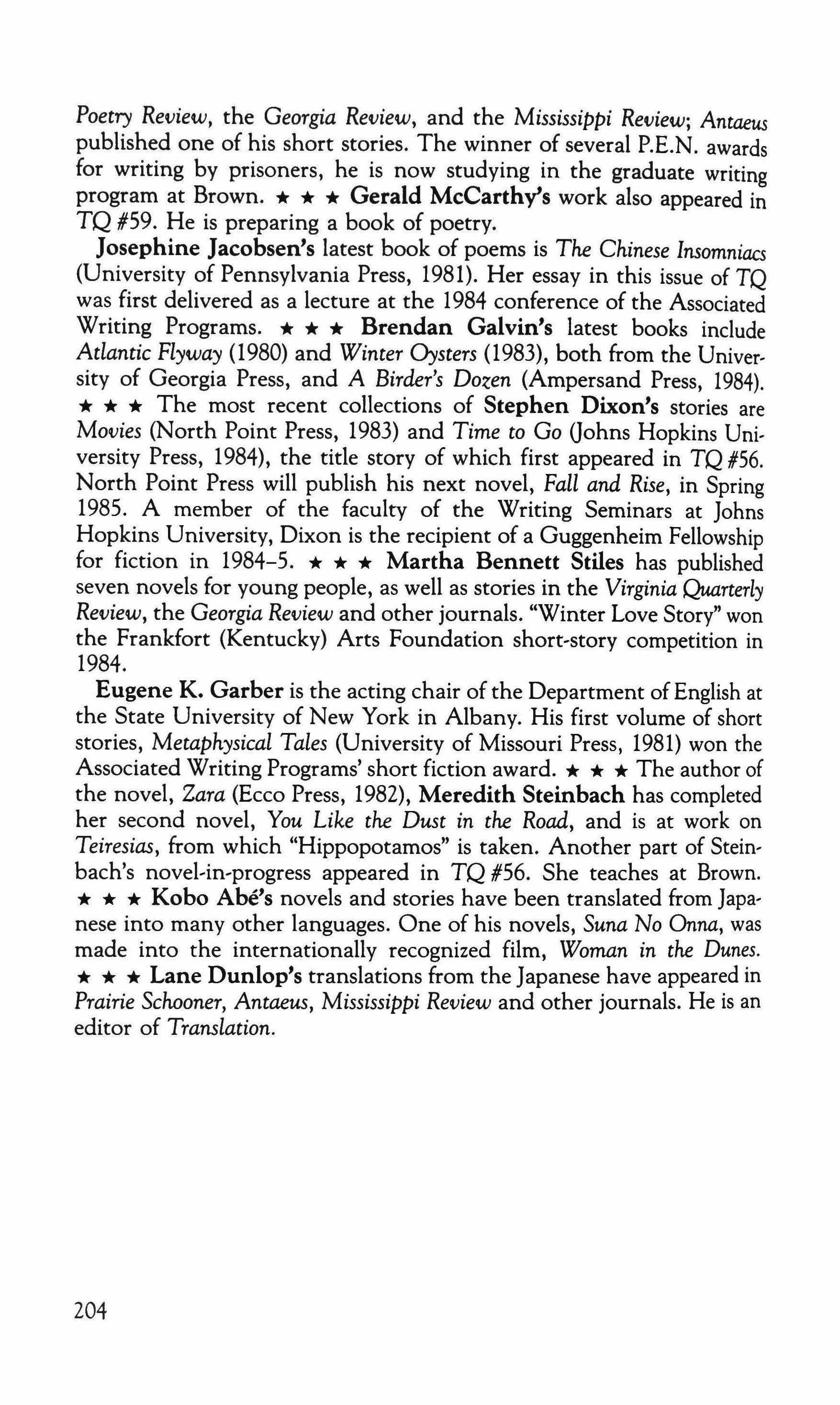
Poetry Review, the Georgia Review, and the MississiPPi Review; Antaeus published one of his short stories. The winner of several P.E.N. awards for writing by prisoners, he is now studying in the graduate writing program at Brown. * * * Gerald McCarthy's work also appeared in TQ #59. He is preparing a book of poetry.
Josephine Jacobsen's latest book of poems is The Chinese Insomniacs (University of Pennsylvania Press, 1981). Her essay in this issue of TQ was first delivered as a lecture at the 1984 conference of the Associated Writing Programs. * * * Brendan Galvin's latest books include Atlantic Flyway (1980) and Winter Oysters (1983), both from the University of Georgia Press, and A Birder's Dozen (Ampersand Press, 1984).
* * * The most recent collections of Stephen Dixon's stories are Movies (North Point Press, 1983) and Time to Go (johns Hopkins University Press, 1984), the title story of which first appeared in TQ #56. North Point Press will publish his next novel, Fall and Rise, in Spring 1985. A member of the faculty of the Writing Seminars at Johns Hopkins University, Dixon is the recipient of a Guggenheim Fellowship for fiction in 1984-5. * * * Martha Bennett Stiles has published seven novels for young people, as well as stories in the Virginia Quarterly Review, the Georgia Review and other journals. "Winter Love Story" won the Frankfort (Kentucky) Arts Foundation short-story competition in 1984.
Eugene K. Garber is the acting chair of the Department of English at the State University of New York in Albany. His first volume of short stories, Metaphysical Tales (University of Missouri Press, 1981) won the Associated Writing Programs' short fiction award. * * * The author of the novel, Zara (Ecco Press, 1982), Meredith Steinbach has completed her second novel, You Like the Dust in the Road, and is at work on Teiresias, from which "Hippopotamos" is taken. Another part of Steinbach's novel-in-progress appeared in TQ #56. She teaches at Brown.
* * * Kobo Abe's novels and stories have been translated from Japanese into many other languages. One of his novels, Suna No Onna, was made into the internationally recognized film, Woman in the Dunes.
* * * Lane Dunlop's translations from the Japanese have appeared in Prairie Schooner, Antaeus, MississiPPi Review and other journals. He is an editor of Translation.
204
Fiction Poetry
Art Criticism
Three times a year
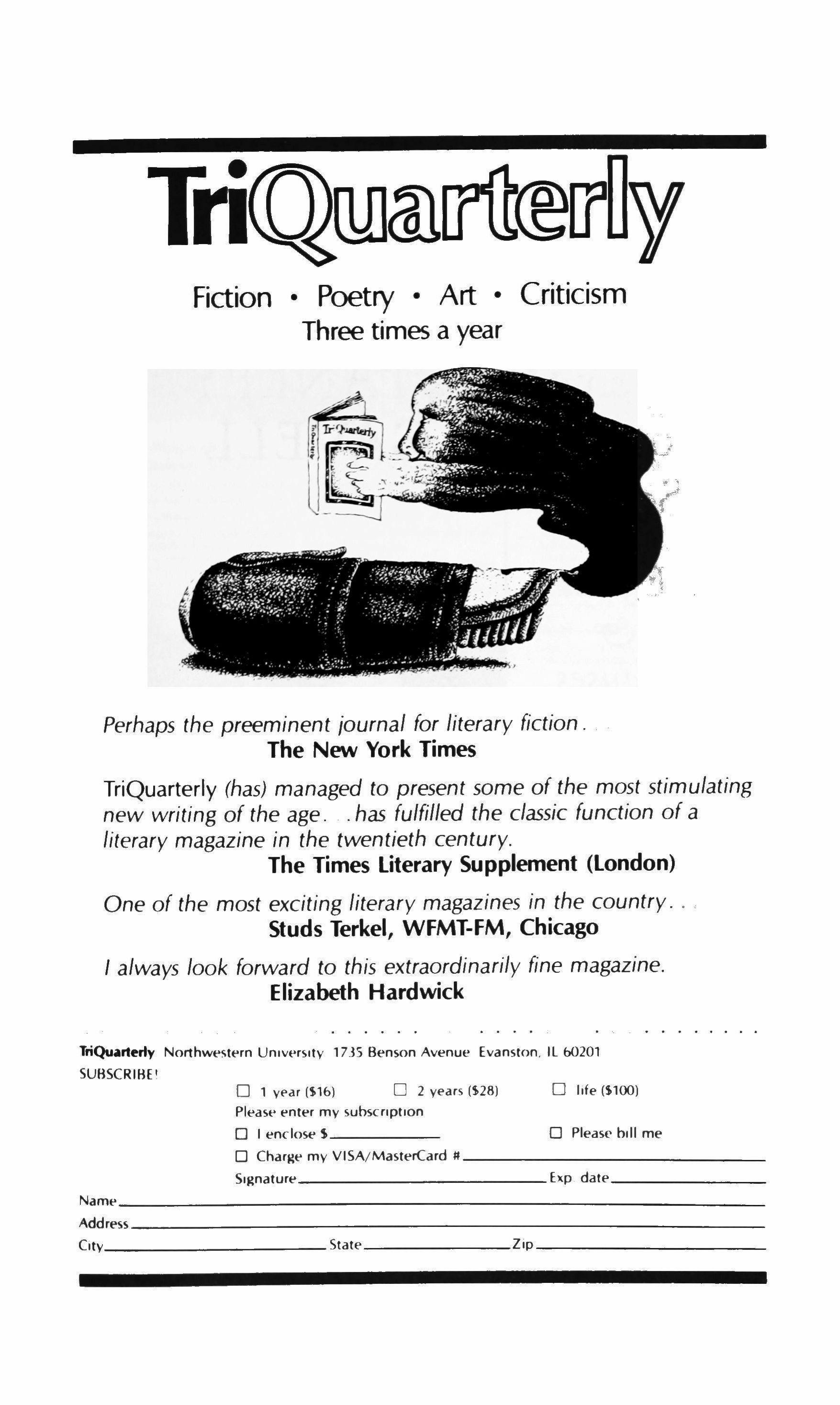
Perhaps the preeminent journal for literary fiction. The New York Times
TriQuarterly (has) managed to present some of the most stimulating new writing of the age. has fulfilled the classic function of a literary magazine in the twentieth century. The Times Literary Supplement (London)
One of the most exciting literary magazines in the country Studs Terkel, WFMT-FM, Chicago
I always look forward to this extraordinarily fine magazine. Elizabeth Hardwick
TriQuilirterly Northwestern Uruversrtv 173S Benson Avenue Evanston. IL b0201
SUBSCRIBE'
o 1 YI'M (S16) o 2 years (S28) o hfe ($100)
Please enter my subscnpnon
o I enclose $
o Charge my VISA/MasterCard "
Signature Exp date o Please h,1I me
Name
Address
COty State Zip
Themes out of School
Effects c:Y Causes
STANLEY CAVELL
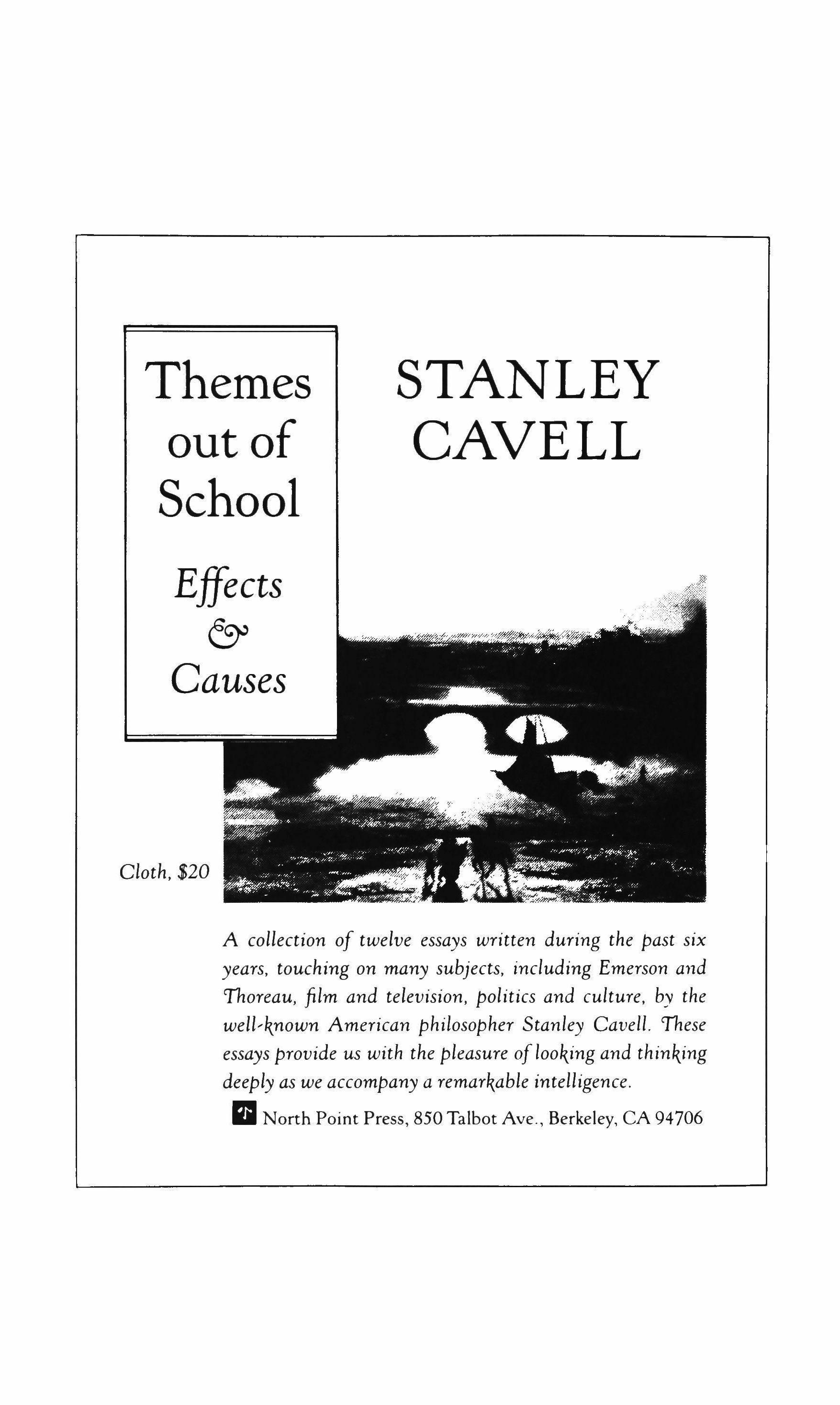
Cloth. $20
A collection of twelve essays written during the past six years. touching on many subjects. including Emerson and 'Thoreau. film and television. politics and culture. by the well'�nown American philosopher Stanley Cavell. 'These essays provide us with the pleasure ofloo�ing and thin�ing deeply as we accompany a remar�able intelligence
• North Point Press. 850 Talbot Ave Berkeley, CA 94706
From Brahms to joplin, from Dickens to Woolf: 1
Major New Publications of
The New York Public Library
Alto Rhapsody byJohannes Brahms
Opus 53 for Contralto, Men's Chorus and Orchestra
Imro by Walter Frasch
A facsimile (In three colors) of the only extant complete manuscnpt of the oftenperformed work, with a percepnve mrroducnon and reproduction ofearlier mcneal sketches In the Gesellschait der Muslk· freunde m Vienna. Pubhshed from the engmal manuscnpt m the Library's MusIC DIVISion In celebrancn of the 1 soth anmversary of Brahm's birth.
a handsome facsimile ,dition of [the library'sl treasured manuscript-sStereo RC'\Iirw JIIus 198} 76p S-1.83-S doth Sso.oo
The Complete Works of Scott Joplin
Volume I: Works for Piano
Volume 11: Works for Voice
Edited by Vera Brodsky Lawrence Richard Jackson, Editorial Consultant
Introduction by Rudr Blesh
Preface to Vol II by Carman Moore
The major American composer's works In a comprebenswe new edition With an expanded discography and the three rags (Fig uafRag, Ros� L�af Rog, Searchlight Rag) that had to be omuted from the 1971 edmon of Joplin's Caltected Works (which ChOice called "a landmark In American musical history"). Valli includes the complete plano-vocal score of SCOtt Joplm's opera Treemcnnha. The works With rherr deccranve cover designs arc reproduced from original or early sheet music With any muncal errata corrected.
Superb .; a splendid facsimile edition-Newsweek
1981 a-vel set S-1.7'r6 doth S75.oo
I: XlVI, }11 P \-1.15-4 cloth 5,,0.00 II: xlVII, } S-1.76·J, doth S40.oo
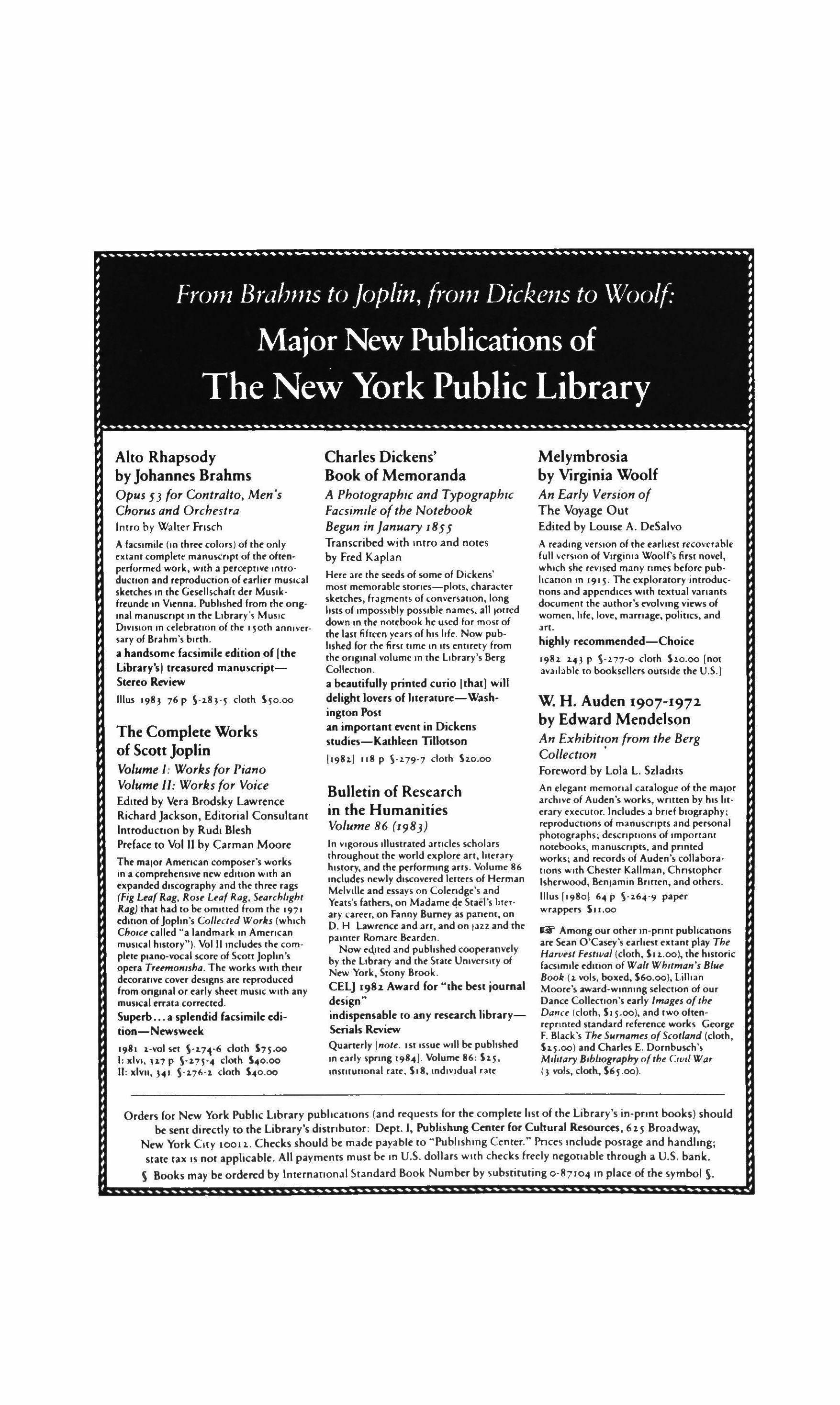
Charles Dickens' Book of Memoranda
A Photograpbsc and Typographic Facsimile ofthe Notebook Begun in January ,855
Transcribed with tntro and nores by Fred Kaplan
Here are the seeds of some- of Dickens' most memorable stories-plots, character sketches, fragments of conversation. long lists of rmpossrbly possible names, all jorred down tn the notebook he used for most of the last fifteen years of hiS hfe. Now pubhshed for the first lime in Its ennrery from the ongmal volume In the library's Berg Collection.
a beautifully primed curio [that] will delight lovers of luerarure-c-Washington Post an important event in Dickens studies-Kathleen Tillotson 11981.) 118 P S-1.79-7 cloth ho.oo
Bulletin of Research in the Humanities
Volume 86 (1983)
In vigorous illustrated arncles scholars throughout the world explore art. hterary hlslory. and the' performmg arts. Volume 86 mcludes newly discovered letters of Herman Melvrlle and essays on Coleridge's and 'rears's fathers, on Madame de Stael's literary career, on Fanny Burney as panenr on D. H Lawrence and art and on tau and the pamter Romare Bearden.
Now edrred and published cooperanvely by the library and the State UmverslfY of New York. Stony Brook.
CELl 1981 Award for "'he be journal design" indispensable to any research librarySerials Review
Quarterly [eore. 1st Issue will be published In early spnng 198 [. Volume 86: hS. institutional rare. 518. mdrvrdual rare
Melymbrosia
by Virginia Woolf
An Early Version of The Voyage Out
Edited by LOUIse A. DeSalvo
A reading verston of the earliest recoverable full version of Vugima Woolf's first novel, which she' revised many times before pubhcanon In 1915. The exploratory introductions and appendices With textual vanants document the author's evolving views of women, hfe.fcve, mamage, pohncs, and an. highly recommended-Choice
1981. 1.43 P S-1.77-0 doth S:to.oo [nor available to booksellers oursrde the' U.S.I
W. H. Auden 1907-1972 by Edward Mendelson
An Exbibition from the Berg Collection
Foreword by Lola L. Szladus
An elegant memorial catalogue of the major archive of Auden's works, written by hrs Ittcrary executor. Includes .1 bne! biography; reproductions of manuscnprs and personal photographs; descnpnons of Important notebooks, manuscnpts, and printed works; and records of Auden's collaboranons With Chester Kallman, Chnsropber lsberwood.Bemarnin Bnrren, and others. lIIus 1'980) 64 P S-1.6-4-9 paper wrappers SII.oo
Among our other in-Print publications Sean O'C�'s earliest extant play The Harvest Festlllal (doth. Sf 1..00), the historic faCSimile edition of Walt Whitman's Blue 800k (1. vols. boxed. S60.oo),lilllan Moore's award-wmnmg selection of our Dance Collection's early Images ofthe Donee (cloth, 515.00). and two ettenreprinted standard reference works George F. Black's The SWn1amts ofScotland (cloth, Sz.5.oo) and Charles E. Dornbusch's Military Bibliography ofthe CUIII War (3 vols, doth, 56S.00).
Orders for New York Pubhc library pubhcanons (and requests for the complete hst of {he library's in-punt books) should be sent dirccrly to the Library's distnbutor: Dept. I, Publishmg Center for Cultural Resources, 625 Broadway, New York City 10012., Checks should be made payable (0 "Pubhshmg Center." Prrces include postage and handlmg; stare tax IS not applicable, All payments must be In U.S. dollars wuh checks freely negonable through a U.S. bank. S Books may be ordered by lnrernanonal Standard Book Number by substituting 0-871°4 In place of the symbol S.
I""""""""""""��'�"""'_""""""'�--"""""""""'.""'� 1
l
l • i
i :'-"""""""'--"',.,""""""-"--,.,-".,"-,-,----------.--"--,---�,:

Collected POE:\IS
These poems are" rare and poignant. poems that poets keep. to remind them of what poetry can be. "-JOHN ASHBERY They "speak out with an Orphic voice."-DAVID IGNATOW
passages are worth more, for me, than the entire work of many a famous name, because they momentarily allay every doubt. about the value and sublimity-and fun---of poetry I can't imagine any poet not feeling for the ghost of Schubert an absolute reverence ." -N.Y. TIMES
Multi-Auto BIOCI{APHY
Composed by Renee Karol Weiss. Schubert's life in its world and time. An "inspired collage"JAMES MERRILL---of letters, poems, news, memoirs, interviews.
"A remarkable document: haunting. suspenseful, original. deeply moving. A� a tribute to a gifted poet who died tragically young. it attains the dignity and clarity of poetry itself."
-JOYCE CAROL OATES
ESSAYS
on Schubert by Axhbery. Ehrenpreis. Galler. Gibbons. Gregory. Ignatow. Wright.
$10 paper $20 cloth (�50 pages) at your bookstore or directly from: 26 Haslet Avenue Princeton. N.J. 08540
From Beowulf toVirginiaWoolf
An Astounding and Wholly Unauthorized History of English Literature
New Edition, Thoroughly Devised andDiffusely Illustrated Robert Manson Myers
Just when you thought academia was safe again for some high-minded seriousness, Robert Manson Myers's classic bit of tomfoolery comes leaping back to life with one of the funniest parodies of English literature and the English profession ever written.
First published in the early Fifties, and long out of print, this comic gem (the literary equivalent of 1066 and All That) has been both revised and enlarged and is even more resoundingly obtuse than the original. With eloquent irrelevance, the author presents the IUustration by Edward Gorey definitive survey of the wolf motif in English literature. He chronicles "the unspeakable literary contribution of the British Empire before and since the publication of Lyrical Ballllst in 1798" and, foUowing a roughly chronological scheme, "analyzes the One Hundred and One Best Poets against the hysterical background of their time."
"From Beowulf to Virginia Woolfhas achieved the status of a kind of underground classic. You can't find it in libraries (the copies have aU been stolen). Rereading it, I was once again in uncontroUable stitches."
- Charles R. Larson, author of Aaulemia Nuts. Clothbound. IUustrated. $9.95
The 1984 lliinois Short Fiction Collections
Bodies of the Rich, byJohn J. Clauton. '1ohn Clayton's stories aac1de with a kind of electricity rare in contemporary fictioii: here's a writer who�dles the language with energy and daring, who at the same time presents us with characters deeply involved in human concerns that matter to them and to us."
- George Cuomo, author of Family Honor. "A fine collection." - Publishers Wee/cJy.
Music Lesson, b1l Martha Lacu Hall. "In the tradition of Welty, Percy and other interpreters of regional lifes¥e, Hall replicates the idiom and behavior of people through the microcosm of their daily lives With unobtrusive craftsmanship, Hall mines the rich material of the Deep South, joining the formidable ranks of Southern artists." - Publishers Wee/cJy.
Fetching the Dead, by ScottR. Sanders. "Sanders takes us into the world offaUen people His narrative rendering ofthese peopletrying to find some shelter in theirhapless lives is seamless and strong." - Publishers Wee/cJy. "AU these stories are deep rooted in place and deeply felt and thought; and 'TheFire Woman' especiallyringslikecrystal in the mind." - Ursula K. Le Guin, authorof The Earthsea Trilogy.
Some of the Things I Did Not Do, byJanet Beeler Shaw. "Ten marvelous stories Sensitive to the dilemmas of both men and women, Shaw creates highly believable dramas, as fuU of suspense as of closely observed detail." - Publishers Wee/cJy. "In aU the stories here Shaw is impressive with her natural, seemingly effortless style - which remains in fine control through an engagingly wide variety of subject matters." - Kirkus Rroinos.
Clothbound, $11.95 each
We accept major credit cards. Phone toU free 800 1638-3030. Maryland residents phone 301/824-7300.
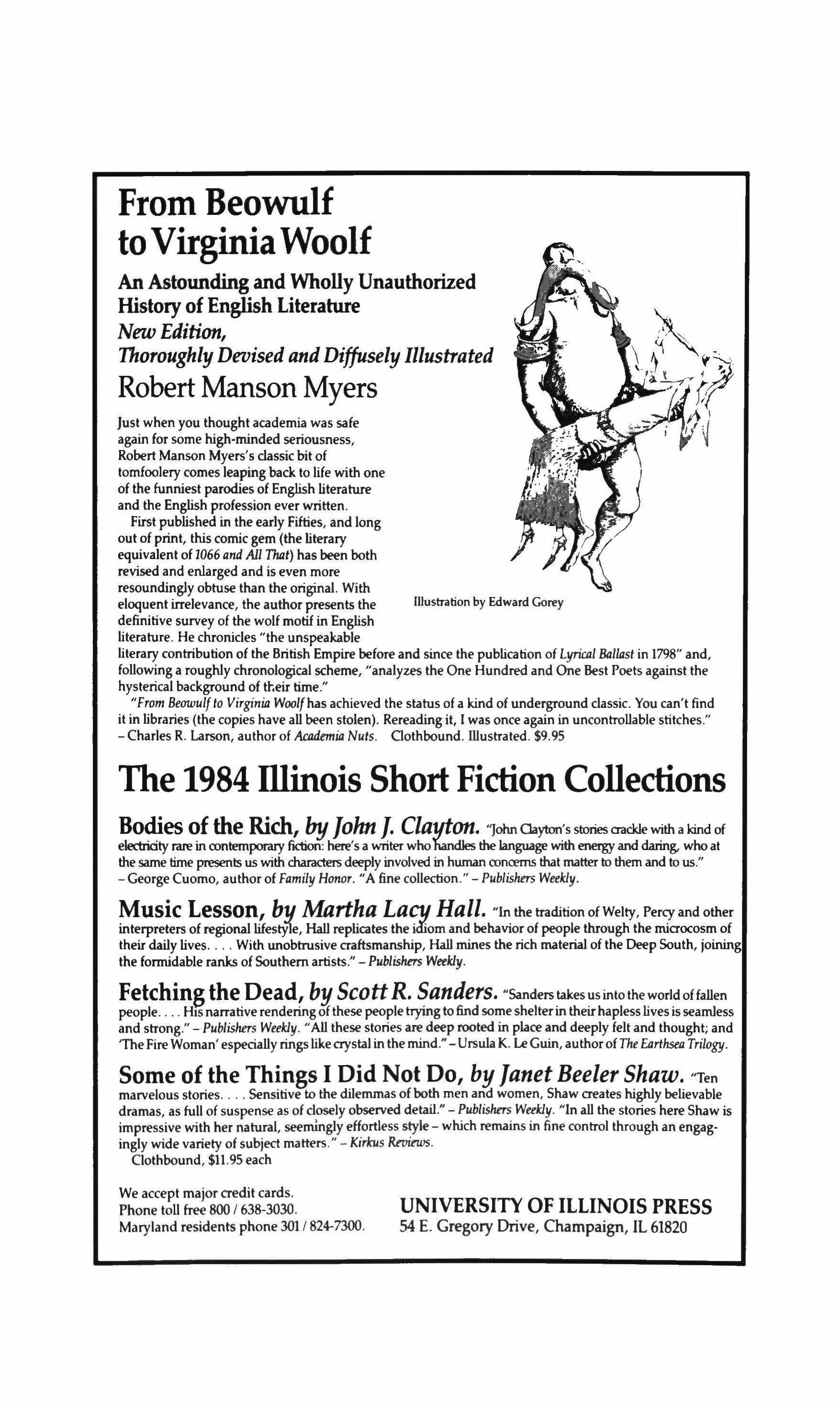
UNIVERSITY OF ILLINOIS PRESS 54 E. Gregory Drive, Champaign, IL 61820
THE COORDINATING COUNCIL OF LITERARY MAGAZINES
IS PROUD TO ANNOUNCE THE RECIPIENTS OF THE 1984 EDITOR'S GRANTS
Linda Cousins THE UNIVERSAL BLACK WRITER Brooklyn, New York
Clayton Eshleman SULFUR
Los Angeles, California
Manuel Manazar Gamboa CHISMEARTE
Los Angeles, California
Reginald Gibbons TRIQUARTERLY
Evanston, Illinois
Marilyn Hacker 13TH MOON
New York, New York
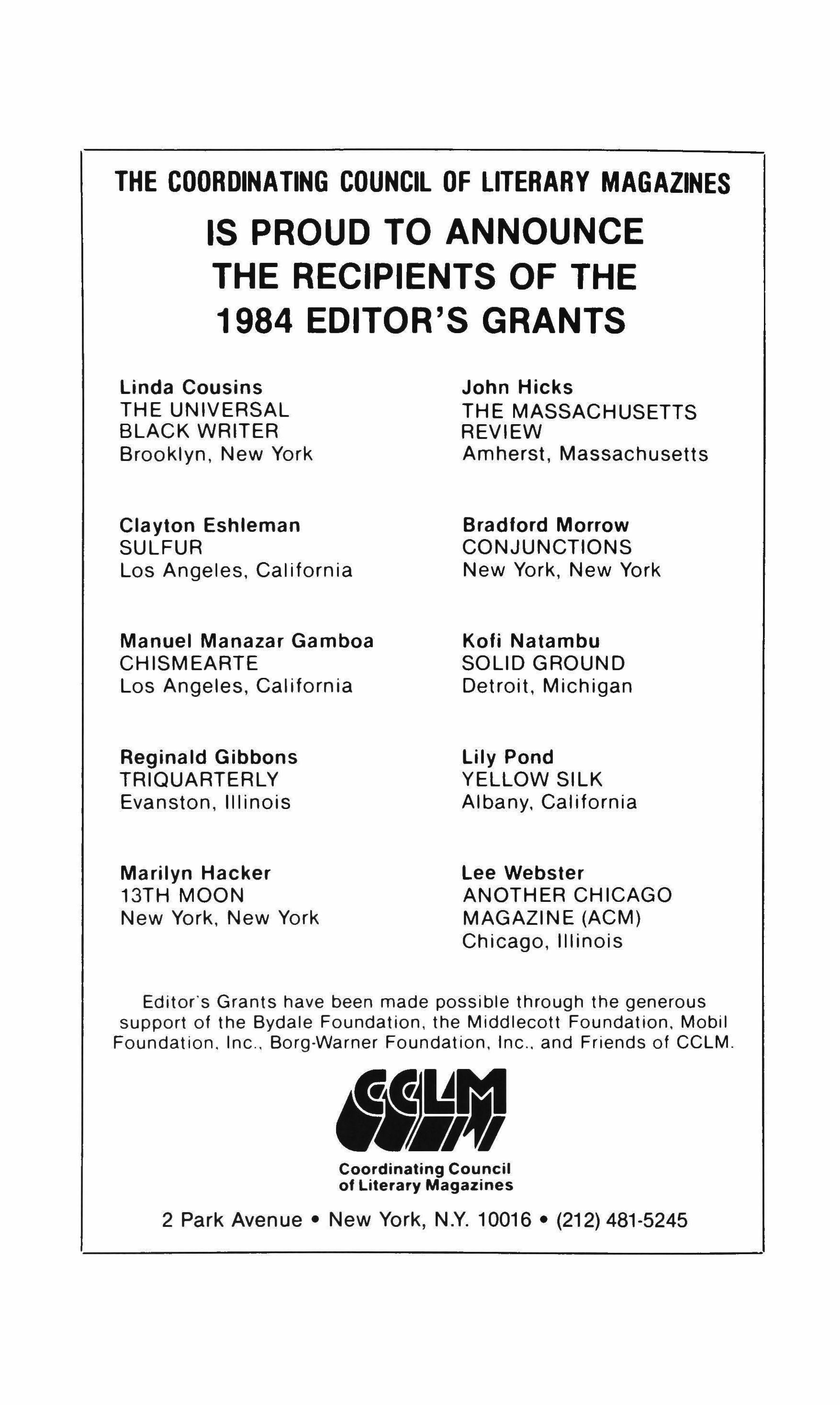
John Hicks THE MASSACHUSETTS REVIEW Amherst, Massachusetts
Bradford Morrow CONJUNCTIONS
New York, New York
Kofi Natambu SOLID GROUND Detroit, Michigan
Lily Pond YELLOW SILK Albany. California
Lee Webster ANOTH ER CH ICAGO MAGAZINE (ACM) Chicago, Illinois
Editor's Grants have been made possible through the generous support of the Bydale Foundation. the Middlecott Foundation. Mobil Foundation. Inc Borg·Warner Foundation. Inc and Friends of CCLM.
Coordinating Council of Literary Magazines 2 Park Avenue • New York, N.Y. 10016 • (212) 481-5245
TriC02lli]@lM[J�y LIMITED EDITIONS
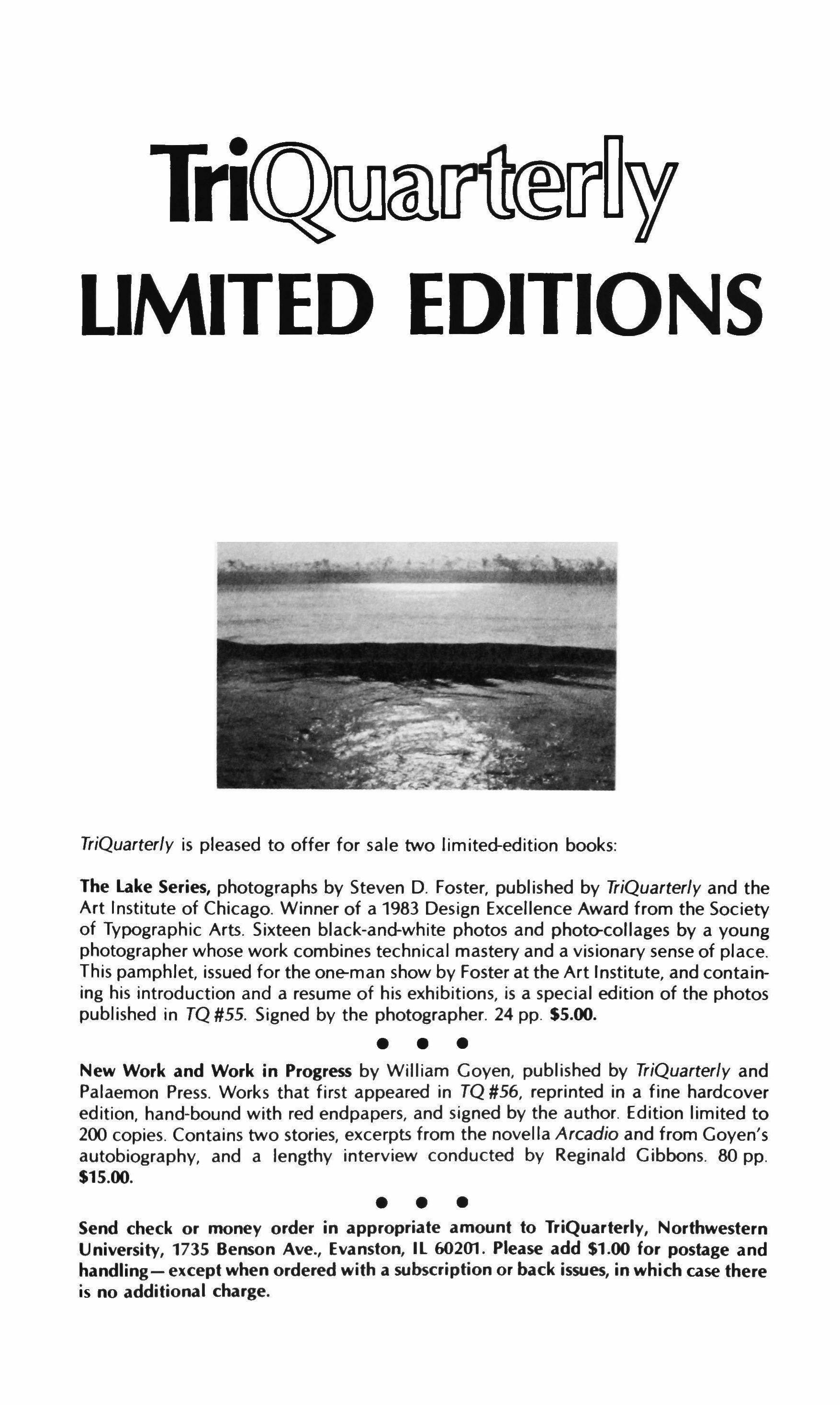
TriQuarterly is pleased to offer for sale two limited-edition books:
The Lake Series, photographs by Steven D. Foster, published by TriQuarterly and the Art Institute of Chicago. Winner of a 1983 Design Excellence Award from the Society of Typographic Arts. Sixteen black-and-white photos and photo-collages by a young photographer whose work combines technical mastery and a visionary sense of place. This pamphlet, issued for the one-man show by Foster at the Art Institute, and containing his introduction and a resume of his exhibitions, is a special edition of the photos published in TQ #55. Signed by the photographer. 24 pp. $5.00.
New Work and Work in Progress by William Goyen, published by TriQuarterly and Palaemon Press. Works that first appeared in TQ #56, reprinted in a fine hardcover edition, hand-bound with red endpapers, and signed by the author. Edition limited to 200 copies. Contains two stories, excerpts from the novella Arcadio and from Goyen's autobiography, and a lengthy interview conducted by Reginald Gibbons. 80 pp. $15.00.
Send check or money order in appropriate amount to TriQuarterly, Northwestern University, 1735 Benson Ave., Evanston, IL 60201. Please add $1.00 for postage and handling- except when ordered with a subscription or back issues, in which case there is no additional charge.
• • •
• • •
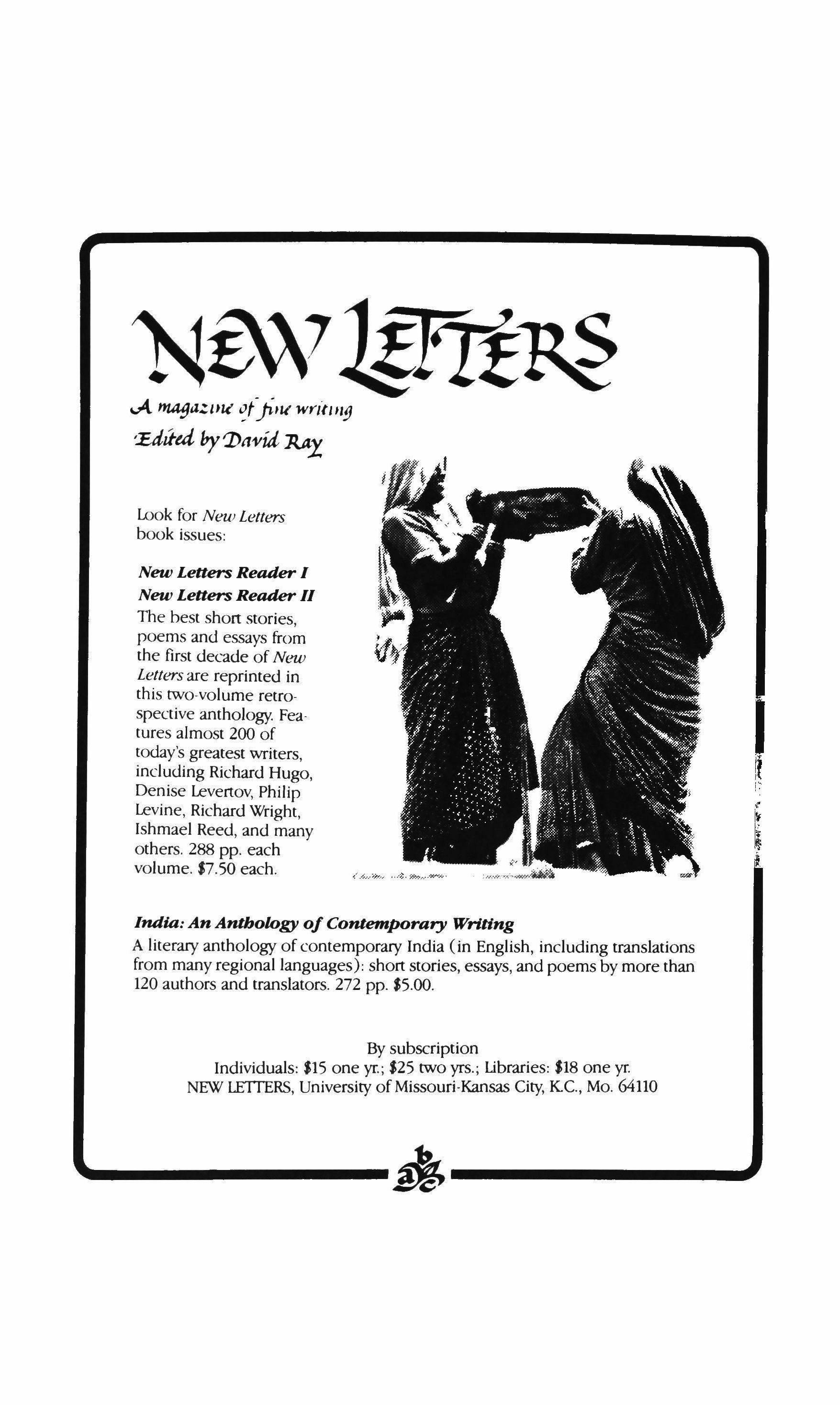
�tw�m�
v( ntaga,;:mc �{_fi'�Wy/(lIIg 'Etiitui by'])tJvidhX
Look for New Letters book issues:
New Letters Reader I
New Letters Reader II
The best short stories, poems and essays from the first decade of New Letters are reprinted in this two-volume retrospective anthology. Features almost 200 of today's greatest writers, induding Richard Hugo, Denise Levertov, Philip Levine, Richard Wright, Ishmael Reed, and many others. 288 pp. each volume. $7.50 each.
India: An Anthology ofContemporary Writing
A literary anthology of contemporary India (in English, including translations from many regional languages): short stories, essays, and poems by more than 120 authors and translators. 272 pp. $5.00.
By subscription
Individuals: $15 one yr.; $25 two yrs.; libraries: $18 one yr. NEW lEITERS, University of Missouri-Kansas City, KC., Mo. 64110
I � � -� �
TELESCOPE
A trlannual compilation of nctlon, poetry, essays, book reviews, and interviews devoted to the illumination of timely and significant topics.
RECENT AND FORTHCOMING ISSUES:
Art in the Atomic Age. Jan. 1984
Focusing on the effects, influences, and anxieties of art and artists in the last forty years since Hiroshima. With work by Pablo Neruda Christopher Buckley Jeanie Thompson Albert Goldbarth W. S. Di Piero
Marylyn Klysl William Pitt Root John Engman and others.
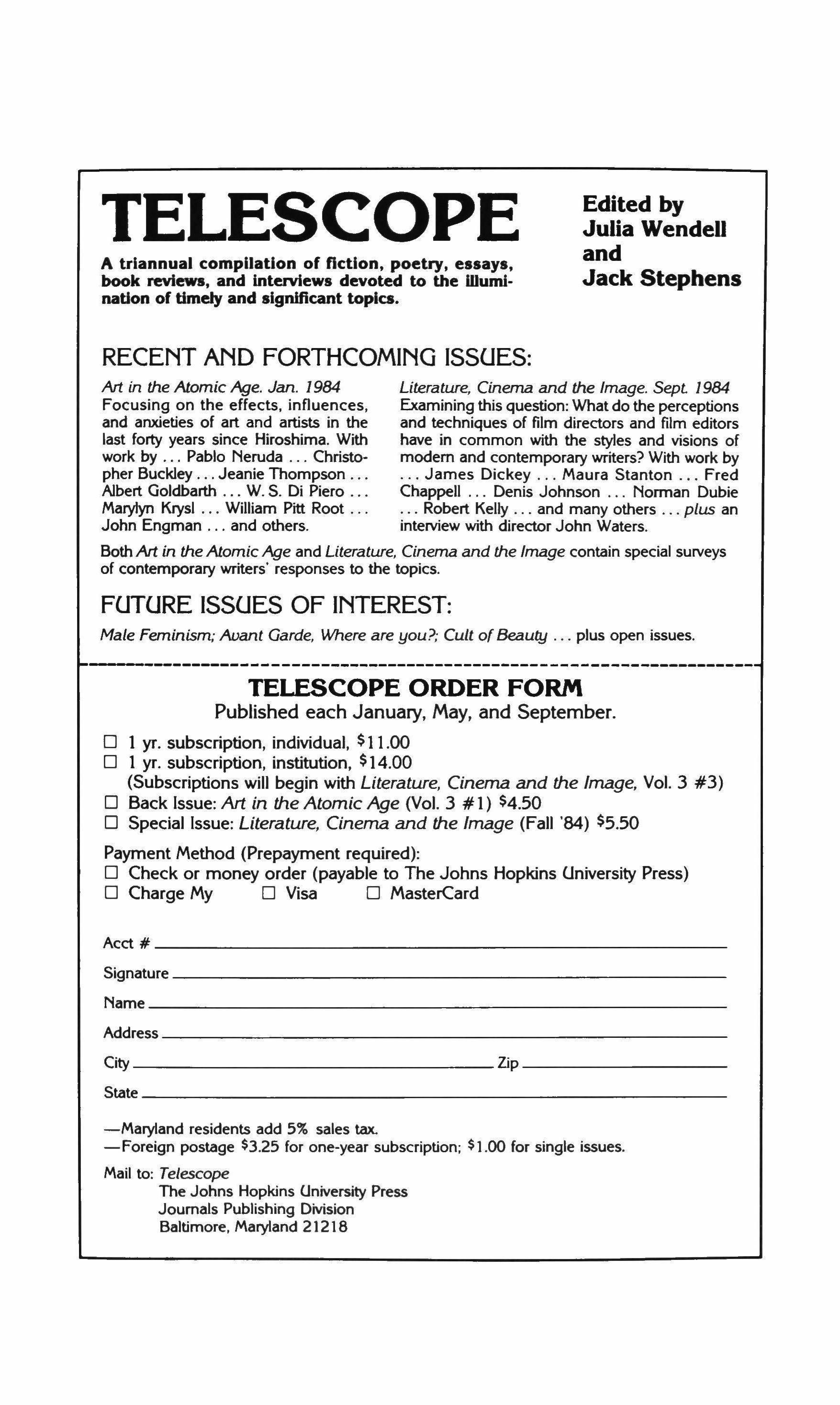 Edited by Julia Wendell and Jack Stephens
Edited by Julia Wendell and Jack Stephens
Literature, Cinema and the Image. Sept. 1984
Examining this question: What do the perceptions and techniques of film directors and film editors have in common with the styles and visions of modem and contemporary writers? With work by James Dickey Maura Stanton Fred Chappell Denis Johnson Norman Dubie
Robert Kelly and many others plus an interview with director John Waters.
BothArt in the Atomic Age and Literature, Cinema and the Image contain special surveys of contemporary writers' responses to the topics.
FUTURE ISSUES OF INTEREST:
Male Feminism; Avant Garde, Where are you?; Cult ofBeauty plus open issues.
TELESCOPE ORDER FORM
Published each January, May, and September.
o 1 yr. subscription, individual, $11.00
o 1 yr. subscription, institution, $14.00 (Subscriptions will begin with Literature, Cinema and the Image, Vol. 3 #3)
o Back Issue: Aft in the Atomic Age (Vol. 3 # 1) $4.50
o Special Issue: Literature, Cinema and the Image (Fall '84) $5.50
Payment Method (Prepayment required):
o Check or money order (payable to The Johns Hopkins University Press)
o Charge My 0 Visa 0 MasterCard
Acct #
Signature
Name
Address
City Zip State
-Maryland residents add 5% sales tax.
-Foreign postage $3.25 for one-year subscription; $),00 for single issues.
Mail to: Telescope The Johns Hopkins University Press Journals Publishing Division Baltimore, Maryland 21218
missIssIPPI REVIEW
SOUTHERN STATION BOX 5144
HATTIESBURG. ms 39406
J10 J18/J26 1/2/3 YRS

33: LITERARY CRITICISm
34/35: BISHOP. CAmOIN. CAPONEGRO. CHAmBERS. COVINO. CROWell. DOVlATOV. DUNLOP. FRYDmAN. GORDETT. GROFF. KOlANKIEWICZ. mOORE. mORRIS. NOLAN. OSAmu. PACHECO. PEACOCK. SOLHEim. ZARANKA. ZEIDNER
36: BENSKO. BRUCE. BURGIN. DIXON. DOTY. DUNNE. DUVAll. JANOWITZ. KAPLAN. KNOll. KUNSTLER. lOPATE. mAGOVERN. mARELlO. mAYES. muus, SHIRLEY. SPIELBERG. TATE. THomAS
37/38: TRANSLATIONS
mR
TAN a quarttrlynview
Richard Poirier, Editor in Chief
Thomas R. Edwards, Executive Editor
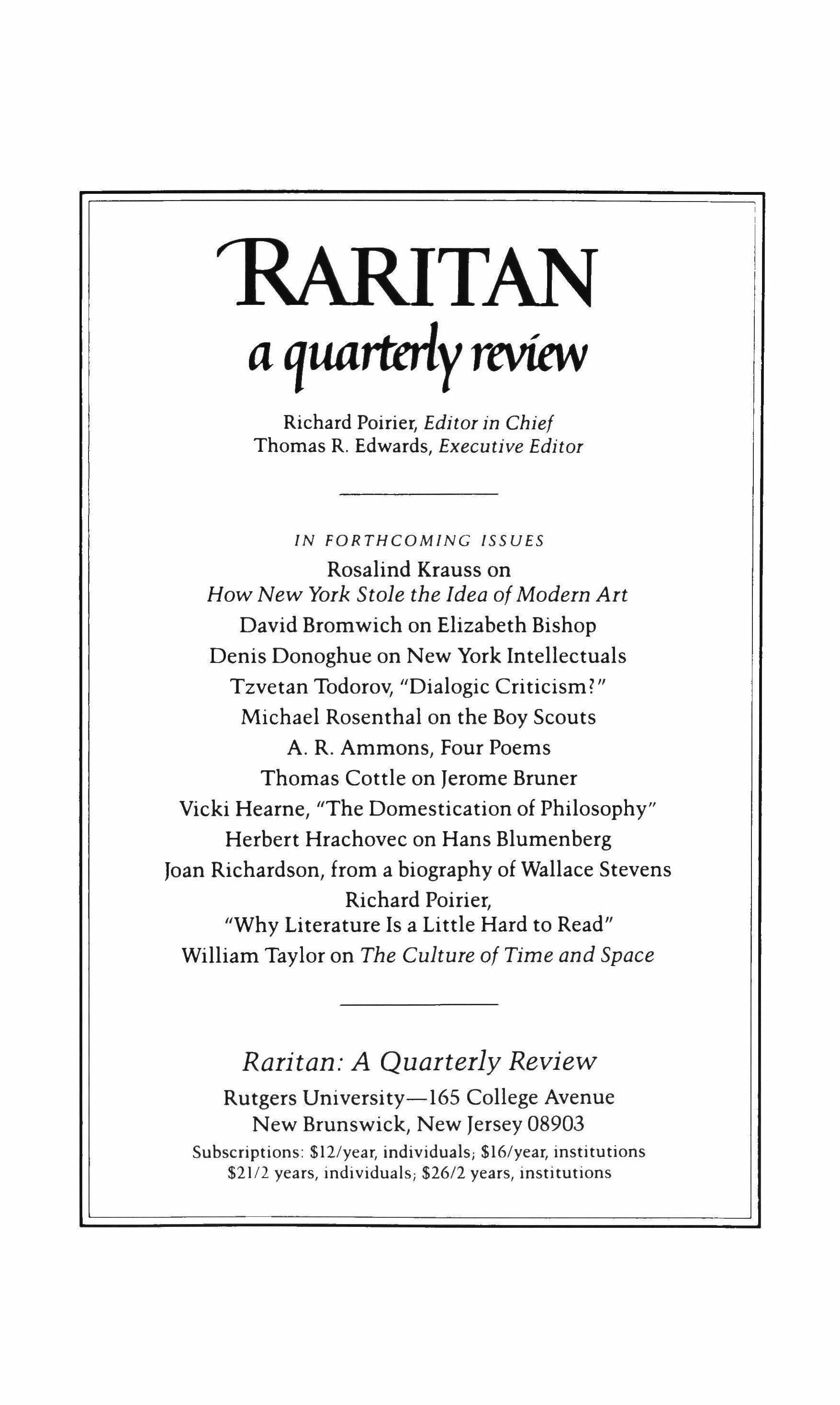
IN FORTHCOMING ISSUES
Rosalind Krauss on How New York Stole the Idea of Modern Art
David Bromwich on Elizabeth Bishop
Denis Donoghue on New York Intellectuals
Tzvetan Todorov, "Dialogic Criticism?"
Michael Rosenthal on the Boy Scouts
A. R. Ammons, Four Poems
Thomas Cottle on Jerome Bruner
Vicki Hearne, "The Domestication of Philosophy"
Herbert Hrachovec on Hans Blumenberg
Joan Richardson, from a biography of Wallace Stevens
Richard Poirier, "Why Literature Is a Little Hard to Read"
William Taylor on The Culture of Time and Space
Raritan: A Quarterly Review
Rutgers University-165 College Avenue
New Brunswick, New Jersey 08903
Subscriptions: $12/year, individuals; $16/year, institutions
$21/2 years, individuals; $2612 years, institutions
•••••••••••
Fourbooks &om Northwestern that will change the wayyouread

Northwestern University Press 1735 Benson Avenue Evanston, Illinois 60201 312-491-5313
Hershel Parker, flawed Texts and Verbal Icons: LiteraryAuthority in American Fiction
In this clearly written, witty polemic, Hershel Parker demonstrates that interpreters, theorists, and teachers of'literature cannot afford to ignore the concerns oftextual scholars with the conditions of production, revision, and publication of'literarv works. Concentrating on American classics such as The Red BadgeofCourage, Tender is the N(!fht, Pudd'nhead Wilson, and An American Dream, Parker shows that the neglect ofthe "textual histories" of'literarv works has led both to editorial blunders and'critical misinterpretations. Even deconstructionists, who "put into question" the coherence ofliterary texts, take for granted the authority ofrhe texts they proceed to deconstruct. Cloth $19.95
• Jan Katt, The Theater ofEssence Introduction by Martin Esslin Essays ofthe past fifteen years on theater, literature, and ideas bv an internationally acclaimed man ofIerters.
"Kott is a representative ofa tradition that has played a major part in the history ofEuropean literature and which, alas, seems to be on the point ofnear-extinction: the tradition ofthe literary essay, as erudite as the best scholarship, as urbane as the most cultured conversation, as deeply felt and finelywrought as poetry." - Martin Esslin, from the Introduction. Cloth $19.95 Paper$9.95
• Charles Newman, The Post-Modern Aura: TheAct ofFiction in an Age oflriflation
A brilliant critique ofthe concept ofthe "postmodern" in contemporary fiction and culture by a practicing novelist. Showingincisively how "inflation" in the material realm becomes a spiritual malady, Newman draws startling eonnections between disparate realms such as the economies ofpublishingand the self-reflexive turn ofthe novel. Cloth $18 9.'). Pape,.S';..').').
New In Paperbadu Mrujorlp P rlofT, The Poetics of Indeterminacy: Rimbaud to Cage
Perloffdefines and analyzes in detail th challenging rother tradition" which links Rirnbaud and Surrealist painting 10 rh,' poetry and prose of'Stein. Pound. Williams. Becken, Ashberv, Cage. and others. Paper$.'J 9.s.
-----------.
'11(f110 IJWOAIKl
FICTION SYNDICATE and MAGAZINE
Fiction Netwo� distributes short fiction to newspapers and regional magazines. We have syndicated short stories by Alice Adams, Max Apple, Ann l3eattie, Ken Chowder, Andre Dubus, Ron Hansen, Lynne Sharon Schwartz, MarianThurm, and others, including many previously unpublished writers.
Nowyou can read these stories in FIGION NETWORKMAGAZINE. a new publication circulating fiction to editors, agents, writers, and others in the publishing and film industries.
Oursyndicate handles unpublished fiction, stories that have appeared in small-Circulation magazines, and second serial rights; the magazine includes only previously unpublished stories.
Submissions:
Stories under 5000 words, shorter stories preferred. FN places each story in several periodicals; payments divided 50/50with author.

Subscriptions.
FlGION NETWORK MAGAZINE �12/4 issues; �/sample
FIGION NETWORK. PO Dox 5651, San Francisco, CA 94101
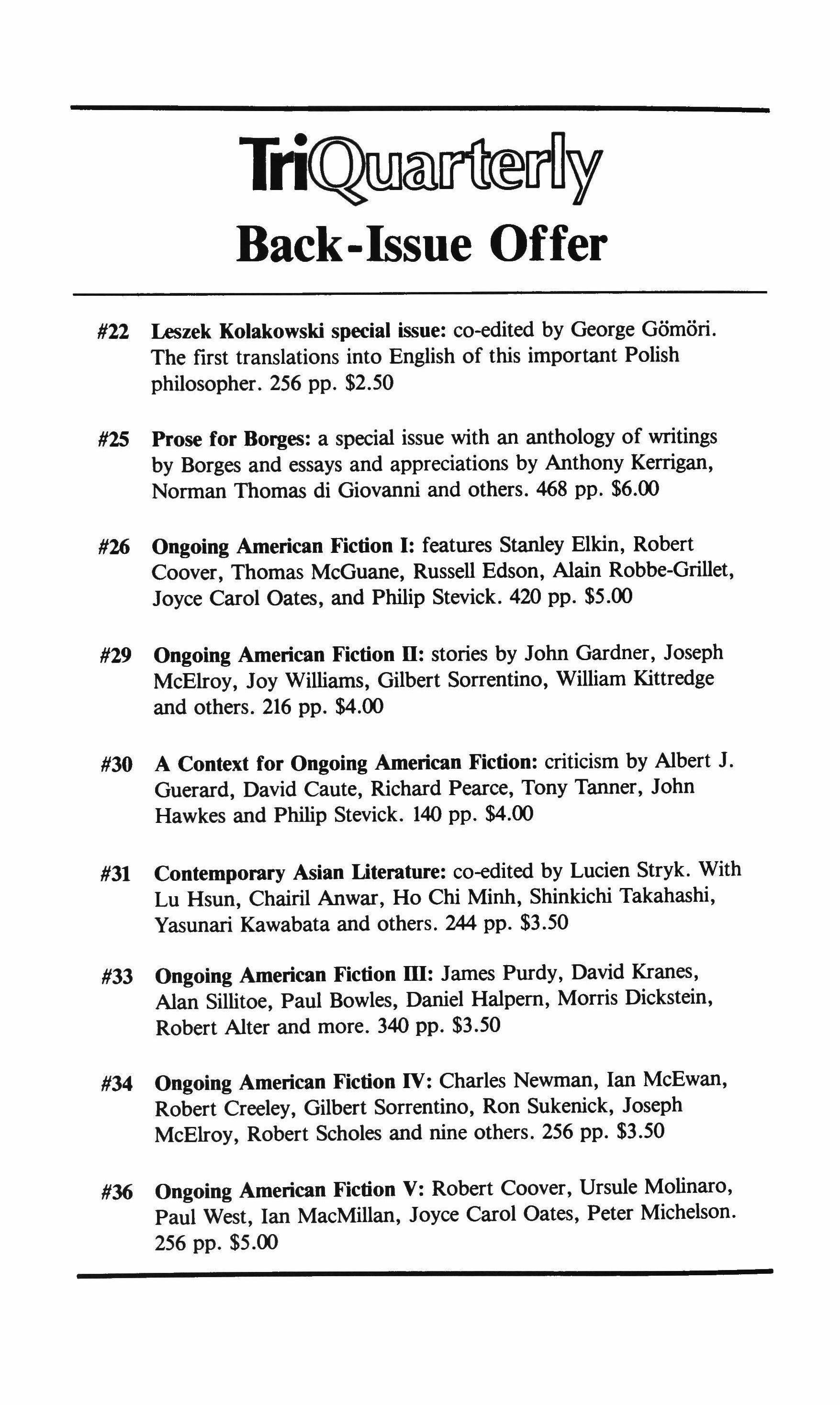
Tri�nalU1t(wily Back-Issue Offer
#22 Leszek Kolakowski special issue: co-edited by George Gdmori, The first translations into English of this important Polish philosopher. 256 pp. $2.50
#25 Prose for Borges: a special issue with an anthology of writings by Borges and essays and appreciations by Anthony Kerrigan, Norman Thomas di Giovanni and others. 468 pp. $6.00
#26 Ongoing American Fiction I: features Stanley Elkin, Robert Coover, Thomas McGuane, Russell Edson, Alain Robbe-Grillet, Joyce Carol Oates, and Philip Stevick. 420 pp. $5.00
#29 Ongoing American Fiction II: stories by John Gardner, Joseph McElroy, Joy Williams, Gilbert Sorrentino, William Kittredge and others. 216 pp. $4.00
#30 A Context for Ongoing American Fiction: criticism by Albert J. Guerard, David Caute, Richard Pearce, Tony Tanner, John Hawkes and Philip Stevick. 140 pp. $4.00
#31 Contemporary Asian literature: co-edited by Lucien Stryk. With Lu Hsun, Chairil Anwar, Ho Chi Minh, Shinkichi Takahashi, Yasunari Kawabata and others. 244 pp. $3.50
#33 Ongoing American Fiction m: James Purdy, David Kranes, Alan Sillitoe, Paul Bowles, Daniel Halpern, Morris Dickstein, Robert Alter and more. 340 pp. $3.50
#34 Ongoing American Fiction IV: Charles Newman, Ian McEwan, Robert Creeley, Gilbert Sorrentino, Ron Sukenick, Joseph McElroy, Robert Scholes and nine others. 256 pp. $3.50
#36 Ongoing American Fiction V: Robert Coover, Ursule Molinaro, Paul West, Ian MacMillan, Joyce Carol Oates, Peter Michelson. 256 pp. $5.00
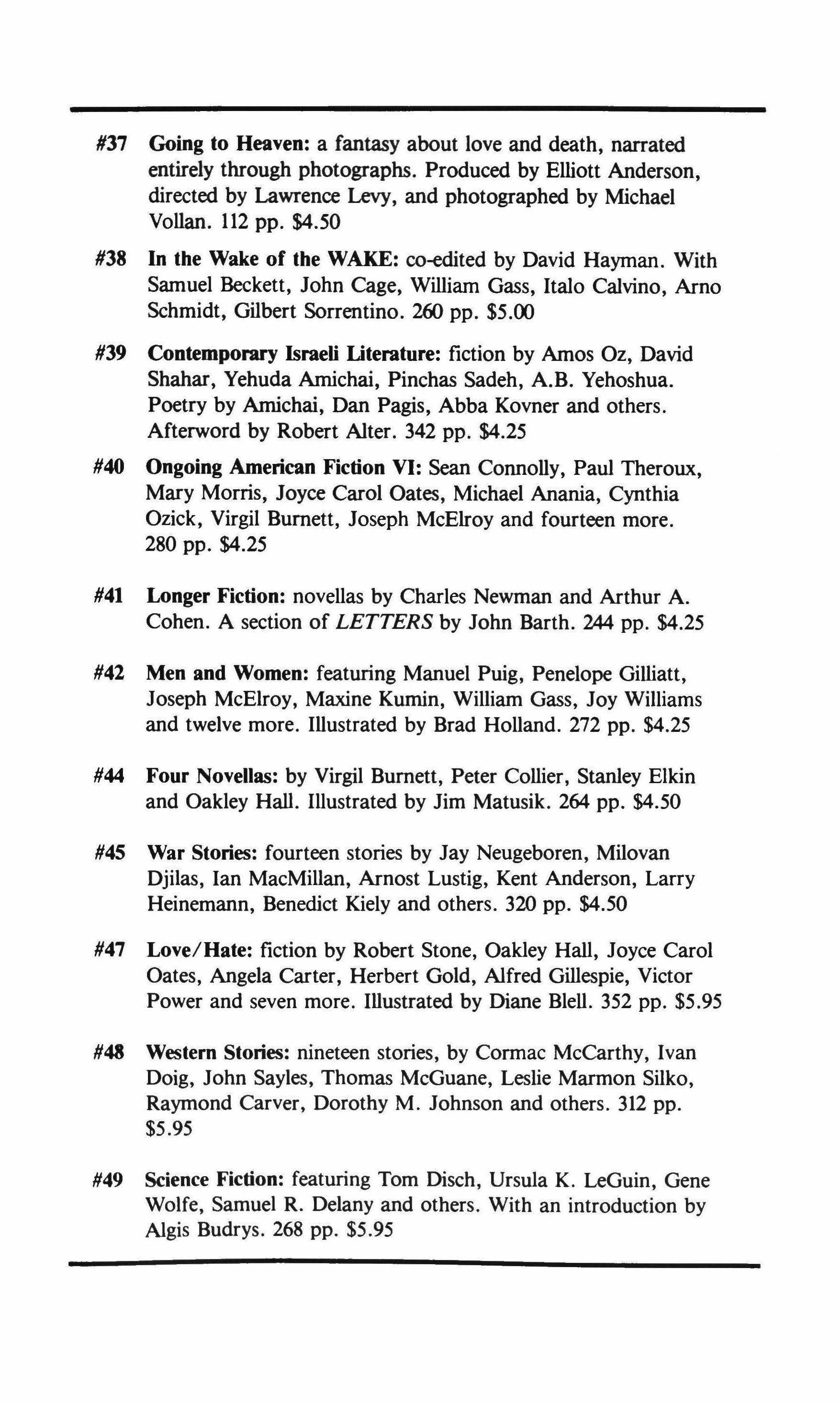
#37 Going to Heaven: a fantasy about love and death, narrated entirely through photographs. Produced by Elliott Anderson, directed by Lawrence Levy, and photographed by Michael Vollan. 112 pp. $4.50
#38 In the Wake of the WAKE: co-edited by David Hayman. With Samuel Beckett, John Cage, William Gass, Italo Calvino, Arno Schmidt, Gilbert Sorrentino. 260 pp. $5.00
#39 Contemporary Israeli literature: fiction by Amos Oz, David Shahar, Yehuda Amichai, Pinchas Sadeh, A.B. Yehoshua.
Poetry by Amichai, Dan Pagis, Abba Kovner and others. Afterword by Robert Alter. 342 pp. $4.25
#40 Ongoing American Fiction VI: Sean Connolly, Paul Theroux, Mary Morris, Joyce Carol Oates, Michael Anania, Cynthia Ozick, Virgil Burnett, Joseph McElroy and fourteen more. 280 pp. $4.25
#41 Longer Fiction: novellas by Charles Newman and Arthur A. Cohen. A section of LETTERS by John Barth. 244 pp. $4.25
#42 Men and Women: featuring Manuel Puig, Penelope Gilliatt, Joseph McElroy, Maxine Kumin, William Gass, Joy Williams and twelve more. Illustrated by Brad Holland. 272 pp. $4.25
#44 Four Novellas: by Virgil Burnett, Peter Collier, Stanley Elkin and Oakley Hall. Illustrated by Jim Matusik. 264 pp. $4.50
#45 War Stories: fourteen stories by Jay Neugeboren, Milovan Djilas, Ian MacMillan, Arnost Lustig, Kent Anderson, Larry Heinemann, Benedict Kiely and others. 320 pp. $4.50
#47 Love/Hate: fiction by Robert Stone, Oakley Hall, Joyce Carol Oates, Angela Carter, Herbert Gold, Alfred Gillespie, Victor Power and seven more. Illustrated by Diane Bleil. 352 pp. $5.95
#48 Western Stories: nineteen stories, by Cormac McCarthY, Ivan Doig, John Sayles, Thomas McGuane, Leslie Marmon Silko, Raymond Carver, Dorothy M. Johnson and others. 312 pp. $5.95
#49 Science Fiction: featuring Tom Disch, Ursula K. LeGuin, Gene Wolfe, Samuel R. Delany and others. With an introduction by Algis Budrys. 268 pp. $5.95
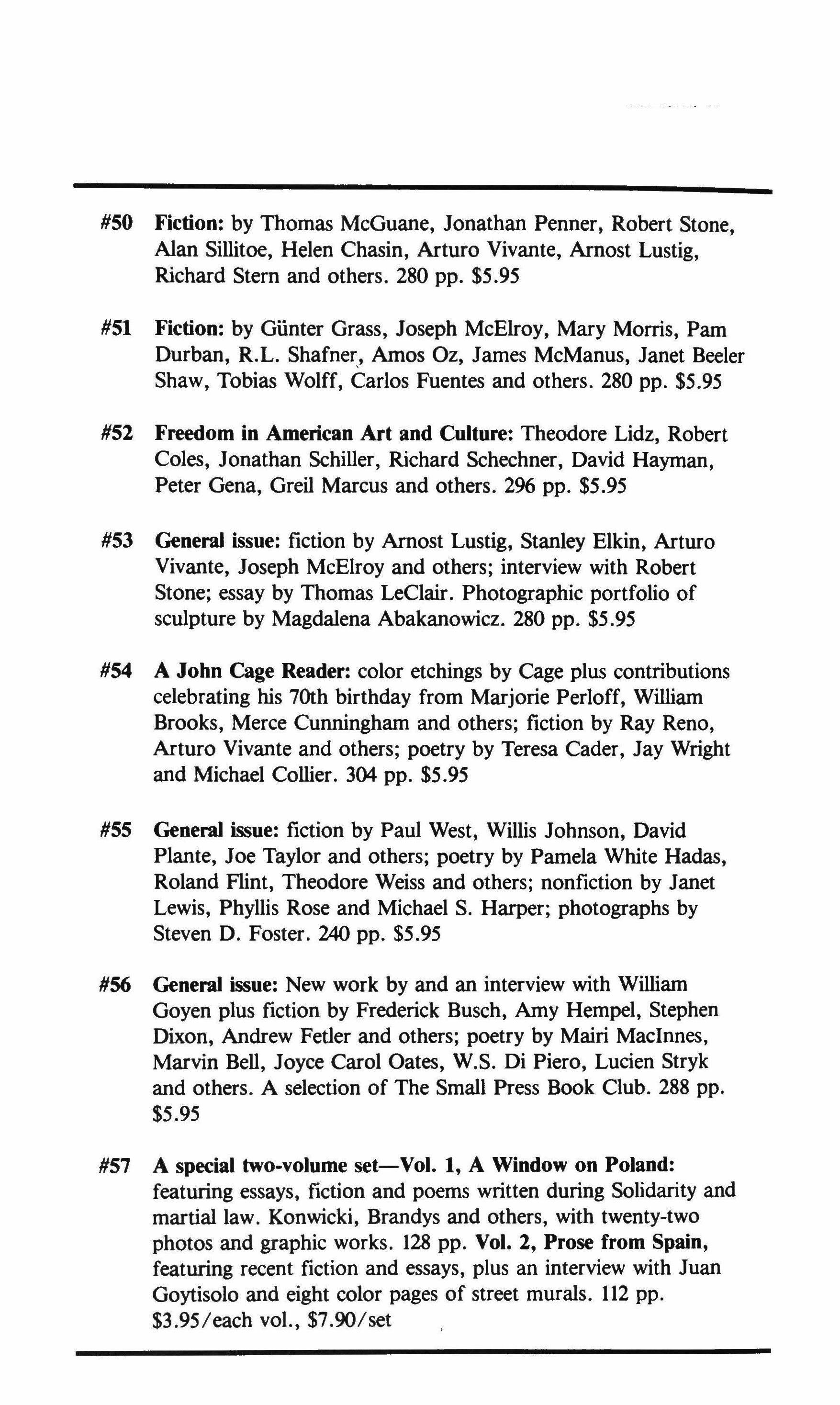
#50 Fiction: by Thomas McGuane, Jonathan Penner, Robert Stone, Alan Sillitoe, Helen Chasin, Arturo Vivante, Amost Lustig, Richard Stem and others. 280 pp. $5.95
#51 Fiction: by GUnter Grass, Joseph McElroy, Mary Morris, Pam Durban, R.L. Shafner Amos Oz, James McManus, Janet Beeler Shaw, Tobias Wolff, Carlos Fuentes and others. 280 pp. $5.95
#52 Freedom in American Art and Culture: Theodore Lidz, Robert Coles, Jonathan Schiller, Richard Schechner, David Hayman, Peter Gena, Greil Marcus and others. 296 pp. $5.95
#53 General issue: fiction by Amost Lustig, Stanley Elkin, Arturo Vivante, Joseph McElroy and others; interview with Robert Stone; essay by Thomas LeClair. Photographic portfolio of sculpture by Magdalena Abakanowicz. 280 pp. $5.95
#54 A John Cage Reader: color etchings by Cage plus contributions celebrating his 70th birthday from Marjorie Perloff, William Brooks, Merce Cunningham and others; fiction by Ray Reno, Arturo Vivante and others; poetry by Teresa Cader, Jay Wright and Michael Collier. 304 pp. $5.95
#55 General issue: fiction by Paul West, Willis Johnson, David Plante, Joe Taylor and others; poetry by Pamela White Hadas, Roland Flint, Theodore Weiss and others; nonfiction by Janet Lewis, Phyllis Rose and Michael S. Harper; photographs by Steven D. Foster. 240 pp. $5.95
#56 General issue: New work by and an interview with William Goyen plus fiction by Frederick Busch, Amy Hempel, Stephen Dixon, Andrew Fetler and others; poetry by Mairi MacInnes, Marvin Bell, Joyce Carol Oates, W.S. Di Piero, Lucien Stryk and others. A selection of The Small Press Book Club. 288 pp. $5.95
#57 A special two-volume set-Vol. 1, A Window on Poland: featuring essays, fiction and poems written during Solidarity and martial law. Konwicki, Brandys and others, with twenty-two photos and graphic works. 128 pp. Vol. 2, Prose from Spain, featuring recent fiction and essays, plus an interview with Juan Goytisolo and eight color pages of street murals. 112 pp.
$3.95/each vol., $7.90/set
#58 General issue: stories by Fred Chappell, Janet Kauffman, Perry Glasser and others; poetry by George Starbuck, C.K. Williams, Dave Smith and others; essays by William Goyen and Alan Shapiro; illustrations by Stan Washburn and Matthew Owens. 224 pp. $6.95
#59 The American Blues: fiction by Ward Just, Joyce Carol Oates, Gayle Whittier, Rodney Jones and others; poetry by Bruce Weigl, John Ciardi, John Frederick Nims, Maxine Kumin and others; photographs from Vietnam and of American political figures by Mark Godfrey; "Alberti and Others," a supplement of poetry and prose complementing Prose from Spain (#57, Vol. 2). 272 pp. $6.95
Special Offer
For orders of two or more books, deduct 20"70 from total price. We pay postage on orders of three or more copies. (For orders of one or two books please add $1.00 for postage and handling.)
Note: While supplies last, an index to issues 1-50 is available on request, free of charge, with any order.
lIiQuarterly, Northwestern University 1735 Benson Ave., Evanston, IL 60201
Please send me the following back issues of lIiQuarterly:
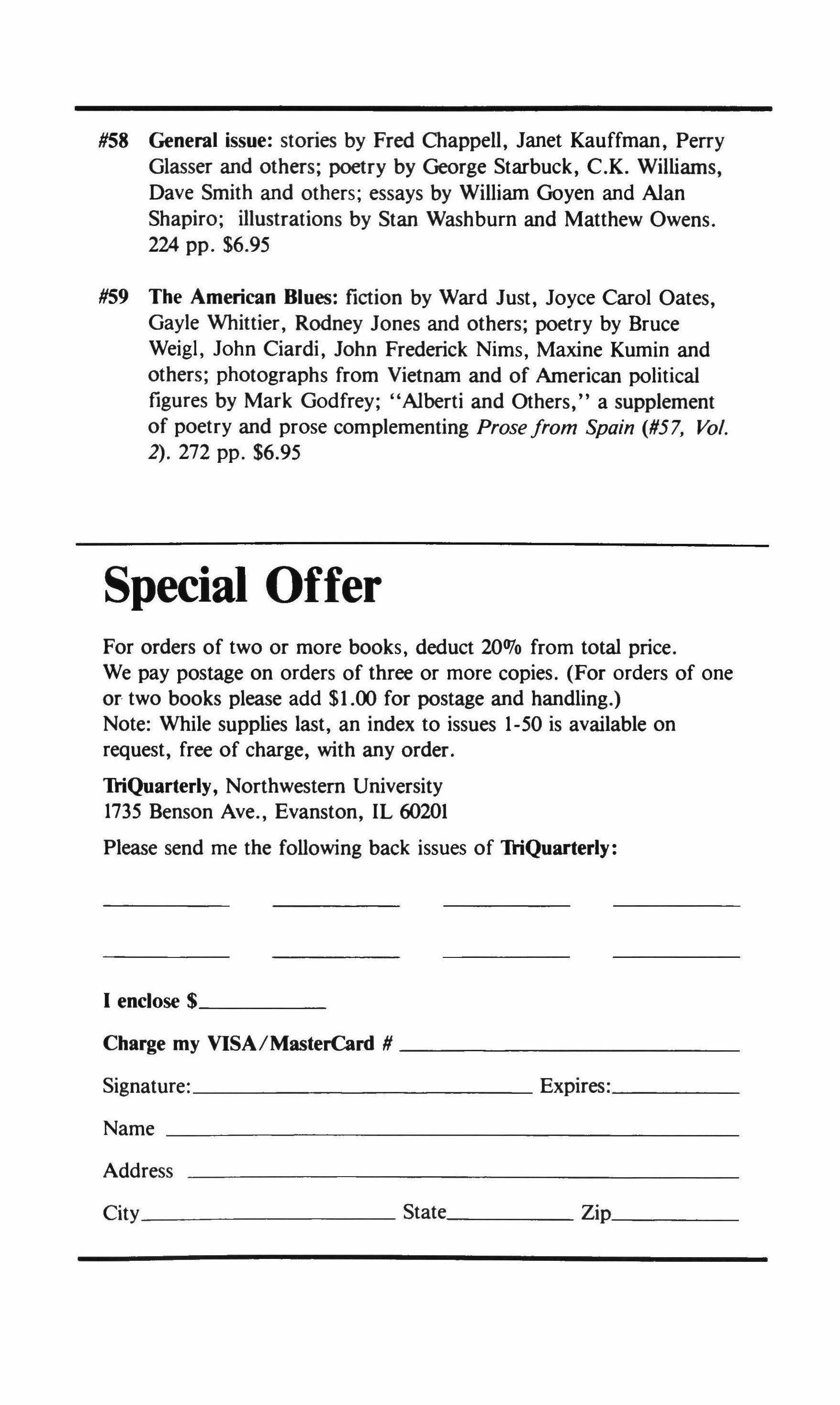
I enclose $
Charge my VISA/MasterCard #
Signature: Expires:
Name Address
City State Zip
Phoenix Fiction
l\Ii,h.ld (�ullphdl Lord Di,mi" u,

lvo Andri, The Bridg'" .n rhc Drul.l ..
A paperback series of novels
Lord Dismiss Us Michael Campbell
Weatherhill, a minor English public school, is in the last term of the school year when a new headmaster arrives, determined to restore the school's slipping reputation and, above all, to crack down on the "moral laxity" he fears is rife. The public tragicomedies he sets in motion are paralleled by private ones experienced by an Oxford-bound student and a brilliant young teacher.
"A remarkable evocation of the process of growing up and the ghastly but somehow paradisal closed world of school."
-Anthony Burgess Paper $9.95 384 pages
The Last, Long Journey Roger Cleeve
This is the suspenseful tale of a relentless manhunt. The pursuer is Ernie Maher, Anglo-Indian civil servant. His quarry is Robert King, an Englishman running guns from Pakistan to Kashmir in 1957. As the tension of the chase mounts, the full story of the relationship between the two men unfolds.
"Brilliantly told, vividly realized adventure Plot, character, background, and the sense of history are all gripping. I found it unputdownable."-Mary Renault Paper $7.95 272 pages
The Bridge on the Drina Ivo Andric
Translated
by
Lovett F. Edwards
With an Introduction by William H. McNeill
A great stone bridge, built in the heart of the Balkans over three centuries ago, dominates the setting for this Nobel Prize-winning novel. As Andric follows the destinies of individuals and generations, the bridge, permanent and enduring, spans the gulf between nationalities, creeds, the Occident and the Orient.
"A closely imagined and powerful work.. What we have here is hardly a novel, but a kind of national epic-drama in prose."-J. B. Priestley
Paper $8.95 318 pages
THE
UNIVERSITY OF
5801 South Ellis Avenue Chicago, IL 60637
CHICAGO PRESS
- .,�i�:f:�·o.<
 -William Gass
-William Gass
¢���\\� � .��O THE RED MENACE �'"O ����\\\) A novel by MICHAEL ANANIA (cloth-$13.95) _j "This excellent novel, as timely as the razor's edge on which we live, is a natural." -Studs
A rich and vivid meditation on that anxious decade. (the 50's)."
Order from THUNDER'S MOUTH PRESS P.O. Box 780· New York. N.Y. 10025 WILLIAM EASTLAKE JACK ARMSTRONG IN TANGIER BAMBERGER BOOKS P. o. ao. 112. FllDt, 10 48502 "These travel stories give us a sharply observant, sympathetic, and always humorous look at the definitely-different world of North Africa and Spain." -EDWARD ABBEY Paper $6.50 - Hardbound $13.00 Signed Hardbound $20.00 Mail Ord Add St.OO
Terke]
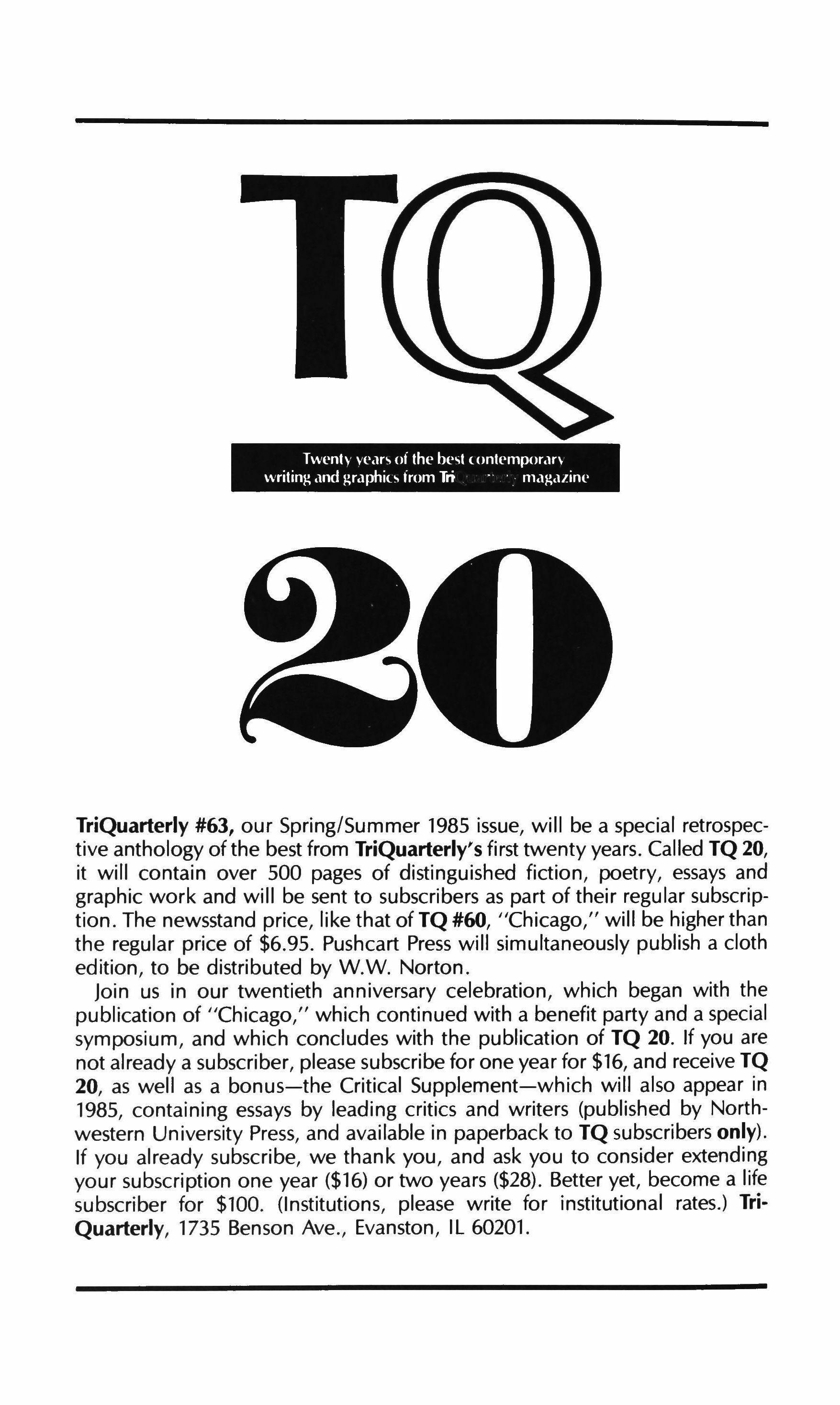
TriQuarterly #63, our Spring/Summer 1985 issue, will be a special retrospective anthology of the best from TriQuarterly's first twenty years. Called TQ 20, it will contain over 500 pages of distinguished fiction, poetry, essays and graphic work and will be sent to subscribers as part of their regular subscription. The newsstand price, like that of TQ #60, "Chicago," will be higher than the regular price of $6.95. Pushcart Press will simultaneously publish a cloth edition, to be distributed by W.W. Norton.
Join us in our twentieth anniversary celebration, which began with the publication of "Chicago," which continued with a benefit party and a special symposium, and which concludes with the publication of TQ 20. If you are not already a subscriber, please subscribe for one year for $16, and receive TQ 20, as well as a bonus-the Critical Supplement-which will also appear in 1985, containing essays by leading critics and writers (published by Northwestern University Press, and available in paperback to TQ subscribers only). If you already subscribe, we thank you, and ask you to consider extending your subscription one year ($16) or two years ($28). Better yet, become a life subscriber for $100. (Institutions, please write for institutional rates.) TriQuarterly, 1735 Benson Ave., Evanston, IL 60201.
Twentv war, oj the best conternporarv \\ritin� and �r'lphil' trom Tri magazine


$6.95































































































































































































































 Edited by Julia Wendell and Jack Stephens
Edited by Julia Wendell and Jack Stephens









 -William Gass
-William Gass

